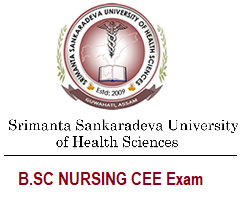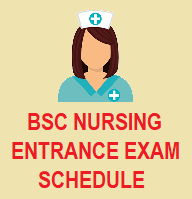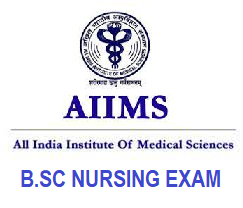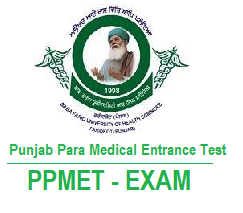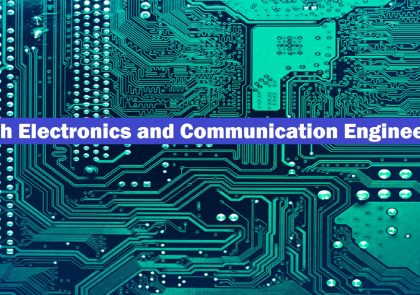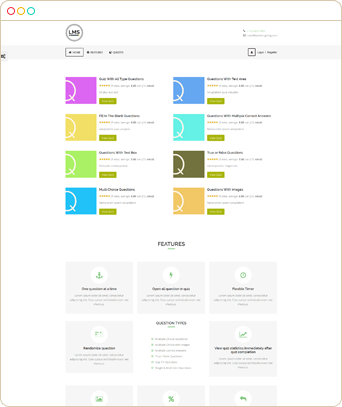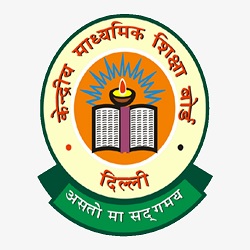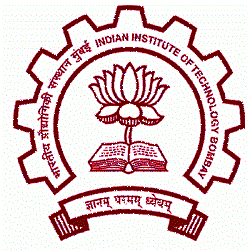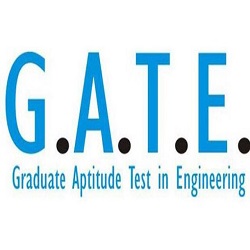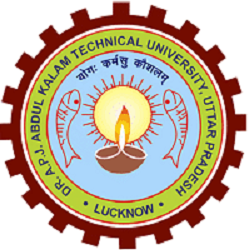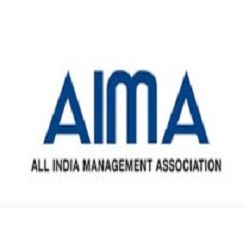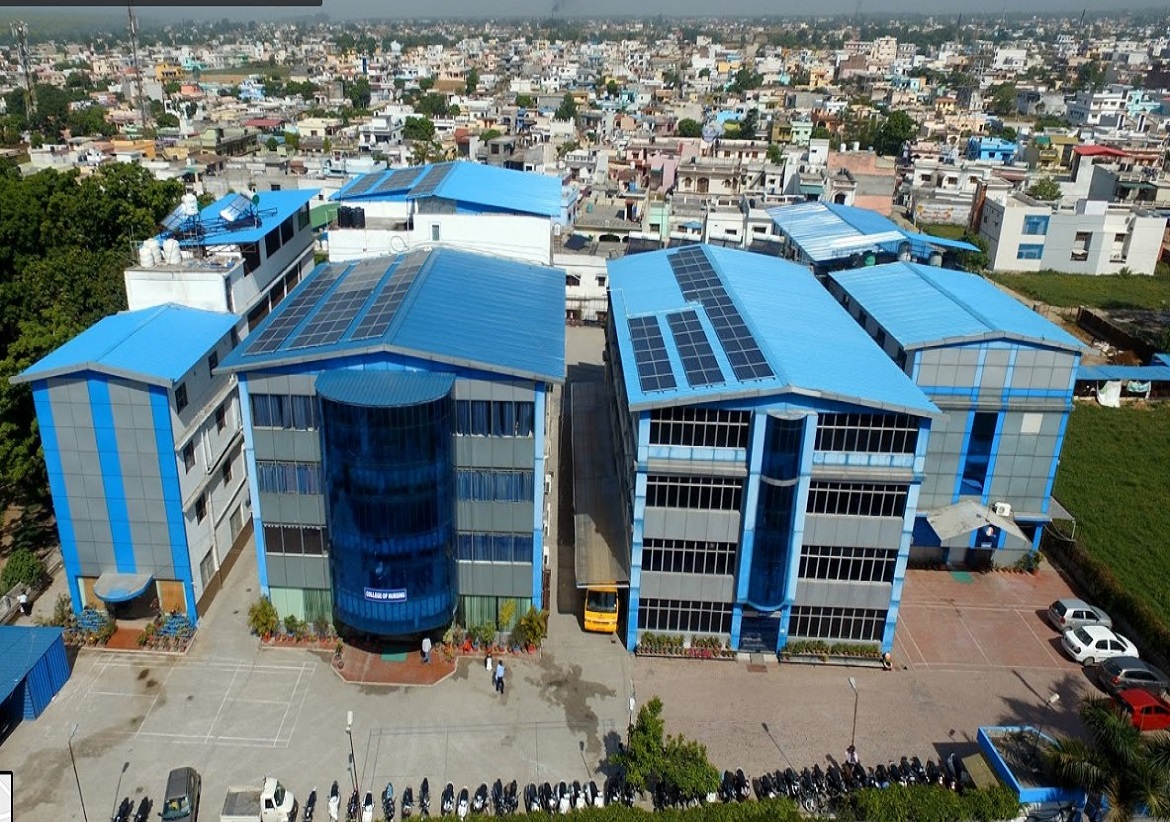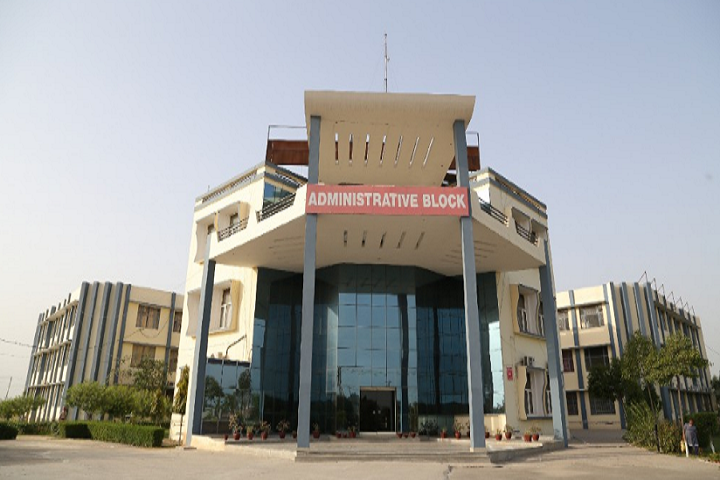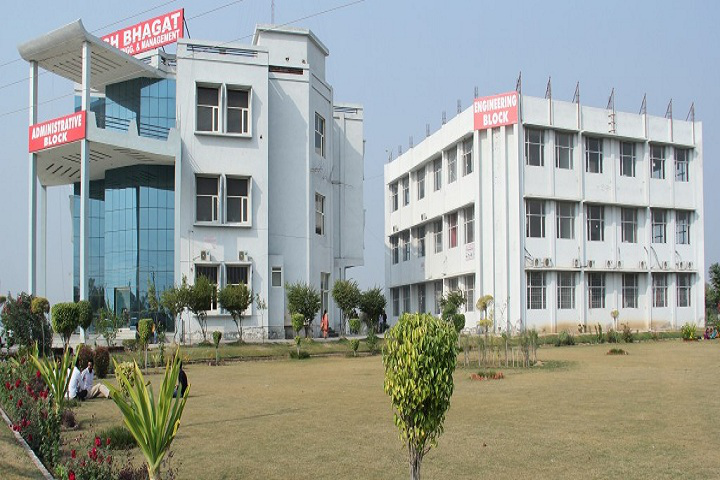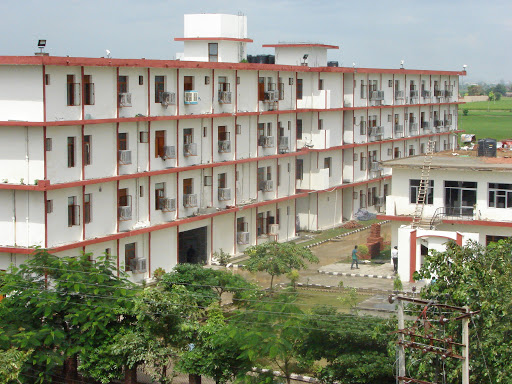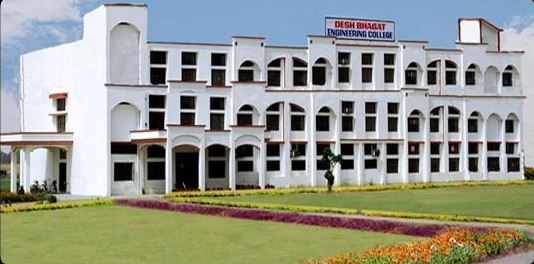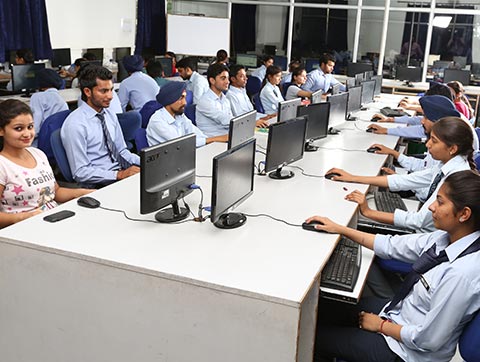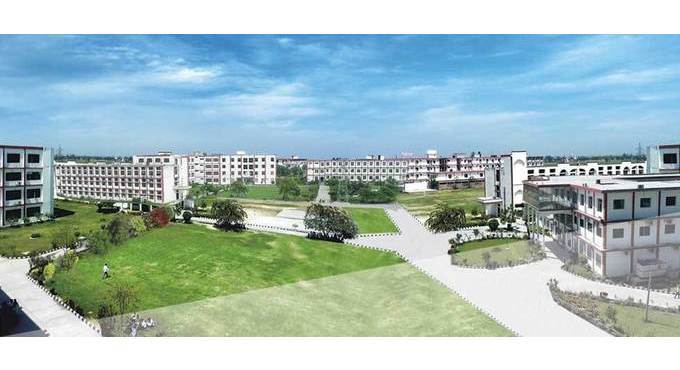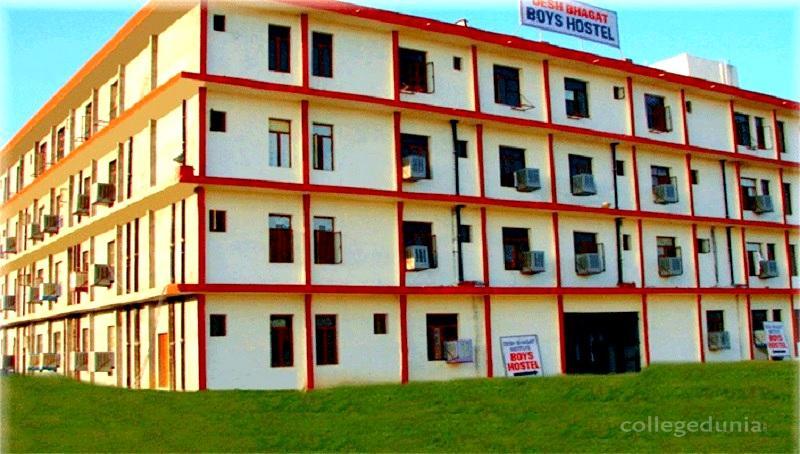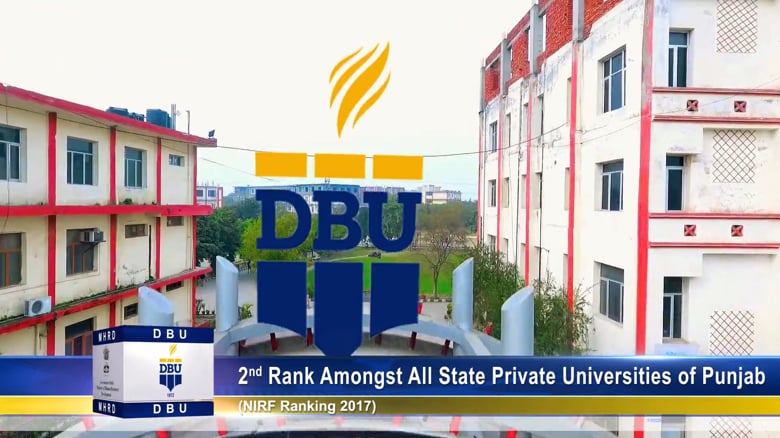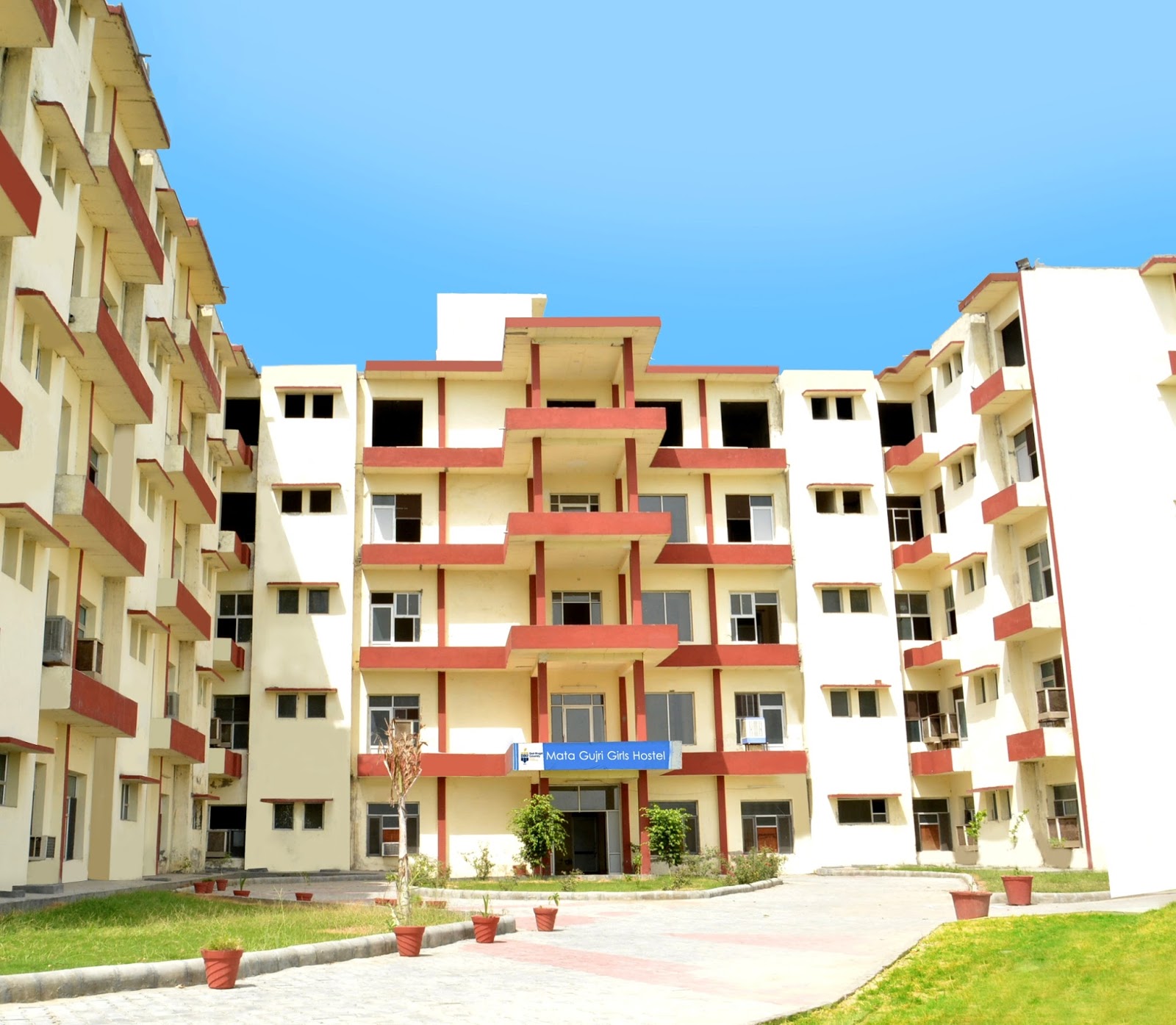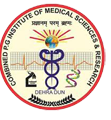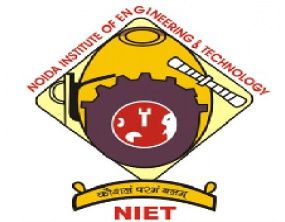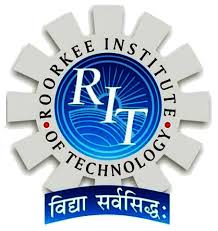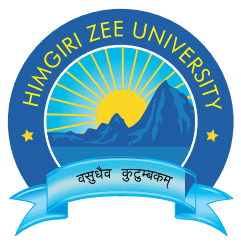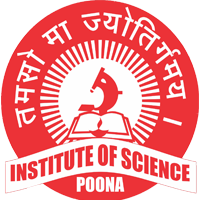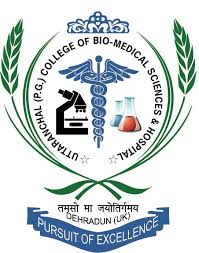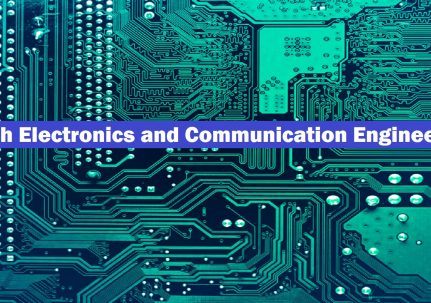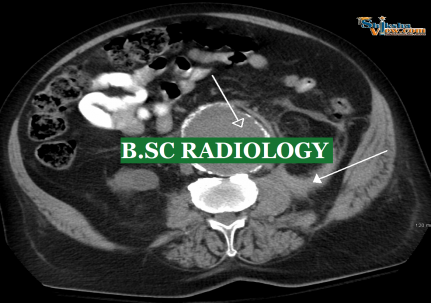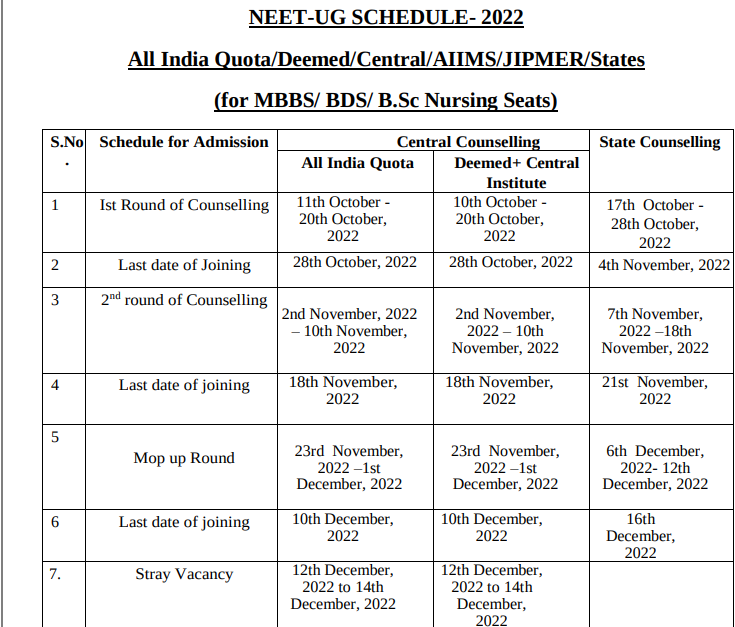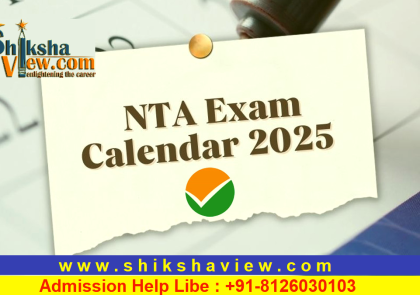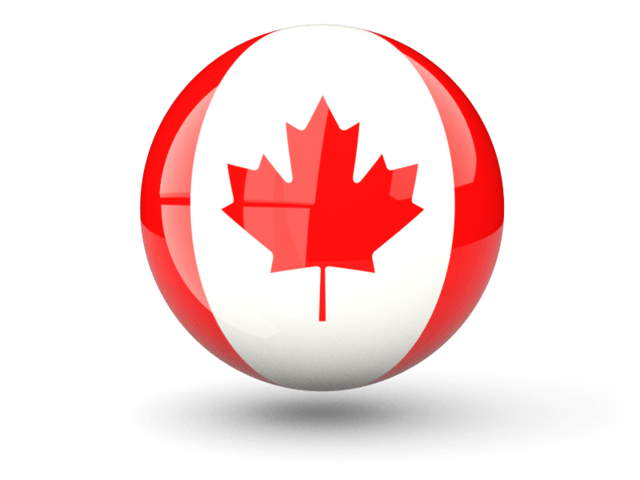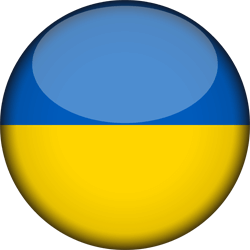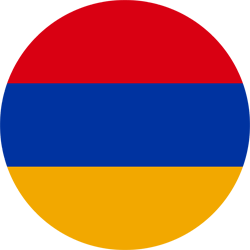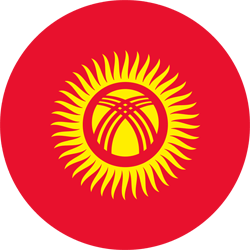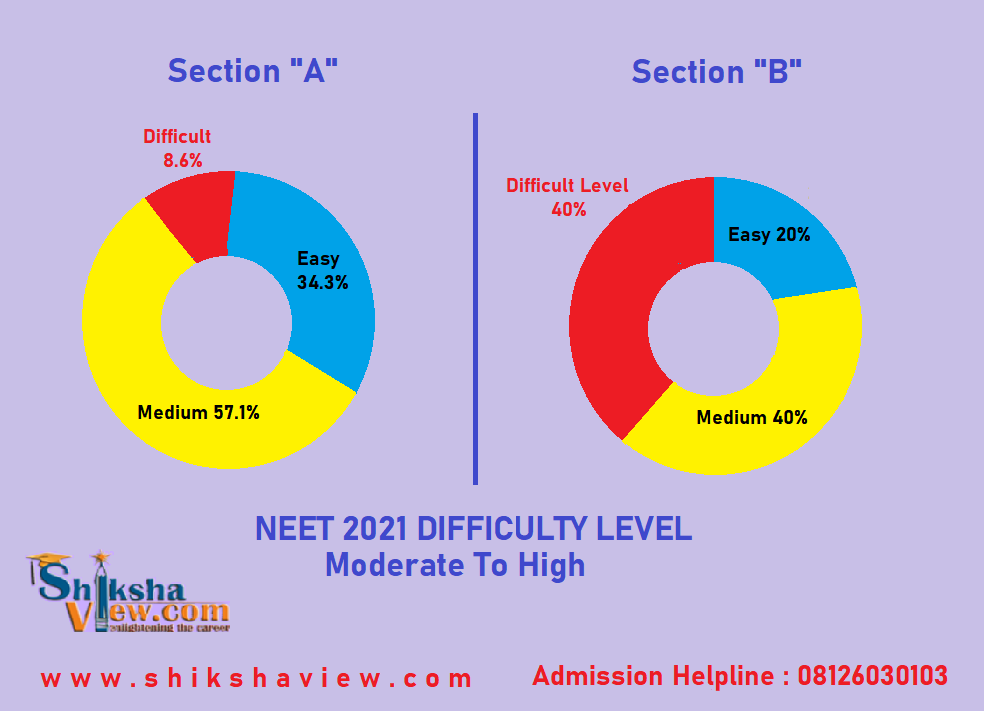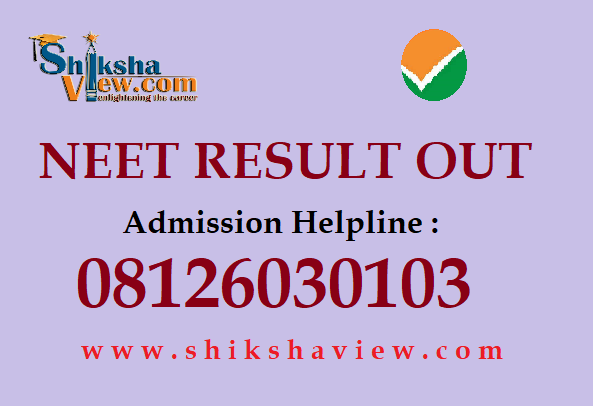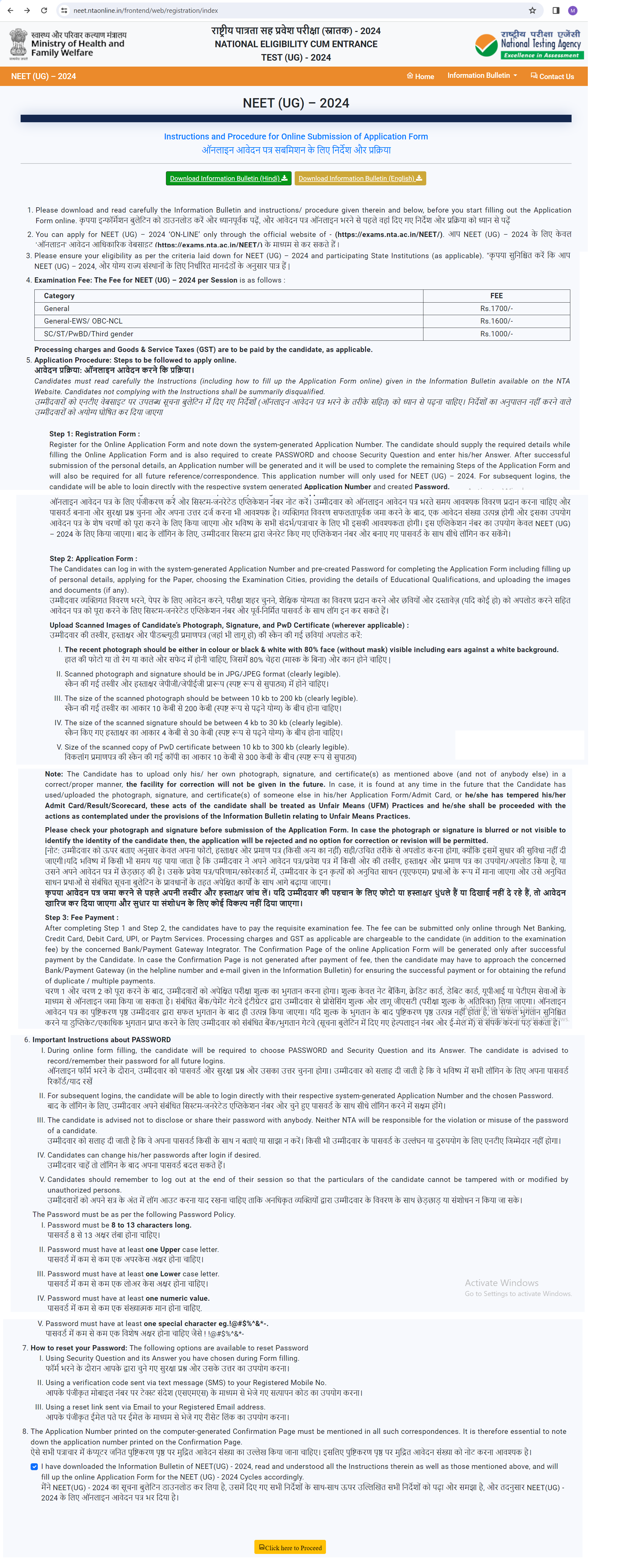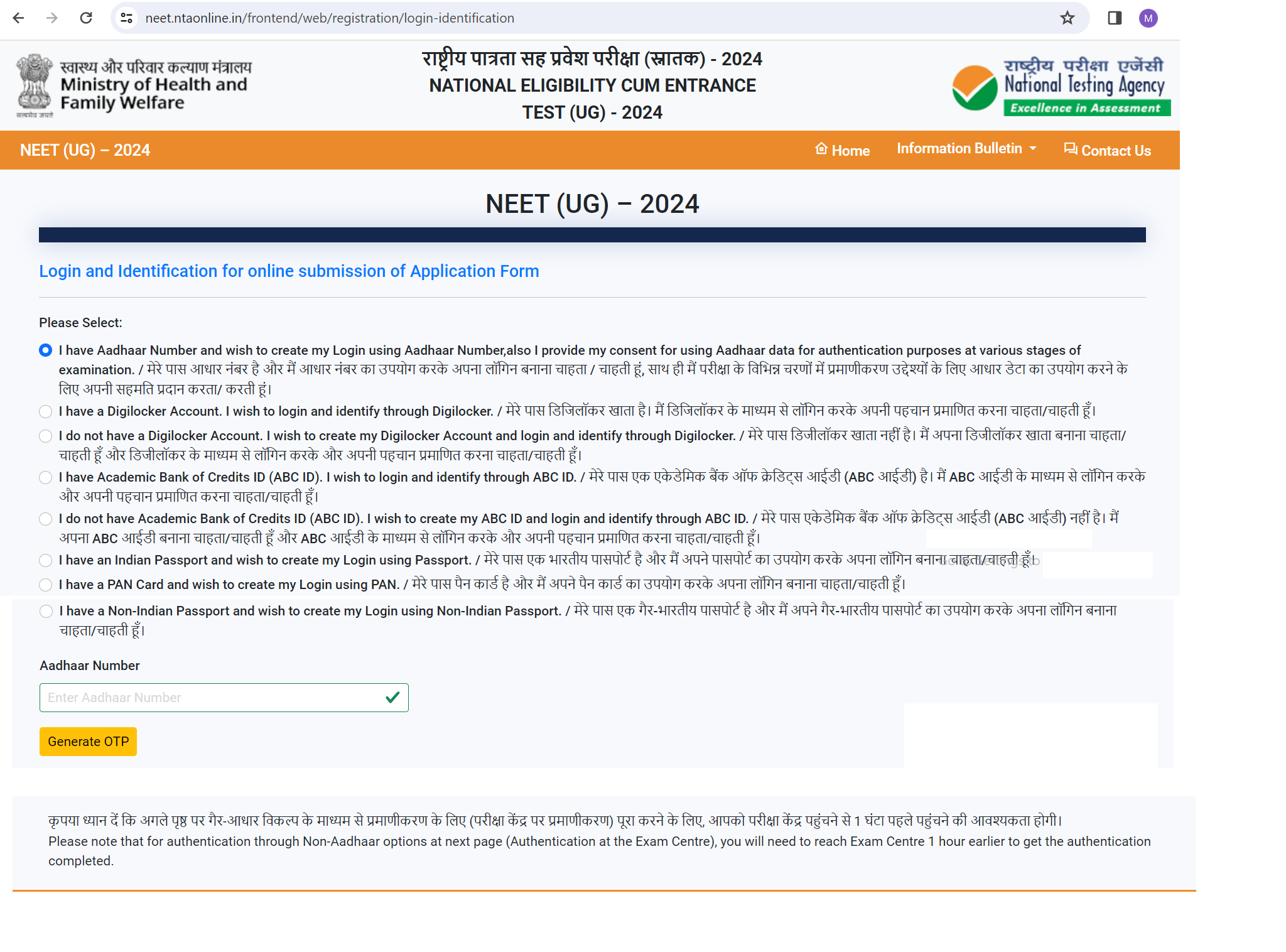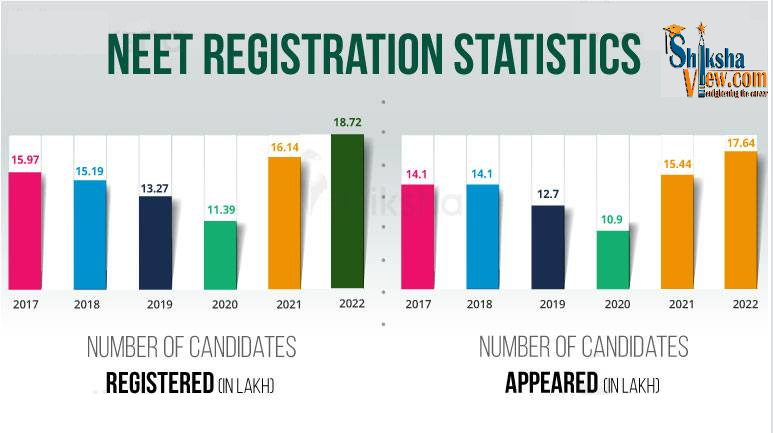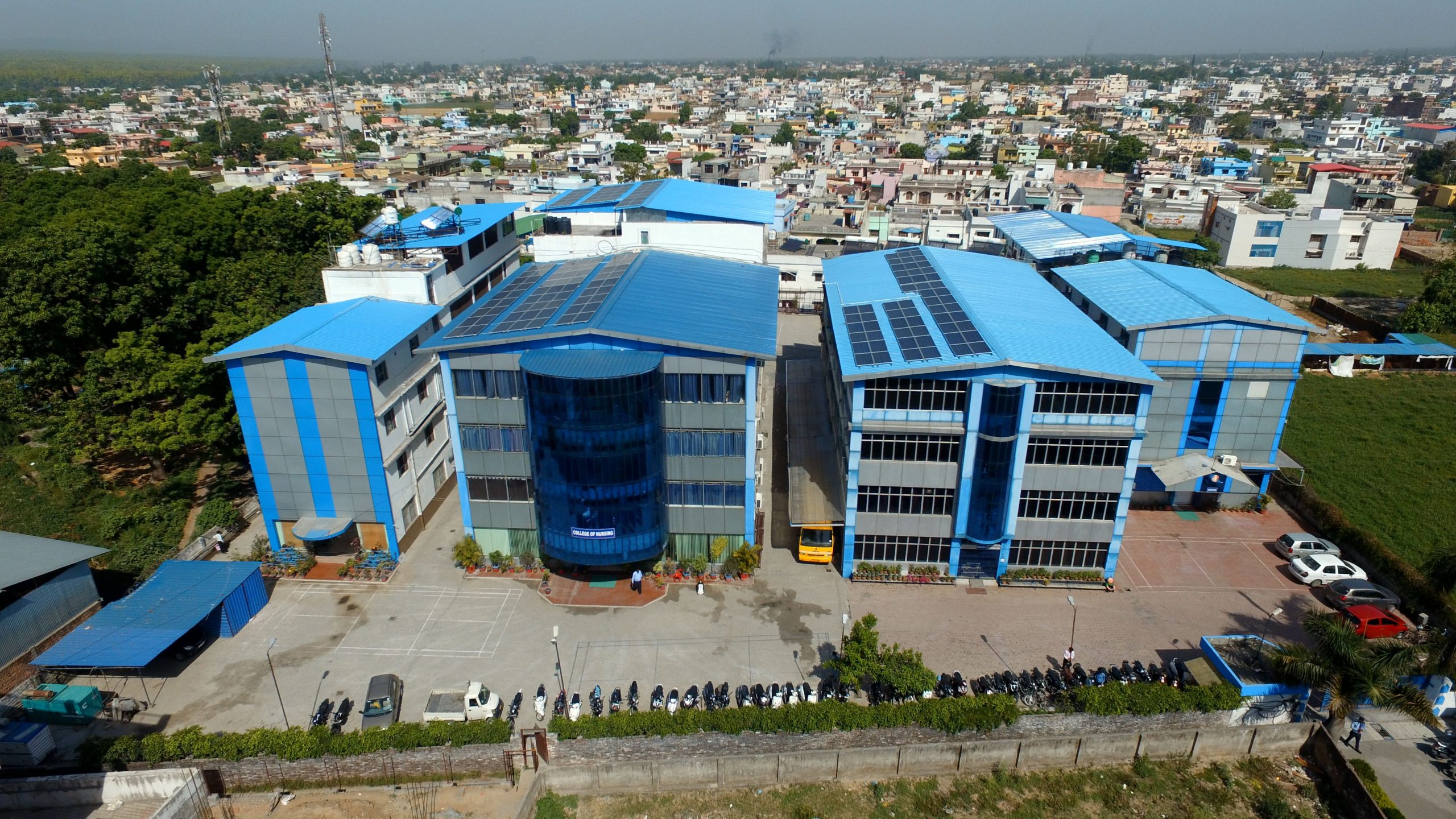
Some Slient Features of Shiksha View
Authorized Educational Counselling Agency of Best Reputed Colleges and Universities in India.
Direct Admission in best Colleges & Universities, Pay fees direct to college admission section
Highly qualified, competent and deeply dedicated group of counselor/instructor
Encourage students and Parents to meet personally & have answers to all their queries
We have charged a very low processing fees in a very rear instaces.
Welcome to the Shiksha View Educational Poratal
Shikshaview is a higher education web portal which having information about various, colleges, entrance exam, and courses as well. It is based on realistic and precise data of top colleges and courses. Students who are seeking information in reference to the course and colleges can access the relevant information. We have mentioned all the educational streams such as Medical, Nursing, Paramedical, Management, Science & Engineering, Banking & Finance, Information Technology, Animation, Hospitality, Aviation & Tourism, Media,Mass Communication, Design etc. Moreover, we have compiled stream wise career options and various job prospects of that particular career.
- We provide details about the best suitable college as per your course selection its location and state as well.
- Students will get to know a particular career direction, which course is suitable for that and all the relevant information
- Our objective to serve transparent visualization of Higher Education.
Who We are
We providing information of all universities and colleges in India as well as abroad. We are leading educational experts team. We assist you free of cost. We peronally guide you to select the best course as well as best university and college in an affordable fee. Why you pay extra?? Why you take headache to search colleges or universities information in the so many different portals?? Why you ask non-expert induviduals??? We serve all the details under one roof named shikshaview.com.
Apply NowTop Demanding Universities of the Month
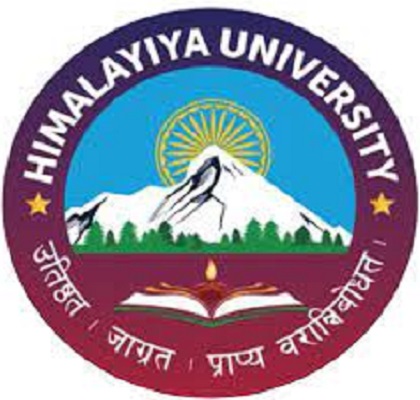
HIMALAYIAYA UNIVERSITY DEHRADUN UTTARAKHAND
Best University in Uttarakhand
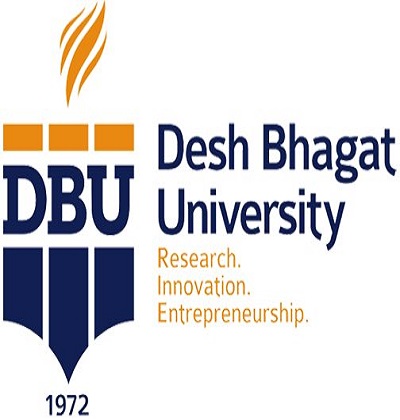
Desh Bhagat University
Top Demanded University

Graphic Era University
Top Demanded University
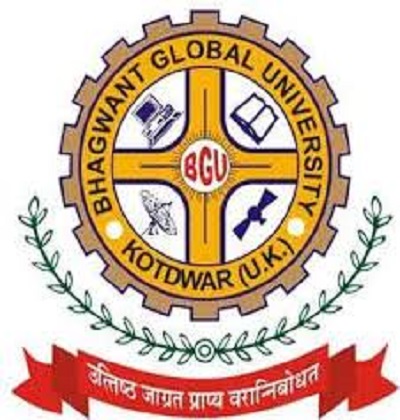
Bhagwant Global University
Most Leading University in State
Take a look to our Most Popular Colleges / Universities
RIT College
SVIET College
UPES University
UIT University
Uttaranchal University Dehradun | Top 20 Premium University| 6th Most Promising TechUniversity in Uttrakhand. 15 LPA Package Offered | Placement in 200+ Companies | 5000+ Alumni | Apply Online Now. Sports, Female Quota. Scolarship. | Courses Offered – B.Tech, M.Tech, Diploma Engineering, Law, MBA, BBA, B.Sc Agriculture, BCA, MCA
InterestedRR Institutions
RR Institutions Bengalore | Top 10 Premium College| 16th Most Promising College in India. 25 LPA Package Offered | Placement in 200+ Companies | 5000+ Alumni | Apply Online Now. Sports, Female Quota. Scolarship. | Courses Offered – B.Tech, M.Tech, Diploma Engineering, Law, MBA, BBA, B.Sc Agriculture, BCA, MCA, B.Pharm, D.Pharm
ITM University
Institute for Technology & Management University | Top 10 Premium University| 14th Most Promising University in India. 25 LPA Package Offered | Placement in 200+ Companies | 5000+ Alumni | Apply Online Now. Sports, Female Quota. Scolarship. | Courses Offered – B.Tech, M.Tech, Diploma Engineering, Law, MBA, BBA, B.Sc Agriculture, BCA, MCA, B.Pharm, D.Pharm
Interested
Lots of Features
Nunc at pretium est curabitur commodo leac est venenatis egestas sed aliquet auguevelit.
Creative Design
Nunc at pretium est curabitur commodo leac est venenatis egestas sed aliquet auguevelit.
Faster Development
Nunc at pretium est curabitur commodo leac est venenatis egestas sed aliquet auguevelit.
Our Expert Teachers

HIMALAYIAYA UNIVERSITY DEHRADUN UTTARAKHAND
Best University in Uttarakhand

Desh Bhagat University
Top Demanded University
Main Services
Guaranteed uploads
Nunc at pretium est curabitur commodo leac est venenatis egestas sed aliquet auguevelit.
20 Predefined Skins
Nunc at pretium est curabitur commodo leac est venenatis egestas sed aliquet auguevelit.
Many Shortcodes
Nunc at pretium est curabitur commodo leac est venenatis egestas sed aliquet auguevelit.
Fullwidth Template
Nunc at pretium est curabitur commodo leac est venenatis egestas sed aliquet auguevelit.
Parallax Effect
Nunc at pretium est curabitur commodo leac est venenatis egestas sed aliquet auguevelit.
Woocommerce Ready
Nunc at pretium est curabitur commodo leac est venenatis egestas sed aliquet auguevelit.
WPML Support
Nunc at pretium est curabitur commodo leac est venenatis egestas sed aliquet auguevelit.
Excellent Support
Nunc at pretium est curabitur commodo leac est venenatis egestas sed aliquet auguevelit.
In Case You Need Help
Presales Question
Nunc at pretium est curabitur commodo leac est venenatis egestas sed aliquet auguevelit. When an unknown printer took a galley.
Need Support
Nunc at pretium est curabitur commodo leac est venenatis egestas sed aliquet auguevelit. When an unknown printer took a galley.
Check Forum
Nunc at pretium est curabitur commodo leac est venenatis egestas sed aliquet auguevelit. When an unknown printer took a galley.
Give us a message
Contact Info
The Shikshaview.com
Dehradun Uttarakhand, India
248001
- Paramedical
- Paramedical Course List
- Admission Procedure
- How to Apply
- Top Paramedical Colleges
- Entrance Exam
- Career
- FAQ's
A paramedical course means attaining a professional degree of medical assistance by learning the complete process. And, these professionals are known as Paramedics. Paramedical courses are Job oriented courses and these are directly related to the Nursing, Pharmacy, and Medicine as a Healthcare sector. They have the capability to diagnose any disease in a human body with the help of blood tests, X-ray, MRI, Citi scan, Ultrasound, etc. The Common areas where these paramedics work is in the management of fracture, spinal injury, burn assessment, and during general accident case. In addition, they actually support doctors in providing better treatment by doing various medical checkups and therapies.
Key Points
- Increased immense scope in the field of health care
- Duration of degree courses is 3-4 years, diploma & certificate courses are of 6 Months-3 Yrays.
- Thousands of jobs for health care field releases every year
- Saralary : 2 lac – 10 lac CTC per annum
To Know More Register For Free Counseling :
After 12th students can join degree, diploma & certificate courses in Paramedical area. The duration of degree courses is 3-4 years, while diploma & certificate courses are of 6-15 Months. A student needs at least 50% marks from a recognized board. Here we provide the complete list of Paramedical courses after 12th.
| Course Name | Duration | Free Counseling |
|---|---|---|
| B.Sc MLT | 3 Year | Interested |
| B.Sc. Perfusion Technology | 3 Year | Interested |
| B.Sc. in Ophthalmic Techniques | 3 Year | Interested |
| B.Sc in Critical care technology | 3 Year | Interested |
| B.Sc. in Radiography | 3 Year | Interested |
| B.Sc in Anesthesia Technology | 3 Year | Interested |
| Bachelor of Physiotherapy | 4 Year | Interested |
| B.Sc. in OTT (Operation Theatre Technology) | 3 Year | Interested |
| B.Sc Nursing | 4 Year | Interested |
| B.Sc. in Renal Dialysis Technology | 3 Year | Interested |
| B.Sc. in Optometry | 3 Year | Interested |
| Bachelor of Nephropathy and Yoga Science | 5 Year | Interested |
| B.Sc. in Medical Record Technology | 3 Year | Interested |
| B.Sc. in X-Ray Technology | 3 Year | Interested |
| Bachelor of Radiation Technology | 3 Year | Interested |
| B.Sc. in Medical Imaging Technology | 3 Year | Interested |
| B.Sc Nuclear Medicine Technology | 3 Year | Interested |
| Bachelor in Audiology and Speech-Language Pathology (BASLP) | 3 Year | Interested |
| B.Sc (Respiratory Therapy Technology) | 3 Year | Interested |
| B.Sc (Allied Health Services) | 3 Year | Interested |
| B.Sc in Dialysis Therapy | 3 Year | Interested |
| General Nursing Midwifery (GNM) | 3 Year | Interested |
| Auxiliary Nursing Midwifery (ANM) | 2 Year | Interested |
| Diploma in Nursing Care Assistant | 2 Year | Interested |
| Diploma in Physiotherapy | 2 Year | Interested |
| Dialysis Technician Diploma | 2 Year | Interested |
| Diploma in X-Ray Technology | 2 Year | Interested |
| Diploma in Occupational Therapy | 3 Year | Interested |
| Diploma in Medical Imaging Technology | 3 Year | Interested |
| Diploma in Medical Laboratory Technology | 2 Year | Interested |
| Diploma in Dialysis Technology | 2 Year | Interested |
| Diploma in OT Technician | 2 Year | Interested |
| Diploma in Anaesthesia | 2 Year | Interested |
| Diploma in Hear Language and Speech | 1 Year | Interested |
| Diploma in Rural Health Care | 1 Year | Interested |
| Diploma in Ophthalmic Technology | 2 Year | Interested |
| Diploma in Dental Hygienist | 1 Year | Interested |
| Diploma in Medical Record Technology | 1 Year | Interested |
| PG Diploma in Gynecology and Obstetrics | 1 Year | Interested |
| Certificate in Dialysis Technician | 1 Year | Interested |
| Certificate in ECG and CT Scan Technician | 1 Year | Interested |
| X-Ray Technician Certificate | 1 Year | Interested |
| HIV and Family Education Certificate | 1 Year | Interested |
| Rural Health Care Certificate | 1 Year | Interested |
| Certificate in Nutrition and Childcare | 1 Year | Interested |
| Certificate in Operation Theatre Assistant | 1 Year | Interested |
The first step before thinking about a career in the Paramedical Field is to check the eligibility. Whether its BSc , Diploma in Paramedical techniques or Certificate in Paramedical techniques, each of them have their own & different eligibility criteria.
- First of all, candidates should be at least 17 years of age.
- Students must clear 10+2 in Science (PCB) & English exam with minimum 45% marks in any stream, to get admission in UG Courses.
- Students can avail the admission in the Paramedical course of various courses only on the basis of merit.
- Some of the Paramedical Science institutes in India organize entrance tests for the students to take admissions.
- Apart from the above-mentioned tests, there are a number of other entrance tests including NEET, PMT etc.
- There are numerous popular Paramedical institutes in India from where students can pursue the course.
- The admission may be followed by the interview (vary from college to college) or counseling.
- Candidates must meet the eligibility criteria of the program.
- Students must fill the examination form before the deadline.
- Candidates can register themselves online and offline by downloading from (depending on college to college).
- Registration does not guarantee admission.
- Some of them include RIT Roorkee, RR Institutions Bangalore, UHITM Dehradun, BFIT Dehradun, DBU Chandigarh, SVIET Chandigarh, MMDU Jalandar, ITM University, Sai Group of Colleges, Uttranchal PG College of Bio-medical Sciences, Dehradun.
To Know More Register For Free Counseling :
Applying for any Paramedical Course isn’t a difficult task. You just need to follow the below-mentioned steps carefully:-
- Students need to select in what branch of paramedical they want to make a career.
- After selecting the right branch, students are required to choose the duration and type of branch. It could be either degree, diploma, or a certificate course in that particular branch of the paramedical course.
- After deciding the duration of the course, students need to check the eligibility criteria of that particular course. Each degree, diploma, and certificate of paramedical branch has different eligibility criteria. Reviewing this section (Eligibility) first and then applying for the course will save you lots of time.
- Apply for the course from your preferable college. If the college allows admission on the basis of merit, then it’s okay, but if not, then you will have to appear in college demanded entrance examination. Various Universities require entrance exam marks to consider the candidate for admission.
- Firstly, fill the Application form very carefully because if you submit the form with the mistake then it will be canceled.
- After filling the form, submit the all required documents and submit them.
- Pay the registration fee through the Net Banking or Debit/Credit Card.
- Take minimum 3-4 copies of the form for the future reference
To Know More Register For Free Counseling :
Below mention colleges are the top Paramedical colleges in India –
| S.No. | College Name | Free Counseling |
|---|---|---|
| 1 | RIT, Roorkee | Interested |
| 2 | Desh Bhagat University, Chandigarh | Interested |
| 3 | SVIET Chandigarh | Interested |
| 4 | UIHMT, Dehradun | Interested |
| 5 | Uttaranchal PG College of Bio-Medical Sciences & Hospital | Interested |
| 6 | Doon PG College of Agriculture Science Technology, Dehradun | Interested |
| 9 | Himgiri Zee University (HZU), Dehradun | Interested |
| 10 | MMDU Jalandar | Interested |
| 11 | SGRR University, Dehradun | Interested |
| 12 | Care College of Nursing, Haridwar | Interested |
| 13 | Arihant Group of Ibstitutions, Haridwar | Interested |
| 14 | Quadra Group of Institutions, Roorkee | Interested |
| 15 | OM Group of Institutions, Roorkee | Interested |
| 16 | Doon Ayurveda Medical College, Saharnpur | Interested |
| 17 | ITM University | Interested |
| 18 | Koshyas Group of indtitutions, Bangalore | Interested |
| 19 | Dolfin Institute of Bio-Medical Sciences | Interested |
| 20 | Doon PG Group of Colleges, Dehradun | Interested |
| 21 | Sai Group of Institutionsl, Dehradun | Interested |
| 22 | Sri Devraj Urs Medical College, Karnataka | Interested |
| 23 | Bhagwant Global University | Interested |
| 24 | Graphic Era Deemed university, Dehradun | Interested |
| 25 | DBIT Group of Institutions, Dehradun | Interested |
NEET PG: NEET-PG is being conducted by the national board of examination every year. Candidate interested in MS/ MD or other PG courses should participate in this exam, this exam every year happens in the month of Jan & registration for this exam starts in Aug onwards.
DSAT: Dayanand Sagar University Bangalore conducts its own entrance name as DSAT to offer admission in paramedical courses. This exam happens in the month of April & May every year. Students interested in UG & PG courses can register online & apply.
EPSI National Admission Test: Education Promotion Society of India conducts EPSI national admission test, popularly known as ENAT. This exam is unique in nature as after finishing their exam students can immediately see their scores. ENAT being conducted in the first week of April every year.
MH CET: MH CET is state level entrance exam conducted by Govt of Maharashtra every year. Students interested in MBBS, BDS, BAMS, BPT, Bachelor of Occupational Therapy, BASLP, Bsc Nursing Courses can apply for the exam.
BHU PMT: Banaras Hindu University Located in Varanasi conducts its entrance exam commonly known as BHU PMT. In order to participate students should be 12th Passed in PCB with minimum 50% marks in general category and 40% in the reserved category.
AIIMS : To give admission in its courses AIIMS conducts this test. The exam happens in the year in the month of May & the application starts in Feb. Students interested in taking admission in AIIMS can register online for this particular exam.
Scope Of Paramedical Courses After 12th
As we all know, the requirements of Paramedical professionals like Nursing Assistant, Lab Technicians, Radiology Technicians, Physiotherapist, and Pharmacists will surely increase. According to a report, the Indian Paramedical sector will increase with a growth rate of 16.6% percent in the coming 5 yrs.
Required Skills in the Paramedical Sector
- A person should be an excellent presence of mind to take correct decisions in an emergency as they have to work in rotational shifts.
- He/she should be physically fit and perfect to take precautionary measures in case of any injury to the people.
- A person should be willing to work late at night and on weekends.
- He/she have a clear mindset, quick decision-maker, and excellent communication skills.
Top 10 Jobs After Paramedical Courses
- Physiotherapists
- Nursing
- Geriatric Manager
- Lab Technicians
- Pharmacist
- Homeopathy
- Prosthetic and Orthotic Engineering
- Occupational Therapists
- Speech Therapists
Salary after Paramedical courses
The salary structure in the Paramedical field largely depends on the organization as well as the individual’s experience and skills. Salary packages in this field vary as per job profiles.
- A Radiology Technician can start their career with Rs 10,000 per month. With the experience, he can get up to Rs 50,000 per month.
- An average salary of a Healthcare Assistant varies between Rs. 5,000/- to Rs. 15,000/- per month.
- Dialysis Technicians can get remuneration from Rs. 20,000/- to Rs. 50,000/- per month.
- An average salary structure of a Lab Technician is in between Rs. 10,000/- to Rs. 70,000/-.
- These pay structures will increase with experience and talent.
Paramedical Course Recruiters In India
A Paramedical graduate can get a job in top organizations like:-
- Sri Ganga Ram Hospital
- Batra Hospital
- Jaypee Hospital
- Medanta Hospital
- Fortis Hospital
- Nanavati Hospital
- Manipal Hospital
- MaxCure Hospital
- GTB hospitals
- Dr. Lal Path Labs
- SAROJ Super Specialty Hospital
- Apollo Hospital
Ques: What are the Paramedical courses & what exactly will we study in it?
Ans: Paramedical Courses are job oriented academic programs related to the healthcare sector and industry. You will acquire the necessary skills in this course to assist doctors as health care professionals. Nursing, Pharmacy & Medicine are some of the fields you’ll study in this course.
Ques: How to apply for Paramedical Courses?
Ans: For admission in Paramedical courses, you may need to appear in an entrance examination like AIIMS. Some Institutes may allow admission on the basis of merit. For more details, check out the Admission Process on this article.
Ques: What is the scope of the Paramedical Course after 12th?
Ans: Because of the increasing health problems, the need for assisting health professionals have also increased. This simply proves that you won’t have any trouble in grabbing a nicely paying Job/Placement after completing a Paramedical course after 12th.
Ques: How much salary can we expect after paramedical courses?
Ans: Usually, paramedical professionals earn a satisfactory salary package, as most of it depends on your skills and experience. Still, as a fresher, you can achieve around 3-3.5 lacs P/A very easily, which will rise along with your time and expertise in the industry.
Ques: Is NEET Entrance Exam necessary for admission in Paramedical Course?
Ans: No, NEET is not compulsory for paramedical admissions. NEET is only required for MBBS & BDS. But Paramedical offering Universities usually hold separate entrance examination for these courses.
Featured Colleges
Online Admission strats in the top ranked colleges.
Announcement
UPES Dehardun
Online Entrance Process Starts. You can Register by paying Rs.1200/- InterestedRR Institutions Bangalore
RR Institutions starts online entrance exam process. Interested- Engineering
- Engineering Course List
- Admission Procedure
- How to Apply
- Top Engineering Colleges
- Entrance Exam
- Career
- FAQ's
A Engineering course is a professional degree to learn, search, innovate, develop & teach . And, these professionals are known as Engineers. Engineering courses are Job oriented courses and these are directly related to the B.Tech, B.Arc, BE and Diploma Engineering as a real world. They have the capability to invent a new ideas in a real world with the help of latest technology, Virtual Reality. Artificial Intelligence, Sensors, Bio-Recolonization Techniques, image Senor Techniques , to invent new technologies etc. The Common areas where these engineers work is in the multinational companies, constructions, software development, mechanical, architecture, electrical, electronics, medical, education or we can say every field of the technology.
Key Points
- Increased immense scope in the every field of real world
- Duration of degree courses is 4 years, diploma courses 2-3 Yrays.
- Thousands of jobs for every sector field releases every year
- Salary : 2 lac – 28 lac CTC per annum
To Know More Register For Free Counseling :
After 12th students can join degree & diploma courses in Engineering field. In Engineering there are 450+ courses available. The duration of degree courses is 4 years, while diploma courses are of 2-4 years. A student needs at least 50% marks from a recognized board. Here we provide the complete list of Top Demanding Engineering courses after 12th.
| Course Name | Duration | Free Counseling |
|---|---|---|
| BE/B.Tech Mechanical Engineering | 4 Year | Interested |
| BE/B.Tech Civil Engineering | 3 Year | Interested |
| BE/B.Tech Electrical Engineering | 3 Year | Interested |
| BE/B.Tech Electronics & Communication Engineering | 3 Year | Interested |
| BE/B.Tech Aeronautical Engineering | 3 Year | Interested |
| BE/B.Tech Computer Science & Engineering | 3 Year | Interested |
| BE/B.Tech Automobile Engineering | 4 Year | Interested |
| BE/B.Tech Aerospace Engineering | 3 Year | Interested |
| BE/B.Tech Petroleum Engineering | 4 Year | Interested |
| BE/B.Tech Robotics Engineering | 3 Year | Interested |
| BE/B.Tech Textile Engineering | 3 Year | Interested |
| BE/B.Tech Biomedical Engineering | 5 Year | Interested |
| BE/B.Tech Mechatronics Engineering | 3 Year | Interested |
| BE/B.Tech Biotechnology Engineering | 3 Year | Interested |
| BE/B.Tech Power Engineering | 3 Year | Interested |
| BE/B.Tech Mining Engineering | 3 Year | Interested |
| BE/B.Tech Ceramic Engineering | 3 Year | Interested |
| BE/B.Tech Metallurgical Engineering | 3 Year | Interested |
| BE/B.Tech Chemical Engineering | 3 Year | Interested |
| BE/B.Tech Production Engineering | 3 Year | Interested |
| BE/B.Tech Construction Engineering | 3 Year | Interested |
| BE/B.Tech Environmental Engineering | 3 Year | Interested |
| BE/B.Tech Tool Engineering | 2 Year | Interested |
| BE/B.Tech Telecommunication Engineering | 2 Year | Interested |
| BE/B.Tech Transportation Engineering | 2 Year | Interested |
| BE/B.Tech Cloud Technology & Information Science | 2 Year | Interested |
| BE/B.Tech Data Science | 2 Year | Interested |
| BE/B.Tech Dairy Technology | 3 Year | Interested |
| BE/B.Tech Food Technology | 3 Year | Interested |
| Diploma in Electronics & Communication Engineering | 2 Year | Interested |
| Diploma in Civil Engineering | 2 Year | Interested |
| Diploma in Mechanical Engineering | 2 Year | Interested |
| Diploma in Electrical Engineering | 2 Year | Interested |
| Diploma in Computer Science & Engineering | 1 Year | Interested |
The first step before thinking about a career in the Engineering Industry is to check the eligibility. Whether its B.Tech or Diploma in Engineering, each of them have their own & different eligibility criteria.
- First of all, candidates should be at least 17 years of age.
- Students must clear 10+2 in Science (PCB/PCM) & English exam with minimum 50% marks, to get admission in UG Courses.
- Students can avail the admission in the Engineering course of various courses only on the basis of merit.
- Most of the Engineering institutes in India organize entrance tests for the students to take admissions.
- Apart from the above-mentioned tests, there are a number of other entrance tests including JEE MAINS, JEE ADVANCE etc.
- There are numerous popular Engineering institutes in India from where students can pursue the course.
- The admission may be followed by the interview (vary from college to college) or counseling.
- Candidates must meet the eligibility criteria of the program.
- Students must fill the examination form before the deadline.
- Candidates can register themselves online and offline by downloading from (depending on college to college).
- Registration does not guarantee admission.
- Some of them include RIT Roorkee, RR Institutions Bangalore, DBIT Dehradun, BFIT Dehradun, DBU Chandigarh, SVIET Chandigarh, MMDU Jalandar, ITM University, Himgiri Zee University Dehradun, Tulas Institute Dehradun, Graphic Era University Dehradun, Uttaranchal University Dehradun, RIIMs Bangalore, Koshyas Group of Institutions, Bangalore Group of Colleges, IBMR Pune, NIU Greater Noida, NIET Greater Noida, ITM Agra, etc.
To Know More Register For Free Counseling :
Applying for any Engineering Course isn’t a difficult task. You just need to follow the below-mentioned steps carefully:-
- Students need to select in what branch of engineering they want to make a career.
- After selecting the right branch, students are required to choose the duration and type of branch. It could be either degree, diploma, or a certificate course in that particular branch of the engineering course.
- After deciding the duration of the course, students need to check the eligibility criteria of that particular course. Each degree, diploma, and certificate of engineering branch has different eligibility criteria. Reviewing this section (Eligibility) first and then applying for the course will save you lots of time.
- Apply for the course from your preferable college. If the college allows admission on the basis of merit, then it’s okay, but if not, then you will have to appear in college demanded entrance examination. Various Universities require entrance exam marks to consider the candidate for admission.
- Firstly, fill the Application form very carefully because if you submit the form with the mistake then it will be canceled.
- After filling the form, submit the all required documents and submit them.
- Pay the registration fee through the Net Banking or Debit/Credit Card.
- Take minimum 3-4 copies of the form for the future reference
To Know More Register For Free Counseling :
Below mention colleges are the top Engineering colleges in India –
| S.No. | College Name | Free Counseling |
|---|---|---|
| 1 | RIT, Roorkee | Interested |
| 2 | Desh Bhagat University, Chandigarh | Interested |
| 3 | SVIET, Chandigarh | Interested |
| 4 | DBIT Group of Institutions, Dehradun | Interested |
| 5 | UPES, Dehradun | Interested |
| 6 | Graphic Era Deemed university, Dehradun | Interested |
| 9 | Himgiri Zee University (HZU), Dehradun | Interested |
| 10 | MMDU Jalandar | Interested |
| 11 | ITM University | Interested |
| 12 | Tula’s, Dehradun | Interested |
| 13 | Koshyas Group of institutions, Bangalore | Interested |
| 14 | Bhagwant Global University | Interested |
| 15 | OM Group of Institutions, Roorkee | Interested |
| 16 | RR Institutions, Karnataka | Interested |
| 17 | Bangalore Group of Institutions, Bangalore | Interested |
| 18 | RIIMs Bangalore | Interested |
| 19 | NIU, Greater Noida | Interested |
| 20 | NIET, Greater Noida | Interested |
| 21 | IBMR, Pune | Interested |
| 22 | Uttaranchal University Dehradun | Interested |
| 23 | Galgotia Group of Institutions, Uttar Pradesh | Interested |
| 24 | Quantam University, Roorkee | Interested |
| 25 | LPU, Chandigarh | Interested |
| 26 | Mangalmay Group of Institutions, Ghaziabad | Interested |
Engineering has long been the most sought-after program to study in India. With thousands of aspirants dreaming of running towards their engineering dreams, a number of entrance exams are held in India each year – national level, state level and university level.
JEE Main : The Joint Entrance Examination (JEE) Main is a national level entrance examination that will be conducted by the National Testing Agency (NTA). Previously, the exam was conducted by CBSE once a year. But from 2019, the exam is being conducted twice a year – January and April. In another change, the exam is now conducted in computer based mode (except the drawing section of Paper 2 (B.Arch) which is a pen and paper based exam). JEE Main is the admission procedure into the well-known IIITs, NITs and other more prestigious engineering institutes of the nation. More than 12 lakh applicants appear for this examination hoping to clear and reach JEE Advanced for admissions. The duration of the exam is 3 hours long and is multiple choice in nature. The examination is divided into two papers – Paper 1 is for B.Tech/B.E and Paper 2 is for B.Arch or B.Planning.
BITSAT: The Birla Institute of Technology and Science (BITS) conducts their University level engineering entrance examination every year for new admissions. BITSAT (Birla Institute of Technology and Science Admission Test) offers admission to all eligible applicants into the three campuses of BITS. Around 2 lakh applicants appear for this examination every year making it a very sought after the entrance exam. The duration of the online examination is 3 hours and the objective based question paper is divided into four sections – Physics, Chemistry, English Proficiency and Logical Reasoning and finally Mathematics. Around 2,000 seats are available for admission.
MET : Manipal Academy of Higher Education (earlier known as Manipal University) is responsible for conducting the annual online entrance examination for admissions into the institute. The Manipal Entrance Test (MET), previously known as MU OET, is a University level examination which bring in over 50,000 applicants per year. Admissions are provided in 16 engineering courses through MU OET and is open to all eligible applicants. The entrance exam is held in online mode and is 150 minutes long. The questions are objective multiple choice ones and the applicants will have to qualify this examination for admission into the institute.
VITEEE: Around 5000 undergraduate engineering seats are available for eligible applicants under VITEEE (VIT Engineering Entrance Exam). The VIT University conducts the University level examination and around 2 lakh students appear for it every year. The mode of examination is online and will be objective in nature. Within the duration of 2½ hours, the applicants will have to solve 125 questions from Physics, Mathematics, Chemistry, Aptitude and English sections.
SRMJEEE: The SRM Joint Engineering Entrance Examination (SRMJEEE) is conducted by SRM Institute of Science and Technology for all eligible aspirants. The online or computer-based test is held for admissions into the 7,000 undergraduate engineering seats available. Every year, around 1 lakh students apply for the entrance examination. The entrance examination consists of 125 questions and the applicants will have to qualify the exam for admissions into the University. Direct admissions is provided to the top 1000 IIT JEE Rank holders along with the top rank holders of central and state board of examinations.
COMEDK UGET : Admissions into the engineering courses offered by the Associations of Medical, Dental and Engineering private colleges in the state of Karnataka is done through COMEDK UGET conducted by the Consortium of Medical Engineering and Dental Colleges of Karnataka (COMEDK). The entrance examination is held across 697 exam centres in 153 cities in India. Around 20,000 B.Tech seats are offered for admission under B.Tech. The examination is 3 hours long and is based on the syllabus of the 10+2 standard. The applicants will have to solve 180 multiple choice questions to be eligible for admission.admission in AIIMS can register online for this particular exam.
KITEEE : The Kalinga Institute of Industrial Technology is the conducting authority of KIITEE. The examination is held annually for admissions of eligible applicants into the 4-year B.Tech programs offered by the institute. KIITEE is conducted in online mode and has 3 sections – Physics, Chemistry and Mathematics. The qualifying marks have to be obtained by the applicants for admission. Around 60 exam centers are available for the applicants appearing for KIITEE.
SITEEE : Symbiosis Institute of Technology Engineering Entrance Examination (SITEEE) is conducted annually by Symbiosis Institute of Technology (SIT). The applicants who qualify SITEEE will be offered admission into the institute. JEE Main and MHT CET qualified applicants are also eligible for admission. The University level entrance exam offers admission to eligible applicants into the 420 available B.Tech seats. The entrance exam consists of 100 questions and the total marks is 200. The duration of SITEEE is 150 minutes.
AMUEEE : AMUEEE is a University level entrance examination conducted by Aligarh Muslim University for admissions into the available B.Tech programmes. Based on the merit and rank obtained in the entrance exam, the eligible applicants are offered admission. AMUEEE is held over a duration of 3 hours and comprises of 150 questions from Physics, Chemistry and Mathematics. All questions are objective based.
Scope Of Engineering Courses After 12th
As we all know, the requirements of Engineers like Mechanical, Electrical, Electronics, Civil, Petroleum, food Technology, Computers etc will surely increase. According to a report, the Indian Technical sector will increase with a growth rate of 96.6% percent in the coming 5 yrs.
Required Skills in the Engineering Sector
- A person should be an excellent presence of mind to take correct decisions in a real time problem solving conditions as they have to work in rotational shifts.
- He/she should be physically fit .
- A person should be willing to work late at night and on weekends.
- He/she have a clear mindset, quick decision-maker, and excellent communication skills.
- If you want to move into service industry like IT, which has many branches, then functional knowledge is necessary.
- EEE students are mostly absorbed in the core sector unlike ECE. Core sector means sectors like power.
- You can join any manufacturing industry and go towards research and development.
- As the field of engineering incorporates new technologies, the appropriate scope of undergraduate education in engineering continues to grow.
Top 10 Jobs After Engineering Courses
- Junior Engineer
- Assistant Engineer
- Graduate Engineer
- Software Developer
- Coder
- Programmer
- Senior Engineer
- Architect Engineer
- Civil Engineer
- Mechanical Engineer
- Manager
Salary after Engineering courses
The salary structure in the Engineers largely depends on the organization as well as the individual’s experience and skills. Salary packages in this field vary as per job profiles.
- A Junior Engineer can start their career with Rs 10,000 per month. With the experience, he can get up to Rs 50,000 per month.
- An average salary of a Assistant Engineer varies between Rs. 10,000/- to Rs. 15,000/- per month.
- Software Engineer can get remuneration from Rs. 20,000/- to Rs. 50,000/- per month.
- An average salary structure of a Engineer is in between Rs. 100,000/- to Rs. 2800,000/= per annum.
- These pay structures will increase with experience and talent.
An engineering professionals can be placed in the following industries:
- Aerospace & Aviation
- Alternative Energy & Power
- Automotive, Electronic & Autonomous
- Capital Equipment
- Consumer Products
- Contract Manufacturing
- Composites/Plastics/Polymers (including PIM & MIM)
- Defense & Security
- Electronics, Analog & Digital Construction
- Emergent Technologies
- Facilities & Industrial
- Machine & Computer
- Machine Shop & Fabrication
- Magnetic
- Maritime/Naval
- Medical Device & Equipment
- Photonics (Laser & Optical)
- RF & Wireless
- Semiconductor
- Structural, Architecture, Civil & Construction
- Telecommunication
- Test & Measurement
- Vision
Engineering Course Recruiters In India
A Paramedical graduate can get a job in top organizations like:-
- Accenture
- TCS
- Infosys
- Cognizant
- BHEL
- SAIL
- Tata Motors
- DRDO
- Bajaj
- ONGC
- GAIL
- HPCL
- CPCL
Ques: What is the difference between B.E. and B.Tech?
Ans: It sometimes confuse many students about the difference between B.E. and B.Tech. This article talks about some important aspects such as key differences and similarities in B.E. and B.Tech.
Ques: What are the Foundation batches for IIT JEE and their advantages?
Ans: Foundation batches are very important for IIT JEE aspirants. They enhance thinking ability in them and expose them to competitive environment.
Ques: What is the scope of the Engineering Course after 12th?
Ans: Because of the increasing technolgies, the need for assisting technical professionals have also increased. This simply proves that you won’t have any trouble in grabbing a nicely paying Job/Placement after completing a Engineering course after 12th.
Ques: How much salary can we expect after engineering courses?
Ans: Usually, engineeres earn a satisfactory salary package, as most of it depends on your skills and experience. Still, as a fresher, you can achieve around 3-3.5 lacs P/A very easily, which will rise along with your time and expertise in the industry.
Ques: Is JEE Entrance Exam necessary for admission in Engineering Course?
Ans: No,JEE is not compulsory for Engineering admissions. JEE is only required for IIT, NIT universities etc.
Ques: What is a professional engineer?
Ans: Professional engineers have fulfilled the rigorous education, examination, and experience requirements, which, under state licensure laws, permit them to offer engineering services to the public. Although engineering licensure laws vary from state to state, in general, to become a PE an individual must be a graduate of an engineering program accredited by the Accreditation Board for Engineering and Technology, pass the Fundamentals of Engineering exam, gain four years of experience as an intern, and then pass the Principles and Practice of Engineering exam. PEs take legal responsibility for their engineering designs, being bound by a code of ethics to protect public health and safety.
Ques: What do engineers do?
Ans: Engineers take abstract ideas and apply science and mathematics to build products to meet the needs of mankind.
Ques: What is the difference between science and engineering?
Ans: Science is knowledge based on observed facts and tested truths arranged in an orderly system that can be validated and communicated to other people. Engineering is the creative application of scientific principles used to plan, build, direct, guide, manage, or work on systems to maintain and improve our daily lives.Engineers take abstract ideas and apply science and mathematics to build products to meet the needs of mankind.
Ques: How many types of engineering specialties are there?
Ans: Aerospace, Agricultural, Biomedical, Chemical, Civil (General and Structural), Computer, Control Systems, Electrical and Electronics, Environmental, Fire Protection, Geotechnical, Industrial, Manufacturing, Mechanical, Mining, Nuclear, Petroleum, Sanitary, and Traffic.
Ques: What are various sectors / types of industry in which mechanical engineers can be absorbedneering specialties are there?
Ans: They can be suitably employed in-
- Manufacturing industries
- Maintenance work
- Automobile mfg. & maintenance industries
- Refrigeration industries / Air conditioning industries
- Escorts
- Tecumsha
- Hindustan Aeronautics Limited (HAL)
- BHEL, NTPC, NHPC
- JCB / Hero Honda
- Railways
- Armed Forces
- Software companies like TCS, Infosys, L&T
- Other small scale industries etc.
Featured Colleges
Online Admission strats in the top ranked colleges.Announcement
RIT Roorkee
Online Interview Process Starts for the admission session-2020 InterestedUPES Dehardun
Online Entrance Process Starts. You can Register by paying Rs.1200/- InterestedRR Institutions Bangalore
RR Institutions starts online entrance exam process. Interested- Hotel Management
- HM Course List
- Admission Procedure
- How to Apply
- Top HM Colleges
- Entrance Exam
- Career
- FAQ's
Hotel Management course is 3-4 years undergraduate program, which educates students about the work pattern, techniques, challenges, and entire scenario of the Hotel, Hospitality, and Catering Industry. Admission in Hotel Management & Hospitality courses done through the NCHMCT JEE (National Council of Hotel Management and Catering Technology), which is a National level joint entrance exam.
In today’s era of huge competition, Hotel Management courses after 12th, is like a blessing, which we promise, can help you get wonderful career opportunities.
Key Points
- Increased immense scope in the field of Hotel and Hospitality Management
- Duration of degree courses is 3 years, diploma & certificate courses are of 6-15 Months
- Thousands of jobs for hotel and hospitality management releases every year
- Saralary : 2 lac – 10 lac CTC per annum
To Know More Register For Free Counseling :
After 12th students can join degree, diploma & certificate courses in Hotel Management. The duration of degree courses is 3 years, while diploma & certificate courses are of 6-15 Months. Here we provide the complete list of Hotel management courses after 12th.
| Course Name | Duration | Free Counseling |
|---|---|---|
| DIPLOMA IN HOTEL MANAGEMENT | 3 Year | Interested |
| BHM (BACHELOR OF HOTEL MANAGEMENT) | 3 Year | Interested |
| BHMCT (BACHELOR OF HOTEL MANAGEMENT AND CATERING TECHNOLOGY) | 4 Year | Interested |
| DIPLOMA – FOOD PRODUCTION | 1 Year | Interested |
| DIPLOMA – FOOD AND BEVERAGES SERVICE | 2 Year | Interested |
| B.SC – HOTEL MANAGEMENT | 3 Year | Interested |
| DIPLOMA IN HOSPITALITY MANAGEMENT | 1 Year | Interested |
| DIPLOMA IN HOTEL MANAGEMENT AND CATERING TECHNOLOGY | 3 Year | Interested |
| B.SC. – HOSPITALITY AND HOTEL ADMINISTRATION | 3 Year | Interested |
| DIPLOMA – BAKERY AND CONFECTIONERY | 1 Year | Interested |
| B.SC. IN HOTEL MANAGEMENT AND CATERING TECHNOLOGY | 3 Year | Interested |
| MBA IN HOTEL MANAGEMENT | 2 Year | Interested |
| DIPLOMA – FRONT OFFICE | 2 Year | Interested |
| MBA – TOURISM AND HOTEL MANAGEMENT | 2 Year | Interested |
| MASTER OF HOTEL MANAGEMENT | 2 Year | Interested |
Admission procedure in hotel Management courses may differ across the institute. Some of the top institutes select students through an entrance test followed by personal interview. Some colleges select students on the basis of marks obtained in the last qualifying exams. Admission procedure for hotel management courses as follows.
- First of all, candidates should be at least 17 years of age.
- Students must clear 10+2 exam with minimum 50% marks in any stream, to get admission in UG Courses.
- All the Hotel Management institutes in India organize entrance tests for the students to take admissions.
- Apart from the above-mentioned tests, there are a number of other entrance tests including IPU CET BHMCT, Oberoi Step in, UPSEE BHMCT, and IHA.
- There are numerous popular Hotel Management institutes in India from where students can pursue the course.
- Some of them include IHTM Mumbai, Graphic Era University, Petroleum University, UTU Dehradun, Quantum University, Maya Group of Colleges Dehradun, BFIT Dehradun, DBIT Group of Institutions,UHITM Dehradun, DBU Chandigarh, SVIET Chandigarh, MMDU Jalandar, RIT Roorkee, RR Institutions Bangalore, Bangalore Institute of Technology, IHM Delhi, IHM Bhopal, IHM Bengaluru, SIHM Kozhikode, and SRM IHM Chennai.
To Know More Register For Free Counseling :
Applying for any Hotel and Hospitality Management Course isn’t a difficult task. You just need to follow the below-mentioned steps carefully:-
- Firstly research and get some knowledge about various options available to pursue in this diverse field of Hotel and Hospitality Management.
- After deciding, check the eligibility requirements of that particular course of Hotel Management in your desired University, College or Institution.
- Check if there is an entrance examination score required by your particular desired University or Institution.
- There are some entrance examinations made especially for Hotel and Hospitality Management courses like AIHMCT WAT, JEHOM, IIHM E-CHAT, MAH HM CET,etc. You need to appear in one, according to your desired University/Institution.
- After passing out the entrance exam, some Universities allow the admissions on a merit basis. However, some still conduct a second test round, like a personal interview, to check if the candidate is eligible to pursue this course from their respective institution or not.
Subject Required in 12th
- Communication Skills (English)
- Food Production
- Advertising and Promotion
- PR
- House Keeping
- Front End Operations
- HR Management
- Travel Management
- Management Skills
- Accounting
- Business Law
- Nutrition and Food Science
To Know More Register For Free Counseling :
Below mention colleges are the top hotel management colleges in India –
| S.No. | College Name | Free Counseling |
|---|---|---|
| 1 | Graphic Era University, Dehradun | Interested |
| 2 | Quantum University, Dehradun | Interested |
| 3 | Kukreja Institute Of Hotel Management & Catering Technology, Dehradun | Interested |
| 4 | IHM, Dehradun | Interested |
| 5 | Ram Institute of Hotel Management, Dehradun | Interested |
| 6 | Doon PG College of Agriculture Science Technology, Dehradun | Interested |
| 7 | Christ College Bangalore | Interested |
| 8 | Dev Bhoomi Institute Of Management Studies | Interested |
| 9 | Himgiri Zee University (HZU), Dehradun | Interested |
| 10 | Institute of Hotel Management, Chennai | Interested |
| 11 | UIHMT, Dehradun | Interested |
| 12 | Institute of Hotel Management Hyderabad | Interested |
| 13 | SBSPG Dehradun | Interested |
| 14 | Maya Group of Institutions | Interested |
| 15 | BFIT, Dehradun | Interested |
| 16 | Institute of Hotel Management Gwalior | Interested |
| 17 | Desh Bhagat University, Chandigarh | Interested |
| 18 | SVIET Chandigarh | Interested |
| 19 | IHTM Mumbai | Interested |
| 20 | MMDU Jalandar | Interested |
| 21 | Institute of Hotel Management Catering & Nutrition | Interested |
| 22 | Hotel & Catering Management Institute, Chandigarh | Interested |
| 23 | M.A.Rangoonwala Institute of Hotel Management and Research, Pune | Interested |
| 24 | Advanced Information & Management Studies (AIMS), Bengal | Interested |
Here are some entrance exams for Hotel Management, that you need to qualify, even after passing the eligibility test:-
1) NCHMCT JEE
This joint entrance examination is organized by the National Council of Hotel Management and Catering Technology to held in April each year. It is a National Level Entrance exam. This exam is held for admission in Hotel & Hospitality administration programmes. Negative Marking is a part of attempting this exam. The exam will be held in June- July month.
2) IIHM E – CHAT
This entrance exam for admission in the HM course is organized by IIHM. Usually held in the month of May every year, this test will help you to take admission in the IIHM hotel management course. The exam Date will be of July Month.
3) AIMA UGAT
AIMA introduced this Undergraduate entrance test for admission in the hotel management courses. You’ll encounter a total of 180 questions in this test that you will be required to solve in 2 hours.
4) GNIHM JET
Anyone who wants to take admission in Hotel Management course of Guru Nanak Institute of Hotel Management will have to go through this entrance examination in the month of July.
5) JEHOM
JEHOM is an entrance test introduced by the West Bengal Joint Entrance Examination Board for admission in Hospitality and Hotel Management courses. This entrance examination usually held in August.
6) MAH HM CET
The Maharashtra Master of Hotel Management and Catering Technology Common Entrance Test is mandatory to pursue any two year or full-time postgraduate degree course through Maharashtra Institutes and Colleges of Hospitality and Hotel Management.
7) AIHMCT WAT
Through the Army Institute of Hotel Management and Catering Technology, one can achieve a good career headstart in the industry of Hospitality and Management. The course offered by this college promises to develop skills required in the industry, even during high competition.
8) EHLE
To grab admission in 4 years undergraduate Hotel Management program of ‘Ecole Hoteliere Lavasa’, the student will have to appear in the EHLE examination.
9) OBEROI STEP
The worldwide popular Oberoi group of hotels has started this ‘Systematic Training and Education Program (STEP)’ to shortlist the best of the best candidates with talent and passion for growing in this industry.
Hotel Management is amongst the hottest career option globally at the moment. This sector is an integral part of the proper growth of National as well as the International economy. Currently, there are more than 3 million people are working in the Hotel Management industry around the world. As per the latest report, around 10 million workforces will include in this industry in the next 5 to 7 years. Trained Hotel Management professionals can find ample job opportunities in hotels. One can work in different departments related to the hotel industry like front office, operations, accounting, sales and marketing, food and beverages, and many more. Besides Hotels and Restaurants, candidates can get job opportunities in Forest Lodges, Clubs, Airlines and Cabin Services, Guest Houses, Resorts, Railways, Banks, Shipping Companies, Entrepreneur.
Job Profiles
And, the career is not just limited to the chef or reception profile; there is a wide range of job profile comes under the hospitality industry.
- Stewards
- Executive Chefs
- Floor Supervisor
- Front office manager
- Food and Beverage Manager
- Marketing & Sales Manager
- Restaurant and Food Service Manager
- Hotel Manager
- Assistant manager
The list is endless here, and the perk of working in the hotel industry is that you will be part of the white-collar and pink-collar job. So, everything goes in the favor of the hotel management course; a stable career, better salary, and the white-collar/pink-collar working profile.
Starting Salary After Hotel Management
In this era of cut-throat competition, each industry is suffering from recession and down the line. Still, some scope based industries like Management and Hospitality is in a never-ending situation. Salaries in these skill-based industries depend on your designation and experience. Although, the basic initial salary after completing a diploma or certificate course in Hotel and Hospitality Management is 15k to 20k per month, which will get raise for sure, as the experience and skills of the candidate increases. But, after completing an entire degree course in this industry, one can expect a salary package of a minimum of 3.5 lacs to 4 lacs Per Annum.
Q1. What are the fees for hotel management courses?
Ans. Fees structure varies depending on the rank of the Hotel Management colleges and kind, of course, one is taking. The fees of the hotel management course go approx 1, 50,000 to 6 lakh for three years. The fees of government colleges are nominal than private colleges.
Q2. How many years is the Hotel Management course?
Ans. The duration of a course depends on the type, of course, one has opted. If it is a certificate course then it can be 6 months to 1 year. Diploma courses are of two years and degree courses are of 3 years.
Q3. Who are the top recruiters of Hotel Management?
Ans. The Taj Group, Radisson, Hyatt Hotels, Starwood Hotel and resort worldwide, The Leela, Accor, ITC Hotels, Hilton Worldwide, Marriot International Inc.
Q4. What is the Starting Salary of Hotel Management?
Ans. The career in hotel management is promising hence salary is good. A graduate initial salary can be from 2 to 5 lakh P/A and with the increase in work experience, a person can earn 1 lakh P/M.
Q5. Which Course is best in Hotel Management?
Ans. We have listed top hotel management courses. You can pick any course as per your feasibility, Bachelor’s of Hotel Management, Diploma In Hotel Management, BBA in Hotel Management
Q6. Is Hotel Management Courses After 12th, A Better Career Choice?
Ans. Here comes a big question; is hotel management the best career option after 12th?
Before you think about the possibility of working in the hospitality and hotel industry, let’s have a look at the companies and brands that have jobs for you after these courses.
- Welcome heritage hotel
- Le Méridien Hotels
- Casino Group of Hotels
- Fortune Group of Hotels
- ITC Hotels
- Clarks Inn Hotels
- Holiday Inn Group of Hotels
Featured Colleges
Online Admission starts in the top ranked colleges.
Announcement
Welcome to Know About Study in Germany
We provide complete information regarding to study in Germany. In Germany there are world’s most prestigious universities. According to Academic Ranking of the World Universities [ARWU] six of the top 100 Universities are present in Germany.
Germany is home to the third-best education system globally, right after the United States and the United Kingdom. It is one of the most sought after countries for pursuing education because of its low tuition rates, numerous international communities and affordable living.
With more than 400 courses and degrees being offered in English, Germany has emerged as the third-most popular study destination for international students.
- Acceptance Rate – 92%
- Average Study Cost – USD 12000
- Total Institutions – 400
Exams for Germany
Why Study in Germany?
Germany is known as a free education provider at the Undergraduate level, which attracts a lot of international students to study. It is also famous for offering the best Engineering degree. Promising a safe stay for its students, there are other reasons as to why students can plan to study in Germany:
- Tuition-free university education : There is no tuition fee. Students have to pay a nominal fee of 235 USD per semester, which covers the administrative costs.
- A Wide array of courses : There are more than 1,800 international programs along with 18,000 Bachelors, Masters and Ph.D. degree programs to choose from.
- World-class universities : There are above 400 institutions of higher education.Out of which, 150 universities offer courses and degrees in English.30 universities are ranked in the world’s top 500 universities.
- Dual Education System : Allows students to pursue an apprenticeship in a company along with a vocational course at a vocational school. International students can earn up to 17-23 USD per hour
- Economical cost of living : The cost of living in Germany amounts to 1,000 USD – 1,530 USD per month, which is quite low as compared to its European counterparts.
- Financial Aid and Scholarships : Plenty of scholarships are offered to both undergraduate and postgraduate students in Germany by DAAD (German Academic Exchange Service) and other non-governmental foundations.
- A Massive Job market for graduates : Germany has a graduate employability rate of 2.3% – which is the lowest in Europe. Nearly 69.2 percent of international students choose to stay in Deutschland.
- Multicultural atmosphere : From trendy Berlin to traditional Munich, Germany harbors a rich diversity. The most popular non-Anglophone study destination welcomes more than 350,000 students from various countries annually.
Germany University Ranking
| UNIVERSITY | THE 2018 | QS 2018 | US World 2018 |
|---|---|---|---|
| University of Freiburg | 76 | 186 | 163 |
| University of Wuerzburg | 159 | 197 | 521-530 |
| Humboldt University of Berlin | 67 | 121 | 90 |
| Technical University Munich – [TUM] | 44 | 61 | 80 |
| Ludwig Maximilian University of Munich | – | 62 | 46 |
| Free University of Berlin – [FU-BERLIN] | 104 | 130 | 116 |
| University of Bonn | 110 | 255 | 109 |
| RWTH Aachen University – [RWTH] | 87 | 144 | 179 |
| Karlsruhe Institute of Technology – [KIT] | 135 | 116 | 183 |
| Heidelberg University | 47 | 64 | 54 |
| Technical University Berlin – [TU-BERLIN] | 131 | 147 | 310 |
| University of Muenster | 184 | 329 | 204 |
| Technical University Dresden – [TUD] | 151 | 191 | 185 |
| University of Hamburg – [UHH] | 135 | 223 | 148 |
| Ulm University | 149 | 332 | 289 |
| University of Erlangen-Nuremberg – [FAU] | 175 | 299 | 228 |
| Paderborn University | 501-600 | – | 837 |
| University of Duisburg-Essen | 190 | 601-650 | 286 |
| University of Passau | 201-250 | – | – |
| Technical University Ilmenau | 601-800 | – | – |
| Ruhr University Bochum – [RUB] | 251 | 372 | 330 |
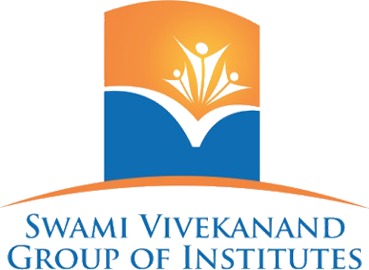 Swami Vivekanand Group of Colleges [SVIET/SVGOC] Candigarh | Registration Open
Swami Vivekanand Group of Colleges [SVIET/SVGOC] Candigarh | Registration Open
Top Demanding | INC | PCI | Best College in Punjab | 100% Placement
Cost of Studying in Germany
| Tuition Fees & Other Charges | |||
|---|---|---|---|
| Fees | Unit | Amount | Currency |
| Average Semester Fees at Public Universities (UG) | Per Year | 470 | USD |
| Average Semester Fees (PG) | Per Year | 470 | USD |
| Average Semester Fees (Doctorate) | Per Year | 400 | USD |
| Health insurance | Per Year | 1,129 | USD |
| TOTAL Cost for UG | Per Year | 1,599 | USD |
| TOTAL Cost for PG | Per Year | 1,599 | USD |
| TOTAL Cost for Doctorate | Per Year | 1,529 | USD |
| Food Cost | |||
| Groceries Cost | Monthly | 350 | USD |
| Three Course Meal in a Restaurant | Monthly | 792 | USD |
| Transportation Cost | |||
| Public transport for semester-ticket holders (Free) | Monthly | 0 | USD |
| One-way Ticket (Local Transport) | Monthly | 155 | USD |
| Bicycle on Rent | Monthly | 30 | USD |
| Other Cost | |||
| Utilities | Monthly | 200 | USD |
| Internet Pass | Monthly | 34 | USD |
| Gas & Electricity | Monthly | 190 | USD |
| Entertainment (Sports, Movies, Pub) | Monthly | 100 | USD |
| Books, Supplies & Other learning Material | Monthly | 50 | USD |
| Total Living Cost (Rent Excluded) | Monthly | 882 | USD |
| Room Charges/Type to Choose | |||
| Home Stay | Monthly | 352 | USD |
| Student Halls of Residence (Dormitory) | Monthly | 275 | USD |
| Apartment on Rent | Monthly | 588 | USD |
| First Time Charges | |||
| VISA Fees | One Time | 70 | USD |
| Living Expenses for One Year as Guarantee | Per Year | 10,236 | USD |
| Return Airfare | One Time | 3,448 | USD |
| TOTAL | – | 13,754 | USD |
| Earning | |||
| Allowed 20 Hours Per Week of Employment | Monthly | 1,016 | USD |
Note: During Vacation You Can Get Full Time Work Permit
Top courses to study in Germany
| Course | Enrollments Per Year |
|---|---|
| Engineering | 71,352 |
| Business Management | 52,168 |
| Humanities | 37,619 |
| Maths and Computer Sciences | 29,748 |
| Fine and Applied Arts | 24,412 |
Top Universities in Germany
| University | QS World Ranking |
|---|---|
| Technische Universität München | #64 |
| Ludwig-Maximilians – Universität München | #66 |
| Ruprecht-Karls-Universität Heidelberg | #68 |
| KIT, Karlsruher Institut für Technologie | #107 |
| Humboldt-Universität zu Berlin | #120 |
High Quality of Education, Faculty, and Infrastructure
Germany has the third best education system in the world, after the United States and the United Kingdom, according to US News & World Report. It can be attributed to the country’s research-intensive curricula and world-class infrastructure.
More than 1,300 international Master and Ph.D. degree programs in various disciplines are taught in English. So if you do not have knowledge of German, you can still study in Germany.
Under the Bologna reform, universities in Germany provide all students with a uniform and internationally-recognized degrees. The country also practices a dual education system wherein students can do apprenticeships in a company while pursuing a vocational course at a vocational school.
The three major type of German higher education institutions – Universities, Universities of Applied Sciences Technical, and Art, Film and Music Colleges – cater to specific needs of students. Most importantly, Deutschland is very lawful and hence, there is no question of fake universities.
Highest paying degrees in Germany
| Executive MBA | USD 131,000 |
|---|---|
| Masters in Finance | USD 125,000 |
| MBA | USD 124,000 |
| Doctorate | USD 123,000 |
| Masters in Management | USD 118,000 |
| PhD | USD 117,000 |
Great Job Opportunities
Germany is the fourth largest economy in the world and largest in Europe, producing thousands of new jobs every day. It immensely values talent and knowledge, providing numerous international students with decent job opportunities.
They have relaxed the rules for work visa and residence permit which are not at all stringent if you have studied in Germany. 69.2 percent of international students choose to stay in Germany after graduation.
Many universities allow students to even work while studying to support themselves. EU students can easily take up a job. Students from non-EU countries must apply for a work permit. They can work for 190 full days or 240 half days per year. They can earn up to USD 30 per hour.
Universities of Applied Sciences in Germany have contracts with big companies to offer students with apprenticeships. These apprenticeships may not always be paid but could provide students with relevant work experience, essential for immediately entering professional lives.
Top graduate jobs in Germany
| Profession | Average Annual Salary |
|---|---|
| Engineer | USD 56,126 |
| Medical professional (including nurses) | USD 66,900 |
| Hospitality industry professional | USD 45,260 |
| Teacher/Tutor | USD 50,574 |
| researcher | USD 60,336 |
A Plethora of Scholarships and Financial Aids
Universities in Germany charge no to low tuition fees and yet offer a number of ways to fund your studies. Many waive or pay for expenses such as semester ticket, admission fees, examination fees, and even German language courses.
The state-funded BAföG includes zero-interest government loans. You have the option to start repaying this government loan five years after graduating.
DAAD scholarships are highly popular among students too. In 2018, the DAAD (German Academic Exchange Service) offered nearly 200 scholarships and funded more than 130,000 students across the globe.
The Most Common Questions
FAQ 2021 JEE 2020 GATE 2020 NEET Syllabus 2021 Hotel Management Agriculture Engineering ParamedicalFAQ – Hotel Management
FAQ – Agriculture
FAQ – Paramedical Course
FAQ – Engineering
FAQ – NEET Syllabus 2021
The Most Common Questions – JEE 2020
FAQ – GATE 2020
Got your own Question? Here are some options
Need Subject Expert Advise ?
You can call at +91-8126030103 or mail at info@shikshaview,com
Check Exam Information
You can select menu Admission 2021 > select sub menu Quick Link
Ask us in comments
If You have any doubt / query you can as us in the comment section.
Contact Us
You can contact us at info@shikshaview.com , shikhaview@gmail.com, what’s app – +91-8126030103 , on social media or by call at +91-8126030103
Top Demanded Universities

HIMALAYIAYA UNIVERSITY DEHRADUN UTTARAKHAND
Best University in Uttarakhand

Desh Bhagat University
Top Demanded University

Graphic Era University
Top Demanded University

Bhagwant Global University
Most Leading University in State
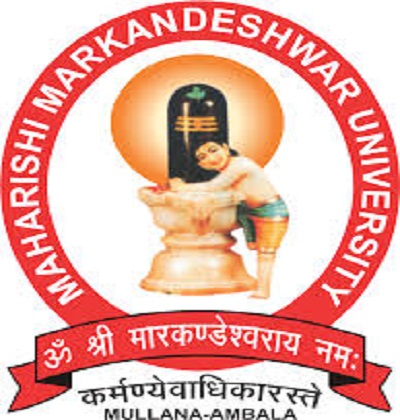
MMU Deemed University
Top Demanding University
All You Need to Know
Need Support?
If Student want to more information and support mail us at info@shikshaview.com
Check Blogs
You can our blogs at https://blog.shikshaview.com/
Ask in Comments
If require some book references, links, download , notes, lectures then leave a comment in this section
Student Review About Shiksha View
Student’s are getting True College Information !—with Correct Fee Structure!—and, eagerly counsel by our Subject Experts!
Search
FAQ's
Expert Advise
Satisfaction & Admission
Get in Touch With us
Maintenance Page
There are many variations of passages of Lorem Ipsum available, but the majority have suffered alteration in some form,
by injected humour, or randomised words which don’t look even slightly believable.
Under Construction
There are many variations of passages of Lorem Ipsum available, but the majority have suffered alteration in some form, by injected humour
Why should i here?
There are many variations of passages of Lorem Ipsum available, but the majority have suffered alteration in some form, by injected humour
Get in touch with us
There are many variations of passages of Lorem Ipsum available, but the majority have suffered alteration in some form, by injected humour
Give us a message

JEE Advanced
JEE Advanced is conducted every year by one of the seven Indian Institutes of Technology (IITs) namely IIT Kharagpur, IIT Kanpur, IIT Madras, IIT Delhi, IIT Bombay, IIT Guwahati, and IIT Roorkee or Indian Institute of Science (IISc) Bangalore under the aegis of the Joint Admission Board (JAB). Admissions to Bachelor’s, Integrated Master’s and Dual Degree programs (entry at the 10+2 level) in all the 23 IITs, including the Indian School of Mines (ISM) are done based on ranks obtained by candidates in JEE Advanced.
Through JEE Advanced, candidates can secure admissions to the following courses:
- 4-year Bachelors – BTech, BS
- 5-year BArch
- 5-year Dual Degree – BTech, MTech, BS, MS
- 5-year Integrated Masters – MTech, MSc, Dual Degree
JEE Advanced 2020
- The number of candidates to be eligible for JEE Advanced 2020 has gone up to 2,50,000 as per the decision by JAB
- Another key decision is to hold the JEE Advanced exam in the United States for the first time. A JEE Advanced examination center will be set up in the San Francisco area to serve this purpose.
The entrance test will be held in two shifts: 9 am to 12 noon and 2:30 pm to 5:30 pm. Candidates have to register themselves online for the computer-based entrance test. There will be two mandatory papers based on a predefined JEE Advanced syllabus released by the conducting authorities.
The JEE Advanced 2020 admit cards release date has also been postponed and new dates will be announced later. Admissions to the IITs will be through the counseling conducted by the Joint Seat Allocation Authority (JoSAA) based on ranks obtained by candidates in JEE Advanced.
JEE Advanced 2020 Important Dates
| Events | Dates | Salient Features |
|---|---|---|
| Application form availability | To be announced | Candidates can apply for the exam online. |
| Fee payment last date | To be announced | Fee can be paid through credit card, debit card or net banking. |
| Admit card release date | To be announced | The eligible candidates will download their admit card. |
| JEE Advanced 2020 | 23-Aug-2020 | IIT Delhi will conduct the exam. |
| Response copy availability | To be announced | Candidates will be able to check their response copy. |
| Provisional answer key release date | To be announced | Candidates can download provisional answer key to match their response. |
| Challenge answer key | To be announced | Raise objection (if any) against provisional answer key. |
| Final answer key available | To be announced | IIT Delhi will release the final answer key. |
| Result declaration | To be announced | The result will release in online mode only. |
| Online registration for Architecture Aptitude Test | To be announced | Register for AAT in online mode. |
| Architecture Aptitude Test | To be announced | Appear in the exam. |
| Declaration of AAT result | To be announced | Candidates will be able to check their result online. |
| Start of seat allocation process (tentative) | To be announced | The seat allocation process will start for eligible candidates only. |
Colleges Accepting JEE Advanced 2020 Score
Take a look at some of the popular engineering colleges in India including IITs & ISM that accept JEE Advanced score for admissions.
| S. No. | Institutes Name |
|---|---|
| 1. | Indian Institute of Technology, Kharagpur |
| 2. | Indian Institute of Technology, Kanpur |
| 3. | Indian Institute of Technology, Roorkee |
| 4. | Galgotias University |
| 5. | Indian Institute of Technology, Bombay |
| 6. | Indian Institute of Technology, Madras |
| 7. | Indian Institute of Space Science and Technology |
| 8. | Presidency University, Bangalore |
Important FAQs on JEE Advanced 2020
Q. I appeared in class 12 examination for the first time in 2019. Am I eligible to appear for JEE Advanced 2020?
A. Yes, you are eligible to appear for JEE Advanced 2020, provided you comply with the set eligibility norms for the exam.
Q. I appeared in class 12 examination for the first time in 2018 and my exam results were declared by June 2018. I appeared for JEE Advanced 2018 but did not appear in JEE Advanced 2019. Am I eligible to appear for JEE Advanced 2020?
A. No, you are not eligible to appear for JEE Advanced 2020.
Q. I appeared in class 12 examination for the first time in 2018. My exam results were declared after June 2018. Am I eligible to appear for JEE Advanced 2020?
A. Yes, you are eligible to appear for JEE Advanced 2020, provided you comply with the set eligibility norms for the exam.
Q. I appeared in class 12 examination for the first time in 2018. My exam results were declared before the end of June 2018 but, my result was withheld and was declared after June 2018. Am I eligible to appear for JEE Advanced 2020?
A. No, you are not eligible to appear for JEE Advanced 2020
Search Courses
Plan a Visit
Universities of the Week
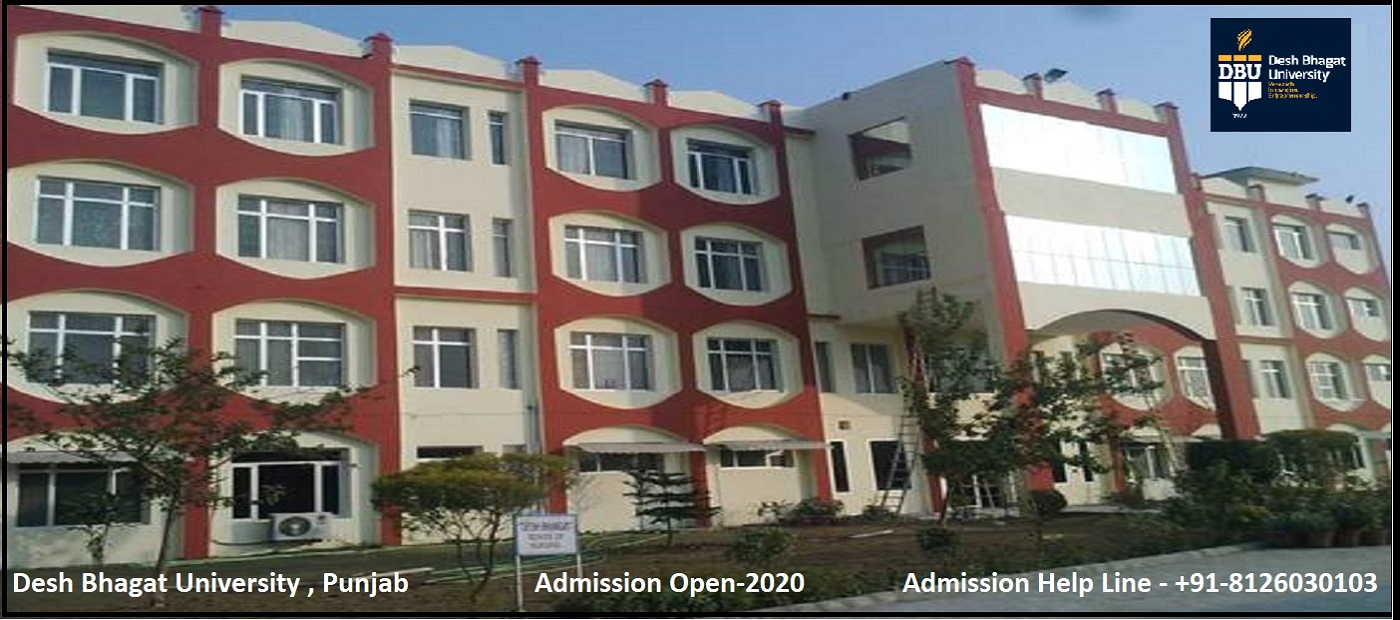

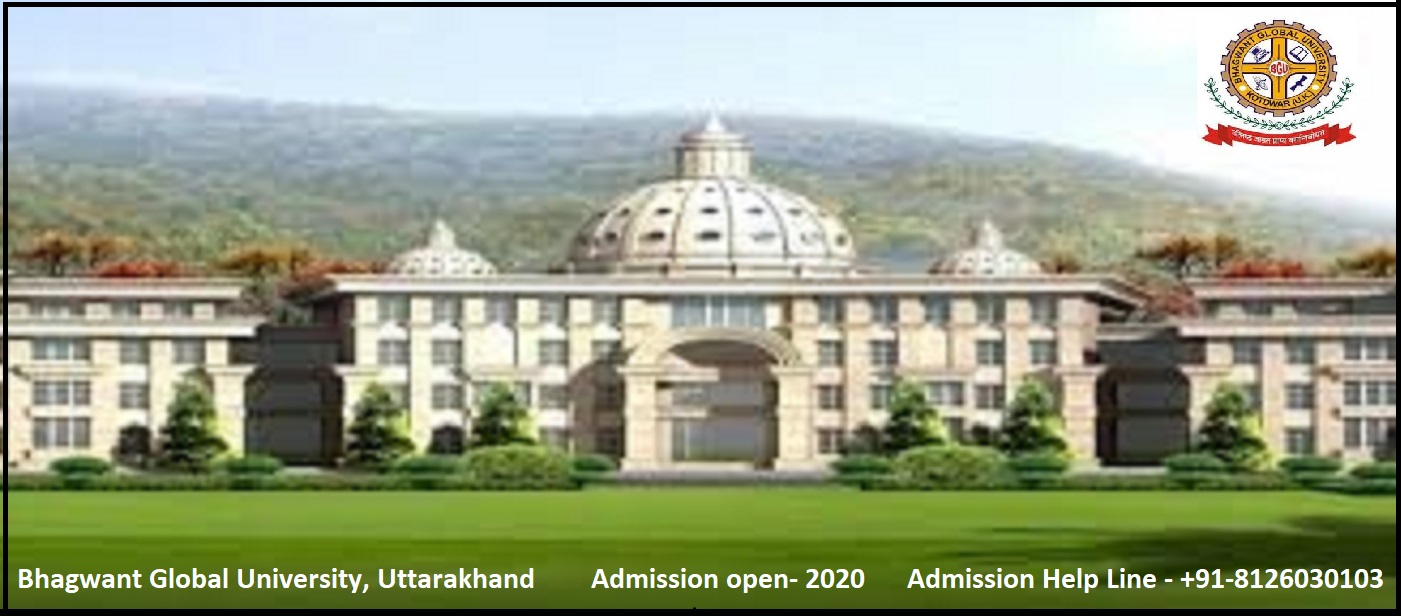
Why join the Shiksha View
Authorized Educational Counselling Agency of Best Reputed Colleges and Universities in India.
Direct Admission in best Colleges & Universities, Pay fees direct to college admission section
Highly qualified, competent and deeply dedicated group of counselor/instructor
Encourage students and Parents to meet personally & have answers to all their queries
We have charged a very low processing fees in a very rear instaces.
Today’s Popular Courses
B.Tech Computer Science & Engineering
Top DemandedB.Tech Electronics & Communication Engineering
₹96000/- per YearB.Tech Electrical Engineering Course
₹96000/- per yearB.Tech Civil Engineering Course
₹96000/- per yearB.Tech Mechanical Engineering
₹80000/- Per YearBMRIT – Bachelor of Medical Radiology
₹60000/- Per YearB.Sc OT – B.Sc in Operation Theatre
₹70000/- Per YearBMLT – Bachelor in Medical Lab Technology
₹60000/- Per YearBPT – Bachelor of Physiotherapy
₹70000/- Per YearGNM-General Nursing and Midwifery
₹65000/- Per YearB.Sc Nursing – Bachelor of Science in Nursing
₹80000/- Per YearP.B.Sc – Post Basic B.Sc Nursing
₹70000/- Per YearANM – Auxiliary Nursing Midwifery
₹65000/- Per YearBAMS-Bachelor of Ayurvedic Medicine & Surgery
₹250000/- Per YearNursing Degree & Diploma Courses
₹65000/- per yearMedical Degree & Diploma Courses
Top DemandedParamedical Degree & Diploma Courses
₹60000/- per yearEngineering Degree & Diploma Courses
Top DemandedTop Demanding Universities

HIMALAYIAYA UNIVERSITY DEHRADUN UTTARAKHAND
Best University in Uttarakhand

Desh Bhagat University
Top Demanded University

Graphic Era University
Top Demanded University

Bhagwant Global University
Most Leading University in State
Admission Process
Step 04
Take Admission in Best college
Get Admission in the suitable college by paying registration amount at the college account/shiksha view account.
Upcoming Events
Student Got Counselling
Courses Available
Colleges Available
Got Admissions
Featured Courses
- Top Demanded
B.Tech Computer Science & Engineering
- ₹96000/- per Year
B.Tech Electronics & Communication Engineering
- ₹96000/- per year
B.Tech Electrical Engineering Course
- ₹96000/- per year
B.Tech Civil Engineering Course

Some Great Features of LMS theme
Quisque porta, elit sed lacinia rutrum, nulla velit scelerisque sem, convallis molestie ante justo eget erat
Lorem ipsum dolor sit amet, consectetur adipiscing elit maecenas quis
Lorem ipsum dolor sit amet, consectetur adipiscing elit maecenas quis
Lorem ipsum dolor sit amet, consectetur adipiscing elit maecenas quis
Lorem ipsum dolor sit amet, consectetur adipiscing elit maecenas quis
Expert Teachers

HIMALAYIAYA UNIVERSITY DEHRADUN UTTARAKHAND
Best University in Uttarakhand

Desh Bhagat University
Top Demanded University

Graphic Era University
Top Demanded University

Bhagwant Global University
Most Leading University in State
Our Gallery
Give us a message
Contact Info
The Design Themes Inc.
Mary Jane St, Sydney 2233 Australia.
+1 100 458 2345
Admission Process
Step 05
Get Admission in the suitable college by paying registration amount at the college account/shiksha view account.

Courses Search
Search Courses
Our Popular Courses
B.Tech Computer Science & Engineering
Top DemandedB.Tech Electronics & Communication Engineering
₹96000/- per YearB.Tech Electrical Engineering Course
₹96000/- per yearB.Tech Civil Engineering Course
₹96000/- per yearB.Tech Mechanical Engineering
₹80000/- Per YearBMRIT – Bachelor of Medical Radiology
₹60000/- Per YearB.Sc OT – B.Sc in Operation Theatre
₹70000/- Per YearBMLT – Bachelor in Medical Lab Technology
₹60000/- Per YearBPT – Bachelor of Physiotherapy
₹70000/- Per YearGNM-General Nursing and Midwifery
₹65000/- Per YearB.Sc Nursing – Bachelor of Science in Nursing
₹80000/- Per YearP.B.Sc – Post Basic B.Sc Nursing
₹70000/- Per YearANM – Auxiliary Nursing Midwifery
₹65000/- Per YearBAMS-Bachelor of Ayurvedic Medicine & Surgery
₹250000/- Per YearNursing Degree & Diploma Courses
₹65000/- per yearMedical Degree & Diploma Courses
Top DemandedParamedical Degree & Diploma Courses
₹60000/- per yearEngineering Degree & Diploma Courses
Top DemandedOur Process
Step 01
Search for your course
Nemo enim ipsam voluptatem quia voluptas sit atur aut odit aut fugit, sed quia consequuntur magni res.
Step 02
Take a Sample Lesson
Nemo enim ipsam voluptatem quia voluptas sit atur aut odit aut fugit, sed quia consequuntur magni res.
Step 03
Preview the Syllabus
Nemo enim ipsam voluptatem quia voluptas sit atur aut odit aut fugit, sed quia consequuntur magni res.
Step 04
Purchase the Course
Nemo enim ipsam voluptatem quia voluptas sit atur aut odit aut fugit, sed quia consequuntur magni res.
Powerful Learning Management System WordPress Theme!
Awesome features for creating online courses, teacher profile, extended user profiles, lesson management, quiz system, video hosting, ranking system, question system, attachments, course progress, etc.,
Theme Features
Enhanced Page Builder
Tailored page builder with extra advanced functionalities and organised clean skin.
Portfolio & Blog Layouts
Portfolio and blog layouts with lot of custom options
4 Different Menus
4 different types of menus are available.
Advanced Grid System
Powerful grid system with equal height ans spacing preset.
Tons of settings
Buddha panel comes with lot of custom options.
Adaptive Images
Automatically adopt and set your images for best quality on devices and resolution.
Cutting Edge Design
Comes with pixel perfect and clean design to satisfy any possible needs.
Built For Performance
Coded with speed and performance always in mind.
Responsive
Theme looks good even if you are viewing it from a Smartphone or Tablet.
Mega Menu
Theme looks good even if you are viewing it from a Smartphone or Tablet.
Typography
You can change the typography easily from our powerful theme options panel.
Retina Ready
Theme is retina ready, means that it will always look beautiful on any display.
Dummy Content
Comes with powerful dummy content importer.
Parallax Sections
Section with background image can be easily animated as parallax effect, with just click of a button.
Unlimited Colors
Theme comes with lot of color combinations.

A ‘single click’ will make your work a lot less!
For both Default Courses & Sensei Courses
Theme comes with separate importer for both ‘Default Demo’ and ‘Sensei Demo’. You can easily access this importer from ‘Buddha Panel’. Please be patient if you are importing whole site it may take several minutes.
Try The Live DemoUnlimited Layout Options
Create various layouts with a variety of options provided in LMS theme just with a single click by choosing the options provided.

Full Width

Boxed

Left Sidebar

Right Sidebar

Both Sidebar

Create pages quicker with our advanced Page Builder
New & Improved with lots of extra features…
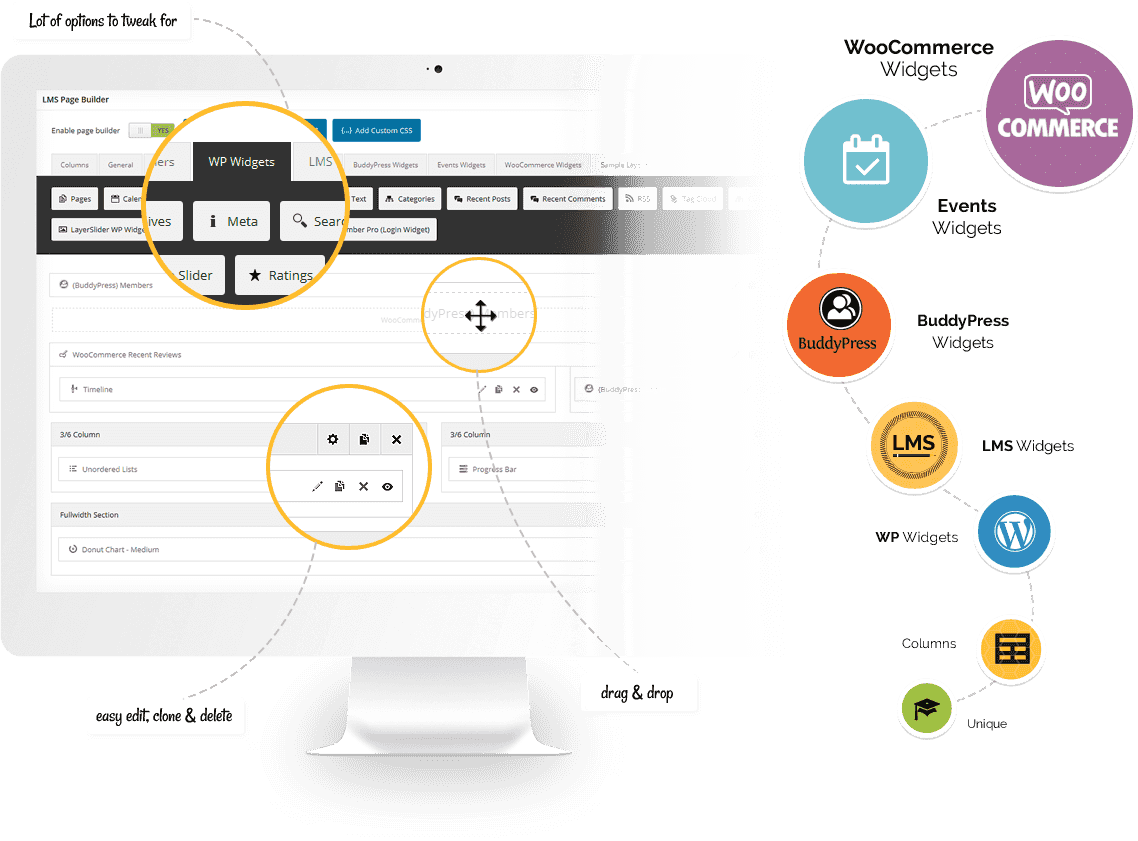
Default Course

s2Member Pro Support

Customize s2Member Levels

Course With Media Attachments

Course Curriculum Sidebar

Quiz – Auto & Manual Evaluation

Certificates & Badges

Graphical Analysis

Assign Course Manually

Search Course Option
Sensei Course

WooCommerce Plugin Support

Fully Customizable Course

Course With Modules

Quiz – Auto & Manual Evaluation

Sensei Addons Support

Course Analytics

Learner Management

Student & Staff Communication

Email Notifications
Supported Plugins
LMS theme works well with the plugins that are listed below.

Supports Sensei Plugin
Teaching coursework has never been easier all within WordPress. With Sensei plugin you can create course, write lessons and add quizzes. Set lesson and course pre-requisites, allow user registration.
Layer Slider and Revolution Slider
Both the layer slider and revolution slider latest versions are packed with the theme. Bot the sliders have lot of inbuilt options like visual editor, responsive design, thumbnail navigation, import / export,….


s2Member Free & Pro
Theme default courses works with s2Member for payment and user managements. Theme supports s2Member pro version also with lot of customization options.
Contact Form 7
Theme uses powerful Contact Form 7 plugin. It will help you in creating forms with all possible fields.


Events Calendar Free & Pro
Create and manage events with ease. Events Calendar Pro offers whole host of event management features including recurring events, custom event attributes, saved venues, organizers and lot more.
Responsive Styled Google Maps
Easily display a responsive Google Map (classic map or black&white map) using an incredibly easy shortcode.


WooCommerce
Create online shop for your website with WooCommerce plugin which has lot of special features.
WPML
LMS loaded with WPML compatibility. You can create your site in multiple languages.


BuddyPress
BuddyPress is a powerful suite of social networking components, made the WordPress way, to help you build flexible and robust community.
Superb Customer Support
Free & fast support with dedicated support team online 16/7.
YouTube Help videos
YouTube videos to help you in setting up your site with clear instructions.
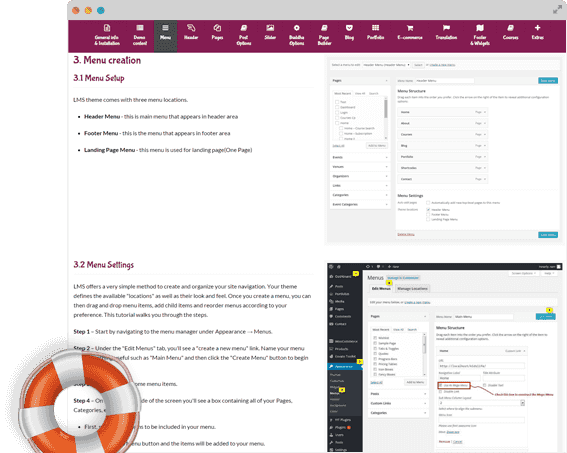
Top Quality Documentation
LMS theme comes with thorough documentation where each section of theme and its features are described in easy way to understand, it also comes with lot of screenshot to help you. If documentation is not enough contact us on our support forum.
Theme Updates
LMS theme is constantly being updated with new features and updates of the plugin that are included in the package. If you have any suggestion for next update let us know.
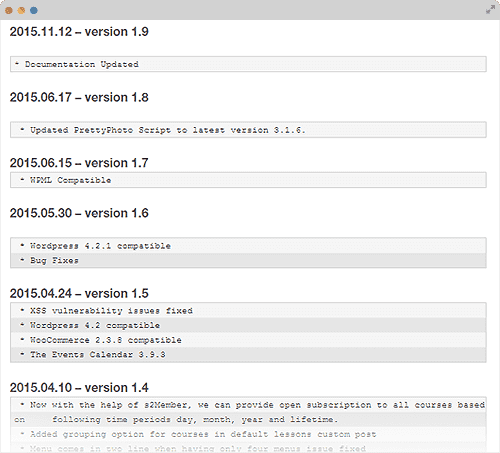
What people are saying
Client Testimonials
No fake reviews here, only selection of latest one we received.
"I would say this best theme for lms purposes, and the best i have get for this theme. Thanks a lot
"
"Speedy, understanding and very accommodating. Great theme with even better support.
"
"One of the best themes I’ve ever purchased. Beautiful design, functional, lots of customization possibilities, quick support.
"
"Complexity made easy. This is by far the best theme I worked with. Awesome. Well… support is outstanding, too.
"
"The design is better than anything I’ve seen in the learning portal space for sure. I hit a bit of a snag in installing the demo content. Ramamoorthi was a big help within 12 hours. Excellent theme and awesome support!
"
"The design is better than anything I’ve seen in the learning portal space for sure. I hit a bit of a snag in installing the demo content. Ramamoorthi was a big help within 12 hours. Excellent theme and awesome support!
"
"Awesome support and very fast too. had a great experience from these guys and with the theme too. Thanks
"
"Quickly and very good support. This is very important.
"
"This is an amazing WordPress design. I bought it to integrate Wp-Courseware or Sensei and found the LMS included with the theme was far superior than both of these costly plugins. This theme is gorgeous, the support has been wonderful with less than a 24 hour response time and unlike many stand alone plugins the LMS theme integrates payments using my beloved S2member along with some really nice advanced courseware features I did not expect to see included. My only hope is that the developer will include the ability to set an automatic EOT time for purchased courses. The default is to have the user have access for life, but I would really like to have this automatically timeout after certain intervals. This is one of the big problems with the themes payment structure but I am confident the developers will find a solution. P.S WP-Courseware does not work with this theme.
"
NEET UG Counselling 2019: Dates, Schedule, Registration Process, Seat Matrix, Merit List
National Eligibility cum Entrance Test is a single medical entrance test for the candidates seeking admission in MBBS/ BDS courses offered by various medical colleges of the country.
NEET Counselling 2019 was conducted by the Medical Counselling Committee. The counselling for NEET 2019 was done to fill the 15% All India Quota Seats. The remaining 85% seats was filled by NEET State Counselling 2019.
There were two rounds of Counselling, Round 1 and 2. First Round registration process was from 19th to 26th June 2019. Also, the NEET First Round Counselling Result announced by the exam convening authority on 01st July 2019.
The NEET Second Round counselling was from 11th to 13th July 2019 and result for the same was announced on 18th July 2019.
After NEET Counselling 2019, remaining vacant seats will be transferred to the deemed universities for final mop- up round for NEET UG 2019.
The candidates can check here the complete details about NEET 2019 Counselling and Seat Allotment. Let’s have a look.
Candidates can check the official results from the table given below.
NEET Counselling 2019 Dates- Marks the Important Dates Here!
NEET 2019 Counselling dates for 15% All India Quota is announced by the Medical Counselling Committee (MCC) after the declaration of NEET Results and Cut Off Marks. The counselling for NEET 2019 is conducted through online mode. Check out the NEET Counselling Dates 2019 in the below table.
Note: The dates for Mop Up Round of UG Counselling has been revised. Candidates can check the updated dates below in the table.
| S.No. | Counselling Events | NEET UG 2019 Counselling Dates |
| 1. | Registration/Payment & Choice Filling- Round 1 | 19th to 26th June 2019 |
| 2. | NEET Seat Allotment 2019 Process- Round 1 | 27th to 30th June 2019 |
| 3. | Declaration of NEET Seat Allotment Round 1 Result | 01st July 2019 |
| 4. | Reporting at the allotted Medical/Dental College against Round 1 | 03rd to 08th July 2019 |
| 5. | Registration/Payment & Choice Filling- Round 2 | 11th to 13th July 2019 |
| 6. | NEET Seat Allotment 2019 Process- Round 2 | 15th to 17th July 2019 |
| 7. | Declaration of NEET Seat Allotment List for Round 2 | 17th July 2019 (Declared) |
| 8. | Reporting at the allotted Medical/Dental College against Round 2 | 18th to 25th July 2019 |
| 9. | Registration/Payment & Choice Filling- Mop Up Round | 13th to 18th August 2019 |
| 10. | NEET Seat Allotment 2019 Process- Mop Up Round | 19th to 20th August 2019 |
| 11. | Declaration of NEET Seat Allotment List for Mop Up Round | 20th August 2019 |
| 12. | Reporting at the allotted Medical/Dental College against Mop Up Round | 21st to 26th August 2019 |
NEET UG Counselling 2019 Schedule
NEET Seat Allotment 2019
| Event | Date | Link |
| Round 1 Result | 1st July 2019 | Check here |
| Round 2 Result | 17th July 2019 | Check here |
| Provisional Mop-Up Round Result | 19th Aug 2019 | Check Here |
| Final Result 1st Mop-Up Round | 20th August 2019 | Check Here |
| Final Result 2nd Mop-Up Round | 06th September 2019 | Check Here |
Official 2019 NEET Seat Matrix by NTA Official
| Seats | Link Here |
| ESIC Seats | Click Here |
| Deemed Universities Seats (Dental) | Click Here |
| Deemed Universities Seats (Medical) | Click Here |
| Central Universities Seats (Dental) | Click Here |
| Central Universities Seats (Medical) | Click Here |
| All India Quota Seats (Dental) | Click Here |
| All India Quota Seats (Medical) | Click Here |
NEET 2019 Counselling Procedure- Complete Steps to get Admission in Medical College!
Below, we have mentioned the complete step by step procedure to apply for NEET 2019 Counselling and Seat Allotment Process. Read further to know about these steps.
1. NEET Counselling Registration 2019
To apply for NEET Counselling Registration 2019, the candidates are required to visit the MCC official website after successfully qualifying in the Exam and NEET Merit List. Below are the steps to apply for the Registration for Counselling 2019.
- Visit the official website for details of counselling and then click on ‘New Registration Link’.
- Enter the required details: Roll Number, Application Number, Candidate’s Name, Date of Birth etc.
- Choose a password and make sure you remember it, as it will be required during the NEET Seat Allotment 2019.
- Click on Submit button.
- Now, the candidates will be required to enter the One Time Password (OTP) to complete NEET 2019 Counselling Process. The OTP will be sent to the registered mobile number during NEET 2019 Online Application.
- After checking all the details, finally click on the ‘Confirm Registration’ button.
2. Choice Filling and Locking
In this step, the candidates are required to fill the choices of courses and colleges according to the preference. For this, the candidates need to follow the below- mentioned steps.
- After NEET 2019 Counselling Registration, candidates need to log in using their Login ID and Password.
- After logging in, candidates can submit their choices, modify or delete them, and change their order as required during Registration and Choice Filling period.
- Filled choices can also be swapped by interchanging positions.
- After locking choices, no more submission will be possible.
- Candidates are advised to take a print out of locked choices for future use.
3. NEET Mock Counselling 2019
There is also an option of NEET Mock Counselling for the candidates to get an idea of the seats they will be allotted based on their choices and rank.
Mock Counselling NEET 2019 helps candidates to refine their selection of choices and candidates can modify their choices as the placement during that period is not binding.
4. Reporting to the Allotted College
To confirm the seats, the candidates will have to report the allotted college and will have to pay the initial fee requires to get admission. Then, they should complete the admission formalities.
In case, the candidate will reach the allotted college after the given time limit, then his / her seat will be automatically allotted to next candidate.
5. NEET Second Round Counselling
In case, any candidate won’t get satisfied with the allotted seats, can go for the second round of NEET Counselling. Candidates who will be allotted in the second round of NEET counselling from 15% All India Quota are not allowed to leave the seat vacant.
The NEET Second Round Counselling Result can be checked by the candidates either individually by entering their roll numbers, or by cross-checking their All India Rank status from an open, detailed list.
The candidates falling under the given categories are eligible for NEET 2019 Second Counselling.
Group 1: Candidates who have registered themselves but did not get allotted any seats in the first round.
Group 2:Registered candidates from the reserved category, whose admission got canceled due to change of category i.e., he/she was shown as unreserved category candidates in their documents.
Or if the candidate’s physically handicapped status went from yes to no or from PH-1 to PH-2. These candidates will be considered for seat allotment based on their changed category.
Group 3:Candidates who chose to participate in the second round of counselling while reporting at the allotted university after the first round of counselling.
The following candidates will not be eligible for the NEET Second Round Counselling.
The candidates who do not attend NEET First Round Counselling will not be allowed for the second round as well.
The candidates who reported for admission in the allotted college after the first round but withdrew, will not be eligible.
If the candidate fails to submit his/her fresh choices in NEET Second Round Counselling, then he/ she will be disqualified.
Documents Required for NEET Counselling 2019 Process
Below is the list of documents required at the time of NEET Counselling 2019. Candidates will have to carry their original documents along with the attested photocopies during the Counselling process.
- 10th and 12th Class Mark Sheets.
- 10th and 12th Class Passing Certificate.
- Birth Certificate.
- NEET Rank Letter
- Eight Passport size photographs similar to that affixed on the online application form.
- Caste Certificate (If applicable).
- NEET 2019 Admit Card
- PWD Certificate (If applicable).
- Counselling Letter issued by the NEET Authority.
Read Also :
NEET Application – Correction Window
NEET Study Material – Free Download PDF Notes
Neet Reservation For OBC-EWS-SC-ST-General
NEET Chemistry Chapter Wise Weightage
NEET Chapter Wise Weightage of Physics, Chemistry and Biology
NEET Chemistry Important Topic with Chapter Wise Weightage

Apply Now
Our Popular Courses
- Top Demanded
B.Tech Computer Science & Engineering
- ₹96000/- per Year
B.Tech Electronics & Communication Engineering
- ₹96000/- per year
B.Tech Electrical Engineering Course
- ₹96000/- per year
B.Tech Civil Engineering Course
- ₹80000/- Per Year
B.Tech Mechanical Engineering
- ₹60000/- Per Year
BMRIT – Bachelor of Medical Radiology
Top Examinations
NEET Counselling Process
| NEET UG Counselling Process – 2023 | NEET UG Counselling Process – 2022 | NEET UG Counselling Process – 2021 | NEET UG Counselling Process – 2020 | NEET UG Counselling Process – 2019 |
Read Also :
NEET Application – Correction Window
NEET Study Material – Free Download PDF Notes
Neet Reservation For OBC-EWS-SC-ST-General
NEET Chemistry Chapter Wise Weightage
NEET Chapter Wise Weightage of Physics, Chemistry and Biology
NEET Chemistry Important Topic with Chapter Wise Weightage

Apply Now
Our Popular Courses
- Top Demanded
B.Tech Computer Science & Engineering
- ₹96000/- per Year
B.Tech Electronics & Communication Engineering
- ₹96000/- per year
B.Tech Electrical Engineering Course
- ₹96000/- per year
B.Tech Civil Engineering Course
- ₹80000/- Per Year
B.Tech Mechanical Engineering
- ₹60000/- Per Year
BMRIT – Bachelor of Medical Radiology
Top Examinations
Uttarancal (PG) Bio-Medical Sciences is a Top Ranked paramedical College in North India. UBMSH provides hands on practical knowledge to the students.
The Guru Nanak Dev Education Society was established in 2003. It aims to impart quality education to the society. The Uttaranchal College of BioMedical Sciences and Hospital operates under this society. It aims to provide medical education. It offers a wide variety of infrastructure facilities to the students.
The college provides various undergraduate, postgraduate, and diploma courses in the field of paramedical, nursing, science, and agro science. UCBMSH admission is based on merit.
Read More >>

Apply Now
Dev Bhoomi Group of Institutions (DBGI), Dehradun , has been providing education for 15 years. The institute has a placement rate of 73% over 5 years. DBGI Dehradun offers undergraduate, postgraduate and diploma courses in the discipline of Engineering, Science, Management, Agriculture etc.
DBGI awarded “Best Placement and Academics” by MHRD Minister and awarded “Best Placement Engineering in Education Excellence” in Uttarakhand.
Established in 2005, Dev Bhoomi Institute of Technology (DBIT), Dehradun is a leading Private Un-Aided college based in Dehradun.The college is popularly known as DBIT Dehradun among the students.The college, affiliated to Uttrakhand Technical University, Dehradun , is widely recognized for its academic standards. Dev Bhoomi.
Institute of Technology (DBIT), Dehradun takes a holistic view of education and focuses on both, academic as well as personality development of the students. The qualified and experienced faculty at DBIT Dehradun along with the carefully designed and updated curriculum ensure that the students receive the best education and skills which can help them emerge as qualified professionals.In order to provide students with quality academic environment, the college has developed all the necessary infrastructural facilities. The key among them are Hostel, Library, Laboratory, Playground, Canteen, Gym, Medical Help, Education loan, Auditorium, Scholarship.
Dev Bhoomi Group of Institutions, Dehradun Highlights:
Highlights of the College like the year of establishment, founder, type of institution, infrastructure, address, courses are mentioned below.
| Year of DBGI Establishment | 2005 |
| Type of DBGI Institution | Private |
| DBGI Founder | Mr. Sanjay Bansal |
| DBGI Offered Courses | Engineering, Computer Application, Architecture, Design [B.Des], Management, Commerce, Hotel Management, Mass Communication, BAMS, Fashion Designing, Agriculture, Polytechnic, Horticulture, Microbiology, Nursing, and Pharmacy. etc. |
| DBGI Approvals | All India Council for Technical Education [AICTE], Indian Nursing council [INC], Pharmacy Council of India [PCI], Medical Council of India [MCI], Central Council of Indian Medicine [CCIM], Council of Architecture [COA] |
| DBGI Affiliations | Uttrakhand Technical University [UTU], Sri Dev Suman Uttarakhand University [SDSUU], Uttarakhand Board of Technical Education [UBTER], H. N. B. Uttarakhand Medical Education University, Uttarakhand Ayurved University [UAU], |
| DBGI Institute in Dehradun | Dev Bhoomi Institute of Technology [DBIT], Dev Bhoomi Schools of Business Management [DBSBM], Dev Bhoomi Institute of Management Studies [DBIMS], Dev Bhoomi Institute of Pharmacy and Research [DBIPR], Dev Bhoomi Institute of Polytechnic [DBIP], Dev Bhoomi School of Architecture & Design [DBSAD], Dev Bhoomi Medical College of Ayurveda and Hospital [DBMCAH] |
| DBGI Institute in Saharanpur | Dev Bhoomi Group of Institutions Saharanpur [DBGI], Dev Bhoomi School of Professional Studies Saharanpur [DBSPS], Dev Bhoomi Institute of Polytechnic Saharanpur [DBIP], Dev Bhoomi Institute of Pharmacy Saharanpur [DBIP]. |
| DBGI Institute in Kurukshetra | Sri Krishnan Institute of Engineering & Technology Kurukshetra [SKIET], Sri Krishnan Polytechnic [SKP] |
| DBGI Academic Collaborations | Oracle Academy, EMC Academic Alliance, AWS Educate, Paloalto, National Digital Library, National Academics Depository, NPTEL etc. |
| DBGI Infrastructure | 42 acres campus area, library, Smart classrooms, ATM, Computer labs, Hostel, Laboratory, Playground, Canteen, Gym, Auditorium etc |
| DBGI Facilities | Digital library, Sports, Medical Help, Banking, Education Loan, Scholarship, Placement, Seminars, Workshops etc |
| DBGI Placement | ACCENTURE, Aon Hewitt, Atos, Bank of America, Bosch Ltd, Cognizant, Dell, HCL, HealthKart.Com, IBM, ICICI, Indian Navy, Infosys, Jaro Education, L&T Infotech, Ranbaxy, Tech Mahindra, Tommy Hilfiger, Wipro, Zycus |
| DBGI Awards | > Awarded “National Environment Exhibition Award” by the Ministry of Earth Science. > Awarded “Uttarakhand Ratan Award for Best Academics and Employability”. > Ranked 7th in North India by The Week. > Appreciation Memento Presented by Head Start IBM Business Partner for Excellent Support in Placement. > Certification of the association presented by Aspiring minds for employability assessment support. |
| Address | Chakrata Road Navgaon, Manduwala, Dehradun, Uttarakhand, India – 248007 |
| Contact | +91-8126030103 |
| Read More >> |
Dev Bhoomi Group of Institutions Courses
DBGI Dehradun offers UG, PG and Diploma Courses in the discipline of Engineering, Science, Management, etc. Tabulated below are the details for the same:
| Course | Specialization | Eligibility |
|---|---|---|
| B.Tech | Civil Engineering, Mechanical Engineering, Computer Science & Engineering, Electronics & Communication Engineering, Electrical & Electronics Engineering |
10+2 with PCM from a recognized university Obtained a valid score in JEE Main |
| B.Tech (Lateral Entry) |
Civil Engineering, Mechanical Engineering, Computer Science & Engineering, Electronics & Communication Engineering Electrical & Electronics Engineering |
Diploma in Engineering |
| B.Sc | Information Technology Forestry Agriculture Electrical Horticulture Food Technology Physics/Chemistry/Maths Chemistry/Botany/Zoology Microbiology Nursing |
10+2 in any stream |
| B.Com | Commerce | 10+2 with Commerce stream |
| B.Com (Hons.) | Commerce | 10+2 with Commerce stream |
| B.Pharm | Pharmacy | 10+2 with Physics, Chemistry and Biology from a recognized board |
| B.Pharm (Lateral Entry) | Pharmacy | Diploma in Pharmacy |
| B.Arch | Architecture | 10+2 in any stream Obtained a valid score in NATA/ JEE Mains |
| BAMS | Ayurvedic Medicine & Surgery | 10+2 passed with Science and Biology as a compulsory subject |
| BCA | Computer Applications | 10+2 in any stream |
| BBA | Hotel Management | 10+2 in any stream |
| B.Des | Design | 10+2 in any stream |
| BJMC | Mass Communication & Journalism | 10+2 in any stream |
| BHA | Hotel Administration | 10+2 in any stream |
| BA | Tourism | 10+2 in any stream |
| D.Pharm | Pharmacy | 10+2 with PCB or Math |
| Diploma | Mechanical Engineering, Civil Engineering, Electrical Engineering, Electronics Engineering, Computer Science Engineering, Automobile Engineering |
10th with a minimum of 35% aggregate marks |
| Diploma (Lateral Entry) | Mechanical Engineering, Civil Engineering, Electrical Engineering, Electronics Engineering, Computer Science Engineering, Automobile Engineering |
10+2 With PCM/ ITI |
| M.Pharm | Pharmacology Pharmaceutics |
B.Pharm or equivalent degree with 50% |
| MCA | Computer Applications | Graduate with Maths as one of the subjects |
| MCA (Lateral Entry) | Computer Applications | BCA or B.Sc degree with Mathematics |
| MBA | Marketing Finance Information Technology Retail |
Graduate with a minimum 50% aggregate marks Obtained a valid score in CAT/ MAT |
| M.Tech | Computer Science Engineering Mechanical Engineering Electrical & Electronics Engineering Electronics & Communication Engineering Civil Engineering |
B.Tech/ MCA/ M.Sc. in the relevant stream |
| M.Sc | Agronomy Physics |
B.Sc in the relevant discipline |
DBGI offering courses
Combined (PG) Institute of Mrdical Sciences & Research , Dehrdaun awarded as Center of Excellence in Paramedical & Nursing education in North India.
Combined (P.G.) Institute of Medical Sciences & Research is founded by J.J. Educational Institute educational society situated in Dehradun in Uttarakhand state of India. It is a self financing institute in Uttarakhand state attached with 450 bedded multi specialty indoor hospitals and it is affiliated to Hemwati Nandan Bahuguna Garhwal University. CIMSR, Dehradun offers 9 courses across 4 streams namely Nursing, Paramedical, Science, Medical and across 7 degrees like BSc, BPT, GNM, ANM, MSc. CIMSR campus is spread over 10000 Acres. Hostel facility is not available for its students. The institute has become a center of excellence in Paramedical & Nursing education in North India.

Apply Now
📢 NTA extended Online NEET (UG)-2020 Application Form for Correction in Candidate Particulars and Centre Cities
NTA conduct NEET-UG (National Eligibility-cum-Entrance Test), from 2019 onward which was being conducted by CBSC (Central Board of Secondary Education) till 2018,for medical courses such as MBBS, BDS, BAMS & BNYS programs. NTA declare the NEET results and provide the All India Rank to the Directorate General of Health Services at the Ministry of Health and Family Welfare to the conduct of counselling for 15% of All India Quota Seats and for supplying the result to state/other Counselling Authorities. NEET UG also replaces AIIMS (All India Institute of Medical Sciences, New Delhi) MBBS and JIPMER (Jawaharlal Institute of Postgraduate Medical Education & Research, Government of India). Thus NEET 2020 is the only medical entrance examination to apply for medical courses in the country (India).
In the reference of many requests being received from aspirants and parents of candidates for correction in NEET (UG)- 2020, On dated – 14th April 2020, the NTA has extended the date of making corrections in the Application Form including choice of cities for centre in the Online Application Form NEET UG 2020 up to 3rd May 2020.
Aspirant can verify their particulars and make necessary corrections wherever required in NEET online application form available on the website ntaneet.nic.in till 5:00 pm and The additional fee (if applicable) can be paid through Credit/Debit Card/ Net Banking/ PAYTM upto 11.50 PM of 3rd May 2020 The final updates will be reflected after the payment only (in case, additional fee payment is required for correction facility)
The NTA will make efforts to allot city of examination to the candidates in order of their choices now opted by them in the application form and the decision of the NTA regarding allotment of Centre shall be final.
The candidates and their parents are advised to keep visiting ntaneet.nic.in and www.nta.ac.in or shikshaview.com for latest updates. They are also being informed individually through their registered mobile number/ email-id.
The candidates can also contact at 8126030103 for any further clarification.
Also Read :
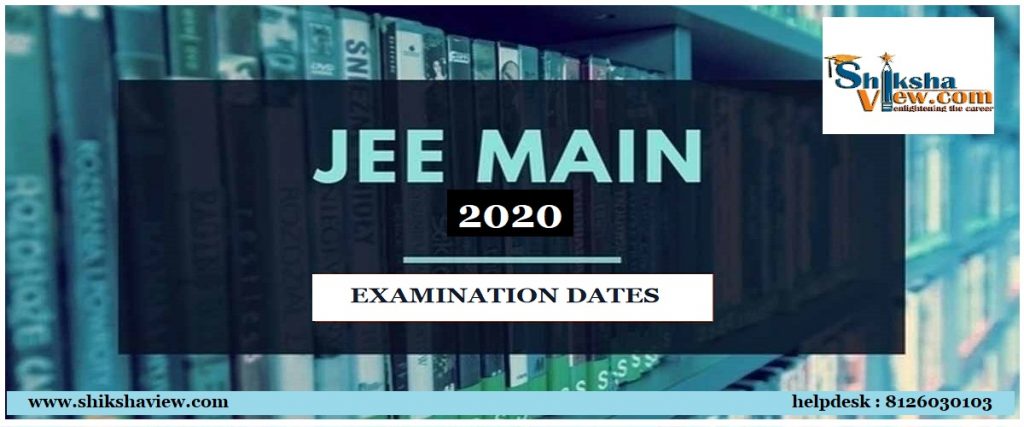
- JEE Main 2020 application dates: JEE Main application form for April session was available from February 7 to March 12 (extended). All registered candidates could pay their application fee through Credit/Debit Card/ Net Banking/UPI/Paytm till March 12.
- JEE Main 2020 admit card for the April exam will be available on the official website for download very soon.
- JEE Main 2020 exam dates: JEE Main 2020 April exam dates have been announced by the HRD Minister. The JEE Main April 2020 exam will be held from July 18-23. The JEE Main 2020 will be held for three papers: Paper-I for BTech courses, Paper-II will be for BArch and Paper-III will be for BPlanning.
- JEE Main 2020 results: The National Testing Agency (NTA) will announce the JEE Main results 2020 for the April session on the official website. The top 2.5 lakh JEE Main AIR rank holders will qualify for JEE Advanced 2020.
JEE Main 2020 – April Session Dates
| JEE Main 2020 Events | JEE Main 2020 Dates |
|---|---|
| JEE Main 2020 mock test | 10-Aug-2020 to 29-Dec-2019 |
| JEE Main 2020 application form availability | 07-Feb-2020 |
| Last date to apply for JEE Main 2020 and application fees | 12-Mar-2020 |
| Correction window | 1-Apr-2020 to 03-May-2020 |
| Last date for correction in exam centre | 03-May-2020 (05:00 pm) |
| JEE Main 2020 admit card for April session | To be declared soon |
| JEE Main April 2020 exam | 18-July-2020 to July 23-July-2020 (Announced) |
| Release date of answer key and recorded responses | To be notified soon |
| Release of JEE Main 2020 answer key | To be notified soon |
| Declaration of JEE Main 2020 result for April session | To be notified soon |
JEE Main 2020 – January Session Dates
| JEE Main 2020 Events | JEE Main 2020 Dates |
|---|---|
| JEE Main 2020 application form availability | 03-Sep-2019 |
| Last date to apply for JEE Main 2020 | 10-Oct-2019 |
| Registration for Test Practice Centres starts | 10-Oct-2019 to 29-Dec-2019 |
| Payment of Application Fee, uploading of signature and photograph | 11-Oct-2019 |
| JEE Main 2020 Application form correction window | 14-Oct-2020 to 20-Oct-2019 (11:50 pm) |
| Release of exam city for paper 1, 2 and 3 | Third week of October 2019 |
| JEE Main 2020 application form extended for J&K students | 04-Nov-2019 to 08-Nov-2019 |
| Issuance of JEE Main 2020 admit card | 06-Dec-2019 |
| JEE Main 2020 exam | 06-Jan-2020 to 11-Jan-2020 |
| Release of response sheet and question paper | 13-Jan-2020 to 15-Jan-2020 |
| JEE Main 2020 answer key release date for paper 1 | 17-Jan-2020 |
| JEE Main 2020 answer key release date for paper 2 | 23-Jan-2020 |
| Declaration of JEE Main 2020 result for January session | 31-Jan-2020 |
FAQs – JEE Main 2020
Q. When will the NTA release the JEE Main 2020 application form for April January session?
A. NTA has released the application form of JEE Main 2020 for April session for Paper 1 (BE/BTech), Paper 2 (BArch) and Paper 3 (BPlan) on February 7.
Q. When will the NTA conduct JEE Main 2020 April exam?
A. JEE Main 2020 April exam will be held from July 18-23.
Q. What is the last date to submit the application form of JEE Main 2020 for the April session?
A. The last date to submit JEE Main 2020 application form for the April session and submission of fees was March 12.
Q. When will the JEE Main 2020 admit card for April session release?
A. The JEE Main 2020 admit card for the second session will release soon by NTA.
Q. What are the counselling dates for JEE Main 2020?
A. Counselling date for JEE Main 2020 will be declared by JoSAA after the declaration of JEE Main 2020 result for April session.
Q. Has NTA re-opened JEE Main 2020 application form correction window?
A. Yes, NTA has started the JEE Main 2020 application correction facility again from April 1 to May 3.
GATE Exam
GATE is an online national level examination conducted for Master of Engineering (ME), Masters in Technology (MTech) and direct PhD admissions to Indian Institutes of Technology (IITs), National Institutes of Technology (NITs), Indian Institutes of Information Technology (IIITs) and other institutes/universities across India. The exam is jointly conducted by IIT Bombay, IIT Delhi, IIT Guwahati, IIT Kanpur, IIT Kharagpur, IIT Madras, IIT Roorkee and Indian Institute for Science, Bangalore (IISC Bangalore), on a rotational basis on behalf of the National Coordination Board (NCB – GATE), Department of Higher Education, Ministry of Human Resource & Development (MHRD), Government of India.
GATE 2020
- GATE 2020 will have 25 papers with Biotechnology as the new entrant
- GATE 2019 included Statistics (ST) as the new entrant
GATE 2020 Exam Dates
GATE 2020 exam dates were announced by IIT Delhi on July 9 and have extended the last date for the application form twice on September 24 and September 26, 2019. Take a look at GATE exam calendar below:
| GATE Dates | Event | Salient Features |
|---|---|---|
| January 3, 2020 | GATE admit card download to begin | Download the admit card from GATE official website. It is an essential document and will be required until the admission process |
| February 1, 2, 8 & 9, 2020 | GATE exam day | The exam will be conducted in morning and afternoon slots |
| March 16, 2020 | GATE result announcement | Download GATE scorecard from its official website |
| July 9, 2019 | GATE notification released | IIT Delhi to conduct GATE 2020 Exam |
| August 31, 2019 | GATE registration started | Registration to be done online only. No change in the Registration fee. Rs 500 additional fees to be paid by candidates who missed the deadline. |
| September 28, 2019 | GATE registration ended | Extended from September 24 |
| October 5, 2019 | Last date to register with late fee | Candidates could register for the GATE 2020 by paying Rs 500 in addition to the application fee. |
| October 15, 2019 | GATE correction window opened | Candidates can correct their details and change their image/signature. An additional fee will be applicable |
| November 20, 2019 | GATE correction window opened for specific sections | Candidates can correct details like exam city, paper, category, and gender in the submitted application form |
GATE 2020 Highlights
| Exam Name | Graduate Aptitude Test in Engineering |
| Exam Frequency | Once a year |
| Exam Mode | Online |
| Exam Duration | 3 hours |
| Test Takers | Approx 10 Lakh |
| Accepting Colleges | 1403 colleges |
| Official Website | http://gate.iitd.ac.in/index.php |
Colleges Accepting GATE 2020 Score
The GATE score is accepted by various engineering colleges across India. Take a look at the list of some of the colleges accepting GATE scores for admission to the postgraduate engineering programs:
| IIT, Delhi |
| IIT, Bombay |
| IIT, Guwahati, Assam |
| IIT-(BHU), Varanasi, Uttar Pradesh |
| IIT, Kanpur |
| IIT, Madras |
| IIT, Mandi |
| IIT, Patna |
| IIT, Roorkee |
| IIT, Ropar |
| IIT, Bhubaneswar, Odisha |
| IIT, Gandhinagar, Gujrat |
| IIT, Kharagpur |
Important FAQs regarding GATE 2020
Q. For how many papers, a candidate can apply in GATE 2020?
A. A candidate can apply for only ONE (1) of the 25 papers listed in the GATE 2020 Information Brochure or GATE website. A candidate is expected to appear in a paper appropriate to the discipline of his/her qualifying degree. However, a candidate is free to choose any other paper according to his/her admission plan.
Q. Is a candidate allowed to change his/her GATE Examination Paper after submission of the application?
A. YES. A request for the change of GATE Examination Paper will be entertained against payment. A specific date for the same will be notified.
Q. Is a candidate allowed to change his/her GATE Examination City after submission of the application?
A. YES, but only after the last date for submission of application, a request for the change of examination city will be entertained against payment. A specific date for the same will be notified.
Q. Is a candidate allowed to change his/her category after submission of the application?
A. YES, the category change request will be entertained only till November 15, 2019.
Q. Will a candidate be provided with white paper for rough work and calculations during the examination?
A. A scribble pad will be provided to the candidate that can be used to do the rough work which must be returned after the examination.
Q. Will I be allowed to leave the examination hall during the examination?
A. NO. Candidates will NOT be allowed to leave the examination hall for any reason during the examination.
Q. What items are not permitted to be brought with me inside the examination venue?
A. Only Admit Card, Identification Card, and a pen are permitted to be taken inside the examination hall. Check GATE 2020 admit card page at shiksha.com for documents required to appear in the exam.
Q. Can I use a physical calculator during the examination?
A. NO. During the online GATE 2020 examination, all candidates will be provided with a virtual scientific calculator to answer the questions
Q. How would I be able to use a virtual calculator in GATE 2020 as never used it before?
A. You need to practice using the virtual calculator by taking the GATE 2020 mock test.
Q. Is there any age limit for applying for GATE 2020?
A. No, there is no age limit for applying for GATE 2020.
Q. Are there any eligibility criteria regarding the nationality of a candidate?
A. No, candidates from India as well as other countries can apply for GATE 2020
Q. Is a candidate who has passed BTech in 2019 with a backlog eligible for GATE 2020?
A. Yes, but such candidates need to clear the backlog before the GATE 2020 counseling starts.
Q. Will I be allotted the GATE exam center only from my provided choices?
A. Exam authority will try its best to allot you the exam center of your choice. you will be allotted a center other than your choice only in case of non-availability.
How many services are there in the UPSC IAS Exam 2020?
All India Services
- Indian Administrative Services (IAS)
- Indian Police Services (IPS)
- Indian Forest Services (IFoS) [Prelims Only]
Central Civil Services
| Indian Foreign Services(IFS) | Indian P & T Accounts & Finance Service, Group ‘A’ | Indian Audit and Accounts Service, Group ‘A’ |
| Indian Revenue Service (Customs and Central Excise), Group ‘A’ | Indian Defence Accounts Service, Group ‘A’ | Indian Revenue Service (I.T.), Group ‘A’ |
| Indian Ordnance Factories Service, Group ‘A’ (Assistant Works Manager, Administration) | Indian Postal Service, Group ‘A’ | Indian Civil Accounts Service, Group ‘A’ |
| Indian Railway Traffic Service, Group ‘A’ | Indian Railway Accounts Service, Group ‘A’ | Indian Railway Personnel Service, Group ‘A’ |
| Post of Assistant Security Commissioner in Railway Protection Force, Group ‘A’ | Indian Defence Estates Service, Group ‘A’ | Indian Information Service (Junior Grade), Group ‘A’ |
| Indian Trade Service, Group ‘A’ | Indian Corporate Law Service, Group ‘A’ | Armed Forces Headquarters Civil Service, Group ‘B’ (Section Officer’s Grade). |
| Delhi, Andaman & Nicobar Islands, Lakshadweep, Daman & Diu and Dadra & Nagar Haveli Civil Service, Group ‘B’ | Pondicherry Police Service, Group ‘B’ | Pondicherry Civil Service, Group ‘B’ |
| Delhi, Andaman & Nicobar Islands, Lakshadweep, Daman & Diu and Dadra & Nagar Haveli Police Service, Group ‘B’ |
UIAS Exam Highlights
| Exam Name | Civil Services (IAS) Exam 2020 |
| Conducting Body | Union Public Service Commission |
| Exam Level | National |
| UPSC Vacancies | 796 |
| Exam Frequency | Once a year |
| Exam Mode | Offline – Pen and Paper Mode |
| Exam Stages | Prelims – Mains(Written) – Mains(Interview) |
| Application Fee(Prelims) | 100 |
| Language | Prelims – English and Hindi |
| No. of Test Cities | Test centres across the nation |
| Exam Helpdesk No. | 011-23098543 / 23385271 / 23381125 / 23098591 |
| Official Website | https://www.upsc.gov.in/ |
IAS Exam Dates
Candidates can go through important UPSC IAS exam dates 2020 below:
| Event | Dates | S alient Features |
|---|---|---|
| IAS Exam 2020 Notification | 12-Feb-2020 | The UPSC issued the Civil Services (IAS) Exam Notification 2020 for 796 vacancies |
| Last date to apply for IAS Exam 2020 | 3-Mar-2020 | The IAS online application will be accepted until this date. |
| IAS Prelims Exam 2020 | Postponed | IAS Prelims 2020 Exam postponed due to coronavirus pandemic. New exam dates will be released on May 20. |
| IAS Prelims 2020 Result | To be announced | The result of the IAS Prelims Exam 2020 will be announced by UPSC. |
| IAS Main Exam 2020 | 18-Sep-2020 | The IAS Main Exam 2020 will be conducted by UPSC |
IAS FAQs
Q. What is the age limit for IAS Exam?
A.IAS is considered as one of the toughest exams in India. The Age limit for IAS exam is different for the different categories. It is defined as follows
The Lower Age limit is 21 years.
The Upper Age Limit is 32 years.
The age of the candidates is counted as on August 1 of the exam year.
Q. What is the educational qualification required to become an IAS?
A. The educational qualification required to become an IAS Officer is a graduate degree in any discipline from any university established by an Act of the Central or State Legislature in India.
Q. Is coaching necessary for cracking the IAS Exam?
A. Every candidate has different needs and abilities. Joining a coaching institute is a very subjective decision. It can help some of the candidates in understanding the structure and pattern of IAS Exam but some of them find it useless. It differs from candidate to candidate.
Q. Can I prepare for IAS Exam without coaching?
A. Yes, any candidate can prepare for IAS exam without coaching. Nowadays so much information is available online which can help the candidates to prepare for IAS Exam by themselves. The candidate should select the best authentic source of information can prepare for the IAS Exam by themselves.
Q. How to start IAS preparation at home?
A. The candidates should start preparing the basics with the NCERT Books and Daily Newspaper. Complete the NCERT of History, Geography, Economics and Sociology first and then start reading the dedicated books for each subject supplemented with the Newspaper.
Q. What is the difference between IAS and PCS?
A. IAS means Indian Administrative Services and PCS means the Provincial Civil Services. IAS is one of the three All India Services. The recruitment for IAS is done by the Union Public Service Commission. PCS is the state-centric civil services recruited through the State Public Service Commissions.
Q. How many papers are there in the IAS Main Exam?
A. There are 9 question papers in the IAS Main Exam. Out of these 9 question papers, the candidates need to qualify in the General English and General Hindi papers and their numbers are not counted for the final merit.
Q. Can an average student crack IAS?
A. The IAS exam is an open platform with no limitation for the average students. There is no minimum percentage of marks required in the graduation course to appear in the IAS Exam. Each year, a good number of Average students crack the IAS Exam.
Q. Who is the Cadre Controlling Authority of IAS?
A. Ministry of Personnel which directly report to the Prime Minister of India is the Cadre controlling authority for the IAS.
Q. When does UPSC issue the IAS Exam Notification?
A. The IAS Notification is issued in the month of February every year and the IAS Prelims is conducted in the month of May – June. The IAS Prelims 2020 will be conducted on 31 May 2020.
Q. Can State PCS Officers be promoted to IAS?
A. Yes, the State PCS Officers can be promoted to the IAS subject to certain conditions laid down by UPSC. Each year, out of the total vacancies of IAS, 33% is filled through the promotion.
Q. Is IAS prelims 2020 postponed?
A. Yes, the UPSC has postponed the IAS prelims exam 2020. The new dates for the IAS prelims will be declared on May 20, 2020 after assessing all the situation.
MAT EXAMINATION
Management Aptitude Test or MAT is a national-level exam conducted by the All India Management Association (AIMA) for admissions to MBA/PGDM courses.
- The exam is conducted four times in a year, each in February, May, September and December.
- Candidates who qualify the exam are eligible for admissions to 800+ B-schools accepting MAT scores.
- MAT is conducted in both offline (paper based test) and online (computer based test) modes. Candidates can choose to appear in the exam in any mode as per their preference. For PBT, they can select up to two test cities. Fees, exam pattern and syllabus for both the modes are same while registrations and exam dates are different.
MAT 2020: Exam Highlights
Given below are some key points about MAT exam conducted by AIMA for MBA admissions.
| Features | Details |
|---|---|
| Exam Name | Management Aptitude Test |
| Conducting Body | All India Management Association (AIMA) |
| MAT 2019 convening body | AIMA |
| Exam Level | National |
| Exam Frequency | Four times a year |
| Exam Mode | Online |
| Exam Duration | 2 Hours, 30 Minutes |
| Exam Syllabus | Language Comprehension, Data Analysis & Sufficiency and Mathematics, Intelligence and Critical Reasoning, Indian & Global Environment Section. |
| Exam Pattern | 200 MCQs |
| Language | English |
| Exam Fees | For Computer Based Test (CBT)- 1550/- and for both PBT and CBT- 2650/- |
| Exam Purpose | Admissions to 1206 MBA Colleges in India |
| Course Offered | MBA/PGDM |
| No. of Test Cities | For PBT Mode- 49 and CBT Mode- 31 |
| Exam Help-desk No. | 011 – 24645100 / 011 – 24617354 / 011 – 43128100 |
| Exam Website | https://bit.ly/MATSEP20 |
MAT 2020 Exam Eligibility Criteria
- The candidate should have completed or is in the final year of graduation in any discipline from a recognised university
- The candidates who have completed a professional degree such as CA, CS or ICWA are also eligible to apply for MAT exam
Also read: Complete eligibility criteria for MAT exam
MAT 2020 Dates (May)
At the moment, MAT 2020 Registration is underway for both CBT and PBT mode exam. Check the dates of registration in the table below.
| Events | MAT Dates | Salient Features |
|---|---|---|
| MAT 2020 May registration starts for both PBT and CBT mode of exams | 6-Mar-2020 | Registration cum application process is online |
| Last Date for MAT 2020 registration | 15-Jun-2020 (CBT) 07-Jun-2020 (PBT) | Last date of window closure of CBT and PBT mode MAT 2020 registration has been extended |
| MAT 2020 admit card download | 17-Jun-2020 (CBT) 09-Jun-2020 (PBT) | MAT 2020 admit card will be released on the official website. |
MAT 2020 Dates (IBT)
AIMA has published the dates of newly introduced MAT IBT mode. Check the registration and multiple dates and timings of MAT IBT mode in the table below.
| Last date of IBT Registration | IBT Admit Card Dates | IBT Test date | Timings |
|---|---|---|---|
| 18-May-2020 | 21-May-2020 | 25-May-2020 | 10:00am to 12:30 pm |
| 23-May-2020 | 26-May-2020 | 30- May-2020 & 31-May-2020 | 10:00 am to 12:30 pm 4:00 pm to 6:30 pm |
| 30-May-2020 | 2-Jun-2020 | 6-Jun-2020 & 7-May-2020 | 10:00 am to 12:30 pm 4:00 pm to 6:30 pm |
| 6-Jun-2020 | 9-Jun-2020 | 13-Jun-2020 | 10:00am to 12:30 pm 4:00 pm to 6:30 pm |
| 12-Jun-2020 | 15-Jun-2020 | 19-Jun-2020 | 10:00 am to 12:30 pm 6:00 pm to 8:30 pm |
| 13-Jun-2020 | 16-Jun-2020 | 20-Jun-2020 | 10:00 am to 12:30 pm 4:00 pm to 6:30 pm |
| 18-Jun-2020 | 21-Jun-2020 | 24-Jun-2020 25-Jun-2020 | 10:00 am to 12:30 pm 6:00 pm to 8:30 pm |
List of Nursing Entrance Exams 2020 as follows:
| Nursing Entrance Exam 2020 | Program | Admit Card | Exam Date | Conducted By |
|---|---|---|---|---|
| AIIMS Nursing Entrance Test (AIIMS NET) | B.Sc Nursing (H) | Date to be Announced | 28th June 2020 | All India Institute of Medical Sciences (AIIMS), Delhi |
| AIIMS Nursing Entrance Test (AIIMS NET) | PB.Sc Nursing | Released |
11th June 2020 |
All India Institute of Medical Sciences (AIIMS), Delhi |
| AIIMS Nursing Entrance Test (AIIMS NET) | AIIMS Nursing Entrance Test (AIIMS NET) | Released |
11th June 2020 |
All India Institute of Medical Sciences (AIIMS), Delhi |
| ACN Online Admission Test (OAT) | B.Sc Nursing | 6th June 2020 | Army College of Nursing (ACN) Jalandhar | |
| Army Institute of Nursing Entrance Exam Test (AINEET) | B.Sc Nursing | 1st week of June 2020 | Army Institute of Nursing, Guwahati | |
| Army Institute of Nursing Entrance Exam Test (AINEET) | M.Sc Nursing | 2nd week of July 2020 | Army Institute of Nursing, Guwahati | |
| BHU Nursing Entrance Exam Test (BHUNEET) | B.Sc Nursing | 2nd week of June 2020 | Banaras Hindu University | |
| CG State Government Nursing Entrance Test (CGNET) | B.Sc Nursing | 21st June 2020 | Chhattisgarh Professional Examination Board or CG Vyapam, Raipur | |
| CG State Government Nursing Entrance Test (CGNET) | PB.Sc Nursing M.Sc Nursing | 28th June 2020 | Chhattisgarh Professional Examination Board or CG Vyapam, Raipur | |
| CMC Nursing Entrance Test (CMC NET) | M.Sc Nursing | 4th week of Aug 2020 | Christian Medical College, Ludhiana | |
| Combined Paramedical, Pharmacy and Nursing Entrance Test (CPNET) | B.Sc Nursing GNM ANM(Girls only) | 1st week of Sep 2020 | Uttar Pradesh University of Medical Sciences (UPUMS) | |
| HPUNET (Himachal Pradesh University Nursing Entrance Test) | B.Sc Nursing PB.Sc Nursing | 3rd week of Aug 2020 | Himachal Pradesh University | |
| Indian Army Nursing Entrance Test (IANET) | B.Sc Nursing | Postponed due to COVID-19 Pandemic | Indian Army | |
| ILBS Nursing Entrance Test (ILBS NET) | M.Sc Nursing | 2nd week of June 2020 | Institute of Liver & Biliary Sciences (ILBS), New Delhi | |
| JCECEB Exam (B.Sc.NECE) | B.Sc Nursing | 1st week of Aug 2020 | Jharkhand Combined Entrance Competitive Examination Board | |
| JIPMER Nursing Entrance Exam Test (JIPMER NET) | B.Sc Nursing | 21st June 2020 | Jawaharlal Institute of Postgraduate Medical Education and Research, Pondicherry | |
| LHMC Nursing Entrance Exam Test (LHMC NET) | B.Sc Nursing | 5th week of June 2020 | The College of Nursing, Lady Hardinge Medical College, New Delhi | |
| KIMS University Nursing Entrance Exam (KIIMSUNET) | B.Sc Nursing PB.Sc Nursing M.Sc Nursing | 3rd week of July 2020 | Krishna Institute of Medical Sciences, Karad, Malkapur, Maharashtra | |
| MCD Nursing Entrance Test (MCDNET) | B.Sc Nursing | 1st week of Sep 2020 | Municipal Corporation of Delhi | |
| Mahatma Gandhi Mission Combined Entrance Test (MGM CET) | B.Sc Nursing M.Sc Nursing | 1st week of June 2020 | Mahatma Gandhi Mission Institute of Health Sciences (MGMIHS) | |
| MMU Nursing All India Entrance Test (MMU NAIET) | M.Sc Nursing | 1st week of July 2020 | Maharishi Markandeshwar University Mullana, Ambala | |
| MP GNTST(General Nursing Training Selection Test), PNST (Pre-Nursing Selection Test) MP GNST PNST | B.Sc Nursing GNM (General Nursing) | 4th-5th July 2020 | Madhya Pradesh Professional Examination Board (MPPEB) | |
| NEIGRIHMS Nursing Entrance Exam Test (NEIGRIHMS NET) | B.Sc Nursing | 2nd week of Sep 2020 | North Eastern Indira Gandhi Regional Institute of Health and Medical Sciences (NEIGRIHMS), Shillong, Meghalaya | |
| Punjab Post Basic Nursing Entrance Test (PPBNET) | PB.Sc Nursing | 1st Week of Aug 2020 | Baba Farid University of Health Sciences (BFUHS), Faridkot, Punjab | |
| Punjab Para Medical Entrance Test (PPMET) | B.Sc Nursing | 1st Week of Aug 2020 | Baba Farid University of Health Sciences (BFUHS), Faridkot, Punjab | |
| Punjab M.Sc. Nursing Entrance Test (PMNET) | M.Sc Nursing | 1st Week of Aug 2020 | Baba Farid University of Health Sciences (BFUHS), Faridkot, Punjab | |
| PGIMER Nursing Entrance Exam (PGIMER NET) | B.Sc Nursing | 2nd week of Aug 2020 | Postgraduate Institute of Medical Education and Research, Chandigarh | |
| PGIMER Nursing Entrance Exam (PGIMER NET) | M.Sc Nursing | 14th June 2020 | Postgraduate Institute of Medical Education and Research, Chandigarh | |
| RUHS state-level online examination | B.Sc Nursing PB.Sc Nursing M.Sc Nursing | 2nd week of oct 2020 | Rajasthan University of Health Sciences | |
| Tripura Medical College Nursing Entrance Exam Test (TNCNET) | B.Sc Nursing | 2nd week of July 2020 | Tripura College of Nursing, Tripura Medical College, Tripura | |
| HNBUMU Nursing Entrance Exam (HNBUMU NET) | Last week of May 2020 | Hemwati Nandan Bahuguna Medical Education University (HNBUMU), Dehradun | ||
| Uttarakhand HNBGU | GNM ANM B.Sc Nursing PB.Sc Nursing M.Sc Nursing | Last week of July 2020 | Hemwati Nandan Bahuguna Grahwal Central University (HNBGU), Srinagar Uttarakhand | |
| VBCH Nursing Entrance Exam | B.Sc Nursing (Girls only) | 2nd week of Sep 2020 | Sri Vinoba Bhave College of Nursing (Sri Vinoba Bhave Civil Hospital), Silvassa, Dadra and Nagar Haveli | |
| WBJEE JENPAS (WBJEE JENPAUH) | B.Sc Nursing (Girls only) | 10th May 2020 | West Bengal Joint Entrance Examinations Board (WBJEEB) |
Upcoming Events

Affiliated to University Grants Commission, Desh Bhagat University (DBU) is a privately-funded institution of higher education and research at Mandi Gobindgarh in Punjab’s Fatehgarh Sahib district. It is named after Shri Lal Singh who fought for Indian independence. Established as Desh Bhagat Group of Institutes in 1972, the institution emerged into a university in the year 1996. The university also operates its campuses in Moga, Chandigarh, Shri Muktsar Sahib and Kenya.
2nd Ranked State University, Approved by UGC , MHRD, Govt. of India, AICTE, PCI, CCIM, MCI, DCI, NCHMCT , NIC, Punjab State Nursing Council
DBU offers over 350 educational programmes in about 50 streams at the undergraduate, postgraduate and doctoral level. It offers specialization in applied sciences, management, education, commerce, engineering, agriculture, animation, fashion technology, art and craft, tourism, law, media, hotel management, performing arts, nursing, physical education and social sciences.
Desh Bhagat University, Gobindgarh Highlights:
Highlights of the university like the year of establishment, founder, type of institution, infrastructure, address, courses are mentioned below.
| Year of Establishment | 1996 |
| Founder | Dr Zora Singh |
| Type of Institution | Private |
| Infrastructure | Digital library, Smart classrooms, ATM, Computer labs, etc., |
| Address | Off to NH1, Mandi Gobindgarh District Fategarh Sahib, Punjab-147301 Punjab, India. |
| Courses | UG, PG, Diploma, PG Diploma, Integrated, Certificate. |
| Read More>> Interested |
Take a Glance – Desh Bhagat University
Read More>>

Apply Now

Apply Now
Our Popular Courses
- Top Demanded
B.Tech Computer Science & Engineering
- ₹96000/- per Year
B.Tech Electronics & Communication Engineering
- ₹96000/- per year
B.Tech Electrical Engineering Course
- ₹96000/- per year
B.Tech Civil Engineering Course
- ₹80000/- Per Year
B.Tech Mechanical Engineering
- ₹60000/- Per Year
BMRIT – Bachelor of Medical Radiology
SVIET,Chandigarh
Best Institution | Courses offered – B.Sc Voc. MLT, B.SC Voc. PCM, DMLT, X-Ray Technician & Ultrasound Assistant, Phlebotomy Technician,B.Pharma,D.Pharma,M.Pharma, Science etcDesh Bhgat University, Chandigarh
DBU, Mandi | Ranked #2 University in Punjab | Courses Offered – BAMS, BDS, MDS, MS, B.Sc OTT, BMLT, BPT, BMRIT, DPT, DMELT, B.Sc Nursing, GNM, ANM, PBSC, B.Pharm,D.Pharm,M.Pharm etc.Dev Bhoomi Medical College of Ayurveda & Hospital
DBIT Group of Institutions, Dehradun | Ranked #1 Institution in Uttarakhand | 100% Job Placement | Courses Offered – BAMS, B.Sc Nursing, B.Pharma, D.Pharm, etc.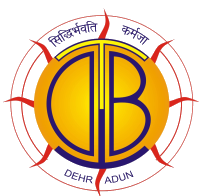 Dev Bhoomi Group of Institutions | Registration Open
Dev Bhoomi Group of Institutions | Registration Open
CCIM | MCI | PCI | INC | MOST TRUSTED UNIVERSITY | 100% Placement
Uttaranchal (PG) College of Bio-Medical Sciences & Hospital, Dehradun
Uttaranchal (PG) College of Bio-Medical Sciences & Hospital (UCBMSH), Dehradun | Top Medical College in North India | Excellent Academics | 100% Campus Placement | Courses Offered – B.Sc Operation Theater,B.Sc Optometry, BMLT, BMRIT, BPT, B.Sc Nursing, Diploma in Operation Theater, B.Sc Medical Microbiology, etc.CIMSR/UIHMT Group of Colleges, Dehradun
Combined Institute of Medical Sciences & Research & UIHMT College of Biomedical Sciences & Technology, Dehradun | Celebrating 20 years of establishment | Affiliated to HNB Central University | Courses Offered – B.Sc Nursing, ANM , GNM, M.Sc Nursing, MHA, BPT, BMLT, BMRIT, B.Sc Medical Microbiology etc.Sai Group of Institutions, Dehradun
Sai Group of Institutions, Dehradun | Most Demanding College in North India | Most Affordable Fee Structure | Best Infrastructure | World Class Faculty | Courses Offered – BPT, BMLT, BMRIT, B.Sc Optometry, B.Sc Medical Microbiology, B.Sc Nursing, GNM, ANM, MHA, BHA, MPH etc.OM Group of Colleges, Roorkee
OM Group of Colleges, Roorkee. | Top Demanding College | Affordable Fee Structure | 100% Job Placement | Highly Qualified Faculty | Courses Offered – BAMS, GNM, B.Pharma, D.Pharm, etc.Quadra Institute of Medical Sciences,Roorkee
Quadra Institute of Medical Sciences, Roorkee. | Most Popular Ayurvedic & Nursing Institute | Affordable Fee | 100% Placement | Courses Offered – BAMS, B.Sc Nursing ,GNM, ANM, B.Pharma, D.Pharm etc.Roorkee Institute of Technology, Roorkee
Roorkee Institute of Technology (RIT), Roorkee. | Most Demanding Institute | Ranked #4 College in India| Affordable Fee | 100% Placement | Courses Offered – B.Sc Optometry, Bachelor in Medical Lab Technology etc.Doon Institute of Medical Sciences,Dehradun
Doon Institute of Medical Sciences is a medical college and hospital in Sahaspur, Dehradun, India, affiliated to Uttarakhand Ayurveda University, Dehradun. The college was established in 2017.Shivalik Institute of Ayurved & Research, Jhajra, Dehradun
Shivalik Institute of Ayurved & Research, Jhajra, Dehradun provides the course of Bachelor of Ayurvedic Medicine and Surgery (BAMS), is approved by CCIM, Ministry of AYUSH and affiliated to Uttarakhand Ayurved University.Beehive Ayurvedic Medical College & Hospital,Dehradun
Beehive Ayurvedic Medical College Dehradun is one of the popular Ayurvedic Institute in North India. The college is affiliated to Uttarakhand Ayurved University, Courses Offered – BAMS, B.Pharma, D.Pharma etc.AMANDEEP COLLEGE OF NURSING , AMRITSAR | Registration Open
Top Demanding | INC | PCI | Best College in Punjab | 100% Placement
Maharishi Markandeshwar Deemed University,Ambala
Maharishi Markandeshwar University MM(DU), Mullana, Punjab | North India’s Best Private University in Ambala, Haryana providing courses in MBBS, MD, MS, OTT, MLT, BPT, MPT, B.Sc Nursing, GNM, ANM, M.Sc Nursing,, B.Pharma, D.Pharma. etc.SD URS DevrJ Medical College,Kokar
Sri Devaraj Urs Academy of Higher Education and Research Kolar(SDUAHER Kolar) is one of the famous privately established medical college in Karnataka. Courses Offered – MBBS, BAMS, BDS, MDS, MS, B.Sc Nursing, GNM, ANM, B.Pharma, D.Pharma, BMLTT, BPT, B.Sc Optometry etc.Dr.B.R.Ambedkar Medical College,Bangalore
Dr B. R. Ambedkar Medical College is a medical college and hospital in Kadugondanahalli, Bangalore, India, affiliated to Rajiv Gandhi University of Health Sciences, Bangalore. The college was established in 1981.The college is approved by CCIM, Ministry of AYUSH.Top Demanded Courses
B.Tech Mechanical B.Civil B.Tech Electronics & Communication B.Tech Electrical B.Tech CSE BAMS B.Sc Nursing GNM ANM BPT BMLT B.Sc Operation Theatre B.Sc Radiology B.Sc Agriculture BCA BBA B.COM BA LLB B.Ed MBA PGDM BA ENGLISHFeatured Colleges
Online Admission strats in the top ranked colleges.
Announcement
 Dev Bhoomi Group of Institutions, Dehradun | Registration Open
Dev Bhoomi Group of Institutions, Dehradun | Registration Open
B.Tech Civil | B.Tech Mechanical | B.Tech Electrical & Comm. | B.Tech Electronics | B.Tech CSE | M.Tech
![]() AICTE |Best Engineering College in North East | Industry Exposure| 100% Placement
AICTE |Best Engineering College in North East | Industry Exposure| 100% Placement
 Desh Bhagat University, Cahdigarh | Registration Open
Desh Bhagat University, Cahdigarh | Registration Open
B.Tech Civil | B.Tech Mech. | B.Tech ECE | B.Tech EE | B.Tech CSE | B.Tech FT | B.Tech Aeronotics | M.Tech
![]() UGC | AICTE | Most Trusted University |Ranked #2 in Punjab | 100% Placement
UGC | AICTE | Most Trusted University |Ranked #2 in Punjab | 100% Placement
 Bhagwant Global University [BGU], Kotdwar | Registration Open
Bhagwant Global University [BGU], Kotdwar | Registration Open
B.Tech Mechanical | B.Tech Computer Science | Polytechnic Diploma CSE | Polytechnic Diploma ME
![]() UGC |AICTE | Most Promising University In Uttarakhand | 100% Placement
UGC |AICTE | Most Promising University In Uttarakhand | 100% Placement
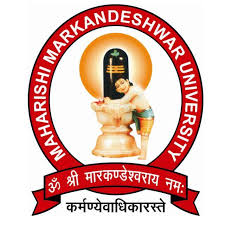 Maharishi Markandeshwar University [MMDU], Ambala | Registration Open
Maharishi Markandeshwar University [MMDU], Ambala | Registration Open
B.Tech Civil | B.Tech Mechanical | B.Tech Electrical & Comm. | B.Tech Electronics | B.Tech CSE | M.Tech
![]() AICTE | Most Demanding University in Hrayana | NAAC ‘A’ Accredited | Affordable Fee Structure | 100% Placement
AICTE | Most Demanding University in Hrayana | NAAC ‘A’ Accredited | Affordable Fee Structure | 100% Placement
Top Demanded Courses
B.Tech MechanicalB.CivilB.Tech Electronics & CommunicationB.Tech ElectricalB.Tech CSEBAMSB.Sc NursingGNMANMBPTBMLTB.Sc Operation TheatreB.Sc RadiologyB.Sc AgricultureBCABBAB.COMBA LLBB.EdMBAPGDMBA ENGLISHFeatured Colleges
Online Admission strats in the top ranked colleges.
Announcement
UPES Dehardun
Online Entrance Process Starts. You can Register by paying Rs.1200/- InterestedRR Institutions Bangalore
RR Institutions starts online entrance exam process. Interested
 Desh Bhagat University, Cahdigarh | Registration Open
Desh Bhagat University, Cahdigarh | Registration Open
BBA | MBA [HR/IB/MKT/FIN/IA/Executive/HHM/HM]| PGDM | PGDIMC | B.COM | M.COM | Dip.MGMT| PART TIME
 Dev Bhoomi Group of Institutions, Dehradun | Registration Open
Dev Bhoomi Group of Institutions, Dehradun | Registration Open
BBA | MBA [HR/IB/MKT/FIN]| B.COM | M.COM
![]() AICTE | MOST DEMANDED COLLEGE IN UTTARAKHAND | FOREIGN TOUR | 100% Placement
AICTE | MOST DEMANDED COLLEGE IN UTTARAKHAND | FOREIGN TOUR | 100% Placement
 Bhagwant Global University [BGU], Kotdwar | Registration Open
Bhagwant Global University [BGU], Kotdwar | Registration Open
BBA | MBA [HR/IB/MKT/FIN]| B.COM | M.COM
![]() UGC |AICTE | Most Promising University In Uttarakhand | 100% Placement
UGC |AICTE | Most Promising University In Uttarakhand | 100% Placement
 Maharishi Markandeshwar University [MMDU], Ambala | Registration Open
Maharishi Markandeshwar University [MMDU], Ambala | Registration Open
BBA | MBA [HR/MKT/FIN]| B.COM | M.COM
![]() AICTE | Most Demanding University in Hrayana | NAAC ‘A’ Accredited | 100% Placement
AICTE | Most Demanding University in Hrayana | NAAC ‘A’ Accredited | 100% Placement
Top Demanded Courses
B.Tech Mechanical B.Civil B.Tech Electronics & Communication B.Tech Electrical B.Tech CSE BAMS B.Sc Nursing GNM ANM BPT BMLT B.Sc Operation Theatre B.Sc Radiology B.Sc Agriculture BCA BBA B.COM BA LLB B.Ed MBA PGDM BA ENGLISHFeatured Colleges
Online Admission strats in the top ranked colleges.
Announcement
UPES Dehardun
Online Entrance Process Starts. You can Register by paying Rs.1200/- InterestedRR Institutions Bangalore
RR Institutions starts online entrance exam process. Interested
 Desh Bhagat University, Cahdigarh | Registration Open
Desh Bhagat University, Cahdigarh | Registration Open
B.Sc Agriculture | B.Sc Horticulture | B.Sc Forestry | B.Sc Fishries | M.Sc Agro | M.Sc Plant Path | M.Sc Fishries
 Dev Bhoomi Group of Institutions, Dehradun | Registration Open
Dev Bhoomi Group of Institutions, Dehradun | Registration Open
B.Sc Agriculture | B.Sc Horticulture | B.Sc Forestry | M.Sc Agriculture
![]() AICTE | MOST DEMANDED COLLEGE IN UTTARAKHAND | 100% Placement
AICTE | MOST DEMANDED COLLEGE IN UTTARAKHAND | 100% Placement
 Bhagwant Global University [BGU], Kotdwar | Registration Open
Bhagwant Global University [BGU], Kotdwar | Registration Open
B.Sc Agriculture | B.Sc Horticulture | B.Sc Forestry
![]() UGC |AICTE | Most Promising University In Uttarakhand | 100% Placement
UGC |AICTE | Most Promising University In Uttarakhand | 100% Placement
 Maharishi Markandeshwar University [MMDU], Ambala | Registration Open
Maharishi Markandeshwar University [MMDU], Ambala | Registration Open
B.Sc Agriculture | B.Sc Horticulture | B.Sc Forestry | M.Sc Agriculture [Agro/Seed Sci]
![]() AICTE | Most Demanding University in Hrayana | NAAC ‘A’ Accredited|Affordable Fee Structure | 100% Placement
AICTE | Most Demanding University in Hrayana | NAAC ‘A’ Accredited|Affordable Fee Structure | 100% Placement
Top Demanded Courses
B.Tech Mechanical B.Civil B.Tech Electronics & Communication B.Tech Electrical B.Tech CSE BAMS B.Sc Nursing GNM ANM BPT BMLT B.Sc Operation Theatre B.Sc Radiology B.Sc Agriculture BCA BBA B.COM BA LLB B.Ed MBA PGDM BA ENGLISHFeatured Colleges
Online Admission strats in the top ranked colleges.
Announcement
UPES Dehardun
Online Entrance Process Starts. You can Register by paying Rs.1200/- InterestedRR Institutions Bangalore
RR Institutions starts online entrance exam process. InterestedUttaranchal (P.G.) College of Bio-Medical Sciences & Hospital Dehradun, Uttarakhand, India
UCBMS&H provides best education with excellent facilities in lower fees.
AGRO SCIENCE COURSE
| S.NO. | AGRO SCIENCE COURSE | DURATION | FEES PER YEAR | MANAGEMENT FEES | Interested |
|---|---|---|---|---|---|
| #1 | B.SC. AGRICULTURE | 4 YEARS | 60000/- | 75000/- | Interested |
| #2 | B.SC. HORTICULTURE | 4 YEARS | 45000/- | 60000/- | Interested |
| #3 | B.SC. FORESTRY | 4 YEARS | 45000/- | 60000/- | Interested |
| #4 | M.SC. AGRONOMY | 2 YEARS | 60000/- | 75000/- | Interested |
| #5 | M.SC. FORESTRY | 2 YEARS | 60000/- | 75000/- | Interested |
LIFE SCIENCE COURSE
| S.NO. | LIFE SCIENCE COURSE | DURATION | FEES PER YEAR | Interested |
|---|---|---|---|---|
| #1 | M.SC. MICROBIOLOGY | 2 YEARS | 50000/- | Interested |
| #2 | M.SC. E.V.S | 2 YEARS | 45000/- | Interested |
| #3 | M.SC. MATHEMATICS | 2 YEARS | 36000/- | Interested |
PARAMEDICAL & NURSING COURSES
| PARAMEDICAL & NURSING COURSES | DURATION | STATE QUOTA FEES | MANAGEMENT QUOTA FEES | Ask Query |
|---|---|---|---|---|
|
MASTER OF PHYSIOTHERAPY (MPT) ORTHO, NEURO SPORTS) |
2 YEARS | 75000/- | 90000/- | Interested |
| M.SC. MEDICAL LAB TECHNOLOGY | 2 YEARS | 60000/- | 75000/- | Interested |
| BACHELOR OF PHYSIOTHERAPY (BPT) | 4-1/2 YEARS | 60000/- | 75000/- | Interested |
| B.SC. MEDICAL LAB TECHNOLOGY | 3-1/2 YEARS | 50000/- | 60000/- | Interested |
| B.SC. MEDICAL MICROBIOLOGY | 3-1/2 YEARS | 50000/- | 60000/- | Interested |
| B.SC. OPERATION THEATER TECHNOLOGY | 3-1/2 YEARS | 50000/- | 60000/- | Interested |
| B.SC. MEDICAL RADIOLOGY & IMAGING TECHNOLOGY (BMRIT) | 3 YEARS | 50000/- | 60000/- | Interested |
| B.SC. OPTOMETRY | 3-1/2 YEARS | 50000/- | 60000/- | Interested |
| B.SC. NURSING | 4 YEARS | 61600/- | 72600/- | Interested |
| G.N.M | 3 YEARS | 44000/- | 55000/- | Interested |
DIPLOMA COURSES
| DIPLOMA COURSES | DURATION | STATE QUOTA FEES | MANAGEMENT QUOTA FEES | Ask Query |
|---|---|---|---|---|
| DIPLOMA IN MEDICAL LAB TECHNOLOGY | 2 YEARS | 30000/- | 42000/- | Interested |
| DIPLOMA IN X-RAY TECHNOLOGY | 2 YEARS | 20000/- | 25000/- | Interested |
| DIPLOMA IN OPTOMETRY | 2 YEARS | 20000/- | 25000/- | Interested |
| DIPLOMA IN RENAL DIALYSIS TECHNICIAN | 2 YEARS | 30000/- | 42000/- | Interested |
Hostel Facility for boys & girls available in our College : Hostel Charges :
- Two Students in one room (2 Seater) – 75,500/-
- Three Students in one room (3 Seater) – 65,500/-
- Four Students in one room (4 Seater) – 50,500/-
- Hostel Security (Refundable) – 5,000/-
Note:
- Electricity charges as per meter reading .
- Free Laundry up to 30 clothes per month.
Candidates are required to submit following documents during the admission :
- Mark sheets and certificates of 10th , 12th for U.G. Courses.
- Mark sheets and certificates of 10th , 12th & U.G. for P.G. Courses.
- Proof of Residence – Ration Card/Voter’s ID Card/driving license/Passport.
- 4 copies of passport size coloured photograph.
- Domicile certificate, if applicable.
- Caste, tribe or disability certificate from competent authority.(For Reserve Category)
Payment of fees: Fee and other dues must be paid by the candidate selected for admission by the date given. If any candidate fails to pay the fee within the grace period, his/her selection For admission will automatically stand cancelled and vacant seat so caused will be filled in by the candidate next in order.
All charges (Tuition fee and hostel fee) are charged annually not semester wise.
You have any other query related to admission so call us : Mobile No.- 8126030103 Tel: 8126030103 Email id: info@shikshaview.com
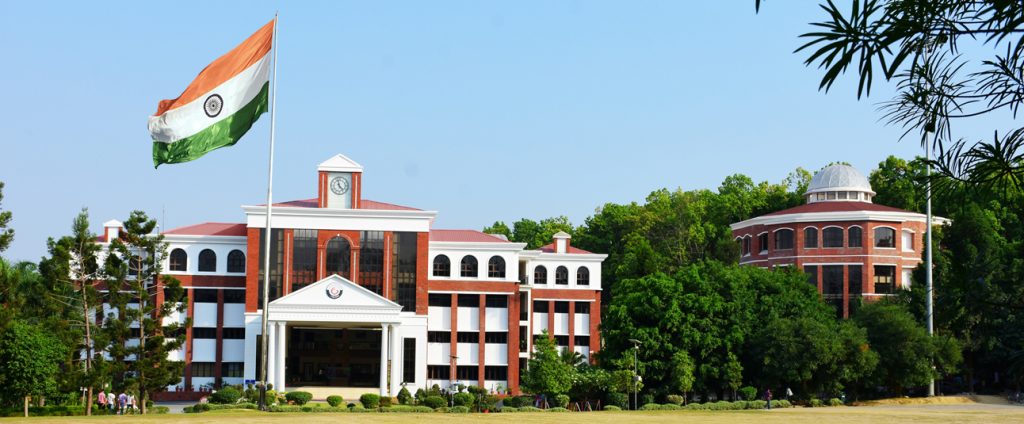
Ranked no #1 Deemed University, Approved by UGC , MHRD, Govt. of India, AICTE, PCI,, NAAC ‘A’
Graphic Era University, Dehradun which is a Deemed-to-be-University was established in 1997 by Graphic Era Educational Society, which is a non-profit organization, as Graphic Era Institute of Technology.
In 2008, the Institute was granted the status of Deemed University under section 3 of the UGC act, 1956. The university has acquired a transnational dimension through student exchange and knowledge sharing programs with many universities abroad. The university campus has a rich and vibrant atmosphere is enjoyed by the students throughout the year
In 2015, the university was accredited with an ‘A’ grade by NAAC. Graphic Era University aims to promote learning in true spirit and offering knowledge skills in order to succeed as professionals. The alumni of Graphic Era can be encountered worldwide in marquee brands like Apple, Google, Microsoft, HSBC, to name a few and in the service of the nation in all wings of the Armed forces.
Graphic Era University Courses:
Educational opportunities at Graphic Era Deemed to be University have worldwide views aimed at life-altering findings, knowledge acquisition, and transformative experiences. Students have the choice to choose from countless programs. Graphic Era University provides various programs in many disciplines and below are the UG, PG, and Ph.D. courses offered by the university.
GEU Highlights:
Educational opportunities at Graphic Era Deemed to be University has worldwide views aimed at life-altering findings, knowledge acquisition, and transformative experiences. By entering into partnerships with Tata Technologies and IBM, it has taken a large initiative in engineering programs to generate next-age engineering professionals through industrial collaborations.
More highlights about the university are mentioned below in the table.
| Year of Establishment | 1997 |
|---|---|
| Type of University | Deemed to be University |
| Founder | Prof Dr. Kamal Ghanshala |
| Accreditation | NAAC ‘A’ Grade |
| Recognition | UGC |
| Approvals | AICTE and MHRD |
| Professional Membership | AIU, ISTE, IEEE, IETE |
| Infrastructure Facilities | Sports, Computer Lab, Laboratories and many more |
| Programs Offered | Undergraduate, Postgraduate and Doctorate |
| Address | Graphic Era, Bell Road, Clement Town Dehradun, Uttarakhand, India |
| Contact Details | +91-8126030103 |
Read More>>
InterestedGraphic Era University Collaborations:
The college provides students exchange programs, summer internships, joint study and placement in collaboration with top worldwide academic organizations and industry leaders. Some collaborations of the university are mentioned below.
- University of North Alabama, USA
- Arkansas State University, USA
- National University, USA
- Atlantis University, Miami, Florida, USA
- Murray State University, USA
- Birmingham City University, UK
- Universite de Haute-Alsace, France
- Rennes School of Business, France
- College de Paris, France
- Hochschule Fulda – University of Applied Sciences, Germany
- Lyceum of the Philippines University, Philippines

Apply Now

Bhagwant Global University has been a pioneer in the education field since 1999. The institute was established under the government of Uttarakhand act no.39 in the year 2016. BGU, Kotdwar has world-class laboratories and a well-trained placement cell.
BGU is one of the very few self-financed universities in Kotdwar. Strict standards are maintained to keep the courses provided by the university meets the standards laid by AICTE, NCTE, UGC, and other government regulatory bodies. The university is recognized by the University Grants Commission and the Uttarakhand Government.
OBJECTIVES OF THE UNIVERSITY
- To develop higher levels of cerebral abilities and to commit to the higher education area of creating states and communities at an cheap cost.
- To settle advanced facilities for Professional and Technical Higher education and other control of learning
- To bring out research and teaching and attempt continuing education courses.
- To develop center of greatness for research, teaching and development and for distribution ability and its application.
- To afford advisory to the firm and public association.
Vision:
- To be a jobholder of internationally-competitive proficient experienced
- To sustain and nurture academic greatness, programmed to advertise modernization scholarship and knowledge to analyze, synthesize and experiment
- To advance academic-firm/professional teamwork and to forge important alliances for biggest upward mobility
Mission:
- To settle a technology arrangement center, software evolution park and enterprise cell coaching facility
- To bolster ties with firms, professional associations, accrediting bodies and lawful authorities that share accepted goals and responsibilities
- To settle a campus for global candidates in academic association with globally renowned premier schools
BHAGWANT GLOBAL UNIVERSITY – BGU PAURI GARHWAL HIGHLIGHTS
| Institute Type | University |
| Name of the Institute | Bhagwant Global University – BGU |
| Location | Pauri Garhwal, Uttarakhand |
| Established | 2016 |
| Affiliated | Govt. of Uttarakhand |
Read More>>

Apply Now
Introduction
shikshaview.com is one of the leading educational portal , enabling users to create personal web profiles. shikshaview.com and its affiliates, subsidiaries & associate organizations is/are concerned about the privacy of the users and are committed to protect it in all respects. If you have any query related to the privacy policy, please email us at info@shikshaview.com.
This Privacy Policy help you to understand how we collect, use, store, process, transfer, share, and otherwise deal with and protect all your information when you visit our website.
To avail certain sites / services on our websites, users are required to provide certain information for the registration process namely:- a) your name, b) email address, c) sex, d) age, e) PIN code etc., and / or interests, and the like. (All required information is Service Dependent). The Information as supplied by the users enables us to serve their needs in a more meaningful manner and, also to authenticate users and send periodic notifications to the users willing to receive our newsletters and updates.
Information Sharing and Disclosure
shikshaview.com promises that we will not sell or rent your personal information to third parties for their marketing purposes without your explicit consent or non-affiliated companies with an exception to provide product & services you’ve requested/when your permission is granted or under following conditions:
i) Providing information to trusted partner under confidentiality agreements. These organizations might contact you about the offer from shikshaview.com or from marketing partners. However, these companies do not possess independent right to share information.
ii) When it becomes necessary to investigate, prevent or take action regarding any illegal activity/fraud/violations/potential threat or if required by law. When information has to be merged with another organizations that recently acquired or in acquisition process. In this occurrence, “shikshaview.com” will notify you before information is transferred.
shikshaview.com do displays targeted information based on personal information that might generally required by advertisers. This helps to interact, view or gaining clicks as per targeted ads. We do not share any personal information while interacting with targeted ad instead it might be used to meet targeted criteria. We includes advertisers of financial services and no-financial services such as bank, insurance, airline or lenders.
Your trust and confidence are our highest priority.
Cookies & Tracking
To improve the responsiveness of the sites for our users, we may use “cookies”, or similar electronic tools to collect information to assign each visitor a unique random number as a User Identification (User ID) to understand the user’s individual interests using the Identified Computer. Unless you voluntarily identify yourself (through registration, for example), we will have no way of knowing who you are, even if we assign a cookie to your computer. The only personal information a cookie can contain is information you supply. A cookie cannot read data of your hard drive. Our advertisers may also assign their own cookies to your browser (if you click on their ads), a process that we do not control.
Third Party Links
It is clarified that while Your usage to Our Platform, You might see the links to the third party website / advertisements / electronic communication service, which are provided by the third parties. As the operation of the third party is not under control shikshaview.com, therefore shikshaview.com does not make any endorsement / guarantee of any service or product offered through third party websites nor make any representation related to the any privacy policy or other policies of such third party. Any usage of such third party website or availing any service or product through third party shall be at Your risk and shikshaview.com is not responsible for any loss / damage or otherwise. It is recommended that You should review the privacy policy of such third party websites prior to using such websites.
We shall not be responsible for the privacy policies and practices on other sites. When linking to another site a user should read the privacy policy stated on that site.
Third Party Services
The third party services at www.shikshaview.com generally require information, including Personal Information, for better deliverance of information, product and services. Shikshaview.com do not intend to transfer your personal information third party without the consent of user. We are against of such practices unless legally required. We undertake corrective measures to ensure third-party service do oblige in protection of user data.
Disclaimer
shikshaview.com don’t have any features of paid method. Please be noted the fees only deposited in the college/university account. We take utmost care to ensure the security of any nature of electronic transaction. shikshaview.com shall not be liable for any such transactions.
We cooperate with law enforcement and regulatory inquiries, as well as other third parties to enforce laws, such as: intellectual property rights, fraud and other rights, to help protect you and the community from malicious people. Therefore, in response to a verified request by law enforcement or other government officials relating to a criminal investigation or alleged illegal activity, we can (and you authorize us to) disclose your name, city, state, telephone number, email address, User ID history.
Without limiting the above, in an effort to respect your privacy and our ability to keep the community free from bad actors, we will not otherwise disclose your personal information to law enforcement or other government officials without a legal reason, court order or substantially similar legal procedure, except when we believe in good faith that the disclosure of information is necessary to prevent imminent physical harm or financial loss; or report suspected illegal activity.
Further, we can (and you authorize us to) disclose your name, address, city, state, country, phone number, email, and company name to Intellectual Property rights owners under confidentiality agreement, as we in our sole discretion believe necessary or appropriate in connection with an investigation of fraud, intellectual property infringement, piracy, or other unlawful activity.
Changes To This Privacy Policy
shikshaview.com reserves the right to amend the Privacy Policy and the updated policy will be displayed on the their site as and when changed for public viewing.
You’re Consent
By using this website, you agree to the terms of Online Privacy Policy and understand to process personal information for the purposes mentioned above.
Contact us
Tell us what you ‘Think’ sikshaview.com welcomes your questions and comments regarding our privacy policy. You may contact us at info@shikshaview.com
This Internet Website is provided by shikshaview and its affiliates. You are subject to the following terms and conditions during your use of this Website. Your use of the Website constitutes acceptance of these terms.
PLEASE LOG OFF THIS WEBSITE IMMEDIATELY IF YOU DO NOT AGREE TO THE FOLLOWING TERMS.
Disclaimer
The material in this website could include technical inaccuracies or other errors. You use this Website at your own risk. Shikshaview nor any other party involved in creating, producing, or delivering the Website shall be liable for any damages (direct, incidental, consequential, indirect, or punitive) from your access and use of the Website. Shikshaview does not warrant that the functional aspects of the Website be uninterrupted or error free. This Website and/or the server that makes it available are free of viruses and other harmful components.
Everything on this Website is provided to you “AS IS” WITHOUT WARRANTY OF ANY KIND, EITHER EXPRESSED OR IMPLIED, INCLUDING, BUT NOT LIMITED TO, THE IMPLIED WARRANTIES OF MERCHANTABILITY, FITNESS FOR A PARTICULAR PURPOSE, OR NON-INFRINGEMENT. Please note that some jurisdictions may not allow the exclusion of implied warranties. As a result, some of the above exclusions may not apply to you. Shikshaview reserves the right to make changes to this Website at any time without notice.
Links
Shikshaview has not reviewed all the sites linked to this Website and not responsible for the contents of any off-site pages or any other sites linked to this Website. The inclusion of any link to such sites does not imply endorsement by Shikshaview Visiting off-site pages or other sites is done at your own risk.
You’r Registration Consent
Share your contact detail with shikshaview.com partners; you are aware that shikshaview.com partners might contact you through telephone, e-mail and SMS for education related information or proposal. Receive promotional e-mails/offer from shikshaview.com or any connected partners websites.
Provisions
Shikshaview may revise these terms from time to time by updating or revising this posting, with the revised terms taking effect as of its posting date. Shikshaview controls and operates this Website from its headquarters in Dehradun, India. We make no representation that these materials are appropriate and/or available for use in other locations. If you use this Website from other locations, you are responsible for compliance with the applicable local laws. Shikshaview products are available in many parts of the world. However, this Website may describe products that are not available worldwide. If any portion of these terms is held to be unenforceable, the unenforceable portion shall be construed in accordance with the applicable law to the greatest extent possible and the remainder of the provisions shall remain in full force and effect. Any cause of action you may have with respect to this Website must be commenced within one year after the claim or cause of action arises. Otherwise, the claim or cause of action is barred. These terms will be governed by and construed in accordance with the laws of the province of India without regard to its conflicts of law provisions.
Copyrights
Everything you see or read on the Website is copyrighted unless otherwise noted.
Uses of Website
You signify, convey and assure that your usage in website will not:
Infringe, breach or disobey any statue, ordinance, rule and regulation of local, state, national and international law.
Obstruct or disrupt computer servers or networks to website.
Imitate other person personality or entity.
Manipulate or disguise the existence of any user data Modify, upload, publish, post, transmit, or distribute any object or information that is harassing, harmful, hateful, disparaging¸ abusive, threatening, racist, vulgar, unethical or unlawful in any manner.
Encourage conduct to constitute a criminal offense.
Distribute any immaterial information that harms minors.
Distribute any immaterial or unethical information that jeopardize integrity, unity, defense, unity and sovereignty of India.
Disrupt/interfere/stalk/threaten/harass any user.
Perform any attempt to gain unauthorized entry to access computer systems/ database/ server log-in/security breach.
Usage of this website is at your own risk. Shikshaview.com is not liable for any kind of error or omission or consequential/direct/indirect damages whatsoever related to loosing of data, permission, profits, negligence or information available at www.shikshaview.com
IELTS (International English Language Testing System) is required to be written by international applicants for testing English language proficiency. IELTS exam is considered as one of the primary language ability markers for international candidates to study or work in foreign land. Countries like USA, UK, Canada, Australia and New Zealand need IELTS exam scores as proof of language proficiency.
IELTS is mainly of two types: General Training and Academic. The test takers mainly measure the ability of the candidates on four basic communicative skills- writing, speaking, reading and listening. IELTS exam is conducted by Cambridge ESOL, the British Council and IDP: IELTS Australia. Total length for IELTS exam is 2hrs 45minutes. IELTS 2019 is taken by more than 3million candidates across 140 countries in the world. It is believed that IELTS 2020 will be taking more candidates as compared to last year.
IELTS 2020 Highlights
| Exam Name | International English Language Testing System (IELTS) |
| Official website | ielts.org |
| Level of exam | International |
| Organizing Body | Cambridge ESOL, the British Council & IDP: IELTS Australia |
| IELTS fee | Depending on local currency (for India INR 13250) |
| Skills testing parameters | Reading, Listening, Writing and Speaking |
| Band Score Range | 0 to 9 |
| IELTS score validity | 2years |
| IELTS test centers | More than 1200 centers in 140 countries |
| IELTS IDP India helpline | 1800-102-4544 |
 Dev Bhoomi Group of Institutions, Dehradun | Registration Open
Dev Bhoomi Group of Institutions, Dehradun | Registration Open
B.Tech Civil | B.Tech Mechanical | B.Tech Electrical & Comm. | B.Tech Electronics | B.Tech CSE | M.Tech
![]() AICTE |Best Engineering College in North East | Industry Exposure| 100% Placement
AICTE |Best Engineering College in North East | Industry Exposure| 100% Placement
Why should one take IELTS?
IELTS exam measures English language proficiency of a candidate. The candidate can write the exam for three fundamental purposes- study, work, and migration to travel to those countries where English is considered as the main language of communication.
- Those who want to pursue higher education should write IELTS exam in academic format.
- Those who wish to migrate to another country for employment purposes should write IELTS exam in General Training.
IELTS vs TOEFL
International students get confused between IELTS vs TOEFL. Many universities abroad ask for a score for either of the exams or scores for both the exams. IELTS score is preferred in the top-ranking universities in Australia, UK and New Zealand whereas TOEFL score is required to take admissions in the universities of Canada and US. TOEFL score is accepted in more than 10,000 institutions across 130 countries. US based organization named Education Testing Service conducts TOEFL exam. Therefore the exam score is preferred by American institutions.
It is a very wide comparison to make which is better. Candidates have to choose for what purpose these exams are being taken. IELTS is for those who want to study or work in Australia, New Zealand, or the UK. Every year, candidates go to these countries to try luck either in studies or jobs. Whereas TOEFL is mainly American universities or employment opportunities in America. Both tests have different scoring parameters. Many educational institutions require both scorecards for selecting candidates.
IELTS Registration
International students can register for IELTS either through offline or online mode. Basic eligibility criteria for IELTS is that the candidate has to be above 16 years of age with a valid passport. IELTS fee is INR 13250 though it varies with domestic currencies. Test takers can write the exam either in IELTS Computer Based Test or IELTS Paper Based Test. Steps to register are as follows.
For British Council
The candidates can find out availability of slots either by using online registration system or by offline mode. Two ways for IELTS Exam Registration are as
- Through Online- The candidate has to register online on the main portal of British Council. The candidate has to find suitable slot as per availability and complete the formality of registration as mentioned. The candidate has to pay online fees via credit or debit card.
- Through Offline- The candidate has to download IELTS exam registration form from official portal. Manually select the test date and fill other requirements asked in the form. Next, the candidate has to pay by demand draft (made to British Council and payable at New Delhi) or by cash (to pay cash visit the nearest ICICI bank with payment slip). The candidate has to provide Blue Dart courier serviceable address on registration form
For IDP Education
Candidates can register for IELTS exam via IDP education in three ways: Online, in-person and offline.
- Through Online- Candidate has to visit IDP official website to register. One has to select Test and Test Type and click go. A matrix will appear on screen with available dates and test centers. Then candidates have to fill personal details and complete the form by paying fee via credit card.
- In-Person: Candidate can download online form and make an application with assistance from staff. Fee payment can be made either via credit or debit card or by depositing fee amount to ICICI or Allahabad bank.
- Through Offline: Candidates can complete IELTS application form and send it to the main office of IDP via courier.
For IELTS Official Website
Here the candidate has to book for IELTS exam dates online. One has to select a location to find available test centers for the city. Fee should be paid via online mode. After following given instructions, the candidate can book for IELTS exam as per availability of slots.
Cancellation or Requesting a Transfer of IELTS Exam Date
Request for cancellation or postpone of IELTS exam date is available. Request to change or cancel must be made strictly 5 weeks before the test date via email or in person only. Telephone cancellation or postponement will not be accepted. Cancellation more than five weeks ahead of the test date will receive a full refund (less a 25% administrative fee). Cancellation less than five weeks ahead of the test date you will receive no refund. Failure to appear for the test without notification is considered a cancellation, no refund will be issued, and you must register and pay again if you wish to take the test on another date.
Candidates seeking cancellation or transfer within the 5-week period prior to the test date, or those who fail to appear for their scheduled test, can receive a refund (less a 25% administrative fee) if they can provide evidence within 5 days that their ability to sit for the test has been affected by serious illness or cause:
- Serious Illness – hospital admission or serious injury
- Loss or Bereavement – the death of a close family member
- Hardship/Trauma – victim of a crime, victim of a traffic accident
- Military Service
Candidates are required to fill a “Request for Refund” or “Test Day Transfer Form” and attach appropriate documentation and/or evidence:
- A medical certificate from a qualified medical practitioner
- A death notice or certificate
- A police report.
IELTS Eligibility
IELTS exam can be taken by any individual irrespective of gender, age, race, religion or nationality. It is recommended not to take this examination below 16years of age. There are no rules for the upper age limit for IELTS exam. There is no limit set by the conducting body to attempt IELTS exam. One can take exam as many times as one wants.
Educational Eligibility for IELTS Exam
The conducting body has not set any educational eligibility criteria for IELTS. Those who want to pursue higher education abroad or want to migrate for employment purposes can take this exam. The applicants should know about overall band criteria before applying to the selected educational institution.
IELTS Exam Pattern
There are four sections in IELTS exam pattern. The sections are Reading, Writing, Speaking and Listening. It takes 2hours 45minutes to complete the whole test. Listening and Speaking are similar to both Academic and General Training but the subject matter for writing and reading sections differ in both these tests. Reading, Writing and Listening of all IELTS exams are completed on the same day without any break whereas Speaking section can be completed a week before or after the other tests. The entire exam pattern overview is given
IELTS Exam: Speaking
IELTS exam Speaking test assesses a candidate’s fluency in spoken English. This is a face to face interview round between an examiner and the candidate. Exam pattern for IELTS: Speaking is divided into 3 parts and every part is recorded. The duration of IELTS Speaking is 11-14 minutes.
Part 1: A candidate is asked general questions about himself/herself, his/her home, family, work, education, interests, and hobbies. This part lasts for 4-5 minutes.
Part 2: Candidate is given a card with a particular topic stated on it. The candidate is then given one minute to prepare himself and then to speak on the given topic for two minutes.
Part 3: Candidate is asked a question on the topic given in Part 2. Here, a candidate gets an opportunity to discuss more abstract ideas and issues with the examiner. This part lasts for 4-5 minutes.
IELTS Exam: Listening
IELTS Listening test is 30 minutes long. Candidates are required to listen to four separate recordings of native English speakers and answer a series of questions based on these recordings. This section measures ability of a candidate to comprehend the main idea and detailed factual information, opinions, and attitude of the speakers in the recordings.
Recording 1: It involves a conversation between two people in English. For example, two people talking about the weather.
Recording 2: It is a monologue framed in a social context. For example A speech about local facilities for the public.
Recording 3: It is a conversation among people (up to 4) in an educational or training context.
Recording 4: Monologue on educational or academic context.
IELTS Exam: Reading
IELTS Reading test is 60 minutes and consists of 40 questions designed to test a candidate’s English Reading skills. The questions include reading for gist, reading for main ideas, reading for detail, skimming, understanding the logical argument and identifying writers’ opinions, attitude and purpose. This section is different for Academic and General Training.
- IELTS Academic Reading: It consists of 3 reading passages taken from newspapers, magazines, journals and books. All these passages are written for the general audience. These long texts follow writing styles ranging from analytical, discursive, factual and descriptive. Here the candidate has to recognize opinions, purpose and attitudes of writer. This test is designed to test comprehensible ability of the candidate.
- IELTS General Training Reading: The paper is divided into 3 sections. All these excerpts are taken from company handbooks, advertisements, guidelines, notices, newspapers, magazines and books. 1st section is about “social survival”. 2nd section is in the context of “workplace survival”. 3rd section is of general reading with complex structure. This section puts emphasis on different writing styles like argumentative, or instructive or descriptive.
IELTS Exam: Writing
IELTS Writing test is 60 minutes long and consists of two compulsory tasks. The two tasks are designed to test candidates in English writing skills, grammar, etc. The answers are to be written in complete sentences in a paragraph and not as notes, phrases or bullet points. This section is also different for Academic and General Training.
- IELTS Academic Writing: The candidate has to complete 2 writing tasks. For Task 1, the candidate has to explain information given in chart or table in 150 words (20 minutes) For Task 2, the candidate has to write in response to a problem, or argument or a point of view. This task should be written in 250 words (40minutes)
- IELTS General Training Writing: The candidate has to complete 2 writing tasks. For Task 1, the candidate has to write a letter (personal or formal or semi-formal) to explain the given situation or request for information. For Task 2, an essay will be written in response to a problem or argument or point of view.
IELTS Exam: Preparation Tips
Test takers should get a proper overview of IELTS exam preparation tips. One should aim at covering all four components in IELTS exam: Speaking, Listening, Reading and Writing. IELTS exam pattern is of two types: IELTS Academic and IELTS General Training. As per taken exam, test taker should prepare. Few preparation tips for IELTS exam are as following
- Learn new words for understanding vocabulary
- Read English books, magazines, newspapers, handbook for strong grasp over language
- Practice writing following a strict time schedule
- Under strict time scheduling, test taker can improve writing speed
- Make an accurate usage of grammar
- For fluency in language, start talking in front of mirror
- Focus on pronunciation for proper understanding of words
- Try to balance between listening and scanning questions
Besides these preparation tips, test takers should start taking mock tests regularly for better understanding of exam pattern. Every year, lakhs of international students take IELTS exam for pursuing either higher education or employment opportunities. Therefore learning proper English is a step taken towards dreams.
TOEFL or Test of English as a Foreign Language is a globally recognized test conducted by US based, Educational Testing Service (ETS). This test assesses language ability and fluency of English. Non-native English test takers who want to attend foreign universities take TOEFL. Other than academic purpose, one also takes this exam for immigration and employment opportunities.
Mostly language usage in an academic setting has been tested by TOEFL. Test takers find high level language with a wide range of vocabulary in most of the reading passages of TOEFL. In more than 130 countries TOEFL scores are accepted. TOEFL consists of two patterns-TOEFL ibt and TOEFL Paper Delivered.
Reasons of taking TOEFL
Test takers who look forward to attending universities in English speaking countries need TOEFL score for admission requirements. Few reasons of taking TOEFL as exam include
- Globally recognized testing center like ETS validates English proficiency of a test taker in TOEFL
- From surveyed data it is noticed that most of TOEFL test takers get assured admission to preferred universities as per choice
- Top universities in US, Canada, UK, Australia accept TOEFL score as the validated one
- 9000 universities accept TOEFL score
- Test takers take only 1 day to complete all sections of the entire exam
- TOEFL is no longer a requirement for healthcare professionals who dream to practice in UK
TOEFL 2020 Highlights
Test takers must know few details about TOEFL before appearing for exam
| Exam Name | Test of English as a Foreign Language |
| Short Form | TOEFL |
| Official Website | ets.org/toefl |
| Level of Exam | International |
| Conducting Body | Educational Testing Service (ETS) |
| Exam Pattern | Internet Based (ibt) and Paper Based (pbt) |
| Exam Duration | Around 3 ½ hours |
| TOEFL ibt fee | $160-$250 (INR 11,468-INR 17,919) |
| TOEFL pbt fee | $180 (INR 12,901) |
| Sections of TOEFL | Listening, Speaking, Reading and Writing |
| Score Range | 0-30 (for each section) |
| TOEFL Test Centers | 4500 across the world |
| TOEFL Helpline Number | 1-609-771-7100 | 1-877-863-3546 |
TOEFL 2020: Registration
Test takers can register for TOEFL either online or offline or via TOEFL official app available on play store. Application process for the exam is open all throughout the year.
TOEFL 2020 Online Registration
Few steps for registration are as follows
- Visit the official website of TOEFL ie. ets.org/toefl
- If you are a new user then you have to create an ETS account (if you are an existing user then you just have to enter your user id and password)
- After signing in, click register to find out test centers as per preferred location
- Choose test dates within 2month period and then click find test centers and dates
- Then choose dates and test centers as per availability
- Then click show test centers and register for that location
- Click register
- You will be directed to next page asking for personal information (including any disabilities if there)
- At last review entire page and check acknowledgement box at the end
- On the next page, candidate has to enter personal id details
- Next page you will be show personal information already entered during creating ETS account
- On next page you will be asked “Free Score Recipients” where candidate can add up to 4 score institutions where score will be sent as a part of test fee
- Then choose own preference of receiving score report
- At last check out TOEFL cart and choose PAY NOW
- Pay via credit card
TOEFL 2020 Offline Registration
Test taker has to send TOEFL registration form via mail to the registered address.
- Candidate firstly has to download TOEFL registration form
- Candidates have to fill up certain codes(available online) required to fill up the registration form manually
- One can initiate payment from the options mentioned in the form
- After filling up the form, candidate has to send the form to RRC(Regional Registered Centers)
- Mail should be received by them at least a month before the test date
- If the candidate does not receive a confirmation, then h/she must call RRC at least three days before the deadline of registration
TOEFL 2020 Registration via Phone App
- Visit official website of TOEFL to find out contact number of RRC (+91-124-4147700) near preferred location
- Candidate can pay registration fee via credit card or debit card or an e-check
- Fill up with personal details
- Online registration via phone will end a week before the exam date
- If the candidate registers lately then a fine of $40 will be charged
TOEFL 2020: Eligibility Criteria
- ETS, conducting body of TOEFL does not keep any eligibility criteria for test takers
- Mostly candidates have to pass 10+2 level of education from any recognized institutions
- Candidates must have valid passports to produce as proof of identity
There are few institutions reveal there is no requirement of TOEFL score if the applicant has to follow these points
- If non-native speakers hold any degree or diploma certificates from institutions located in English speaking countries
- If non-native speakers have completed two years course of education from any institution located in English speaking countries
TOEFL 2020: Exam Dates
Test takers must register online for TOEFL. Every year, candidates get a minimum of 50 dates to take this exam. One has to appear for an exam at registered test centers as mentioned above. While registration, candidates have to find out available dates as per preference. Only exam dates till July is given below
| February 15, 2020 February 28, 2020 February 29, 2020 |
March 7, 2020 March 14, 2020 March 15, 2020 March 20, 2020 March 28, 2020 |
| April 3, 2020 April 4, 2020 April 11, 2020 April 18, 2020 April 25, 2020 April 26, 2020 |
May 1, 2020 May 2, 2020 May 10, 2020 May 16, 2020 May 24, 2020 May 30, 2020 |
| June 13, 2020 June 20, 2020 June 27, 2020 |
July 4, 2020 July 11, 2020 July 18, 2020 July 25, 2020 |
TOEFL 2020: Exam Pattern
Test takers can appear for TOEFL on both internet based and paper based. This exam measures language proficiency of the candidate. Candidates are being assessed on basis of language skills in Reading, Writing, Listening and speaking sections. Exam Pattern for TOEFL ibt 2020 is explained widely below
- Reading section in TOEFL consists of 3-4 passages mostly on academic topics
- Listening section consists of short audio pieces which will be played once to answer questions
- For writing section, candidates have to read certain topics and write opinionated essay on it
- Candidates should attempt all questions as there is no negative marking for TOEFL exam
TOEFL 2020 Paper delivery test pattern
Test takers who reside in those regions without connectivity can appear for TOEFL 2020 Paper delivery test pattern. Sections in TOEFL 2020 Paper delivery test pattern has been described widely below
TOEFL: Listening
- It consists of 3 parts
- Total time duration for this section is 30-40 minutes
- 1st part consists of 30 questions about short conversations
- 2nd part consists of 8 questions about longer conversations
- 3rd part consists of 12 questions about talks and lectures
TOEFL: Reading
- It consists of 50 questions
- Total time allotment for this section is 55 minutes
- Mostly candidates have to read varying number of passages
TOEFL: Writing
- It consists of a long essay of 250-300 word length
- 2 tasks have to be completed in this section
- Candidates have to write opinionated essay for this section to explain own analytical skills
- Total time allotment for this section is 50 minutes
TOEFL: Speaking
- In this section, candidates have to speak for 17 minutes
- 4 tasks have to be answered on basis of questions in reading and listening sections
PTE (Pearson Test of English) is a test conducted for English language proficiency by Pearson PCL group. PTE Academic is a computer based test for study abroad and immigration. It is a three-hours long test recognized by universities and colleges globally.
There are 3 different tests viz. PTE Academic, PTE General and PTE for Young Learners. Any person whose native language is not English and willing to study abroad can access his/her proficiency in the language through PTE Academic.
- PTE Academic tests a candidate’s English reading, writing, listening and speaking skills.
- PTE Exam Centers are located in around 50 countries all over the world.
- Examination booking fee is INR 11,102 excluding GST of 18%.
- PTE Academic is accepted by prestigious institutions like Harvard Business School, Yale, INSEAD.
- It is also accepted for VISA purposes by Australia and New Zealand Governments
PTE 2020 Exam Highlights
| Exam Name | Pearson Test of English |
| Short Form | PTE |
| Official Website | pearsonpte.com |
| Level of Examination | International Level |
| Conducting Body | Pearson PCL group |
| Exam Mode | Computer-Based |
| Exam Duration | 3 Hours |
| Number of Sections | Three |
| Name of Sections | Speaking & Writing, Reading, and Listening |
| Score Range | 10-90 Points |
| Exam Fee | INR 13,300 |
| Late Booking Fee | INR 13,965 |
PTE Exam Dates 2020
- PTE can be taken throughout the year.
- Candidates may book their slots as per their convenience.
- Candidates willing to take Pearson Test of English can register themselves 24 hours prior to the exam day.
- Its is advised to the candidates that they must book their slot 10 – 15 days before the test as the test centers are allotted in first come first serve basis.
PTE 2020 FAQ’s
Ques. How to choose the right PTE exam?
- Pearson PCL conducts four different exams, each with its own purpose.
- PTE General and PTE Young Learners are held to apply to schools and high schools.
- PTE Business English is required as a english proficiency test in business and commerce industry.
- PTE Academic is the standard test required for applying to the universities and colleges in English speaking nations.
Ques. Which countries accept PTE Score?
- Acceptable for study applications by thousands of universities/colleges around the world (USA, New Zealand, Canada, UK, Australia).
- PTE scores are approved/accepted by Australian and New Zealand govt universities and for immigration purpose.
PTE 2020 Eligibility Criteria
| Age limit | Candidate must at least be 16 years in age. Candidates below the age of 18 years must provide signed parental consent for taking the test. |
| Number of Attempts | No limit on the number of times PTE is taken by a person. |
| Nationality | Candidate from any country of the world can appear for the test. |
PTE 2020 Registration
Registration for PTE are only done in online mode on the official website of the exam. To book PTE Academic, candidates have to create a pearson account. make sure all fields are mentioned correctly to avoid hassle free registration. Steps to register and book the exam are mentioned below:
Step 1: Create a PTE Account
- Visit in.pearson.com/pte
- Enter your personal information-name, Date of Birth, Email-ID.
- Fill in your contact information, preferred test location.
- If you want additional information regarding the test, you can click on “Get Call Back”.
- You’ll be redirected to another page; Now click on “Create Account”
- A confirmation mail with login credentials will be sent to the given email ID within 48 hours.
Remember to use Roman characters while filling registration form. Use a functioning and valid email ID, as all correspondence regarding PTE is done via email.
Step 2: Book your Test
-
- Once candidates have created pearson account, they can sign in and schedule a test.
- Sign in using your Username and password.
- Go to “PTE-A: Pearson Test of English Academic” mentioned under Exam Catalogue.
- Click “Schedule this exam” and enter all details required.
- As per your comfort choose the preferred test centre, appointment date & test time slot.
- Click on “Proceed to checkout button”
Step 3: Pay Test Fees
Complete the checkout steps & Pay the application fee. A confirmation mail will be sent within 48 hours with the location of the test center and list of instruction to be followed on the test day.
The payment methods accepted by Pearson are:
- All MasterCard, American Express and JCB credit cards and Visa debit cards are accepted
- Vouchers/promotion codes (candidates have to pay the balance if your voucher does not cover the full test cost)
- PayPal payment is not accepted
Late booking fee is charged if booking is done 48 hours prior to the test. Check your confirmation email properly to cross verify identification details. in case of issues contact customer care before the exam.
Rescheduling or Cancelling PTE Academic test
- Candidates can reschedule the exam to any desired date through phone or online.
- Canceling or rescheduling the exam can be done through the PTE profile on the website.
Following fees for rescheduling are applicable for the given timeline:
- Rescheduling 7 days prior the test date: 25% of the exam fee has to be paid for a new test date
- Cancelling the test 7 days before prior: 50% of the test fee is refunded
- Rescheduling the test within 7 days: Pay the full registration fee for the new test
- Cancelling within 7 days of the test: No refund
PTE 2020 Test Pattern
- PTE Academic comprises of 3 sections – Speaking & Writing; Reading; Listening.
- The duration of the test is three hours.
- Test 20 different types of question formats.
- The test will comprise of excerpts from lectures, view graphs, and charts.
- PTE Academic will analyze candidate’s ability to comprehend different accents of English.
Part 1: Speaking and Writing Test Pattern
This section is to be attempted in 77 – 93 minutes. Speaking skill is assessed on the basis candidate’s ability to converse/interact in English in an academic environment. Writing part tests a candidate’s grammar and spellings. Speaking and Writing has following sub sections that candidates have to attempt Component wise detailed test pattern of Speaking and Writing is mentioned below:
Personal Introduction
- 25 Seconds are given to read a prompt text and prepare response.
- 30 seconds are provided to record the response.
- Response can be recorded only once. It is not scored but sent together with the Score Report.
Read Aloud : Candidates have to read aloud a text that appears on the screen. Reading accuracy and speaking skills are assessed in this section.
- The text length goes upto 60 words or more. There is no fixed time limit to read the text. It depends on the length of the text.
- Candidates get 30-40 seconds to prepare the text before the recording begins.
- A short tone is buzzed, candidates have to start speaking after that tone.
- Progress bar changes from recording to completed once the time is over.
- Responses can be recorded only once.
Repeat Sentence: In this component, candidates have to listen a recorded sentence and repeat it. Listening, memorising and speaking skills are assessed. The prompt length is of 3 to 9 seconds and candidates have to record their response in 15 seconds.
- The audio of sentence begins to play and candidates have to listen it carefully.
- There is no short tone, record the response immediately.
- Once the time limit id out recording changes to completed.
- Candidates cannot replay the audio, response can be recorded only once.
Describe Image: Candidates have to describe an image that is displayed on screen. Analyzing and Speaking skills are assessed in this component. 40 seconds are provided to answer this section.
- A countdown is active after which the microphone is active to record.
- 25 seconds are given to study the image and prepare the response.
- A short tone is played, candidates have to speak right after the tone.
- Response can be recorded only once.
Re-Tell Lecture: In this component, after watching/ listening a lecture candidates have to re-tell it in their own words. Interprating and Speaking skills are assessed. Prompt length is of 90 seconds. 40 seconds are provided to record the response.
- An audio is played with a image related to it.
- After the audio, 10 seconds are provide to prepare the respone.
- A short tone is played, candidates have to speak after that immediately.
Answer Short Question: Candidates have to reply to a question in one or few words. Prompt length is of 3 to 9 seconds. 10 seconds are provided to answer the question.
- Audio is played along with an image.
- There is no short tone, after the audio stops response is to be recorded immediately.
- Response cannot be replayed, it can only be recorded once.
Summarize Written Text: One sentence summary of the given passage is to be written. Compiling, reading and writing skills are assessed. Prompt length is of 300 words. 10 minutes are given to write the response.
- Passage should be summarised in not more than 75 words.
- There is a word count on the number of words that candidates write.
- Cut, copy and paste options are available to write the summary.
Essay: A topic is given on which a 200 to 300 word essay is to be written. Thinking ability and writing skills are assessed. Prompt length is of 2-3 sentences. 20 minutes are given to write the answer.
- A comprehensive and argumentative essay is to be written.
- Word count is provided to count the number of words written.
- Minimum of 200 words should be written but not more than 300 words.
- Cut, copy and paste options are given to edit the answer.
Part 2: Reading Test Pattern
Reading section is of 32-40 minutes. The section comprises of 15-20 independent and integrated skill questions. It is the only timed section. Reading section has following sub sections that candidates have to attempt:
Component wise detiled test pattern of Reading is mentioned below:
Reading and Writing fill in the blanks: A text is given with gaps in between. Candidates have to fill in those gaps from the word box given. Prompt length is 300 words to assess reading skills.
- Beside each gap, there is a drop down word list to select answer from.
- Select the option the fills the gap best.
- In order to change the response, left click to chosse different option.
Multiple Choice with Mutiple Answers: After reading the text given, a MCQ question based on the content nd tone of the text is to be answered. Candidates have to select more than one option. Prompt length is of 300 words.
- Candidates have to select response options that they thimk are correct from the list of options.
- Options selected are ighlighted in yellow.
- Candidates can change their response by left click and selecting alternate response.
Re-Order Paragraphs: Text boxes appear on screen in random order. candidates have to put the boxes in correct order. Prompt length is of 150 words. Candidates have to restore the text boxes in original position. Text can be moved in two ways:
- Left click on the box( will be outlined in blue), hold the left mouse button and drop it to right location.
- Left click to select the box and use left/ right or up/down arrow buttons to move the box across.
In order to deselct a box, candidates can left click on the screen anywhere.
Fill in the Blanks: Text is displayed on screen with gaps in between. Prompt length is of 80 words.
- A passage is given with missing words along with a list of words to fill in the gaps in the text.
- Words provided are more than te number of gaps. all words are not to be used.
- Left click on the words to select it and drag it to the desired gap.
- In order to remove a word from the gap, drag it back to the word box.
Multiple Choice with Single Answer: Based on content and tone of the given passage a MCQ question is to be answered. Prompt length is of 300 words.
- There can be several suitable responses but only one best option is to be selected.
- The option selected is highlighted in yellow.
- Candidates can change their response by left click and selecting alternate response.
Part 3: Listening Test Pattern
Listening section is 45-57 minutes long. Questions are asked through audio and video clip. Candidates should listen to these clips carefully as they are played only once. Candidates can make notes and adjust volumes as needed.
Welcome to Know About Study in Canada
We provide complete information regarding to study in Canada. In Canada there are world’s most prestigious universities. According to Academic Ranking of the World Universities [ARWU] three of the top 100 Universities are present in Canada. Canada is ranked 5th in QS world ranking for the Education System Strength.
Canada has been one of the favorite destinations for students across the globe. The reasons for studying in Canada are numerous however, the major one being the quality of education along-side the welcoming culture it has to provide. The people of Canada have a major role to play in it, along with the Government.
With more than 10000 courses and degrees being offered in English & French, Canada has emerged as the fifth-most popular study destination for international students.
- Acceptance Rate – 60%
- Average Study Cost – USD 12000
- Total Institutions – 96
Exams for Canada
Why Study in Canada?
The latest studies have proven that Canada is becoming one of the favorite study destinations for international students. It is also famous for offering the best Education degree. Promising a safe stay for its students, there are other reasons as to why students can plan to study in Canada:
- Visa Policy : The Canadian visa application process is relatively simpler and shorter which encourages international students to study in Canada. In addition, Canadian universities and colleges allow international students to stay back in Canada for employment opportunities. The Post-Graduation Work Permit permits international students to stay up to three years after graduating from a post-secondary Canadian institution, depending on their course duration. On the other hand, as an F-1 visa holder, international students are allowed to stay back to complete up to one year of temporary employment directly related to their major field of study. During Optional Practical Training (OPT), international students can get a one-year work and stay-back permit after completion of a degree in the USA.
- Tuition-free university education : There is low tuition fee. Students have to pay a nominal fee of 1035 USD per semester, which covers the administrative costs.
- A Wide array of courses : There are more than 10000 international programs along with 10,000 Bachelors, Masters and Ph.D. degree programs to choose from.
- World-class universities : There are above 96 institutions of higher education.
- Dual Education System : Allows students to pursue an apprenticeship in a company along with a vocational course at a vocational school. International students can earn up to 17-23 USD per hour
- Economical cost of living : The cost of living in Canada amounts to 110 USD – 1,030 USD per month, which is quite low as compared to its European counterparts.
- Financial Aid and Scholarships : Plenty of scholarships are offered to both undergraduate and postgraduate students in Canada by Canadian universities. Several kinds of scholarships, grants and bursaries are available for international students who are planning to study in Canada, at undergraduate, postgraduate and doctoral levels.
- Vanier Canada Graduate Scholarships Program
- Banting Postdoctoral Fellowships
- Canada Graduate Scholarships- Master’s Program
- IDRC Research Awards
- A Massive Job market for graduates : One of the advantages Canadian international students have over international students studying in the US is that of Post-Graduation Work Permit (PGWP). The post-graduation work permit is an integral part of Canada’s immigration system which allows overseas students to work in Canada for up to 3 years after graduation. It is also a gateway to permanent residence and eventually citizenship. Jobs like program analyst, teacher, financial manager, pharmacist, nurse practitioner, and construction manager are some of the most coveted occupations in Canada.
- Standard of Living : According to the Organization for Economic Co-operation and Development (OECD) Better Life Index, Canada performs exceptionally well in various measures of well-being as compared to other countries.
- The average household net adjusted disposable income per capita is $30,854 per year, which is lower than the OECD average of $33,604 a year.
- When we talk about employment, 73% of people between the ages of 15 to 64 have a paid job, above the OECD employment average of 68%. Around 76% of men are in paid jobs, compared with 71% of women.
- Quality education and work-related skills are prerequisites for finding work in Canada. Around 91% of adults aged between 25-64 have completed upper secondary education. The stats are well above the OECD average of 78%.
- In terms of health, life expectancy at birth in Canada is 82 years, which is two years higher than the OECD average of 80 years. Life expectancy for women is 84 years, whereas, it is 80 for men.
Canadians are way more satisfied with their lives than the OECD average. On a scale from 0 to 10, Canadians rate their general satisfaction with life a 7.4 on average, higher than the OECD average of 6.5.
With the low amount of tuition fees, high standard of living and innumerable career opportunities, it is safe to assume that Canada has proven itself to be one of the most coveted countries for international students.
Canada University Ranking
| University Name | Agency Name | Ranking |
|---|---|---|
| University of Toronto | QS World | 28 |
| THE World Ranking | 22 | |
| ARWU (Shanghai) | 23 | |
| McGill University | QS World | 33 |
| THE World Ranking | 42 | |
| ARWU (Shanghai) | 67 | |
| University of British Columbia | QS World | 47 |
| THE World Ranking | 34 | |
| ARWU (Shanghai) | 31 |
 Swami Vivekanand Group of Colleges [SVIET/SVGOC] Candigarh | Registration Open
Swami Vivekanand Group of Colleges [SVIET/SVGOC] Candigarh | Registration Open
Top Demanding | INC | PCI | Best College in Punjab | 100% Placement
Cost of Studying in Canada
| Level | Cost (CAD) |
|---|---|
| Undergraduate | $10,000- $30,000 |
| Graduate | $15,000- $35,000 |
Note: During Vacation You Can Get Full Time Work Permit
Top courses to study in Canada
| Course |
|---|
| Business Finance |
| Registered Nursing |
| Dental Surgery |
| Civil Engineering |
| Pharmacy |
Top Universities in Canada
| University | QS World Ranking |
|---|---|
| University of Toronto | #28 |
| McGill University | #33 |
| University of British Columbia | #47 |
| University of Alberta | #109 |
| McMaster University | #146 |
| University of Montreal | #149 |
| University of Waterloo | #163 |
| University of Calgary | #229 |
| University of Ottawa | #201 |
| Western University | #214 |
Why Canada is emerging as the best option for Education?
- Organization for Economic Co-operation and Development (OECD) study reveals that Canada’s students are educated at the best level in the world.
- Immigrants are able to integrate at a fast pace in Canadian schools.
- In Pisa tests, if level of education is evaluated on the basis of provinces then the three universities – Alberta, British Columbia and Quebec would be counted under top 5 places of science in the world.
- The teachers hired in Canada are very selective and highly paid.
- To improve literacy, experienced staff and resources such as exams and assignments help identify struggling schools or individuals.
Highest paying degrees in Canada
| Courses | Average Tuition Fee |
|---|---|
| MBA | $29,971- $63,354 |
| MS | $23,891- $29,901 |
| Medicine | $25,628- $38,578 |
| Undergraduate | $7,700 – $23,200 CAD |
| Graduate | $11,600 – $27,000 CAD |
Great Job Opportunities
Canada has a flourishing economy with ample job opportunities available for both natives and immigrants. At present the top recruiters in Canada belong to the following sectors:
- Healthcare/ Pharmacy/ Biotechnology
- Advertising
- Energy/ Utilities/ Mining/Oil and Gas
Jobs in Canada are available for students of all the levels, graduates and professionals alike. Following are the job opportunities available for graduates from Management, Engineering and Medicine fields:
| Field | Job Available | Salary |
|---|---|---|
| Management | Recruitment Professional Specialized | CAD 81,250 |
| Statistician and Actuaries | CAD 89,606 | |
| Senior Business Manager | CAD 97,136 | |
| Engineering | Chemical Engineer | CAD 80,000- CAD 90,000 |
| Mechanical Engineer | CAD 76,000- 91,000 | |
| Environmental Engineer | CAD 55,000- CAD 90,00 | |
| Medicine | Dentist | CAD 120,000- 240,000 |
| Pharmacist | CAD 90,000- 120,000 | |
| Veterinarians | CAD 80,000- 120,000 |
cholarships and Financial Aids
To reduce the financial burden, students can apply to scholarship programs for international students initiated by the Government of Canada.
| Banting Postdoctoral Fellowships | Canadian and Foreign citizens | $54,219 per year (taxable) | Registration at Canadian Common CV and ResearchNet Account | April- September |
| Canada-CARICOM Leadership Scholarships Program | Students from Caribbean Countries pursuing undergraduate and graduate programs | 4 months: $5,576; 5-6 months: $7,513;8 months: $11,386 | Canadian institutes register at ‘International Scholarships Canada Application Tool’ for eligible students | April |
| Canada-ASEAN Scholarships and Educational Exchanges for Development (SEED) | students from ASEAN countries | 5-6 months: $8,675;8 months: $11,153 | Scholarships Canada Application Tool’ for eligible students | – |
| Queen’s University International Scholarships | For international students with higher academic grades | $6,969 | No application Required | – |
Canada Student Visa
International students must obtain a study permit to study in Canada for a duration of more than 6 months or continue ongoing education in Canada. A student visa in Canada is known as a study permit.
When should you apply for the study permit?
Planning is the most important part when deciding to study abroad. Students aspiring to study in Canada are advised to apply for their study permit 4 to 6 months prior to the beginning of their classes.
What documents are required to apply for the student permit?
- A letter of acceptance from the designated learning institution (DLI) is mandatory to apply for a student visa.
- Valid passport or travel document
- Identity proof, authorized by the resident’s government.
- A financial statement in support of the candidate’s eligibility to meet living costs and fees is also required.
- Medical information
- A letter defining your statement of purpose to study in Canada and how will you add to the pool of resources there.
Apply: Application for Canada Student Permit can be made online and offline via:
- Government of Canada Key, log in at GCKey
- Visit the nearest VAC (Visa Application Centre) or apply at the entry port
You can restore your status as a student if you are planning to extend your stay in Canada by renewing the study permit for 350 CAD (Restoring status – 200 CAD & new study permit – 150 CAD)
CELPIP (Canadian English Language Proficiency Index Program) is a test conducted for English language proficiency by Paragon Testing Enterprises. CELPIP Academic is a computer based test for study in Canada & accepted by the government of Canada for immigration purpose.
There are 2 versions of tests viz. CELPIP-General, and CELPIP-General LS.
- CELPIP-General Test : It is a popular exam taken by those who want to prove English language proficiency while applying for permanent resident status in Canada under the Federal Skilled Trades Program (FSTP), Federal Skilled Worker Program (FSWP), Start-up Visa Program, Canadian Experience Class (CEC) and numerous Provincial Nominee Programs. This test is also suitable for those looking for employment
- CELPIP-General tests a candidate’s English reading, writing, listening and speaking skills.
- CELPIP-General Test Centers are 60 across the globe including Canada. However, there is only one test center in India. Also, here in India, candidates can only take CELPIP–General Test.
- Examination booking fee is INR 10,845 excluding GST of 18%.
- CELPIP-General is accepted by Immigration, Refugees and Citizenship Canada (IRCC),Real Estate Council of British Columbia (RECBC) etc.
- CELPIP-General is a three-hours long test.
- CELPIP-General Test LS : It is approved by the Immigration, Refugees and Citizenship Canada (IRCC).
- CELPIP-General Test LS tests a candidate’s English listening and speaking skills.
- CELPIP-General Test LS Centers are 70 only in Canada.
- Examination booking fee is $70.00 CAD excluding Tax.
- CELPIP-General Test LS is accepted by Immigration, Refugees and Citizenship Canada (IRCC) for Canadian citizenship.
- CELPIP-General Test LS is a one-hours ten-minutes long test.
CELPIP Eligibility Criteria
| Age limit | Candidate must at least be 16 years in age. Candidates below the age of 18 years must provide signed parental consent for taking the test. |
| Number of Attempts | No limit on the number of times CELPIP is taken by a person. |
| Nationality | Candidate from any country of the world can appear for the test. |
CELPIP Registration
Registration for CELPIP are done in a three ways
- Online
- Through mail
- In-person
Online registration
Those who are residing outside Canada and will be giving the exam outside Canada only, need to register online.
- Make sure you have the authentic identity document.
- You required a valid credit/debit card to make an online payment.
Steps for online registration of CELPIP Test
- Visit the official website of the CELPIP.
- Submit all your necessary details.
- Select the test date and center.
- Make an online payment.
How to find CELPIP Test Date 2022?
Both CELPIP General Test and CELPIP LS are conducted by the Paragon Testing Enterprises. Currently, only CELPIP General Test is available in India. Presently, it is held in 7 states. Candidates can check the dates and register for the one most convenient for them.
Which ID is used to register for the CELPIP General Test?
Candidates can use the following IDs to register for the CELPIP General Test:
- Passport
- Refugee Travel Document
Which ID to be used at the test center?
- The identification document of the candidate must be the same he used at the time of registration.
- Candidates need to bring the original ID, photocopy of the ID will not be accepted.
- The ID must be valid and not expired.
Note: Candidates who do not provide a valid ID at the test center will not be allowed to enter and will not receive a refund as well.
CELPIP 2022 Exam Highlights
| Exam Name | Canadian English Language Proficiency Index Program |
| Short Form | CELPIP |
| Official Website | celpip.ca |
| Level of Examination | International Level |
| Conducting Body | Paragon Testing Enterprises |
| Exam Mode | Computer-Based |
| Mode of Registration | Online Via mailIn-person |
| Validity | 2 years |
| Exam Duration | 3 Hours |
| Number of Sections | Four |
| Name of Sections | Speaking & Writing, Reading, and Listening |
| Score Range | 10-90 Points |
CELPIP Exam Fee 2022
All aspirants of the CELPIP 2022 exam are required to pay a fee for the same. The amount charged for CELPIP General 2022 is not the same as that charged for CELPIP General LS 2022. The details of the fee are as follows:
| Type of Test | Application Fee |
|---|---|
| CELPIP General Test | $280+taxes |
| CELPIP General-LS Test | $195+taxes |
Apart from the CELPIP registration fee, candidates can pay an extra amount for faster evaluation. Candidates do not have to pay fees for regular evaluation. An additional fee of Canadian Dollar $20 + taxes must be paid to obtain the official CELPIP score report. The Express fee rating for both the CELPIP General test and the CELPIP General-LS test is given below.
| Type of Test | Express Rating Fee |
|---|---|
| CELPIP General Test | $100 CAD+ Taxes $150 CAD+Taxes (For international) |
| CELPIP General-LS Test | $70 CAD+taxes |
| Regular Rating Fee | Free |
CELPIP 2022 Test Dates Availability
Currently, the CELPIP test is available in 7 states:
- Chandigarh
- Tamil Nadu
- Telangana
- New Delhi
- Karnataka
- Haryana
- Maharashtra
CELPIP Exam Dates in India
Check out the CELPIP General Test calendar 2022 and look at the CELPIP test dates location-wise.
CELPIP General Test Dates in Chandigarh
CELPIP Test centre in Chandigarh:
Centre for Success
B412, 4th Floor, Elante Offices / Industrial Area Phase I
| Date | Time |
|---|---|
| Saturday, Jan 8 | 09:00 AM |
| Sunday, Jan 9 | 09:00 AM |
| Sunday, Jan 9 | 01:30 PM |
| Saturday, Jan 22 | 09:00 AM |
| Saturday, Jan 22 | 01:30 PM |
| Sunday, Jan 23 | 09:00 AM |
| Sunday, Jan 23 | 01:30 PM |
| Saturday, Feb 5 | 09:00 AM |
| Saturday, Feb 5 | 01:30 PM |
| Sunday, Feb 6 | 09:00 AM |
| Sunday, Feb 6 | 01:30 PM |
| Saturday, Feb 19 | 09:00 AM |
| Saturday, Feb 19 | 01:30 PM |
| Sunday, Feb 20 | 09:00 AM |
| Sunday, Feb 20 | 01:30 PM |
| Saturday, Mar 5 | 09:00 AM |
| Sunday, Mar 6 | 09:00 AM |
| Sunday, Mar 6 | 01:30 PM |
| Saturday, Mar 26 | 09:00 AM |
| Saturday, Mar 26 | 01:30 PM |
CELPIP General Test Dates in Chennai, Tamil Nadu
CELPIP Test Center in Chennai:
Prometric Testing – Chennai, c/o Dhanalakshmi College of Engineering, Dr. V. P. R Nagar, Off. Tambaram Sriperumbudur Road, Manimangalam Post
| Date | Time |
|---|---|
| Saturday, Jan 8 | 09:00 AM |
| Sunday, Jan 9 | 09:00 AM |
| Saturday, Jan 15 | 09:00 AM |
| Sunday, Jan 16 | 09:00 AM |
| Sunday, Jan 16 | 02:00 PM |
| Saturday, Jan 22 | 09:00 AM |
| Saturday, Feb 6 | 09:00 AM |
| Saturday, Feb 6 | 02:00 PM |
| Saturday, Feb 12 | 09:00 AM |
| Sunday, Feb 13 | 09:00 AM |
| Sunday, Feb 13 | 02:00 PM |
| Saturday, Feb 19 | 09:00 AM |
| Sunday, Feb 20 | 09:00 AM |
| Sunday, Feb 20 | 02:00 PM |
| Saturday, Feb 26 | 09:00 AM |
| Saturday, Feb 26 | 02:00 PM |
| Sunday, Feb 27 | 09:00 AM |
| Sunday, Feb 27 | 02:00 PM |
| Saturday, Mar 5 | 09:00 AM |
| Sunday, Mar 6 | 09:00 AM |
| Saturday, Mar 12 | 09:00 AM |
| Sunday, Mar 13 | 09:00 AM |
| Sunday, Mar 13 | 02:00 PM |
| Saturday, Mar 19 | 09:00 AM |
| Saturday, Mar 19 | 09:30 AM |
CELPIP Test Center in Chennai:
Livescore Testing Services LLP, 63, Radha Nagar Main Rd. Srinivasapuram, Chromepet, Chennai, Tamil Nadu
| Date | Time |
|---|---|
| Saturday, Jan 8 | 09:30 AM |
| Saturday, Jan 8 | 02:30 PM |
| Saturday, Jan 22 | 09:30 AM |
| Saturday, Jan 22 | 02:30 PM |
| Saturday, Feb 5 | 02:30 PM |
| Saturday, Feb 12 | 09:30 AM |
| Saturday, Feb 12 | 02:30 PM |
| Saturday, Feb 19 | 09:30 AM |
| Saturday, Feb 19 | 02:30 PM |
| Saturday, Feb 26 | 09:30 AM |
| Saturday, Feb 26 | 02:30 PM |
| Saturday, Mar 5 | 09:30 AM |
| Saturday, Mar 5 | 02:30 PM |
| Saturday, Mar 12 | 09:30 AM |
| Saturday, Mar 12 | 02:30 PM |
| Saturday, Mar 19 | 09:30 AM |
CELPIP General Test Dates in Telangana
CELPIP Test Center in Hyderabad:
Prometric Testing – Hyderabad
9th Floor, Unit 2, Kapil Towers IT Block Survey No 115/1, IT Park, Opposite ICICI Building, Nanakramguda, Serilingampaly Mandal
| Date | Time |
|---|---|
| Saturday, Jan 8 | 09:00 AM |
| Saturday, Jan 8 | 02:00 PM |
| Sunday, Jan 9 | 09:00 AM |
| Sunday, Jan 9 | 02:00 PM |
| Saturday, Jan 15 | 09:00 AM |
| Saturday, Jan 15 | 02:00 PM |
| Sunday, Jan 16 | 09:00 AM |
| Sunday, Jan 16 | 02:00 PM |
| Saturday, Jan 22 | 09:00 AM |
| Saturday, Jan 22 | 02:00 PM |
| Saturday, Jan 23 | 09:00 AM |
| Saturday, Jan 23 | 02:00 PM |
| Saturday, Jan 29 | 09:00 AM |
| Saturday, Jan 29 | 02:00 PM |
| Sunday, Jan 30 | 09:00 AM |
| Sunday, Jan 30 | 02:00 PM |
| Saturday, Feb 5 | 09:00 AM |
| Saturday, Feb 5 | 02:00 PM |
| Sunday, Feb 6 | 09:00 AM |
| Sunday, Feb 6 | 02:00 PM |
| Saturday, Feb 12 | 09:00 AM |
| Saturday, Feb 12 | 02:00 PM |
| Sunday, Feb 13 | 09:00 AM |
| Sunday, Feb 13 | 02:00 PM |
| Saturday, Feb 19 | 09:00 AM |
| Saturday, Feb 19 | 02:00 PM |
| Sunday, Feb 20 | 09:00 AM |
| Sunday, Feb 20 | 02:00 PM |
| Saturday, Feb 26 | 09:00 AM |
| Saturday, Feb 26 | 02:00 PM |
| Sunday, Feb 27 | 09:00 AM |
| Sunday, Feb 27 | 02:00 PM |
| Saturday, Mar 5 | 09:00 AM |
| Saturday, Mar 5 | 02:00 PM |
| Sunday, Mar 6 | 09:00 AM |
| Sunday, Mar 6 | 02:00 PM |
| Saturday, Mar 12 | 09:00 AM |
| Saturday, Mar 12 | 02:00 PM |
| Sunday, Mar 13 | 09:00 AM |
| Sunday, Mar 13 | 02:00 PM |
CELPIP General Test Dates in Bangalore, Karnataka
CELPIP Test Center in Bangalore:
Prometric Testing – Bangalore
3rd Floor Tower B Prestige Shanti Niketan, White Field ITPL Road
| Date | Time |
|---|---|
| Saturday, Jan 8 | 09:00 AM |
| Saturday, Jan 8 | 02:00 PM |
| Sunday, Jan 9 | 09:00 AM |
| Sunday, Jan 9 | 02:00 PM |
| Saturday, Jan 15 | 09:00 AM |
| Saturday, Jan 15 | 02:00 PM |
| Sunday, Jan 16 | 09:00 AM |
| Sunday, Jan 16 | 02:00 PM |
| Saturday, Jan 22 | 09:00 AM |
| Saturday, Jan 22 | 02:00 PM |
| Sunday, Jan 23 | 09:00 AM |
| Sunday, Jan 23 | 02:00 PM |
| Saturday, Jan 29 | 09:00 AM |
| Saturday, Jan 29 | 02:00 PM |
| Sunday, Jan 30 | 09:00 AM |
| Sunday, Jan 30 | 02:00 PM |
| Saturday, Feb 5 | 09:00 AM |
| Saturday, Feb 5 | 02:00 PM |
| Sunday, Feb 6 | 09:00 AM |
| Sunday, Feb 6 | 02:00 PM |
| Saturday, Feb 12 | 09:00 AM |
| Saturday, Feb 12 | 02:00 PM |
| Sunday, Feb 13 | 09:00 AM |
| Sunday, Feb 13 | 02:00 PM |
| Saturday, Feb 19 | 09:00 AM |
| Saturday, Feb 19 | 02:00 PM |
| Sunday, Feb 20 | 09:00 AM |
| Sunday, Feb 20 | 02:00 PM |
| Saturday, Feb 26 | 09:00 AM |
| Saturday, Feb 26 | 02:00 PM |
| Sunday, Feb 27 | 09:00 AM |
| Sunday, Feb 27 | 02:00 PM |
| Saturday, Mar 5 | 09:00 AM |
| Saturday, Mar 5 | 02:00 PM |
| Sunday, Mar 6 | 09:00 AM |
| Sunday, Mar 6 | 02:00 PM |
| Saturday, Mar 12 | 09:00 AM |
| Saturday, Mar 12 | 02:00 PM |
| Sunday, Mar 13 | 09:00 AM |
| Sunday, Mar 13 | 02:00 PM |
| Saturday, Mar 19 | 09:00 AM |
| Saturday, Mar 19 | 02:00 PM |
| Sunday, Mar 20 | 09:00 AM |
| Sunday, Mar 20 | 02:00 PM |
| Saturday, Mar 26 | 09:00 AM |
| Saturday, Mar 26 | 02:00 PM |
| Sunday, Mar 27 | 09:00 AM |
| Sunday, Mar 27 | 02:00 PM |
CELPIP General Test Dates in Gurgaon, Haryana
CELPIP Test Ceter in Gurgaon:
Prometric Testing – Gurgaon
208 – 212, Tower A, Iris Tech Park, Sector 48, Sohna Road
| Date | Time |
|---|---|
| Saturday, Jan 8 | 09:00 AM |
| Saturday, Jan 8 | 02:00 PM |
| Sunday, Jan 9 | 09:00 AM |
| Sunday, Jan 9 | 02:00 PM |
| Saturday, Jan 15 | 09:00 AM |
| Saturday, Jan 15 | 02:00 PM |
| Saturday, Jan 22 | 09:00 AM |
| Saturday, Jan 22 | 02:00 PM |
| Sunday, Jan 23 | 09:00 AM |
| Sunday, Jan 23 | 02:00 PM |
| Saturday, Jan 29 | 09:00 AM |
| Saturday, Jan 29 | 02:00 PM |
| Sunday, Jan 30 | 09:00 AM |
| Sunday, Jan 30 | 02:00 PM |
| Saturday, Feb 5 | 09:00 AM |
| Saturday, Feb 5 | 02:00 PM |
| Sunday, Feb 13 | 09:00 AM |
| Sunday, Feb 13 | 02:00 PM |
| Saturday, Feb 19 | 09:00 AM |
| Saturday, Feb 19 | 02:00 PM |
| Saturday, Feb 26 | 09:00 AM |
| Saturday, Feb 26 | 02:00 PM |
| Sunday, Feb 27 | 09:00 AM |
| Sunday, Feb 27 | 02:00 PM |
| Saturday, Mar 5 | 09:00 AM |
| Saturday, Mar 5 | 02:00 PM |
| Sunday, Mar 6 | 09:00 AM |
| Sunday, Mar 6 | 02:00 PM |
| Saturday, Mar 12 | 09:00 AM |
| Saturday, Mar 12 | 02:00 PM |
| Sunday, Mar 13 | 09:00 AM |
| Sunday, Mar 13 | 02:00 PM |
| Sunday, Mar 20 | 09:00 AM |
| Sunday, Mar 20 | 02:00 PM |
| Saturday, Mar 26 | 09:00 AM |
| Saturday, Mar 26 | 02:00 PM |
| Sunday, Mar 27 | 09:00 AM |
| Sunday, Mar 27 | 02:00 PM |
CELPIP General Test Dates in Mumbai, Maharashtra
CELPIP Test Center in Mumbai:
Prometric Testing – Mumbai
C/o Aruna Manharlal Shah Institute of Management and Research,Maneklal Amulakharai Mehta Marg, Near MTNL Telephone Exchange, Off LSB Marg, Ghatkoper West
| Date | Time |
|---|---|
| Saturday, Jan 8 | 09:00 AM |
| Saturday, Jan 8 | 02:00 PM |
| Sunday, Jan 9 | 09:00 AM |
| Sunday, Jan 9 | 02:00 PM |
| Saturday, Jan 15 | 09:00 AM |
| Saturday, Jan 15 | 02:00 PM |
| Sunday, Jan 16 | 09:00 AM |
| Sunday, Jan 16 | 02:00 PM |
| Saturday, Jan 22 | 09:00 AM |
| Saturday, Jan 22 | 02:00 PM |
| Sunday, Jan 23 | 09:00 AM |
| Sunday, Jan 23 | 02:00 PM |
| Saturday, Jan 29 | 09:00 AM |
| Saturday, Jan 29 | 02:00 PM |
| Sunday, Jan 30 | 09:00 AM |
| Sunday, Jan 30 | 02:00 PM |
| Saturday, Feb 5 | 09:00 AM |
| Saturday, Feb 5 | 02:00 PM |
| Sunday, Feb 6 | 09:00 AM |
| Sunday, Feb 6 | 02:00 PM |
| Saturday, Feb 12 | 09:00 AM |
| Saturday, Feb 12 | 02:00 PM |
| Sunday, Feb 13 | 09:00 AM |
| Sunday, Feb 13 | 02:00 PM |
| Saturday, Feb 19 | 09:00 AM |
| Saturday, Feb 19 | 02:00 PM |
| Sunday, Feb 20 | 09:00 AM |
| Sunday, Feb 20 | 02:00 PM |
| Saturday, Feb 26 | 09:00 AM |
| Saturday, Feb 26 | 02:00 PM |
| Sunday, Feb 27 | 09:00 AM |
| Sunday, Feb 27 | 02:00 PM |
| Saturday, Mar 5 | 09:00 AM |
| Saturday, Mar 5 | 02:00 PM |
| Sunday, Mar 6 | 09:00 AM |
| Sunday, Mar 6 | 02:00 PM |
| Saturday, Mar 12 | 09:00 AM |
| Saturday, Mar 12 | 02:00 PM |
| Sunday, Mar 13 | 09:00 AM |
| Sunday, Mar 13 | 02:00 PM |
CELPIP Results
Results for CELPIP will be announced shortly after the examination, and the wait time is expected to be between 8-10 business days. The scorecard will provide details of the total points secured and the section-wise break up of the same. The scores of the CELPIP exam are valid for a time period of 2 years.
CELPIP Score Card
Once available, candidates can access their scores on the official website. The scorecard will contain details of the applicant, the date and venue of the exam, and the scores of each section. The marks will be awarded in a range of 0 to 12 points. The following are the steps to be followed to view CELPIP test scores:
- Visit the official website
- Sign in using the credentials
- Go to test scores
- View or download scores.
CELPIP Scoring System
The CELPIP exam scoring system is different from other language proficiency tests. The CELPIP test has a maximum score of twelve, and the minimum score is zero. Individual score and their assessment are as given below:
| CELPIP Level | Assessment |
|---|---|
| 12 | Advanced proficiency in workplace and community contexts |
| 11 | Advanced proficiency in workplace and community contexts |
| 10 | Highly effective proficiency in workplace and community contexts |
| 09 | Effective proficiency in workplace and community contexts |
| 08 | Good proficiency in workplace and community contexts |
| 07 | Adequate proficiency in workplace and community contexts |
| 06 | Developing proficiency in workplace and community contexts |
| 05 | Acquiring proficiency in workplace and community contexts |
| 04 | Adequate proficiency for daily life activities |
| 03 | Some proficiency in limited contexts |
| M | Minimal proficiency or insufficient information to assess |
CELPIP 2020 Exam Highlights
| Exam Name | Canadian English Language Proficiency Index Program |
| Short Form | CELPIP |
| Official Website | celpip.ca |
| Level of Examination | International Level |
| Conducting Body | Paragon Testing Enterprises |
| Exam Mode | Computer-Based |
| Exam Duration | 3 Hours |
| Number of Sections | Four |
| Name of Sections | Speaking & Writing, Reading, and Listening |
| Score Range | 10-90 Points |
| Exam Fee | INR 10,845 + GST |
| Late Booking Fee | INR 11,845 + GST |
CELPIP Exam Dates 2020
In India, candidates can only appear for the CELPIP-General Test. This CELPIP test can be given only at one center in Chandigarh. The name of the center is ‘Canadian Centre For Success Private Limited’.
| DATES | TIME |
|---|---|
| January 11 | 10:00 AM |
| January 11 | 2:30 PM |
| January 12 | 10:00 AM |
| January 12 | 2:30 PM |
| January 18 | 10:00 AM |
| January 18 | 2:30 PM |
| January 19 | 10:00 AM |
| January 19 | 2:30 PM |
| February 1 | 2:30 PM |
| February 2 | 10:00 AM |
| February 2 | 2:30 PM |
| February 8 | 10:00 AM |
| February 8 | 2:30 PM |
| February 9 | 10:00 AM |
| February 9 | 2:30 PM |
| February 15 | 10:00 AM |
| February 15 | 2:30 PM |
| February 16 | 10:00 AM |
| February 16 | 2:30 PM |
| February 29 | 10:00 AM |
| February 29 | 2:30 PM |
| March 1 | 10:00 AM |
| March 1 | 2:30 PM |
| March 7 | 2:30 PM |
| March 8 | 10:00 AM |
| March 8 | 2:30 PM |
| March 21 | 10:00 AM |
| March 21 | 2:30 PM |
| March 22 | 10:00 AM |
| March 22 | 2:30 PM |
| March 28 | 10:00 AM |
| March 28 | 2:30 PM |
| March 29 | 10:00 AM |
| March 29 | 2:30 PM |
CELPIP Test Pattern
- CELPIP General comprises of 4 sections – Speaking , Writing; Reading; Listening.
- The duration of the test is three hours.
- Test 20 different types of question formats.
- The test will comprise of excerpts from lectures, view graphs, and charts.
- CELPIP will analyze candidate’s ability to comprehend different accents of English.
Part 1: Listening Test Pattern
The total time allotted for this section is 47-55 minutes.
| S.No. | Focus Area | Skills Required/ Tested |
|---|---|---|
| 1 | Listening Test, Part 1 | Question types Introduction to test-taking strategies Introduction to vocabulary-building |
| 2 | Listening Test, Part 2Listening Test, Part 3 | Establishing context Note-taking strategies: Location and time Note-taking strategies: Main ideas and supporting details |
| 3 | Listening Test, Part 4 | Using abbreviations for note-taking Synonyms Note-taking to record facts |
| 4 | Listening Test, Part 5 | Visual cluesRelevant vs. irrelevant information |
| 5 | Listening Test, Part 6 | Recognizing facts and opinions Differentiating between summaries and paraphrases Identifying pros and cons |
| 6 | Practice Listening Test Test review and error analysisCourse review |
All Listening Test skills |
Part 2: Reading Test Pattern
The total time allotted for this section is 55-60 minutes.
| S.No. | Focus Area | Skills Tested |
|---|---|---|
| 1 | Overview of the Reading Test | Active vs. passive readers Previewing, skimming, and scanning Getting meaning from context Eliminating wrong answers Improving your reading speed Introduction to vocabulary-building |
| 2 | Reading Test, Part 1 | Skimming and scanning Synonym-matching pair work activity Timed reading |
| 3 | Reading Test, Part 2 | Understanding coherence and applying logic Locating specific information Recognizing a writer’s purpose and tone Timed reading |
| 4 | Reading Test, Part 3 | Understanding paragraph components Identifying main ideas in paragraphs Timed reading |
| 5 | Reading Test, Part 4 | Understanding meaning based on context Eliminating wrong answers Identifying viewpoints Fact or opinion Timed reading |
| 6 | Practice Reading Test Test review and error analysis |
All Reading Test skills |
Part 3: Writting Test Pattern
The time allotted for this section is 53-60 minutes.
| S.No. | Focus Area | Skills Tested |
|---|---|---|
| 1 | Overview of the Writing Test Precision and meaning Understand performance standards Identifying common errors Introduction to vocabulary-building |
|
| 2 | Writing Test, Task 1 | Writing emails Email conventions: Greetings, openers, closers, and sign-offs Tone and registerIndirect questions |
| 3 | Writing Test, Task 1 | Introduction Email format Paragraphing Synonyms Avoiding repetition Time sequencers |
| 4 | Writing Test, Task 2 | Note-taking Expressing an opinionUsing conjunctions Supporting details |
| 5 | Writing Test, Task 2 | Transitions Concluding sentences Timed writingPeer feedback: Identifying common errors |
| 6 | Analysis of sample responses Practice and peer feedback Test and individual feedback sessions |
All Writing Test skills |
Part 4: Speaking Test Pattern
15-20 minutes are allotted for this section.
| S. No. | Focus Area | Skills Tested |
|---|---|---|
| 1 | Overview of the Speaking Test | Review of speaking skills Understand performance standards Develop ideas Introduction to vocabulary building |
| 2 | Speaking Test, Task 1 Speaking Test, Task 2 |
Giving advice Organize your thoughts Using WH questions for narratives Time expressions Transitions |
| 3 | Speaking Test, Task 3 Speaking Test, Task 4 |
Describing details Prepositions of location Making predictions from a scene Practice: Describing and making predictions |
| 4 | Speaking Test, Task 5 Speaking Test, Task 6 |
Inflection and intonation Choosing, comparing, and persuading Giving effective reasons |
| 5 | Speaking Test, Task 7 Speaking Test, Task 8 |
Stating an opinion Weak vs. convincing reasons |
| 6 | Analysis of sample responses Practice and peer feedback Test and individual feedback sessions |
All Speaking Test skills |
Scores and Results
Candidates can check the results of the CELPIP Test online in eight business days. Also, those who need CELPIP score a little early can choose Express Rating and get their scores online in three business days.
Candidates receive an email notification once their CELPIP score is available. Candidates can access their scores online in their CELPIP account. They can view the scores for a period of two years from the test date.
Fee for additional CELPIP Official Score Report: $20.00 CAD + tax
| CELPIP Level | CELPIP Descriptor | CLB Level |
|---|---|---|
| 12 | Excellent proficiency in community contexts and workplace | 12 |
| 11 | Excellent proficiency in community contexts and workplace | 11 |
| 10 | Highly effective proficiency in community contexts and workplace | 10 |
| 9 | Effective proficiency in community contexts and workplace | 9 |
| 8 | Good proficiency in community contexts and workplace | 8 |
| 7 | Proficiency in community contexts and workplace | 7 |
| 6 | Still developing proficiency in community contexts and workplace | 6 |
| 5 | Need to acquire proficiency in community contexts and workplace | 5 |
| 4 | Adequate proficiency for day to day activities | 4 |
| 3 | Some proficiency in limited contexts | 3 |
| M | Minimum proficiency or insufficient information to assess | 0, 1, 2 |
CELPIP Levels and approximate scores for the Listening test
| CELPIP LEVEL | LISTENING SCORE (Out of 38) |
|---|---|
| 10-12 | 35-38 |
| 9 | 33-35 |
| 8 | 30-33 |
| 7 | 27-31 |
| 6 | 22-28 |
| 5 | 17-23 |
| 4 | 11-18 |
| 3 | 7-12 |
| M | 0-7 |
CELPIP Levels and approximate scores for the Reading test
| CELPIP LEVEL | READING SCORE (Out of 38) |
|---|---|
| 10-12 | 33-38 |
| 9 | 31-33 |
| 8 | 28-31 |
| 7 | 24-28 |
| 6 | 19-25 |
| 5 | 15-20 |
| 4 | 10-16 |
| 3 | 8-11 |
| M | 0-7 |
Who accepts CELPIP?
- Immigration, Refugees and Citizenship Canada (IRCC):
- Permanent Resident Status
- Canadian Citizenship
- Canadian Experience Class (CEC)
- Start-up Visa Program
- Numerous Provincial Nominee Programs
- Federal Skilled Trades Program (FSTP)
- Federal Skilled Worker Program (FSWP)
List of colleges, universities, and vocational programs accepting CELPIP Test Scores
| Alberta Institute of Massage | Ashton College |
| Ascenda School of Management | Bow Valley College |
| Brock University – Masters Preparation Certificate in Education | Canadian Arts & Sciences Institute |
| Coast Mountain College | Dalhousie University – UBC Certificate in Immigration: Laws, Policies and Procedures Program |
| Dominion Herbal College | First College |
| Focus College | Gateway College Great Plains College |
| MaKami College | McKenzie College |
| NorQuest College ELP (English Language Proficiency) | Northern Lights College – Health Care Assistant |
| Olds College | Pace Canada College – Health Care Assistant |
| Pacific Coast Community College | Pacific Link College |
| Pacific Rim Early Childhood Institute | Rhodes Wellness College |
| SELC Career College Vancouver | Sprott Shaw College |
| Think Tank Training Centre | TLC-Edmonton Training for Foreign Caregivers |
| Western Community College |
CELPIP Contact Details
For any doubts or queries, candidates can reach out to the concerned authorities using the contact details given below.
- Address: 801-180 Bloor St. W. Toronto, ON M5S 2V6 Canada
- Website: www.celpip.ca
- Helpline: 1-800-958-5186
- E-mail:info@celpip.ca.
CELPIP FAQ’s
Ques. What is the CELPIP General Test used for?
A. CELPIP General Test evaluates the test taker’s English speaking, reading, listening, and writing skills and is used for permanent residence applications and professional designations.
Ques. When can I appear for my CELPIP General test?
A. CELPIP General Test is conducted numerous times annually. However, you need to select a date and time for registration according to your nearest location.
Ques. What is the validity of my CELPIP scores?
A. Your CELPIP scores are valid for a period of two years from the date of the test.
Ques. How many times can I attempt the CELPIP Exam?
A. You may register for no more than one Test Session within four (4) calendar days.
Ques. Would I be allowed to take the test if I arrive after the test has started?
A. Unfortunately not. Later comers will be refused entry and will not be allowed to take the test.
Ques. How much does the CELPIP test cost in India?
A. The registration fee for the CELPIP Test is INR 10,845 plus taxes.
Ques. Can I take the CELPIP test online?
A. The CELPIP Test is fully computer-delivered.
Ques. Given the current pandemic is the CELPIP test available at home?
A. Currently, the CELPIP test is not available at home as the test must be completed in person at one of the designated test centres.
Ques. Does CELPIP have a passing score?
A. Each component of the test is given a CELPIP Level and there is no pass or fail. It is recommended that you contact your preferred university to understand their English language requirements.
Ques. When would CELPIP results be available to test takers?
A. CELPIP results would be available online in just 4 to 5 calendar days after the test date.
Ques. What is the duration of the entire CELPIP General test?
A. The CELPIP General Test takes approximately 3 hours to complete and can be done in one sitting with no separate speaking session.
Ques. How to choose the right CELPIP exam?
A.
- CELPIP conducts two different exams, each with its own purpose.
- CELPIP General Test required for applying to the universities and colleges.
- CELPIP General Test is required as a english proficiency test for Canadian Citizenship
Ques. Which countries accept CELPIP Score?
A. Immigration, Refugees and Citizenship Canada (IRCC):
-
- Permanent Resident Status
- Canadian Citizenship
- Canadian Experience Class (CEC)
- Start-up Visa Program
- Numerous Provincial Nominee Programs
- Federal Skilled Trades Program (FSTP)
- Federal Skilled Worker Program (FSWP)
- Alberta Institute of Massage
- Alberta Human Services – Child Care Staff Certification
- Association of Saskatchewan Realtors
- Immigration Consultants of Canada Regulatory Council (ICCRC)
- BC Corrections
- BC Health Care Assistant (HCA) Program
- Professional Business Accountants’ Society of Canada
- NorQuest College ELP (English Language Proficiency)
- Real Estate Council of Alberta (RECA)
- Organizational employment requirements
- Saskatchewan Apprenticeship and Trade Certification Commission
- Real Estate Council of British Columbia (RECBC)
- TLC-Edmonton Training for Foreign Caregivers
Ques. How much does the CELPIP test cost?
The cost of the CELPIP exam in India is Rs 10845.
Ques. How you can pay for the CELPIP exam?
You can pay for the exam online, via mail, or with prepaid credit cards like Visa cards and Mastercard prepaid cards. If you are paying through a credit card then your transaction will show the transaction as ‘Paragon Testing Ent.
- Paragon does not accept cheques
- Also, Paragon does not accept VISA debit card
Ques. How to cancel or change your test date?
Test Cancellation: You can cancel your test request by following these steps:
Step 1: Sign in to your CELPIP Account
Step 2: Click on ‘Actions’ under the heading ‘Upcoming test”
Step 3: Then click on ‘Cancel test registration’ and your test will be canceled
If you send a cancellation request before 9 calendar days before the test date then Paragon will refund you the fifty percent amount you paid for the registration. You will not be able to cancel the test less than 9 calendar days of the test.
Test transfer: Due to COVID-19, Paragon is allowing test takers to transfer their test dates. They need to do the transfer two business days (Monday to Friday) before the test date. You can transfer the CELPIP test through the following steps:
Step 1: Sign in to your CELPIP Account
Step 2: Click on ‘Actions’ under the heading ‘Upcoming test’ and then click on ‘Transfer to a different sitting’
Step 3: Then you will be able to transfer the test date, time, and location
Step 4: Click on “Place order’ to complete the test transfer
Ques. How to register for the test?
The CELPIP exam can be registered
- Online
- By mail
Welcome to Know About Study in Russia
We provide complete information regarding to study in Russia. In Russia there are world’s most prestigious universities. According to Academic Ranking of the World Universities [ARWU] 49 of the top 100 Universities are present in Russia. Russia is ranked 28th in QS world ranking for the Education System Strength.
One of the fast-growing economies in the world, alongside the other BRICS countries, Russia is keen to internationalize its higher education system, and is investing in developing its universities and extending support for international applicants
With more than 1000 courses and degrees being offered in English & Russian, Russia ranked as the 6th most-popular destination for international students.
- Acceptance Rate – 98%
- Average Study Cost – USD 7000
- Total Institutions – 766
Exams for Russia
Why Study in Russia?
Russia has a long tradition of education, and has a highly educated population. Entry into Russian universities can be highly competitive, and there is a strong emphasis put upon gaining technological and scientific degrees. In 2003, Russia signed the Bologna Declaration, which allowed them to streamline their higher education, moving from 5 year degrees to 4 year degrees at undergraduate level. Universities in Russia offer courses at three levels; bachelor’s, master’s and doctoral.
There are 15 of Russia’s universities in the 2019 QS World University Rankings top 500.
- Visa Policy : The Russian visa application process is relatively simpler and shorter which encourages international students to study in Russia, this process is done by the institution.Once student have officially been offered a place, the international department will complete the application for them. In addition, Russian universities and colleges allow international students to stay back in Russia for employment opportunities. Within seven days of student’s arrival in Russia, student will need to register the visa. The visa is only valid for three months when he/she initially obtain it, so student will need to extend it once student is in the country. When student extend it, he/she will likely also be asked to take a medical examination and HIV test.
- Tuition-free university education : There is low tuition fee. Students have to pay a nominal fee of 3000 USD-8000 USD per year, which covers the administrative costs. International students can get scholarships that cover their tuition fees, accommodation and health insurance.
- A Wide array of courses : There are more than 3600 international programs along with Bachelors, Masters and Ph.D. degree programs to choose from.
- World-class universities : There are above 82 institutions of higher education.
- Dual Education System : Allows students to pursue an apprenticeship in a company along with a vocational course at a vocational school after getting a work permit. International students can earn up to 17-50 USD per hour.
- Economical cost of living : The cost of living in Russia amounts to 2500 USD – 4500 USD per year, which is quite low as compared to its European counterparts.
- Financial Aid and Scholarships : Plenty of scholarships are offered to both undergraduate and postgraduate students in Russia by Russian Universities and Russian Government. Several kinds of scholarships, grants and bursaries are available for international students who are planning to study in Russia, at undergraduate, postgraduate and doctoral levels.
- A Massive Job market for graduates : One of the advantages Russian international students studying in the Graduation. Sometimes universities’ International Offices help students find employment such as contract work. In this case student don’t need to take the relevant permit from the General Administration for Migration Issues of the Interior Ministry of Russia. In other cases a permit is required. Permits are issued only to students on full-time courses at state-accredited universities. Students can work only according to the profession specified in the permit, and in the region (city) where their university is located.
- Standard of Living : According to the Organization for Economic Co-operation and Development (OECD) Better Life Index, Russia performs average in various measures of well-being as compared to other countries.
- The average household net-adjusted disposable income per capita is lower than the OECD average of USD 33 604 a year.
- When we talk about employment, 70% of people aged 15 to 64 in Russia have a paid job,above the OECD employment average of 68%. Some 76% of men are in paid work, compared with 66% of women.
- Quality education and work-related skills are prerequisites for finding work in Russia. Around 94% of adults aged 25-64 have completed upper secondary education, much higher than the OECD average of 78%. This is truer of women than men, as 93% of men have successfully completed high-school compared with 95% of women.
- In terms of health, life expectancy at birth in the Russian Federation is 72 years, eight years below the OECD average of 80 years. Life expectancy for women is 77 years, compared with 67 for men.
In general, Russians are less satisfied with their lives than the OECD average. When asked to rate their general satisfaction with life on a scale from 0 to 10, Russians gave it a 5.8 grade on average, lower than the OECD average of 6.5.
With the low amount of tuition fees, less expensive standard of living and innumerable career opportunities, it is safe to assume that Russia has proven itself to be one of the most coveted countries for international students.
Russian University Ranking
| University | QS Ranking 2020 | THE Ranking 2020 | ARWU Ranking 2019 |
|---|---|---|---|
| Lomonosov Moscow State University (MSU) | 84 | 189 | 87 |
| Novosibirsk State University | 231 | 501 | 401 |
| St Petersburg University | 234 | 601 | 301 |
| Tomsk State University | 268 | 501 | 801 |
| Bauman Moscow State Technical University | 284 | 801 | – |
| Moscow Institute of Physics and Technology (MIPT) | 302 | 201 | 401 |
| Higher School of Economics (HSE) | 322 | 251 | 901 |
| National Research Nuclear University MEPhI (Moscow Engineering Physics Institute) | 329 | 401 | 601 |
| Ural Federal University | 364 | 1001 | 701 |
| MGIMO University | 366 | – | – |
| Tomsk Polytechnic University | 387 | 601 | – |
| Kazan Federal University | 392 | 601 | 801 |
| Peoples’ Friendship University of Russia | 392 | 801 | – |
| ITMO University | 436 | 401 | 801 |
| Peter the Great St. Petersburg Polytechnic University | 439 | 501 | – |
| National University of Science and Technology MISiS | 451 | 601 | 801 |
| Saratov State University | 521 | 1001 | – |
| Far Eastern Federal University (FEFU) | 531 | 1001 | – |
| Southern Federal University | 541 | 1001 | – |
| Lobachevsky University | 601 | 1001 | – |
| Samara University | 651 | 1001 | – |
| Plekhanov Russian University of Economics | 751 | – | – |
| Novosibirsk State Technical University | 801 | 1001 | – |
| South Ural State University | 801 | 1001 | – |
| Voronezh State University | 801 | 1001 | – |
| Bashkir State University | – | 1001 | – |
| Belgorod State National Research University | – | 1001 | – |
| Gubkin Russian State University of Oil and Gas | – | 1001 | – |
| Kazan National Research Technological University | – | 1001 | – |
| Moscow Aviation Institute | – | 1001 | – |
| Moscow Power Engineering Institute | – | 1001 | – |
| Moscow Technological University | – | 1001 | – |
| Perm National Research Polytechnic University | – | 1001 | – |
| Perm State University | – | 1001 | – |
| Pirogov Russian National Research Medical University | – | 1001 | – |
| Saint Petersburg Electrotechnical University “LETI” | – | 1001 | – |
| Saint-Petersburg Mining University | – | 801 | – |
| Sechenov University | – | 1001 | – |
| Siberian Federal University | – | 1001 | – |
| Ufa State Aviation Technical University | – | 1001 | – |
| Volgograd State Technical University | – | 1001 | – |
 Swami Vivekanand Group of Colleges [SVIET/SVGOC] Candigarh | Registration Open
Swami Vivekanand Group of Colleges [SVIET/SVGOC] Candigarh | Registration Open
Top Demanding | INC | PCI | Best College in Punjab | 100% Placement
Cost of Studying in Russia
| Level | Cost (CAD) |
|---|---|
| Undergraduate | $3,690- $13,540 |
| Post Graduate | $4,000- $7,000 |
Note: During Vacation You Can Get Full Time Work Permit
Top courses to study in Russia
| Course |
|---|
| MBBS |
| Engineering |
| Aviation |
Top Universities in Russia
| University | QS Ranking 2020 |
|---|---|
| Lomonosov Moscow State University (MSU) | 84 |
| Novosibirsk State University | 231 |
| St Petersburg University | 234 |
| Tomsk State University | 268 |
| Bauman Moscow State Technical University | 284 |
| Moscow Institute of Physics and Technology (MIPT) | 302 |
| Higher School of Economics (HSE) | 322 |
| National Research Nuclear University MEPhI (Moscow Engineering Physics Institute) | 329 |
| Ural Federal University | 364 |
| MGIMO University | 366 |
Why Russia is emerging as the best option for Education?
- It’s home to a breadth and depth of prestigious universities.
- You can get a top-notch education for much less than you’d find elsewhere.The Russian government grants thousands of scholarships to international students every year. University academic competitions also offer financial incentives to academic superstars
- Innovation and research are alive, well and heavily prioritized in Russia.
- Russia is returning as a world power, because of its emerging status, everyone from the federal government to global corporations are looking for Russian language specialists.
- It’s an amazing place to live
Fees of Degrees Programs in Russia
| Courses | Average Tuition Fee |
|---|---|
| MBBS | $4000 |
| MBA | $2632 – $9213 |
| Engineering | $2000 – $3700 |
| Under Graduates | $3690 – $4000 |
| MIM | $2900 – $3165 |
| Aviation | $4500 – $8500 |
Great Job Opportunities
Russia has a flourishing economy with ample job opportunities available for both natives and immigrants. At present the top recruiters in Russia belong to the following sectors:
- Healthcare/ Pharmacy/ Biotechnology
- Energy/ Utilities/ Mining/Oil and Gas
- Aviation
- MBA
- Computer Science
Jobs in Russia are available for students of all the levels, graduates and professionals alike. Following are the job opportunities available for graduates from Management, Engineering and Medicine fields:
Top Russia Graduates & Alumni Salaries - By Degree
| Degree | Average Salary |
|---|---|
| Doctorate | $102,000 |
| Ph.D | $100,000 |
| LLM | $78,000 |
| MBA | $73,000 |
| Masters of Arts | $63,000 |
| Graduates | $24,000 |
Top Russia Graduates & Alumni Salaries - By Job
| Field | Job Available | Salary |
|---|---|---|
| Management | Compliance, AML, KYC & Monitoring | $143,000 |
| Public Sector & Not For Profit | $108,000 | |
| Financial Services | $103,000 | |
| Finance Control & Strategy | $61,000 | |
| Legal & Paralegal | $54,000 | |
| Risk manager/Financial Risk Assessment Specialist | $19,350 – $67,725 | |
| SAP Consultant | $30,960 – $67,725 | |
| Engineering | Drilling Engineer/Foreman | $17,415- $34,830 |
| IOS and Android Developers | $27,090 – $46,440 | |
| Big Data Analyst | $27,090 – $48,375 | |
| Java/Ruby Programmer | $27,090 – $90,945 | |
| Medicine | R&D, Pharmaceuticals & Biotech | $107,000 |
| Dentist | $13,545- $67,725 | |
| Obstetrician-Gynecologist | $15,480 – $96,750 | |
| Aviation | Civil Aviation Pilot | $30,960 – $125,775 |
| Maritime | Ship captain | $35,797.5 – $96,750 |
Scholarships and Financial Aids
To reduce the financial burden, students can apply to scholarship programs for international students initiated by the Universities & Government of Russi . In Russia there are 400+ scholarship programs are available.
| Scholarship | Student , Degree, Country | Amount |
|---|---|---|
| Government of Russian Federation Scholarships | Russian and Foreign citizens | $3483 per year (taxable) |
| The School of Russian and Asian Studies (SRAS) – | Lists scholarships to study abroad in Russia and other former Soviet states, most of which are specifically for US students. | $5,576 per year |
| Benjamin A. Gilman Scholarships | for US undergraduate citizens to study or intern abroad. Applicants who are studying a foreign language (such as Russian) while abroad in a country in which the language is predominantly spoken will automatically be considered for the Critical Need Language Award | $8,000 total |
| BP in Russia Research Scholarships | Students studying for degrees in energy and economics at one of the partner Russian universities. Applicants must be studying on state grants, have excellent grades and aim to develop in their chosen subject in the future | $6,576 per year : RUB 15,000 – 35,000 ($240-560) per month |
| American Councils Scholarships | Various scholarships related to Russian language training and research in Russia, including the Title VIII Research Scholar Program, a scholarship for students to conduct independent research for three to eight months in one of the selected countries in Central Asia or Eastern Europe, including Russia. | $7,000 – $25,000 total |
| Open Doors: Russian Scholarship Project | Scholarships are available for international students from any country to study a master’s degree in mathematics, physics, computer science or economics in Russia. Offered by the Russian Association of Global Universities, the scholarships cover the entirety of tuition fees. |
– |
| HSE University | Covering 25 to 100 percent of the tuition fees of outstanding international students at all study levels. | 25% – 100% of tuition fee |
| National University of Science and Technology MISiS | Stipends are available for international students commencing English-medium MSc STEM programs, both for those who are admitted via the Russian government scholarship program and those who are covering tuition fees using their own funds. |
– |
| Saint Petersburg Polytechnic University | Individual scholarship opportunities are available for master’s degree programs studied in English at the university. The scholarship could cover tuition fees during one semester or costs of accommodation in the university dormitory | – |
| Tomsk State University | for international student | – |
| Russian International Olympic University | The Vladimir Potanin Foundation’s Olympic Scholarships Program offers 20 Russian scholarships to study a Master of Sports Administration program at the university, providing tuition, accommodation and a monthly stipend | tuition, accommodation and a monthly stipend |
Russian Student Visa
International students must obtain a study permit to study in Russia. A Russian student visa is valid for 90 days but can be extended to a year and then renewed after that for the duration of the study. This visa is valid for study in any Russian college or university or for any short-term courses.
When should you apply for the study permit?
Planning is the most important part when deciding to study abroad. Students aspiring to study in Russia are advised to apply for their study permit 2 to 3 months prior to the beginning of their classes.
What documents are required to apply for the student permit?
- A letter of acceptance from the designated learning institution (DLI) is mandatory to apply for a student visa.
- Valid passport or travel document
- Identity proof, authorized by the resident’s government.
- Medical certificate less than three months old showing that you are clear of HIV (AIDS). You may be asked to present the certificate in both Russian and your own language and include your passport details, information on the duration of the stay in Russia, details of the HIV test (date, medication series, official stamp of the clinic or hospital that carried out the test, signatures of the doctors and your own signature).
- A letter defining your statement of purpose to study in Russia and how will you add to the pool of resources there.
Apply: Application for Russia Student Permit can be made online and offline via:
- Russian Embassy or consulate in your home country
- Visit the nearest VAC (Visa Application Centre) or apply at the entry port
All foreign visitors to Russia are required to register their stay at the local GUVM branch within seven days of arrival. If you are studying in Russia, this will often be done by the university or academic establishment where you are enrolled but you should check if this is done. Failure to register with the GUVM can result in a fine and in some cases expulsion from Russia
Your initial Russian student visa will generally be valid for 90 days. After arriving in Russia, you will need to arrange a Russian student visa extension through the GUVM to cover the duration of your course, up to a maximum of three years.
Working in Russia as a student
If you have a Russian student visa, you will require a work permit from the Federal Migration Service (FMS) unless this work is undertaken during the holidays or at the institution or organisation where you are studying.
You will only be issued with a permit to work if you are a full-time student at a state-accredited university and at least 18 years old. The permit will only allow you to work in the field or profession set out in the permit and in the city or region of your university.
The cost of a work permit for those on a Russian study visa is RUB 3,500 (USD 60). Foreign nationals caught working in Russia without a valid permit can be fined up to RUB 7,000 and potentially deported from Russia.
It usually takes about 10 days to get a work permit from your regional Federal Migration Service (eg. Moscow). You’ll need to submit the following documents:
- Your passport
- Your migration card
- Application form
- Your employment contract
- A medical certificate confirming your HIV-negative status, no infectious diseases or addiction to drugs
- Confirmation from the university that you are enrolled on a full-time course.
Russian work permits for foreign students are valid for one year and can be extended for the duration of the employment contract. You can change jobs during this time but you must inform the Migration Service. If you leave your university course, the work permit will be cancelled and you will no longer be able to work in Russia.
EGE or Unified State Exam is the universal exam for all Year 11 graduates. Math (basic or advanced level) and Russian language are compulsory, and there’s a range of optional elective exams – Physics, Chem, Biology, History, Social Science, Literature, foreign languages – normally university requires one or two elective subjects for a program admission. Top universities minimal score for full tuition scholarship starts around 270+/300, some top universities also have the right to arrange internal exams and interviews.
The exam is a form of state final certification (GIA) for educational programs of secondary education. During the exam, control measuring materials of a standardized form are used.
In Russian admission system, school grades or extracurricular activities matter little, exam score is almost the most important factor. Only good olympiad results beat it – few of All-Russian olympiads give you an automatic admission to most universities
EGE [tr. ЕГЭ] (or GIA [tr. ГИА] – the 9th grade equivalent for those wishing to pursue an education at a college) is the mandatory exam for all public Russian-school graduates who wish to attend a higher level of education within Russia. The exam consists of four components, two of which are mandatory (Russia language acquisition and Mathematics higher and standard level) and two of which are electives (most commonly predetermined by the path/major chosen by the student during the 9th year of school before the EGE).
For some prestigious universities this grade is the determining factor for admissions, however, it is the optional Olympiads that contribute majorly to the admissions decision-making.456 views
To obtain a certificate, graduates of grade 11 pass two compulsory subjects: Russian language and mathematics. Participants pass other USE subjects on a voluntary basis, depending on the chosen specialty and university. If you decide to enter a humanitarian university, then you will be interested in the course of preparation for passing the exam in the English language .
To pass the exam are allowed:
- Graduates of 9 classes of educational institutions of the Russian Federation with annual marks in all subjects no lower than “3” and successfully wrote the final essay (presentation)
- colleges students
- graduates of past years: schools, colleges
- foreign graduates
Thus, if a student has a deuce in one of the subjects, he will not be allowed to pass the exam and will remain “in the second year”.
Also Read : “ UNIFORM STATE EXAMINATION (EGE) EXAM DATES REGISTRATION ELIGIBILITY EXAM PATTERN RUSSIAN GOVERNMENT SCHOLARSHIPS “
Certain groups of foreigners, Russians living abroad and immigrants can apply for state scholarships on the same terms as Russian citizens once they pass entrance exams or Uniform State Examination (EGE). Moreover, every year Russian government provides so-called ‘state-funded spots’ at universities to international applicants. In 2020, 15,000 such spots were granted.
International students (university graduates) who are completing internships in programmes of additional vocational education (professional training or career advancement) do not receive a maintenance allowance, but do receive accommodation in the dormitory of their university. Allocation of quotas is carried out by Rossotrudnichestvo (The Federal Agency for the Commonwealth of Independent States, Compatriots Living Abroad, and International Humanitarian Cooperation) through its international network of offices, as well as through embassies of Russia abroad.
The government scholarship includes:
- free tuition for the entire duration of the chosen programme;
- maintenance allowance (for the entire duration of study regardless of the candidate’s success). In 2020, an average scholarship amounted to 1,484 roubles a month (approximately USD 22);
- dormitory accommodation (if available).
The government scholarship does not include:
- travel costs;
- living expenses;
- voluntary health insurance policy.
HOW TO APPLY FOR A GOVERNMENT SCHOLARSHIP
Step 1 – Find information about the selection of international applicants on the website shikshaview.com
Step 2 – Contact the united operator* in your country and get information about available scholarships and fields of study.
The number of state-funded places for international students allocated to a country depends on the nature of its cooperation with Russia. Some countries have agreements defining not only the number of funded places, but subjects as well.
*An operator in a foreign country is:
- A representative office of Rossotrudnichestvo; OR
- A representative of Rossotrudnichestvo at the Embassy of Russia;
- OR A Russian Embassy.
Step 3 – Register on the website, fill out an electronic form and submit your application.
Please indicate:
- Personal information (full name, date of birth, country of residence, e-mail and contact telephone number – you will receive updates about the status of your application);
- Profession, specialization or field of study you are applying for (you can change this information at any time before you have completed the relevant tests);
- Level of your current education;
- Level of Russian.
You can choose up to six universities where you would like to study (from those universities available within the quota), but no more than three in one Federal Constituency; in Moscow and St. Petersburg – no more than two in each city. Indicate the university you like most of all as your first choice and list other schools in descending order according to your preferences.
You will also need to study abroad:
- A copy of your passport (must be valid for at least 18 months from the date of your planned arrival in Russia) or a copy of your birth certificate;
- Copies of documents/certificates confirming your current level of education and/or qualification received in a foreign state. All of the above can be submitted in hard copy to the united operator.
Step 4 – Wait for an invitation to participate in the selection process (interviews, tests, examinations).
Depending on the country, the operator can publish the schedule of interviews, tests and examinations on its website or e-mail you directly. Please address your enquiries regarding this stage to the office of the operator in your country. The tests and examinations are organized by a working group that will issue a list of results containing information about all participants and their scores.
Step 5 – Find yourself on the list of candidates (based on the results of tests/examinations).
This information will be published on the official website of the united operator in your country or can be mailed directly to the applicants (please confirm this in the relevant representative office of Rossotrudnichestvo).
Applicants who do not know Russian to a degree sufficient for study in their chosen subject are enrolled in a preparatory department. They spend one year studying Russian, as well as several general education disciplines (Mathematics, Physics, Biology, Chemistry, etc.) depending on the chosen field of study. Applicants, who pass the final examinations, receive the right to continue their studies in their chosen subject. The prospective students who do not pass their exams, lose their right to free tuition.
Step 6 – If you are on the list of candidates, please prepare additional documents.
- A doctor’s certificate (medical certificate) confirming that there are no medical reasons not to accept you to a Russian university, including the results of an HIV test;
- Copies of documents (notarized and translated into Russian). Attach these documents to the electronic form and submit it online or deliver them in hard copy to the operator.
Information about candidates reaches the central office of Rossotrudnichestvo in Moscow, after this Ministry of Science and Higher Education of the Russian Federation receives it and adds to the information base Russia-edu.ru. After registration applicants receive an ID which allows them to access the information system Russia-edu.ru and track the application status.
Step 7 – Wait for a letter/notification confirming your enrollment in the university and containing information about your next steps.
This information will be relayed to you by a representative of the united operator in your country*.
*In certain cases, applicants interested in enrollment in Arts and Humanities must sit additional examinations (creative contests) in the universities. For this, applicants will need to come to Russia on a tourist visa. The decision to accept/not accept a certain applicant will be made based on the results of the creative contest (additional examinations).
For more information about government scholarships, please contact Rossotrudnichestvo representation (“Appendix-1.pdf“) or international office of chosen university
In case you are not applying for a scholarship or did not receive it from Rossotrudnichestvo for some reason, but you want to study on a contract basis and pay for your education, please apply directly to the shikshaview advisers using our website shikshaviewcom or call at +91-8126030103
As per NTA’s official notice, the date for JEE Main Admit Card download will be notified 15 days before the conduct of the exam on the official website – jeemain.nta.nic.in. Candidates can download JEE Main Admit Card 2020 by logging in with their Application Number and Security Pin/ Date of Birth, they must carry an original Identity Proof along with the admit card for entry to JEE Main Exam Center
Latest Updates: JEE Main 2020 will be conducted from July 18 – 23, 2020 as announced by HRD Minister Ramesh Pokhriyal Nishank on May 5, 2020 during his webinar.
All the necessary details like the exam date, exam center, time slot for the exam, signature and photograph of the candidate will be present on the admit card. A candidate can appear for the same test twice this year and NTA will adhere to the best of the two results from January and April. JEE Main January session was conducted from January 6 – 9, 2020.
NTA Notice on JEE Main Admit Card Release
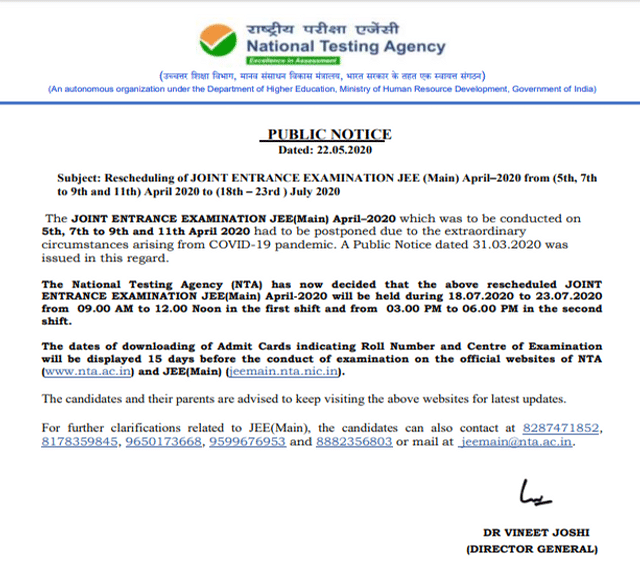
JEE Main 2020- Admit Card Dates
| Events | JEE Main 2020 (January Session) | JEE Main 2020 (April Session) |
|---|---|---|
| Registration | September 3- October 10, 2019 | May 19 – 24, 2020 |
| Application Form Correction Window | October 14 – 20, 2019 | May 25 – 31, 2020 |
| JEE Main Admit Card Date of Release | December 6, 2019 | 1st week of July 2020 |
| Examination Dates | January 6- January 11, 2020 | July 18 – 23, 2020 |
JEE Main 2020 Highlights
| Particulars | Details |
|---|---|
| Issuing Authority | National Testing Agency |
| Official Website | jeemain.nta.nic.in |
| Documents to Carry on Exam Day | JEE Main Admit Card, Valid photo ID proof |
| JEE Main Login Credentials | JEE Main application number and DOB or Password |
| Helpline | jeemain.nta.nic.in |
| Details Mentioned | Applicant’s name, Application number, Roll number, Father’s name, Course name, DOB, Category, Gender, Candidate’s Photograph, State of eligibility, Test city and centre code, Date and shift of examination, Paper type, Important instructions |
How to Download JEE Main Admit Card 2020?
The admit card for April session will be available post March 31, 2020. A link to the JEE Main Admit Card download will be flashed on the home page of the official website. Click on the respective link and proceed to download the hall ticket by following the given steps:
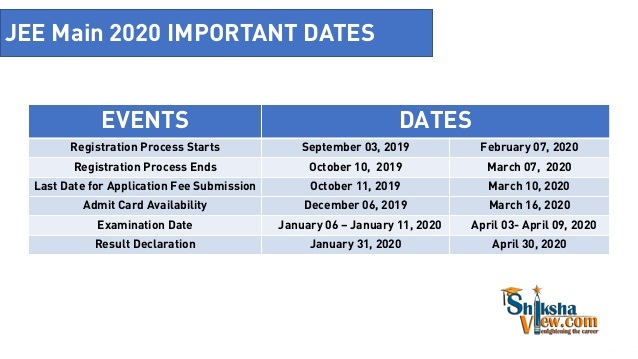
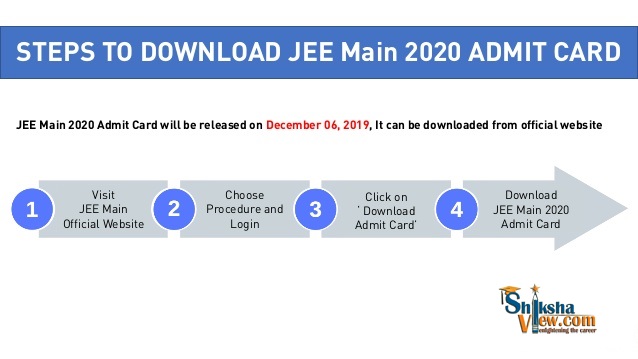
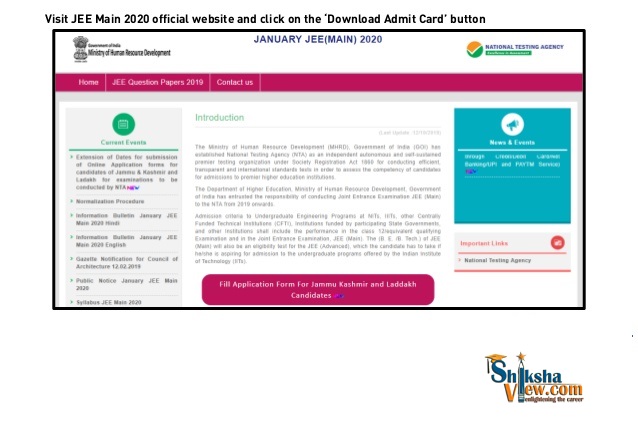
TWO METHODS TO DOWNLOAD JEE MAIN ADMIT CARD
- JEE Main admit card can be downloaded by two methods:
Method 1: Through Application Number and Password
Method 2: Through Application Number and DOB
- Click on any of the option to reach the admit card download screen.
- The procedure to download is given separately for both the options.
1) JEE Main Admit Card 2020 – Download through Application Number and Password
- Go to the official website of JEE Main 2020 – jeemain.nta.nic.in
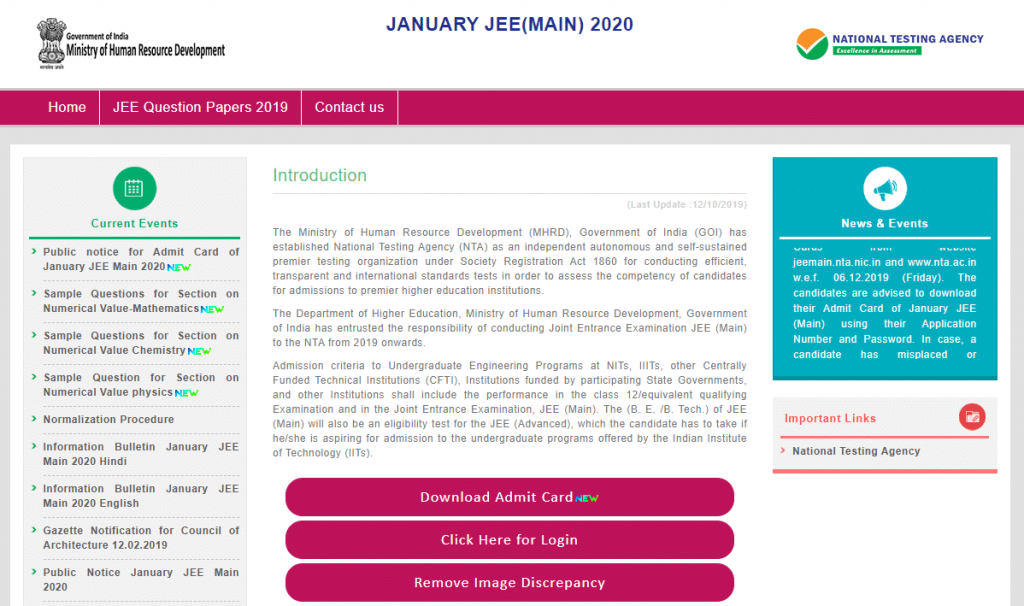
- Click on “Download Admit Card”
- Select the option “Through Application Number and Password”
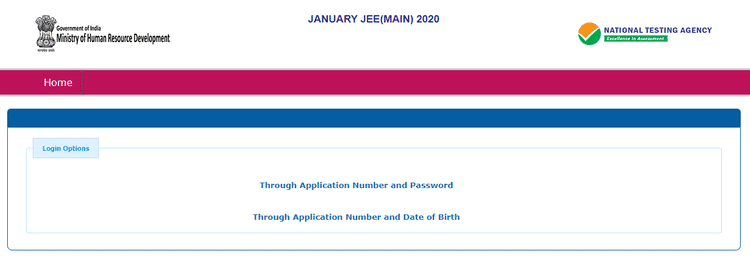
- You have to enter your application number.
- Enter your password.
- Enter the security pin mentioned below and login.
- Use the “Download admit card” button to download the JEE Main admit card and save it.
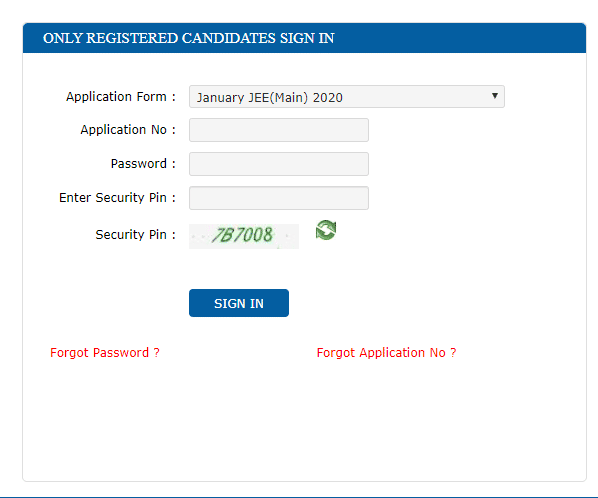
2) JEE Main Admit Card 2020 – Download through Application Number and DOB
- Go to the official website of JEE Main 2020 – jeemain.nta.nic.in
- Click on “Download Admit Card”
- Select the option “Through Application Number and Date of Birth”
- Enter the JEE Main application number
- Enter the date of birth as mentioned in application form
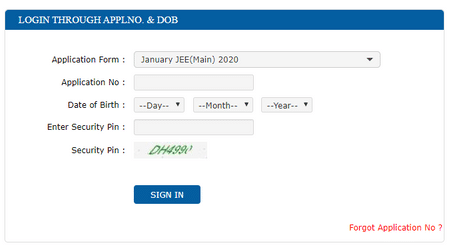
- Enter the security pin given below on the screen to login.
- With the help of the “Download admit card” option, download the admit card of JEE Main and save it for future reference.
JEE Main 2020 Admit Card Sample
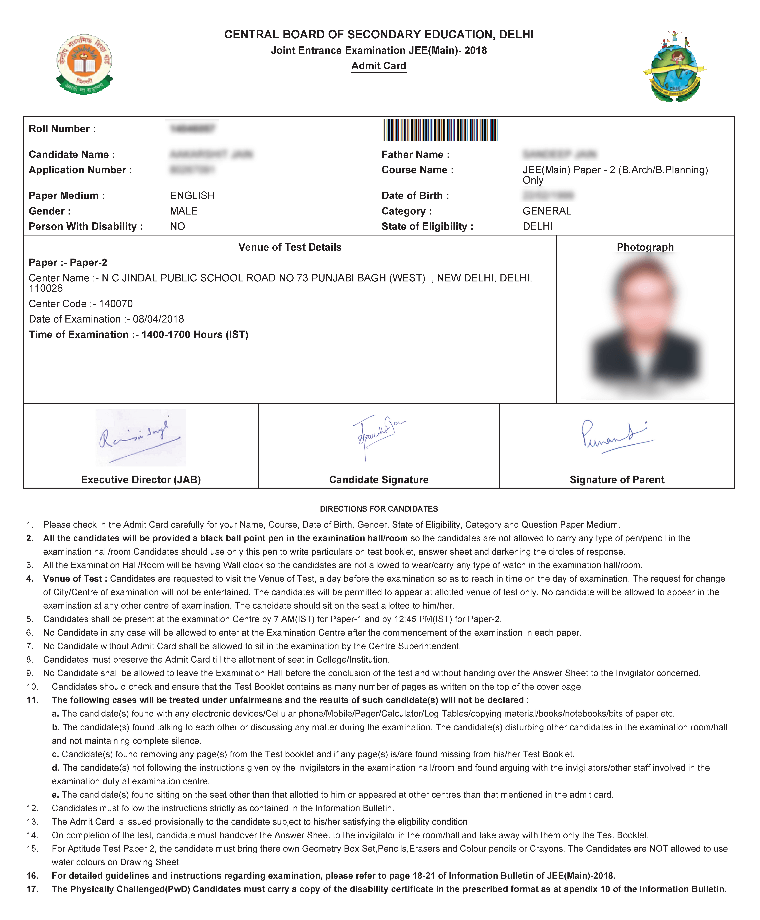
Corrections in JEE Main Admit Card 2020
Crosscheck all the details mentioned in your admit card and If you find any discrepancy in the details given on the admit card, drop a mail at jeemain-nta@gov.in before the stipulated time. JEE Main helpline will become live and active shortly. The details are given below:
Contact Numbers: +7042399520, 7042399521, 7042399525, 7042399526
Email: jeemain-nta@gov.in
Official Website: jeemain.nta.nic.in
Address: National Testing Agency
Block C-20 1A/8 ,Sector- 62
IITK Outreach Centre, Gautam Buddh Nagar
Noida-201309, Uttar Pradesh (India)
Forgot your JEE Main Login ID or Password?
In case you forgot your application number, you can follow the given steps:
Application Number can be recovered through the following steps:
- Go to the sign in page and click on “Forgot Application Number”
- The window that opens will show two options – “Find Application Number”
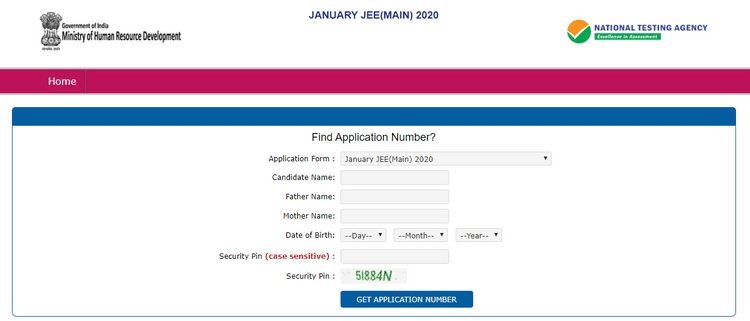
- You will have to enter the following details:Candidate’s NameMother’s NameFather’s NameDate of BirthState of EligibilitySecurity Pin
- The application number will be sent to you and you can use the same to download your admit card.
- Save the details for future reference.
Candidates can follow the steps below to recover their JEE Main password:
- You have to click on “Forgot Password” towards bottom left on the sign in page.
- The window that opens will show two options – “Options available for reset your Password”
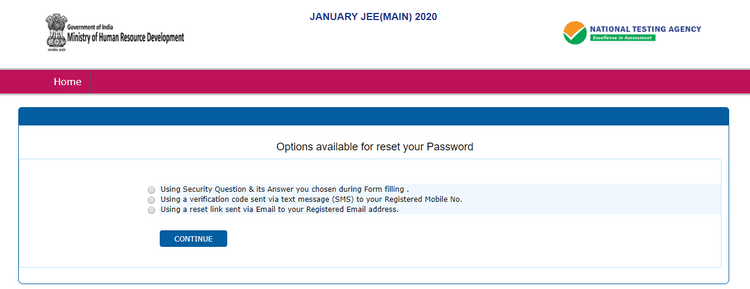
- You have to further choose how to reset your password:
Use the security question.
Use verification code sent via text message (SMS) to the registered mobile number
Use a reset link sent via Email to the registered Email ID
- The link to reset the password will be sent to you depending upon the option you choose.
- You need the password and application number to download your admit card so save the details for future reference.
Documents to carry along with JEE Main 2020 Admit Card
Candidates are required to carry the following documents along with JEE Main Admit Card to the examination center:
| Essential Documents |
|---|
| Passport sized photograph (same as the one used in the application form) |
| Valid Photo ID like Aadhar, Voter ID, Passport, School identity Card, PAN Card, Driving License, Ration Card |
| PwD certificate (if candidates belong to the category) |
JEE Main 2020 – Exam Day Guidelines
Candidates should follow the instructions for exam which are mentioned on their JEE Main 2020 admit card.
- Candidates should reach the exam center at least two hour in advance to the start of exam.
- Candidates are requested to visit the exam center location once prior to the exam to avoid the chaos.
- Candidates should bring all the necessary items which need to be carried to the exam centre.
- Candidates should not bring any prohibited items along with them at the exam centres
- Candidates must not indulge in any unfair means with regard to the exam.
Prohibited Items in the Examination Center- JEE Main 2020
The list of prohibited items in the examination center is tabulated below:
| Items Not Allowed |
|---|
| Electronic gadget/device, Calculator |
| Instrument/ Geometry/ Pencil box |
| Handbag, Purse |
| Any kind of Paper/ Stationery |
| Eatables/ Snacks and Tea/ Coffee/ Cold drinks/ Water (loose or packed) |
| Mobile phone/ Earphone/ Microphone/ Pager |
| Camera, Tape Recorder |
| Any metallic item |
Guidelines for Scribes for JEE Main
- The candidates with disability should fill in the type and percentages of disability correctly in the online JEE Main Application Form. Any incorrect information can affect their candidature.
- Only the candidates, who have 40% or more disability, will be provided Scribe/Reader on the request of the candidate.
- The candidates will have choice of opting their own scribe/reader or may submit the request to the center superintendent.
- After the request of the candidate, the centre superintendent will identify the scribe/reader students for the candidate. This is only task of centre superintendent to choose a scribe for the candidate.
- However, if a candidate requests to meet the scribe before exam, they would be allowed to meet the scribe only a day before the examination to verify whether the scribe is suitable or not.
- One other provision is that 1 hour (60 minutes) compensatory time will be allowed to the candidates with 40% or more disability irrespective of the fact they are availing the facility of a scribe/reader.
Provision for Diabetic Students
Diabetic candidates are allowed to carry eatables and drinks including water bottles inside the exam center, this is done considering the health of diabetic patients in mind. Diabetic candidates must carry the following items in the exam hall:
- Fruits
- Sugar tablets
- Transparent water bottle
Note: Candidates will not be allowed to carry packaged foods such as chips/chocolate/sandwich etc.
About JEE Main Exam Pattern 2020
The exam pattern for JEE Main is defined by the JEE Main 2020 will be conducted for two papers namely Paper 1 (B.E./ B.Tech.) and Paper 2 (B.Arch./ B.Planning). Highlights of paper pattern are tabulated below:
| Specifications | JEE Main 2020 Pattern for B. E/ B. Tech Paper | JEE Main 2020 Pattern for B. Arch Paper | JEE Main 2020 Pattern for B. Planning |
|---|---|---|---|
| Subjects | Physics, Chemistry and Mathematics | Aptitude test, Mathematics and Drawing | Aptitude test, Mathematics and Planning Based Objective Type |
| Type of Questions | MCQs + Numerical Value Based Questions | MCQs + Numerical Value Based Questions + Drawing test | MCQs + Numerical Value Based Questions |
| Medium of Exam | English and Hindi | English and Hindi | English and Hindi |
| Duration of Exam | 3 Hours | 3 Hours | 3 Hours |
| Total Marks | 300 | 400 | 400 |
| Marking Scheme | Each question carries 4 marks For every incorrect response at MCQs, 1 mark will be deducted No negative marking for Numerical Value Based Questions | Each question carries 4 marks For every incorrect response at MCQs, 1 mark will be deducted No negative marking for Numerical Value Based Questions Marks in drawing test will be given as per person’s drawing skills | Each question carries 4 marks For every incorrect response at MCQs, 1 mark will be deducted No negative marking for Numerical Value Based Questions |
JEE Main 2020 Exam Day Schedule
As per NTA’s notice dated May 22, there will be a half an hour variation in the exam timings of the coming session in comparison to the January session. The morning shift for April session will be held from 9.00 AM to 12.00 Noon, and the afternoon shift will be held from 3.00 PM to 6.00 PM.
The details for JEE Main 2020 Exam with the schedule of events for the January session was as follows:
| FACTS | FIRST SHIFT | SECOND SHIFT |
|---|---|---|
| Timings for JEE Main Exam | 9.30 am – 12.30 pm | 2.30 pm – 5.30 pm |
| Entry in the Exam Centre | 7.30 am – 8.30 am | 12.30 pm – 1.30 pm |
| Entry in the Exam Hall | 8.45 am – 9 am | 1.45 pm – 2 pm |
| Admit Card Check by Invigilator | 9 am – 9.15 am | 2 pm to 2.15 pm |
| Instructions of Invigilator | 9.15 am to 9.25 am | 2.15 pm to 2.25 pm |
| Test Starting Time | 9.30 am | 2.30 pm |
| Test Ending Time | 12.30 pm | 5.30 pm |
| Exam Duration | 3 hours | 3 hours |
JEE Main 2020 – Last Minute Tips
JEE Main 2020 cominng session is just around the cornerand the last days before the exam can be very stressful in terms of strategizing for the exam day. Even more so, with the ongoing coronavirus pandemic. Here are some last minute tips for test takers:
- Candidates appearing for JEE Main must have certain strategies for time management, selection of questions and accuracy.
- All these factors are interdependent on each other and essential for a successful attempt.
- Candidates should have clarity on how many questions they aim to attempt. They should also have a rough picture on what topics they can or can not attempt.
- Aiming to solve the entire paper will only lead to disruption of clarity therefore a sequence of attempting the question paper must be chosen as per one’s own convenience.
- Attempting Chemistry first can be beneficial as the questions can be addressed quicker so aspirants can have more time to attempt Physics and Mathematics sections.
- Candidates must try to attempt graph-based questions as they are easy in terms of attempting. They can be approached with different parameters like inserting values etc to eliminate wrong options.
JEE Main Admit Card FAQs
Ques. When will JEE Main Admit Card for the coming session be released?
Ans. JEE Main Admit Card for the coming session was due for March 20, 2020. However, the release has been delayed due to the current situation of the country in terms of the COVID-19 pandemic. The admit card will only be released once there is some clarity on the exam dates for the coming session. As of now, the admit card release date has not been disclosed by NTA.
Ques. I am facing problems while downloading JEE Main Admit Card. What should I do?
Ans. Candidates having problems in downloading JEE Main Hall Ticket due to problems related to discrepancy/mismatch in their name as compared with their board data, then a correction facility will be provided. Using the correction facility, the candidates will be able to correct their name in JEE Main Form as per the board data. The candidates will be able to download the document after making the necessary corrections.
Ques. My name is written as “Manoj Kumar” in Aadhaar card, and in my class 10th certificate the name reads, “ Manoj Kumar Gopal”, what name will come on my admit card?
Ans. Manoj Kumar will come on your admit card as the Aadhar card name is the accepted name on your ID.
Ques. I do not have internet, can I get my JEE Main admit card through post?
Ans. No, you cannot get your JEE Main admit card through post.
Ques. I have lost my admit card, how will I get my JEE Main result?
Ans. You need to login to the systems with your roll number and password, which are stored on your email, just check in your personal mail id, else send an email on helpline to get your credentials.
Ques. What things can I carry inside the exam hall?
Ans. You can carry only the basic stationery allowed inside the exam hall as per the directives, no electronic gadgets/books/ calculators can be carried in the exam hall.
Ques. What is the helpline number for JEE Main admit card?
Ans. Helpline No.- 1800 112211 OR 18004253800
Ques. My name spelling is incorrect on the admit card, what should I do?
Ans. Contact the authorities at the helpline number, to get it corrected.
Ques. I have lost my admit card, how can I get its duplicate copy?
Ans. Login to the JEE application portal and repeat the process for downloading JEE Main admit card.
Ques. My photo is blurred in admit card, what to do, I want a new one?
Ans. You must contact the authority at the helpline numbers, then only you will get a new admit card with a better quality photo.
Ques. At what time should I report at the JEE exam center?
Ans. You must report at least 2 hours 30 minutes before the commencement of exam at the exam center.
Ques. What things can I carry with admit card on JEE Main exam day?
Ans. You need to carry following items on the exam day:
- JEE Main Admit Card
- Copy of PwD certificate (if applicable)
- Government-issued Identity proof
Ques. I am writing JEE paper 2, can I carry my personal stationery?
Ans. Yes, you have to carry your stationery as per the list below:
- Clipboard
- Geometry box
- Pencils
- Erasers
- Color pencils
Ques. Do I have to go through biometric verification if I appear for JEE main exam?
Ans. Yes, you will have to appear for the biometric verification process on the exam day.
Ques. Do I need to carry my OBC certificate along with my JEE admit card?
Ans. No, you do not have to carry your Caste Certificate along with the JEE admit card on the day of exam.
Ques. I have applied for JEE main and B.Arch course, do I need to get separate admit cards for both?
Ans. Yes, separate admit cards are needed for both the exams.
Ques. I am from Assam, do I need to carry my DL along with JEE admit card on exam date?
Ans. Yes, you need to carry your DL along with the JEE Main admit card.
Ques. What details do I need to download the admit card?
Ans. The details required to download the admit card are: JEE Main Application Number, Date of Birth and Security Pin.
Ques. If I forget my JEE Main hall ticket, on exam day, can I get a duplicate at the exam center?
Ans. No, you cannot get a duplicate copy of the hall ticket at the exam center.
Ques. Can I obtain JEE Main Hall Ticket from an offline source?
Ans. No, you can only download JEE Main Admit Card from nta.ac.in
Ques. What if I can’t download my JEE Main Admit Card 2020. What should I do?
Ans. If you are unable to download the hall ticket due to the occurrence of any error, a correction facility will be provided to correct the same. If still, the problem continues, contact the authorities immediately.
If you’re facing some technical issues regarding the download of JEE Main admit card, then you should probably restart your browser or try again after clearing the caches. If the site is crashing, then try downloading the admit card at some other hour.
Ques. If I lose my JEE Main Admit Card. What should I do?
Ans. If by some unfortunate event you happen to lose your JEE Mains Admit Card, do not worry. You can go back to the official website of JEE Main and download and reprint your admit card by logging in your candidate’s profile till the exam day.
Ques. Is there any dress code for JEE Main 2020?
Ans. There is no specific dress code for JEE Main 2020. However, it is suggested not take the following things along with you in the examination hall:
- Any electronic item (Including wristwatch)
- Sunglasses
- Any jewel or ornaments
- Belts
- Full sleeves shirts/t-shirts
- Shoes (Only sandals or slippers are permitted)
Ques. What should I do if the name of father/ mother is not exactly same as in school records or the address mentioned in Aadhaar has been changed due to transfer or some other reason?
Ans. If these particulars are not being matched with the ones mentioned on Aadhaar, the candidates should correctly fill these particulars as per school records. The present/permanent address may also be filled accordingly since CBSE does not send any communication on the candidates’ address.
PUNJAB NEET 2020 PROVISIONAL MERIT LIST – ROUND 1st
Code 11
Code 11 Open CategoryCode 12
Code 12 SC CategoryCode 13
Code 13 BC CategoryCode 14
Code 14 BA CategoryCode 15
Code 15 Border Area CategoryCode 16
Code 16 Persons with Disability -PWD CategoryCode 18.2
Code 18.2 Grand-children of persons killed in terrorist actions in Punjab CategoryCode 19
Code 19 Children/Grandchildren of persons of terrorist affected/displaced persons CategoryCode 21
Code 21 Children/Grandchildren of Sikh riot affected/displaced persons CategoryCode 22-25
Code-22-25 Armed Forces Personnel Defence CategoryCode 26.1-26.8
Code-26.1-26.8 Armed Forces Personnel Defence CategoryCode 27
Code-27 Armed Forces Personnel Defence CategoryCode 29
Code-29 Armed Forces Personnel Defence CategoryCode 31-33
Code-31-33 Ward of Punjab Police Personnel, Punjab Armed Police, Punjab Home Guards and Para Military ForcesCode 34
Code-34 Children/Grand Children of Freedom FightersCode 35
Code-35 Migrants from Jammu & Kashmir due to terrorist ViolenceCode 36
Code-36 Economically Weaker SectionChristian Minority Quota
Christian Minority Quota (Eligible Candidates) Category with Service Commitment in CMC/CDC Ludhiana Qualified the Bible TestSikh Minority Quota
Sikh Minority Quota (Eligible candidates) NOT QUALIFIED STUDENT LIST IN NEET 2020 ROUND 1st
Ineligible Sikh Minority List
Sikh Minority Quota (Not Eligible Candidates)Ineligible Christian Minority List
Christian Minority Quota (Ineligible Candidates) Category with Service Commitment in CMC/CDC Ludhiana Qualified the Bible Test Revised Provisional Merit List
Revised Sikh Minority List
Revised Provisional Merit List of Sikh MinorityRevised Christian Minority List
Revised Provisional Merit List of Christian MinorityNEET Appeared Candidates in 2020
NRI Seats in NEET 2020
NEET Not Appeared Candidates in 2020
NEET Qualified Students in 2020

Apply Now
Our Popular Courses
- Top Demanded
B.Tech Computer Science & Engineering
- ₹96000/- per Year
B.Tech Electronics & Communication Engineering
- ₹96000/- per year
B.Tech Electrical Engineering Course
- ₹96000/- per year
B.Tech Civil Engineering Course
- ₹80000/- Per Year
B.Tech Mechanical Engineering
- ₹60000/- Per Year
BMRIT – Bachelor of Medical Radiology
NEET Ranked LIST – 2020 ROUND 1st
Andhra Pradesh NEET Ranked List
Assam NEET Ranked List
Telangana NEET Ranked List
Uttarakhand NEET Ranked List
Himachal Pradesh NEET Ranked List
Haryana NEET Ranked
Punjab NEET Ranked List
Uttar Pradesh NEET Ranked List
Bihar NEET Ranked List
Jharkhand NEET Ranked List
Chhattisgarh NEET Ranked List
Goa NEET Ranked List
Jammu & Kashmir NEET Ranked
Karnataka NEET Ranked
Kerala NEET Ranked List to be announced
Maharashtra NEET Ranked List
Madhya Pradesh NEET Ranked List
Manipur NEET Ranked List
Odisha NEET Ranked List
Rajasthan NEET Ranked List to be announced
Chandigarh NEET Ranked List to be announced
Gujrat NEET Ranked List to ne announced
West Bengal NEET Ranked List to be announced
Tamil Nadu NEET Ranked List to be announced
NEET UG Counselling 2020: Dates, Schedule, Registration Process, Seat Matrix, Merit List
NEET 2020 Counselling: The Medical Counselling Committee has announced dates for NEET counselling 2020 dates for AIQ, central university seats at mcc.nic.in
NEET UG 2020 Counselling Schedule: The Medical Counselling Committee has announced the complete counselling schedule of NEET 2020, for 15% all India quota (AIQ) and seats offered by Central and Deemed Universities, AIIMS and JIPMER institutes. Registration, payment and choice filling for the first round of NEET 2020 counselling will be held from October 27 to November 2, 2020 and seat allotment result will be announced on November 5, 2020. The second round of counselling will start on November 18.
The mop-up round for Central and Deemed universities, AIIMS and JIPMER institutes will start on December 10.
NEET 2020 Counselling Date
| Round 1 | ||||
| Registration, Payment and Choice Filling | Choice Filling and Locking | Processing of Seat Allotment | Result | Reporting |
| Oct 27 to Nov 2 | Oct 28 to Nov 2 | Nov 3 to 4 | Nov 5 | Nov 6 to 12 |
| Round 2 | ||||
| Nov 18 to 22 | Nov 19 to 22 | Nov 23 to 24 | Nov 25 | Nov 26 to Dec 2 |
| Mop-Up Round for Central/Deemed Universities/ESIC/ AIIMS and JIPMER | ||||
| Dec 10 to 14 | Dec 11 to 14 | Dec 15 to 16 | Dec 17 | Dec 18 to 24 |
Check the official notification
To check the NEET counselling 2020 schedule, visit the MCC official website and click on the UG counselling section.
The Directorate General of Health Sciences (DGHS) will hold NEET 2020 counselling, for 15% AIQ seats, on behalf Medical Counselling Committee (MCC). For state quota seats, NEET UG 2020 counselling will be held by respective state authorities.
The Medical entrance exam NEET was held on September 13 for over 14 lakh registered candidates. For candidates who could not appear in the National Eligibility cum Entrance Test, a special exam was conducted on October 14.
NEET result for both the phases was declared on October 16. Out of the total candidates who appeared in NEET 2020, 56.44% have qualified.
NEET Counselling Seat Matrix 2020 by MCC Official
| Particular | Seat matrix round -1 |
| The final seat matrix for R1 AIQ MBBS | Click Here |
| The final seat matrix for R1 JIPMER MBBS | Click Here |
| The final seat matrix for R1 AIIMS MBBS | Click Here |
| The final seat matrix for R1 AMU MBBS | Click Here |
| The final seat matrix for R1 BHU MBBS | Click Here |
| The final seat matrix for R1 BHU BDS | Click Here |
| The final seat matrix for R1 AMU BDS | Click Here |
| The final seat matrix for R1 JAMIA BDS | Click Here |
| The final seat matrix for R1 DU and IP ESIC DEL BDS | Click Here |
| The final seat matrix for R1 DEEMED BDS | Click Here |
| The final seat matrix for R1 AIQ BDS | Click Here |
| The final seat matrix for R1 DU AND VMMC ABVIMS MBBS | Click Here |
| The final seat matrix for R1 DEEMED MBBS | Click Here |
Read Also :
NEET Application – Correction Window
NEET Study Material – Free Download PDF Notes
Neet Reservation For OBC-EWS-SC-ST-General
NEET Chemistry Chapter Wise Weightage
NEET Chapter Wise Weightage of Physics, Chemistry and Biology
NEET Chemistry Important Topic with Chapter Wise Weightage

Apply Now
Our Popular Courses
- Top Demanded
B.Tech Computer Science & Engineering
- ₹96000/- per Year
B.Tech Electronics & Communication Engineering
- ₹96000/- per year
B.Tech Electrical Engineering Course
- ₹96000/- per year
B.Tech Civil Engineering Course
- ₹80000/- Per Year
B.Tech Mechanical Engineering
- ₹60000/- Per Year
BMRIT – Bachelor of Medical Radiology
Top Examinations
KARNATAKA NEET 2020 PROVISIONAL MERIT LIST – ROUND 1st
Karnataka State
Provisional Verified Final List of Eligible Candidates KarnatakaNon Karnataka State
Provisional Verified Final List of Eligible Candidates Non Karnataka StateNEET Appeared Candidates in 2020
NRI Seats in NEET 2020
NEET Not Appeared Candidates in 2020
NEET Qualified Students in 2020

Apply Now
Our Popular Courses
- Top Demanded
B.Tech Computer Science & Engineering
- ₹96000/- per Year
B.Tech Electronics & Communication Engineering
- ₹96000/- per year
B.Tech Electrical Engineering Course
- ₹96000/- per year
B.Tech Civil Engineering Course
- ₹80000/- Per Year
B.Tech Mechanical Engineering
- ₹60000/- Per Year
BMRIT – Bachelor of Medical Radiology
NEET Appeared Candidates in 2020
NRI Seats in NEET 2020
NEET Not Appread Candidates in 2020
NEET Qualified Students in 2020
NEET Ranked LIST – 2020 ROUND 2nd
Andhra Pradesh NEET Ranked List- 2nd Round
Assam NEET Ranked List- 2nd Round to be Announced
Telangana NEET Ranked List- 2nd Round to be Announced
Uttarakhand NEET Ranked List- 2nd Round to be Announced
Himachal Pradesh NEET Ranked List- 2nd Round to be Announced
Haryana NEET Ranked List- 2nd Round to be Announced
Punjab NEET Ranked List- 2nd Round to be Announced
Uttar Pradesh NEET Ranked List- 2nd Round
Bihar NEET Ranked List- 2nd Round to be Announced
Jharkhand NEET Ranked List- 2nd Round to be Announced
Chhattisgarh NEET Ranked List- 2nd Round to be Annonced
Goa NEET Ranked List- 2nd Round
Jammu & Kashmir NEET Ranked List- 2nd Round to be Announced
Karnataka NEET Ranked List- 2nd Round to be Announced
Kerala NEET Ranked List- 2nd Round to be announced
Maharashtra NEET Ranked List- 2nd Round to be Announced
Madhya Pradesh NEET Ranked List- 2nd Round to be Announced
Manipur NEET Ranked List- 2nd Round to be Announced
Odisha NEET Ranked List- 2nd Round to be Announced
Rajasthan NEET Ranked List- 2nd Round to be announced
Chandigarh NEET Ranked List- 2nd Round to be announced
Gujrat NEET Ranked List- 2nd Round to ne announced
West Bengal NEET Ranked List- 2nd Round to be announced
Tamil Nadu NEET Ranked List- 2nd Round to be announced

Apply Now
Our Popular Courses
- Top Demanded
B.Tech Computer Science & Engineering
- ₹96000/- per Year
B.Tech Electronics & Communication Engineering
- ₹96000/- per year
B.Tech Electrical Engineering Course
- ₹96000/- per year
B.Tech Civil Engineering Course
- ₹80000/- Per Year
B.Tech Mechanical Engineering
- ₹60000/- Per Year
BMRIT – Bachelor of Medical Radiology
BD Chaurasia Human Anatomy
BD Chaurasia Human Anatomy PDF Free Download [ All Volume 1, 2 , 3]
NETTER’S ATLAS OF HUMAN ANATOMY
NETTER’S ATLAS OF HUMAN ANATOMY PDF Free Download [ All Volume 1, 2 , 3, 4 , 5 , 6 , 7]
| NEET MERIT LIST – 2020 | |
|---|---|
| NEET MERIT LIST – ROUND 1 | PROVISIONAL |
| NEET MERIT LIST | |
| NEET MERIT LIST – ROUND 2 | PROVISIONAL |
| EXAM – 2020 | EXAM – 2021 |
|---|---|
| JEE MAINS – 2020 Admit Card | JEE MAINS – 2021 |
| JEE ADVANCE – 2020 | JEE ADVANCE – 2021 |
| EXAM – 2020 | EXAM – 2021 |
|---|---|
| GATE -2020 | GATE -2021 |
Management Aptitude Test – MAT EXAM
| EXAM – 2023 | EXAM – 2022 | EXAM – 2021 | EXAM – 2020 |
|---|---|---|---|
| MAT Exam – 2023 | MAT Exam – 2022 | MAT Exam – 2021 | MAT Exam – 2020 |
Read Also :
TOP MANAGEMENT COLLEGES IN INDIA
NEET UG Counselling 2021: Dates, Schedule, Registration Process, Seat Matrix, Merit List
NEET 2021 was conducted on September 12, and the results were out on Nov 1st. Some major changes are made by MCC and approved by the Supreme court in the NEET counseling and admission process that candidates should be well aware of, which we have covered in this article.
Now that NEET results are out, students are eagerly waiting for the NEET Counseling process to begin. MCC (Medical Counselling Committee) has made a statement that NEET UG & PG counseling dates will soon be announced anytime after the 6th of January. MCC is responsible for conducting the NEET counseling process on behalf of DGHS (Directorate General of Health Sciences) for facilitating the allocation of NEET seats at the State and All India Level (AIQ).
There were also some big changes introduced by MCC and DGHS (Directorate General of Health Sciences), which will be applicable for 15% of UG seats and 50% of PG seats that fall under the central pool. The changes made are here to stay as the Supreme Court showed no objection and has approved the New Counseling Scheme.
Here is a list of changes made by MCC that every NEET candidate should be aware of:
- From now onwards there will be four rounds of NEET counseling – AIQ Round 1, AIQ Round 2, AIQ Mop-up Round, and AIQ Stray Vacancy Round.
- Fresh registrations will only be welcomed during the first three rounds and not the final round.
- The option of free exit and up-gradation can only be availed during the AQI round 1 of NEET counseling 2021.
- Candidates who join allocated seats in AQI rounds 1, 2, 3, or 4 will not be eligible to resign. They will also not be allowed to participate in further counseling rounds.
- Candidates who do not join the seats in Round 2 would still be eligible to participate in further rounds of NEET 2021 counseling but they will have to do a fresh registration, which will only take place in the mop-up round.
- Earlier the left out seats were reverted back to states which will now continue to be filled during the Mop-up and stray vacancy round of NEET counseling.
Reservation of AIQ Seats in NEET 2021
| Category | Reservation % |
| SC (Scheduled Caste) | 15% |
| ST (Scheduled Tribe) | 7.5% |
| PwBD (Person with Benchmark Disability) | 5% (Horizontal Reservation) |
| OBC (Non-Creamy Layer) | 27% in National Institutes/CentralUniversities |
| EWS (Economically Weaker Section) | 10% in National Institutes/Central Universities |
Courses Offered Through NEET
- BDS (Bachelor of Dental Surgery)
- BAMS (Bachelor of Ayurvedic Medicine and Surgery)
- BSMS (Bachelor of Siddha Medicine and Surgery)
- BHMS (Bachelor of Homeopathic Medicine and Surgery)
- BUMS (Bachelor of Unani Medicine and Surgery)
- BSc Nursing (Honors)
- MBBS (Bachelor of Medicine and Bachelor of Surgery)
Number of Available Seats in Each Course
| Courses | Total Number of Seats |
| Medical Colleges | 554 |
| Dental Colleges | 315 |
| MBBS Seats | 83,075 |
| BDS Seats | 27,285 |
| BAMS Seats | 52,720 |
| BVSC & AH Seats | 525 |
Eligibility Criteria for NEET 2021 Counseling
- Must have qualified NEET exam
- Should be registered on MCC’s official website.
- Candidates from UT of J&K are also eligible for participating in the counseling process.
Eligibility Criteria for Central Universities
| Central Universities | Seat Scheme | Eligibility Criteria |
| Delhi University (MAMC, LHMC, UCMS) | 15% seats for colleges affiliated with the University of Delhi | Candidates who have passed Class 11th & 12th from schools located in Delhi will be eligible to apply for 85% of these seats. |
| Faculty of Dentistry, Jamia Millia Islamia | The institute has a total of 50 seats for BDS, out of which 47 will be availed via MCC NEET counseling. The remaining three will be filled under the institutional quota. | The institutional quota seats can only be occupied by candidates who have passed Class 11th & 12th from JMI institutes. |
| Aligarh Muslim University (AMU) | 50% of seats are reserved by the institute itself. The remaining 50 percent will be filled via MCC NEET counseling. | Candidates who studied for 3 consecutive years in AMU can avail themselves institutional quota. |
| Banaras Hindu University (BHU) | 15% seats | Candidates who fulfill the basic eligibility criteria for NEET counseling by MCC can apply for these seats. |
Qualified candidates who want to participate in the counseling process in Central Universities/Deemed Universities/ESIC colleges must register online on MCC’s official website.
Registration Process for NEET Counseling
-
- Candidates should register on the official MCC website– www.mcc.nic.in
- They will be required to fill in a lot of details like name, personal details, academic details as per their NEET result, and registration no.
- They will also have to pay registration fees for NEET counseling.
Registration Fee for NEET counseling by MCC
| Category | Fee (in INR) | |
| Non- Refundable Fee | ||
| 15 percent AIQ/ Central Universities | General Category | 1,000 |
| OBC/ PWD/SC/ ST/ | 500 | |
| Deemed Universities | All categories have to pay the same fee | 5,000 |
| Refundable Fee | ||
| 15 percent AIQ/ Central Universities | General Category | 10,000 |
| SC/ ST/ OBC/ PWD | 5,000 | |
| Deemed Universities | All categories will have to pay the same fees | 2,00,000 |
NEET Counselling Seat Matrix 2021 by MCC Official
| Particular | Link Here |
| FINAL SEAT MATRIX FOR ROUND 1 DU IP AND JIPMER INTERNAL Puducherry UT | Click Here |
| FINAL SEAT MATRIX AIIMS JIMPER AND BHU FOR MBBS ROUND 1 | Click Here |
| FINAL AMU QUOTA SEAT MATRIX FOR BDS SEATS | Click Here |
| FINAL SEAT MATRIX FOR ROUND 1 JAMIA MILLIA ISLAMIA (BDS) | Click Here |
| FINAL SEAT MATRIX FOR ROUND 1 DU IP AND BHU (BDS) | Click Here |
| FINAL SEAT MATRIX FOR ROUND 1 DEEMED UNIVERSITIES (BDS) | Click Here |
| FINAL AIQ SEAT MATRIX UG 2021 (BDS) | Click Here |
| FINAL SEAT MATRIX FOR BSC NURSING 2021 | Click Here |
| FINAL AMU QUOTA SEAT MATRIX FOR MBBS | Click Here |
| FINAL ESIC INSURED PERSON SEAT MATRIX FOR MBBS | Click Here |
| FINAL SEAT MATRIX FOR ROUND 1 DEEMED UNIVERSITIES (MBBS) | Click Here |
| FINAL AIQ SEAT MATRIX FOR UG 2021 (MBBS) | Click Here |
| Stray Vacancy Round | |
| Stray Vacancy Round Seats | Click Here |
| 2nd Mop-Up BDS Round | |
| 2nd Mop-Up BDS Round Seat Matrix for Deemed | Click Here |
| 2nd Mop-Up BDS Round Seat Matrix for AIQ | Click Here |
| MCC NEET UG Round 1 Seat Allotment Result (Out) | Click Here |
| MCC NEET Counselling Final Seat Allotment Result (Out) | Click Here |
MCC NEET UG 2021 2nd Round Results
| Candidates List Upto Round 2 in MBBS/BDS & BSc Nursing | Click Here |
| MCC NEET UG Provisional 2nd Result | Click Here |
| MCC NEET UG Covid Warrior Result | Click Here |
| MCC NEET UG Final 2nd Result | Click Here |
| MCC NEET UG Provisional Mop-Up Result | Click Here |
| MCC NEET UG Final Mop-Up Result | Click Here |
| 2nd Mop-Up BDS Round Provisional Result (Out) | Click Here |
| Stray Vacancy BDS Round Provisional Result | Click Here |
| Stray Vacancy BDS Round Final Result | Click Here |
MCC NEET 2021 Counselling Notice & Withdrawal Seats
| Particular | Link Here |
|---|---|
| Notice and Merit List of Delhi State Quota | Click Here |
| Notice for withdrawal of seats of ESIC, Bengaluru | Click Here |
MCC NEET UG Counselling 2021 Vacancy Position for Round 2
| Particular | Link Here |
|---|---|
| Virtual Vacancy In Round 2 UG Counselling 2021 | Click Here |
| Total Vacancy In Round 2 UG Counselling 2021 (B.Sc. Nursing) | Click Here |
| Total Vacancy includes New Seats In Round 2 UG Counselling 2021 (BDS) | Click Here |
| Total Vacancy includes New Seats In Round 2 UG Counselling 2021 (MBBS) | Click Here |
List of Courses & Seats under NEET UG 2021
| Course name | NEET seats |
| Bachelor of Medicine and a Bachelor of Surgery (MBBS) | 83,075 |
| Bachelor of Dental Surgery (BDS) | 27,285 |
| Bachelor of Ayurvedic Medicine and Surgery (BAMS) | 52,720 (AYUSH) |
| Bachelor of Homeopathic Medicine and Surgery (BHMS) | |
| Bachelor of Naturopathy and Yoga Sciences (BNYS) | |
| Bachelor of Unani Medicine and Surgery (BUMS) | |
| Bachelor of Siddha Medicine and Surgery (BSMS) | |
| Bachelor of Veterinary Science and Animal Husbandry (BVSc & AH) | 525 |
Read Also :
NEET Application – Correction Window
NEET Study Material – Free Download PDF Notes
Neet Reservation For OBC-EWS-SC-ST-General
NEET Chemistry Chapter Wise Weightage
NEET Chapter Wise Weightage of Physics, Chemistry and Biology
NEET Chemistry Important Topic with Chapter Wise Weightage

Apply Now
Our Popular Courses
- Top Demanded
B.Tech Computer Science & Engineering
- ₹96000/- per Year
B.Tech Electronics & Communication Engineering
- ₹96000/- per year
B.Tech Electrical Engineering Course
- ₹96000/- per year
B.Tech Civil Engineering Course
- ₹80000/- Per Year
B.Tech Mechanical Engineering
- ₹60000/- Per Year
BMRIT – Bachelor of Medical Radiology
Top Examinations
Free download NEET study material for Physics, Chemistry, Biology and start preparation for NEET exam with Shiksha View. For assistance call at +91-8126030103 or write us an email at info@shikshaview.com. NEET exam will be conducted on dated 12th September. You can download free NEET short notes. You can also download NEET syllabus and NEET previous question papers
Why should you Download NEET Question Papers?
There are various students who don’t prefer studying from the NEET previous years’ question paper. Well, there are multiple benefits why should one have all the previous years’ question papers, let’s have a look:
Time Management: There are numerous students who are not able to submit a complete answer sheet and that’s the reason they end up losing marks. When you practice from the previous years’ question paper, you get a chance to learn about time management. The NEET paper is lengthy, and if you don’t practice it might be possible that you fail to answer the entire question paper. The best way to save oneself from this situation is a practice from the NEET 2020 paper along with the Answer Key Pdf
Learning about the exam Pattern: You will be appearing for one of the most difficult exams of the country, you need to be aware of the question paper pattern, and the best way you can get to examine the question paper is with the help of previous years’ question paper. As you practice you will get to understand the NEET Exam Pattern, how the questions are framed, the marking strategy, and a lot more. It is the best way to boost your preparation strategy.
Best Study Materials for NEET preparation
The first category of study material for NEET preparation is for beginners. However, these three will remain constant during the entire preparation.
NCERT Books
The first book that every NEET aspirant must pick is NCERT books. They not only build the foundation for NEET preparation but will also come in handy during revisions. NCERT Exemplars are also a must-do for NEET.
Revision Notes
Next are the notes that a student prepares during the lectures or self-study. Revision notes are an essential part of NEET preparation and are the best study material for its preparation. Revision notes are custom made, therefore, they are in the language that a candidate understands best.
Previous years’ question papers (Solved)
Many do not consider NEET question papers in the category of study materials. But, the knowledge gained by attempting or referring to the question papers of previous years is precious and cannot be imparted by any other method. Refer to the question papers along with their solutions. These will not only help understand the NEET exam pattern better but will also provide exposure to a variety of questions that are asked in the examination. Also, many questions in the Biology section of NEET are repeated year after year.
Best study materials for NEET preparation: Subject-wise recommendations
After completing the above study material for NEET preparation, a student may start referring to other books. Most students join a coaching centre for NEET preparation. Every coaching institute provides its own NEET study material. Apart from referring to the coaching institute’s study material, students must also refer to the books that are suggested by experts and have been tried by toppers. These NEET books will be helpful to only those who have a stronghold on the NEET syllabus.
Best study material for NEET Biology
The following list of books is the most preferred for NEET Biology preparation.
- G R Bathla’s Objective Biology (Volume 1 & 2)
- Pradeep’s-A Textbook for Biology (Class 11 and 12)
- Dinesh Objective Biology (Volume 1, 2, and 3), K N Bhatia
- Trueman’s Objective Biology (Volume 1 and 2)
Also Read: Best books for NEET Biology
Best study material for NEET Physics
Know the list of top books for NEET Physics preparation.
- Concepts of Physics, H C Verma
- Fundamentals of Physics, Halliday, Resnick and Walker
- Physics MCQ, Deb Mukherji
- Objective Physics for NEET (Volume 1 and 2), D C Pandey
Also Read: Best books for NEET Physics
Best study material for NEET Chemistry
The top books for NEET Chemistry preparation are as follows:
- Physical Chemistry, O P Tandon
- Concise Inorganic Chemistry, J D Lee
- Modern ABC of Chemistry of Classes 11 and 12 (Volume 1 and 2), S P Jauhar
- Objective NCERT at your fingertips, MTG
- Oxford’s Organic Chemistry
Also Read: Best books for NEET Chemistry
NEET Study Material: Frequently Asked Questions (FAQs)
Q. Can I prepare for NEET with only NCERT books?
A. Yes, you can clear NEET if you are thorough with NCERT books. However, you must also solve the previous years’ question papers to improve your chances.
Q. Can I download the study material for NEET online?
A. Yes, the study material is available for NEET is available online and most of it is free.
Q. Where can I appear for NEET mock tests for free?
A. Candidates can take mock tests for NEET on the official website of NTA or, they can take the tests here.
Q. Is it mandatory to refer to coaching class NEET study material to clear the exam?
A. No, candidates can clear NEET if they are thorough with the NCERT books. It is not mandatory to refer to the study material of coaching classes to clear NEET.
Read Also :
NEET Application – Correction Window
NEET Study Material – Free Download PDF Notes
Neet Reservation For OBC-EWS-SC-ST-General
NEET Chemistry Chapter Wise Weightage
NEET Chapter Wise Weightage of Physics, Chemistry and Biology
NEET Chemistry Important Topic with Chapter Wise Weightage

Apply Now
Our Popular Courses
- Top Demanded
B.Tech Computer Science & Engineering
- ₹96000/- per Year
B.Tech Electronics & Communication Engineering
- ₹96000/- per year
B.Tech Electrical Engineering Course
- ₹96000/- per year
B.Tech Civil Engineering Course
- ₹80000/- Per Year
B.Tech Mechanical Engineering
- ₹60000/- Per Year
BMRIT – Bachelor of Medical Radiology
Top Examinations
NEET Syllabus 2021 comprises three subjects – Physics, Chemistry and Biology. Topics covered in these three subjects from Class 10 to Class 12 are included in the syllabus of NEET 2021. Candidates who wish to appear for the examination are advised to go through the NEET syllabus 2021 before starting their preparation. In this article, we have divided the syllabus of NEET 2021 into two parts, that is, the topics covered in Class 11 and those covered in Class 12. According to NTA, the NEET 2021 syllabus will remain unchanged from that of the previous years. Along with the NEET syllabus, this article also includes a list of the books suggested by experts and toppers. Read the complete article to get all the information about the NEET syllabus, chapter-wise weightage and the best books. Aspirants can also download the NEET 2021 syllabus in PDF format here on this page. NEET 2021 has been postponed to September 12 from August 1.
A day after announcing that the NEET 2021 will be conducted based on the CBSE reduced syllabus, on January 19, 2021, the former Education Minister Ramesh Pokhriyal has clarified by saying, “As the curriculum (for board exams) was cut by 30 per cent due to COVID-19, therefore in the upcoming competitive NEET 2021 exam the candidates will have more options to answer the questions”.
Change in Structure of NEET 2021 Exam
Although the NEET 2021 syllabus has remained the same, the structure of the NEET question paper has been changed. Each subject will consist of two sections. Section A will consist of 35 Questions and Section B will have 15 questions, out of these 15 Questions, candidates can choose to attempt any 10 Questions. So, the total number of questions and utilization of time will remain the same. The below table will help candidates understand better.
| Sections | Number of Questions | Total Marks |
|---|---|---|
| Physics Section A | 35 | 140 |
| Physics Section B | 15 | 40 |
| Chemistry Section A | 35 | 140 |
| Chemistry Section B | 15 | 40 |
| Botany Section A | 35 | 140 |
| Botany Section B | 15 | 40 |
| Zoology Section A | 35 | 140 |
| Zoology Section B | 15 | 40 |
To Download the PDF file of the latest NEET syllabus 2021, click on the link given below
NEET 2021 Syllabus – Free Download ![]()
Also Read …
NEET Chemistry Chapter Wise Weightage
PHYSICS SYLLABUS FOR NEET (CLASS XI )
| S.No. | Class XI | Weightage* |
|---|---|---|
| 1 | Physical-world and measurement | 2% |
| Chapter–1: Physical World | ||
| Chapter–2: Units and Measurements | ||
| 2 | Kinematics | 3% |
| Chapter–3: Motion in a Straight Line | ||
| Chapter–3: Motion in a Plane | ||
| 3 | Laws of Motion | 3% |
| Chapter–5: Laws of Motion | ||
| 4 | Work, Energy, and Power | 4% |
| Chapter–6: Work, Energy and Power | ||
| 5 | Motion of System of Particles and Rigid Body | 5% |
| Chapter–7: System of Particles and Rotational Motion | ||
| 6 | Gravitation | 2% |
| Chapter–8: | ||
| 7 | Properties of Bulk Matter | 3% |
| Chapter–9: Mechanical Properties of Solids | ||
| Chapter–10: Mechanical Properties of Fluids | ||
| 8 | Thermodynamics | 9% |
| Chapter–11: Thermal Properties of Matter | ||
| Chapter–12: Thermodynamics | ||
| 9 | Behavior of Perfect Gas and Kinetic Theory | 3% |
| Chapter–13: Kinetic Theory | ||
| 10 | Oscillations and Waves | 3% |
| Chapter–14: Oscillations & SHM | ||
| Chapter–15: Waves |
To Download the PDF file of the latest NEET Physics syllabus 2021, click on the link given below
Physics NEET 2021 Syllabus – Free Download ![]()
PHYSICS SYLLABUS FOR NEET (CLASS XII )
| S. No. | Class XII | Weightage* |
|---|---|---|
| 1 | Electrostatics | 9% |
| Chapter-1: Electric Charges and Fields | ||
| Chapter-2: Electrostatic Potential and Capacitance | ||
| 2 | Current Electricity | 8% |
| Chapter-3: Current Electricity | ||
| 3 | Magnetic Effects of Current and Magnetism | 5% |
| Chapter-4: Moving Charges and Magnetism | ||
| Chapter-5: Magnetism and Matter | ||
| 4 | Electromagnetic Induction and Alternating Currents | 8% |
| Chapter-6: Electromagnetic Induction | ||
| Chapter-7: Alternating Current | ||
| 5 | Electromagnetic Waves | 5% |
| Chapter-8: Electromagnetic Waves | ||
| 6 | Optics | 10% |
| Chapter-10: Wave Optics | ||
| 7 | Dual Nature of Matter and Radiation | 6% |
| Chapter-11: Dual Nature of Radiation and Matter | ||
| 8 | Atoms and Nuclei | 3% |
| Chapter-12: Atoms | ||
| Chapter-13: Nuclei | ||
| 9 | Electronic Devices | 9% |
| Chapter-14: Semiconductor Electronics |
CHEMISTRY SYLLABUS FOR NEET/AIIMS (Class XI & XII)
| S. No. | Class XI | Weightage* | Class XII | Weightage* |
|---|---|---|---|---|
| 1 | Some Basic Concepts of Chemistry | 1% | Solid State | 2% |
| 2 | Structure of Atom | 2% | Solutions | 5% |
| 3 | Classification of Elements and Periodicity in Properties | 2% | Electrochemistry | 2% |
| 4 | Chemical Bonding and Molecular Structure | 5% | Chemical Kinetics | 3% |
| 5 | States of Matter: Gases and Liquids | 2% | Surface Chemistry | 2% |
| 6 | Thermodynamics | 8% | General Principles and Processes of Isolation of Elements | 2% |
| 7 | Equilibrium | 6% | P- Block Elements | 5% |
| 8 | Redox Reactions | 3% | d and f Block Elements | 4% |
| 9 | Hydrogen | Coordination Compounds | 9% | |
| 10 | S-Block Element (Alkali and Alkaline earth metals) | 2% | Haloalkanes and Haloarenes | 3% |
| 11 | Some p-Block Elements | 2% | Alcohols, Phenols, and Ethers | 4% |
| 12 | Organic Chemistry- Some Basic Principles and Techniques | 4% | Aldehydes, Ketones and Carboxylic Acids | 4% |
| 13 | Hydrocarbons | 3% | Organic Compounds Containing Nitrogen | 2% |
| 14 | Environmental Chemistry | 2% | Biomolecules | 3% |
| 15 | Polymers | 3% | ||
| 16 | Chemistry in Everyday Life | 2% |
To Download the PDF file of the latest NEET Chemistry syllabus 2021, click on the link given below
Chemistry NEET 2021 Syllabus – Free Download ![]()
Also Read …
NEET Chemistry Chapter Wise Weightage
BIOLOGY SYLLABUS FOR NEET/AIIMS (Class XI)
| S. No. | Class XI | Weightage* |
|---|---|---|
| 1 | Diversity in Living World | 14% |
| Chapter-1: The Living World | ||
| Chapter-2: Biological Classification | ||
| Chapter-3: Plant Kingdom | ||
| Chapter-4: Animal Kingdom | ||
| 2 | Structural Organization in Animals and Plants | 5% |
| Chapter-5: Morphology of Flowering Plants | ||
| Chapter-6: Anatomy of Flowering Plants | ||
| Chapter-7: Structural Organization in Animals | ||
| 3 | Cell Structure and Function | 9% |
| Chapter-8: Cell-The Unit of Life | ||
| Chapter-9: Biomolecules | ||
| Chapter-10: Cell Cycle and Cell Division | ||
| 4 | Plant Physiology | 6% |
| Chapter-11: Transport in Plants | ||
| Chapter-12: Mineral Nutrition | ||
| Chapter-13: Photosynthesis in Higher Plants | ||
| Chapter-14: Respiration in Plants | ||
| Chapter-15: Plant – Growth and Development | ||
| 5 | Human physiology | 20% |
| Chapter-16: Digestion and Absorption | ||
| Chapter-17: Breathing and Exchange of Gases | ||
| Chapter-18: Body Fluids and Circulation | ||
| Chapter-19: Excretory Products and Their Elimination | ||
| Chapter-20: Locomotion and Movement | ||
| Chapter-21: Neural Control and Coordination | ||
| Chapter-22: Chemical Coordination and Integration | ||
| 6 | Oscillations and Waves |
To Download the PDF file of the latest NEET Biology syllabus 2021, click on the link given below
Biology NEET 2021 Syllabus – Free Download ![]()
BIOLOGY SYLLABUS FOR NEET/AIIMS (Class XII)
| S. No. | Class XII | Weightage* |
|---|---|---|
| 1 | Reproduction | 9% |
| Chapter-1: Reproduction in Organisms | ||
| Chapter-2: Sexual Reproduction in Flowering Plants | ||
| Chapter-3: Human Reproduction | ||
| Chapter-4: Reproductive Health | ||
| 2 | Genetics and Evolution | 18% |
| Chapter-5: Principles of Inheritance and Variation | ||
| Chapter-6: Molecular Basis of Inheritance | ||
| Chapter-7: Evolution | ||
| 3 | Biology and Human Welfare | 9% |
| Chapter-8: Human Health and Diseases | ||
| Chapter-9: Strategies for Enhancement in Food Production | ||
| Chapter-10: Microbes in Human Welfare | ||
| 4 | Biotechnology and Its Applications | 4% |
| Chapter-11: Biotechnology – Principles and Processes | ||
| Chapter-12: Biotechnology and its Application | ||
| 5 | Ecology and environment | 6% |
| Chapter-13: Organisms and Populations | ||
| Chapter-14: Ecosystem | ||
| Chapter-15: Biodiversity and its Conservation | ||
| Chapter-16: Environmental Issues |
FAQ’s NEET 2021
Read Also :
NEET Application – 2021 Correction Window Open
NEET Study Material – Free Download PDF Notes
Neet Reservation For OBC-EWS-SC-ST-General
NEET Chemistry Chapter Wise Weightage
NEET Chapter Wise Weightage of Physics, Chemistry and Biology
NEET Chemistry Important Topic with Chapter Wise Weightage
Chemistry is that branch of science that includes the study of atoms and molecules. Almost all the branches of science are connected to Chemistry in some way or the other. This branch combines with biology to form biochemistry and with physics to form physical chemistry. Chemistry Study Material which is one among the three sections in the NEET exam is considered to be one of the most scoring subjects in the paper. It can assure guaranteed marks in NEET if you prepare for it the right way.
NEET Chemistry Important Topic with Chapter Wise Weightage
There is no denying the fact that it requires ample of hard work and dedication to crack the tough NEET and seek admission in one of the best medical colleges in the country. However, while hard work is the key to success, a bit of a smart work is also required alongside to get through this competitive exam. Among other things, one smart move is to understand the weightage of different topics in your syllabus and prepare accordingly. Here is the Chapter Wise Weightage & chemistry important topic for all three subjects of Chemistry.
Physical Chemistry Chapter Wise Weightage
Check The topic wise weightage of Physical Chemistry for Neet, provide by Expert.
| S.N | Physical Chemistry Important Topic | topic-wise weightage |
|---|---|---|
| 1 | Mole Concept and Stoichiometry | 5.1% |
| 2 | Atomic Structure | 10.2% |
| 3 | Thermodynamics and Thermochemistry | 13.1% |
| 4 | Redox Reactions and Electrochemistry | 7.3% |
| 5 | States of Matter and Solutions | 24.1% |
| 6 | Surface Chemistry | 7.3% |
| 7 | Equilibrium | 18.2% |
| 8 | Nuclear Chemistry and Chemical Kinetics | 14.6% |
| For Free Counselling, Register Now |
|---|
Inorganic Chemistry Chapter Wise Weightage
Check The topic wise weightage of Inorganic Chemistry for Neet, provide by Expert.
| S.N | Inorganic Chemistry Important Topic | topic-wise weightage |
|---|---|---|
| 1 | Classification of Elements and Periodicity in Properties | 10.5% |
| 2 | D and F – Block Elements | 12.4% |
| 3 | Co-Ordination Compounds | 18.1% |
| 4 | Hydrogen and S Block Elements | 7.9% |
| 5 | Chemical Bonding and Molecular Structure | 29.8% |
| 6 | P – Block Elements | 13.3% |
| 7 | Practical Chemistry | 8.2% |
| For Free Counselling, Register Now |
|---|
Organic Chemistry Chapter Wise Weightage
Check The topic wise weightage of Organic Chemistry for Neet, provide by Expert.
| S.N | Organic Chemistry Important Topic | topic-wise weightage |
|---|---|---|
| 1 | Organic Compounds Containing Oxygen | 30% |
| 2 | Basic Principles of Organic Chemistry | 24.4% |
| 3 | Chemistry of Environment and Everyday life | 11.3% |
| 4 | Organic Compounds Containing Nitrogen | 10.6% |
| 5 | Biomolecules and Polymers | 11.9% |
| 6 | Hydrocarbons and their substituents | 11.9% |
Read Also :
NEET Application – Correction Window
NEET Study Material – Free Download PDF Notes
Neet Reservation For OBC-EWS-SC-ST-General
NEET Chemistry Chapter Wise Weightage
NEET Chapter Wise Weightage of Physics, Chemistry and Biology
NEET Chemistry Important Topic with Chapter Wise Weightage

Apply Now
Our Popular Courses
- Top Demanded
B.Tech Computer Science & Engineering
- ₹96000/- per Year
B.Tech Electronics & Communication Engineering
- ₹96000/- per year
B.Tech Electrical Engineering Course
- ₹96000/- per year
B.Tech Civil Engineering Course
- ₹80000/- Per Year
B.Tech Mechanical Engineering
- ₹60000/- Per Year
BMRIT – Bachelor of Medical Radiology
Top Examinations
Getting in the top medical colleges of India isn’t easy at all. There are numerous students who enroll for the NEET paper as they aspire to beg a seat in one of the best medical colleges of the country. The competition seems to be ever-increasing. Every year the number of students appearing for the NEET paper gets multiplied. students who have decided to turn their dream to reality needs to put their 200% efforts to get in the list of toppers. All the NEET aspirants need to have the right strategies with them so that they can get closer to their goal. The major question that arises is how to formulate the strategies. The first and foremost thing the students need to do is get the NEET Chapter Wise Weightage. Until and unless the students don’t have NEET chapter wise weightage, the students cannot plan their preparation. The NTA will be releasing the chapter wise weightage for NEET pdf on its official website. Students can also get the correct information regarding the important chapters for NEET & weightage of chapters in NEET from the Shiksha View website. The Shiksha View website has got it all for its students to help them move forward on the path of success.
The NEET Chapter Wise Weightage of Physics, Chemistry and Biology
Find the NEET Chapter Wise Weightage and important topics of Physics , Chemistry & Biology that will help you in NEET Exam Preparation available here.
| NEET UG – 2024 | NEET UG – 2023 | NEET UG – 2022 | NEET UG – 2021 | NEET UG – 2020 |
|---|---|---|---|---|
| NEET Chapter Wise Weightage – 2024 | NEET Chapter Wise Weightage – 2023 | NEET Chapter Wise Weightage – 2022 | NEET Chapter Wise Weightage – 2021 | NEET Chapter Wise Weightage – 2020 |
Read Also :
NEET Application – Correction Window
NEET Study Material – Free Download PDF Notes
Neet Reservation For OBC-EWS-SC-ST-General
NEET Chemistry Chapter Wise Weightage
NEET Chapter Wise Weightage of Physics, Chemistry and Biology
NEET Chemistry Important Topic with Chapter Wise Weightage

Apply Now
Our Popular Courses
- Top Demanded
B.Tech Computer Science & Engineering
- ₹96000/- per Year
B.Tech Electronics & Communication Engineering
- ₹96000/- per year
B.Tech Electrical Engineering Course
- ₹96000/- per year
B.Tech Civil Engineering Course
- ₹80000/- Per Year
B.Tech Mechanical Engineering
- ₹60000/- Per Year
BMRIT – Bachelor of Medical Radiology
Top Examinations
NEET 2021 will be conducted on September 12. The NEET 2021 application correction window has been launched on August 11 and the last date to make changes in the application forms is August 14 (2 pm). The application and fee payment ended on August 10 at 9.50 pm) and 11.50 pm respectively. The NEET application correction window, which was earlier scheduled to open on August 8, has been postponed. The application correction facility will be open from August 11 to August 14 (2 pm). The extension of the application deadline has been implemented to enable candidates, including those planning to apply for BSc (Hons) Nursing through NEET. The NEET 2021 admit card is expected to be released on or before September 9.
NEET 2021 Exam – centers, pattern, syllabus, application form, eligibility criteria, dress code, participating institutes
NEET 2021 will be conducted once a year in offline mode in 13 languages at around 197 cities in India and two international cities. Approximately 16 lakh test-takers are expected to appear for the exam. The scores of NEET UG 2021 will be used for BSc Nursing and Life Sciences Admissions. To know more about the application form, eligibility criteria, dress code, participating institutes, etc. read the complete article.
This year, the NEET exam pattern has changed in terms of the section-wise number of questions and structure. The number of languages in which NEET 2021 will be conducted has been increased from 11 to 13. The new languages introduced in NEET UG 2021 are Punjabi and Malayalam. The number of NEET 2021 exam centre cities has also been increased from 155 to 199, which includes two international cities, Dubai and Kuwait. NTA stated, “In order to facilitate the Indian students based in the Middle-East Countries to appear the NEET (UG)-2021, it has been decided to add DUBAI as an Exam City for this exam in addition to Kuwait City.” Candidates planning to opt for Dubai as exam city could do so from July 23, 5 pm onwards. Those who had already submitted their application form can edit the exam city preference during the application correction window. On July 30, NTA has released a notification stating that based on the decision made by the Government of India, there would be 27 per cent OBC reservation (Non-Creamy Layer) and 10 per cent EWS reservation in 15 per cent All India Quota seats for MBBS/BDS (contributed by the State/UTs to the Central Pool). This reservation will take effect from the current Academic session 2021-22.
NEET 2021 What’s New
- NEET 2021 exam pattern changed. All subjects will have two sections with an equal number of questions. Out of total 200 questions in the question paper, candidates can choose to attempt 180, i.e. 10 out of 15 questions from the second section of each subject
- NEET 2021 to be conducted in 13 languages
- The application process will be conducted in two phases. In the first phase, candidates will have to enter certain information and the second phase will be conducted prior to the declaration of result, wherein they have to enter the rest of the information
- NEET 2021 will be conducted in Kuwait and Dubai. In a first, NEET will be conducted in international locations.
- BSc (Hons) Nursing programme admission will take place through NEET.
NEET 2021 Highlights
The following table brings the key features and highlights of NEET 2021.
| Particulars | Details |
|---|---|
| Exam Name | National Eligibility Cum Entrance Test (NEET) |
| Exam Frequency | Once a year |
| Total Registrations | 15,97,433 |
| Exam Mode | Offline |
| Exam Duration | 3 hours |
| Number of Exam Cities | 198 |
| Papers | Physics, Chemistry and Biology |
| Total Marks | 720 |
| Marking Scheme | +4 for each correct answer-1 for each incorrect answer |
| Medium of Paper | 13 Languages – English, Hindi, Bengali, Urdu, Assamese, Gujarati, Marathi, Odiya, Kannada, Tamil, Malayalam, Punjabi and Telugu |
| Accepting Colleges | 1,613 colleges |
| Total Number of Seats | MBBS – 83,075 BDS – 27,285 BAMS – 52,720 BVSc & AH – 525 |
| NEET Helpline Numbers | +91*8126030103 |
| Official Website | neet.nta.nic.in |
NEET Facts and Figures
Below are the statistics related to the number of candidates registered, appeared, and qualified for the NEET exam:
| NEET Statistics | NEET 2020 | NEET 2019 |
|---|---|---|
| Number of candidates registered for the exam | 15,97,433 | 15,19,375 |
| Number of candidates who appeared in the exam | 13,66,945 | 14,10,755 |
| Number of Candidates Absent | 2,30,490 | 1,08,620 |
| Male candidates | 7,16,586 | 6,80,414 |
| Female candidates | 8,80,843 | 8,38,955 |
| Total qualified candidates | 7,71,500 | 7,97,042 |
| Exam toppers with full marks (720/720) | 2 | Nil (AIR 1 score 701/720) |
Courses Offered Through NEET
NEET UG is the gateway to admission to multiple medical and paramedical courses. While the major courses are MBBS, BDS, Ayurvedic Medicine, Unani Medicine, Siddha Medicine, Veterinary Sciences and Aminal Husbandry, among others. Some of the Paramedical courses include Bachelor of Physiotherapy, BSc Nursing, Bachelor of Occupational Therapy, Bachelor of Audiology, Speech and Language Pathology, Bachelor of Prosthetics and Orthotics.
The following table brings the number of seats offered at the top NEET UG courses.
| Course | Number of Seats |
|---|---|
| MBBS | 83,075 |
| BDS | 27,285 |
| BAMS | 52,720 |
| BVSc & AH | 525 |
In India, there are a total of 542 medical, 313 dental, 914 AYUSH, and 47 BVSc & AH colleges that will accept NEET 2021 scores. There are a total of 15 AIIMS and two JIPMER campuses. This year, BSc (Hons) Nursing course admission will also take place through NEET but the seat matrix is yet to be released.
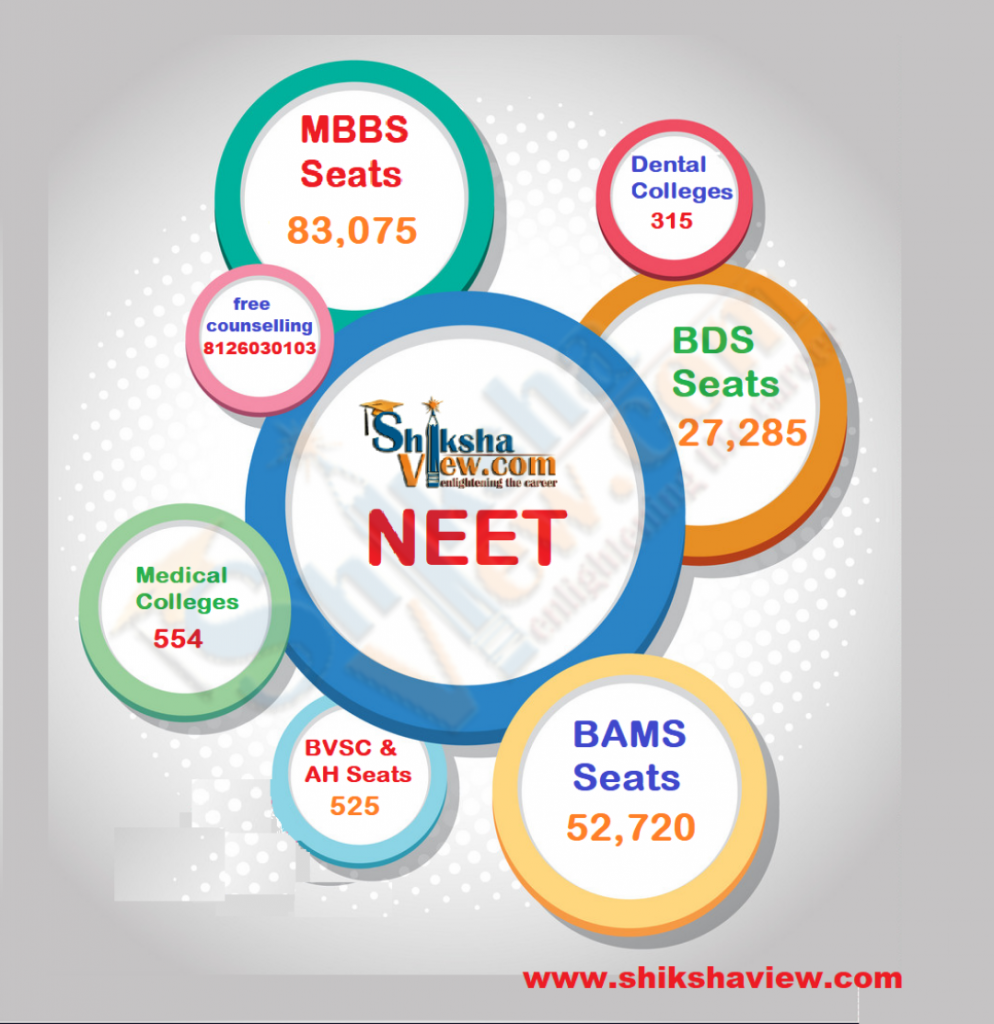
NEET 2021 Exam Dates and Events
The following table brings the list of events related to NEET 2021 and the schedule for those.
| Events | Dates (Tentative) | Salient Features |
|---|---|---|
| NEET 2021 Information brochure and application forms | 13-Jul-2021 (5 pm) | The application form had to be filled online (offline applications may be available for residents of Kashmir valley, Leh and Kargil) |
| Deadline to submit the NEET 2021 application form | 10-Aug-2021 (9.50 pm) |
NEET 2021 applications had to be submitted online till 9.50 pm and the application fee has to be paid till 11.50 pm of the same day |
| Deadline to pay NEET 2021 application fee | 10-Aug-2021 (11.50 pm) | Candidates have to pay the application fee on or before 11.50 pm of the last date of NEET application |
| Correction window for the application form | 11-Aug-2021 to 14-Aug-2021 (2 pm) |
Candidates are advised to save the correction slip of the NEET 2021 application for future use |
| NEET 2021 Admit card available for download | 09-Sep-2021 | NEET 2021 admit cards have to be downloaded by logging into the registered accounts |
| NEET UG 2021 Exam date | 2-Sep-2021 (2 pm to 5 pm) |
NEET 2021 will be conducted in offline mode for three hours and the test will consist of 180 objective type questions |
| Provisional answer key | To be announced | Answer Keys will be released online and candidates can challenge this answer key provided if they have sufficient evidence to support the claim |
| NEET 2021 Result to be announced | To be announced | NEET 2021 scorecards can also be downloaded online by logging into the registered accounts |
NEET Eligibility Criteria 2021
The National Testing Agency has prescribed the NEET 2021 eligibility criteria. All those who wish to apply for the entrance test are advised to check if they fit into the criteria specified by NTA. Candidates who fulfil the following parameters are eligible for NEET UG 2021:
Nationality:
Citizens or applicants belonging to the following nationalities are eligible to apply for NEET:
- Indian Nationals
- Non-Resident Indians (NRIs)
- Overseas Citizen of India (OCI)
- Persons with Indian Origin (PIO)
- Foreign Nationals
Age Limit:
The age limit or age criteria for NEET candidates are as follows:
- The minimum age of a candidate as of December 31, 2021, should be 17 years
- The rule specifying the maximum age limit of the candidate was challenged last year in the court of law. Thus, there is no upper age limit as of now and candidates older than 25 years of age applying for NEET 2021 will be provisionally admitted subject to the ruling of the High Court of Delhi.
Minimum qualification:
Applicants should fulfil the educational qualification mentioned below:
- Candidate must have cleared Class 12 or equivalent from a recognised institute
- Candidates who are appearing for Class 12 or equivalent in summer 2021 can also apply for NEET 2021
- Candidates who have completed Class 12 or equivalent from an open school are also eligible
Mandatory subjects:
- Candidate must have cleared Class 12 or equivalent with Physics, Chemistry, and Biology
- Candidates who have passed Class 12 or equivalent with Biology as an additional subject are also eligible
Minimum marks required in the qualifying examination:
- General category: 50%
- PWD category: 45%
- SC/ST/OBC: 40%
NEET 2021 Admission Process
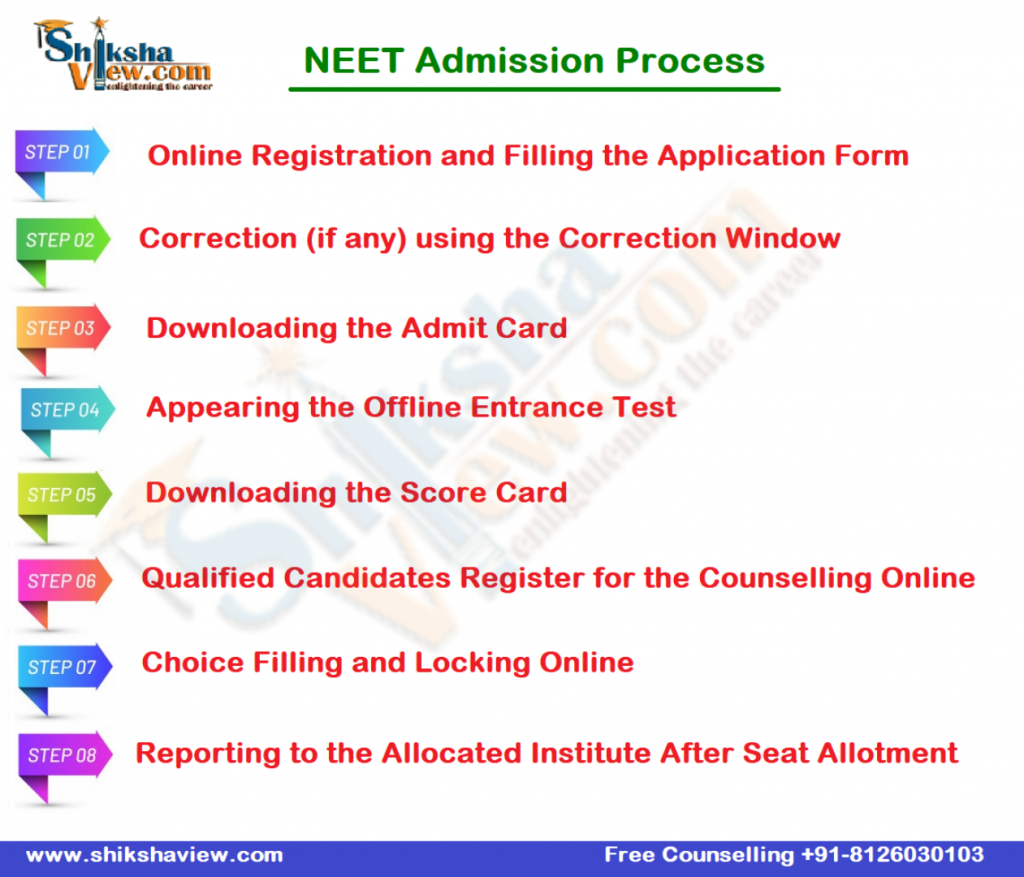
he admission process for NEET 2021 will begin with the filling of the online application form and end with reporting to the allocated institute for confirmation of the admission. All the steps in between are a part of the NEET 2021 admission process. In the illustration given above, we have listed everything that needs to be checked for admissions through NEET 2021. The upcoming events of the NTA NEET 2021 admission process have been described in detail below.
NEET 2021 Application Form Process
The application process was conducted online and candidates had to register themselves on the official website in order to fill the application form. For successful completion of the NEET 2021 application process, a candidate had to go through these four steps. To help understand the process better, the steps have been elaborated below. This year, a change was introduced in the NEET UG 2021 application procedure. According to NTA, in order to ensure that candidates have submitted the application information properly, the application form has been divided into two sets/phases. The first set of information has to be filled before the application deadline and the second set has to be filled before the declaration of the result.
How to apply for NEET 2021?
The step by step application process for NEET 2021 is given below:
- Visit the official website, neet.nta.nic.in and register for NEET UG 2021
- Fill all the mandatory fields in the online form, including the personal and academic details
- Upload the required documents such as scanned copies of photographs, signature, left-hand thumb impression, and Class 10 Certificate
- To complete the process, pay the stipulated fee as mentioned below
- Take a printout of the confirmation page and preserve it for future reference
NEET 2021 Application Fee
The application fee has to be paid online. It can be paid using a credit card/ debit card/ net banking/ e-challan/ UPI.
| Category | NEET Application Fee |
|---|---|
| General | Rs.1,500/- |
| Gen EWS/ OBC | Rs.1,400/- |
| SC/ ST/ PWD/ | Rs.800/- |
Common Service Centres (CSC) for NEET 2021
For candidates who do not have access to the internet or need help in downloading the NEET 2021 admit card, NTA has set up various facilitation centres across the country. These centres aim to help those who do not have access to high-speed internet, especially candidates residing in rural areas.
The CSCs charge a nominal fee for the services provided by them. Refer to the table below for the fee chart.
Fees charged by the CSCs
The table below brings the list of services offered at the CSCs along with the respective fees.
| Service | Fee |
|---|---|
| Writing emails and filling the application form | Rs.25/- |
| Online payment of the application fee | 0.5% of the application fee |
| Downloading the admit card/ answer key/ OMR sheet | Rs.10/- |
| Filing a response w.r.t the answer key | Rs.25/- |
| Printing charges (per page) | Rs.5/- |
If candidates want to avail the facilities of a CSC, they will have to locate the nearest CSC. Visit the CSC on a working day between 9.30 am to 6 pm. They must carry all the requisite documents to the CSC. To locate the nearest CSC, visit the official website, csc.gov.in or call for neet counselling assistance +91-8126030103.
NEET 2021 Exam Centres
The table below shows the list of NEET 2021 exam centre locations. The list for NEET 2021 exam centres is yet to be released. According to Union Education Minister Dharmendra Pradhan, the number of exam cities has been increased from 155 to 199, including two international cities to ensure COVID-19 safety protocols. The following table carries the list of major cities and not the complete list.
| NEET Exam State/UT | NEET Exam Cities |
|---|---|
| Andaman & Nicobar | Port Blair |
| Andhra Pradesh | Vijayawada, Visakhapatnam |
| Arunachal Pradesh | Itanagar |
| Assam | Dibrugarh, Guwahati |
| Bihar | Gaya, Patna |
| Chandigarh | Chandigarh |
| Chhattisgarh | Raipur |
| Dadra & Nagar Haveli | Dadra & Nagar Haveli |
| Daman & Diu | Daman |
| Delhi | Delhi (Central/ East/ North/ South/ West) |
| Goa | Panaji |
| Gujarat | Ahmedabad, Rajkot, Surat, Vadodara |
| Haryana | Faridabad, Gurgaon |
| Himachal Pradesh | Hamirpur, Shimla |
| Jammu & Kashmir | Jammu, Srinagar |
| Jharkhand | Bokaro, Ranchi |
| Karnataka | Bangalore, Belgaum, Gulbarga, Mangalore |
| Kerala | Ernakulam, Kozhikode, Trivandrum |
| Lakshadweep | Kavaratti |
| Madhya Pradesh | Bhopal, Gwalior, Indore, Jabalpur, Ujjain |
| Maharashtra | Aurangabad, Mumbai, Nagpur, Nasik, Pune, Thane |
| Manipur | Imphal |
| Meghalaya | Shillong |
| Mizoram | Aizawl |
| Nagaland | Dimapur, Kohima |
| Odisha | Behrampur, Bhubaneshwar, Rourkela |
| Puducherry | Puducherry |
| Punjab | Bhatinda, Jalandhar |
| Rajasthan | Ajmer, Jaipur, Kota, Udaipur |
| Sikkim | Gangtok |
| Tamil Nadu | Chennai, Coimbatore, Madurai, Salem, Tiruchirapalli |
| Telangana | Hyderabad, Warangal |
| Tripura | Agartala |
| Uttarakhand | Dehradun, Haldwani |
| Uttar Pradesh | Bareilly, Ghaziabad, Jhansi, Lucknow, Noida, Varanasi |
| West Bengal | Durgapur, Kolkata, Siliguri |
| International Cities | Dubai, Kuwait |
NEET 2021 Admit Card
NTA will release the NEET admit card 2021 online, on the official website. According to the information brochure released by NTA, NEET 2021 admit card will be released three days prior to the examination. The admit card of NEET UG 2021 will be available on the official website of NTA NEET. Candidates can download their NEET admit card 2021 by logging into their registered accounts. Details of the exam centre allotted to the candidate will be mentioned on the admit card of NEET 2021.
After downloading the admit card, candidates need to take a colored printout of the same and paste a recent passport-sized photograph (preferably the same as the one uploaded with the application form) in the space provided. Also, candidates must get it signed by a parent/guardian before the exam day. However, they must not sign on the admit card unless instructed by the invigilator, on the day of the exam.
Read Also :
NEET Application – 2021 Correction Window Open
NEET Study Material – Free Download PDF Notes
Neet Reservation For OBC-EWS-SC-ST-General
NEET Chemistry Chapter Wise Weightage
The NEET reservation criteria for the OBC category has been approved for 27 per cent across the medical and dental colleges by the Government of India as per a landmark decision taken on July 29. Know details of category-wise reservations here.
On July 29, the Government of India had made a landmark decision that from the academic year of 2021-22 onwards, there would be 27 per cent OBC quota in NEET(Non-Creamy Layer) and 10 per cent NEET reservation for EWS in 15 per cent Under Graduate (UG) All India Quota seats (MBBS/BDS) (contributed by the State/UTs to the Central Pool). According to the Ministry of Health and Family Welfare, this new scheme of reservation of the 15 per cent All India Quota (AIQ) seats would be implemented from the upcoming academic year and candidates who would be appearing for the NEET UG and NEET PG exams scheduled for September 12 and September 11 respectively would come under this new reservation scheme.
NEET 2021 AIQ Reservation Scheme
The following table brings the new NEET reservation criteria for OBC, EWS, SC, ST and PwD categories under the 15 per cent AIQ seats are as follows:
| Categories | Reservation Percentage |
|---|---|
| SC | 15 |
| ST | 7.5 |
| OBC | 27 |
| EWS | 10 |
| PwD | 5 |
NEET Reservation for OBC
This new OBC quota in NEET as per the NEET 2021 reservation policy is expected to benefit around 2,700 OBC students and 550 EWS students. Prior to this ruling, the 15 per cent AIQ seats included 27 per cent OBC reservation in NEET and 10 per cent EWS reservation only for National institutes or Central Universities, which reduced their scope of admission for the rest of the MBBS and BDS colleges.
According to NTA, only those OBC candidates belonging to the Non-Creamy Layer (NCL) would be eligible for the 27 per cent reservation. Hence, while applying for NEET 2021 counselling rounds, candidates must ensure that they have all the required documents, without which they would not be considered eligible for the reservation.
NEET Reservation for EWS
As far as the NEET reservation for the EWS category is concerned, in order to fulfill the eligibility criteria, candidates should not possess the following property details or the annual income in order to fulfill the following criteria to be eligible for this reservation:
- The annual income of candidates’ families should not exceed Rs 8 lakh
- Candidates’ families should not own five acres of agricultural land and above
- Candidates’ families should not own a residential flat of 1,000 square feet and above
- Candidates’ family members should not own residential plot of 100 square yards and above in notified municipalities
- Candidates’ families should not own residential plots of 200 square yards and above in areas other than the notified municipalities
NEET Reservation for PwD
Candidates who consider themselves eligible for this category are advised to ensure their eligibility by getting themselves examined at any Government Medical College/District Hospital/Government Hospital. Such Government Medical College/District Hospital/Government Hospital shall issue a Disability Certificate.
After this, candidates, upon selection under PwD Category, will have to produce a Disability Certificate issued by the Disability Assessment Board. Hence, it is important for the candidates to appear before the Disability Assessment Board so as to determine whether they may register or participate in the common online Counselling towards admission in medical courses, after the declaration of the NEET 2021 result.
In case candidates are considered ineligible by the Disability Assessment Board, they may not register or participate in the common online Counselling and any online provisional allotment of the medical college shall be entirely fraudulent on the part of the candidate. Physical verification of various certificates including academic and Disability will be done upon reporting for admission to the medical college.
This was all about the 15 per cent AIQ reservation criteria. The rest of the 85 per cent seats are reserved for the State Quota. Each state has its own category-wise reservation criteria.
Read Also :
NEET Application – Correction Window
NEET Study Material – Free Download PDF Notes
Neet Reservation For OBC-EWS-SC-ST-General
NEET Chemistry Chapter Wise Weightage
NEET Chapter Wise Weightage of Physics, Chemistry and Biology
NEET Chemistry Important Topic with Chapter Wise Weightage

Apply Now
Our Popular Courses
- Top Demanded
B.Tech Computer Science & Engineering
- ₹96000/- per Year
B.Tech Electronics & Communication Engineering
- ₹96000/- per year
B.Tech Electrical Engineering Course
- ₹96000/- per year
B.Tech Civil Engineering Course
- ₹80000/- Per Year
B.Tech Mechanical Engineering
- ₹60000/- Per Year
BMRIT – Bachelor of Medical Radiology
Top Examinations
The NEET Chapter Wise Weightage of Physics, Chemistry and Biology
Find the NEET Chapter Wise Weightage and important topics of Physics That will help you in NEET Exam Preparation available here.
NEET Chapter Wise Weightage for Physics
The subject physics has got good weightage in the NEET paper. If the student wants to score well, then he/she should have proper knowledge about physics as well. Concentrating on a single subject won’t lead the students to the highest scoreboard. To start well, the student should get the NEET Chapter Wise Weightage for Physics from the Shiksha View website. The students need to know about the important chapters so that they can set their priorities accordingly. At times it does happen that the students are unaware of physics important chapters for neet and hence they get confused about what topics should be kept in the priority list and they tend to skip the most important chapters and this results in poor marks.
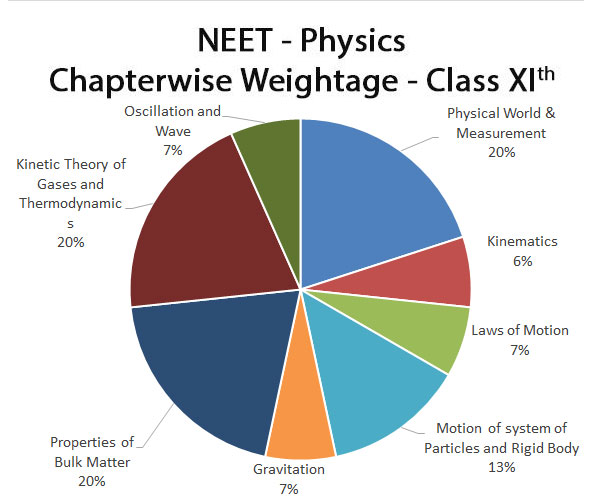
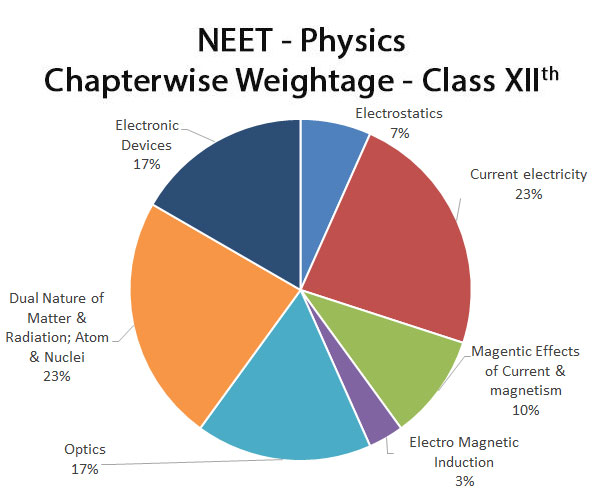
NEET Chapter Wise Weightage For Physics in Percentage
Modern Physics, from class 12th syllabus, and mechanics from class 11th are known to be the important NEET chapters for the physics section. Students are suggested to work hard on topics such as Semi-conductors, Heat and Thermodynamics, Laws of Motion, Kinematics, Work Energy & Power, and Rotational Motion
Here we have for our students the list of physics chapter wise weightage for neet 2021.
Read also:
NEET Study Material free PDF Download
NEET Chemistry Chapter Wise Weightage
NEET Chapter Wise Weightage for Chemistry
The next important subject in the NEET paper in chemistry, the section of chemistry carries the same marks as that of physics. It is a very interesting and a scoring subject. The students should know about all the topics that are important so that they can gain command over the subject. The syllabus of chemistry is vast; hence the students are requested to get the syllabus on time so that they can plan their strategies for completing the subject on time. The students can get detailed chemistry chapter wise weightage for neet from the ETOOSINDIA website. topics such as Equilibrium, Chemical Bonding and Molecular Structure, Electrochemistry, Chemical Kinetics, Coordination Compounds, Aldehydes, Ketones and Carboxylic Acids, S, P, D and F Block Elements, Hydrocarbons and Atomic structure should be studied thoroughly by the students.
Here we have NEET Chapter Wise Weightage 2021 for Chemistry
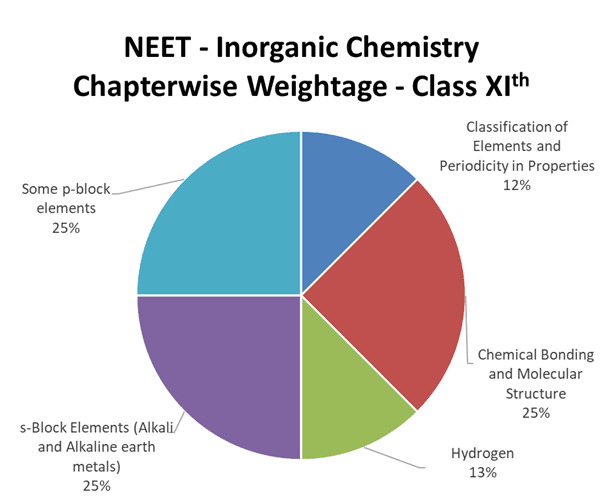
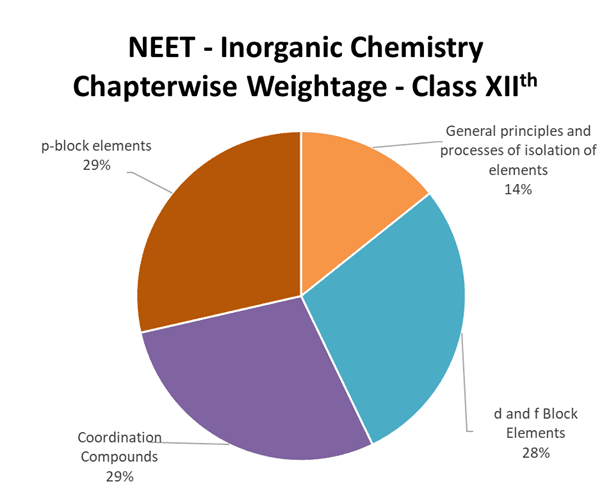
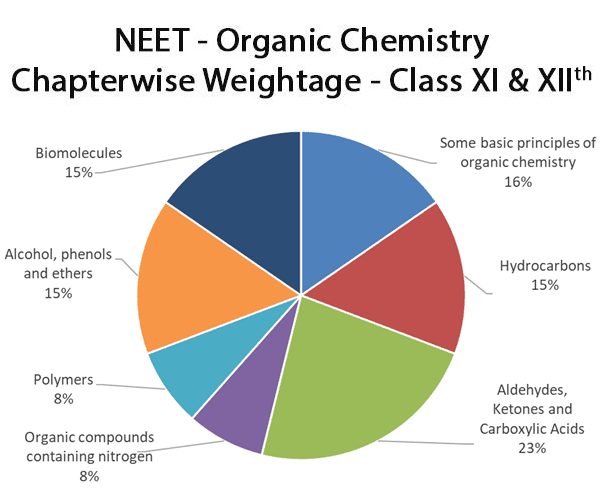
| NEET Chemistry Distribution of Marks & Weightage | ||||||
| NEET Chemistry Marks Distribution | NEET Chemistry Weightage (%age) | |||||
| Class XI | Class XII | Total | ||||
| Physical Chemistry | 32 | 36 | 68 | 37.78% | ||
| Inorganic Chemistry | 32 | 28 | 60 | 33.33% | ||
| Organic Chemistry | 16 | 36 | 52 | 28.89% | ||
| Total | 80 | 100 | 180 | 100.00% | ||
| 44.44% | 55.56% | 100.00% | ||||
NEET Chapter Wise Weightage for Biology
Biology is the most important subject for the NEET exam. There are several students who underestimate this subject as there is a myth that biology is subject to cram and hence it can be covered during the last-minute studies. Students are requested not to get carried away with these false assumptions, and prepare for this subject in the best way as it carries maximum marks in the neet paper. Students can get NEET Chapter Wise Weightage for Biology from the Shikha View website. all the NEET aspirants should get the neet syllabus weightage pdf download so that they can start preparing the important chapters on time. Most imp chapters for neet for biology are ecology, Human Physiology, and Plant physiology, Genetics & Evolution, Cell structure & Function, etc.
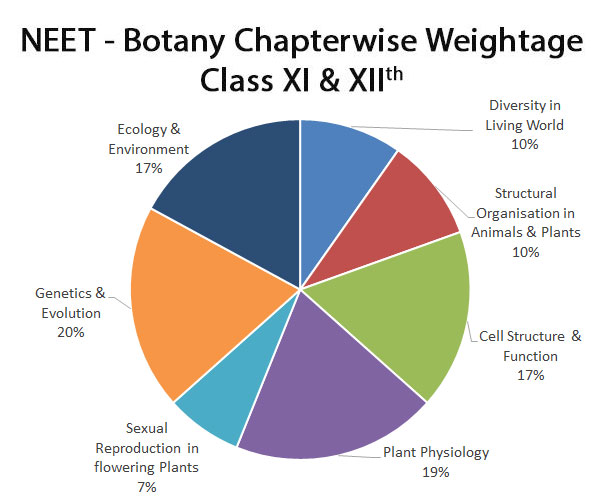
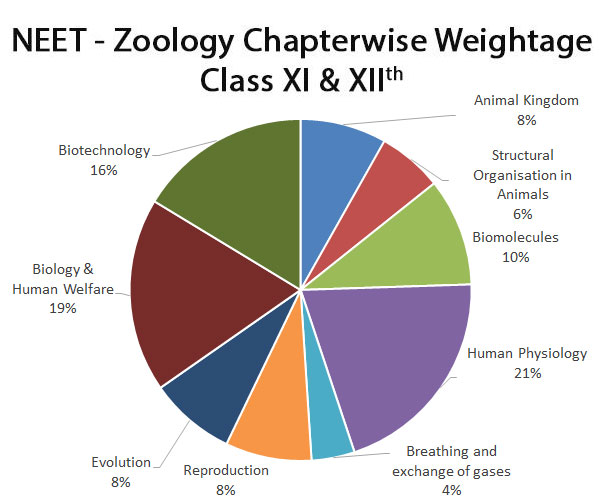
NEET Chapter Wise Weightage For Biology in Percentage
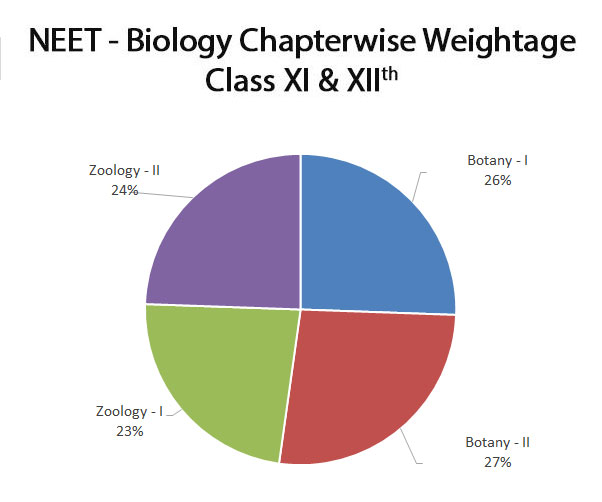
| NEET Biology Distribution of Marks & Weightage | ||||
|---|---|---|---|---|
| NEET Biology Marks Distribution | NEET Biology Weightage (%age) | |||
| Class XI | Class XII | Total | ||
| Botany | 92 | 96 | 188 | 52.22% |
| Zoology | 84 | 88 | 172 | 47.78% |
| Total | 176 | 184 | 360 | 100.00% |
| 48.89% | 51.11% | 100.00% | ||
Read Also :
NEET Application – Correction Window
NEET Study Material – Free Download PDF Notes
Neet Reservation For OBC-EWS-SC-ST-General
NEET Chemistry Chapter Wise Weightage
NEET Chapter Wise Weightage of Physics, Chemistry and Biology
NEET Chemistry Important Topic with Chapter Wise Weightage

Apply Now
Our Popular Courses
- Top Demanded
B.Tech Computer Science & Engineering
- ₹96000/- per Year
B.Tech Electronics & Communication Engineering
- ₹96000/- per year
B.Tech Electrical Engineering Course
- ₹96000/- per year
B.Tech Civil Engineering Course
- ₹80000/- Per Year
B.Tech Mechanical Engineering
- ₹60000/- Per Year
BMRIT – Bachelor of Medical Radiology
Top Examinations
The NEET 2021 application process ended on August 10 (9.50 pm) and the application fee could be paid till 11.50 pm. The NEET application correction window is open from August 11 to August 14 (2 pm). NEET application form 2021 was released online on July 13, after 5.30 pm on the official website of NEET 2021. The NEET application form correction window was earlier slated to open on August 8 and end on August 12. Informing NEET UG aspirants of the change in the application schedule, NTA has mentioned that this year onwards BSc Nursing (Hons) admission will take place through NEET UG scores, and to enable BSc Nursing (Hons) aspirants to apply for NEET 2021, the last date of application has been extended from August 6 to August 10. Candidates can click here to avail the NEET 2021 Application Correction Facility.
In order to apply for NEET 2021, candidates had to register first on the official website, neet.nta.nic.in to access the application forms. To complete the registration process, candidates had to provide a valid email ID and mobile number. System generated Application ID for each candidate was issued. They could set their own passwords during the NEET 2021 registration process. Using these credentials, candidates were able to fill the NTA NEET 2021 application form online. This year, a change has been implemented in the NEET application process. In order to ensure the candidates submit all the information properly, the application form has been divided into two sets and phases. The first phase ended on August 10, and the second phase of information will have to be entered before the declaration of NEET 2021 result.
After successful completion of the NTA NEET application form 2021, candidates had to save and print the duly filled application form for future reference. NTA released offline application form of NEET 2021 for the residents of Kashmir valley, Leh, and Kargil, like the previous year. Applicants must note that this provision will be made available for the residents of the Kashmir valley, Kargil, and Leh only. Applicants from all other states will have to fill the NTA NEET 2021 application form in the online mode only. Read the complete article to know more about the application process, important dates, correction window, and more. Candidates must note that the NEET offline application form was made available to the candidates from remote locations till last year. This year, the process may change and offline NTA NEET application forms may not be released owing to the pandemic scenario. Clarity on this will be there once NTA releases the NEET 2021 information brochure.
NEET 2021 Application Dates
The NEET 2021 application process is the stepping stone of the national level examination process and has various events involved besides the filling of the NTA NEET 2021 application form. Below is the schedule for NEET 2021 Application Dates:
| Events | Dates |
|---|---|
| The information brochure will be released | 13-Jul-2021 |
| Registration began | 13-Jul-2021 (5.30 pm) |
| Deadline to fill the application form | |
| Deadline for the transaction of application fee | |
| Application Correction window | |
| NEET 2021 Admit Card | 09-Sep-2021 |
| NEET 2021 exam day |
How to use the NEET correction window 2021?
The procedure to edit or make changes in the NEET 2021 application form are as follows:
- Go to the official website of NTA NEET (neet.nta.nic.in) or visit the URL – https://testservices.nic.in/NEET2021/Root/home.aspx?appFormId=101042111
- Login using the application number and password
- Click on “Click here for correction in NEET 2021 Application Form”
- The filled application form of NEET 2021 will be displayed on the screen and candidates can edit the fields.
- Click on ‘Preview and Submit’
- An OTP will be sent to the registered mobile number
- Enter the OTP in the space provided
- Click on ‘Final Submit’
- A warning pops up on the screen
- If you are satisfied with the corrections made, click on ‘Please do’
- The correction slip of the NEET 2021 application form will be display on the screen
- Save and print the correction slip for future reference.
Details That Can Be Edited
The following details are permissible for editing or changing in the NEET 2021 application correction facility:
- Personal Details – Name, date of birth, parents’ name, gender, identity card details, place of birth
- Address: Permanent or correspondence address
- Academic Details: Information regarding Class 10 and Class 12
- Medium of Question Paper: The preferred language of the question paper
- Exam City Preference: The order of preference of chosen exam cities can be changed or cities can be replaced or changed
- Image Upload: In case the file size or format of photographs uploaded on the NEET 2021 application form is considered incorrect by NTA, they would have to upload the correct or rectified files
Details That Can’t Be Edited
The following details cannot be changed or edited are as follows:
- Nationality
- Mobile Number
- Email ID
NEET Eligibility Criteria 2021
Before filling NTA NEET 2021 application form, candidates are advised to find out if they are eligible to apply for it. NEET eligibility criteria 2021 has been set by the National Testing Agency and states the basic requirements to appear for the entrance test. The criteria have been summarized in the table given below.
Eligibility Criteria for NEET 2021
The NEET 2021 eligibility criteria are stated in the table below:
| Particulars | Details |
|---|---|
| Nationality | Indian NationalsForeign NationalsNRIPIOOCI |
| Age | The candidate must be at least 17 years of age as of December 31, 2021. The upper age limit for unreserved category candidates is 25 years and that of reserved category candidates is 30 years |
| Minimum Qualification | Class 12 or equivalent from a recognised institute |
| Mandatory Subjects | Physics, Chemistry, and Biology |
| Minimum marks required in the qualifying examination | General: 50 per cent PWD: 45 per centSC/ ST/ OBC: 42 percent |
| Number of permitted attempts | No limit specified by NTA |
NEET 2021 Documents Required
Since the entire registration process for NEET 2021 was online, candidates were advised to keep the following documents ready before filling the NEET application form to avoid any last-minute hassles.
Documents Required for NEET 2021 Application Form
The table below brings the list of documents and files to be uploaded while filling the NTA NEET 2021 application form.
| Documents | Specifications | Size | Format |
|---|---|---|---|
| Scanned Photograph | Passport size and postcard size (both)The photograph must not be older than 3 monthsName of the candidate and date must be printed below the photograph | 10 Kb to 200 Kb (passport size)4″x6″, 10 kb to 200 kb (postcard size) | JPG/JPEG |
| Scanned Signature | Signature of the candidate in black ink on white background | 4 Kb to 30 Kb | JPG/JPEG |
| Scan of thumb impression | Left-hand thumb impressionShould be on white paper with blue ink | 10 Kb to 200 Kb | JPG/JPEG |
| Class 10 Passing Certificate | The scanned copy of Class 10 passing certificate has to be uploaded | 50 kb to 300 kb | |
| Citizenship Certificate or Embassy Certificate | The citizenship certificate or the embassy certificate is required to prove the nationality of the candidates | 50 kb to 300 kb | |
| Other things that must be kept handy | A valid mobile numberValid Email IdClass 10 marks and percentageClass 12 marks and percentageIdentity Number – Aadhar Card number/ Passport number/ Ration Card number/ bank account/ any other valid Govt. identity numberCredit card/ Debit card/ Net banking credentials | ||
How to fill the NEET 2021 Application Form?

Steps to fill the NEET 2021 application form:
Steps to fill the application form for NEET 2021 have been elaborated below. Candidates could go through the steps before filling the application to understand the process better and avoid confusion.
Step 1: Registration

- Go to the official website of NTA NEET or neet.nta.nic.in
- Click on “Fill Registration Form” or the invitation for NEET UG 2021 Registration


- Enter the following details
- Candidate’s Name
- Mother’s name
- Father’s name
- Date of birth
- Category
- Gender
- Nationality
- Persons with Disability
- Identification Type
- Identification Number
- Mobile number
- Email Id
- Password
- Enter Security Pin

Step 2: Apply online for NEET 2021
- Click on “Click here to login”
- Login using the application number and password
- The NEET 2021 application would open on your screen
- Details entered during the registration process will be pre-filled in the application and cannot be changed
The form is divided into twelve sections, fill in the following details:
| Sections | Credentials |
|---|---|
| Personal Details | Candidate’s NameMother’s and Father’s NameGenderCategoryDate of BirthNationalityPersons with disabilityDo you belong to Minority Category?Are you suffering from Diabetes Type I?Identification TypeIdentification Number |
| Place of Birth | Place of BirthStateDistrict |
| Choice of Medium of Question Paper | Choose from the following language options: English, Hindi, Gujarati, Marathi, Oriya, Bengali, Assamese, Telugu, Tamil, Kannada, and Urdu |
| Choice of Examination Centre | Choose four exam centres in decreasing order of preference |
| Academic Details (Class 10 or equivalent) | Name of School Education BoardName of School /CollegeAddress of School/CollegeYear of passingPercentage of marks obtained in Class 10Class X board roll number |
| Academic Details (Class 11 or equivalent) | Name of School /CollegeYear of passingPlace of StudyState where School/College is locatedDistrict where School/College is located |
| Academic Details (Class 12 or equivalent) | School Board of Class 12 or equivalentName of School/College (passed/appearing)Address of School/CollegePlace of studyYear of passingState where School/College is locatedDistrict where School/College is locatedQualifying Exam CodeYear of passing/Appearing class 12 or equivalentPercentage of marks obtained in Class 10th if passedEnter Roll Number of class 12 |
| Permanent Address | Permanent address of the candidate |
| Correspondence Address | Same as permanent address or fill in the current address |
| Details of Parents/ Guardian | QualificationOccupationAnnual income |
| Do you intend to wear a customary dress contrary to the Dress code while appearing for the exam? | Yes /No |
| Security pin | Alphanumeric pin on the screen |
- Check all the details carefully as they cannot be changed after the final submission of the NEET application form 2021
- To submit the duly checked application form, click on “Yes, please do” on the confirmation pop-up
Step 3: Upload scanned images
- Click on “Upload your recent documents”
- Select the files to be uploaded
- Click on “Next”

Step 4: Make Payment
Select the desired mode of payment ( SBI/Syndicate/HDFC/ICICI/Paytm Payment Gateway through Debit Card/Credit Card/Net-banking/UPI)

Pay the application fee
The category-wise application fee for NEET 2021 is given below:
| Category | Application fee (In Rs) |
|---|---|
| General | 1,500 |
| Other Backward Classes | 1,400 |
| Scheduled Caste /Scheduled Tribe | 800 |
| Persons with Disability | 800 |
Step 5: Print Confirmation
Save and print the filled application form for NEET 2021 along with the confirmation slip.
NEET 2021 Application Correction Window
NTA will give candidates an option to change certain fields through the correction window of the NTA NEET application form 2021. The NEET 2021 correction window is activated on August 11 and the process will end on August 14 at 2 pm. The correction window for NEET 2021 application form is a one-time facility only and corrections made using this window are permanent.
Fields that can be changed in the application form of NEET 2021 using the correction window
The fields or areas that can be edited in the NEET 2021 application correction process are as follows:
- Personal details: Name, date of birth, father’s/mother’s name, gender, eligibility for 15 per cent AIQ, ID card details, nationality, birthplace, the medium of question paper
- Academic details Class 10 and Class 12: board name, name of school/college/institution/university, year of passing, percentage of marks obtained
- Academic details Class 12: board name, school name & address, place, school location details, qualifying examination code, passing year, percentage of marks obtained, roll number
- Contact details: Permanent, correspondence address, and contact details
- Images: passport-sized photograph, signature, postcard-sized photograph, thumb impression and the mark sheet of class 10
- Exam city preference
Documents that must be retained till NEET admissions are over
- Printout of the confirmation page
- Receipt for the payment of application fees
- Six to eight copies of the uploaded photograph
NEET Application Statistics
NEET is the largest medical entrance test in India. Every year there is a significant rise in the number of NEET applicants. The data for the past four years has been depicted in the graph given below

| Candidates | NEET 2020 (in Lakh) |
NEET 2019 (in Lakh) |
NEET 2018 (in Lakh) |
NEET 2017 (in Lakh) |
|---|---|---|---|---|
| Registered | 15.97 | 15.19 | 13.27 | 11.39 |
| Appeared | 14.10 | 14.10 | 12.70 | 10.90 |
| Registered male | 6.80 | 6.85 | 5.80 | 4.97 |
| Registered female | 8.38 | 8.34 | 7.46 | 6.41 |
NEET 2021 exam will be conducted on September 12, 2021, in 199 cities across India and two international cities, Dubai and Kuwait. Union Education Minister Dharmendra Pradhan announced the NEET exam and application process commencement date on July 12. The NEET 2021 notification was released on July 13, on the official NTA NEET website.
Frequently Asked Questions (FAQs) Regarding NEET 2021 Application Form
Q. What details can be changed using the NEET correction window?A. All the fields in the NTA NEET application form 2021 can be changed using the correction window. Candidates using the NEET 2021 correction window are thus advised to check the entire application before submitting it.
Q. I paid the NEET 2021 application fee twice. What should I do?A. If the NEET application fee has been deducted twice from your account, NTA will accept the fee only once. The rest of the amount will be refunded to your account in seven working days.
Q. How do I know that the fee has been successfully deposited in my account?A. After successful payment of the NEET application fee, you will receive a payment confirmation slip online. Save the confirmation slip for future reference.
Q. Can I change my address using the NEET correction window?A. Yes, you can change the address using the correction window of the NTA NEET 2021 application form. Though the details can be edited using the correction window, candidates are advised to fill the application form carefully and check the details thoroughly before submitting it.
Q. Is NEET 2021 application form released?A. The NEET 2021 application form was released on July 13, on the official NTA NEET 2021 website.
Q. When can I apply for NEET 2021?A. Aspirants were able to apply for NEET 2021 as and when the application process will commence, i.e. July 13.
Q: Will the NEET 2021 application deadline get extended?A: Yes, NTA had postponed the NEET 2021 application deadline from August 6 to August 10 to enable aspirants planning to pursue BSc (Hons.) Nursing courses through NEET, to apply for the exam. The application fee had to be paid by August 10, 11.50 pm.
Q. How do I fill NEET Form 2021?A. The NTA NEET 2021 application form filling procedure will be completely online. Candidates have to visit the official website and fill in the mandatory details and upload the required files such as applicants’ photographs, signatures and documents. The final step is to pay the application fee through one of the slated payment modes.
Q. Can I fill the application form for NEET 2021 offline?A. The NTA NEET 2021 application form could be filled in online mode only. However, there may be an exception for the applicants residing in the Kashmir valley or Leh. The NEET 2021 application fee has to be paid using a credit card/ debit card, net banking, Paytm or UPI.
Q. Do I need to send the NEET application form and other attachments by post to NTA?A. No, you need not send any documents by post to NTA. The entire application process of NEET 2021 will be online and the relevant documents have to be uploaded online only.
Q. I made a mistake in the email ID while registering for NEET 2021. What can I do?A. If you have completed the NTA NEET 2021 application form with an incorrect email address, you will not receive the email notifications. However, if the mobile number that you have registered on the NTA portal is correct, you will receive the same notification on your phone. These details cannot be changed in the application correction window. Candidates who had submitted the wrong email id or mobile number during the registration process would have to register again.
Q. When submitting the application form for NEET 2021, the session expires before I submit it. What should I do?A. Candidates filling the NEET 2021 application form must try to fill and submit it within 30 minutes of logging into the registered account. Also, save each portion of the application form so as to avoid filling it again if the session expires. To ensure completing the form in under 30 minutes, keep all the information handy.
Q. Can I fill the application form for NEET 2021 without the internet?A. If you do not have access to the internet, you can go to the nearest Common Services Centre (CSC). The CSCs help in filling the application form for NEET 2021 and payment of the application fee. They will charge a nominal fee for these services. To know the details of the nearest CSC, visit csc.gov.in.
Q. How can I be sure that NTA has received the application fee?A. After the payment has been processed successfully, a confirmation page will open on the screen. This confirmation is a confirmation that the NEET 2021 application fee has been received by the NTA. Save and print this page for future reference.
Q. Do I have to pay a correction fee for making changes to the NEET application form 2021?A. The correction fee depends on the fields that you want to modify in the application form of NTA NEET 2021. However, if there are minor changes in the application form you may not have to pay anything.
Read Also :
NEET Application – 2021 Correction Window Open
NEET Study Material – Free Download PDF Notes
Neet Reservation For OBC-EWS-SC-ST-General
NEET Chemistry Chapter Wise Weightage
NEET Chapter Wise Weightage of Physics, Chemistry and Biology
NEET Chemistry Important Topic with Chapter Wise Weightage

Apply Now
Our Popular Courses
- Top Demanded
B.Tech Computer Science & Engineering
- ₹96000/- per Year
B.Tech Electronics & Communication Engineering
- ₹96000/- per year
B.Tech Electrical Engineering Course
- ₹96000/- per year
B.Tech Civil Engineering Course
- ₹80000/- Per Year
B.Tech Mechanical Engineering
- ₹60000/- Per Year
BMRIT – Bachelor of Medical Radiology
Free download NEET study material for Physics, Chemistry, Biology and start preparation for NEET exam 2021-2022 with Shiksha View. For assistance call at +91-8126030103 or write us an email at info@shikshaview.com. NEET exam will be conducted on dated 12th September. You can download free NEET Topic wise Biology short notes. You can also download neet syllabus and neet previous question papers
| TOPIC WISE BIOLOGY NOTES | DOWNLOAD PDF FREE |
|---|---|
| Excretory Products and Their Elimination | |
| Five Kingdom Classification Concept Map | |
| NEET Previous Year Papers |
NEET 2020 Subject-Wise Analysis – Zoology
This time the zoology questions made students do a lot of brainstorming, the questions were really very tricky. So it can be said that the zoology section was difficult. A good amount of questions came from the human phycology unit. Download NEET question papers PDF 2020 and try solving the zoology questions.
| Class | Chapter name | Level of Difficulty | ||
| Easy | Average | Challenging | ||
| Class 11 | Human Physiology | 1 | 7 | 4 |
| Biomolecules | 3 | 2 | 1 | |
| Animal Kingdom | 2 | 2 | 1 | |
| Structural organization of animals | 1 | 0 | 1 | |
| Class 12 | Animal husbandry and Biotechnology | 3 | 4 | 3 |
| Human Reproduction and reproductive health | 0 | 2 | 2 | |
| Evolutions theories and evidences | 3 | 0 | 1 | |
| Human Health and diseases | 0 | 3 | 1 | |
| Total Questions | 47 | |||
NEET Botany 2020 Subject-Wise Analysis
As compared to the previous years’ question paper, this time the botany section was difficult. In total there were 43 questions from this section. Most of the questions were centered on the plant physiology unit. Get NEET 2020 question papers with solutions Pdf from the Shiksha View website and start preparing.
| Class | Chapter name | Level of Difficulty | ||
| Easy | Average | Challenging | ||
| Class 11 | Plant Physiology | 3 | 2 | 4 |
| Cell and cell cycle | 1 | 1 | 4 | |
| Structural organization of plants | 3 | 0 | 2 | |
| Diversity of Life | 1 | 3 | 1 | |
| Class 12 | Genetics | 2 | 1 | 4 |
| Ecology | 2 | 2 | 3 | |
| Biology in Human welfare | 0 | 1 | 1 | |
| Reproduction and sexual reproduction | 1 | 1 | 0 | |
| Total Questions | 43 | |||
Read Also :
NEET Application – 2021 Correction Window Open
NEET Study Material – Free Download PDF Notes
Neet Reservation For OBC-EWS-SC-ST-General
NEET Chemistry Chapter Wise Weightage
NEET Chapter Wise Weightage of Physics, Chemistry and Biology
NEET Chemistry Important Topic with Chapter Wise Weightage
NEET Question Papers 2021 – As per the NEET 2021 latest news, the National Testing Agency (NTA) will conduct the medical exam on September 12. Aspirants aiming to crack the exam must be aware of previous years’ NEET Question Papers. Solving the NEET previous year’s questions will surely give a boost to the candidate’s preparation.
What are the Benefits of Solving Sample Papers for NEET?
Below we have provided some of the most important benefits of solving the NEET Sample Papers.
- You get a real-time experience about the actual difficulty levels or standards of the NEET question paper.
- One becomes familiar with the types of questions, exam paper pattern, and marks distribution of the NEET exam.
- It gives students a clear idea of the time management factor. All they get is 3 hours to answer the questions. The model paper prepares them to remain concentrated during the three hours, and helps them to learn how to answer all the questions within that time limit tactfully.
- The sample paper gives you an idea of priority. You should know which questions will fetch you marks and should be answered first, and which questions you should answer later.
- Answering the questions in a set limit of time will help the aspirants increase their thinking skills and solve the questions fast.
- You can highlight the NEET important questions and solutions at the time of practicing from the NEET exam model question paper and revise them accordingly when the exam will knock at the door.
- Students can make a note of their weaker areas and subjects that need more practice. Hence, they can analyze their level of preparation.
- The model papers will help students overcome the fear of examinations. It will teach them to handle pressure, anxiety, and stress. They will get to know about the actual exam environment, with the NEET Mock Test. It will help them rectify their mistakes.
Tips for Solving the NEET Sample Papers
Read all the questions and pick out which to answer first. Pick out those questions which will fetch you marks. Attempt the questions only if you are sure of the answer. Don’t waste your time on questions that are unknown to you. Attempt the easy ones first. After you finish, check on what time you have completed it. If you are taking more than 3 hours, then you need to work on your time management. Note down your mistakes and weaker areas. Go through your mistakes and practice that concept again so that you don’t face the same problems.
Inferences You Need to Draw After Solving The Papers
After solving the NEET Sample Papers, you need to have a clear idea on the exam pattern, format, marking scheme, and distribution of subjective and objective questions. Having a clear picture will help you understand which questions will take time. You will be able to point out the important topics and also the topics that you need to practice more. After all, practising more questions makes you more prepared. The three hours becomes the most challenging time in the life of a medical aspirant. You may forget the answers you already know. Hence be mentally prepared, stay calm and focused during the exam.
Did You Know?
1. Which book to refer to study NEET Biology?
Answer: Objective Biology for NEET by Trueman.
2. Which book to refer to for studying NEET Chemistry?
Answer: GRB Publication Organic Chemistry by Himanshu Pandey.
Free download NEET study material for Physics, Chemistry, Biology and start preparation for NEET exam 2021-2022 with Shiksha View. For assistance call at +91-8126030103 or write us an email at info@shikshaview.com. NEET exam will be conducted on dated 12th September. You can download free Formula handbook of Physics , Chemistry for neet preparation. You can also download neet syllabus and neet previous question papers
| TOPIC WISE PHYSICS NOTES | DOWNLOAD PDF FREE |
|---|---|
| BASIC FORMULAS – Class XI Physics Formula & Equation List | |
| MTG CLASS 12 CHEMISTRY FORMULA BOOK | |
| NEET Previous Year Papers |
NEET UG 2021 was conducted on September 12. The answer keys are released by the coaching institutes. Know the detailed information on the official NTA NEET answer keys, result, counselling, etc. here.
NTA has conducted the NEET 2021 exam on September 12 in 202 cities across India and abroad. Over 15 lakh candidates have tentatively appeared for the exam which was conducted in 3,855 centers. After the exam was conducted, coaching institutes released the NEET 2021 answer keys. NTA is expected to conduct the provisional answer keys by the third week of September to which candidates can raise objections, in case they find any of the answer keys to be wrong. The final answer keys of NEET 2021 is likely to be released along with the NEET 2021 result by the fourth week of September. After the declaration of the result, the counselling process will commence tentatively in the second week of October.
NEET 2021 Question Papers, Answer Keys and Solutions
The NEET 2021 question paper was divided into four sets or series which had six subsets each. The question paper sets were M, N, O and P. The unofficial answer keys are released by the coaching institutes like Allen, Resonance, etc. Candidates can download the NEET 2021 question paper set-wise answer keys and solutions from the below table.
| NEET 2021 Question Paper Set | NEET 2021 Answer Keys |
|---|---|
| Set M | M1 , M2 , M3 , M4 , M5 , M6 |
| Set N | N1 , N2 , N3 , N4 , N5 , N6 |
| Set O | O1 , O2 , O3 , O4 , O5 , O6 |
| Set P | P1 , P2 , P3 , P4 , P5 , P6 |
Also Read : NEET UG 2021 Question Paper, Download Set-wise Paper PDF
NTA NEET 2021 Result
NTA is expected to announce NEET result 2021 within a month of conducting the exam. The result of NEET 2021 will be announced online and can be checked by logging into the accounts created at the time of registration. Candidates who qualify for NTA NEET 2021 will be eligible to participate in the counselling process. However, the role of NTA is limited to conducting the examination and announcement of the results. NEET counselling will be conducted by the Medical Counselling Committee (MCC). Various other organizations will also conduct counselling for NEET 2021 on state levels.
NTA NEET 2021 Cut Off
The cut off for NEET 2021 will be announced alongside the results. Only those candidates who score more than or equal to the NTA NEET 2021 cut off will be considered qualified. Candidates aspiring to appear for NEET 2021 can refer to the table given below to get an idea about the cutoff.
NTA NEET 2021 Courses Offered
As mentioned above, NEET 2021 is the only entrance test for admission to undergraduate medical courses in India. Admission to AIIMS and JIPMER MBBS courses will also be on the basis of the marks obtained in NEET 2021. Apart from these institutes, 83,075 MBBS seats across the country will be filled through NEET 2021 marks. Admission to 27,285 BDS seats and 52,720 AYUSH seats will also be filled using NEET 2021 scores. Recently, JIPMER has also announced that it will grant admission to JIPMER BSc Nursing and other allied courses on the basis of the NEET 2021 score.
NEET 2021 answer keys are being released by the top coaching institutes on September 12, after 5 pm, i.e. after the conclusion of the exam. Along with the answer keys of NEET 2021, they will release the solutions according to the question paper sets in PDF format. NTA is expected to release the official provisional NEET 2021 answer keys in the third week of September and candidates can submit objections till the stipulated date by paying the requisite fee. The final NEET 2021 answer key is expected to be released along with the NEET 2021 result in the fourth week of September. NEET Answer Key refers to the correct answer options that are released by the exam authorities in order to help candidates gauge their performance and calculate the estimated score. Test-takers can download the NEET 2021 answer keys here on this page as and when they are released.
NEET 2021 analysis has been prepared based on expert views and student reactions. According to the NEET 2021 analysis, the difficulty level of the exam is moderate. Physics has been termed as the toughest section whereas Biology has been named as the easiest section in NEET 2021. The changed pattern of NEET 2021 has resulted in the exam being more time-consuming than usual. All the questions were asked from the NEET 2021 syllabus and the question topics were NCERT based. The NEET 2021 analysis will help aspirants understand the difficulty level of the question paper and help predict the cutoffs for that year. Candidates can refer to NEET analysis to check the feedback of the students who appeared for the examination. They can also find the section-wise distribution of questions in the exam analysis of NEET. Many known institutions known for NEET coaching release the analysis of the question paper after the examination is conducted. Candidates can find a detailed NEET analysis of the question papers of the past three years here.
NEET 2021 Analysis
NEET 2021 was conducted in an offline mode on September 12 in the new exam pattern. Each subject – Physics, Chemistry and Biology was divided into two sections, Section A and Section B carrying 35 and 15 questions respectively. In Section B, candidates had to attempt 10 questions only. Experts from various coaching institutes released their analysis post the conclusion of the exam. Candidates can read the detailed NEET 2021 analysis here.
NEET Analysis 2021: Detailed
The exam analysis of NEET question paper 2021 aims to help the candidates get an idea of the difficulty level of the examination. According to the feedback received from various students, NEET 2021 question paper was of moderate difficulty level. The section-wise NEET analysis is given below:
NEET 2021 Analysis for Physics
The Physics section of NEET 2021 was the most difficult section. It comprised 45 questions and was dominated by questions from Electricity, Modern Physics and Mechanics together comprised 65 per cent of the Physics section. The questions were mostly formula-based. According to the experts, the questions were lengthy in nature and hence was time-consuming. The questions were numeric-based and around four to five questions were tricky in nature. The section covered the majority of the topics from the NEET 2021 syllabus and was NCERT-based. Section A The following table brings the topic-wise number and difficulty level of the Physics questions that appeared in Section A.
| Topics | Easy | Medium | Difficult |
|---|---|---|---|
| Mechanics | 2 | 6 | 0 |
| Heat | 0 | 2 | 0 |
| SHM & Waves | 2 | 0 | 0 |
| Electro-dynamics | 5 | 6 | 2 |
| Optics | 1 | 2 | 0 |
| Modern & electronics | 2 | 4 | 1 |
| Total | 12 | 20 | 3 |
Section BThe second section of Physics was dominated by Mechanics and Electrodynamics. The difficulty level of the questions was moderate to tough. The table below brings the topic-wise distribution of questions in terms of difficulty level.
| Topics | Easy | Medium | Difficult |
|---|---|---|---|
| Mechanics | 1 | 3 | 2 |
| Heat | 0 | 0 | 0 |
| SHM & Waves | 0 | 0 | 0 |
| Electro-dynamics | 2 | 3 | 2 |
| Optics | 0 | 0 | 1 |
| Modern & electronics | 0 | 0 | 1 |
| Total | 12 | 20 | 3 |
NEET 2021 Analysis for Chemistry
This section of the NEET question paper 2021 was dominated by NCERT based questions. The 45 questions that comprised this section had more theoretical questions, also, 31 per cent of the total number of questions asked were easy to moderate and candidates could score well in this section. According to the experts, the weightage of the Inorganic Chemistry section was high whereas that of the Physical Chemistry section was low. The questions were mostly fundamental but there were four to five graph-based and numerical questions in this section.
Section A
The following table brings the topic-wise number and difficulty level of the Chemistry questions that appeared in Section A.
| Topics | Easy | Medium | Difficult |
|---|---|---|---|
| Organic Chemistry Class 11 | 2 | 2 | 0 |
| Organic Chemistry Class 12 | 4 | 2 | 1 |
| Inorganic Chemistry Class 11 | 1 | 5 | 0 |
| Inorganic Chemistry Class 12 | 3 | 2 | 2 |
| Physical Chemistry Class 11 | 1 | 4 | 0 |
| Physical Chemistry Class 12 | 3 | 2 | 1 |
| Total | 24 | 17 | 4 |
Section B
This section was of easy to moderate difficulty level with a uniform distribution of questions.
| Topics | Easy | Medium | Difficult |
|---|---|---|---|
| Organic Chemistry Class 11 | 0 | 0 | 1 |
| Organic Chemistry Class 12 | 1 | 3 | 1 |
| Inorganic Chemistry Class 11 | 2 | 0 | 0 |
| Inorganic Chemistry Class 12 | 0 | 2 | 0 |
| Physical Chemistry Class 11 | 1 | 1 | 0 |
| Physical Chemistry Class 12 | 1 | 1 | 1 |
| Total | 5 | 7 | 3 |
NEET 2021 Analysis for Biology
The Biology section was the easiest section in the question paper of NEET 2021. This section comprised 90 questions, which was segregated into questions from Botany and Zoology. The experts stated that the Botany section was tougher than that of the Zoology section. On the other hand, the Zoology section was mostly asked from the Class 12 syllabus. Maximum questions were asked from the Human Physiology topic and the Ecology section had the lowest weightage.
The Zoology section of NEET 2021 was easy to moderate. Nearly 30 per cent of the questions can be considered difficult. This section was mainly dominated by questions from Animal Husbandry, Biotechnology, Human Reproduction and Biomolecules. The Botany section of NEET 2021 was comparatively tougher than the Zoology section. Nearly 30 per cent of the questions can be considered easy. This section was mainly dominated by questions from Genetics, cell and cell cycle, diversity of life and structural organisation of plants. Take a look at the topic-wise distribution of the Botany section of Biology asked in NEET 2021.The following table brings the distribution of Botany and Zoology topic-wise questions from both sections.
| Topics | Number of Questions |
|---|---|
| Botany | |
| Morphology of Flowering Plants | 2 |
| Anatomy of Flowering Plants | 2 |
| Plant Physiology | 8 |
| Reproduction in Plants | 4 |
| Plant Diversity | 5 |
| Cell Biology and Cell Division | 5 |
| Biomolecules | 2 |
| Genetics and Molecular Basis of Inheritance | 5 |
| Evolution | 1 |
| Strategies of Enhancement in Food Production | 2 |
| Biotechnology | 7 |
| Ecology | 6 |
| Zoology | |
| Animal Diversity | 4 |
| Structural Organisation in Animals | 3 |
| Human Physiology | 12 |
| Human Reproduction & Reproductive Health | 4 |
| Human Health Diseases | 3 |
| Microbes in Human Welfare | 1 |
| Plant Diversity | 1 |
| Cell Biology and Cell Division | 4 |
| Biomolecules | 2 |
| Genetics and Molecular Basis of Inheritance | 6 |
| Evolution | 1 |
| Strategies of Enhancement in Food Production | 2 |
| Ecology | 3 |
NEET 2021 result is expected to be declared in the fourth week of September. NEET 2021 was conducted on September 12. The NEET 2021 result date has not been announced in the information brochure, but it is likely that it will be declared within a month of conducting the exam. Candidates have to log in to their registered accounts on the official website to download the result. Candidates must note that the NEET 2021 result will not be sent by post under any circumstances.
Candidates must note that the result of NEET 2021 will be considered final for the allocation of ranks. NTA will not entertain any requests for the re-evaluation of the answer sheet post the declaration of the NEET 2021 result. The role of NTA is limited to the release of NEET result 2021 and the preparation of the merit list. Candidates who qualify for NEET 2021 will be eligible to participate in the counselling process, which will be conducted at both state and national levels. The national-level counselling for admission to the 15 per cent All India quota seats will be conducted by the Medical Counselling Committee (MCC).
NEET Result 2021: Important Dates
The table below brings the schedule of NEET 2021 result.
| Events | Dates* |
|---|---|
| Exam date | |
| NEET result date | Second week of October 2021 |
| Counselling starts | Fourth week of October 2021 |
*Tentative date, subject to change.
NEET 2021 Result: Process to Check the Scores
- Go to the official website of neet.nta.nic.in
- Navigate to the ‘Download Result’ tab
- Enter the roll number, date of birth and security pin
- NEET 2021 scorecard will be displayed on the screen
- Download and print the scorecard for future reference
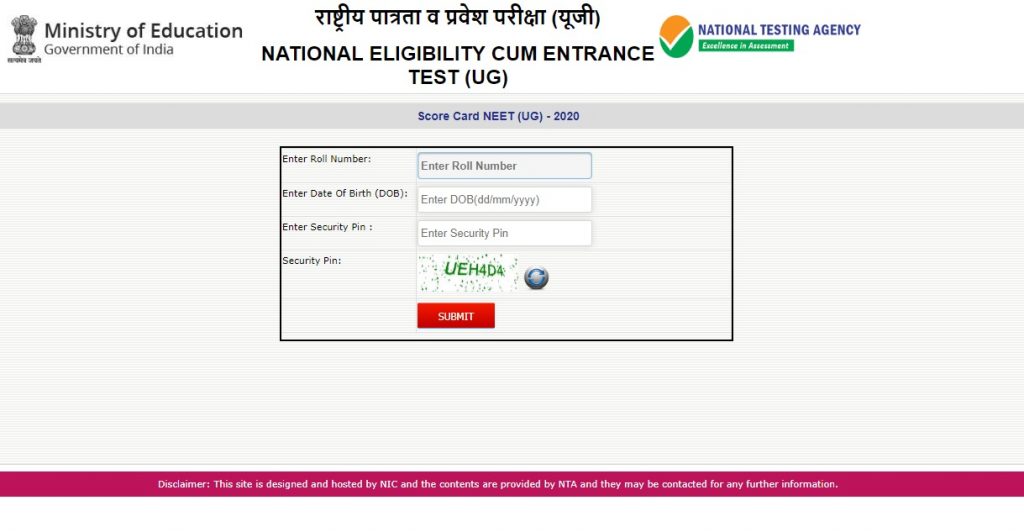
NEET Result 2021 and Merit List
National Testing Agency (NTA) will release the merit list of the candidates based on the NEET result 2021. Multiple lists are released based on the category of the candidate. An overall NEET merit list is also released which has details of all the candidates who have cleared the examination. The merit lists of NEET are then shared by the NTA with the different bodies responsible for the counselling process. Based on these lists, MCC and various counselling authorities will prepare their seat allotment lists.
Types of Merit Lists
Overall merit list: This merit list includes the names and ranks of all the candidates who would appear for NEET 2021. This is the first merit list and is prepared by NTA. This merit list will be forwarded to all counselling bodies, both national and state.
15% AIQ Merit List: This merit list will contain the names of only those candidates who would qualify in the NEET 2021 result. This merit list is prepared by the Medical Counselling Committee (MCC).
State Quota Merit List: Every state will prepare their individual merit lists for admissions to 85 per cent of state quota seats. These merit lists will include only those candidates who will qualify for NEET result 2021 and register for the counselling of that respective state.
NEET Scorecard 2021
Candidates who qualify for the examination can download the scorecard of NEET 2021 online. However, those who do not score above the qualifying cutoff marks/percentile will not be issued the NEET scorecard 2021. Candidates will require the NEET 2021 scorecard during the counselling process, thus, they are advised to keep it safe till the admission process is over.
Details printed on NEET 2021 scorecard
The following information will be printed on the NEET 2021 scorecard:
- Candidate’s name
- Candidate’s roll number
- Category
- Application number
- Overall score
- Subject-wise score
- Percentile score
- All India Rank
- Qualifying status
- NEET AIR for 15% AIQ seats
- NEET cut off score
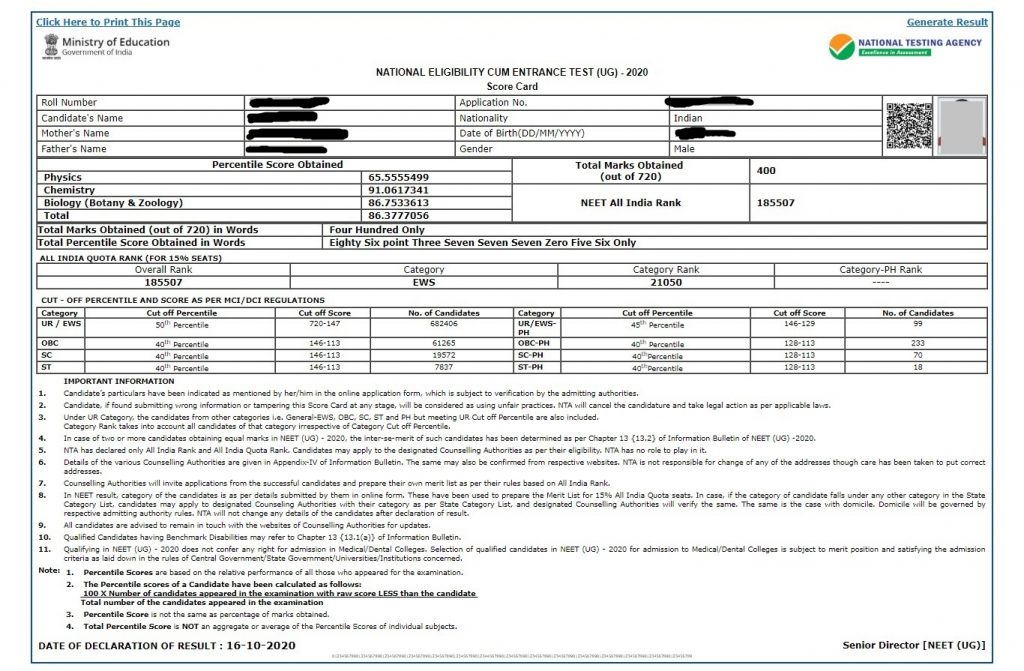
NEET 2020 Result: Qualifying Percentile
The following table carries the NEET 2020 cutoff percentile and the score range according to categories:
| Category | Qualifying percentile | Cut off Score |
|---|---|---|
| UR | 50th Percentile | 720-147 |
| OBC/SC/CT | 40th Percentile | 128-146 |
| UR-PH/EWS | 45th Percentile | 146-129 |
| PH (SC/ST//OBC) | 40th Percentile | 128-113 |
NEET 2020 Result: Statistics for Qualified Candidates
NTA had uploaded the statistics for NEET 2020 qualified candidates. These figures can also be found on the individual scorecards of the candidates.
| Category | Number of qualified candidates |
|---|---|
| Open/EW | 6,82,406 |
| OBC | 61,265 |
| SC | 19,572 |
| ST | 7,837 |
| UR-PwD | 99 |
| OBC PwD | 233 |
| SC PwD | 70 |
| ST PwD | 18 |
NEET Result 2021: Tie-breaking Protocol
What happens when two or more candidates secure the same marks in NEET 2021 Result? Owing to a large number of test-takers, it is not rare for two or more candidates to secure the same marks in this examination. However, such candidates cannot share the same rank in NEET 2021 merit list. Hence, NTA has a tie-break mechanism in place for such situations. The following parameters are considered in the case of a tie in scores:
- Candidate with higher marks in Biology is assigned a higher rank compared to others
- If the marks scored in the Biology section are equal, a candidate with higher marks in Chemistry is assigned a higher rank compared to others
- If marks scored in Biology and Chemistry are equal, a candidate with a lesser number of incorrect answers is assigned a higher rank
NEET 2021 Result: How to calculate the percentile score?
The formula mentioned below is used to calculate the NEET percentile score:
| NEET Percentile = 100 x Number of candidates with their raw score equal to/ less than the candidate Total number of candidates who appeared for NEET |
The validity of NEET Result 2021
The validity of the NEET 2021 result depends on where the candidate wants to apply. Candidates who wish to pursue MBBS from a foreign University will also have to qualify for NEET 2021. The validity depends on the location of the institute one desires to apply for.
NEET result validity for an institute located in India: For aspirants who wish to apply for MBBS courses within India, the NEET result 2021 will be valid for the current academic session only.
NEET result validity for a foreign university: For aspirants who wish to apply for MBBS courses outside India, the NEET result 2021 will be valid for three years.

Apply Now
Our Popular Courses
- Top Demanded
B.Tech Computer Science & Engineering
- ₹96000/- per Year
B.Tech Electronics & Communication Engineering
- ₹96000/- per year
B.Tech Electrical Engineering Course
- ₹96000/- per year
B.Tech Civil Engineering Course
- ₹80000/- Per Year
B.Tech Mechanical Engineering
- ₹60000/- Per Year
BMRIT – Bachelor of Medical Radiology
The dates for NEET UG Counseling 2021 have been released: Today, the Medical Counselling Committee (MCC) released the dates and schedule for NEET UG Counseling 2021. On January 19th, students who are interested in applying to medical school can begin the process of registering for NEET Counseling 2021
| For Free Counselling, Register Now |
|---|
The dates for NEET UG Counseling in 2021 have been released: Finally, the NEET Counselling 2021 Schedule for UG Medical Admissions has been announced today. Union Health Minister Mansukh Mandaviya on Thursday announced that National Eligibility cum Entrance Test (NEET)-under-graduate (UG) counselling for medical admissions will start from 19 January. “Dear students, counselling for NEET-UG is being started by the MCC from January 19.
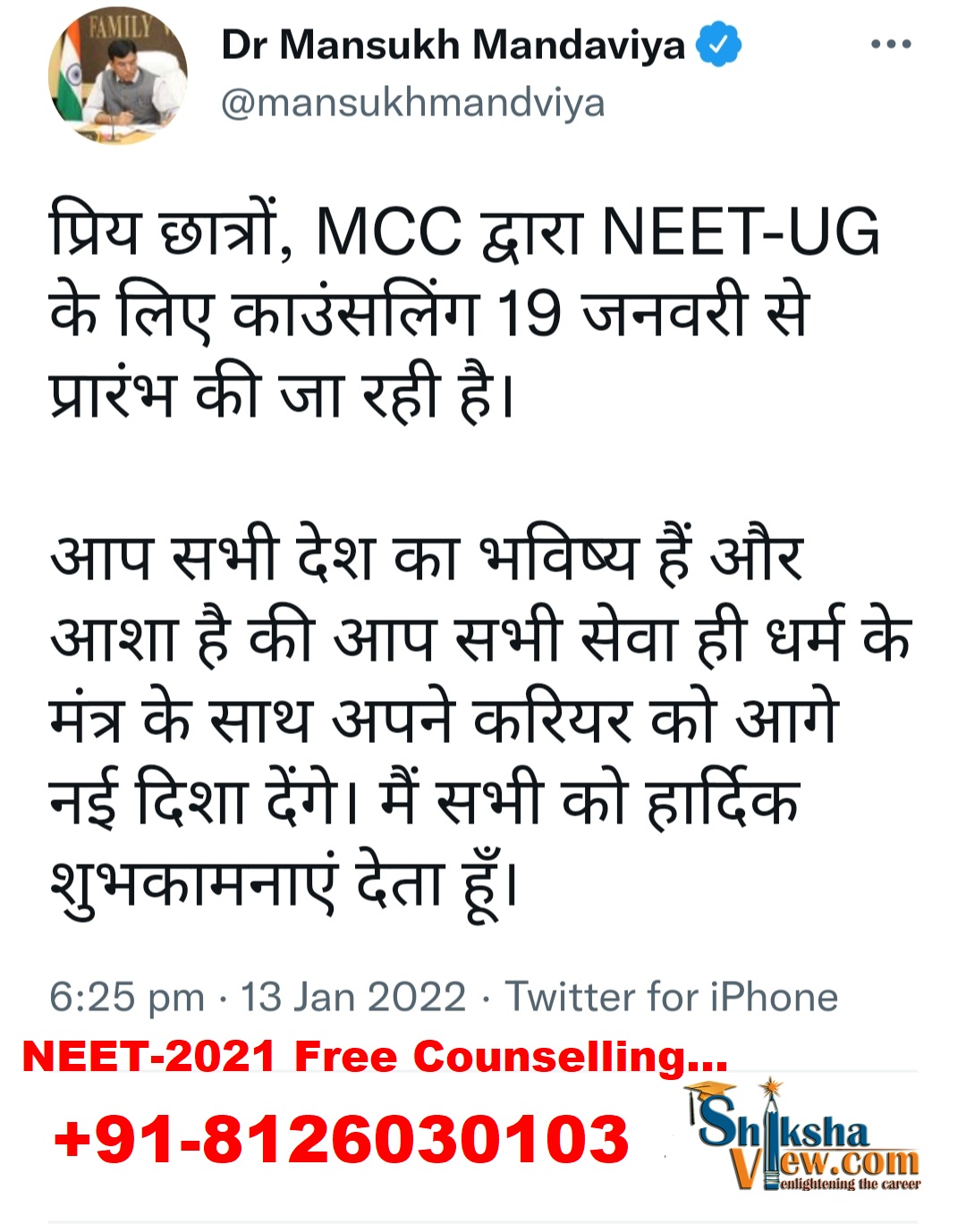
NEET UG Counselling 2021 for medical admissions at the undergraduate level. Finally, the Medical Counselling Committee (MCC) has announced a comprehensive timetable of events including the commencement of registration on January 19, 2022. If you’re interested in applying to MBBS or BDS programs at the undergraduate level, you may get the whole NEET UG Counselling Schedule by visiting the official NEET site, located at mcc.nic.in or get complete information from www.shikshaview.com or by expert call at +91-8126030103.
NEET UG Counselling, (Direct Download NEET UG – 2021-Counseling Schedule) like the postgraduate admissions process, is being conducted in four stages or rounds. Starting on January 19th, the registration procedure for NEET UG Counselling will commence, and the results will be revealed on January 29th, 2022. NEET UG Counselling Round 2 will begin on February 9th, 2022, and the results of the seat allocation will be announced on February 19th, 2022. The NEET UG Counselling Mop-up Round and the Online Stray Vacancy Round will be placed in March 2022 following the second round of the examination. The following is a list of crucial dates and deadlines for NEET UG Counselling 2021 Schedule:
| For Free Counselling, Register Now |
|---|
| Name of the Event | Date(s) |
|---|---|
| ROUND 1 | |
| Registration/Payment of fees | 19-Jan-2022 to 24-Jan-2022 till 12 noon |
| Choice Filling/Locking | 20-Jan-2022 to 24-Jan-2022 till 11:55 pm |
| Processing of Seat Allotment | January 27-Jan-2022 to 28-Jan-2022 |
| Seat Allotment Result | January 29, 2022 |
| Reporting to Allotted Institute | January 30 to February 4, 2022 |
| ROUND 2 | |
| Registration/Payment of fees | February 9 to 14, 2022 till 12 noon |
| Choice Filling/Locking | February 10 to 14, 2022 till 11:55 pm |
| Processing of Seat Allotment | February 17 to 18, 2022 |
| Seat Allotment Result | February 19, 2022 |
| Reporting to Allotted Institute | February 20 to 26, 2022 |
| ROUND 3 (MOP UP Round) | |
| Registration/Payment of Fees | February 28 to March 1, 2022 |
| Choice Filling/Locking | March 3 to 7, 2022 |
| Processing of Seat Allotment | March 10 to 11, 2022 |
| Seat Allotment Result | March 12, 2022 |
| Reporting to Alloted Institute | March 13 to 19, 2022 |
| ROUND 4 (Online Stray Vacancy) | |
| Processing of Seat Allotment | March 21, 2022 |
| Seat Allotment Result | March 22, 2022 |
| For Free Counselling, Register Now |
|---|
Direct Download NEET UG-2021 Counselling Schedule
Direct Download NEET UG-2021 Counselling Schedule from official website https://mcc.nic.in/
NExT (National Exit Test) will be another milestone in the history of medical education. This is going to be a reality from 2022 (speculations), its apex body National Medical Council (NMC) is planning to conduct it for final year MBBS students so that they can validate their degree to practice in India.
This exam is currently known as FMGE (Foreign Medical Graduate Exam) which is mandatory for only those medical graduates who have completed their MBBS course from abroad and willing to practice in India. With the implementation of the NExT exam, all medical graduates whether they have studied MBBS from Indian or Abroad will have to qualify for the NExT exam.
What is NEXT?
NMC (National Medical Council) has introduced the bill in 2019 with an aim to replace NEET PG and the professor exam in the university. After that, the Ministry of health and family welfare also brought a draft in 2020. Now the scenario is, there will be a single-window examination for both Indian medical graduates and Foreign medical graduates.
NExT will replace existing FMGE and NEET PG and it will count as the qualifying final exam for MBBS students. It will be licensing test for student who wants to practice medicine in India as well as it will be a gateway to post-graduation.
The main objective of the NExT is to meet the following needs:
- Providing licenses to MBBS graduates for practicing in India</li><li>Candidates can apply for PG medical programs such as MS, MD, etc
- Now students do not require to qualify for FMGE & NEET PG separately. NEXT will be a common exam for both
NExT is not an entrance exam, it is an exit test which means it’s a Pass and Fails exam in which candidates have to score 50% marks only
Process of Getting a Medical License
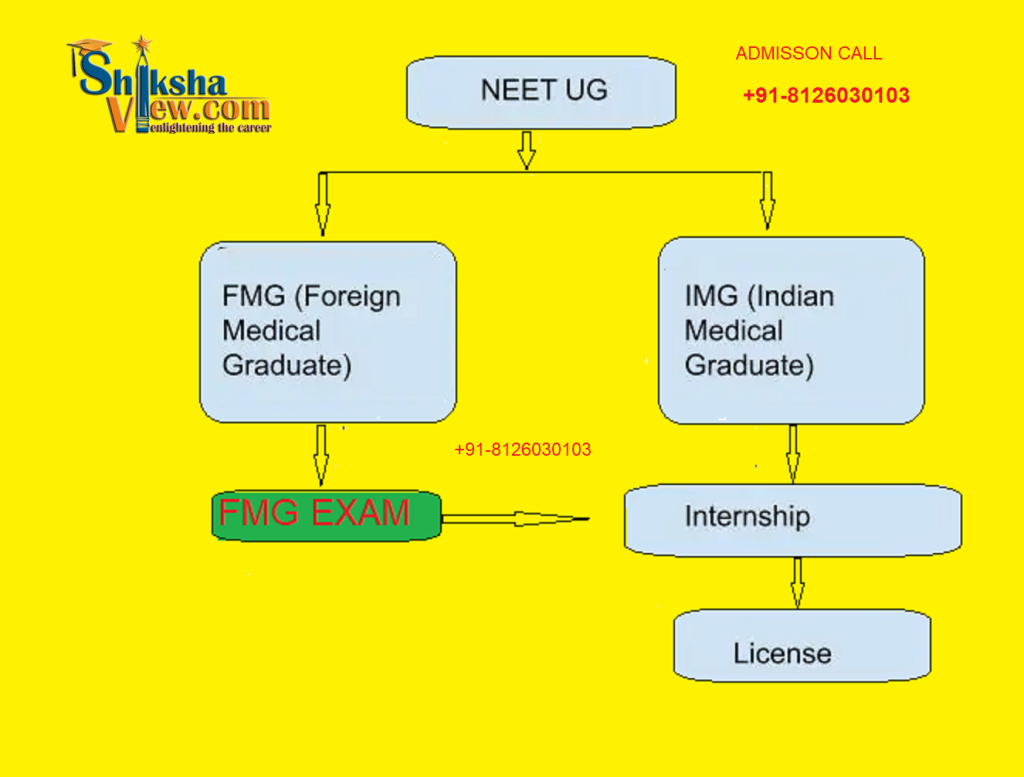
New Process for Getting a Medical License
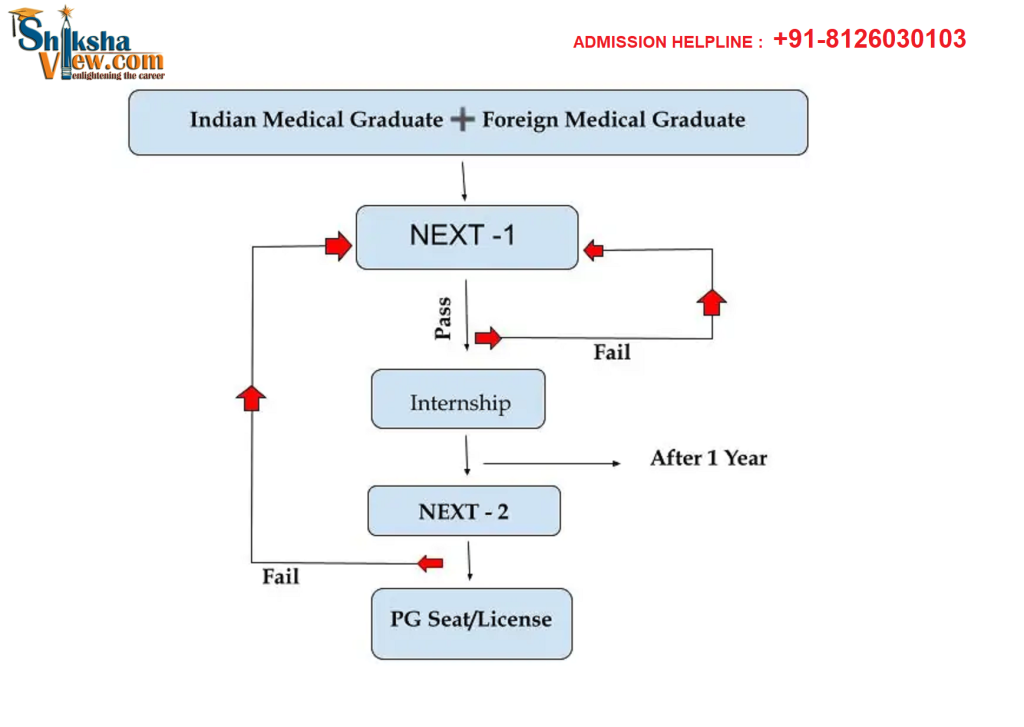
Note1:
- PG seats will be allotted to the students according to the marks obtained in NExT 1 only
- NExT 2 is a pass-fail exam, the candidate will get the license after clearing NExT 2
Subject wise marks distribution and exam pattern for NEXT 1
As per the detail available on NMC official website, the exam pattern, subject-wise number of questions are given below.
NExT 1 is a 3 days exam that is further categorized into 2 parts, 3 hours exam in Pre-lunch and 1.5 hours in Post lunch period.
| Day | Schedule | Time | Subjects | No. of questions |
|---|---|---|---|---|
| 1 | Pre-lunch | 3 hrs | Medical Allied | 120 |
| 1 | Post-lunch | 1.5 hrs | Pediatrics | 60 |
| 2 | Pre-lunch | 3 hrs | Allied | 120 |
| 2 | Post-lunch | 1.5 hrs | ENT | 60 |
| 3 | Pre-lunch | 3 hrs | Obstetrics & Gynecology | 120 |
| 3 | Pst-lunch | 1.5 hrs | Opthalmology | 60 |
| TOTAL | 13.5 hrs | 540 |
Weightage for questions asked in NEXT 1
| Question | Weightage |
|---|---|
| Problem Solving questions | 60% |
| Comprehension and analysis | 30% |
| Recall | 10% |
| Applied Basics Sciences | 10% |
| Preventive and Public Health | 10% |
NEXT 2
It is fully based on clinical knowledge based on your internship. It is mandatory to get a medical license. Students can appear in NExT 2 after completing 12 months internship.
Purpose of introducing NEXT Exam
- The main objective of this exam is to create more skillful medical practitioners in India to strengthen the health system.
- This exam will increase the standard of education in the country as well as equalize the process of getting a medical license in India. Now both the graduates who have done MBBS from Indian private/Government college and Abroad, all will have to undergo the same process.
- The NExT exam will be valid for a minimum of 3 years
- This exam will make the students more confident about their medical skills.
- This exam will bring transparency and uniformity in the process of getting a license. This exam will set a standard to show up the equivalence in the studies of doctors.
Which batch will have to appear for the NEXT exam?
NExT is an exam proposed by the national commission of Indian (NMC) for final year MBBS students. According to section 49, there will be no change in the study pattern for acquiring a medical degree from medical universities.
The amendment passed in 2019 shows that the students who have taken admission in 2017 will have to appear in the First NExT Exam in the year 2020. The syllabus will be the same as Prof IV.
Tips to prepare for NEXT Exam
All MBBS students will become eligible for the NExT in their third year of MBBS. Here are some tips which should be followed by students from the first year of MBBS, so that they can easily crack the NExT after completing their degree.
Make your basics strong
As we have seen in the exam pattern above, the majority of the questions will be based on problem-solving abilities and real-time situations. The updated exam procedure will reduce rote learning which is used by the candidates for just passing the examination without understanding the concept.
This exam will integrate the questions based on pre-clinical and para-clinical learnings. Now it will be difficult to clear the exam for those students who don’t pay attention in the classes especially in practical sessions.
Focus on critical concepts
Again, paying more attention to protocols will increase the chance of your qualifying NExT or getting the PG seat. Because the major difference between NEET PG and NExT is the ratio of clinically based questions. All the questions will judge what you have learned in practice rather than what you have read.
Never skip any important subject
There are rumors that Next would be easy in comparison to NEET PG and it may have a smaller syllabus, but it is not completely true. Yes, these kinds of speculations are there but it is also speculated that the NEET PG syllabus will overlap the syllabus of NExT. so skipping any important subject may put you in trouble.
Practice previous years’ NEET PG papers
Last year’s exam pattern was focused more on clinical knowledge rather than theoretical. It was a hint for the medical students that how will be the NExT Exam. There is a possibility that long situation questionable will be there in majority.
Start preparation early
Earlier, students are suggested to start preparation before 8 to 12 months before NEET PG but with the introduction of NExT, these months will not be available because the NExT-1 Exam will be held before undergoing the internship, so students will face the NExT just after the final year.
Hence students are suggested to start preparation from the beginning of their MBBS studies means from the first year. It means just paying more attention in the clinical sessions/practicals and trying to grasp all the knowledge deeply.
We have tie-ups with various institutes which provide FMGE/NExT classes. Based on this collaboration we ensure our students that they can start preparing for the NExT Exam from their first semester.
We provide an e-learning platform and crush course facilities to our students. They will get all the study material, strategy, and tips, video lectures on each subject on a single digital platform.
In our crash course, students can attend physical classes during semester break when they come home for vacations. In this way, students can study in a strategic and planned way with proper utilization of their time. This method enhances the probability of passing the NExT exam on the first attempt.
Frequently Asked Questions
Q1. Who is Eligible for the NEXT Exam?
Final year MBBS students studying either in Indian or Abroad, students who are pursuing their internship, students who wish to enroll themselves in post-graduation, all these students are eligible to appear in NEET Exam.
Q2. How many attempts for the NEXT exam?
There is no restriction for NExT Attempts, MBBS aspirants can appear for the exam multiple times but it is mandatory to undergo the internship and NExT 2 exam.
Q3. Is NExT and FMGE exam are same?
No, both are different but NExT will replace FMGE and Prof exam held in the university. From 2022, only the NExT exam will be required to get the medical license and seat in the PG course. All this means the NExT exam will replace, FMGE/MCI screening test and NEET PG Exam.
Q4. What will the impact of NExT on MBBS education?
- It will create uniformity through a single exam.
- Unnecessary documentation work will be removed, especially for foreign students.
- Illegal practices done by unqualified and noncertified doctors will be stopped.
- Its clinical and application-based approach will produce more qualified medical professionals
Q5. Is there any disadvantage of NExT over NEET PG?
There is no significant disadvantage of NExT over NEET PG. However, the pattern of NExT is prepared to produce the more skillful doctors. As we have already discussed that the focus will be more on practical, their application, and clinical approach.
Q6. Which is the best platform for NExT preparation?
Though students can prefer any medium or platform for NExT preparation, Shiksha View provides a one-stop solution by collaborating with various educational institutes. We offer short crash courses for the students who can take benefit of it when they come for semester break or winter vacations. We also have online study material which can be accessed from anywhere from any country.
Conclusion
Introducing the NExT exam will be a milestone for the entire medical talent selection procedure, but it is still in consideration and may become reality from 2022 or 2023. Therefore, predicting anything about NExT is not possible. The intentions of the National Medical Council are good but whether it will be a good decision or not. Besides all the arguments and debates, NMC always tries to remove existing flaws from the system by introducing new policies, rules, and regulations.
Welcome to the TPI Online Admission Portal :
Admission Policy & Admission Criteria
Fee Structure
Rules And Regulations
Documents Required
Declaration
I have read and agreed all the terms and conditions stated above. >>Go For Admission
Kindly Fill Details for Registration
NEET Syllabus 2022 Physics, Chemistry, Biology, PDF Download Topic-wise syllabus is given in the article. Read the article to know about the NTA NEET UG Syllabus.
The National Eligibility cum Entrance Test (NEET) is the national-level entrance exam for medical aspirants to gain admission to various undergraduate medical programs (MBBS, BDS, and other medical degrees) in the country. Even the top-level medical institutes like AIIMS and JIPMER consider NEET scores for admissions. As a result, the examination’s difficulty level is high, and only those who have prepared thoroughly can qualify it. Furthermore, the exam will be much more competitive now that the upper age limit has been removed from the eligibility criteria.
As per NTA, a total of 15,44,275 candidates appeared for the exam out of which 8,70,075 candidates have qualified the NEET exam 2021.
Therefore, to qualify the exam, one must have a well-thought-out preparation strategy in place. To develop a successful approach, aspirants must first determine which chapters are critical and which chapters demand special attention. Knowing the NEET 2022 syllabus and chapter-wise weightage would help with this. To help you out, here we present the NEET 2022 complete syllabus of Physics, Chemistry, and Biology with chapter-wise weightage to strategize your exam preparation and approach for your dream score.
NEET Syllabus 2022
NEET Syllabus 2022 : Physics, Chemistry, Biology, PDF Download syllabus is shared in this article. Read the complete article to know about the undergraduate medical entrance exam, NEET Syllabus.
In this article, we have covered separate class-wise and subject-wise syllabus of NEET Syllabus 2022. Students intending to appear for the NEET exam must go through the syllabus mentioned below. Similar to the last year, there hasn’t been much of a change in the NEET 2022 Syllabus. We have provided a complete list of the syllabus that is required to crack NEET 2022.
| Organized By | National Testing Agency [NTA] |
|---|---|
| Exam Name | National Eligibility cum Entrance Test [NEET-UG] |
| Level | National level |
| Exam Mode | Online |
| Syllabus | Released |
| Website | www.ntaneet.nic.in |
You can download NEET UG SYLLABUS 2022 PDF
NEET 2022 Subject Weightage:
NEET 2022 chapter-wise weightage: Physics
| Topic | Average no. of questions asked | Weightage |
|---|---|---|
| Units and Measurement | 1 | 2% |
| Kinematics (Motion in a straight line, Motion in a Plane) | 1 | 2% |
| Laws of Motion | 3 | 7% |
| Work, Energy and Power | 2 | 4% |
| Center of Mass (System of Particles and Rotational Motion) | 1 | 1% |
| Rotational motion (System of Particles and Rotational Motion) | 1 | 1% |
| Motion of System of Particles and Rigid Body | 3 | 7% |
| Gravitation | 2 | 3% |
| Mechanical Properties of Solids & Fluids | 2 | 3% |
| Thermal Properties of Matter | 1 | 2% |
| Thermodynamics | 3 | 7% |
| Kinetic Theory | 1 | 2% |
| Properties of Bulk Matter | 1 | 3% |
| Oscillations | 1 | 3% |
| Waves | 2 | 4% |
| Electric Charges & Fields | 1 | 2% |
| Electrostatic Potential & Capacitance | 1 | 2% |
| Electrostatics | 1 | 3% |
| Current Electricity | 3 | 6% |
| Magnetic Effects of Current & Magnetism | 3 | 6% |
| Electromagnetic Induction | 1 | 2% |
| Alternating Currents | 1 | 3% |
| Electromagnetic Waves | 1 | 1% |
| Ray Optics & Optical Instrument | 3 | 5% |
| Wave optics | 2 | 4% |
| Dual Nature of Radiation and Matter | 2 | 4% |
| Atoms & Nuclei | 2 | 5% |
| Semiconductor Electronics: Materials,Devices and Simple Circuits | 3 | 6% |
NEET 2022 Chemistry weightage section wise:
| Chemistry Section | Weightage |
|---|---|
| Inorganic Chemistry-I | 22% |
| Inorganic Chemistry-II | 12% |
| Organic Chemistry-I | 8% |
| Organic Chemistry-II | 26% |
| Physical Chemistry-I | 17% |
| Physical Chemistry-II | 15% |
NEET 2022 chapter-wise weightage: Chemistry
| Topic | Average no. of questions asked | Weightage |
|---|---|---|
| Inorganic Chemistry-I | ||
| Chemical Bonding | 4 | 9% |
| p-block | 3 | 7% |
| Periodic Table & Periodicity in Properties | 2 | 4% |
| Hydrogen | 1 | 2% |
| s-block | 1 | 3% |
| Inorganic Chemistry-II | ||
| Coordination Compounds | 3 | 6% |
| d-block & f-block Elements | 2 | 4% |
| Metallurgy | 1 | 2% |
| Qualitative Analysis | 1 | 2% |
| Organic Chemistry-I | ||
| Hydrocarbons | 2 | 4% |
| General Organic Chemistry | 2 | 5% |
| Organic Chemistry-II | ||
| Haloalkane | 1 | 2% |
| Aldehydes, Ketones, and Carboxylic Acids | 2 | 3% |
| Polymer | 1 | 2% |
| Alkyl Halide, Alcohol & Ether | 2 | 4% |
| Aromatic Compounds | 3 | 6% |
| Biomolecules | 2 | 4% |
| Carbonyl Compounds | 2 | 4% |
| Organic Compounds containing nitrogen | 2 | 3% |
| Chemistry in Everyday Life | 2 | 3% |
| Environmental chemistry | 1 | 2% |
| IUPAC & Isomerism | 2 | 4% |
| Practical Organic Chemistry | 1 | 2% |
| Physical Chemistry-I | ||
| Atomic Structure & Nuclear Chemistry | 1 | 3% |
| Chemical Equilibrium | 1 | 3% |
| Ionic Equilibrium | 2 | 4% |
| Redox Reactions | 1 | 2% |
| Gaseous State | 1 | 3% |
| Mole Concept | 2 | 5% |
| Thermodynamics and Thermochemistry | 1 | 3% |
| Physical Chemistry-II | ||
| Chemical Kinetics | 2 | 4% |
| Electrochemistry | 1 | 3% |
| Solid State | 1 | 3% |
| Solution & Colligative Properties | 2 | 4% |
| Surface Chemistry | 1 | 2% |
NEET 2022 chapter-wise weightage: Biology
| Topic | Average no. of questions asked | Weightage |
|---|---|---|
| Botany | ||
| Plant Diversity | 7 | 12% |
| Plant Anatomy | 2 | 4% |
| Morphology of Flowering Plants | 4 | 7% |
| Cell Structure & Function | 6 | 10% |
| Bio-molecule | 2 | 3% |
| Plant Physiology | 8 | 13% |
| Plant Reproduction | 5 | 9% |
| Genetics and Evolution | 15 | 24% |
| Ecology and Environment | 10 | 16% |
| Zoology | ||
| Animal Kingdom | 3 | 10% |
| Structural Organisation in Animals | 2 | 5% |
| Human Physiology | 13 | 45% |
| Human Reproduction & Reproductive Health | 5 | 18% |
| Origin & Evolution | 3 | 10% |
| Animal husbandry | 1 | 3% |
| Biology and Human Welfare | 1 | 2% |
| Human Health & Diseases | 3 | 9% |
NOTE: The weightage suggested above is based on previous year’s papers and it may vary depending on the NTA’s latest examination update.
NEET 2022 Important Topics:
Physics Topic:
- Motion of System Of Particles and Rigid Body
- Properties of bulk matter
- Electrostatics
- Current Electricity
- Electromagnetic Induction and Alternating Currents
- Magnetic Effect of Current and Magnetism
- Oscillations and Waves
- Optics
- Electronic devices
- Semiconductors
- Heat and Thermodynamics
- Atoms and Nuclei
- Laws of Motion
- Kinematics
- Work, Energy, and Power
- Rotational Motion
- Modern Physics
Chemistry Topics:
- Coordination compounds
- Chemical bonding & molecular structure
- Equilibrium
- s-block elements
- p-block elements
- d and f block elements
- Hydrocarbons
- Atomic structure
- Electrochemistry
- Solutions
- Organic chemistry – Some basic principles and techniques
- Aldehydes, ketones, and carboxylic acids
Biology Topics:
- Plant Diversity
- Cell Structure & Function
- Plant Physiology
- Plant Reproduction
- Genetics and Evolution
- Ecology and Environment
- Animal Kingdom
- Human Physiology
- Human Reproduction & Reproductive Health
- Origin & Evolution
- Human Health & Diseases
Candidates are advised to go through the subject-wise weightage and formulate an effective NEET 2022 exam strategy keeping the weightage and important topics in mind.
NEET application form 2022 correction window will open from May 24 to May 27, 9 pm. Only those candidates who had completed the application process by paying the fee will be eligible to utilize the NEET 2022 application correction facility. The application for NEET 2022 process will be ended on May 20. The application deadline will be extended twice, from May 6 to May 15 and further till May 20. As per reports, NEET 2022 has received over 18 lakh applications, which is around 12 per cent higher than that of last year. The NEET 2022 exam will be conducted on July 17, similar to the schedule followed in the pre-pandemic era. This year, the NEET application form process will be conducted in a single phase, unlike last year. It is mandatory to submit the NEET application form 2022 to be eligible for the admission process.
Read Also :
NEET Study Material – Free Download PDF Notes
The NEET registration 2022 process is completely online and the NEET application fee had to be paid in online mode as well. Only those candidates who fulfilled the eligibility criteria of the exam could proceed towards the NEET registration 2022 process and submit the documents required for NEET 2022 application form, otherwise, their candidature will be cancelled. Aspirants needed to visit the official website of NTA NEET to fill and submit the NEET application form 2022. After the completion of the NEET 2022 application process, candidates may expect an application correction facility to make necessary changes.
NEET 2022 Application Form Dates
The NEET registration 2022 process is the stepping stone of the national level examination process and has various events involved besides the filling of the NTA NEET registration. Below is the schedule for NEET registration 2022:
| Events | Dates |
|---|---|
| NEET 2022 notification and information brochure release | 06-Apr-2022 |
| NEET 2022 registration start date | 06-Apr-2022 |
| Deadline to fill the NEET 2022 application form | 20-May-2022 (9 pm) |
| Last date to pay application fee | 20-May-2022 (11.50 pm) |
| NEET 2022 application correction window | 24-May-2022 to 27-May-2022 (9 pm) |
| NEET 2022 admit card | First week of June 2022 |
| NEET 2022 exam day | 17-Jul-2022 |
How to Make NEET 2022 Application Correction
Candidates had to follow the steps given below to make changes or corrections in the NEET 2022 application form:
- Visit the NEET 2022 official website – neet.nta.nic.in or directly enter https://examinationservices.nic.in/neet2022/root/Home.aspx?enc=WPJ5WSCVWOMNiXoyyomJgATm16WDSuAdfwpi7ZXy4cM3hblcyDpJgf1oyFFZyuBY
- Click on the ‘Correction for NEET(UG)-2022 Is Available now’ tab on top of the page
- Log in using the application number, password and security code/captcha
- Click on the tab ‘Correction in Particulars’
- Enter the OTP
- Make changes in the editable fields
- Ensure the accuracy of information before clicking on final submission
- Save and print the NEET 2022 correction slip for future use
NEET 2022 Application Form Uneditable Fields
Following are the fields that could not be edited by the candidates:
- Mobile Number
- Email Address
- Nationality
NEET 2022 Application Correction Editable Fields
NEET 2022 applicants could make changes in the following fields:
- Name
- Parents’ name
- Date of Birth
- Gender
- Category and Sub-category
- Changing signature and photograph
- Past academic records
- Preference of exam centre city
- Preference of question paper medium/language
Candidates who had verified their identity with their Aadhaar card number will not be able to edit the following fields:
- Name
- Date of birth
- Gender
NEET Eligibility Criteria 2022
Before filling NTA NEET registration form, candidates had to find out if they are eligible to apply for it. NEET eligibility criteria 2022 have been set by the National Testing Agency that state the basic requirements to appear for the entrance test. The criteria have been summarized in the table given below.
Eligibility Criteria for NEET 2022
The NEET 2022 eligibility criteria are stated in the table below:
| Particulars | Details |
|---|---|
| Nationality | Indian NationalsForeign NationalsNRIPIOOCI |
| Age | The candidate must be at least 17 years of age as of December 31, 2022 |
| Minimum Qualification | Class 12 or equivalent from a recognised institute |
| Mandatory Subjects | Physics, Chemistry, and Biology |
| Minimum Marks in Qualifying Exam | General: 50 per cent PWD: 45 per centSC/ ST/ OBC: 42 percent |
| Number of permitted attempts | No limit specified by NTA |
Documents Required for NEET 2022 Application Form
Since the entire NEET 2022 registration process was online, applicants were advised to keep the following documents ready before filling out the NEET application form to avoid any last-minute hassles.
Documents Required for NEET 2022 Application Form
The table below brings the list of documents and files to be uploaded while filling out the NEET form.
| Documents | Specifications | Size | Format |
|---|---|---|---|
| Scanned Photograph | Passport size and postcard size (both)The photograph must not be older than 3 months Name of the candidate and date must be printed below the photograph | 10 Kb to 200 Kb (passport size)4″x6″, 10 kb to 200 kb (postcard size) | JPG/JPEG |
| Scanned Signature | Signature of the candidate in black ink on white background | 4 Kb to 30 Kb | JPG/JPEG |
| Scan of thumb impression | Left-hand thumb impressionShould be on white paper with blue ink | 10 Kb to 200 Kb | JPG/JPEG |
| Class 10 Passing Certificate | The scanned copy of the Class 10 passing certificate has to be uploaded | 50 kb to 300 kb | |
| Citizenship Certificate or Embassy Certificate | The citizenship certificate or the embassy certificate is required to prove the nationality of the candidates | 50 kb to 300 kb | |
| Other things that must be kept handy | A valid mobile number Valid Email Id Class 10 marks and percentage Class 12 marks and percentage Identity Number – Aadhar Card number/ Passport number/ Ration Card number/ bank account/ any other valid Govt. identity number Credit card/ Debit card/ Net banking credentials |
How to fill the NEET Application Form 2022?
The following infographic gives a snapshot of the steps and their sequence to be followed in order to complete the NTA NEET registration 2022 process.
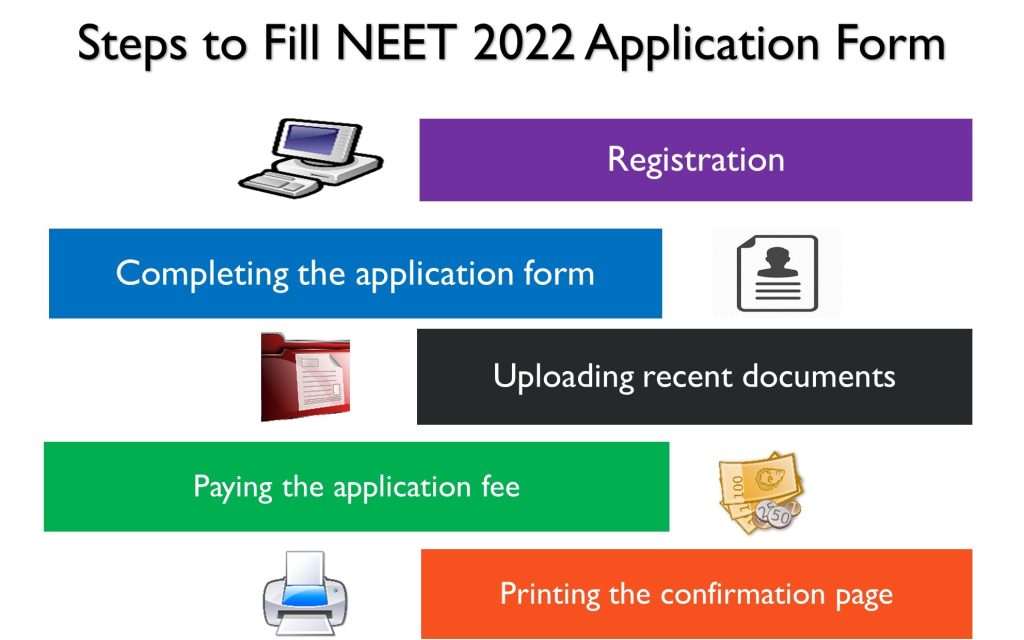
Steps to fill the NEET application form:
Steps to fill the NEET registration 2022 are elaborated below. Candidates could go through the steps before filling the NEET form to understand the process better and avoid confusion.
Step 1: Registration
- Visit the official website of NTA NEET or neet.nta.nic.in or directly enter the link https://examinationservices.nic.in/neet2022/root/Home.aspx?enc=WPJ5WSCVWOMNiXoyyomJgATm16WDSuAdfwpi7ZXy4cM3hblcyDpJgf1oyFFZyuBY
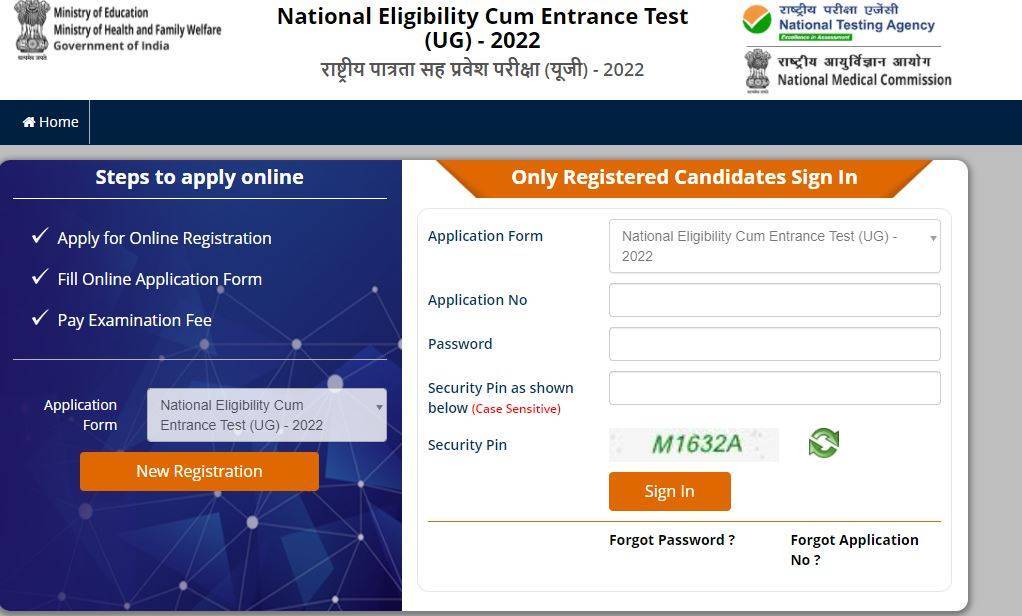
Click on “Fill Registration Form” or the invitation for NEET UG 2022 Registration Click on ‘New Registration’ and read the instructions

Enter the following details
- Candidate’s Name
- Mother’s name
- Father’s name
- Date of birth
- Category
- Gender
- Nationality
- Persons with Disability
- Identification Type
- Identification Number
- Mobile number
- Email Id
- Password
- Enter Security Pin
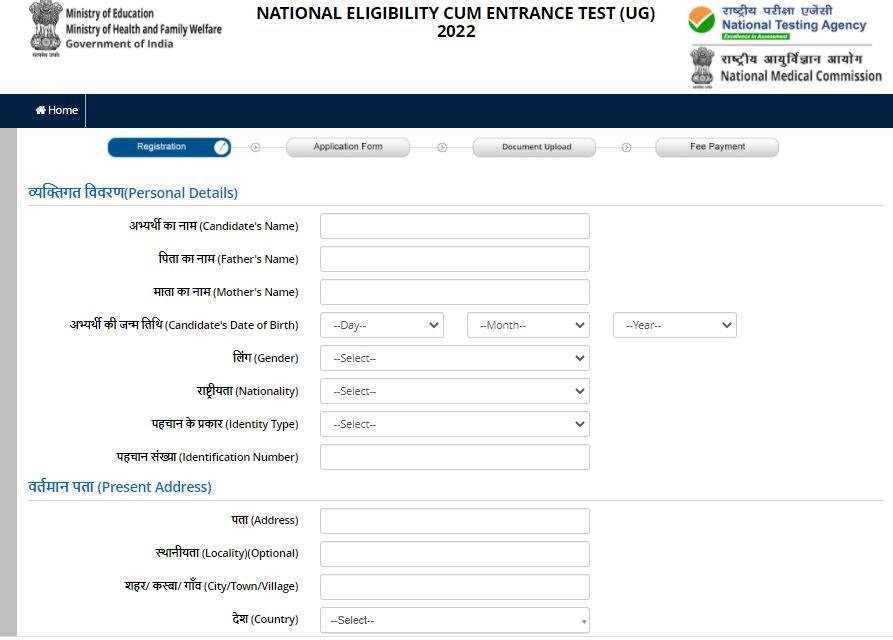
Step 2: Apply online for NEET 2022
- Click on “Click here to login”
- Login using the application number and password
- The NEET application form would open on your screen
- Details entered during the registration process will be pre-filled in the application and cannot be changed
The form is divided into 12 sections, fill in the following details:
The table below carries the different sections of NEET form along with the details to be filled in each section.
| Sections | Credentials |
|---|---|
| Personal Details | Candidate’s Name Mother’s and Father’s Name Gender Category Date of Birth Nationality Persons with disability Do you belong to Minority Category? Are you suffering from Diabetes Type I? Identification Type Identification Number |
| Place of Birth | Place of BirthStateDistrict |
| Choice of Medium of Question Paper | Choose from the following language options: English, Hindi, Gujarati, Marathi, Oriya, Bengali, Assamese, Telugu, Tamil, Kannada, Malayalam, Punjabi and Urdu |
| Choice of Examination Centre | Choose four exam centres in decreasing order of preference |
| Academic Details (Class 10 or equivalent) | Name of School Education Board Name of School /College Address of School/College Year of passing Percentage of marks obtained in Class 10 Class 10 board roll number |
| Academic Details (Class 11 or equivalent) | Name of School / College Year of passing Place of Study State where School/College is located District where School/College is located |
| Academic Details (Class 12 or equivalent) | School Board of Class 12 or equivalent Name of School/College (passed/appearing) Address of School/College Place of study Year of passing State where School/College is located District where School/College is located Qualifying Exam Code Year of passing/Appearing class 12 or equivalent Percentage of marks obtained in Class 10th if passed Enter Roll Number of class 12 |
| Permanent Address | Permanent address of the candidate |
| Correspondence Address | Same as permanent address or fill in the current address |
| Details of Parents/ Guardian | Qualification Occupation Annual income |
| Do you intend to wear a customary dress contrary to the Dress code while appearing for the exam? | Yes /No |
| Security pin | Alphanumeric pin on the screen |
- Check all the details carefully as they cannot be changed after the final submission of the NEET application form 2022
- To submit the duly checked application form, click on “Yes, please do” on the confirmation pop-up
Step 3: Upload scanned images
- Click on “Upload your recent documents”
- Select the files to be uploaded
- Click on “Next”
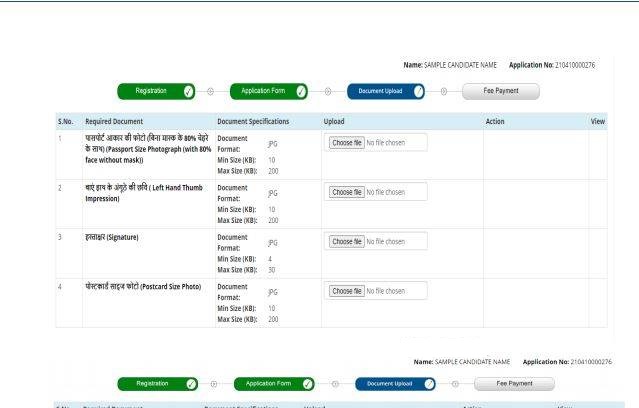
Step 4: Make Payment
Select the desired mode of payment ( SBI/Syndicate/HDFC/ICICI/Paytm Payment Gateway through Debit Card/Credit Card/Net-banking/UPI)
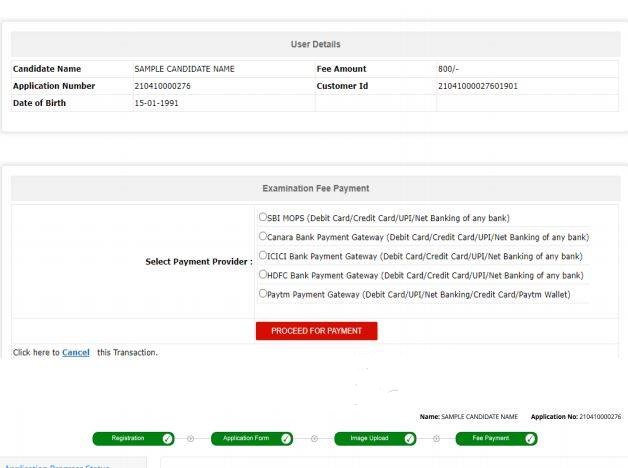
Pay the application fee
The category-wise application fee for NEET 2022 is given below:
| Category | Application fee (In INR) |
|---|---|
| General | 1,600 |
| Other Backward Classes | 1,500 |
| Scheduled Caste /Scheduled Tribe, Persons with Disability | 900 |
| Outside India | 8,500 |
Step 5: Print Confirmation
Save and print the filled NEET application form along with the confirmation slip.
Documents that must be retained till NEET admissions are over
- Printout of the confirmation page
- Receipt for the payment of application fees
- Six to eight copies of the uploaded photograph
NEET Application Statistics
NEET is the largest medical entrance test in India. Every year there is a significant rise in the number of NEET applicants. The data for the past four years has been depicted in the graph given below.
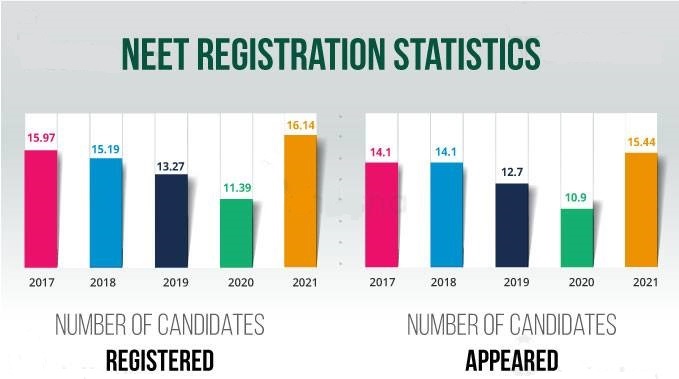
| Candidates | NEET 2021(in Lakh) | NEET 2020(in Lakh) | NEET 2019(in Lakh) | NEET 2018(in Lakh) | NEET 2017(in Lakh) |
|---|---|---|---|---|---|
| Registered | 16.14 | 15.97 | 15.19 | 13.27 | 11.39 |
| Appeared | 15.44 | 14.10 | 14.10 | 12.70 | 10.90 |
| Registered male | 7.10 | 6.80 | 6.85 | 5.80 | 4.97 |
| Registered female | 9.03 | 8.38 | 8.34 | 7.46 | 6.41 |
Frequently Asked Questions (FAQs) Regarding NEET 2022 Application Form
Q: Do I have to pay a correction fee for making changes to the NEET application form 2022?
A: No, there was no fee associated with the NEET 2022 application correction process, unless candidates update their category which impact the application fee.
Q: When will the NEET registration 2022 process conclude?
A: The NEET registration 2022 process ended on May 20. Originally the process was scheduled to end on May 6, which was extended twice, to May 15 and May 20.
Q: What is the total number of registrations received for NEET 2022?
A: As per reports, NEET 2022 has received around 18 lakh applications, which is 12 per cent higher than that of last year.
Q: Is there a change in the NEET application fee for 2022?
A: The NEET application fee was increased by INR 100 for each category as compared to last year. A new category of ‘Outside India’ has been introduced which has an application fee of INR 8,500.
Q: How do I fill NEET Form 2022?
A: The NTA NEET registration procedure was completely online. Candidates ha d to visit the official website to fill in the mandatory details and upload the required files such as applicants’ photographs, signatures and documents. The final step was to pay the application fee through one of the slated payment modes.
Q: Can I fill the NEET application form 2022 offline?
A: The NEET application form 2022 c ould be filled in online mode only. However, there was an exception for the applicants residing in the Kashmir valley or Leh. The NEET 202 2 application fee ha d to be paid using a credit card/ debit card, net banking, Paytm or UPI.
Q: Do I need to send the NEET application form 2022 and other attachments by post to NTA?
A: No, you need not send any documents by post to NTA. The entire application process for NEET 202 2 was online and the relevant documents had to be uploaded online only.
Q: I made a mistake in the email ID during NEET 2022 registration. What can I do?
A: If you had completed the NEET application form 2022 with an incorrect email address, you would not receive the email notifications. However, if the mobile number that you have registered on the NTA portal is correct, you would receive the same notification on your phone. NTA did not allow candidates to change or correct their email addresses in the application correction
Q: The session expired while submitting the application form for NEET 2022. What should I do?
A: Candidates filling the NEET application form had to fill and submit it within 30 minutes of logging into the registered account. Also, they had to keep saving each portion of the application form to avoid filling it again if the session expires. To ensure completing the form in under 30 minutes, it was advised to keep all the information handy.
Q: Can I fill the NEET form without the internet?
A: Candidates without access to the internet had to visit the nearest Common Services Centre (CSC). The CSCs help in filling out the application form for NEET 2022 and payment of the application fee. They charge a nominal fee for these services. To know the details of the nearest CSC, visit csc.gov.in.
Q: How can I be sure that NTA has received the application fee?
A: After the payment has been processed successfully, a confirmation page open ed on the screen. This was a confirmation that the NEET 2022 application fee has been received by the NTA. This ha s to be saved and printed for future reference.
Q: When will the NEET 2022 Phase 2 application process begin?
A: The NEET application process was conducted over a single window this year unlike last year, where NEET registration was conducted over two phases. The information which were to be submitted in the second phase of the NEET registration form last year have to be submitted in this primary phase of the NEET registration window,
NEET 2022 admit card is expected to be released in the second week of June. Prior to that, NTA is expected to release the exam city allotment information for candidates to plan better. NEET 2022 will be conducted on July 17 for a duration of three hours and 20 minutes (200 minutes). NEET 2022 application form process concluded on May 20. As per reports, NEET 2022 has received over 18 lakh applications.
Although NEET UG 2022 aspirants have urged NTA and the Ministry of Education to postpone the date of the exam, there has not been any response from the exam officials yet. It is expected that The NEET 2022 will be conducted on the scheduled date and time. The reasons for this demand include clashing of exam dates with CUET and other competitive entrance exams, ongoing NEET 2022 counselling, and less time left for NEET preparation, to name a few. Several students and activists had filed RTI to NTA to know the status of the NEET 2022 postponement but the authorities have mentioned that there is no such plan to postpone the exam date. As of now, there is no indication for NEET 2022 exam date to be postponed. However, chances cannot be completely undermined either as the exam date is still two months from now.
What is NEET and What’s New This Year?
The National Eligibility cum Entrance Test (NEET) is the sole entrance test for admission to MBBS and BDS courses in India. The exam is conducted once a year in offline mode for a duration of three hours and 20 minutes. The National Testing Agency (NTA) conducts the medical entrance exam for admission to MBBS, BDS, BSc Nursing, AYUSH, Veterinary, and other medical/paramedical courses in India. Over 15 lakh candidates appear for the NEET UG exam every year. The exam is conducted in 13 languages.
There are certain changes in NEET 2022 which are listed below:
- The duration of NEET has been increased by 20 minutes. Instead of three hours, the exam will now be conducted for three hours and 20 minutes.
- The application fee across candidate categories has been increased by INR 100.
- The registration process will not be conducted over two phases.
- The tie-breaking formula has been revised and six other factors have been added to the existing three factors
- The number of exam cities has increased to 543 in India and 14 abroad.
NEET UG 2022 Highlights
The following table enlists the key features and highlights of NEET UG 2022.
| Particulars | Details |
|---|---|
| Exam Name | National Eligibility Cum Entrance Test (NEET) |
| Conducting Body | National Testing Agency (NTA) |
| Exam Level | Undergraduate (UG) Exam at National Level |
| Exam Frequency | Once a year |
| Total Registrations | 18 lakh (Approx) |
| Exam Mode | Offline or Paper Pencil Based Test (PBT) |
| Courses Offered Through NEET UG | MBBS, BDS, BAMS, BVSC & AH |
| Exam Fees | INR 1,600 (General)INR 1,500 (OBC)INR 900 (Reserved category candidates)INR 8,500 (Foreign nationals) |
| Exam Duration | 3 hours and 20 minutes |
| Number of Subjects and Total Marks | Physics (180 marks)Chemistry (180 marks)Biology (360 marks)Total Marks – 720 |
| Total Questions | 200 (180 to be attempted) |
| Marking Scheme | +4 for each correct answer-1 for each incorrect answer |
| Number of Exam Cities | 543 (India)14 (Abroad) |
| Language/Medium of Paper | 13 Languages – English, Hindi, Bengali, Urdu, Assamese, Gujarati, Marathi, Odiya, Kannada, Tamil, Malayalam, Punjabi and Telugu |
| Accepting Colleges | 1,613 colleges |
| Total Number of Seats | MBBS – 90,825 BDS – 27,948 BAMS – 52,720 BVSc & AH – 630 |
| NEET Helpline Numbers | 08126030103 |
| NEET Official Website | neet.nta.nic.in |
NEET 2022 Admit Card
The NEET 2022 admit card is expected to be released in the second week of June in online mode. To download the NEET admit card 2022, registered candidates will have to log in to the official website with their NEET 2022 application number and password and download the hall ticket in PDF format. After downloading the admit card, candidates have to take a printout of the same and paste a recent postcard-sized photograph (preferably the same as the one uploaded with the application form) in the space provided in 4″x6″ dimensions. Also, candidates have to get it signed by a parent/guardian before entering the exam hall. They may leave the candidate signature section blank and sign it in front of the invigilator. Along with the personal details, candidates will be able to check the instructions and guidelines on the NEET 2022 admit card. The admit card will be a mandatory document to be carried at the exam center without which they will not be allowed entry.
NEET 2022 Application Form
NEET 2022 application process was completely online wherein applicants had to visit the NEET 2022 official website and complete the procedure given in the following steps:
- Visit the NEET 2022 official website
- Click on the tab indicating the application form
- Read all the instructions and register with personal details such as name, contact details, password, etc. to generate the application number and password
- After the credentials are generated, log in and fill the application form with personal and educational details, exam medium and exam city preference and photograph and signature upload
- Pay the application fee in online mode through credit/debit card, net banking, Paytm and UPI
NEET Application Fee
The category-wise application fees are given in the below table:
| Category | NEET 2022 Application Fee (in INR) |
|---|---|
| General | 1,600 |
| General EWS and OBC | 1,500 |
| SC, ST, PwD | 900 |
| Outside India | 8,500 |
The NEET 2022 application correction window was open from May 24 to May 27, till 9 pm. Only those candidates who had completed the application process by paying the application fee could avail the correction facility provided by NTA. They had to login to the NTA NEET 2022 website with their registration credentials and carry out the changes in the editable fields. Fields such as mobile number, email address and nationality were not editable. In case of a change of category, the impact may have caused a change in the application fee, which had to be paid by the candidates during the correction process of NEET 2022.
NEET 2022 Eligibility Criteria
NEET UG 2022 aspirants who wish to apply for the entrance test are advised to check if they fit into the criteria specified by NTA. Candidates who fulfil the following parameters are eligible for the exam.
Nationality:
Citizens or applicants belonging to the following nationalities are eligible to apply for NEET:
- Indian Nationals
- Non-Resident Indians (NRIs)
- Overseas Citizen of India (OCI)
- Persons with Indian Origin (PIO)
- Foreign Nationals
Age Limit:
The age limit or age criteria for NEET candidates are as follows:
- The minimum age of a candidate as of December 31, 2022, should be 17 years.
- The upper age limit of 25 years for General category candidates and 30 years for reserved category candidates have been removed by NMC.
Minimum qualification:
Applicants should fulfil the educational qualification mentioned below:
- Candidate must have cleared Class 12 or equivalent from a recognized institute and Board.
- Candidates who are appearing for Class 12 or equivalent in 2022 can also apply for NEET 2022.
- Candidates who have completed Class 12 or equivalent from an open school are also eligible.
Mandatory subjects:
- Candidate must have cleared Class 12 or equivalent with Physics, Chemistry and Biology.
- Candidates who have passed Class 12 or equivalent with Biology as an additional subject are also eligible.
Minimum marks required in the qualifying examination:
- General category: 50 per cent
- PWD category: 45 per cent
- SC/ST/OBC: 40 per cent
NEET 2022 Admission Process
The admission process of NEET involves stages, which are given below:
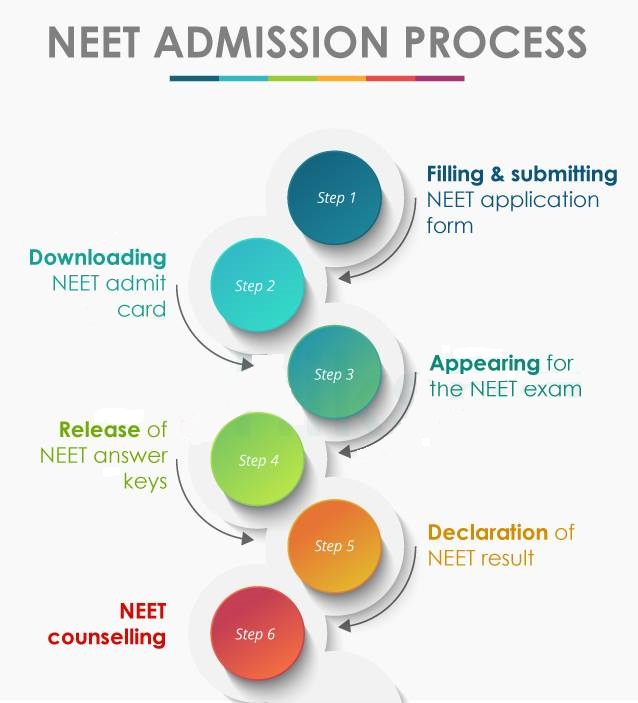
NEET 2022 Exam Centers
It is expected that there will be approximately 4,000 NEET 2022 exam centers located in over 543 cities in India and 14 cities abroad. Last year, NEET was conducted at 3,855 centers in 202 cities of India, Dubai and Kuwait. Candidates had to choose four test cities in order of preference while filling the application form. The final allotted exam center will be notified to them on the admit card. NTA is expected to release the exam center city allotment information by mid-June, prior to releasing the NEET 2022 admit card.
NEET 2022 Exam Dates
The following table brings the NEET 2022 exam dates for each event.
| Events | Dates | Salient Features |
|---|---|---|
| NEET UG 2022 date announcement | 06-Apr-2022 | The exam date was announced by NTA on the official website. |
| NEET 2022 application process | 06-Apr-2022 | Candidates could fill and submit the NEET 2022 application form. |
| Last date to pay application fee | 20-May-2022 (11.50 pm) |
Candidates could pay the NEET 2022 application fee till this date. |
| NEET 2022 application correction window | 24-May-2022 to 27-May-2022 (9 pm) | Registered candidates could make modifications or corrections by logging in through their application number and password. |
| NEET 2022 admit card | Second week of June 2022 | Candidates can download the NEET 2022 admit card by logging in with their registration credentials. |
| NEET 2022 exam date | 17-Jul-2022 | The exam will be conducted in a paper-pencil based mode or an offline mode for a duration of three hours, from 2 pm to 5.20 pm. |
| NEET 2022 provisional answer keys | Third week of August 2022 | Candidates can check and download the provisional NEET answer keys and calculate their estimated score. They may also file objections against one or more keys provided they have sufficient evidence to support the claim. |
| NEET 2022 final answer keys and result | First week of September 2022 | The NEET result will be declared online through email and on the official website. Candidates will have to login with their registration credentials to download the scorecard. |
NEET 2022 Preparation Tips
Candidates preparing for NEET 2022 should first be familiar with the exam pattern and syllabus. After that, they need to shortlist the books to refer to for NEET 2022 preparation. To complete the topics in the syllabus, one must refer to NCERT books. Candidates must prepare a timetable for NEET preparation. This should be followed for completing the preparation on time. Another important aspect of NEET UG preparation is solving mock tests and sample papers. Since the weightage of all sections is equal in the exam, aspirants should give equal focus on all sections or subjects to secure a balanced score. After taking regular mock tests, students would develop an understanding of their strong and weak areas and should channelize their subject or topic-wise preparation accordingly.
NEET 2022 Syllabus
The NEET 2022 syllabus comprises three subjects, namely Physics, Chemistry and Biology. The syllabus is the same as that of CBSE Class 11 and Class 12. However, a few topics of the syllabus are not taught in these classes. Candidates are advised to go through the syllabus before they start preparing for the entrance test. It is expected that the NEET syllabus 2022 will remain the same as that of last year.
NEET 2022 Exam Pattern
The exam pattern of NEET was changed by NTA last year. The same exam pattern is followed this year as well, except the total duration. The total number of questions is 200. However, the number of questions to be attempted is 180. Each subject or section is divided into two sections, Section A and Section B. While the former carries 35 questions, the latter carries 15 questions. In Section B, candidates have to answer 10 questions out of 15 questions. The duration of the exam has been increased by 20 minutes this year. Each question carries four answer options and test-takers had to mark the correct answer option on the OMR sheet. The NEET 2022 exam pattern has remained the same as last year.
NEET 2022 Mock Test
NEET mock tests are generally released by NTA to help aspirants prepare for the exam. The mock tests can be taken in online mode, although the actual exam is conducted in offline or paper-pencil based mode. Candidates can take offline mock tests for the exam which are conducted by the coaching institutes to assess their preparation. After taking the mock test, it is necessary to analyze it to understand the gaps and improve their performance by changing the preparation strategy accordingly. The mock tests are of various difficulty levels. The difficulty level of the questions in these mock tests ranges from very easy to difficult. Candidates who solve the mock tests gain experience in solving a variety of questions thus preparing them for the exam day.
NEET 2022 Exam Day Guidelines
NTA releases exam day guidelines for the exam day to help candidates stay calm and have a hassle-free day. Last year, some additional exam day guidelines were issued by NTA for NEET. These guidelines were released in view of the exam being conducted in the wake of the COVID-19 pandemic. Candidates can refer to the general guidelines for NEET UG 2022 exam day that are given below:
- Candidates have to reach the exam centre at least an hour before the reporting time, i.e. 12.30 pm, so that they can undergo the security checks and frisking procedure properly.
- Candidates have to take the allotted seat.
- They have to paste their passport size photograph on the admit card.
- The exam is video recorded by the conducting authorities and candidates had to agree to it. They have to keep their head in an upright position and face the camera so that their identity could be clearly established.
- To ensure COVID-19 safety protocols, masks are provided to all candidates at the exam centres and staggered entry, exit, contactless registration and seating arrangement with the maintenance of social distancing is ensured.
NEET Dress Code
Due to a large number of test-takers, the NTA follows strict policies to maintain the discipline and fairness of NEET. One of the important policies is the dress code for NEET 2022. NTA has prescribed a particular dress code for the examination day. Below are a few important pointers about the dress code for NEET UG 2022:
- Light colored clothes with half sleeves were allowed but long/full sleeves were not permitted
- Ornaments such as earrings, necklaces with pendants, rings, anklets, etc. were not permitted
- Candidates wearing a customary dress pertaining to any religion, in particular, had to report to the examination center at least an hour before the last reporting time
- Slippers and sandals with low heels were permitted. Shoes were not permitted.
NEET Exam Analysis: Previous Year
According to the NEET 2021 analysis, the difficulty level of the exam was moderate. Most students felt that Physics was difficult, Chemistry was moderate and Biology was easiest. The new exam pattern was considered to be time-consuming and the majority of the test-takers did not find it much conducive. No technical glitches were reported in the exam by any of the students that Shiksha interviewed.
NEET 2022 Result
NEET 2022 result is likely to be released in the first week of September. It is likely that the scorecard will be sent to candidates via email and then on the official website. To download the NEET 2022 result, candidates will have to log in through the application number and date of birth. The NEET result or scorecard will carry test takers’ subject-wise and overall scores, percentile and All India Rank (AIR). Last year, out of 15,44,275 candidates who appeared for the exam, 8,70,074 candidates qualified for the exam. Refer to the table below to know the category-wise qualifying cut off pre-defined by the Medical Council of India.
| Category | Qualifying Cut Off |
|---|---|
| Unreserved category | 50th |
| Unreserved category PwD | 45th |
| Reserved category (including reserved category PwD) | 40th |
NEET 2021 Toppers
NEET 2021 topper toppers percentile.
| Name | AIR | Score | Percentile | State |
|---|---|---|---|---|
| Mrinal Kutteri | 1 | 720 | 99.999806 | Telangana |
| Tanmay Gupta | 1 | 720 | 99.9998057 | Delhi |
| Karthika G Nair | 1 | 720 | 99.9998057 | Maharashtra |
| Aman Kumar Tripathi | 4 | 716 | 99.999741 | Uttar Pradesh |
| Jashan Chhabra | 5 | 715 | 99.998705 | Karnataka |
| Deepak Sahu | 5 | 715 | 99.998705 | Uttar Pradesh |
| Shubham Agarwal | 5 | 715 | 99.998705 | Uttar Pradesh |
| Nikhar Bansal | 5 | 715 | 99.998705 | Delhi |
NEET Cutoff Marks (Opening & Closing)
Aspirants can refer to the table below to know the NEET cutoff trends for the past three years. This will help them understand the difficulty level of the examination.
| Category | 2021 | 2020 | 2019 |
|---|---|---|---|
| Unreserved | 720-138 | 720-147 | 701-134 |
| Unreserved PWD | 137-108 | 146-129 | 133-120 |
| Reserved | 137-122 | 128-113 | 133-107 |
| Reserved PWD | 121-108 | 128-113 | 133-107 |
NEET 2022 Counselling Process
After the declaration of the result, the NEET 2022 counselling process will be conducted within a month. The counselling will be conducted for 15 per cent All India Quota (AIQ) seats and 85 per cent State Quota seats. The Medical Counselling Committee (MCC) will conduct the AIQ counselling process and the respective state authorities will conduct the State Counselling for NEET 2022. There will be four rounds of counselling, Round 1, Round 2, mop-up round and stray-vacancy round. Upon the release of the NEET 2022 counselling notification, qualified candidates will have to register by filling up the form, uploading the necessary documents and paying the registration fee. The next step is the choice filling and locking. Once the seat allocation order is released, candidates will have to download it and report to the institute and complete the admission formalities to claim the seat. They may not accept the seat in the first round and participate in the second round for upgrading their seat. In case candidates are not allotted a seat in both rounds, they will be eligible to participate in the mop-up and stray-vacancy rounds.
Courses Offered Through NEET
NEET UG is the gateway to admission to multiple medical and paramedical courses:
- MBBS
- BDS
- Ayurvedic Medicine
- Homoeopathy Medicine
- Unani Medicine
- Siddha Medicine
- Veterinary Sciences and Animal Husbandry
- BSc (Hons) Nursing
- Bachelor of Physiotherapy
- Bachelor of Occupational Therapy
- Bachelor of Audiology, Speech and Language Pathology
- Bachelor of Prosthetics and Orthotics.
In India, there are a total of 542 Medical, 313 Dental,914 AYUSH, and 47 BVSc & AH colleges that will accept NEET 2021 scores. There are a total of 15 AIIMS and two JIPMER campuses that also accept this exam score for admission. This year, BSc (Hons) Nursing course admission will also take place through NEET but the seat matrix is yet to be released. As per the current data, there are 90,825 MBBS, 52,728 AYUSH, 27, 948 BDS, 603 BVSc, and 487 BSc nursing.
FAQs Regarding NEET UG 2022
Q: When will NEET 2022 admit card be released?
A: NEET 2022 admit card is expected to be released in the second week of June.
Q: When will NEET UG 2022 be held?
A: NEET UG 2022 will be conducted on July 17.
Q: Will NEET 2022 be postponed ?
A: Despite huge demands from students to postpone the NEET 2022 exam date, NTA or the Ministry of Education has not indicated any chance of the exam getting postponed. However, there may be a last moment decision regarding this since there are two months left for the exam day.
Q: Will the NEET 2022 exam pattern remain the same as last year?
A: The NEET exam pattern has remained the same this year except for the duration, which has increased by 20 minutes.
Q: Will the NEET UG syllabus 2022 change?
A: As of now, there has been no indication about changing the exam syllabus of NEET UG. Hence, NEET 2022 syllabus is the same as that last year.
Q: What are the regional language options available for NEET UG 2022?
A: NEET UG question paper is available in 13 languages. Apart from Hindi and English, candidates can choose from Tamil, Urdu, Marathi, Bengali, Gujarati, Odiya, Assamese, Kannada, Malayalam, Punjabi and Telugu. Candidates have to enter their language preferences in the application form.
Q: Can I make changes in the NEET 2022 application form?
A: Yes, registered candidates could make changes in the NEET 2022 application form between May 24 and May 27, 9 pm by logging in to the official website .
Q: When was NEET 2022 announced?
A: NTA had announced the NEET 2022 dates on April 6, along with releasing the exam notification and application forms.
Q: Will NEET UG 2022 be held twice?
A: No, NEET 2022 will be conducted once, on July 17 from 2 pm to 5.20 pm.
Q: What is the eligibility criteria for NEET?
A: As per the eligibility criteria of NEET, candidates should pass the Class 12 Board exam from a recognized institute and board from the Science stream with a minimum of 50 per cent aggregate (40 per cent for OBC/SC/ST and 45 per cent for PwD category candidates). They should be a minimum of 17 years of age as of December 31 of the year of admission.
Q: Is there any upper age limit for taking NEET UG?
A: The upper age limit criterion has been removed by NMC on March 9, 2022. Earlier, the case was under trial in the apex court.
Q: Who conducts the NEET UG exam?
A: NEET UG exam is conducted by the National Testing Agency or NTA.
Q: How many times can I appear for NEET?
A: According to the notification released by NTA, a candidate can appear for NEET any number of times. There is no restriction on the number of attempts permitted. The exam is conducted once a year.
NEET 2022 Contact Information
| Name | Contact No. | e-mail id | Service available only on Working Days |
|---|---|---|---|
| Help Desk | 08126030103 | info@shikshaview.com | 08:00 am to 08:00 pm |
NEET eligibility criteria 2022 will be prescribed by NTA for the candidates who wish to apply for the entrance test. Know the age limit, qualification, and marks required to appear for NEET 2022 here
NEET Eligibility Criteria 2022 – Before applying for NEET UG 2022, candidates must have ensured that they fulfil the NEET 2022 eligibility criteria, otherwise, their candidature will be cancelled. NEET eligibility criteria are prescribed by the National Testing Agency in accordance with the Indian Medical Council Act-1956 and the Dentists Act-1948 as amended in 2018. Although this year’s information bulletin, which would carry the NEET 2022 eligibility criteria is yet to be released by NTA, it is expected that the criteria would remain the same as that of last year.
In an official announcement made by the National Medical Commission (NMC) on March 9, it was stated that the upper age limit for candidates has been removed. Earlier, the age limit for General and reserved category candidates was 25 years and 30 years respectively. NEET 2022 notification and application forms were released on April 6 and the exam is scheduled to be held on July 17. Approximately 16 lakh candidates are expected to register for the exam.
The National Eligibility cum Entrance Test (NEET) is an entrance test conducted for admission to various medical and allied courses, including MBBS, BDS and AYUSH. Thus, the eligibility criteria of NEET 2022 set up a basic minimum qualification for a candidate to apply for the said courses. NTA had removed the upper age limit clause from NEET 2021 eligibility criteria thus enabling aspirants older than 25 years to apply for it. All those who wish to apply for this national entrance test are advised to check their eligibility before filling the NEET application form 2022. Candidates who do not take the NEET eligibility criteria seriously, if found ineligible, may have to face severe consequences such as the cancellation of their admission.
Candidates must, however, note that the decision for removing the cap on the upper age limit of NEET aspirants is still pending in the Supreme Court of India. Candidates older than 25 years of age must fill the application form of NEET 2022 at their own risk, taking into consideration the fact that the verdict of the apex court will determine their eligibility.
Read the complete article to know more about the eligibility for NEET 2022.
Basic NEET Eligibility Criteria 2022
Below mentioned are the basic or primary eligibility criteria for NEET UG 2022.
- Candidates must have attained the age of 17 years at the time of admission or will attain the same by December 31, 2022. Accordingly, the minimum date of birth of candidates should be December 31, 2005.
- Indian nationals/ Overseas Citizens of India (OCIs) who wish to pursue MBBS/ BDS from a foreign university also have to qualify for NEET 2022.
Eligibility criteria of NEET 2022: Qualifying Marks
Below mentioned are the NEET 2022 eligibility criteria with respect to the educational background or marks obtained in the qualifying exam.
- Candidates must have passed Physics, Chemistry, Biology/Biotechnology and English subjects individually in the qualifying examination.
- Candidates belonging to the General category must have scored a minimum of 50 per cent in the qualifying examination.
- Candidates belonging to Scheduled Caste/ Scheduled Tribes/ Other Backward should have a minimum score of 40 per cent in the qualifying examination.
- Candidates who belong to the General category and are applying under the Persons with Disability (PWD) Quota, must have a minimum score of 45 per cent marks in the qualifying examination.
Minimum Qualifying Marks as per NEET 2022 Eligibility Criteria
The following table brings the minimum aggregate required in the qualifying exam or as per the evaluation criteria,
| Category | Minimum aggregate in the qualifying examination (PCB) |
|---|---|
| General | 50 per cent |
| General – PWD | 45 per cent |
| SC/ ST/ OBC/ Reserved-PWD | 40 per cent |
Note: The minimum aggregate is likely to be revised in the wake of the new evaluation scheme to be introduced by the Ministry of Human Resource Development (MHRD) since the Board exams of the major boards like CBSE and ICSE are cancelled.
How Many Attempts for NEET?
The maximum number of attempts for the NEET has not been directed by the NTA. Thus, allowing a candidate to appear for NEET as many times as they want to.
NEET Eligibility Criteria 2022 for Candidates Belonging to the UT of J&K/ Ladakh
Candidates belonging to the UT of J&K/ Ladakh are not eligible to apply for the 15 per cent All India Quota seats and can only apply for the seats of Deemed Universities, ESIC, and AFMC.
NEET 2022 Eligibility Criteria for Candidates Applying for State/ Deemed/ Central/ ESIC/ AFMC Seats
The following criteria are related to the seat categories:
- Indian Nationals, NRIs, OCIs and PIOs are eligible to apply for these seats
- Foreign nationals should confirm their eligibility before applying for NEET 2022
NEET Eligibility Criteria 2022 for Candidates Applying for 15 per cent All India Quota (AIQ) Seats
Indian Nationals, NRIs, OCIs, PIOs and foreign nationals are eligible to apply for these seats.
The following table brings the new NEET reservation criteria for OBC, EWS, SC, ST and PwD categories under the 15 per cent AIQ seats are as follows:
| Categories | Reservation Percentage |
|---|---|
| SC | 15 |
| ST | 7.5 |
| OBC | 27 |
| EWS | 10 |
| PwD | 5 |
On July 29, 2021, the Government of India had made a landmark decision that from the academic year of 2021-22 onwards, there would be 27 per cent OBC quota in NEET(Non-Creamy Layer) and 10 per cent NEET reservation for EWS in 15 per cent Under Graduate (UG) All India Quota seats (MBBS/BDS) (contributed by the State/UTs to the Central Pool).
NEET 2022 Eligibility Criteria for Central Universities
Delhi University (MAMC, LHMC, UCMS): Like all other universities, only 15 per cent seats of the colleges affiliated with the Delhi University will be filled through NEET 2022 counselling. The remaining 85 per cent of seats will be filled via DU NEET counselling. Candidates who have passed Class 11 and Class 12 from an institute located in Delhi will be able to apply for these 85 per cent seats.
Faculty of Dentistry, Jamia Millia Islamia: The institute offers 50 BDS seats, out of which 47 seats will be filled through the MCC NEET counselling 2022. The remaining three seats fall under the institutional quota and will be allotted to only those candidates who had passed Class 11 and Class 12 from JMI.
Aligarh Muslim University (AMU): The institute reserves 50 per cent of its seats for candidates who have studied in AMU for the past three years. Only such candidates will be able to apply for the institutional quota seats of AMU. The remaining 50 per cent will be filled through the MCC counselling of NEET 2022.
Banaras Hindu University (BHU): All candidates who fulfil the basic eligibility criteria for NEET MCC counselling can apply for the seats at BHU. There is no special requirement for applying to this institute.
NEET Eligibility Criteria 2022: Qualifying Examination Codes
The following table brings the code-wise description of the candidate category.
| Code | Description |
|---|---|
| Code 01 | The candidate is appearing in the qualifying examination or awaiting the result of the qualifying examination.He/ she has to submit the result of the qualifying examination in the first round of counselling. |
| Code 02 | The candidate has qualified Class 12 or equivalent in the year 2019 or before.He/ she has not pursued any other course after the completion of Class 12. |
| Code 03 | The candidate has completed Intermediate/Pre-degree Examination in Science with Physics, Chemistry, Biology/Biotechnology, and English.(or)The candidate has completed the qualifying examination equivalent to Class 12 completed from a state board. |
| Code 04 | The candidate has completed a Pre-professional/Pre-medical Examination. He/ she has also completed Higher Secondary Examination/ Pre-University/ equivalent examination with English, Physics, Chemistry, and Biology/Biotechnology. |
| Code 05 | The candidate is enrolled in a three year degree course with English, Physics, Chemistry and Biology/Biotechnology and has cleared the first year including practical tests. |
| Code 06 | The candidate has a BSc degree from a recognized university with two or more of the following subjects: Physics, Chemistry, Biology (Botany, Zoology)/Biotechnology. He/ she must have passed Class 12 with English, Physics, Chemistry, and Biology. |
| Code 07 | The candidate has passed an examination that is equivalent to the Intermediate Science Examination with English, Physics, Chemistry and Biology/Biotechnology.(or)The candidate has completed the qualifying examination from a foreign University |
NEET Eligibility Criteria 2022: Frequently Asked Questions (FAQs)
Q. I am 27 years old, can I apply for NEET 2022?
A. NEET 2022 upper age limit has been scrapped by NMC on March 9, 2022. Hence, you can apply for the exam.
Q. Can NIOS students apply for NEET 2022?
A. Yes, NIOS students are eligible to apply for NEET 2022.
Q. Is it important to score good marks in Class 12 marks for NEET 2022?
A. As per NEET eligibility criteria, General category candidates had to score 50 per cent or above in the PCB section in Class 12.
Q. I had Biotechnology in Class 11 and Class 12. Can I appear for NEET?
A. Yes, candidates with Biotechnology in Class 11 and Class 12 are eligible for NEET UG 2022.
Q. Is there any attempt limit for NEET?
A. No, there is no attempt limit specified by NTA for NEET.
Q. I want to go abroad for an MBBS degree. Do I still need to clear NEET?
A. Yes, NEET is mandatory for candidates who wish to pursue MBBS from a country other than India. In such cases, the validity of the NEET result will be three years from the date of its announcement.
Q. I have done BSc Nursing. Am I eligible for NEET?
A. Yes, you are eligible for NEET. You will have to choose ‘Code 06’ while filling the application form for NEET 2022.
Q. I am an Indian citizen but I have completed my formal education in UAE. Can I apply for NEET UG 2022?
A. You can apply for NEET if you have passed the qualifying examination with PCB and English. You will have to choose ‘Code 07’ while filling the application form.
Q. I am 16 years old, but I have passed Class 12. Can I apply for NEET?
A. No, you are not eligible for NEET UG 2022. The minimum age of the applicants, as of December 31 of the academic year, should be 17 years.
Q. I am domiciled in Jammu and Kashmir. Can I apply for NEET?
A. Yes, you can apply for NEET. However, the candidates belonging to J&K, and Laddakh will not be eligible for the 15 per cent AIQ seats.
Q. I am an OBC category student and have scored 38 per cent in Class 12. Am I eligible for NEET?
A. No, you are not eligible for NEET. The minimum qualifying percentage for OBC category candidates is 45. In case NTA revises the qualifying percentage based on the new evaluation scheme, it would be updated here on this page.
NEET 2022 admit card is expected to be released by NTA in the second week of June. The exam is scheduled to be conducted on July 17. Generally, the NEET admit card or hall ticket is released two weeks before the exam in online mode. Candidates who would complete the application process by paying the requisite fee will be eligible to download the NEET admit card 2022. Candidates must note that the admit card is the mandatory document that needs to be downloaded and preserved till the admission process is over. NTA is expected to release the exam centre city allotment details prior to the NEET 2022 admit card, which will carry information regarding the city where their allotted exam centre is located.
The NEET 2022 admit card is the most crucial document that proves the candidates’ eligibility. It would also act as the entry pass to the NEET 2022 exam center as those failing to produce it will be barred from entering the exam center, making their candidature invalid. The admit card of NEET 2022 will carry information such as the candidate’s name and personal details, roll number, test center address, exam date and time, question paper medium, etc. along with exam day instructions and guidelines.
NEET Admit Card 2022: Important Dates
The following table brings the tentative dates regarding NEET 2022 admit card.
| Events | Dates |
|---|---|
| NEET 2022 application window | 06-Apr-2022 to 20-May-2022 |
| Release of the admit card | First week of June 2022 |
| Exam date | 17-Jul-2022 |
How to Download the NEET 2022 Admit Card?
The admit card of NEET 2022 will be available in online mode only. Candidates have to follow the steps given below to download it:
- Visit the official website of NTA NEET
- Click on the tab indicating “NEET admit card 2022”
- Enter application number, date of birth from the dropdown menu and the security pin
- Click on “Submit”
- A mandatory COVID-19 precautionary undertaking form has to be filled and submitted
- A tab to download the admit card of NEET 2022 will appear on the screen
- Check the details mentioned on the admit card
- Download the NEET 2022 admit card
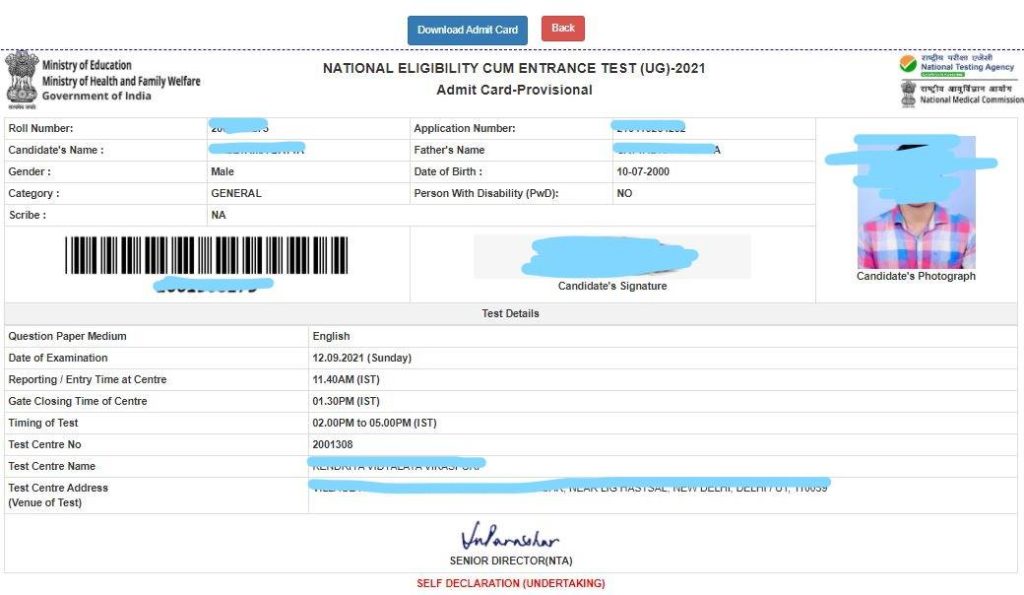
In case any candidate faced difficulty in downloading the Admit Card for NEET 2022 along with Undertaking, he/she could contact on 011-40759000 or e-mail at neet@nta.ac.in.
Details Mentioned on NEET Admit Card 2022
The details mentioned on the admit card of NEET 2022 will be matched with the ID proof of the candidate on the day of the examination. If they do not match, the candidate will not be allowed to appear for the examination. Thus, it is important to check the NEET admit card 2022 for errors.
The following details can be found on the admit card of NEET:
- Name of the candidate
- NEET 2022 roll number
- NEET registration number
- Date and time of the examination
- Father’s name
- Mother’s name
- Date of birth
- Gender
- Category/ Sub-category
- Address
- Medium (Language) of the examination
- Number and address of the exam centre
- Candidate signature
- Exam day instructions and guidelines
It is mandatory to carry the admit card of NEET 2022 to the exam center. One must also note that the NEET admit card 2022 will not be sent by post to anyone and can be downloaded online only. To know the important dates, the procedure to download the admit card of NEET, and other relevant information, read the complete article.
NEET Admit Card 2022: Important Instructions
- Take a coloured printout of the admit card of NEET 2022
- Affix a passport size photograph in the space provided. (Same as the one submitted with the application form of NEET 2022)
- Get the admit card signed by parent or guardian
What are the instructions printed on the admit card of NEET 2022?
General exam day instructions for NEET 2022 are printed on the admit card. A few important instructions on the NEET admit card are:
- Candidates can set their watch with the clock on the NTA NEET website.
- They must report to the exam center at the ‘reporting time’ mentioned on the NEET 2022 admit card.
- Details and address of the allotted exam center can be found on the admit card of NEET.
- The entry to the exam center will begin at 11.40 am and the last entry into the examination hall will be at 1.30 pm.
- Candidates found in possession of the barred items will not be allowed to complete the examination.
- Candidates should visit the exam center a day before the examination.
- Geometry/ pencil box, calculator, log table, slide ruler, any paper or textual material, etc. are not allowed inside the examination hall.
- Handbags, purses, wallets, electronic gadgets, calculators, watches, etc are also barred inside the examination hall.
- Students are not allowed to carry any eatables inside the examination hall. However, diabetic students are allowed to carry fruits/ sugar tablets.
- Owing to the COVID-19 situation, NTA has permitted the candidates to carry transparent water bottles inside the exam center.
- Candidates must drop their NEET 2022 admit card in a box placed outside the exam hall upon completion of the examination.
- Candidates must leave the exam hall one by one and must wait for their turn to avoid crowding outside the centers.
NEET 2022 Admit Card: How to Retrieve a Forgotten Registration Number?
Retrieving the registration number is a four-step process. Though the process is easy, candidates are advised to note the number carefully and not rely on this method.
Steps to retrieve the registration Id:
- Go to the official website of NTA NEET.
- Click on “Forgot Registration Number”.
- Enter the following details: Name, mother’s name, father’s name, category, date of birth, and security pin.
- The registration number will be displayed on the screen.
- Copy the number and use it to download the admit card.
NEET 2022 Admit Card: How to Download if You Do Not Have Access to the Internet?
Candidates who do not have access to the internet or printers can download the admit card of NEET 2022 from a nearby Common Services Centre (CSC). The CSCs are spread across the country and charge a nominal fee for the services provided. There are more than 2.5 lakh CSCs in India and the numbers are increasing every year. To locate the nearest CSC, go to www.csc.gov.in.
CSC services and fee
The following table brings the details of fee and charges levied at the CSCs to download the NEET admit card 2022.
| Service | Fee |
|---|---|
| Filling the application form of NEET | INR 25 |
| Online payment of fee | 0.5 per cent of the transaction value |
| Downloading the admit card | INR 10 |
| Coloured Printout | INR 5 (per page) |
What to carry on the day of the examination?
Apart from the NEET 2022 admit card, candidates must carry the following documents and COVID-19 precautionary items to the exam centre:
- Passport-sized photograph (same as the one uploaded with the application form)
- A valid photo Id proof (Aadhaar card/ Driving Licence/ PAN Card/ Passport/ Voter Id)
- Facemask and hand gloves
- 50 ml bottle of hand sanitiser
- Transparent water bottle
NEET 2022 Admit Card: Important Points to Remember
Candidates should keep in mind the following information in mind during and after downloading the NEET 2022 admit card.
- In case a candidate is unable to download his/ her NEET admit cards from the website, he or she may approach the Help Line between 10 am to 5 pm or write an email to NTA at neet@nta.ac.in.
- It is mandatory to get the admit card of NEET 2022 signed by a parent/guardian.
- It is mandatory to carry a valid photo Id proof on the day of NEET 2022.
- Candidates have to carry a passport-sized photograph on the day of the examination. This photograph has to be affixed on the attendance sheet.
- In case of any discrepancy in the particulars of the candidate or his/her photograph and signatures shown in the Admit Card and Confirmation Page, the candidate may immediately approach the Help Line between 10:00 am and 5:00 pm. In such cases, candidates would appear in
the Examination with the already downloaded Admit Card. However, NTA will take necessary action to make corrections in the record later.
Frequently Asked Questions (FAQs) Regarding NEET Admit Card 2022
Q: When is NEET 2022 admit card expected to be released by NTA?
A: NTA is expected to release the NEET 2022 admit card by mid-June.
Q. What information is needed to download the NEET 2022 admit card?
A. Candidates will have to download the NEET 2022 admit card by logging in to the exam website through username and date of birth.
Q. Will NTA send the NEET 2022 admit card via post?
A: No, NTA will not send the NEET 2022 admit card by post and candidates will have to download it online from the official website.
Q. What is the security pin in NEET admit card 2022?
A. The security pin is the six-digit alphanumeric code given just before the ‘Submit’ option. Candidates have to correctly fill this code to download their NEET 2022 admit card.
Q. My name is spelt wrong on the NEET 2022 admit card. What should I do?
A. In this case, candidates must contact the NTA immediately and get it rectified. If the details printed on the NEET 2022 admit card do not match those on the official ID proof that you carry on the day of the examination, you will not be allowed to appear for it.
Q. How can I get a duplicate NEET 2022 admit card in case I lose it?
A. Candidates can download the admit card from the official website of NTA. The admit card can be downloaded any number of times before the examination day, but candidates are advised to save a soft copy for future reference. Also, NTA will email a copy of the admit card to your registered email Id, you can download it from the email.
Q. Should the NEET 2022 printout be coloured or black and white?
A. Candidates are advised to take a colored printout of the admit card. However, it is not compulsory. They must also ensure that they have two to three spare copies of the admit card for future use. However, in case a candidate does not have access to a colored printer, s/he can take a black and white printout of the NEET 2022 admit card as well, but the details such as photograph and text should be clearly visible.
Q. I have signed on the NEET 2022 admit card by mistake. What should I do now?
A. Candidates have to sign on the NEET 2022 admit card in presence of the invigilator. In case one has signed it before that, he/she can discard the document and take a fresh print out and follow the instructions carefully.
Q. What is the specification of the photograph that needs to be pasted on the admit card of NEET 2022?
A. Candidates will have to paste their postcard size photograph of 4″x6″ dimension on the NEET 2022 admit card.
Q. What if I forget to take my parents’ signature on the NEET 2022 admit card?
A. Candidates were advised to get the NEET 2022 admit card signed by a parent/ guardian as soon as they download it. If a candidate fails to get the admit card signed, he/ she will not be allowed to appear for the entrance test.
Q. I am unable to download my NEET 2022 admit card. Whom should I contact?
A. Candidates can check the login credentials that they have entered. The password for the registered account is case sensitive, thus, they have to enter the password carefully. If they are still unable to download the admit card of NEET 2022, they can enquire at the NTA NEET helpline number 011-40759000.
Q. I have pasted a photograph on the admit card of NEET 2022. Do I still need to carry a passport-sized photograph on exam day?
A. Yes, candidates have to carry an extra passport-sized photograph on the day of the examination. This photograph has to be affixed on the attendance sheet in front of the invigilator.
Q. Can I re-download the admit card of NEET 2022?
A. Yes, candidates can download the admit card any number of times before the examination. However, candidates are advised to save a copy of their NEET 2022 admit card, which can be retrieved in case of emergencies.
Q. Can I appear for NEET 2022 if I forget to carry my photo ID?
A. No, candidates will not be allowed to appear for the examination without a valid photo ID. Candidates are advised to keep the following three things ready with them, a day before the examination; a valid photo-ID proof, NEET admit card 2022, and a recent passport-sized photograph.
| Subject | Download PDF |
|---|---|
| C Programming Notes | |

Apply Now
Our Popular Courses
- Top Demanded
B.Tech Computer Science & Engineering
- ₹96000/- per Year
B.Tech Electronics & Communication Engineering
- ₹96000/- per year
B.Tech Electrical Engineering Course
- ₹96000/- per year
B.Tech Civil Engineering Course
- ₹80000/- Per Year
B.Tech Mechanical Engineering
- ₹60000/- Per Year
BMRIT – Bachelor of Medical Radiology
NEET UG Counselling 2022: Dates, Schedule, Registration Process, Seat Matrix, Merit List
NEET Counselling 2022 – Schedule
Those who are looking for the NEET UG counselling schedule in their states can get it from the links provided below-
| States | Counselling Websites |
| Andhra Pradesh | ntruhs.ap.nic.in |
| Arunachal Pradesh | apdhte.nic.in |
| Assam | dme.assam.gov.in |
| Bihar NEET Counseling | bceceboard.bihar.gov.in |
| Chandigarh | gmch.gov.in |
| Goa | dte.goa.gov.in |
| Chhattisgarh | cgdme.in |
| Gujarat | medadmgujarat.org |
| Haryana | dmer.haryana.gov.in |
| Jammu and Kashmir | jkbopee.gov.in |
| Jharkhand | jceceb.jharkhand.gov.in |
| Kerala | cee.kerala.gov.in |
| Karnataka | kea.kar.nic.in |
| Madhya Pradesh | dme.mponline.gov.in |
| Maharashtra | cetcell.mahacet.org |
| Meghalaya | meghealth.gov.in |
| Manipur | manipurhealthdirectorate.mn.gov.in |
| Mizoram | mc.mizoram.gov.in |
| Nagaland | dtenagaland.org.in |
| Odhisa | ojee.nic.in |
| Puducherry | centacpuducherry.in |
| Rajasthan | education.rajasthan.gov.in |
| Punjab | bfuhs.ac.in |
| Tamil Nadu | tnmedicalselection.net |
| Telangana | tseamcet.nic.in |
| Tripura | dme.tripura.gov.in |
| Uttarakhand | hnbumu.ac.in |
| Uttar Pradesh | upneet.gov.in |
| West Bengal | wbmcc.nic.in |
NEET Counselling 2022 – Registration Process
Find below the registration process for NEET counselling 2022:
- Step 1: visit the NEET counselling official site www.mcc.nic.in and click on ‘UG medical counselling’. On the left side of the scree, the person will find Link for ‘New registration’. Click on this and enter the details such as roll number, application number, name of the candidate, date of birth parent’s name, e mail ID, mobile number, security pin and click on submit.
- Step 2: After this new login credentials will be generated, use these new credentials for the future steps.
- Step 3: Below new login, there is a link for ‘candidate login’, one needs to click here and login with the new credentials.
- Step 4: The next step will ask to enter the roll number, name, mobile number, registration number and mother’s name and click on submit. Select ‘confirm registration’ and your registration is complete. Take the print put of this registration slip.
- Step 5: Once the counselling starts, the next step would be the lock choices, one needs to make the choice very carefully as once locked the candidate will not be allowed to make changes.
- Step 6: Candidate would be shared an email and SMS once the results are out.
- Step 7: One needs to contact the college authorities before the last date, get the documents checked and also pay the fee before deadline.
Key Points in NEET 2022 Counselling
Following is the procedure and key points related to NEET counselling 2022
- NEET counselling 2022 will be conducted through the online procedure.
- The complete counselling procedure will be conducted by Medical counselling committee i.e. MCC
- The candidates whose name appear in the Merit List of NEET needs to register themselves on the NEET website before the deadline.
- NEET will also be conducting an online mock counselling before the final allotment, this is done to make the students more conversant with the online procedure.
- The medical seat to the candidates appearing in the counselling will be provided based on the rank a person has got in the examination process.
- Once the seat is allotted in a particular college, the candidate would be required to report to the allotted college in the provided timeline.
- The candidate would be required to get their documents checked at the college and pay the requisite fee before the end date.
- The mode of counselling to an extent would also be dependent on the state.
- The counselling will be done for the 15% of All India Quota seats
What is the eligibility for NEET Counselling 2022?
Candidate should qualify in the NEET 2022 exam by securing minimum required percentile marks. Only qualifying students would be allowed to sit for the NEET counselling 2022.
The minimum percentile for the general category is 50% while it is 40% for the reserved categories. Candidates can check the below table, which shows percentile requirement for different category students.
| Category | Minimum Qualifying Percentile |
| Unreserved (UR) | 50th Percentile |
| Unreserved Physically Handicapped (UR-PH) | 45th Percentile |
| Scheduled Caste (SC) | 40th Percentile |
| Scheduled Tribe (ST) | 40th Percentile |
| Other Backward Classes (OBC) | 40th Percentile |
| SC-PH | 40th Percentile |
| ST-PH | 40th Percentile |
| OBC-PH | 40th Percentile |
Notes:
- Qualified candidates in the NEET exam should register for counselling as per schedule and participate by submitting the choices in the NEET counselling.
- 15% All India Quota seats will not applicable to the students belonging the state of Jammu and Kashmir. So, they are not eligible for 15% quota seats.
- Few central universities will have custom rules, which are applicable to some percentage of seats and it depends on admission policies of the university/institution/college.
NEET cut off 2022
NEET 2022 cut off will be released along with result. Candidates who has scored or reached cut off marks will be invited to participate in the NEET 2022 counselling. Find below the last year cut off for NEET counselling.
| Category | Cut off Percentile | Cutoff score | No. of Candidates |
| Unreserved | 50th Percentile | 701-134 | 704335 |
| Other Backward Class (OBC) | 40th Percentile | 133-107 | 63789 |
| SC (Scheduled Caste) | 40th Percentile | 133-107 | 20009 |
| ST (Scheduled Tribe) | 40th Percentile | 133-107 | 8455 |
| Unreserved – PH | 45th Percentile | 133-120 | 266 |
| OBC – OH | 40th Percentile | 119-107 | 142 |
| SC – PH | 40th Percentile | 119-107 | 32 |
| ST – PH | 40th Percentile | 119-107 | 14 |
Documents Checklist for NEET Counselling 2022
A candidates should report at allotted college after completion of seat allotment. While reporting to the college, make sure to submit following documents to complete the admission process.
- NEET Admit Card
- NEET Scorecard or Rank
- Class 10 certificate and mark sheet (for date of birth verification)
- Class 12 certificate and mark sheet (for admission to MBBS/BDS)
- ID proof (Aadhar/PAN Card/Driving License/Passport)
- Passport size photographs – 8 copies
- Provisional Allotment Letter
- Caste Certificate (if applicable)
- PwD Certificate (if applicable)
MCC NEET UG 2022 Notice for the addition of UG seat Round-1
| Particular | Links Here |
| MCC NEET UG Notice for the addition of UG seats Round-1 | Click Here |
MCC Additions of seats for Round-1 of UG Counselling 2022
The Medical Counselling Committee (MCC) has added 197 seats to the first round of the seat allocation process – round-1 UG counselling 2022 after the NEET, the all-India entrance exam for medical colleges. We have mentioned the below.
| State | Institute Code | Institute Name | Course Name | Quota | Seats |
| Jammu And Kashmir | 200640 | Government Medical College, Rajouri | MBBS | All India | 17 |
| Jammu And Kashmir | 200639 | Government Medical College, Doda | MBBS | All India | 15 |
| Maharashtra | 200638 | Government Medical College, Osmanabad | MBBS | All India | 15 |
| Gujarat | 200636 | GMERS Medical College, Porbandar | MBBS | All India | 15 |
| Gujarat | 200635 | GMERS Medical College, Morbi | MBBS | All India | 15 |
| Jammu And Kashmir | 200634 | Government Medical College, Baramulla | MBBS | All India | 15 |
| Gujarat | 200633 | GMERS Medical College, Navsari | MBBS | All India | 15 |
| Jammu And Kashmir | 200631 | Government Medical College, Anantnag | MBBS | All India | 15 |
| Jammu And Kashmir | 200630 | Government Medical College, Kathua | MBBS | All India | 15 |
| Jammu And Kashmir | 200629 | Govt. Medical College, Srinagar | MBBS | All India | 27 |
| Himachal Pradesh | 200151 | Dr VS Parmar Government Medical College, Nahan | MBBS | All India | 18 |
| Uttar Pradesh | 200293 | Government Medical College, Kannauj | MBBS | All India | 15 |
| Total Seats | 197 |
MCC NEET UG Round-1 Seat Matrix 2022
The Medical Council Committee (MCC) has released the NEET UG 2022 Counselling Seat Matrix of Quota-wise for MBBS/BDS Courses. Candidates we have mentioned in the PDF. you can download and get more information about NEET 2022 Seat Matrix.
| Type of List | Download PDF |
|---|---|
| AIQ MBBS except Central Universities | Click here |
| AIQ BDS except Central Universities | Click here |
| MBBS seats at Central Universities | Click here |
| MBBS seats at Deemed Universities | Click here |
| ESIC MBBS (Employees State Insurance (ESIC) Insured Person Quota) | Click here |
| JIPMER MBBS | Click here |
| AIIMS MBBS | Click here |
| Central University BDS | Click here |
| Deemed University BDS | Click here |
| Jamia Millia BDS | Click here |
| BSc Nursing | Click here |
NEET 2022 Seat Matrix (Expected)
Here in the selection, We will inform you about the previous year’s seat matrix. You can check the expected seat matrix for NEET 2022 based on the different types of lists:
| Type of List | Number of Seats |
|---|---|
| AIQ MBBS | 6167 |
| AIIMS, JIPMER and BHU MBBS | 2329 |
| Deemed Universities MBBS | 8787 |
| DU, IP and JIPMER Internal Puducherry UT MBBS | 829 |
| ESIC MBBS (ESIC Insured Person Quota) | 437 |
| AMU MBBS | 150 |
| BSc Nursing | 487 |
| AIQ BDS | 476 |
| Deemed BDS | 3100 |
| DU, IP, & BHU BDS | 158 |
| Jamia Millia BDS | 50 |
| AMU BDS | 40 |
MBBS/BDS Seats and Colleges in India 2022
This information is shown in the current year’s data. Aspirants can get an idea about the number of college seats offered in India.
| Type of College/Institute | MBBS | BDS | ||
| Total College | Total Seats | Total College | Total Seats | |
| Government/Public Colleges | 322 | 48,012 | 50 | 3,513 |
| Private Colleges and Deemed Universities | 290 | 43,915 | 263 | 23,260 |
| NTA NEET Total Seats | 612 | 91,927 | 313 | 26773 |
| JIPMER and AIIMS | 15 AIIMS; 2 JIPMER | 1205 (AIIMS) + 200 (JIPMER) | ||
| Grand Total | 612 | 91,927 | 313 | 26773 |
MCC NEET UG 2022 2nd Round Results
| MBBS BDS AIQ NEET-UG Counselling Seats Allotment -2022 Round 2 Final Result | Click Here |
MCC NEET UG 2022 MOP-UP Round Results
| MBBS BDS AIQ NEET-UG Counselling Seats Allotment -2022 MOP-UP Round Final Result | Click Here |
MCC NEET UG 2022 STRAY VACANCY ROUND Results
| MBBS BDS AIQ NEET-UG Counselling Seats Allotment -2022 STRAY VACANCY ROUND Final Result | Click Here |
Read Also :
NEET Application – Correction Window
NEET Study Material – Free Download PDF Notes
Neet Reservation For OBC-EWS-SC-ST-General
NEET Chemistry Chapter Wise Weightage
NEET Chapter Wise Weightage of Physics, Chemistry and Biology
NEET Chemistry Important Topic with Chapter Wise Weightage

Apply Now
Our Popular Courses
- Top Demanded
B.Tech Computer Science & Engineering
- ₹96000/- per Year
B.Tech Electronics & Communication Engineering
- ₹96000/- per year
B.Tech Electrical Engineering Course
- ₹96000/- per year
B.Tech Civil Engineering Course
- ₹80000/- Per Year
B.Tech Mechanical Engineering
- ₹60000/- Per Year
BMRIT – Bachelor of Medical Radiology
Top Examinations
NEET UG Seat Matrix
The seat matrix also refers to the number of vacant seats. Candidates participating in the NEET UG counselling rounds must go through the NEET UG seat matrix. Based on the number of seats available, candidates will have to plan their choice filling and locking rounds.
|
MBBS |
BDS |
|
Types of NEET UG Seat Matrix
Here we bring the types of NEET UG seat matrix that would be released by MCC in each round.
- All India Quota (AIQ) Seats – MBBS
- All India Quota (AIQ) Seats – BDS
- All India Quota (AIQ) Seats – BSc Nursing
- Central Universities (CU) Seats – Medical
- Central Universities (CU) Seats – Dental
- Deemed Universities Seats – Medical
- Deemed Universities Seats – Dental
- ESIC Seats
Here we bring the types of NEET UG seat matrix that would be released by Ayush Admissions Central Counseling Committee (AACCC) in each round.
- AIQ (All India Quota) seats of Government – Ayurveda, Siddha, Unani & Homoeopathy (BAMS / BUMS / BHMS)
- AIQ (All India Quota) seats of Government Aided – Ayurveda, Siddha, Unani & Homoeopathy (BAMS / BUMS / BHMS)
- AIQ (All India Quota) seats of CU-NI (Central Universities – National Institute) – Ayurveda, Siddha, Unani & Homoeopathy (BAMS / BUMS / BHMS)
- AIQ (All India Quota) seats of Deemed Universities – Ayurveda, Siddha, Unani & Homoeopathy (BAMS / BUMS / BHMS)
Counselling for AIQ seats of Private ASU & H Institutes will be conducted by an authority designated by Central Government and Counselling for State quota seats will be conducted by respective State Government counselling authority as per the provisions of Regulations notified under IMCC Act, 1970 and HCC ACT, 1973.
Online Counselling for Allotment of Under Graduate (BAMS/BSMS/BUMS/BHMS) Seats
All the eligible candidates who qualified in NEET-UG, examination and aspiring for admission in Under Graduate (BAMS/BSMS/BUMS/BHMS) courses are hereby informed that Counselling for All India Quota seats including Government, Government Aided, Deemed Universities, Central Universities, and National Institutes will be conducted by Ayush Admissions Central Counseling Committee (AACCC), Ministry of Ayush, Government of India.
- For participation in AACCC-UG Counseling, the candidates are required to register themselves at the official website of AACCC (www.aaccc.gov.in).
- Kindly note that Non-Refundable registration fees and Refundable Security deposits have to be paid by the candidates at the time of registration as per their category.
- The Refundable Security Deposit will be forfeited if a candidate resigned from the seat/institute allotted during the 2nd Round. Further, the Refundable Security Deposit will be forfeited, if the candidate does not join/exit the allotted seats in Round-3 / Mop Up Round.
Read Also :
NEET Study Material – Free Download PDF Notes
NEET NEET Eligibility Criteria
NEET Reservation For OBC-EWS-SC-ST-General
NEET Chemistry Chapter Wise Weightage
NEET Chapter Wise Weightage of Physics, Chemistry and Biology
NEET Chemistry Important Topic with Chapter Wise Weightage

Apply Now
Our Popular Courses
- Top Demanded
B.Tech Computer Science & Engineering
- ₹96000/- per Year
B.Tech Electronics & Communication Engineering
- ₹96000/- per year
B.Tech Electrical Engineering Course
- ₹96000/- per year
B.Tech Civil Engineering Course
- ₹80000/- Per Year
B.Tech Mechanical Engineering
- ₹60000/- Per Year
BMRIT – Bachelor of Medical Radiology
AIQ – ALL INDIA QUOTA BAMS (15%) DEEMED / CENTRAL UNIVERSITIES
| ROUND 1 | ROUND 2 |
| MOP-UP/ROUND 3 |
STATE QUOTA – BAMS GOVERNMENT / PRIVATE UNIVERSITY
| ROUND 1 | ROUND 2 |
| MOP-UP/ROUND 3 |
Govt AIQ UG (BAMS) SEAT MATRIX FOR THE A.Y. 2022-23 (ROUND-1) Download
| S.No | Institute Name | State | Quota | Open | Open PwD | General- EWS | General- EWS PwD | OBC | OBC PwD |
SC | SC PwD |
ST | ST PwD |
Total Seats |
|---|---|---|---|---|---|---|---|---|---|---|---|---|---|---|
| 1 | Government Ayurved College, Jalukbari, Guwahati, Assam |
Assam | Govt | 3 | 0 | 1 | 0 | 2 | 0 | 1 | 1 | 1 | 0 | 9 |
| 2 | Govt. Ayurved Mahavidyalaya Government Ayurveda College, Vadodara, Gujarat | Gujarat | Govt | 5 | 0 | 1 | 0 | 3 | 1 | 1 | 0 | 0 | 0 | 11 |
| 3 | Shri Maru Singh Memorial Institute of Ayurved, Sonipat , Haryana. | Haryana | Govt | 3 | 1 | 1 | 0 | 3 | 0 | 2 | 0 | 1 | 0 | 11 |
| 4 | Rajiv Gandhi Government Postgraduate Ayurvedic College, Paprola, Himachal Pradesh |
Himachal Pradesh | Govt | 4 | 0 | 2 | 0 | 3 | 0 | 1 | 0 | 1 | 0 | 11 |
| 5 | Govt Ayurved College, Kannur, Kerala |
Kerala | Govt | 5 | 0 | 0 | 0 | 3 | 0 | 2 | 0 | 1 | 0 | 11 |
| 6 | Govt. Ayurveda College, Ernakulam, Kerala |
Kerala | Govt | 5 | 0 | 1 | 0 | 2 | 0 | 1 | 0 | 0 | 0 | 9 |
| 7 | Govt. Ayurveda College, Thiruvananthapuram, Kerala |
Kerala | Govt | 4 | 0 | 2 | 0 | 4 | 0 | 2 | 0 | 1 | 0 | 13 |
| 8 | Government Dhanwantri Ayurveda College, Ujjain, Madhya Pradesh |
Madhya Pradesh | Govt | 3 | 1 | 1 | 0 | 2 | 1 | 2 | 0 | 1 | 0 | 11 |
| 9 | Govt. Astanga Ayurvda Mahavidyalaya, Indore, Madhya Pradesh | Madhya Pradesh | Govt | 5 | 0 | 1 | 0 | 3 | 0 | 1 | 0 | 1 | 0 | 11 |
| 10 | Pt. Khushilal Sharma, Government Ayurved College, Bhopal, Madhya Pradesh |
Madhya Pradesh | Govt | 4 | 0 | 1 | 0 | 3 | 0 | 2 | 0 | 1 | 0 | 11 |
| 11 | Rajiv Gandhi Ayurveda Medical College and Hospital, chalakkara, new mahe, ut of Puducherry |
Puducherry | Govt | 5 | 0 | 1 | 0 | 2 | 0 | 1 | 0 | 0 | 0 | 9 |
| 12 | Government Ayurveda Medical College and Hospital, Nagercoil, Tamil Nadu |
Tamil Nadu | Govt | 2 | 0 | 1 | 0 | 3 | 0 | 2 | 0 | 1 | 0 | 9 |
| 13 | Govt. Ayurveda Medical College, Lucknow, Uttar Pradesh |
Uttar Pradesh | Govt | 4 | 1 | 1 | 0 | 3 | 0 | 1 | 0 | 1 | 0 | 11 |
| 14 | Govt. Ayurvedic College and Hospital, Varanasi, Uttar Pradesh |
Uttar Pradesh | Govt | 4 | 0 | 0 | 1 | 3 | 0 | 1 | 1 | 0 | 1 | 11 |
| 15 | S.R.M. Government Ayurvedic College and Hospital, Bareilly, Uttar Pradesh |
Uttar Pradesh | Govt | 5 | 0 | 1 | 0 | 2 | 0 | 2 | 0 | 1 | 0 | 11 |
Govt. Aided AIQ UG (BAMS) SEAT MATRIX FOR THE A.Y. 2022-23 (ROUND-1) Download
| S.No | Institute Name | State | Quota | Open | Open PwD | General- EWS | General- EWS PwD |
OBC | OBC PwD |
SC | SC PwD |
ST | ST PwD |
Total Seats |
|---|---|---|---|---|---|---|---|---|---|---|---|---|---|---|
| 1 | Ayurved Mahavidyalaya and Hospital, Old Hubli, Karnataka | Karnataka | Govt Aided | 4 | 0 | 0 | 0 | 3 | 0 | 1 | 0 | 1 | 0 | 9 |
| 2 | JSVV Samsthe’s Danappa Gurushiddappa Melmalagi |
Karnataka | Govt Aided | 4 | 0 | 1 | 0 | 2 | 0 | 1 | 0 | 1 | 0 | 9 |
| 3 | Vaidyaratnam P.S. Varier Ayurveda College, Kottakal, Kerala |
Kerala | Govt Aided | 3 | 0 | 1 | 0 | 2 | 1 | 2 | 0 | 0 | 0 | 9 |
| 4 | Ayurved Seva Sangh Ayurved Mahavidyalaya, Nashik,, MS |
Maharashtra | Govt Aided | 5 | 0 | 1 | 0 | 3 | 0 | 1 | 0 | 1 | 0 | 11 |
| 5 | Karamvir Vyankatrao Tanaji Randhir Ayurved College, Boradi, Dist Dhule |
Maharashtra | Govt Aided | 3 | 1 | 1 | 0 | 3 | 0 | 2 | 0 | 1 | 0 | 11 |
| 6 | Radhakisan Toshniwal Ayurved Mahavidyalaya, Akola, MS | Maharashtra | Govt Aided | 4 | 0 | 1 | 0 | 3 | 0 | 2 | 0 | 1 | 0 | 11 |
| 7 | RJVS Bhaisaheb Sawant Ayurved Mahavidyalaya, Sawantwadi,, MS |
Maharashtra | Govt Aided | 4 | 0 | 1 | 0 | 2 | 0 | 1 | 0 | 0 | 0 | 8 |
| 8 | Shri Ayurved Mahavidyalaya, Nagpur, MS |
Maharashtra | Govt Aided | 7 | 1 | 2 | 0 | 5 | 0 | 3 | 0 | 1 | 0 | 19 |
| 9 | Shri Gangadhar Shastri Gune Ayurved Mahavidyalaya, Ahmednagar, MS |
Maharashtra | Govt Aided | 4 | 0 | 1 | 0 | 2 | 0 | 0 | 1 | 0 | 1 | 9 |
| 10 | Shri Gurudeo Ayurved Mahavidyalaya, Amravati, MS |
Maharashtra | Govt Aided | 4 | 0 | 1 | 0 | 3 | 0 | 2 | 0 | 1 | 0 | 11 |
| 11 | Seth Govindji Raoji Ayurved Mahavidyalaya, Solapur, MS (Jain Minority) |
Maharashtra | Govt Aided | 9 | 0 | 0 | 0 | 0 | 0 | 0 | 0 | 0 | 0 | 9 |
| 12 | Tilak Ayurved Mahavidyalaya, Pune, MS |
Maharashtra | Govt Aided | 7 | 1 | 2 | 0 | 4 | 1 | 3 | 0 | 1 | 0 | 19 |
| 13 | Vasant Dada Patil Ayurved Medical College, Sangli |
Maharashtra | Govt Aided | 4 | 0 | 1 | 0 | 3 | 0 | 2 | 0 | 1 | 0 | 11 |
| 14 | Vidarbha Ayurved Mahavidyalaya, Amravati | Maharashtra | Govt Aided | 3 | 0 | 1 | 0 | 3 | 0 | 1 | 0 | 1 | 0 | 9 |
Deemed AIQ UG (BAMS) SEAT MATRIX FOR THE A.Y. 2022-23 (ROUND-1) Download
| S.No. | Institute Name | State | Quota | Open | Open PwD | General- EWS | General- EWS PwD |
OBC | OBC PwD |
SC | SC PwD |
ST | ST PwD |
Total Seats |
|---|---|---|---|---|---|---|---|---|---|---|---|---|---|---|
| 1 | KLE University Shri.BM Kankanawadi Ayurveda Mahavidyalaya Post Graduate Studies and Research Centre, Belagavi, Karnataka | Karnataka | Deemed | 100 | 0 | 0 | 0 | 0 | 0 | 0 | 0 | 0 | 0 | 100 |
| 2 | Bharati Vidyapeeth Deemed University i.e. B.V.D.U., College of Ayurved, Pune, Maharashtra |
Maharashtra | Deemed | 100 | 0 | 0 | 0 | 0 | 0 | 0 | 0 | 0 | 0 | 100 |
DEEMED CU/NI AIQ UG (BAMS) SEAT MATRIX FOR THE A.Y. 2022-23 (ROUND-1) Download
| S.No. | Institute Name | State | Quota | Open | Open PwD | General- EWS | General- EWS PwD |
OBC | OBC PwD |
SC | SC PwD |
ST | ST PwD |
Total Seats |
|---|---|---|---|---|---|---|---|---|---|---|---|---|---|---|
| 1 | Institute of Teaching and Research in Ayurveda, Jamnagar, Gujarat | Gujarat | Central Universitie s / National Institution |
44 | 2 | 11 | 1 | 29 | 2 | 17 | 0 | 9 | 0 | 115 |
| 2 | North Eastern Institute of Ayurveda and Homeopathy- Homoeopathy Shillong | Meghalaya | Central Universitie s / National Institution |
12 | 1 | 3 | 0 | 9 | 0 | 4 | 0 | 2 | 0 | 31 |
| 3 | National Institute of Ayurveda, Deemed to be University, Jaipur, Rajasthan | Rajasthan | Central Universitie s / National Institution |
44 | 2 | 10 | 1 | 28 | 2 | 16 | 1 | 8 | 1 | 113 |
| 4 | Faculty of Ayurveda Institute Of Medical Science Banaras Hindu University, Varanasi, Uttar Pradesh | Uttar Pradesh | Central Universitie s / National Institution | 28 | 2 | 8 | 0 | 19 | 1 | 11 | 1 | 5 | 0 | 75 |
AIQ – ALL INDIA QUOTA (15%) BHMS DEEMED / CENTRAL UNIVERSITIES
| ROUND 1 | ROUND 2 |
| MOP-UP/ROUND 3 |
STATE QUOTA – BHMS GOVERNMENT / PRIVATE UNIVERSITY
| ROUND 1 | ROUND 2 |
| MOP-UP/ROUND 3 |
AIQ – ALL INDIA QUOTA (15%) BUMS DEEMED / CENTRAL UNIVERSITIES
| ROUND 1 | ROUND 2 |
| MOP-UP/ROUND 3 |
STATE QUOTA – BUMS GOVERNMENT / PRIVATE UNIVERSITY
| ROUND 1 | ROUND 2 |
| MOP-UP / ROUND 3 |
Govt AIQ UG (BHMS) SEAT MATRIX FOR THE A.Y. 2022-23 (ROUND-1) Download
| S.No. | Institute Name | State | Quota | Open | Open PwD | General- EWS | General- EWS PwD |
OBC | OBC PwD |
SC | SC PwD |
ST | ST PwD |
Total Seats |
|---|---|---|---|---|---|---|---|---|---|---|---|---|---|---|
| 1 | Dr. Gururaju Govt. Homoeopathic Medical College, Krishna, Andhra Pradesh | Andhra Pradesh | Govt | 3 | 0 | 1 | 0 | 2 | 0 | 1 | 0 | 1 | 0 | 8 |
| 2 | Dr.Allu Ramaligaiah Govt. Homoeopathic Medical College , Godavari, Andhra Pradesh | Andhra Pradesh | Govt | 3 | 0 | 1 | 0 | 3 | 0 | 2 | 0 | 0 | 0 | 9 |
| 3 | Govt. Homoeopathic Medical College, Kadappa, Andhra Pradesh | Andhra Pradesh | Govt | 3 | 1 | 0 | 0 | 1 | 0 | 1 | 0 | 0 | 0 | 6 |
| 4 | Swahid Jadav Nath Homoeopathic Medical College and Hospital, Guwahati, Assam | Assam | Govt | 3 | 0 | 1 | 0 | 2 | 1 | 1 | 0 | 1 | 0 | 9 |
| 5 | R.B.T.S. Govt. Homeopathic Medical College and Hospital, Muzaffarpur, Bihar |
Bihar | Govt | 4 | 0 | 1 | 0 | 3 | 0 | 2 | 0 | 1 | 0 | 11 |
| 6 | Nehru Homoeopathic Medical College and Hospital, Delhi | Delhi | Govt | 7 | 0 | 2 | 0 | 4 | 0 | 3 | 0 | 2 | 0 | 18 |
| 7 | Dr. B.R Sur Homoeopathic Medical College and Hospital, Motibagh, New Delhi | Delhi | Govt | 5 | 0 | 1 | 0 | 3 | 0 | 1 | 0 | 0 | 0 | 10 |
| 8 | National Homoeopathic Medical College and Hospital, Lucknow, Uttar Pradesh | Delhi | Govt | 8 | 0 | 2 | 0 | 4 | 1 | 1 | 1 | 2 | 0 | 19 |
| 9 | Government Homoeopathic Medical College, Patan, Gujarat | Gujarat | Govt | 6 | 1 | 2 | 0 | 6 | 0 | 3 | 0 | 1 | 0 | 19 |
| 10 | State Homoeopathic Medical College and Hospital, Godda, Jharkhand | Jharkhand | Govt | 4 | 0 | 1 | 0 | 2 | 0 | 1 | 0 | 1 | 0 | 9 |
| 11 | Government Homoeopathic Medical College, Bengaluru, Karnataka | Karnataka | Govt | 6 | 0 | 1 | 0 | 3 | 1 | 3 | 0 | 1 | 0 | 15 |
| 12 | Govt. Homeopathic Medical College, Thiruvananthapuram, Kerala | Kerala | Govt | 4 | 0 | 1 | 0 | 3 | 0 | 1 | 0 | 0 | 0 | 9 |
| 13 | Govt. Homoeopathic Medical College, Kozhikode, Kerala | Kerala | Govt | 3 | 1 | 1 | 0 | 2 | 0 | 0 | 1 | 0 | 1 | 9 |
| 14 | Govt. Homoeopathic Medical College and Hospital, Bhopal, Madhya Pradesh |
Madhya Pradesh | Govt | 7 | 0 | 2 | 0 | 5 | 0 | 3 | 0 | 2 | 0 | 19 |
| 15 | Govt. Homoeopathic Medical College, Jalgaon |
Maharashtra | Govt | 4 | 0 | 1 | 0 | 2 | 0 | 1 | 0 | 0 | 0 | 8 |
| 16 | Biju Pattanaik Homeopathic Medical College, Ganjam, Odisha | Odisha | Govt | 1 | 0 | 0 | 0 | 2 | 0 | 1 | 0 | 1 | 0 | 5 |
| 17 | Dr. Abhin Chandra Homoeopathic Medical College and Hospital, Puri, Odisha |
Odisha | Govt | 3 | 1 | 1 | 0 | 2 | 0 | 2 | 0 | 0 | 0 | 9 |
| 18 | Odisha Medical College of Homoeopathy and Research, Sambalpur, Odisha | Odisha | Govt | 2 | 0 | 1 | 0 | 1 | 0 | 0 | 0 | 1 | 0 | 5 |
| 19 | UtkalMani Homoeopathic Medical College and Hosptial, Rourkela, Odisha |
Odisha | Govt | 1 | 0 | 0 | 1 | 1 | 1 | 1 | 0 | 0 | 0 | 5 |
| 20 | University College of Homoeopathy Kekri |
Rajasthan | Govt | 5 | 0 | 0 | 0 | 2 | 0 | 1 | 0 | 1 | 0 | 9 |
| 21 | University College of Homoeopathy, Jodhpur |
Rajasthan | Govt | 3 | 0 | 1 | 0 | 2 | 0 | 2 | 0 | 1 | 0 | 9 |
| 22 | Govt Homoeopathic Medical College and Hospital, Madurai, Tamil Nadu | Tamil Nadu | Govt | 3 | 0 | 1 | 0 | 3 | 0 | 1 | 0 | 0 | 0 | 8 |
| 23 | JSPS Govt Homoeopathic Medical College, Ramanthapur, Hyderabad |
Telangana | Govt | 7 | 1 | 1 | 0 | 5 | 0 | 3 | 0 | 2 | 0 | 19 |
| 24 | Government Homoeopathic Medical College and Hospital, Aligarh, Uttar Pradesh | Uttar Pradesh | Govt | 8 | 0 | 2 | 0 | 5 | 0 | 3 | 0 | 1 | 0 | 19 |
| 25 | Pandit Jawharlal Nehru State Homoeopathic Medical College, Kanpur, Uttar Pradesh |
Uttar Pradesh | Govt | 5 | 1 | 3 | 0 | 5 | 0 | 4 | 0 | 1 | 0 | 19 |
| 26 | State Dr. Brij Kishore Homoeopathic Medical College and Hospital, Faizabad, Uttar Pradesh |
Uttar Pradesh | Govt | 4 | 0 | 0 | 0 | 2 | 0 | 0 | 0 | 0 | 0 | 6 |
| 27 | State Ghazipur Homoeopathic Medical College and Hospital, Ghazipur, Uttar Pradesh | Uttar Pradesh | Govt | 3 | 0 | 1 | 0 | 2 | 0 | 2 | 0 | 1 | 0 | 9 |
| 28 | State Homoeopathic Medical College and Hospital, Gorakhpur, Uttar Pradesh | Uttar Pradesh | Govt | 8 | 1 | 2 | 0 | 5 | 0 | 2 | 0 | 1 | 0 | 19 |
| 29 | State K.G.K Government Medical College, Moradabad, Uttar Pradesh | Uttar Pradesh | Govt | 6 | 0 | 2 | 0 | 5 | 1 | 3 | 0 | 2 | 0 | 19 |
| 30 | State Lal Bahadur Shastri Homoeopathic Medical College, Allahabad, Uttar Pradesh |
Uttar Pradesh | Govt | 8 | 0 | 2 | 0 | 5 | 0 | 3 | 0 | 1 | 0 | 19 |
| 31 | State Shri Durgaji Homoeopathic Medical College and Hospital, Azamgarh, Uttar Pradesh |
Uttar Pradesh | Govt | 6 | 1 | 2 | 0 | 5 | 0 | 3 | 0 | 2 | 0 | 19 |
| 32 | D.N.De Homoeopathic Medical College and Hospital, Kolkata, West Bengal |
West Bengal | Govt | 3 | 0 | 0 | 1 | 2 | 0 | 1 | 1 | 0 | 1 | 9 |
| 33 | Mahesh Bhattacharya Homoeopathic Medical College and Hospital, Howrah, West Bengal |
West Bengal | Govt | 4 | 0 | 1 | 0 | 1 | 1 | 1 | 0 | 1 | 0 | 9 |
| 34 | Midnapore Homoeopathic Medical College and Hospital, Midnapore, West Bengal | West Bengal | Govt | 5 | 0 | 0 | 0 | 3 | 0 | 1 | 0 | 0 | 0 | 9 |
| 35 | The Calcutta Homoeopathic Medical College and Hospital, Kolkata, West Bengal | West Bengal | Govt | 4 | 0 | 1 | 0 | 3 | 0 | 1 | 0 | 0 | 0 | 9 |
Govt. Aided AIQ UG (BHMS) SEAT MATRIX FOR THE A.Y. 2022-23 (ROUND-1) Download
| S.No. | Institute Name | State | Quota | Open | Open PwD | General- EWS | General- EWS PwD |
OBC | OBC PwD |
SC | SC PwD |
ST | ST PwD |
Total Seats |
|---|---|---|---|---|---|---|---|---|---|---|---|---|---|---|
| 1 | Dr. V.H. Dave Homoeopathic Medical College gujarat | Gujarat | Govt. Aided | 7 | 1 | 2 | 0 | 5 | 0 | 3 | 0 | 1 | 0 | 19 |
| 2 | Gujarat Homeopathic Medical College Vadodara Gujarat | Gujarat | Govt. Aided | 6 | 1 | 2 | 0 | 4 | 1 | 2 | 1 | 2 | 0 | 19 |
| 3 | Athurasramam N.S.S. Homoeopathic Medical College | Kerala | Govt. Aided | 4 | 0 | 1 | 0 | 3 | 0 | 1 | 0 | 0 | 0 | 9 |
| 4 | Dr. Padiar Memorial Homoeopathic Medical College and Hospital, Ernakulam, Kerala |
Kerala | Govt. Aided | 3 | 0 | 1 | 0 | 3 | 0 | 1 | 0 | 1 | 0 | 9 |
| 5 | Shri Vidyadhiraja Homoeopathic Medical College, Thiruvananthapuram, Kerala | Kerala | Govt. Aided | 4 | 0 | 0 | 0 | 2 | 0 | 2 | 0 | 1 | 0 | 9 |
Deemed AIQ UG (BHMS) SEAT MATRIX FOR THE A.Y. 2022-23 (ROUND-1) Download
| S.No. | Institute Name | State | Quota | Open | Open PwD | General- EWS | General- EWS PwD |
OBC | OBC PwD |
SC | SC PwD |
ST | ST PwD |
Total Seats |
|---|---|---|---|---|---|---|---|---|---|---|---|---|---|---|
| 1 | Rajasthan Vidyapeeth Homoeopathic Medical College and Hospital, Dabok, Udaipur, Rajasthan |
Gujarat | Deemed | 100 | 0 | 0 | 0 | 0 | 0 | 0 | 0 | 0 | 0 | 100 |
| 2 | Sumandeep Vidyapeeth Deemed University, Vadodara, Gujarat | Gujarat | Deemed | 100 | 0 | 0 | 0 | 0 | 0 | 0 | 0 | 0 | 0 | 100 |
| 3 | KLE Universitys Homoeopathic Medical College and Hospital, Belagavi, Karnataka | Karnataka | Deemed | 100 | 0 | 0 | 0 | 0 | 0 | 0 | 0 | 0 | 0 | 100 |
| 4 | Yenepoya Homoeopathic Medical College and Hospital, Dikshin Kannada, Karnataka | Karnataka | Deemed | 100 | 0 | 0 | 0 | 0 | 0 | 0 | 0 | 0 | 0 | 100 |
| 5 | Bharati Vidyapeeth Homoeopathic Medical College and Hospital, Pune, Maharashtra | Maharashtra | Deemed | 100 | 0 | 0 | 0 | 0 | 0 | 0 | 0 | 0 | 0 | 100 |
| 6 | Dr. DY Patil Homoeopathic Medical College and Research Centre, Pune, Mahrashtra | Maharashtra | Deemed | 100 | 0 | 0 | 0 | 0 | 0 | 0 | 0 | 0 | 0 | 100 |
| 7 | Vinayaka Missions Homoeopathic Medical College, Salem, Tamil Nadu | Tamil Nadu | Deemed | 100 | 0 | 0 | 0 | 0 | 0 | 0 | 0 | 0 | 0 | 100 |
DEEMED CU/NI AIQ UG (BHMS) SEAT MATRIX FOR THE A.Y. 2022-23 (ROUND-1) Download
| S.No. | Institute Name | State | Quota | Open | Open PwD | General- EWS | General- EWS PwD |
OBC | OBC PwD |
SC | SC PwD |
ST | ST PwD |
Total Seats |
|---|---|---|---|---|---|---|---|---|---|---|---|---|---|---|
| 1 | National Institute of Homoeopathy, Salt Lake, Kolkata |
Kolkata | Central Universities / National Institution |
34 | 2 | 7 | 1 | 22 | 1 | 12 | 1 | 6 | 0 | 86 |
| 2 | North Eastern Institute of Ayurveda and Homeopathy- Homoeopathy Shillong |
Meghalaya | Central Universities / National Institution |
12 | 0 | 3 | 0 | 8 | 1 | 5 | 0 | 2 | 0 | 31 |
|
Govt. Aided AIQ UG (BUMS) SEAT MATRIX FOR THE A.Y. 2022-23 (ROUND-1) Download
|
|||||||||||||||
| S.No. | Institute Name | State | Quota | Open | Open PwD | General- EWS | General- EWS PwD |
OBC | OBC PwD |
SC | SC PwD |
ST | ST PwD |
Total Seats | |
| 1 | Zuleikhabai Valy Md. Unani Medical College and Hospital, Pune, Maharashtra |
Maharashtra | Govt. Aided | 9 | 0 | 0 | 0 | 0 | 0 | 0 | 0 | 0 | 0 | 9 | |
NEET EXAM
| EXAM – 2025 | EXAM – 2024 | EXAM – 2023 | EXAM – 2022 | EXAM – 2021 | EXAM – 2020 |
|---|---|---|---|---|---|
| NEET UG – 2025 | NEET UG – 2024 | NEET UG – 2023 | NEET UG – 2022 | NEET UG – 2021 | NEET UG – 2020 |
| NEET PG – 2025 | NEET PG – 2024 | NEET PG – 2023 | NEET PG – 2022 | NEET PG – 2021 | NEET PG – 2020 |
Read Also :
NEET Application – Correction Window
NEET Study Material – Free Download PDF Notes
Neet Reservation For OBC-EWS-SC-ST-General
NEET Chemistry Chapter Wise Weightage
NEET Chapter Wise Weightage of Physics, Chemistry and Biology
NEET Chemistry Important Topic with Chapter Wise Weightage

Apply Now
Our Popular Courses
- Top Demanded
B.Tech Computer Science & Engineering
- ₹96000/- per Year
B.Tech Electronics & Communication Engineering
- ₹96000/- per year
B.Tech Electrical Engineering Course
- ₹96000/- per year
B.Tech Civil Engineering Course
- ₹80000/- Per Year
B.Tech Mechanical Engineering
- ₹60000/- Per Year
BMRIT – Bachelor of Medical Radiology
Top Examinations
NEET 2023 will be conducted on May 7. NTA has specified the dress code for NEET 2023 and also released a list of items barred inside the examination hall. Unless a candidate adheres to the NEET 2023 dress code, he or she will not be allowed to enter the exam hall.
NEET dress code for 2023 has been announced by the National Testing Agency (NTA) along with the NEET 2023 notification and information bulletin. NEET 2023 will be conducted on May 7. The NEET 2023 dress code and instructions must be followed by candidates on the day of the exam, failing which, they may be deterred from appearing in the exam. The National Testing Agency (NTA) has issued a list of prohibited objects in the examination hall, as well as a NEET 2023 dress code. Candidates who would be appearing for the entrance test must abide by the NEET 2023 dress code. Non-compliance with the NEET 2023 dress code will result in disqualification and the candidate’s inability to take the test. Along with the dress code, this article of Shiksha also provides the list of objects which are prohibited inside the NEET 2023 exam centre.
Dress code for NEET 2023
NTA has prescribed the NEET 2023 dress code under three heads.
NEET Dress Code 2023 for Male Candidates:
For male candidates appearing for NEET 2023, NTA has stated the following guidelines regarding dress code:
- According to the dress code of NEET for male aspirants, long or full-sleeve shirts/ t-shirts are not allowed
- Clothes should be simple and should not have zips, pockets, huge buttons, etc.
- Male aspirants can wear simple trousers/pants
- Layers of clothing and kurta pyjamas should also be avoided
- Shoes, boots, or any covered footwear are not allowed. Candidates are advised to wear slippers or open-toed sandals
NEET Dress Code 2023 for Female Candidates:
Female candidates have to follow the following guidelines regarding NEET 2023 dress code on the exam day:
- Similar to the dress code of NEET for male candidates, female candidates are also advised to wear half sleeve t-shirts/shirts/kurta
- Long sleeves and fancy sleeves clothing is not permitted
- Clothing should be simple and should not have elaborate embroidery, buttons, frills, etc.
- Metallic/non-metallic jewellery has to be avoided
- Slippers, sandals or low heels are allowed but closed shoes are not allowed
- Candidates are advised to wear open sandals or slippers
NEET Dress Code 2023 Exceptions
Candidates who will not be able to follow the dress code for NEET 2023 due to religious beliefs have to mention the same while filling the application form for NEET 2023. Such candidates had to select the ‘Customary Dress’ option while filling the NEET application form 2023. Those opting to wear the customary dress have to report at least an hour early for proper frisking and security procedures. In such cases, candidates need to reach the exam centre by 12.30 pm so that there is sufficient time for proper security checks without any inconvenience to the candidate while maintaining the sanctity of the exam.
NEET 2023 Dress Code: COVID-19 Guidelines
Keeping in mind the safety of candidates on the exam day, the NEET dress code has undergone a few changes in the past couple of years and it is expected that the same will be followed for NEET 2023 as well. The dress code for NEET 2023 exam day during COVID times are listed below:
- All candidates must wear a mask which is covering their nose and mouth.
- They must carry a transparent water bottle with them, water dispenser facility has been discontinued as a preventive measure.
- Candidates must carry a 50 ml bottle of hand sanitizer with them on the exam day.
- Candidates may be allowed to wear gloves while at the exam center.
- Candidates have to carry the filled-up and signed Self Declaration (Undertaking) as a mandatory document along with the NEET 2023 admit card and valid photo identity proof.
Items prohibited inside the NEET 2023 examination hall
Along with the NEET dress code 2023, NTA has listed the names of the things that a candidate is not supposed to carry on the day of the examination. If found in possession of any of the below-mentioned items, the candidate will not be allowed to complete the NEET 2023 examination and will have to leave the examination hall.
List of banned items at NEET 2023 exam centre:
The following items are not allowed to be carried to the NEET 2023 exam centre
- Any test-based material (written/printed)
- Pencil box/pouches/geometry box
- Electronic or communication devices such as mobile phones, smartwatches, cameras, Bluetooth, fitness bands, earphones, pager, microchips, etc.
- Calculator, electronic pens, scanners, etc.
- Stationery items such as pens, scales, erasers, etc.
- Accessories such as bags, belts, caps, goggles, wallets, etc.
- Any ornaments such as earrings, nose pins, necklaces with pendants, bracelets or bangles, watches, etc.
- Eatables (packed or home-cooked unless a candidate has a certain health condition)

Candidates must note that the NEET exam centres will not have any designated space for storing the barred items. Hence, candidates should either hand over these items to their parents or guardians or should not carry those to avoid any hassle.
The NEET entrance test, which is conducted for admissions to the first year of MBBS/BDS and other undergraduate medical courses, has resulted in the dissolution of the other medical entrance examinations. This has made NEET the most important and popular medical entrance exam in India.
Read More:
NEET Dress Code 2022: Frequently Asked Questions (FAQs)
Q. Will candidates with tattoos be allowed to appear for the exam?
Q. Can I wear floral printed clothes on NEET 2023 exam day?
Q. Can I wear full sleeves kurta on the exam day?
Q. Can I wear a normal wristwatch on NEET 2023 exam day?
Q. Can I wear formal shoes on the NEET 2023 exam day?
Q. Is it mandatory to choose the customary NEET 2023 dress code option in the application form if I wear my religious attire.
Q. What will happen if I don’t follow the NEET dress code 2023?
NEET syllabus for 2023 is notified by the NMC (National Medical Commission) for Physics, Chemistry and Biology subjects based on Class 11 and 12 curriculum. The question paper of NEET 2023 will be based on this syllabus. NEET 2023 aspirants can download the syllabus for NEET 2023 from this page or visit the website of NMC.
NTA NEET Syllabus 2023 PDF – Subject-wise detailed topics
To crack the NEET exam, candidates must study each topic thoroughly. Below are the links to download the NEET syllabus 2023 PDF (subject-wise).
NEET syllabus 2023 PDF for each subject
| Category | Syllabus |
| NEET 2023 Syllabus PDF | Click here |
| Download NEET Physics syllabus PDF | Click here |
| Download NEET Chemistry syllabus 2023 PDF | Click here |
| Download NEET 2023 Biology syllabus PDF | Click here |
Note – The syllabus given in the table is based on the previous year’s session. Any change in the NEET syllabus 2023 will be updated here.
NEET 2023 Subject-Wise Syllabus
The below table provides the subject-specific NEET syllabus for 2023. In addition to the NEET syllabus of 2023, it also includes a list of best books covering the NEET-UG syllabus.
NEET Physics Syllabus 2023
Most candidates find NEET 2023 Physics quite challenging. Here is a comprehensive syllabus of NEET 2023 Physics to help students with a thorough revision of the exam. This section contains the topics from the NEET Physics syllabus along with the best books for reference.
NEET 2023 Physics Syllabus
| Class XI | Class XII |
| Physical world and measurement | Electrostatics |
| Kinematics | Current Electricity |
| Laws of Motion | Magnetic Effects of Current and Magnetism |
| Work, Energy and Power | Electromagnetic Induction and Alternating Currents |
| Motion of System of Particles and Rigid Body | Electromagnetic Waves |
| Gravitation | Optics |
| Properties of Bulk Matter | Dual Nature of Matter and Radiation |
| Thermodynamics, Oscillations and Waves | Atoms and Nuclei |
| Behavior of Perfect Gas and Kinetic Theory | Electronic Devices |
NEET 2023 – Best Books of Physics
| Book Name | Author |
| Concepts of Physics, part 1 and 2 | H C Verma |
| Fundamentals of Physics | Halliday, Resnick and Walker |
| Objective Physics for the medical entrance examination (volumes 1 and 2) | D C Pandey |
| NCERT Exemplar Class 11 and 12 | NA |
| Physics MCQ | D Mukherjee |
NEET 2023 Chemistry Syllabus
The syllabus for Chemistry NEET 2023 is largely considered to be an easy one for students to study and score well. Chemistry NEET 2023 syllabus has been compiled below from classes 11 and 12 with the best books to refer to
NEET Syllabus 2023 for Chemistry
| Class XI | Class XII |
| Some Basic Concepts of Chemistry | Solid State |
| Structure of Atom | Solutions |
| Classification of Elements and Periodicity in Properties | Electrochemistry |
| Chemical Bonding and Molecular Structure | Chemical Kinetics |
| States of Matter: Gases and Liquids | Surface Chemistry |
| Thermodynamics | General Principles and Processes of Isolation of Elements |
| Equilibrium | p-Block Elements |
| Redox Reactions | d and f Block Elements |
| Hydrogen | Coordination Compounds |
| s-Block Element (Alkali and Alkaline earth metals) | Haloalkanes and Haloarenes |
| Some p-Block Elements | Alcohols, Phenols and Ethers |
| Organic Chemistry- Some Basic Principles and Techniques | Aldehydes, Ketones and Carboxylic Acids |
| Hydrocarbons | Organic Compounds Containing Nitrogen |
| Environmental Chemistry | Biomolecules, Polymersand Chemistry in Everyday Life |
Best books for NEET Chemistry
| Name of the book | Author |
| Physical Chemistry | O P Tandon |
| Oxford’s Organic Chemistry | Jonathan Clayden, Nick Greeves, |
| Concise Inorganic Chemistry | J D Lee |
| MTG’s Objective NCERT at your fingertips | MTG Editorial Board |
| Modern’s ABC of Chemistry of Classes 11 and 12 (volumes 1 and 2) | S.P. Jauhar |
NEET Syllabus For Biology 2023
The NEET Biology syllabus includes both Zoology and Botany, making it more important since it is so extensive. Here are the topics covered in the NEET Biology syllabus, followed by the best books to refer to reinforce the concepts
NEET 2023 Syllabus For Biology
| Class XI | Class XII |
| Diversity in Living World | Reproduction |
| Structural Organization in Animals and Plants | Genetics and Evolution |
| Cell Structure and Function | Biology and Human Welfare |
| Plant Physiology | Biotechnology and Its Applications |
| Human Physiology | Ecology and Environment |
Best Books For NEET Biology
| Book | Author |
| Objective Biology (volumes 1 & 2) | GR Bathla |
| Biology Classes 11 and 12 (Volume 1 & 2) | Pradeep Publications |
| Objective Biology (Volume 1, 2, and 3 along with Practice Papers) | Dinesh Publications |
| A Class Book for Botany | A C Dutta |
| Objective Biology (volumes 1 and 2) | Trueman Publications |
NEET 2023- Deleted CBSE syllabus
The following table highlights the CBSE topics that were deleted, which will affect the NEET syllabus weightage.,
Deleted NEET UG CBSE syllabus
| Subjects | Class 11 | Class 12 |
| Biology | 11 chapters | 5 chapters |
| Physics | some topics from 9 chapters | some portions from 10 chapters |
| Chemistry | Some topics and portions from 14 chapters | Topics from 16 chapters |
NEET Exam Pattern 2023
During the NEET-UG exam, there are 200 questions asked in two sections – Section A and Section B. Aspirants must attempt only 180 questions from the choice list. The total marks of NEET are worth 720 points.
| Particulars | Details |
| Duration | 3 hours |
| Mode | Pen and paper based mode |
| Number of questions | 200 (Students need to attempt 180) |
| Type of questions | Multiple Choice Questions (MCQs) |
| Marks | 720 |
| Negative marking | +4 for every correct response-1 for every incorrect response |
Use the NEET 2023 question paper as a practice tool
Practice is another tool that can help candidates succeed on the NEET 2023 exam, where they should check their knowledge upon completing every topic mentioned in the NTA NEET syllabus. They can use the links below to access NEET’s previous year’s questions.
- NEET 2023 sample papers
- NEET mock test 2023
- Previous years NEET question papers
Click here to download free NEET previous year questions papers in PDF format
Tips for preparing for NEET 2023 based on the syllabus
The syllabus of NEET 2023 is essential, as candidates cannot crack NEET with an excellent score unless they know what to study. The syllabus allows candidates to know the topics and cross-check with their school syllabuses of Class 11 and 12 to coordinate their preparations. In order to crack NEET 2023, toppers and experts advise students to understand the syllabus and schedule their preparation.
Also Read:

Apply Now
Our Popular Courses
- Top Demanded
B.Tech Computer Science & Engineering
- ₹96000/- per Year
B.Tech Electronics & Communication Engineering
- ₹96000/- per year
B.Tech Electrical Engineering Course
- ₹96000/- per year
B.Tech Civil Engineering Course
- ₹80000/- Per Year
B.Tech Mechanical Engineering
- ₹60000/- Per Year
BMRIT – Bachelor of Medical Radiology
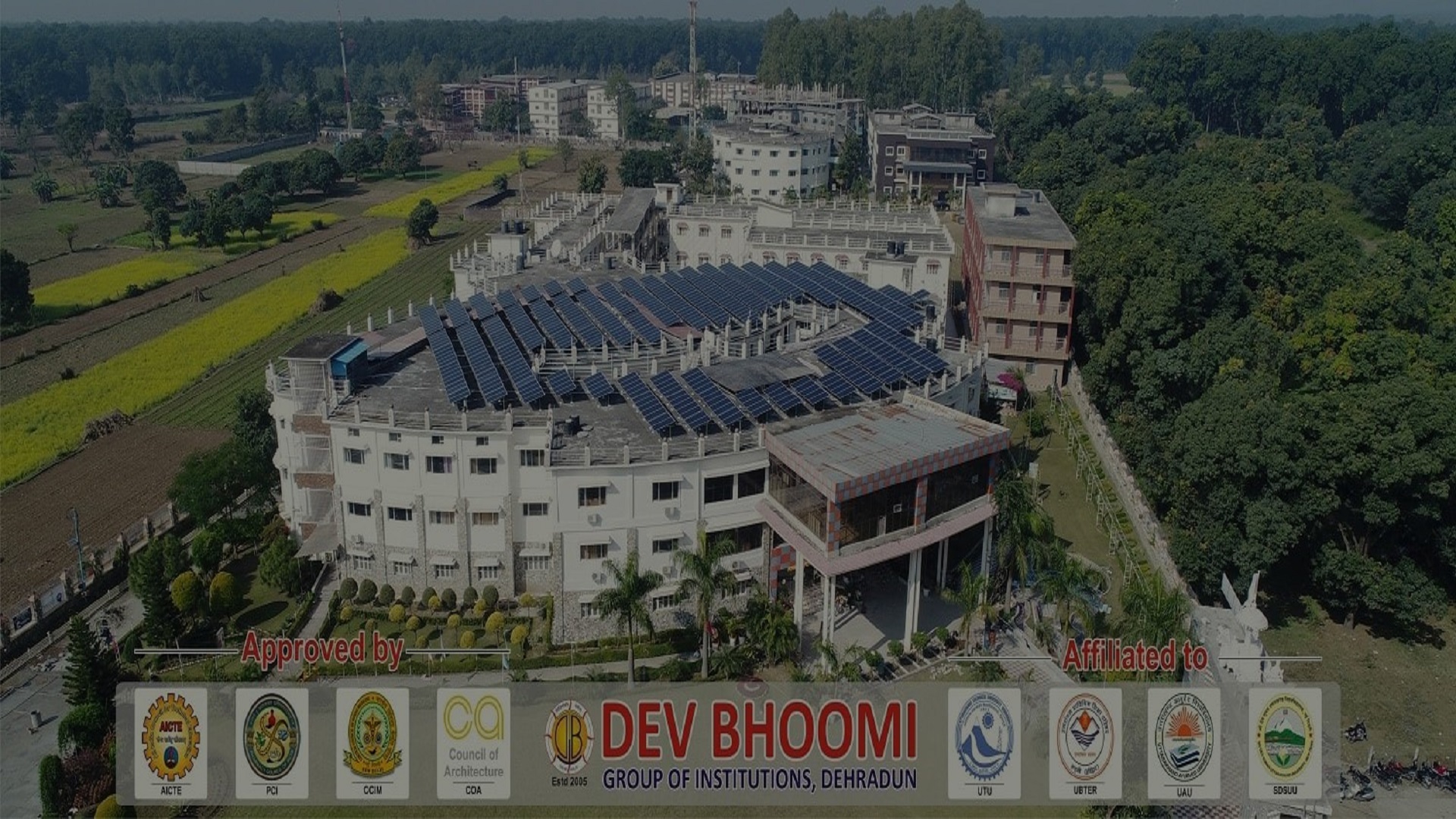
Colleges
Students
Universities
Courses
Today’s Most Demanding Courses
- Top Demanded
B.Tech Computer Science & Engineering
- ₹96000/- per Year
B.Tech Electronics & Communication Engineering
- ₹96000/- per year
B.Tech Electrical Engineering Course
- ₹96000/- per year
B.Tech Civil Engineering Course
- ₹80000/- Per Year
B.Tech Mechanical Engineering
- ₹60000/- Per Year
BMRIT – Bachelor of Medical Radiology
- ₹70000/- Per Year
B.Sc OT – B.Sc in Operation Theatre
- ₹60000/- Per Year
BMLT – Bachelor in Medical Lab Technology
- ₹70000/- Per Year
BPT – Bachelor of Physiotherapy
- ₹65000/- Per Year
GNM-General Nursing and Midwifery
- ₹80000/- Per Year
B.Sc Nursing – Bachelor of Science in Nursing
- ₹70000/- Per Year
P.B.Sc – Post Basic B.Sc Nursing
- ₹65000/- Per Year
ANM – Auxiliary Nursing Midwifery
- ₹250000/- Per Year
BAMS-Bachelor of Ayurvedic Medicine & Surgery
- ₹65000/- per year
Nursing Degree & Diploma Courses
- Top Demanded
Medical Degree & Diploma Courses
- ₹60000/- per year
Paramedical Degree & Diploma Courses
- Top Demanded
Engineering Degree & Diploma Courses
Today’s Most Demanding Universities

HIMALAYIAYA UNIVERSITY DEHRADUN UTTARAKHAND
Best University in Uttarakhand

Desh Bhagat University
Top Demanded University

Graphic Era University
Top Demanded University

Bhagwant Global University
Most Leading University in State
Today’s Latest Updates
Study in Abroad
MBBS in Abroad
Top View Courses
Interested in Admission ?? Follow Our Process
Step 05
Get Admission in the suitable college by paying registration amount at the college account/shiksha view account.

Upcoming Exams Date & Timing
The NEET application form 2023 has been released on March 6. The last date to apply for the exam is April 6, 11.50 PM. NTA released the notification, information bulletin and application form for NEET 2023 on March 6 late evening. The NEET 2023 exam will be conducted on May 7, 2023. The schedule for other events is yet to be announced. NEET 2023 will be conducted in a paper-pencil-based mode for a duration of 200 minutes, from 2 PM to 5.20 PM (IST) in approximately 500 cities across India and abroad. The NEET exam pattern and syllabus have remained the same as last year. However, the NEET 2023 application fee has increased by INR 100 for each category and INR 1,000 for selecting an exam city abroad
What is NEET UG?
The National Eligibility cum Entrance Test (NEET) is the sole entrance test for admission to MBBS and BDS courses in India. The exam is conducted once a year in offline mode for a duration of three hours and 20 minutes. The National Testing Agency (NTA) conducts the medical entrance exam for admission to MBBS, BDS, BSc Nursing, BAMS, Veterinary, and other medical/paramedical courses in India. The exam is conducted in 13 languages.
NEET 2023 Dates
Take a look at the table below for the complete schedule of NEET 2023 exam
| Dates | Upcoming Exam Dates |
|---|---|
| 6 Mar ’23 – 6 Apr ’23 | NEET 2023 Application Process ON GOING |
| May ’23 | NEET 2023 Admit Card [TENTATIVE] |
| 7 May ’23 | NEET 2023 Exam |
| Jun ’23 | NEET 2023 Result [TENTATIVE] |
NEET 2023 schedule
NEET UG 2023 Exam Schedule Download
DOWNLOD NEET 2023 EXAM SCHEDULE / DATE
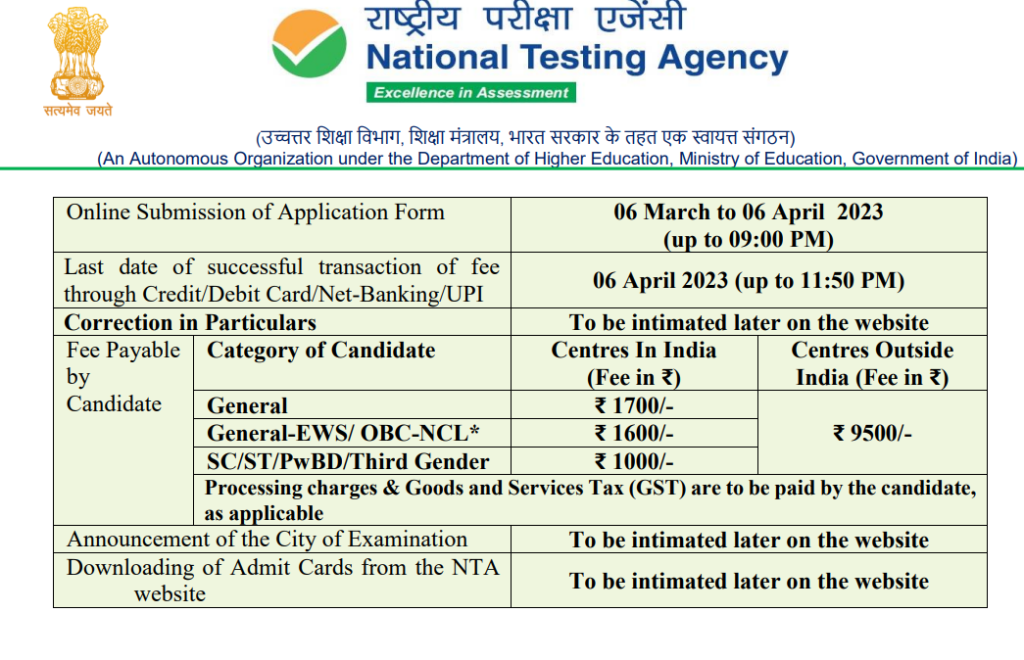
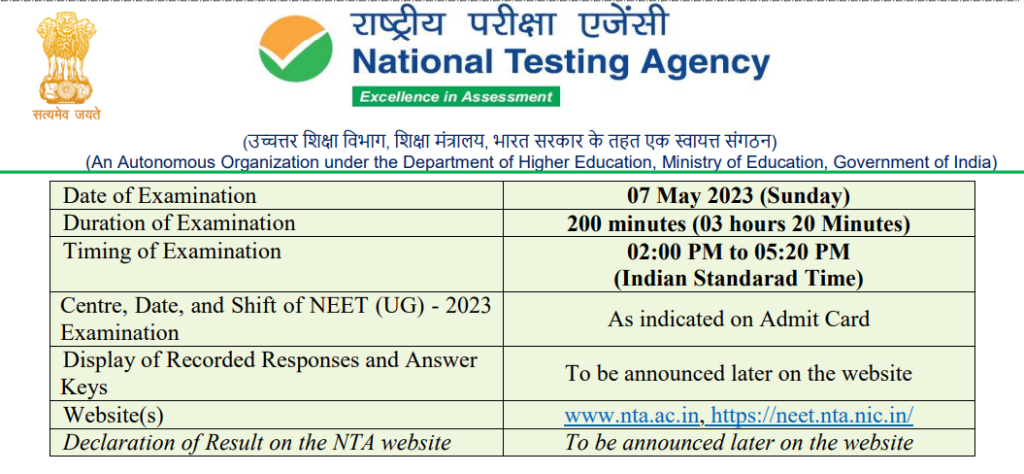
NEET 2023 Application Form
The NEET 2023 application form has been released on March 6. The process has to be completed online. The last date to fill and submit the NEET UG 2023 application form is April 6. NTA will also provide the application correction window tentatively in the second week of April wherein candidates can make the necessary changes in the specified fields. However, the application correction facility will be available only to those candidates who would have completed the process by paying the application fee. The application process is given below:
- Visit the NEET 2023 official website – www.neet.nta.nic.in
- Click on the tab indicating the application form
- Read all the instructions and register with personal details such as name, contact details, password, etc. to generate the application number and password
- After the credentials are generated, log in and fill up the application form with personal and educational details, exam medium and exam city preference and photograph and signature upload
- Pay the application fee in online mode through credit/debit card, net banking, Paytm and UPI
NEET Application Fee
The NEET 2023 application fee has increased by INR 100 for each candidate category. The category-wise application fees are given in the below table:
| Category | Application Fee (in INR) |
|---|---|
| General | 1,700 |
| General EWS and OBC | 1,600 |
| SC, ST, PwD | 1,000 |
| Outside India | 9,500 |
NEET UG 2023 Highlights
The following table enlists the key features and highlights of NEET UG 2023.
| Particulars | Details |
|---|---|
| Exam Name | National Eligibility Cum Entrance Test (NEET) |
| Conducting Body | National Testing Agency (NTA) |
| Exam Level | Undergraduate (UG) Exam at National Level |
| Exam Frequency | Once a year |
| Total Registrations | 18,72,341 (NEET 2022) |
| Exam Mode | Offline or Paper Pencil Based Test (PBT) |
| Courses Offered Through NEET UG | MBBS, BDS, BAMS, BVSC & AH |
| Exam Fees | INR 1,700 (General), 1,600 (OBC), 1,000 (Reserved category candidates), 9,500 (Foreign nationals) |
| Exam Duration | 3 hours and 20 minutes |
| Number of Subjects and Total Marks | Physics (180 marks), Chemistry (180 marks), Biology (360 marks): Total Marks – 720 |
| Total Questions | 200 (180 to be attempted) |
| Marking Scheme | +4 for each correct answer-1 for each incorrect answer |
| Number of Exam Cities | 543 (India)14 (Abroad) |
| Language/Medium of Paper | 13 Languages – English, Hindi, Bengali, Urdu, Assamese, Gujarati, Marathi, Odia, Kannada, Tamil, Malayalam, Punjabi and Telugu |
| Accepting Colleges | 1,613 colleges |
| Total Number of Seats | MBBS – 99,763 BDS – 27,868 BAMS – 52,720 BVSc & AH – 603 |
| NEET Helpline Numbers | 011-40759000 |
| NEET Official Website | www.neet.nta.nic.in |
NEET 2023 Eligibility Criteria
NEET UG 2023 aspirants who wish to apply for the entrance test are advised to check if they fit into the criteria specified by NTA. Candidates who fulfil the following parameters are eligible for the exam.
Nationality:
Citizens or applicants belonging to the following nationalities are eligible to apply for NEET:
- Indian Nationals
- Non-Resident Indians (NRIs)
- Overseas Citizen of India (OCI)
- Persons of Indian Origin (PIO)
- Foreign Nationals
Age Limit:
The age limit or age criteria for NEET candidates are as follows:
- The minimum age of a candidate as of December 31, 2023, should be 17 years.
- The upper age limit of 25 years for General category candidates and 30 years for reserved category candidates have been removed by NMC in 2022.
Minimum qualification:
Applicants should fulfil the educational qualification mentioned below:
- Candidates must have cleared Class 12 or equivalent from a recognised institute and Board.
- Candidates who are appearing for Class 12 or equivalent in 2023 can also apply for NEET 2023.
- Candidates who have completed Class 12 or equivalent from an open school are also eligible.
Mandatory subjects:
- Candidates must have cleared Class 12 or equivalent with Physics, Chemistry and Biology.
- Candidates who have passed Class 12 or equivalent with Biology as an additional subject are also eligible.
Minimum marks required in the qualifying examination:
- General category: 50 per cent
- PWD category: 45 per cent
- SC/ST/OBC: 40 per cent
Also Read: NEET 2023 eligibility criteria
What is New in NEET 2023?
NTA has brought changes in a number of areas of the NEET 2023 exam in terms of the application process, exam cities, tie-breaking criteria and more. Let us take a look at the changes introduced this year:
- Increase in the application fee: The application fee has increased for each category by INR 100 and for those opting for an exam centre abroad, the fee has increased by INR 1,000.
- Document upload: This year, an additional document has to be uploaded, which is the permanent and present address proof in PDF format.
- Selection of exam cities: Unlike four exam cities, this year, candidates will have to select two cities. Unlike last year, where candidates had to select four cities.
- Decrease in the number of exam cities in India: The number of exam cities for NEET UG 2023 is 485 cities across India and 14 cities abroad. Last year, NEET was held in 543 exam cities in India and the number of exam cities abroad remains the same.
- Removal of age factor in tie-breaking process: NTA has removed the age factor as a criterion in the tie-breaking policy. This year, along with the number of correct attempts in Biology, Chemistry and Physics, the proportion of correct and incorrect attempts will also be considered.
NEET 2023 Exam Centres
The NEET 2023 exam centres are expected to be located in around 500 cities across India and abroad. Last year, the total number of test centres was 3,570, which is expected to increase this year. Candidates will have to enter their exam city preference while filling the application form based on the preferential order. In the drop-down menu, candidates will only view the states and cities in and around their present and permanent addresses. NTA will allocate the exam centre, which will be informed in their admit card through a computerised method. Although NTA releases the list of exam cities, the exact name and addresses of the centres are not revealed prior to the release of the admit card. To help test-takers plan for their exam day commute, NTA releases the advance intimation of the exam city prior to releasing the admit card which informs them about the city in which their exam centre will be located.
NEET 2023 Syllabus
The NEET 2023 syllabus comprises three subjects, namely Physics, Chemistry and Biology. The syllabus is the same as that of CBSE Class 11 and Class 12. Candidates are advised to review the syllabus before preparing for the entrance test. It is expected that the NEET syllabus 2023 will remain the same as last year’s. Owing to the same syllabus as the Board exam and other national-level competitive entrance exams, a common exam preparation will suffice.
NEET 2023 Exam Pattern
The NEET 2023 exam pattern has remained the same as that of last year. The paper-pencil-based exam will be conducted for a duration of 200 minutes and will carry 200 multiple-choice questions from Physics, Chemistry and Biology. Candidates will have to attempt 180 questions. The Biology subject will be further divided into Botany and Zoology. Each of these subjects will have two sections. While Section A will consist of 35 questions, Section B will have 15 questions, of which only 10 need to be attempted. Each question will carry 4 marks and there will be a -1 mark negative marking scheme for each wrong answer. No marks will be awarded or deducted for unattempted or extra attempted questions. The below table brings the NEET 2023 exam structure.
| Sections | Number of Questions | Total Marks |
|---|---|---|
| Physics Section A | 35 | 140 |
| Physics Section B | 15 | 40 |
| Chemistry Section A | 35 | 140 |
| Chemistry Section B | 15 | 40 |
| Botany Section A | 35 | 140 |
| Botany Section B | 15 | 40 |
| Zoology Section A | 35 | 140 |
| Zoology Section B | 15 | 40 |
NEET 2023 Preparation Tips
Candidates preparing for NEET 2023 should first be familiar with the exam pattern and syllabus. After that, they need to shortlist the books to refer to for NEET 2023 preparation. To complete the topics in the syllabus, one must refer to NCERT books. Candidates must prepare a timetable for NEET preparation. This should be followed for completing the preparation on time. Another important aspect of preparation is solving mock tests and sample papers. Since the weightage of all sections is equal in the exam, aspirants should give equal focus on all sections or subjects to secure a balanced score. After taking regular mock tests, students would develop an understanding of their strong and weak areas and should channelise their subject or topic-wise preparation accordingly.
Also Read:
NEET 2023 Answer Keys
NEET 2023 answer keys are expected to be released within a month of conducting the exam along with the OMR sheets. The answer keys refer to the correct answer options, based on which test-takers can calculate their estimated score. In case of any discrepancy, candidates can submit challenges against one or more answer keys of NEET in the given format by paying a fee of INR 200. The objections will be reviewed by an expert panel set up by NTA and the final answer keys will be released along with the result. The NEET answer keys are released both officially and unofficially. On the day of the NEET exam, coaching institutes release unofficial answer keys, which can be utilised to calculate an estimated score. This can be further tallied with the NEET provisional answer keys.
NEET 2023 Mock Test
NEET mock tests are released by NTA to help aspirants prepare for the exam. The mock tests can be taken in online mode, although the actual exam is conducted in offline or paper-pencil-based mode. Candidates can take offline mock tests for the exam which are conducted by the coaching institutes to assess their preparation. After taking the mock test, it is necessary to analyze it to understand the gaps and improve their performance by changing the preparation strategy accordingly. The mock tests are of various difficulty levels. The difficulty level of the questions in these mock tests ranges from very easy to difficult. Candidates who solve the mock tests gain experience in solving a variety of questions thus preparing them for the exam day.
NEET Mock Test is a comprehensive Test including Questions from Physics, Chemistry, and Biology. This test will help you to get an idea about the type of questions that will be asked, the exam pattern, and the marking scheme. After taking the test, you can immediately check your score.
NEET 2023 Admit Card
The NEET admit card 2023 is expected to be released by NTA approximately a week prior to the exam in online mode. Registered candidates will have to log in to the NTA NEET 2023 website and log in with their credentials to download the admit card or hall ticket. It is one of the most critical and mandatory documents which must be carried to the exam centre on the day of the exam and should also be preserved till the admission process is concluded. The admit card will consist of information such as candidates’ personal details, exam date and time, exam centre name and address and exam day instructions. The steps to download the admit card are as follows:
- Visit the NEET 2023 website – neet.nta.nic.in
- Click on the link indicating NEET 2023 Admit Card link, click any one from the three tabs/links
- Fill a self-declaration form regarding your latest health and travel updates
- Click on the link indicating ‘NEET 2023 Admit Card Download’
- Log in with NEET 2023 Application Number and Password along with the Security Pin
- Download the NEET 2023 Admit Card
- Take multiple printouts
After downloading the admit card, candidates will have to paste their recent coloured postcard-sized photograph (preferably the same as the one uploaded with the application form) in the space provided in 4″x6″ dimensions. Although they need to get their parents’ signatures on the NEET admit card, they will have to sign in the presence of invigilators only, as per their instructions.
NEET 2023 Analysis
As per last year’s NEET analysis, the difficulty level of the exam was moderate to tough. The questions were on the expected lines. As far as the subject-wise difficulty level is concerned, Physics was the toughest, followed by Chemistry and Biology. The questions were equally distributed from the Class 11 and Class 12 syllabi of CBSE. The NEET 2023 analysis will be updated after the conduct of the exam on May 7.
NEET 2023 Result
The result is expected to be released within 45 days of conducting the exam. The NEET result or the scorecard will be released online, in PDF format. Candidates will have to log in to the official website to download the NEET 2023 result. The scorecard will carry information such as candidate name, Roll Number, the total score obtained out of 720, overall percentile, All India Rank, qualifying status and cutoff scores.
NEET 2022 Topper Names
The below table brings the list of NEET 2022 toppers along with their rank, scores, percentile and state.
| Name | AIR | Score | Percentile | State |
|---|---|---|---|---|
| Tanishka | 1 | 715 | 99.9997733 | Rajasthan |
| Vatsa Ashish Batra | 2 | 715 | 99.9997733 | Delhi |
| Hrishikesh Nagbhushan Gangule | 3 | 715 | 99.9997733 | Karnataka |
| Rucha Pawashe | 4 | 715 | 99.9997733 | Karnataka |
| Errabelly Sidharth Rao | 5 | 711 | 99.9997166 | Telangana |
| Rishi Vinay Balse | 6 | 710 | 99.9992066 | Maharashtra |
| Arpit Narang | 7 | 710 | 99.9992066 | Punjab |
| Krishna SR | 8 | 710 | 99.9992066 | Karnataka |
| Zeel Vipul Vyas | 9 | 710 | 99.9992066 | Gujarat |
| Haziq Parveez Lone | 10 | 710 | 99.9992066 | J&K |
NEET Cutoff Marks (Opening & Closing)
Aspirants can refer to the table below to know the NEET cutoff trends for the past three years. This will help them understand the difficulty level of the examination.
| Category | 2022 | 2021 | 2020 | 2019 |
|---|---|---|---|---|
| Unreserved | 715-117 | 720-138 | 720-147 | 701-134 |
| Unreserved PWD | 116-93 | 137-108 | 146-129 | 133-120 |
| Reserved | 116-105 | 137-122 | 128-113 | 133-107 |
| Reserved PWD | 104-93 | 121-108 | 128-113 | 133-107 |
NEET 2023 Counselling
The counselling process will be conducted by the Medical Counselling Committee (MCC) for the 15 per cent All India Quota (AIQ) seats and the State Authorities will conduct the NEET counselling for the 85 per cent State Quota seats. The NEET counselling process is conducted online wherein candidates will have to register online, followed by which they will have to fill and lock seat choices. After this, seat allotment results will be declared. Candidates will have to accept the seat and go for institute reporting, in case they want to join the allotted institute. If they are unwilling to accept the seat, they can opt for seat upgradation and participate in the next round of NEET UG counselling. There are four rounds of counselling and the number may increase or decrease based on the seat vacancy.
Courses Offered Through NEET UG
NEET UG is the gateway to admission to multiple medical and paramedical courses:
- MBBS
- BDS
- Ayurvedic Medicine
- Homoeopathy Medicine
- Unani Medicine
- Siddha Medicine
- Veterinary Sciences and Animal Husbandry
- BSc (Hons) Nursing
- Bachelor of Physiotherapy
- Bachelor of Occupational Therapy
- Bachelor of Audiology, Speech and Language Pathology
- Bachelor of Prosthetics and Orthotics.
In India, there are a total of 654 Medical, 323 Dental, 914 AYUSH, and 47 BVSc & AH colleges that will accept NEET scores. There are a total of 15 AIIMS and two JIPMER campuses that also accept this exam score for admission. This year, BSc (Hons) Nursing course admission will also take place through NEET but the seat matrix is yet to be released. As per the current data, there are 99,763 MBBS, 52,728 AYUSH, 27, 948 BDS, 603 BVSc, and 487 BSc nursing.
NEET Participating Institutes
The below table carries the list of prominent medical colleges in India that accept NEET scores.
| NEET Participating Institutes | |
|---|---|
| Maulana Azad Medical College, New Delhi | King George’s Medical University, Lucknow |
| Jamia Millia Islamia, New Delhi | Christian Medical College, Vellore |
| Armed Forces Medical College, Pune | Madras Medical College, Chennai |
| Kasturba Medical College, Manipal | University College of Medical Sciences, University of Delhi, Delhi |
| Institute of Medical Sciences Banaras Hindu University, Varanasi | Lady Hardinge Medical College, Delhi |
FAQs Regarding NEET UG 2023
Q: When was the NEET UG 2023 application form released?
A: Yes, the NEET 2023 application form has been released on March 6 late evening. NTA has released the application form, notification and information bulletin together at the official website, neet.nta.nic.in.
Q: When will the NEET 2023 application form submission end?
A: The last date to submit the NEET 2023 application form is April 6. Based on candidate requests, NTA may extend the last date of application as well.
Q: Can I make changes in the NEET 2023 application form?
A: Yes, registered candidates can make changes in the NEET 2023 application within the stipulated dates. There will be no additional fee, unless candidates change category which would impact the fee . The fields which will be editable will be specified by NTA and candidates will not be able to make changes in any other fields. Hence, they must be careful while filling the application form. In case of incorrect information provided in the admit card, candidates will be disqualified during the admission or counselling process.
Q: What is the eligibility criteria for NEET 2023?
A: As per the eligibility criteria of NEET, candidates should pass the Class 12 Board exam from a recognised institute and board from the Science stream with a minimum of 50 per cent aggregate (40 per cent for OBC/SC/ST and 45 per cent for PwD category candidates). The minimum age limit is 17 years as on December 31 of the year of admission.
Q: Is there any upper age limit for taking NEET UG 2023?
A: The upper age limit criterion has been removed by NMC on March 9, 2022. Earlier, the case was under trial in the apex court. However, there is a lower age limit of 17 years as of December 31 of the academic year. Unless the candidates meet the lower age limit criteria, they would not be considered eligible to appear for NEET 2023.
Q: When will NEET 2023 be conducted?
A: NEET 2023 will be conducted on May 7. NTA announced the NEET 2023 exam date on December 15 through a common exam calendar which consists of dates of other entrance exams such as JEE Main, CUET UG and ICAR AIEEA. The other dates of the exam such as application was announced on March 6.
Q: Will NEET 2023 be delayed?
A: No, NTA will not postpone NEET 2023. Even though a number of candidates are requesting the exam authorities to postpone the date, NTA or the MHRD has not responded to the requests or announced any decision regarding this. Over the past two years, NEET exam date has been delayed owing to the pandemic situation, which has affected the overall academic calendar. To bring back normalcy, NTA has scheduled NEET UG 2023 in May, similar to the pre-pandemic era after much brainstorming and assessing other entrance exam dates. Hence, it is unlikely that the NEET 2023 exam date will be postponed.
Q: Who conducts the NEET UG exam?
A: NEET UG exam is conducted by the National Testing Agency (NTA). NTA has been conducting NEET since 2019. Prior to that, the exam was conducted by CBSE. The role of NTA is to conduct the application process, release the admit card, conduct the exam across centres, declaration of answer keys and result. The counselling process is conducted separately by national and state authorities for the All India Quota and State Quota seats.
Q: When will NEET 2023 admit card be released?
A: NEET 2023 admit card is expected to be released a week before the exam. Hence, the NEET admit card 2023 will be declared in the fourth week of April or first week of May (around May 3 or May 4). The tentative date is as per the past years’ trends. NTA will release an advance intimation to exam city slip which will mention candidates’ exam city, prior to the availability of the NEET UG 2023 admit card. NTA may or may not announce the date of releasing the NEET hall ticket or admit card in advance.
Q: Will the NEET 2023 exam pattern remain the same as last year?
A: The NEET exam pattern has remained the same as last year. NEET is a paper-pencil-based-test of 200 minutes duration and will carry 200 questions in total. Out of this, 180 questions will have to be attempted. The total marks of the exam is 720. Each correct answer will fetch 4 marks and there will be 1 mark negative marking for each wrong answer. There will not be any negative marking for unattempted questions or extra attempted questions.
Q: Will the NEET UG syllabus 2023 change?
A: NEET 2023 syllabus will remain the same as that last year. NEET UG syllabus is same as that of the Class 11 and Class 12 syllabus hence it is not much difficult for students to complete or understand. The complete syllabus of NEET 2023 will be released by NTA along with the information brochure. However, candidates must not wait till the official release of the NEET 2023 syllabus and prepare for the exam in full fledged manner.
Q: What are the regional language options available for NEET UG 2023?
A: NEET UG question paper will be available in 13 languages. Apart from Hindi and English, candidates can choose from Tamil, Urdu, Marathi, Bengali, Gujarati, Odia, Assamese, Kannada, Malayalam, Punjabi and Telugu. Candidates have to enter their language preferences in the application form and will have to choose their exam centre preference accordingly. During the exam, candidates must ensure that they have received the NEET question paper in the language they have opted for, otherwise, they should report the same to the invigilators. During preparation also, candidates must prepare in the particular language and solve previous years’ question papers and mock tests in the regional language.
Q: What was the difficulty level of NEET UG?
A: NEET UG is termed as a moderate to tough test. Physics is generally the toughest section and Biology is the easiest section according to the experts and test-takers. The difficulty level of NEET Chemistry section ranges from moderate to tough. The section-wise difficulty level may vary for NEET 2023. The difficulty level also varies as per test-takers’ preparation level.
Q: How many times can I appear for NEET?
A: According to the notification released by NTA, a candidate can appear for NEET any number of times. There is no restriction on the number of attempts permitted. The exam is conducted once a year, hence candidates can appear only once in an academic year.
Q: How to prepare for NEET exam and get a good rank?
A: Here are some tips to help you prepare for NEET and improve your chances of getting a good rank:
1 Understand the Syllabus: Go through the NEET syllabus thoroughly and create a study plan accordingly. Divide the topics into manageable chunks and make sure you cover each one systematically.
2 Refer to Good Study Materials: Use the best study material available in the market, such as NCERT books, reference books, and online resources.
3 Take Mock Tests: Taking mock tests regularly will help you assess your strengths and weaknesses, and give you an idea of the exam pattern and the difficulty level of the questions.
4 Time Management: Time management is crucial when it comes to cracking NEET. Devote sufficient time to each section, and make sure you complete the entire paper within the given time frame.
5 Stay Healthy: Take care of your physical and mental health to ensure that you can stay focused and motivated during your preparation. Eat healthy food, exercise regularly, and take breaks to avoid burnout.
6 Seek Help When Needed: Don’t hesitate to seek help from your teachers, mentors, or online communities if you are facing any difficulties in your preparation. Remember, consistent effort and practice are key to success in NEET. Keep practicing and stay focused on your goal, and you are sure to achieve a good rank. Good luck!

Apply Now
Our Popular Courses
- Top Demanded
B.Tech Computer Science & Engineering
- ₹96000/- per Year
B.Tech Electronics & Communication Engineering
- ₹96000/- per year
B.Tech Electrical Engineering Course
- ₹96000/- per year
B.Tech Civil Engineering Course
- ₹80000/- Per Year
B.Tech Mechanical Engineering
- ₹60000/- Per Year
BMRIT – Bachelor of Medical Radiology
NEET Eligibility Criteria 2023: Upper Age Limit, Number of Attempts, Qualification
NEET eligibility criteria 2023 will be prescribed by NTA for the candidates who wish to apply for the entrance test. Know the age limit, qualification, and marks required to appear for NEET 2023 here.
NEET Eligibility Criteria 2023 – NEET 2023 application forms have been released on March 6 and the last date of application is April 6. The exam will be held on May 7. Before applying for NEET UG 2023, candidates must have ensured that they fulfil the NEET 2023 eligibility criteria, otherwise, their candidature will be cancelled. NEET eligibility criteria are prescribed by the National Testing Agency in accordance with the Indian Medical Council Act-1956 and the Dentists Act-1948 as amended in 2018. It is expected that the NEET eligibility criteria for 2023 will remain the same as that of last year.
In an official announcement made by the National Medical Commission (NMC) on March 9, it was stated that the upper age limit for candidates has been removed. Earlier, the age limit for General and reserved category candidates was 25 years and 30 years respectively. This eligibility criteria factor was included in the NEET 2022 exam and will be continued for NEET 2023 as well. NEET 2023 notification and information bulletin are expected to be released in December 2022. Approximately 18 lakh candidates had registered for the NEET 2022 exam and the removal of the upper age limit was one of the factors. This was the highest in the past five years. It is expected that the number of applicants and test takers would be higher in NEET 2023.
The National Eligibility cum Entrance Test (NEET) is an entrance test conducted for admission to various medical and allied courses, including MBBS, BDS and AYUSH. Thus, the eligibility criteria of NEET 2023 refer to a basic minimum qualification for a candidate to apply for the said courses. NTA had removed the upper age limit clause from NEET 2021 eligibility criteria thus enabling aspirants older than 25 years to apply for it. All those who wish to apply for this national entrance test are advised to check their eligibility before filling the NEET application form 2023. Candidates who do not fulfill the NEET eligibility criteria, if found ineligible, may have to face severe consequences such as the cancellation of their admission.
Candidates must, however, note that the decision for removing the cap on the upper age limit of NEET aspirants is still pending in the Supreme Court of India. Candidates older than 25 years of age must fill the application form for NEET 2023 at their own risk, taking into consideration the fact that the verdict of the apex court will determine their eligibility.
Read the complete article to know more about the eligibility for NEET 2023.
Basic NEET Eligibility Criteria 2023
Below mentioned are the basic or primary eligibility criteria for NEET UG 2023.
- Candidates must have attained the age of 17 years at the time of admission or will attain the same by December 31, 2023. Accordingly, the minimum date of birth of candidates should be December 31, 2006.
- Indian nationals/ Overseas Citizens of India (OCIs) who wish to pursue MBBS/ BDS from a foreign university also have to qualify for NEET 2023.
Eligibility criteria of NEET 2023: Qualifying Marks
Below mentioned are the NEET 2023 eligibility criteria with respect to the educational background or marks obtained in the qualifying exam.
- Candidates must have passed Physics, Chemistry, Biology/Biotechnology and English subjects individually in the qualifying examination.
- Candidates belonging to the General category must have scored a minimum of 50 per cent in the qualifying examination.
- Candidates belonging to Scheduled Caste/ Scheduled Tribes/ Other Backward should have a minimum score of 40 per cent in the qualifying examination.
- Candidates who belong to the General category and are applying under the Persons with Disability (PWD) Quota, must have a minimum score of 45 per cent marks in the qualifying examination.
Minimum Qualifying Marks as per NEET 2023 Eligibility Criteria
The following table brings the minimum aggregate required in the qualifying exam or as per the evaluation criteria:
| Category | Minimum aggregate in the qualifying examination (PCB) |
|---|---|
| General | 50 per cent |
| General – PWD | 45 per cent |
| SC/ ST/ OBC/ Reserved-PWD | 40 per cent |
Note: The minimum aggregate is likely to be revised in the wake of the new evaluation scheme to be introduced by the Ministry of Human Resource Development (MHRD) since the Board exams of the major boards like CBSE and ICSE are cancelled.
How Many Attempts for NEET?
The maximum number of attempts for the NEET has not been directed by the NTA. Thus, allowing a candidate to appear for NEET as many times as they want to.
NEET Eligibility Criteria 2023 for Candidates Belonging to the UT of J&K/ Ladakh
Candidates belonging to the UT of J&K/ Ladakh are not eligible to apply for the 15 per cent All India Quota seats and can only apply for the seats of Deemed Universities, ESIC, and AFMC.
NEET 2023 Eligibility Criteria for Candidates Applying for State/ Deemed/ Central/ ESIC/ AFMC Seats
The following criteria are related to the seat categories:
- Indian Nationals, NRIs, OCIs and PIOs are eligible to apply for these seats
- Foreign nationals should confirm their eligibility before applying for NEET 2023
NEET Eligibility Criteria 2023 for Candidates Applying for 15 per cent All India Quota (AIQ) Seats
Indian Nationals, NRIs, OCIs, PIOs and foreign nationals are eligible to apply for these seats.
The following table brings the new NEET reservation criteria for OBC, EWS, SC, ST and PwD categories under the 15 per cent AIQ seats are as follows:
| Categories | Reservation Percentage |
|---|---|
| SC | 15 |
| ST | 7.5 |
| OBC | 27 |
| EWS | 10 |
| PwD | 5 |
On July 29, 2021, the Government of India made a landmark decision that from the academic year of 2021-22 onwards, there would be a 27 per cent OBC quota in NEET(Non-Creamy Layer) and a 10 per cent NEET reservation for EWS in 15 per cent Under Graduate (UG) All India Quota seats (MBBS/BDS) (contributed by the State/UTs to the Central Pool).
NEET 2023 Eligibility Criteria for Central Universities
Delhi University (MAMC, LHMC, UCMS): Like all other universities, only 15 per cent seats of the colleges affiliated with Delhi University will be filled through NEET counselling. The remaining 85 per cent of seats will be filled via DU NEET counselling. Candidates who have passed Class 11 and Class 12 from an institute located in Delhi will be able to apply for these 85 per cent seats.
Faculty of Dentistry, Jamia Millia Islamia: The institute offers 50 BDS seats, out of which 47 seats will be filled through the MCC NEET counselling. The remaining three seats fall under the institutional quota and will be allotted to only those candidates who had passed Class 11 and Class 12 from JMI.
Aligarh Muslim University (AMU): The institute reserves 50 per cent of its seats for candidates who have studied at AMU for the past three years. Only such candidates will be able to apply for the institutional quota seats of AMU. The remaining 50 per cent will be filled through the MCC counselling of NEET.
Banaras Hindu University (BHU): All candidates who fulfil the basic eligibility criteria for NEET MCC counselling can apply for the seats at BHU. There is no special requirement for applying to this institute.
NEET Eligibility Criteria 2023: Qualifying Examination Codes
The following table brings the code-wise description of the candidate category.
| Description Code | |
|---|---|
| Code 01 | The candidate is appearing in the qualifying examination or awaiting the result of the qualifying examination.He/ she has to submit the result of the qualifying examination in the first round of counselling. |
| Code 02 | The candidate has qualified for Class 12 or equivalent in the year 2023 or before.He/ she has not pursued any other course after the completion of Class 12. |
| Code 03 | The candidate has completed the Intermediate/Pre-degree Examination in Science with Physics, Chemistry, Biology/Biotechnology, and English.(or)The candidate has completed the qualifying examination equivalent to Class 12 completed from a state board. |
| Code 04 | The candidate has completed a Pre-professional/Pre-medical Examination. He/ she has also completed Higher Secondary Examination/ Pre-University/ equivalent examination with English, Physics, Chemistry, and Biology/Biotechnology. |
| Code 05 | The candidate is enrolled in a three-year degree course in English, Physics, Chemistry and Biology/Biotechnology and has cleared the first year including practical tests. |
| Code 06 | The candidate has a BSc degree from a recognized university with two or more of the following subjects: Physics, Chemistry, Biology (Botany, Zoology)/Biotechnology. He/ she must have passed Class 12 with English, Physics, Chemistry, and Biology. |
| Code 07 | The candidate has passed an examination that is equivalent to the Intermediate Science Examination with English, Physics, Chemistry and Biology/Biotechnology or The candidate has completed the qualifying examination from a foreign |
NEET Eligibility Criteria 2023: Frequently Asked Questions (FAQs)
Q: When will the NEET 2023 application process begin?A: The NEET 2023 application forms have been released by NTA on March 6. The last date to apply is April 6, 11.50 PM.
Q. I am 27 years old, can I apply for NEET 2023?A. NEET upper age limit has been scrapped by NMC on March 9, 2022. Hence, you can apply for the exam.
Q. Can NIOS students apply for NEET 2023?A. Yes, NIOS students are eligible to apply for NEET 2023.
Q. Is it important to score good marks in Class 12 marks for NEET 2023?A. As per NEET eligibility criteria, General category candidates had to score 50 per cent or above in the PCB section in Class 12.
Q. I had Biotechnology in Class 11 and Class 12. Can I appear for NEET?A. Yes, candidates with Biotechnology in Class 11 and Class 12 are eligible for NEET UG 2023.
Q. Is there any attempt limit for NEET?A. No, there is no attempt limit specified by NTA for NEET.
Q. I want to go abroad for an MBBS degree. Do I still need to clear NEET?A. Yes, NEET is mandatory for candidates who wish to pursue MBBS from a country other than India. In such cases, the validity of the NEET result will be three years from the date of its announcement.
Q. I have done BSc Nursing. Am I eligible for NEET? A. Yes, you are eligible for NEET. You will have to choose ‘Code 06’ while filling the application form for NEET 2023.
Q. I am an Indian citizen but I have completed my formal education in UAE. Can I apply for NEET UG 2023?A. You can apply for NEET if you have passed the qualifying examination with PCB and English. You will have to choose ‘Code 07’ while filling the application form.
Q. I am 16 years old, but I have passed Class 12. Can I apply for NEET?A. No, you are not eligible for NEET UG 2023. The minimum age of the applicants, as of December 31 of the academic year, should be 17 years.
Q. I am domiciled in Jammu and Kashmir. Can I apply for NEET?A. Yes, you can apply for NEET. However, the candidates belonging to J&K, and Ladakh will not be eligible for the 15 per cent AIQ seats.
Q. I am an OBC category student and have scored 38 per cent in Class 12. Am I eligible for NEET?A. No, you are not eligible for NEET. The minimum qualifying percentage for OBC category candidates is 45. In case NTA revises the qualifying percentage based on the new evaluation scheme, it would be updated here on this page.
NEET 2023 application forms have been released by NTA on March 6. Candidates often get confused about the right procedure to fill the application form. This article of Shiksha.com brings the step-by-step process to complete the NEET 2023 registration process fill and submit the application form. Know the details here.
NEET 2023 application form has been released by NTA on March 6. The last date to submit the form is April 6, 11.50 PM. As the NEET UG application process 2023 has begun, aspirants are wondering about the correct procedure to fill the application form for NEET 2023. To help candidates, this article of Shiksha.com brings the step-by-step process to complete the NEET 2023 registration process fill and submit the application form.
The NEET 2023 application process is completely online. The process is divided into three to four steps, which are as follows:
- NEET 2023 Registration
- Filling the NEET 2023 Application Form
- Document Upload
- Payment of Fees
Let us take a look at each of these steps in
NEET 2023 Registration Process
The first and foremost step of the NEET 2023 application process is to register. The step-by-step process to complete NEET 2023 registration is given below:
- Visit the official website of NEET 2023 – neet.nta.nic.in
- Click on the ‘Register Now’ tab
- Click on the “Fill Registration Form” or the invitation for NEET UG 2023 Registration
- Click on ‘New Registration’ and read the instructions
- Enter the following details:
- Candidate’s Name
- Mother’s name
- Father’s name
- Date of birth
- Category
- Gender
- Nationality
- Persons with Disability
- Identification Type
- Valid Government Identity Card Number
- Present Address
- Permanent Address
- Mobile number
- Email Id
- Alternate Contact Number
- Password
- Choose Security Question and Answer
- Enter Security Pin
After this, candidates have to review the information entered and can either edit the registration form or click on ‘Submit and Send OTP’. An OTP will be sent to the registered mobile number which they will have to enter. This would generate the NEET 2023 Username and Password.
Factors to Select NEET 2023 Registration Password
While selecting the password, applicants should bear in mind the following factors:
- The number of characters should be between 8 to 13
- There should be at least one special character
- There should be at least one uppercase character
- There should be at least one lowercase character
- There should be at least one numerical character
List of Security Questions for NEET 2023 Registration Form
While filling the NEET 2023 registration form, candidates will have to select a Security Question and write the answer. The list of Security Questions are as follows:
- Which is your favourite book?
- Which is the website you rarely visit?
- What is the name of your first school?
- What is your neighbour’s pet name?
- What is the registration number of your first vehicle
Candidates are advised to select the most convenient question, the answer to which they can remember by heart.
How to Fill NEET 2023 Application Form?
Once the NEET registration process is complete, the next step is the most crucial one, to fill and submit the NEET 2023 application form. For this, they have to click on the ‘Complete Application Form’ tab. The form is divided into eight stages, which is listed below:
- Contact Details
- Personal Details
- Identification Details
- Exam City Selection
- Qualification Details
- Other Details
- Document Upload
- Final Submit
Let us now check each of the stages or information to be added under each stage in detail.
Contact Details
The Contact Details stage will appear as complete as the information has been already provided during the NEET 2023 registration process. The next stage, i.e. the Personal Details will be the next stage by default.
Personal Details
At this stage, the basic information will be pre-filled from the registration form details submitted. The other information to be entered are as follows:
- In case of female candidates, if she is the only child of her parents
- Select State/UT from where Class 12 or equivalent has been passed or appearing
- Candidate Category
- If PwD Category candidates have 40 per cent or more benchmark disability
- If Candidate is Diabetic
- Place of Residence
- Annual Family Income
- If Belongs to Minority
- Country of Residence
- Do you want to wear Customary Dress contrary to the Dress Code of NEET UG 2023?
- Mode of Preparation
- Security Pin
Identification Details
Based on the valid Government Identification Number provided by candidates, which can be either Aadhaar Card, Voter ID Card, PAN Card or Passport, they will have to select any one of the given options:
- I voluntarily agree to share my Government Identification Number and am aware that it will be used to establish my identity for the NEET by matching my personal identification details available.
- My information in the Identity Card is not the same as entered in the Application Form.
- I am not willing to share my Government Identification Number.
Exam Medium and City Selection
The next stage is to select the NEET 2023 question paper medium and exam centre city. Based on the language of the exam opted by students along with their address, candidates will have to choose four states and cities in terms of their preference. On the same page, they will have to enter their parents’ occupations and qualifications from the drop-down menu. This will have to be followed by entering the Security Pin and clicking on ‘Save and Next’.
Educational Details
In this stage NEET 2023 application form, candidates will have to fill up a section about their Class 10, Class 11 and Class 12 educational details and qualifications. The mandatory details or information that need to be entered in the form are as follows:
- Pass status
- Year of Pass/Appearing
- Qualifying exam
- Place of schooling
- Type of School/College
- Qualifying Examination State
- Qualifying Examination District
- School Board
- Result Mode
- Roll Number
- School/College name and address
- Subjects
- Obtained and total marks and Aggregate/CGPA
Additional Details
The additional information to be filled in the NEET application form are as follows:
- Did you ever appear in NEET (UG) examination?
- Place of birth (country)
- State and district of birth
Documents required for NEET 2023 Application Form
Candidates will have to upload documents such as photographs, signatures, thumb impressions and category certificates (if applicable) while filling the NEET 2023 application form. The document format and sizes are given in the table below.
| Documents | Size & Format |
|---|---|
| Scanned Photograph | 10 Kb to 200 Kb (passport size)4″x6″, 10 kb to 200 kb (postcard size)JPG/JPEG |
| Scanned Signature | 4 Kb to 30 KbJPG/JPEG |
| Scan of thumb impression | 10 Kb to 200 KbJPG/JPEG |
| Class 10 Passing Certificate | 50 kb to 300 kbPDF |
| Citizenship Certificate or Embassy Certificate | 50 kb to 300 kbPDF |
NEET 2023 Application Fee Payment
The NEET 2023 application fee amount has been increased by INR 100 for each category. The following table brings the NEET 2023 application fee.
| Category | Application fee (In INR) |
|---|---|
| General | 1,700 |
| Other Backward Classes | 1,600 |
| Scheduled Caste /Scheduled Tribe, Persons with Disability | 1,000 |
| Outside India | 9,500 |
The NEET 2023 application fee has to be paid in online mode only. The various modes of payment are as follows:
- Credit Card
- Debit Card
- Net Banking
- UPI
- Paytm
NEET 2023 exam will be conducted on May 7, from 2 PM to 5.20 PM in over 500 cities in India and abroad. The NEET exam pattern and syllabus have remained the same as last year.
Read More:
NEET 2023 Eligibility Criteria
NEET 2023 application form has been released on March 6 at neet.nta.nic.in. The last date to submit the NEET application form 2023 is April 6, 11.50 PM. This year, the application fee for each category has increased by INR 100. The NEET application form 2023 has been released along with the official notification and information bulletin. NEET 2023 exam will be conducted on May 7, 2023, from 2 PM to 5.20 PM. Know all about NEET 2023 application forms and registrations such as eligibility criteria, documents required, how to fill online form, and fees in the below.
NEET 2023 Application Form – Eligibility Criteria
Before filling NTA NEET registration form, candidates must ensure that they are eligible to apply for the exam. NEET eligibility criteria will be set by the National Testing Agency which states the basic requirements to appear for the entrance test. The criteria have been summarised in the table given below. The NEET 2023 eligibility criteria are stated in the table below:
| Particulars | Details |
|---|---|
| Nationality | Indian NationalsForeign NationalsNRIPIOOCI |
| Age | The candidate must be at least 17 years of age as of December 31, 2023 |
| Minimum Qualification | Class 12 or equivalent from a recognised institute |
| Mandatory Subjects | Physics, Chemistry, and Biology |
| Minimum Marks in Qualifying Exam | General: 50%;PWD: 45%SC/ ST/ OBC: 42% |
| Number of permitted attempts | No limit specified by NTA |
Also Read: NEET 2023 Eligibility Criteria
NEET 2023 Registration Dates
Take a look at the table below for the complete schedule of NEET 2023 exam
| Dates | Upcoming Exam Dates |
|---|---|
| 6 Mar ’23 – 6 Apr ’23 | NEET 2023 Application Process ON GOING |
| May ’23 | NEET 2023 Admit Card [TENTATIVE] |
| 7 May ’23 | NEET 2023 Exam |
Documents Required for NEET 2023 Application Form
Since the entire NEET 2023 registration process is online, applicants are advised to keep the following documents ready before filling out the NEET application form to avoid any last-minute hassles.
List of documents Required for NEET 2023 Application Form?
The table below brings the list of documents and files to be uploaded while filling out the NEET 2023 form.
| Documents | Specifications | Size & Format |
|---|---|---|
| Scanned Photograph | Passport size and postcard size (both)The photograph must not be older than 3 monthsName of the candidate and date must be printed below the photograph | 10 Kb to 200 Kb (passport size)4″x6″, 10 kb to 200 kb (postcard size)JPG/JPEG |
| Scanned Signature | Signature of the candidate in black ink on white background | 4 Kb to 30 KbJPG/JPEG |
| Scan of thumb impression | Left-hand thumb impressionShould be on white paper with blue ink | 10 Kb to 200 KbJPG/JPEG |
| Class 10 Passing Certificate | The scanned copy of Class 10 Pass certificate has to be uploaded | 50 kb to 300 kbPDF |
| Permanent and Present Address Proof | The scanned copy of permanent and present address proof has to be uploaded | 50 kb to 300 kbPDF |
| Citizenship Certificate or Embassy Certificate | The citizenship certificate or the embassy certificate is required to prove the nationality of the candidates | 50 kb to 300 kbPDF |
Some other information that you must keep handy are as follows:
- A valid mobile number
- Valid Email Id
- Class 10 marks and percentage
- Class 12 marks and percentage
- Identity Number – Aadhar Card number/ Passport number/ Ration Card number/ bank account/ any other valid Govt. identity number
- Credit card/ Debit card/ Net banking credentials
How to fill NEET Application Form 2023?
The following infographic gives a snapshot of the steps and their sequence to be followed in order to complete the NTA NEET 2023 registration process.

Step 1: Registration
- Visit the official website of NTA NEET or neet.nta.nic.in or directly enter https://examinationservices.nic.in/neet2023/root/home.aspx?enc=Ei4cajBkK1gZSfgr53ImFcFR+natXIEjJ1rCf6DMgOrFA4SfAMU1biZWfro5QnPt
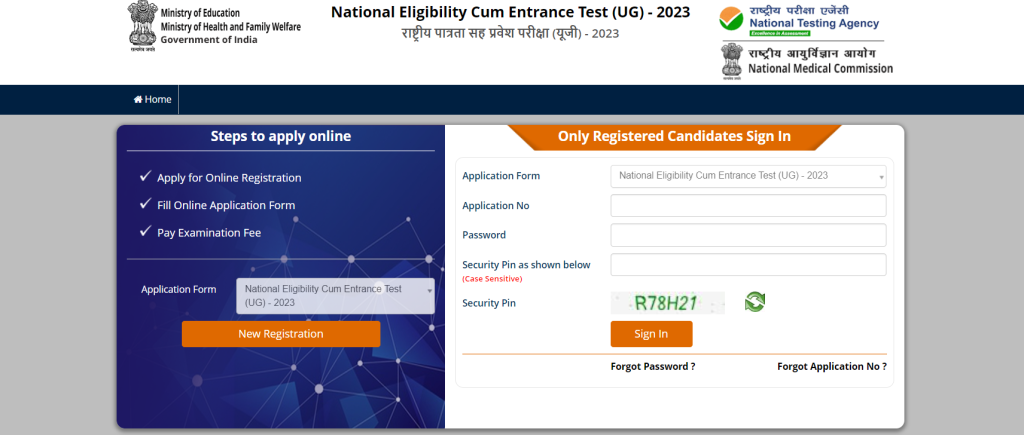
- Click on “Fill Registration Form” or the invitation for NEET UG 2023 Registration
- Click on ‘New Registration’ and read the instructions
Enter the following details
- Candidate’s Name
- Mother’s name
- Father’s name
- Date of birth
- Category
- Gender
- Nationality
- Persons with Disability
- Identification Type
- Identification Number
- Mobile number
- Email Id
- Password
- Enter Security Pin
Step 2: Apply online for NEET 2023
- Click on “Click here to login”
- Login using the application number and password
- The NEET application form would open on your screen
- Details entered during the registration process will be pre-filled in the application and cannot be changed
The form is divided into 12 sections, fill in the following details:
The table below carries the different sections of the NEET application form along with the details to be filled in each section.
| Sections | Credentials |
|---|---|
| Personal Details | Candidate’s NameMother’s and Father’s NameGenderCategoryDate of BirthNationalityPersons with disabilityDo you belong to Minority Category?Are you suffering from Diabetes Type I?Identification TypeIdentification Number |
| Place of Birth | Place of BirthStateDistrict |
| Choice of Medium of Question Paper | Choose from the following language options: English, Hindi, Gujarati, Marathi, Odia, Bengali, Assamese, Telugu, Tamil, Kannada, Malayalam, Punjabi and Urdu |
| Choice of Examination Centre | Choose two exam centre cities in decreasing order of preference |
| Academic Details (Class 10 or equivalent) | Name of School Education BoardName of School /CollegeAddress of School/CollegeYear of passingPercentage of marks obtained in Class 10Class 10 board roll number |
| Academic Details (Class 11 or equivalent) | Name of School /CollegeYear of passingPlace of StudyState where School/College is locatedDistrict where School/College is located |
| Academic Details (Class 12 or equivalent) | School Board of Class 12 or equivalentName of School/College (passed/appearing)Address of School/CollegePlace of studyYear of passingState where School/College is locatedDistrict where School/College is locatedQualifying Exam CodeYear of passing/Appearing class 12 or equivalentPercentage of marks obtained in Class 10th if passedEnter Roll Number of class 12 |
| Permanent Address | Permanent address of the candidate |
| Correspondence Address | Same as permanent address or fill in the current address |
| Details of Parents/ Guardian | QualificationOccupationAnnual income |
| Do you intend to wear a customary dress contrary to the Dress code while appearing for the exam? | Yes /No |
| Security pin | Alphanumeric pin on the screen |
- Check all the details carefully as they cannot be changed after the final submission of the NEET application form 2023
- To submit the duly checked application form, click on “Yes, please do” on the confirmation pop-up
Step 3: Upload scanned images
- Click on “Upload your recent documents”
- Select the files to be uploaded
- Click on “Next”

Step 4: Make Payment
Select the desired mode of payment ( SBI/Syndicate/HDFC/ICICI/Paytm Payment Gateway through Debit Card/Credit Card/Net-banking/UPI)

Also Read: NEET 2023 Application Form, Registration Process Begins; Check Fee and Documents Required
Category-wise NEET 2023 Application Fee
NTA has increased the NEET 2023 application fee by INR 100 for each category. Take a look at the category-wise application fee for NEET 2023 is given below:
| Category | Application fee (In INR) |
|---|---|
| General | 1,700 |
| Other Backward Classes | 1,600 |
| Scheduled Caste /Scheduled Tribe, Persons with Disability | 1,000 |
| Outside India | 9,500 |
Last year, the NEET application fee was INR 1,600, which was increased from INR 1,400.
Step 5: Print Confirmation
Save and print the filled NEET application form 2023 along with the confirmation slip.
NEET 2023 Application Documents that must be retained till admissions
You must keep the following documents safe till the NEET counselling or the medical admission process is concluded.
- Printout of the confirmation page
- Receipt for the payment of application fees
- Six to eight copies of the uploaded photograph
The NEET application form process is being conducted in a single phase. In the year 2021, the NEET application form process was divided into two phases. In the first phase, candidates had to fill in the primary fields of the NEET application form and pay the application fee. After the conduct of the exam and before the result declaration, candidates had to complete the second phase of the application, which consisted of submitting information regarding parents’ profession, family income, uploading category certificates and other documents, etc.
NEET 2023 Application Correction
After the completion of the NEET registration process 2023, NTA will provide an application correction facility for the candidates wherein they will get a chance to make necessary corrections or changes. However, only those candidates who would submit the NEET 2023 application form by paying the requisite application fee will be eligible to avail of the NEET application correction facility. Take a look at the process to make NEET 2023 application correction.
- Visit the official website of NEET 2023
- Log in with your Registration Number and Password/Date of Birth
- Click on the tab indicating NEET 2023 Application Correction
- Make necessary changes and click on save and submit
There is no additional fee to be paid to make corrections in the NEET 2023 application form. However, there are a few fields which cannot be edited. These fields include name, email id and mobile number.
NEET Application Form Statistics
NEET is the largest medical entrance test in India. Every year there is a significant rise in the number of NEET applicants. The data for the past four years has been depicted in the graph given below.

FAQs Regarding NEET 2023 Application Form
Q: Has NEET 2023 registration started?A: The NEET 2023 regisration process has begun on March 6 by the National Testing Agency. The application process is being conducted online. Aspirants must keep an eye on the official websites of NTA and NEET 2023 to be updated about the NEET UG 2023 application process commencement.
Q: When will the NEET registration 2023 process conclude?
A: The NEET registration 2023 process will be conducted for a month. Hence, the last date of NEET 2023 registration is April 6, 11.50 PM. Based on candidate requests, NTA may extend the last date of NEET 2023 registration.
Q: When is NEET 2023 scheduled?
A: NEET 2023 will be held on May 7. NTA announced the exam date on December 15. However, the other dates are yet to be announced. Although some students are requesting the authorities to postpone the exam, it is unlikely that the exam will be postponed any further.
Q: How do I fill the NEET application form 2023?
A: The NTA NEET registration procedure is completely online. Candidates ha ve to visit the official website to fill in the mandatory details and upload the required files such as applicants’ photographs, signatures and documents. The final step was to pay the application fee through one of the slated payment modes.
Q: Can I fill the NEET application form 2023 offline?
A: The NEET application form 2023 has to be filled in online mode only. However, there is an exception for the applicants residing in the Kashmir valley or Leh. The NEET 2023 application fee has to be paid using a credit card/ debit card, net banking, Paytm or UPI.
Q: Do I need to send the NEET application form 2023 and other attachments by post to NTA?
A: No, you need not send any documents by post to NTA. The entire application process for NEET 202 3 will be online and the relevant documents will have to be uploaded online only.
Q: When will NTA open the NEET 2023 application correction window?
A: NTA will most likely open the NEET 2023 application correction window in the second week of April, approximately after a week of concluding the application process.
Q: Do I have to pay a correction fee for making changes to the NEET application form 2023?
A: No, there was no fee associated with the NEET 2023 application correction process, unless candidates update their category which would impact the application fee.
Q: What will be the total number of registrations received for NEET 2023?
A: Last year, NEET received around 18 lakh applications, which is 12 per cent higher than the previous year. This year, it is expected that the number of NEET 2023 applications will be around 20 lakh.
Q: Has there be a change in the NEET application fee for 2023?
A: Yes, NTA has increased the NEET 2023 application fee by INR 100 for each category, similar to last year. Moreover, there has been an increase in INR 1,000 for candidates selecting an international NEET exam centre city.
Q: I made a mistake in the email ID during NEET 2023 registration. What can I do?
A: If you complete the NEET application form 2023 with an incorrect email address, you will not receive official email notifications. However, if the mobile number that you have registered on the NTA portal is correct, you will receive the same notification on your phone via SMS. NTA may allow candidates to change or correct their email addresses in the application correction window.
Q: The session expired while submitting the application form for NEET 2023. What should I do?
A: Candidates filling the NEET application form will have to fill and submit it within 30 minutes of logging into the registered account. Also, they have to keep sav ing each section of the application form to avoid filling it again if the session expires. To ensure completing the form in under 30 minutes, it is advised to keep all the information handy.
Q: Can I fill the NEET form without the internet?
A: Candidates without access to the internet had to visit the nearest Common Services Centre (CSC). The CSCs help in filling out the application form for NEET 202 3 and payment of the application fee. They charge a nominal fee for these services. To know the details of the nearest CSC, visit csc.gov.in.
Q: How can I be sure that NTA has received the application fee?
A: After the payment has been processed successfully, a confirmation page will open on the screen. This will be the confirmation of the fact that the NEET 202 3 application fee will be received by the NTA. This ha s to be saved and printed for future reference. Candidates will also receive the NEET 2023 application confirmation through email and SMS at their registered email address and mobile number.
NEET Syllabus 2023 consists of subjects from Class 11 and Class 12 for Science stream Physics, Chemistry and Biology subjects. The NEET 2023 syllabus has remained the same as last year. The complete NEET syllabus 2023 PDF has been released by NTA along with the notification and information bulletin on March 6. NEET 2023 will be conducted on May 7.
Medical aspirants planning to appear for the NEET exam for the next academic year must be thorough with the NEET 2023 syllabus comprising three subjects – Physics, Chemistry and Biology (Botany and Zoology). Topics covered in these three subjects from Class 10 to Class 12 will be included in the NEET UG syllabus. Hence, students who are also preparing for their Board exams can go for a common preparation in the initial phases. According to NTA, the NEET exam syllabus is the same as that of the Board exams.
In this article, we have divided the NEET syllabus 2023 into two parts, that is, the topics covered in Class 11 and those covered in Class 12 in each of the NEET subjects. Along with the NEET syllabus, this article also includes a list of the books suggested by experts and toppers. Aspirants can go for the NEET syllabus 2023 PDF download topic-wise here. They will also be able to check the NEET 2023 chapter-wise weightage here on this page.
NEET Syllabus 2023: Subject and Chapter wise
As NEET is one of the toughest competitive exams, aspirants should have an idea about the topic-wise NEET syllabus 2023. They should know how many questions would be asked from which topic of the particular subject, or the NEET subject-wise weightage. NEET 2023 syllabus comprises three subjects, Chemistry, Physics, and Biology. A maximum number of questions are asked from Biology which is divided into Zoology and Botany. It is very important for a candidate to know the syllabus of NEET as per topics. They should know how many topics are there in each subject so that they could allocate time accordingly. Knowing the topic-wise NEET exam syllabus will help the candidate to build their confidence and they don’t get nervous at the last moment of preparation. From Physics, topics like Optics, Electrostatic, Thermodynamics, etc. have high weightage while in Biology subjects, Genetics and Evolution, and Human Physiology are high weightage topics.
NEET Biology Syllabus 2023
Let us take a look at the major topics from the NEET Biology syllabus and the class-wise distribution of subjects alongside weightages assigned to those.
NEET 2023 Biology Class 11 Syllabus
- Diversity in Living World
- Structural Organization in Animals and Plants
- Cell Structure and Function
- Plant Physiology
- Human physiology
NEET 2023 Biology Class 12 Syllabus
- Reproduction
- Genetics and Evolution
- Biology and Human Welfare
- Biotechnology and Its Applications
- Ecology and environment
NEET chapter-wise weightage for Biology
The following table brings the topics from the NEET Biology syllabus in NEET along with their weightage.
| Name of the chapter | Number of questions asked (Approx.) | Weightage in percent |
|---|---|---|
| Anatomy of Flowering Plants | 0-1 | 2 |
| Animal Kingdom | 2 | 7 |
| Biodiversity and Conservation | 1 | 3 |
| Biological Classification | 0-1 | 2 |
| Biomolecules | 1 | 4 |
| Biotechnology and its Applications | 1 | 3 |
| Biotechnology: Principles and Processes | 1 | 3 |
| Body Fluids and Circulation | 0-1 | 1 |
| Breathing and Exchange of Gases | 0-1 | 2 |
| Cell Cycle and Cell Division | 0-1 | 2 |
| Cell: The Unit of Life, Biomolecules | 0-1 | 2 |
| Chemical Coordination and Integration | 1 | 4 |
| Digestion and Absorption | 1 | 3 |
| Ecosystem | 0-1 | 2 |
| Environmental Issues | 0-1 | 2 |
| Evolution | 0-1 | 2 |
| Excretory Products and their Elimination | 0-1 | 2 |
| Human Health and Disease | 1 | 3 |
| Human Reproduction | 1 | 3 |
| Locomotion and Movement | 0-1 | 2 |
| Microbes in Human Welfare | 0-1 | 2 |
| Mineral Nutrition | 0-1 | 1 |
| Molecular Basis of Inheritance | 2 | 6 |
| Morphology of Flowering Plants | 1 | 5 |
| Neural Control and Coordination | 0-1 | 2 |
| Organisms and Populations | 0-1 | 2 |
| Photosynthesis in Higher Plants | 0-1 | 2 |
| Plant Growth and Development | 0-1 | 1 |
| Plant Kingdom | 1 | 4 |
| Principles and Inheritance and Variation | 1 | 5 |
| Reproduction in Organisms | 0-1 | 1 |
| Reproductive Health | 0-1 | 2 |
| Respiration in Plants | 0-1 | 1 |
| Sexual Reproduction in Flowering Plants | 1 | 5 |
| Strategies for Enhancement in Food Production | 0-1 | 2 |
| Structural Organisation in Animals | 0-1 | 2 |
| The Living World | 0-1 | 2 |
| Transport in Plants | 0-1 | 1 |
| Total | 90 | 100 |
NEET Biology Topic-wise Questions
Analyzing the topic-wise weightages of the Biology section, Shiksha is bringing topic-wise questions asked in the previous years’ NEET question papers which they can practice from. Some of the important topics include Cell Cycle and Cell Division, Microbes in Human Welfare, Reproduction in Organisms, Human Reproduction, Biological Classification and Living World. Candidates can download the question paper PDFs from the below table.
Best books for NEET Biology
Some of the best books for NEET Biology preparation are as follows:
- 40 Days Biology for NEET by S Chakravarty
- Exploring Biology (Vol 1 & 2) by Sanjay Sharma & Sudhakar Banerjee (Arihant Publications)
- GR Bathla publications for Biology
- Medical Entrances Biology (Vol 1, 2 & 3) by Mamta R Solanki & Lalita Ghotik (Target Publications)
- Moderns ABC of Biology for XI & XII (B B Arora and A K Sabharwal – Modern Publishers)
- Objective Biology (Vol 1, 2 & 3), Dinesh Publications
- Objective Botany by Ansari
- Pradeep’s Publication Biology
- True man’s Objective Biology for NEET by M P Tyagi
NEET Physics Syllabus 2023
NEET Physics syllabus comprises topics from both Class 11 and Class 12. Candidates need to prepare all the topics of Physics thoroughly to score good marks in the exam. NEET syllabus for Physics will have 10 and 9 topics from classes 11th and 12th respectively. Candidates are advised to plan topics as per the weightage of marks.
Also Read: NEET Physics Syllabus with Chapter-wise Weightage
NEET 2023 Physics Class 11 Syllabus
The NEET Physics syllabus of Class 11 has a total of 10 topics. Candidates must check the number of questions being asked from each topic of the NEET 2023 Physics-Class 11 Syllabus and weightage. That will help candidates to plan and devote time to NEET subjects accordingly. Below is the list of the topics of the class 11 Physics syllabus for NEET 2023.
- Physical-world and measurement
- Kinematics
- Laws of Motion
- Work, Energy and Power
- Motion of System of Particles and Rigid Body
- Gravitation
- Properties of Bulk Matter
- Thermodynamics
- Behavior of Perfect Gas and Kinetic Theory
- Oscillations and Waves
NEET 2023 Physics Class 12 Syllabus
Class 12 Physics syllabus for NEET 2023 exam will have a total of nine topics. Candidates must check the number of questions being asked from each topic of the NEET 2023 Physics-Class 12 Syllabus. Below is the list of the topics in the Class 12 NEET Physics syllabus.
- Electrostatics
- Current Electricity
- Magnetic Effects of Current and Magnetism
- Electromagnetic Induction and Alternating Currents
- Electromagnetic Waves
- Optics
- Dual Nature of Matter and Radiation
- Atoms and Nuclei
- Electronic Devices
NEET chapter-wise weightage for Physics
The following table brings the topics from the NEET Physics syllabus along with their weightage.
| Name of the chapter | Number of questions asked (Approx.) | Weightage in percent |
|---|---|---|
| Alternating current | 1 | 4 |
| Atoms | 0-1 | 1.5 |
| Current electricity | 2 | 8 |
| Dual Nature of Radiation and Matter | 2 | 6 |
| Electric Charges and Fields | 1 | 4.5 |
| Electromagnetic induction | 1 | 4 |
| Electromagnetic waves | 1 | 5 |
| Electrostatic Potential and Capacitance | 1 | 4.5 |
| Gravitation | 0-1 | 2 |
| Kinetic theory | 1 | 3 |
| Laws of Motion | 1 | 3 |
| Magnetism and Matter | 1 | 2.5 |
| Mechanical Properties of Fluids | 0-1 | 2 |
| Mechanical Properties of Solids | 0-1 | 2 |
| Motion in a Plane | 0-1 | 1.5 |
| Motion in a Straight Line | 0-1 | 1.5 |
| Moving Charges and Magnetism | 1 | 2.5 |
| Nuclei | 0-1 | 1.5 |
| Oscillations | 0-1 | 1.5 |
| Physical World, Units and Measurements | 0-1 | 2 |
| Ray optics and optical instruments | 1 | 5 |
| Semiconductor Electronics: Materials, Devices and Simple Circuits | 2 | 6 |
| System of Particles and Rotational Motion | 1 | 5 |
| Thermal Properties of Matter | 0-1 | 2 |
| Thermodynamics | 2 | 9 |
| Wave optics | 1 | 5 |
| Waves | 0-1 | 1.5 |
| Work, Energy and Power | 1 | 4 |
| Total | 45 | 100 |
Best books for NEET Physics
Some of the best books for NEET Physics preparation are as follows:
- 40 Days Physics for NEET by S B Tripathi
- Concepts of Competition Physics for CBSE PMT by Agarwal
- Concepts of Physics by H C Verma
- Fundamental Physics by Pradeep
- Fundamentals of Physics by Halliday, Resnick, and Walker
- NCERT Physics by Anil Aggarwal
- Objective Physics By DC Pandey
- Objective Physics by Prof. Satya Prakash Arya (MTG Publishers)
- Physics for NEET by C P Singh
- Problems in General Physics by I E Irodov
NEET Chemistry Syllabus 2023
The following paragraphs bring the important topics from the NEET syllabus 2023 for Chemistry and their weightage.
NEET 2023 Chemistry Class 11 Syllabus
- Some Basic Concepts of Chemistry
- Structure of Atom
- Classification of Elements and Periodicity in Properties
- Chemical Bonding and Molecular Structure
- States of Matter: Gases and Liquids
- Thermodynamics
- Equilibrium
- Redox Reactions
- Hydrogen
- s-Block Element (Alkali and Alkaline earth metals)
- Some p-Block Elements
- Organic Chemistry- Some Basic Principles and Techniques
- Hydrocarbons
- Environmental Chemistry
NEET 2023 Chemistry Class 12 Syllabus
- Solid State
- Solutions
- Electrochemistry
- Chemical Kinetics
- Surface Chemistry
- General Principles and Processes of Isolation of Elements
- p- Block Elements
- d and f Block Elements
- Coordination Compounds
- Haloalkanes and Haloarenes
- Alcohols, Phenols and Ethers
- Aldehydes, Ketones and Carboxylic Acids
- Organic Compounds Containing Nitrogen
- Biomolecules
- Polymers
- Chemistry in Everyday Life
NEET Chapter-wise weightage for Chemistry
The following table brings the topics from the Chemistry section in NEET along with their weightage.
| Name of the chapter | Number of Questions asked (Approx.) | Weightage in percent |
|---|---|---|
| Alcohols, Phenols and Ethers | 2 | 4 |
| Aldehydes, Ketones and Carboxylic Acids | 2 | 4 |
| Bio-Molecules | 1 | 3 |
| Chemical bonding | 2 | 5 |
| Chemical Kinetics | 1 | 3 |
| Chemistry in everyday life | 1 | 2 |
| Coordination Chemistry | 4 | 9 |
| d-and f-block elements | 2 | 4 |
| Electrochemistry | 1 | 2 |
| Environmental Chemistry | 1 | 2 |
| Equilibrium | 3 | 6 |
| General Principles and Process of Isolation elements | 1 | 2 |
| Halo alkanes and Haloarenes; Amines | 1 | 3 |
| Hydrocarbons | 1 | 3 |
| Hydrogen | 1 | 3 |
| N containing Organic Compounds | 1 | 3 |
| Organic chemistry some basic principles and techniques – 1 | 1 | 2 |
| Organic chemistry some basic principles and techniques – 2 | 1 | 2 |
| p-block elements(13 14) | 2 | 3.5 |
| p-block elements(15 16 17 18) | 2 | 3.5 |
| Periodic table | 1 | 2 |
| Polymers | 1 | 3 |
| Redox reactions | 1 | 3 |
| s-block elements | 1 | 2 |
| Solutions | 2 | 5 |
| States of Matter | 1 | 2 |
| Structure of Atom | 1 | 2 |
| Surface Chemistry | 1 | 2 |
| The Solid State | 1 | 2 |
| Thermodynamics | 4 | 8 |
| Total | 45 | 100 |
Best books for NEET Chemistry
Some of the best books for NEET Chemistry preparation are as follows:
- 40 Days Chemistry for NEET by Sudhanshu Thakur
- Boyd for Organic Chemistry
- Concise Inorganic Chemistry by J D Lee
- Modern’s ABC of Chemistry (Part 1 & 2)
- Objective Chemistry (Volume I, II & III)
- Objective Chemistry by R K Gupta
- Organic Chemistry by Himanshu Pandey (GRB Publication)
- Organic Chemistry by Morrison
- Physical Chemistry by OP Tandon (G R Bathla Publications)
- Practice books
- Inorganic Chemistry – V K Jaiswal
- Organic Chemistry – M S Chauhan
- Physical Chemistry – N Awasthi
NEET 2023 Pattern
The NEET exam syllabus has remained the same over the years. However, the structure of the NEET question paper has changed in the past two years. Prior to giving detailed information on the NEET UG syllabus 2023, let us take a look at the exam pattern in detail. Each subject consists of two sections. Section A will consist of 35 Questions and Section B will have 15 questions, out of these 15 Questions, candidates can choose to attempt any 10 Questions. So, the total number of questions remained the same. The duration of the exam has increased by 20 minutes and the total duration is 200 minutes or 3 hours and 20 minutes. The below table will help candidates understand better.
| Sections | Number of Questions | Total Marks |
|---|---|---|
| Physics Section A | 35 | 140 |
| Physics Section B | 15 | 40 |
| Chemistry Section A | 35 | 140 |
| Chemistry Section B | 15 | 40 |
| Botany Section A | 35 | 140 |
| Botany Section B | 15 | 40 |
| Zoology Section A | 35 | 140 |
| Zoology Section B | 15 | 40 |
How to Prepare for NEET 2023 Syllabus
NEET preparation is a time-consuming affair and it should be done with a systematic approach. The first and foremost step is to know the NEET UG syllabus properly. The best part about the NEET syllabus 2023 PDF download topic-wise is from the Class 11 and Class 12 syllabi and students are already familiar with the key concepts. However, NTA has released the syllabus in English only and candidates opting for regional languages or Hindi would have to look for the syllabus in Hindi. Such candidates can seek the help of their teachers and mentors to provide them with the NEET syllabus 2023 PDF download in Hindi. To prepare for the syllabus of NEET, candidates should follow the steps given below:
- Be thorough with the concepts: Students should know the concepts of the important topics from the NEET subjects. They should ensure that there is no gap in their understanding. In case of any doubts or queries, they should approach their mentors or teachers.
- Refer to the best books: While there is no dearth of books to prepare for the syllabus of NEET 2023, students should be careful in selecting those. The factors that need to be kept in mind include the coverage of the NEET syllabus, language quality and reading experience, practice questions and solutions and edition.
- Get enough practice: As they say, practice makes a man perfect. In order to test whether the preparation of a particular section of the NEET 2023 section is complete or not, candidates should take NEET mock tests or solve practice papers regularly. After that, they should analyse their performance to know where they can improve further.
- Analyze strengths and weaknesses: Analyzing one’s strengths and weaknesses is very important as it helps the student understand where he/she is standing in comparison with other candidates. With less than a month to go for the exam, it is high time that they focus on their strengths and don’t stress over their weak areas. However, before leaving out a topic completely, students should check its weightage and then decide.
- Revision: Regular revision is key to NEET preparation. After completing each chapter from the NEET 2023 syllabus, prepare notes on the key points along with charts, tables or diagrams to make it easily comprehensible. Browse through the revision notes on a regular basis to not lose touch on those topics even after completing the basic preparation.
FAQs Regarding NEET Syllabus 2023
Q: Will there be any change in the syllabus of NEET 2023?
A: There has not been any change in the NEET syllabus 2023. In the past few years, the NEET syllabus has remained unchanged even though the exam pattern was changed in the last two years.
Q: Can NEET 2023 questions be out of the syllabus?
A: While there might be a few questions that can be out of the syllabus. But the number of such questions remains low. In the past few years, no such cases were reported.
Q: What is the distribution of questions in the Biology section of the NEET 2023 syllabus?
A: The Biology section of NEET is divided into two sub-sections: Zoology and Botany. Each of these sections will have 50 questions, out of which candidates will have to attempt 45 questions. The total number of questions on Biology in the NEET 2023 question paper will be 90.
Q: What is the distribution of questions in the Chemistry section of the NEET syllabus 2023?
A: The Chemistry section of NEET is divided into three sub-sections: Physical, Organic and Inorganic. The least number of questions are from Physical Chemistry. The total number of questions asked from the Chemistry section will be 50, out of which 45 questions have to be attempted.
Q: What are the important chapters of the NEET syllabus 2023?
A: All the chapters are important for NEET 2023. However, the most number of questions are asked from the following chapters of the syllabus of NEET 2023.
Physics: Current electricity, Dual Nature of Radiation and Matter, Semiconductor Electronics, Thermodynamics
Chemistry: Coordination Chemistry, Thermodynamics, Equilibrium
Biology: Animal Kingdom, Molecular Basis of Inheritance
Q: Where can I download the NEET 2023 syllabus PDF?
A: The NEET 2023 syllabus PDF download can take place from the official website, as and when it is announced, or from this page by clicking on the ‘Download’ tab.
Q: Where can I get the NEET syllabus 2023 PDF in Hindi?
A: NTA has officially released the NEET 2023 syllabus in English. For candidates opting for the exam in Hindi or other regional languages can check their Class 11 and Class 12 syllabus attuned to the NEET syllabus, from their teacher or mentors and request them to provide them with the NEET syllabus 2023 PDF download in Hindi or other regional languages.
Q: Is the NEET syllabus hard?
A: The NEET syllabus is same as that of Class 11 and Class 12 CBSE Board exam syllabi. Hence, it is not that difficult or students need not study anything additional apart from their school or Board exam studies. However, the difficulty level of the exam depends on the question types, which is generally tricky in nature, which makes the difference in the difficulty level.
Q: Are NCERT books enough to complete the NEET syllabus?
A: Yes, NCERT books are sufficient to complete the NEET syllabus. A number of past years’ NEET toppers have claimed that they referred only to NCERT books for preparation. However, for practice purposes, students may refer to other resources as well.
Q: What is the ratio of the NEET syllabus from Class 11 and Class 12?
A: There is no specific or defined ratio of Class 11 and Class in which questions are set from the NEET syllabus. It varies from year to year. Based on the previous year NEET question paper analysis, it has been observed that the ratio of the Class 12 syllabus is higher than that of Class 12 syllabus.
Q: What is the minimum marks to be scored for qualifying in NEET 2023?
A: Candidates belonging to the General category should secure 50 percentile, whereas those belonging to the PwD General category has to secure 45 percentile. The NEET cutoff percentile for the reserved category candidates is 40. The exact qualifying marks or cutoff scores will be announced by NTA along with the scorecards.
NEET 2023 Contact Information
| Name | Contact No. | e-mail id | Service available only on Working Days |
|---|---|---|---|
| Help Desk | 08126030103 | info@shikshaview.com | 08:00 am to 08:00 pm |

Apply Now
Our Popular Courses
- Top Demanded
B.Tech Computer Science & Engineering
- ₹96000/- per Year
B.Tech Electronics & Communication Engineering
- ₹96000/- per year
B.Tech Electrical Engineering Course
- ₹96000/- per year
B.Tech Civil Engineering Course
- ₹80000/- Per Year
B.Tech Mechanical Engineering
- ₹60000/- Per Year
BMRIT – Bachelor of Medical Radiology
NEET 2023 exam pattern has been announced by the National Testing Agency (NTA) on March 6. The NEET exam pattern 2023 has remained the same as that of last year. The exam pattern of NEET underwent major changes in 2021 and in 2022, the total duration of the exam increased by 20 minutes. NTA announced the NEET UG 2023 exam pattern along with the NEET 2023 notification and information bulletin. The NEET 2023 exam will be conducted on May 7. As per the exam pattern of NEET, there will be 200 multiple-choice objective-type questions from three NEET subjects – Physics, Chemistry and Biology (further divided into Botany and Zoology). Each question carries four answer options, out of which candidates will have to select one option.
As per the marking scheme of the NEET UG exam pattern, each question carries four marks and one mark will be deducted for each wrong answer. The total marks for NEET 2023 will be 720. Aspirants aiming to appear for NEET 2023 must be appraised of the NEET exam pattern while preparing.
The latest NEET exam pattern gives candidates more choices of questions to attempt. Each of the NEET exam subjects will carry two sections, with 35 and 15 questions respectively. In the second section, candidates will have to attempt 10 out of 15 questions. The number of languages in which NEET 2023 will be conducted is 13, giving more choices to candidates in terms of opting for regional languages.
Candidates who wish to score well in NEET must be well-versed with the exam pattern of NEET 2023. Details such as the mode of the examination, medium, marking scheme, and duration of the examination are covered under the NEET exam pattern.
According to the NEET UG 2023 exam pattern, candidates will be given an OMR sheet to mark their responses with a ballpoint pen. Thus, it becomes important to know everything about the OMR sheet and how to mark the responses on it. NEET 2023 pattern will also control the number of questions that will be asked from each subject. Read the complete article to learn about the new exam pattern of NEET 2023 and other relevant information.
NEET Exam Pattern 2023: Highlights
NEET exam pattern is dynamic and is likely to undergo minor changes this year too. Even if the structure undergoes change, the subjects for NEET will remain the same. Know the details of the NEET 2023 exam pattern in the table below.
| Particulars | Details |
|---|---|
| Mode of the examination | Offline |
| Duration of the examination | Three hours and Twenty Minutes (3.20 hours) |
| Exam timing | 2 pm to 5.20 pm |
| Type of questions | Multiple Choice Questions (MCQs) |
| Total number of Questions | 200 (180 applicable questions for attempt) |
| Total Marks | 720 |
| Negative marking | Yes |
| Marking Scheme | +4 for each correct answer-1 for each incorrect answer |
| Total sections in the question paper | 3 (Two sections for each subject)Section A – 35 questionsSection B- 15 questions (10 to be attempted) |
| NEET Subjects | Physics, Chemistry and Biology (Botany + Zoology) |
NEET 2023 Pattern: An Overview of the Question Paper
According to the exam pattern of NEET 2023, the NEET question paper will comprise three subjects- Physics, Chemistry, and Biology. Each subject will be divided into two sections. The table given below depicts the NEET subject-wise weightage and breakup of the question paper.
Also Read: NEET 2023 chapter-wise weightage
NEET 2023 Subject-Wise Weightage
The following table indicates the sections of NEET 2023 exam pattern, NEET subject list, NEET subject-wise weightage, and the distribution of marks.
| Sections | Number of Questions | Total Marks |
|---|---|---|
| Physics Section A | 35 | 140 |
| Physics Section B | 15 | 40 |
| Chemistry Section A | 35 | 140 |
| Chemistry Section B | 15 | 40 |
| Botany Section A | 35 | 140 |
| Botany Section B | 15 | 40 |
| Zoology Section A | 35 | 140 |
| Zoology Section B | 15 | 40 |
Clarifying the NEET exam pattern, NTA has stated the following instructions:
- Section A consisted of 35 questions in each subject (Question Numbers – 001 to 035, 051 to 085, 101 to 135, and 151 to 185). All questions are compulsory.
- Section B consisted of 15 questions in each subject (Question Nos – 036 to 050, 086 to 100, 136 to 150, and 186 to 200). In Section B, a candidate needs to attempt any 10 questions out of 15 in each subject.
- Candidates were advised to read all 15 questions in Section B of each subject carefully before they start attempting the question paper. In the case of a candidate attempting more than 10 questions, the first 10 questions answered by the candidate will be evaluated.
NEET 2023 Distribution of Marks
Here we bring the marking scheme of NEET in detail:
- Each correct answer will be awarded four marks
- One mark will be deducted for every incorrect answer
- No mark will be deducted for the questions which have not been answered
- Questions that have two or more responses marked on the OMR sheet will be considered as incorrect and one mark will be deducted for them
Distribution of Marks in NEET 2023
The table below brings the marking scheme of NEET UG 2023.
| Response Type | Marks awarded |
|---|---|
| Correct answer | +4 |
| Incorrect answer | -1 |
| Question with more than one response | -1 |
| Unanswered question | 0 |
| Extra attempted question | 0 |
Important points to remember while marking the OMR sheet
NTA has suggested the following guidelines for filling the NEET OMR sheet:
- Answers have to be marked using a ballpoint pen which will be provided in the examination hall
- Changing of answers on the OMR sheet is not allowed
- Erasing/ obliterating any information printed on the OMR sheet is a punishable offence
- Rough work should be done on the test booklet only
- A Candidate must not forget to mark the test booklet code on the OMR sheet
Language options in the exam pattern of NEET 2023
The following table indicates the NEET languages and the centres/cities where it will be available.
| Medium | Availability in the NEET exam centres |
|---|---|
| English | Available at all exam cities/ centres |
| Hindi | Available at all exam cities/ centres |
| English | Available at all exam cities/ centres |
| Marathi | Available at exam centres in Maharashtra |
| Bengali | Available at exam centres in West Bengal |
| Gujarati | Available at exam centres in Gujarat, Daman, Dadra and Nagar Haveli |
| Tamil | Available at exam centres in Tamil Nadu |
| Telugu | Available at exam centres in Andhra Pradesh and Telangana |
| Kannada | Available at exam centres in Karnataka |
| Oriya | Available at exam centres in Odisha |
| Assamese | Available at exam centres in Assam |
| Punjabi | Available at exam centres in Punjab, Chandigarh and Delhi |
| Malayalam | Available at exam centres in Kerala and Lakshadweep |
Important points to remember while choosing the medium of NEET 2023:
- The medium of the question paper has to be selected in the NEET 2023 application form
- The language chosen once cannot be changed
- Candidates who have opted for English as a medium will be provided with the Test Booklet in English language only
- Candidates opting for any other language will be provided with a Bilingual Test Booklet, their selected language preference, and English
- TheEnglish version of the NEET question paper shall be treated as final in case of any ambiguity in the translation of any of the questions
FAQs Regarding NEET 2023 Pattern
Q: Will there be any change in the NEET 2023 exam pattern?
A: The NEET 2023 exam pattern has been announced by NTA on March 6. The pattern will remain the same this year. The exam pattern had undergone changes over the past two years in terms of structure and duration.
Q: What is the total number of questions that will be asked in NEET 2023?
A: The total number of questions in the question paper is expected to be 200, out of which 180 questions will have to be attempted. Each of the three NEET subjects will be divided into two sections and each subject will carry an equal weightage. While Section A carries 35 questions, 15 questions are there in Section B. While all 35 questions have to be attempted in Section A, 10 out of 15 questions will have to be attempted in Section B.
Q: Will NEET 2023 have sectional time limits?A: No, there is no time limit to solve a section in NEET 2023. However, students must keep a tab on the timing as NEET is a time-pressed exam. Before the exam day, candidates are advised to prepare a time management strategy wherein a particular timing should be assigned for each section or subject.
Q: Will NEET 2023 have descriptive questions?A: As per the NEET exam pattern 2023, the examination will only have objective type multiple-choice questions (MCQs). Unless the exam pattern or structure changes, there is no possibility of having descriptive questions in NEET. Moreover, given the fact that it is an entrance exam, there is not much significance of the descriptive questions.
Q: I will be appearing for NEET 2023 examination in Delhi. Can I choose Marathi as the medium of examination?
A: No, according to the exam pattern of NEET 2023, regional languages are subject to geographical barriers. Thus, Marathi can be chosen as a medium if you appear for NEET 2023 in Maharashtra only.
Q: Will there be negative marking in NEET 2023?
A: Yes, the NEET 2023 examination pattern suggests that there will be negative marking. For every incorrect answer, one mark will be deducted and 4 marks will be awarded for every correct answer. However, negative marking will not be applicable for the unattempt or extra attempted questions.
Q: I marked two answers for a question. One of the answers is correct. Will I get full marks for this question?
A: According to the NEET pattern 2023, a question for which more than one response is marked on the OMR sheet will be considered incorrect. For such questions, one mark would be deducted. Hence, candidates should be careful while answering on the OMR sheet. They should solve the questions separately and then shade the answer option on the OMR sheet to avoid such errors. Revision after completing the exam is also important.
Q: How much time will I get to solve each section of NEET 2023?
A. The candidates will get three hours and 20 minutes to solve the entire question paper of NEET. They can divide the time between the NEET subjects or sections as per their convenience. There is no sectional time limit in the NEET exam pattern.
Q: Will marks be deducted for unanswered questions in NEET 2023?
A: According to NEET pattern 2023, there will be no deduction of marks for unanswered questions. Such questions will not be taken into consideration while calculating the total marks of a candidate.
Q: Is it necessary to pass in individual sections of NEET 2023?
A: There is no sectional qualifying criterion for NEET 2023. The overall marks will be considered while preparing the rank list for NEET. But to ensure a good score, candidates must ensure a high number of attempt with full accuracy.
Q: I have chosen Hindi as the medium for the question paper. Will the questions be only in Hindi?
A: According to NEET pattern 2023, the question paper for the candidates who have chosen Hindi as the medium will be bilingual. The second language of the question paper will be English. In case candidates have any doubt regarding a particular question or term, they can refer to the English questions.
Q: Can I appear for NEET 2023 online?
A: NEET 2023 will be conducted in paper-pencil based mode or offline mode. Hence, there is no option to appear for NEET in online mode.
NEET preparation 2023, this term includes a vast number of topics that an aspirant comes looking for. This article aims to address the queries of all the candidates looking for tips on NEET preparation. Starting from making notes to the last month’s preparation strategy, this article will cover everything. NEET 2023 exam will be conducted on May 7. Hence, with around three months in hand, aspirants should not wait any longer to start the full-fledged NEET 2023 preparation.
In general, students appearing for the exam next year start preparing at least two years in advance, i.e. from Class 11 onwards. Hence, it can be estimated that aspirants who have planned to take the exam next year need to plan their NEET 2023 preparation strategy in full gusto.
| NEET 2023 Exam Pattern | NEET 2023 Syllabus |
NEET 2023 Preparation: For candidates at various stages
Candidates start their preparation for NEET at different durations before the exam. Some begin their preparation early, while some focus on the Class 12 board first. The preparation strategy for all these levels is different. Click on the relevant link to know more about the strategy for the respective level.
Subject-wise Preparation Strategy for NEET 2023
There are three broad NEET subjects, which are Physics, Chemistry and Biology. The Biology subject is further divided into Botany and Zoology. Every NEET exam subject needs a different approach. Candidates who assume that the same strategy will work for all three subjects often end up in a difficult situation. Experts thus advise formulating a different preparation strategy for every subject, keeping in mind the nature of questions that can be asked from each subject.
Choosing the right book for NEET preparation
There is an abundance of books for preparation for NEET. Hence picking the right book might seem like a task. Candidates must take the advice of their mentors before choosing the books for NEET preparation. Books suggested by both, experts and toppers, have been listed in the table. To know the complete list of books, click on the links given below.
| Physics | Chemistry | Biology |
|---|---|---|
| Concepts of Physics by H.C. Verma Physics for NEET by C.P. Singh Fundamentals of Physics by Halliday, Resnick, and Walker Objective Physics By DC Pandey Fundamental Physics by Pradeep | Objective Chemistry by R.K. GuptaPhysical Chemistry by O.P. TandonConcise Inorganic Chemistry by JD LeeBoyd for Organic ChemistryABC of Chemistry for Classes 11 and 12 by ModernPractice booksM.S Chauhan for OrganicV.K Jaiswal for InorganicN. Awasthi for Physical | 40 Days Biology for NEET by S. Chakravarty GR Bathla publications for Biology Pradeep’s Publication Biology Trueman’s Objective Biology for NEET by M.P Tyagi Objective Biology by Dinesh |
Completing the NEET Syllabus on time
Due to the vastness of the syllabus, many students struggle to complete it before the examination. The most important tip for candidates wanting to finish the NEET syllabus is to make a timetable. Only organized and disciplined studies can help complete the syllabus. Since the syllabus of NEET is the same as that of Class 11 and Class 12, students need not take extra effort in terms of syllabus completion. However, it is important to understand the NEET subject-wise weightage to decide which chapters to study wholeheartedly and which one to leave for later, or completely leave out in case he/she is not well-versed in that particular topic.
Getting a good score in NEET 2023
Every candidate who appears for NEET wants to give his/her best shot at the examination. But not all are able to land amongst the top 100 scorers. The difference might not always be the hard work, but the preparation strategy. One of the key ingredients to achieving good results in NEET is to start early. The best time to start preparing for NEET is after Class 10 or latest before the beginning of Class 12. In the initial stage, students have to master the foundation topics and develop a complete understanding of the concepts better. Starting early will also give them time for NEET preparation and you will not have to rush it.
Solving the question papers of previous years and mock tests
Experts advise starting the preparation of NEET by referring to the question papers of previous years. NEET question papers will help them understand what type of questions can be asked in the examination. As one progresses, one must start solving these question papers and NEET mock tests regularly. They must attempt these in an environment similar to that of the examination hall
Identifying Strengths and Weaknesses
After taking regular mock tests, one should be able to identify the areas of strengths and weaknesses. Based on that, students should decide the NEET preparation and test-taking strategy. After identifying the weak areas, there are two options. Either one can leave it out completely depending on the weightages assigned to the subject or topic, or can endeavour to prepare well and convert the weakness into strength. First and foremost, one must identify the reason behind the weakness, which can either be lack of conceptual clarity, or silly mistakes due to lack of concentration. If it is the former, one should go back to the basics and go through the NCERT text books and understand the concepts to the core, followed by practice. On the other hand, if the reason for weakness is silly mistakes, then one must focus on practice.
NEET Topic-wise Questions
There are certain topics on the NEET question paper or the NEET syllabus which carry higher weightage and students look for more resources such as practice questions and guidance on those. Some such topics are Cell Cycle and Cell Division, Microbes in Human Welfare, Reproduction in Organisms, Human Reproduction, Biological Classification and Living World, to name a few. Aspirants can download the topic-wise NEET question paper PDFs below.
How to prepare for NEET 2023 in 4 months?
When students are in the four-month stage, sticking to the topics included in the NEET syllabus 2023 will prove beneficial. Also, they should focus on completing the syllabus from NCERT before moving to the other reference material.
How to prepare for NEET 2023 in 3 months?
Three months to NEET 2023 is a juncture where students should finalize their books and resources, complete the NEET syllabus and start taking full-length mock tests. Starting the NEET preparation at this stage may deem difficult but is not impossible if one follows a systematic and disciplined approach.
How to prepare for NEET 2023 in 2 months?
Two months to NEET is a critical juncture in the preparation stage. As one approaches the exam, one should be prepared with a completed NEET syllabus and focus more on practice and revision. On the other hand, there is still some time left to cover up the areas. At this stage, one should focus more on weaknesses, brush up the strengths and take daily practice/mock tests.
How to prepare for NEET 2023 in 1 month?
With exam day approaching, many candidates begin to experience anxiety and jitters. This is where most of them start making the mistakes that cost them on the exam day. Using this time judiciously is very important. Experts advise refraining from starting a new chapter during the last few days and focusing on revision. NEET mock tests should also be taken frequently during the last few days of preparation.
How to prepare for NEET in 10 days?
The last 10 days before the examination can be a game-changer for some. If this time is utilized efficiently, it will prove beneficial. The last 10 days before the examination must be used for three things, namely, revision, mock tests, and relaxation. Candidates should refrain from reading new chapters and focus on completing a quick revision of the entire syllabus.
Last-minute preparation tips for NEET 2023
The most important thing for a candidate, a few days before the examination is health. Candidates must pay attention to their health during this phase of NEET preparation. Apart from this, they must focus on revision and solving mock tests.
Staying motivated during the preparation phase
The duration of NEET preparation is so long that it is easy to get off-track after a few months. But, it is a smooth ride if one somehow manages to gain control of the situation again. Staying positive during the preparation and avoiding silly mistakes will prove beneficial in the end.
FAQs Regarding NEET 2023 Preparation
Q: What should be the ideal duration for NEET preparation?
A: Ideally, aspirants should start NEET preparation a year before the exam. Otherwise, they should start preparing for the exam at least six to eight months in advance. The earlier one starts, better would be their preparation in terms of syllabus completion, practice and analysis.
Q: Is it necessary to join coaching for NEET preparation or I can do self-study?
A: Although there is no hard and fast rule that an aspirant has to join a coaching institute for NEET preparation in order to crack the test. In case they can manage the preparation through self-study by maintaining a strict strategy and practice in a disciplined way, they may not opt for coaching. On the other hand, coaching institutes provide complete guidance to aspirants in terms of books and study materials, exam strategy, providing mock tests and analyses, to name a few. Hence, if possible, aspirants should join coaching, even if online, to prepare better for NEET.
Q: What is the difficulty level of NEET?A: The difficulty level of NEET is considered to be moderate to tough.
Q: Are six months enough to prepare for NEET?A: Although six months may be sufficient for NEET preparation, it is not enough to start the preparation from scratch and crack the test. Hence, candidates should ideally start preparation eight months to a year prior to the test.
Q: How can I manage my NEET preparation alongside the board exam?
A: Although a major part of the syllabus of the Class 12 Board exam and NEET are common, the exam pattern and strategy for both the exams are different. Hence, aspirants should strike a balance while preparing for both these exams. Firstly, they should prepare for the common topics first and priorities the NEET preparation. They should regularly solve mock tests for both NEET and Board exams on alternate days and get those analyzed by experts. They should refer to NCERT books for both exams and select other books and study materials for NEET. Last but not the least, set a timetable and follow it to the core. Aspirants should ensure not to stress out too much and unwind as well.
Q: How can I manage my NEET preparation alongside the board exam?
A: Although a major part of the syllabus of the Class 12 Board exam and NEET are common, the exam pattern and strategy for both the exams are different. Hence, aspirants should strike a balance while preparing for both these exams. Firstly, they should prepare for the common topics first and priorities the NEET preparation. They should regularly solve mock tests for both NEET and Board exams on alternate days and get those analyzed by experts. They should refer to NCERT books for both exams and select other books and study materials for NEET. Last but not the least, set a timetable and follow it to the core. Aspirants should ensure not to stress out too much and unwind as well.
Q: When shall I start taking mock tests?
A: Aspirants should start taking mock tests once they complete the syllabus. That way they will be able to answer the section-wise questions. Ideally, aspirants should start taking mock tests around five to six months before the test.
Q: Which section or subject carries the highest weightage?
A: Till last year, Biology carried the highest weightage in the NEET exam. This year onwards, all three subjects will have equal weightage.
Q: Which section or subject is of the highest difficulty level?
A: According to the NEET analysis, Physics was the most difficult section of the exam. This year, the section-wise difficulty level may vary.
Q: Which section or subject is the easiest?
A: As per NEET analysis of last year, Biology was considered to be the easiest section. This year, the section-wise difficulty level may vary.
Q: What are the best books for NEET preparation?
A: Some of the top books for NEET preparation are NCERT books, 40 Days Biology for NEET by S. Chakravarty, GR Bathla publications for Biology, Objective Chemistry by R.K. Gupta, Concepts of Physics by H.C. Verma, Physics for NEET by C.P. Singh, to name a few.
Knowing the weightage of chapters in NEET 2023 will help candidates excel in the examination. Check here the NEET weightage 2023 and prepare a rock-solid strategy for the exam day.
NEET Chapter-wise weightage 2023 – The National Eligibility cum Entrance Test (NEET) is the only entrance test for admission to undergraduate medical courses in India. Admissions to the top institutes in India, such as AIIMS and JIPMER, will also be through NEET 2023 scores. This is why the difficulty level of the examination is high and only those who have prepared for the examination seriously can clear it. Being the only way of getting admission to MBBS/BDS and other medical and paramedical courses in India, the need to stay focused has increased. Moreover, with the removal of the upper age limit from the eligibility criteria of NEET, the exam will be even more competitive. Students preparing for NEET are already aware of the concept of ‘focused study’. However, to clear NEET 2023, one must have a solid NEET preparation strategy in place and stay motivated throughout the preparation phase.
NEET 2023 will be conducted on May 7. NTA is expected to announce the exam notification by December and the NEET 2023 application forms will be released by March.
Candidates must try to keep revising the most important topics for NEET 2023 regularly. This will help them stay prepared for the examination, whenever it will be conducted. To formulate an effective strategy one must know which chapters are important and which chapters require the need to be focused on. NEET chapter-wise weightage 2023 will help candidates with this part of their preparation. For this, knowing the NEET 2023 syllabus with weightage will come in handy.
It is expected that the NEET 2023 syllabus will remain the same as last year. Hence, candidates are advised to prepare for the examination by keeping the weightage of the previous years in mind until any official intimation regarding the syllabus. Also, knowing the high-weightage chapters for NEET 2023 will help them chalk out the preparation strategy accordingly.
NEET Physics Chapter Wise Weightage 2023
The most important chapters for this section are Laws of Motion, System of Particle and Rigid Body, Thermodynamics, Magnetic Effect of Current & Magnetism, Current Electricity, etc. Experts suggest more time on these chapters. Apart from preparing from NCERT and other reference books, a candidate must also focus on solving numerical-based questions to secure good marks in Physics. Know the Physics chapter wise weightage for NEET here.

NEET 2023 Chapter Wise Weightage for Physics
The following table brings the Physics chapter wise weightage for NEET.
| Physics Chapters and topics | Average Mo. of Questions from the chapter | Weightage of the chapter and topic (In percentage) |
|---|---|---|
| Centre of Mass (Chapter – System of Particles and Rotational Motion) | 1 | 1% |
| Gravitation | 2 | 3% |
| Kinematics (Chapters – Motion in a straight line, Motion in a Plane) | 1 | 2% |
| Laws of Motion | 3 | 7% |
| Mechanical Properties of Solids & Fluids | 2 | 3% |
| Oscillations | 1 | 3% |
| Rotational motion (Chapter – System of Particles and Rotational Motion) | 1 | 1% |
| Motion of System of Particles and Rigid Body | 3 | 7% |
| Units and Measurement | 1 | 2% |
| Waves | 2 | 4% |
| Work, Energy and Power | 2 | 4% |
| Kinetic Theory | 1 | 2% |
| Properties of Bulk Matter | 1 | 3% |
| Thermal Properties of Matter | 1 | 2% |
| Thermodynamics | 3 | 7% |
| Magnetic Effects of Current & Magnetism | 3 | 6% |
| Electric Charges & Fields | 1 | 2% |
| Electromagnetic Waves | 1 | 1% |
| Electrostatic Potential & Capacitance | 1 | 2% |
| Electrostatics | 1 | 3% |
| Alternating Currents | 1 | 3% |
| Current Electricity | 3 | 6% |
| Electromagnetic Induction | 1 | 2% |
| Semiconductor Electronics: Materials, Devices and Simple Circuits |
3 | 6% |
| Atoms & Nuclei | 2 | 5% |
| Dual Nature of Radiation and Matter | 2 | 4% |
| Ray Optics & Optical Instrument | 3 | 5% |
| Wave optics | 2 | 4% |
NEET Biology Chapter Wise Weightage 2023
Biology is one of those sections that must not be taken lightly. Forming 50 per cent of NEET question papers, Biology will help you get enough marks to qualify for the examination.
Every chapter in this section is important, however, candidates need to distribute their time effectively among various chapters. One can refer to the table below for the weightage of chapters in NEET 2023 Biology and plan their study accordingly
NEET 2023 Chapter Wise Weightage for Botony
The Biology section of NEET is divided into Botany and Zoology, each consisting of 45 questions. Let us take a look at the topics as per the NEET weightage 2023.

| Biology Chapters and topics | Average no. of Questions from the chapter | Weightage of the chapter and topic (In percentage) |
|---|---|---|
| Botany | ||
| Plant Diversity | 7 | 12% |
| Plant Anatomy | 2 | 4% |
| Morphology of Flowering Plants | 4 | 7% |
| Cell Structure & Function | 6 | 10% |
| Bio-molecule | 2 | 3% |
| Plant Physiology | 8 | 13% |
| Plant Reproduction | 5 | 9% |
| Genetics and Evolution | 15 | 24% |
| Ecology and Environment | 10 | 16% |
| Total | 100% |
NEET 2023 Chapter Wise Weightage for Zoology
The Biology section of NEET is divided into Botany and Zoology, each consisting of 45 questions. Let us take a look at the topics as per the NEET weightage 2023.

| Biology Chapters and topics | Average no. of Questions from the chapter | Weightage of the chapter and topic (In percentage) |
|---|---|---|
| Zoology | ||
| Animal Kingdom | 3 | 10% |
| Structural Organization in Animals | 2 | 5% |
| Human Physiology | 13 | 45% |
| Human Reproduction & Reproductive Health | 5 | 18% |
| Origin & Evolution | 3 | 10% |
| Animal husbandry | 1 | 3% |
| Biology and Human Welfare | 1 | 2% |
| Human Health & Diseases | 3 | 9% |
| Total | 100% |
NEET 2023 Biology Topic-wise Questions
There are certain topics on the NEET question paper or the NEET syllabus which carry higher weightage and students look for more resources such as practice questions and guidance on those. Some such topics are Cell Cycle and Cell Division, Microbes in Human Welfare, Reproduction in Organism, Human Reproduction, Biological Classification and Living World, to name a few. Aspirants can download the topic-wise NEET question paper PDFs below.
NEET Chemistry Chapter Wise Weightage 2023
The chemistry section of NEET has 45 questions. The three sub-sections of Chemistry; inorganic, organic and physical, have nearly equal weightage in the question paper. Candidates can refer to the table below to know the weightage of individual chapters. Know the Chemistry weightage for NEET 2023 here in this section.

NEET 2023 Chapter Wise Weightage for Chemistry
The Chemistry section of NEET consists of areas such as Organic Chemistry, Inorganic Chemistry and Physical Chemistry. Know the Chemistry weightage for NEET 2023 in the below table.
| Chemistry Chapters and topics | Average no. of Questions from the chapter | Weightage of the chapter and topic (In percentage) |
|---|---|---|
| Inorganic Chemistry-I | 22% | |
| Chemical Bonding | 4 | 9% |
| p-block | 3 | 7% |
| Periodic Table & Periodicity in Properties | 2 | 4% |
| Hydrogen | 1 | 2% |
| s-block | 1 | 3% |
| Inorganic Chemistry-II | 12% | |
| Coordination Compounds | 3 | 6% |
| d-block & f-block Elements | 2 | 4% |
| Metallurgy | 1 | 2% |
| Qualitative Analysis | 1 | 2% |
| Organic Chemistry-I | 8% | |
| Hydrocarbons | 2 | 4% |
| General Organic Chemistry | 2 | 5% |
| Organic Chemistry-II | 26% | |
| Haloalkane | 1 | 2% |
| Aldehydes, Ketones and Carboxylic Acids | 2 | 3% |
| Polymer | 1 | 2% |
| Alkyl Halide, Alcohol & Ether | 2 | 4% |
| Aromatic Compounds | 3 | 6% |
| Biomolecules | 2 | 4% |
| Carbonyl Compounds | 2 | 4% |
| Organic Compounds containing nitrogen | 2 | 3% |
| Chemistry in Everyday Life | 2 | 3% |
| Environmental chemistry | 1 | 2% |
| IUPAC & Isomerism | 2 | 4% |
| Practical Organic Chemistry | 1 | 2% |
| Physical Chemistry-I | 17% | |
| Atomic Structure & Nuclear Chemistry | 1 | 3% |
| Chemical Equilibrium | 1 | 3% |
| Ionic Equilibrium | 2 | 4% |
| Redox Reactions | 1 | 2% |
| Gaseous State | 1 | 3% |
| Mole Concept | 2 | 5% |
| Thermodynamics and Thermochemistry | 1 | 3% |
| Physical Chemistry-II | 15% | |
| Chemical Kinetics | 2 | 4% |
| Electrochemistry | 1 | 3% |
| Solid State | 1 | 3% |
| Solution & Colligative Properties | 2 | 4% |
| Surface Chemistry | 1 | 2% |
Now that you are aware of the high weightage chapters for NEET 2023, it is time to devise the preparation strategy in terms of time to be allotted for each section, practice, revision, etc. While taking NEET mock tests or solving previous years’ question papers, you should decide the test-taking strategy. Based on the chapter wise weightage for NEET, you can decide which questions to attempt and which to skip.

Apply Now
Our Popular Courses
- Top Demanded
B.Tech Computer Science & Engineering
- ₹96000/- per Year
B.Tech Electronics & Communication Engineering
- ₹96000/- per year
B.Tech Electrical Engineering Course
- ₹96000/- per year
B.Tech Civil Engineering Course
- ₹80000/- Per Year
B.Tech Mechanical Engineering
- ₹60000/- Per Year
BMRIT – Bachelor of Medical Radiology
NEET Physics syllabus is one of the toughest and trickiest for a medical aspirant. To ensure that there is no difficulty in understanding the subject, here we bring the Physics syllabus for NEET along with the Physics chapter-wise weightage for the exam based on previous years’ analysis.
NEET Physics syllabus consists of a major chunk of the exam preparation. Physics is even more critical subject to prepare as based on previous years’ NEET analysis, Physics is the toughest subject in the NEET exam. Hence, candidates must put extra focus on preparing the Physics syllabus for NEET. To help students ace the NEET Physics syllabus, this article of Shiksha.com, we bring to you the complete syllabus along with NEET Physics chapter-wise weightage.
The NEET 2023 Physics syllabus consists of both Class 11 and Class 12 topics and chapters. In total, there are 19 topics or chapters. Out of this, the NEET Physics chapter-wise weightage is higher for the Class 11 topics.
NEET 2023 Physics Syllabus
The following table brings the NEET Physics syllabus in terms of the chapters from Class 11 and Class 12.
| NEET Physics Syllabus Class 11 | NEET Physics Syllabus Class 12 |
|---|---|
| Physical World and Measurement | Electrostatics |
| Kinematics | Current Electricity |
| Laws of Motion | Electromagnetic Induction and Alternating Currents |
| Work, Energy and Power | Electromagnetic Waves |
| Motion of System of Particles and Rigid Body | Optics |
| Gravitation | Dual Nature of Matter and Radiation |
| Properties of Bulk Matter | Atoms and Nuclei |
| Thermodynamics | Electronic Devices |
| Behaviour of Perfect Gas and Kinetic Theory | Communication Systems |
| Oscillations and Waves |
NEET 2023 Physics Syllabus of Class 11
There are as many as 10 topics in the NEET Physics syllabus for Class 11. The chapter-wise topics and detailed syllabus is given below.
Physical World and Measurement
- Physics: Scope and excitement; nature of physical laws; Physics, technology and society.
- Need for measurement: Units of measurement; systems of units; SI units, fundamental and derived units. Length, mass and time measurements; accuracy and precision of measuring instruments; errors in measurement; significant figures.
Dimensions of physical quantities, dimensional analysis and its applications.
Kinematics
- Frame of reference, Motion in a straight line: Position-time graph, speed and velocity. Uniform and non-uniform motion, average speed and instantaneous velocity. Uniformly accelerated motion, velocity time and position-time graphs, relations for uniformly accelerated motion (graphical treatment).
- Elementary concepts of differentiation and integration for describing motion. Scalar and vector quantities: Position and displacement vectors, general vectors and notation, equality of vectors, multiplication of vectors by a real number; addition and subtraction of vectors. Relative velocity.
- Unit vectors. Resolution of a vector in a plane – rectangular components.
- Scalar and Vector products of Vectors. Motion in a plane. Cases of uniform velocity and uniform acceleration – projectile motion. Uniform circular motion.
Laws of Motion
- Intuitive concept of force. Inertia, Newton’s first law of motion; momentum and Newton’s second law of motion; impulse; Newton’s third law of motion. Law of conservation of linear momentum and its applications.
- Equilibrium of concurrent forces. Static and kinetic friction, laws of friction, rolling friction, lubrication.
- Dynamics of uniform circular motion: Centripetal force, examples of circular motion (vehicle on level circular road, vehicle on banked road).
Work, Energy and Power
Work done by a constant force and a variable force; kinetic energy, work-energy theorem, power.
Notion of potential energy, potential energy of a spring, conservative forces; conservation of mechanical energy (kinetic and potential energies); non-conservative forces; motion in a vertical circle, elastic and inelastic collisions in one and two dimensions.
Motion of System of Particles and Rigid Body
Centre of mass of a two-particle system, momentum conservation and centre of mass motion. Centre of mass of a rigid body; centre of mass of uniform rod.
Moment of a force, torque, angular momentum, conservation of angular momentum with some examples.
Equilibrium of rigid bodies, rigid body rotation and equation of rotational motion, comparison of linear and rotational motions; moment of inertia, radius of gyration. Values of M.I. for simple geometrical objects (no derivation). Statement of parallel and perpendicular axes theorems and their applications.
Gravitation
Kepler’s laws of planetary motion. The universal law of gravitation. Acceleration due to gravity and its variation with altitude and depth.
Gravitational potential energy; gravitational potential. Escape velocity, orbital velocity of a satellite. Geostationary satellites.
Properties of Bulk Matter
Elastic behaviour, Stress-strain relationship, Hooke’s law, Young’s modulus, bulk modulus, shear, modulus of rigidity, poisson’s ratio; elastic energy.
Pressure due to a fluid column; Pascal’s law and its applications (hydraulic lift and hydraulic brakes). Effect of gravity on fluid pressure.
Viscosity, Stokes’ law, terminal velocity, Reynold’s number, streamline and turbulent flow. Critical velocity, Bernoulli’s theorem and its applications.
Surface energy and surface tension, angle of contact, excess of pressure, application of surface tension ideas to drops, bubbles and capillary rise.
Heat, temperature, thermal expansion; thermal expansion of solids, liquids, and gases. Anomalous expansion. Specific heat capacity: Cp , Cv – calorimetry; change of state – latent heat.
Heat transfer – conduction and thermal conductivity, convection and radiation. Qualitative ideas of Black Body Radiation, Wein’s displacement law, and Green House effect.
Newton’s law of cooling and Stefan’s law.
Thermodynamics
Thermal equilibrium and definition of temperature (zeroth law of Thermodynamics). Heat, work and internal energy. First law of thermodynamics. Isothermal and adiabatic processes.
Second law of thermodynamics: Reversible and irreversible processes. Heat engines and refrigerators.
Behaviour of Perfect Gas and Kinetic Theory
Equation of state of a perfect gas, work done on compressing a gas.
- Kinetic theory of gases: Assumptions, concept of pressure. Kinetic energy and temperature; rms speed of gas molecules; degrees of freedom, law of equipartition of energy (statement only) and application to specific heat capacities of gases; concept of mean free path, Avogadro’s number.
Oscillations and Waves
- Periodic motion – period, frequency, displacement as a function of time. Periodic functions. Simple harmonic motion (SHM) and its equation; phase; oscillations of a spring – restoring force and force constant; energy in SHM – kinetic and potential energies; simple pendulum – derivation of expression for its time period; free, forced and damped oscillations (qualitative ideas only), resonance.
- Wave motion. Longitudinal and transverse waves, speed of wave motion. Displacement relation for a progressive wave. Principle of superposition of waves, reflection of waves, standing waves in strings and organ pipes, fundamental mode and harmonics. Beats. Doppler effect.
NEET 2023 Physics Syllabus of Class 12
There are as many as nine topics in the NEET Physics syllabus for Class 12. The chapter-wise topics and detailed syllabus is given below.
Electrostatics
Electric charges and their conservation. Coulomb’s law – force between two point charges, forces between multiple charges; superposition principle and continuous charge distribution.
Electric field, electric field due to a point charge, electric field lines; electric dipole, electric field due to a dipole; torque on a dipole in a uniform electric field.
Electric flux, statement of Gauss’s theorem and its applications to find field due to infinitely long straight wire, uniformly charged infinite plane sheet and uniformly charged thin spherical shell (field inside and outside).
Electric potential, potential difference, electric potential due to a point charge, a dipole and system of charges; equipotential surfaces, electrical potential energy of a system of two point charges and of electric dipoles in an electrostatic field.
Conductors and insulators, free charges and bound charges inside a conductor. Dielectrics and electric polarisation, capacitors and capacitance, combination of capacitors in series and in parallel, capacitance of a parallel plate capacitor with and without dielectric medium between the plates, energy stored in a capacitor, Van de Graaff generator.
Current Electricity
Electric current, flow of electric charges in a metallic conductor, drift velocity and mobility, and their relation with electric current; Ohm’s law, electrical resistance, V-I characteristics (linear and non-linear), electrical energy and power, electrical resistivity and conductivity.
Carbon resistors, colour code for carbon resistors; series and parallel combinations of resistors; temperature dependence of resistance.
Internal resistance of a cell, potential difference and emf of a cell, combination of cells in series and in parallel.
Kirchhoff ’s laws and simple applications. Wheatstone bridge, metre bridge. Potentiometer – principle and applications to measure potential difference, and for comparing emf of two cells; measurement of internal resistance of a cell.
Magnetic Effects of Current and Magnetism
Concept of magnetic field, Oersted’s experiment. Biot – Savart law and its application to current carrying circular loop.
Ampere’s law and its applications to infinitely long straight wire, straight and toroidal solenoids. Force on a moving charge in uniform magnetic and electric fields. Cyclotron.
Force on a current-carrying conductor in a uniform magnetic field. Force between two parallel current carrying conductors – definition of ampere. Torque experienced by a current loop in a magnetic field; moving coil galvanometer – its current sensitivity and conversion to ammeter and voltmeter.
Current loop as a magnetic dipole and its magnetic dipole moment. Magnetic dipole moment of a revolving electron. Magnetic field intensity due to a magnetic dipole (bar magnet) along its axis and perpendicular to its axis. Torque on a magnetic dipole (bar magnet) in a uniform magnetic field; bar magnet as an equivalent solenoid, magnetic field lines; Earth’s magnetic field and magnetic elements.
Para-, dia- and ferro – magnetic substances, with examples.
Electromagnets and factors affecting their strengths. Permanent magnets.
Electromagnetic Induction and Alternating Currents
Electromagnetic induction; Faraday’s law, induced emf and current; Lenz’s Law, Eddy currents. Self and mutual inductance.
Alternating currents, peak and rms value of alternating current/voltage; reactance and impedance; LC oscillations (qualitative treatment only), LCR series circuit, resonance; power in AC circuits, wattless current.
AC generator and transformer.
Electromagnetic Waves
Need for displacement current.
Electromagnetic waves and their characteristics (qualitative ideas only). Transverse nature of electromagnetic waves.
Electromagnetic spectrum (radio waves, microwaves, infrared, visible, ultraviolet, x-rays, gamma rays) including elementary facts about their uses.
Optics
Reflection of light, spherical mirrors, mirror formula. Refraction of light, total internal reflection and its applications, optical fibres, refraction at spherical surfaces, lenses, thin lens formula, lens-maker’s formula. Magnification, power of a lens, combination of thin lenses in contact combination of a lens and a mirror. Refraction and dispersion of light through a prism.
Scattering of light – blue colour of the sky and reddish appearance of the sun at sunrise and sunset.
Optical instruments: Human eye, image formation and accommodation, correction of eye defects (myopia and hypermetropia) using lenses.
Microscopes and astronomical telescopes (reflecting and refracting) and their magnifying powers.
Wave optics: Wavefront and Huygens’ principle, reflection and refraction of plane wave at a plane surface using wavefronts.
Proof of laws of reflection and refraction using Huygens’ principle.
Interference, Young’s double hole experiment and expression for fringe width, coherent sources and sustained interference of light.
Diffraction due to a single slit, width of central maximum.
Resolving power of microscopes and astronomical telescopes. Polarisation, plane polarised light; Brewster’s law, uses of plane polarised light and Polaroids.
Dual Nature of Matter and Radiation
Photoelectric effect, Hertz and Lenard’s observations; Einstein’s photoelectric equation – particle nature of light.
Matter waves – wave nature of particles, de Broglie relation. Davisson-Germer experiment (experimental details should be omitted; only conclusion should be explained.)
Atoms and Nuclei
Alpha – particle scattering experiment; Rutherford’s model of atom; Bohr model, energy levels, hydrogen spectrum. Composition and size of nucleus, atomic masses, isotopes, isobars; isotones.
Radioactivity – alpha, beta and gamma particles/rays and their properties; radioactive decay law. Mass-energy relation, mass defect; binding energy per nucleon and its variation with mass number; nuclear fission and fusion.
Electronic Devices
Energy bands in solids (qualitative ideas only), conductors, insulators and semiconductors; semiconductor diode – I-V characteristics in forward and reverse bias, diode as a rectifier; I-V characteristics of LED, photodiode, solar cell, and Zener diode; Zener diode as a voltage regulator. Junction transistor, 9 transistor action, characteristics of a transistor; transistor as an amplifier (common emitter configuration) and oscillator. Logic gates (OR, AND, NOT, NAND and NOR). Transistor as a switch.
Communication Systems
Elements of a communication system (block diagram only); bandwidth of signals (speech, TV and digital data); bandwidth of transmission medium. Propagation of electromagnetic waves in the atmosphere, sky and space wave propagation. Need for modulation. Production and detection of an amplitude-modulated wave.
NEET Physics Chapter-wise Weightage
Based on the past years’ NEET analysis, we bring the weightage of physics chapters in NEET.
| Name of the chapter | Number of questions asked (Approx.) | Weightage in percent |
|---|---|---|
| Alternating current | 1 | 4 |
| Atoms | 0-1 | 1.5 |
| Current electricity | 2 | 8 |
| Dual Nature of Radiation and Matter | 2 | 6 |
| Electric Charges and Fields | 1 | 4.5 |
| Electromagnetic induction | 1 | 4 |
| Electromagnetic waves | 1 | 5 |
| Electrostatic Potential and Capacitance | 1 | 4.5 |
| Gravitation | 0-1 | 2 |
| Kinetic theory | 1 | 3 |
| Laws of Motion | 1 | 3 |
| Magnetism and Matter | 1 | 2.5 |
| Mechanical Properties of Fluids | 0-1 | 2 |
| Mechanical Properties of Solids | 0-1 | 2 |
| Motion in a Plane | 0-1 | 1.5 |
| Motion in a Straight Line | 0-1 | 1.5 |
| Moving Charges and Magnetism | 1 | 2.5 |
| Nuclei | 0-1 | 1.5 |
| Oscillations | 0-1 | 1.5 |
| Physical World, Units and Measurements | 0-1 | 2 |
| Ray optics and optical instruments | 1 | 5 |
| Semiconductor Electronics: Materials, Devices and Simple Circuits | 2 | 6 |
| System of Particles and Rotational Motion | 1 | 5 |
| Thermal Properties of Matter | 0-1 | 2 |
| Thermodynamics | 2 | 9 |
| Wave optics | 1 | 5 |
| Waves | 0-1 | 1.5 |
| Work, Energy and Power | 1 | 4 |
| Total | 45 | 100 |
Now that you have known the Physics syllabus and Physics weightage for NEET in detail, here we bring the NEET exam pattern and structure for the NEET Physics section.
NEET Physics Pattern and Structure
The table below brings the Physics section-wise structure and marking scheme for NEET.
| Section | Number of Questions | Total Marks |
|---|---|---|
| Physics Section A | 35 | 140 |
| Physics Section B | 15 (10 to be attempted) | 40 |
| Total | 50 (45 to be attempted) | 180 |
NEET 2023 is scheduled to be conducted on May 7. It is expected that the NEET syllabus will remain the same as the previous years. Hence, students should prepare for the subject according to the Physics syllabus for NEET and the weightage of Physics chapters in NEET.
NEET 2023 admit card is one of the most crucial documents for the exam. The NEET admit card is the mandatory document to be carried to the NEET exam centre. Based on the tentative dates of NEET 2023, the admit card or the hall ticket is likely to be released in the first week of May (by May 3 or May 4), or the fourth week of April. Prior to the release of the NEET admit card 2023, an advance intimation to the exam city will be released which will indicate the city where the exam centre will be located. The NEET admit card or the hall ticket validates the eligibility and the successful application of candidates. Only those who would submit the NEET 2023 application form and pay the application fee would be issued the admit card for NEET 2023. NEET 2023 exam date is May 7. NTA generally does not release the NEET admit card date in the exam notification. However, last year was an exception since NTA announced the date of releasing the admit card of NEET a week in advance.
NEET admit card 2023 will carry the important details regarding the exam and candidates, such as candidate name, NEET Roll Number, photograph and signature, exam centre name and address and exam day instructions. The NEET 2023 admit card will be released online by the National Testing Agency (NTA) on the official website of the exam. Right after receiving the admit card, candidates will have to check for the accuracy of the information. In case of any wrong information or misprint, candidates should get it rectified before the exam. Candidates must preserve the NEET admit card 2023 till their admission process is over.
NEET 2023 application form has been released on March 6 along with the NEET 2023 notification. However, the NEET admit card 2023 date has been announced yet.
NEET Admit Card Release Date Tentative
NTA releases the NEET admit card approximately two weeks prior to the exam date. The table below brings the previous years’ dates of the NEET hall ticket release date based on which you can predict the tentative NEET admit card 2023 release date.
| Year | Exam Date | NEET Admit Card Release Date |
|---|---|---|
| 2022 | 17-July-2022 | 12-Jul-2022 |
| 2021 | 12-Sep-2021 | 06-Sep-2021 |
| 2020 | 13-Sep-2020 | 26-Aug-2020 |
| 2019 | 05-May-2019 | 15-Apr-2019 |
| 2018 | 06-May-2018 | 17-Apr-2018 |
NEET 2023 Admit Card Date
Take a look at the table below for the complete schedule of NEET 2023 exam
| Dates | Upcoming Exam Dates |
|---|---|
| 6 Mar ’23 – 6 Apr ’23 | NEET 2023 Application Process [ON GOING] |
| May ’23 | NEET 2023 Admit Card [TENTATIVE] |
| 7 May ’23 | NEET 2023 Exam |
How to Download the NEET UG Admit Card 2023?
The admit card for NEET 2023 will be available in online mode only. Candidates have to follow the steps given below to download it:
-
- Visit the NEET 2023 website – neet.nta.nic.in
- Click on the link indicating NEET 2023 Admit Card link, click any one from the three tabs/links
- Fill up a form regarding your latest health and travel updates
- Click on the link indicating ‘NEET 2023 Admit Card Download’
- Log in with NEET 2023 Application Number and Password along with the Security Pin
- Download the NEET 2023 Admit Card
- Take multiple printouts

In case any candidate faces difficulty in downloading the Admit Card for NEET 2023 along with Undertaking, he/she has to contact +91-8126030103 or e-mail info@shikshavire.com.
Details Mentioned on NEET Admit Card 2023
The details mentioned on the admit card of NEET 2023 will be matched with the ID proof of the candidate on the day of the examination. If they do not match, the candidate will not be allowed to appear for the examination. Thus, it is important to check the NEET admit card for errors.
The following details can be found on the NEET UG admit card 2023:
- Name of the candidate
- NEET 2023 roll number
- NEET registration number
- Date and time of the examination
- Father’s name
- Mother’s name
- Date of birth
- Gender
- Category/ Sub-category
- Address
- Medium (Language) of the examination
- Number and address of the exam centre
- Candidate signature
- Exam day instructions and guidelines
It was mandatory to carry the admit card of NEET 2023 to the exam centre. One must also note that the NEET hall ticket 2023 will not be sent by post to anyone and can be downloaded online only. To know the important dates, the procedure to download the admit card, and other relevant information, read the complete article.
NEET Admit Card 2023: Important Instructions
Follow the instructions given below:
- Take a coloured printout of the admit card for NEET 2023
- Affix a passport-size photograph in the space provided. (Same as the one submitted with the application form for NEET 2023)
- Get the admit card signed by the parent or guardian
What are the instructions printed on the NEET UG Admit Card 2023?
General exam day instructions for NEET 2023 will be printed on the admit card. A few important instructions on the NEET admit card are:
- Candidates must not sign on the NEET admit card in advance. They should do it in presence of invigilators, after their instruction.
- They must report to the exam centre at the ‘reporting time’ mentioned on the NEET 2023 admit card.
- Details and address of the allotted exam centre can be found on the admit card of NEET.
- The entry to the exam centre will begin at 11.40 am and the last entry into the examination hall will be at 1.30 pm.
- Candidates found in possession of the barred items will not be allowed to complete the examination.
- Candidates should visit the exam centre a day before the examination.
- Geometry/ pencil box, calculator, log table, slide ruler, any paper or textual material, etc. are not allowed inside the examination hall.
- Handbags, purses, wallets, electronic gadgets, calculators, watches, etc are also barred inside the examination hall.
- Students are not allowed to carry any eatables inside the examination hall. However, diabetic students are allowed to carry fruits/ sugar tablets.
- Owing to the COVID-19 situation, NTA has permitted the candidates to carry transparent water bottles inside the exam centre.
- Candidates must drop their NEET 2023 admit card in a box placed outside the exam hall upon completion of the examination.
- Candidates must leave the exam hall one by one and must wait for their turn to avoid crowding outside the centres.
Also Read:
- Study Materials for NEET
- NEET Question Paper
- NEET books for Physics
- NEET books for Biology
- NEET books for Chemistry
- Best study materials for NEET
NEET 2023 Admit Card: How to Retrieve a Forgotten Registration Number?
Retrieving the registration number is a four-step process. Though the process is easy, candidates are advised to note the number carefully and not rely on this method.
Steps to retrieve the registration Id:
- Go to the official website of NTA NEET.
- Click on “Forgot Registration Number”.
- Enter the following details: Name, mother’s name, father’s name, category, date of birth, and security pin.
- The registration number will be displayed on the screen.
- Copy the number and use it to download the admit card.
NEET 2023 Admit Card: How to Download if You Do Not Have Access to the Internet?
Candidates who do not have access to the internet or printers can download the admit card for NEET 2023 from a nearby Common Services Centre (CSC). The CSCs are spread across the country and charge a nominal fee for the services provided. There are more than 2.5 lakh CSCs in India and the numbers are increasing every year. To locate the nearest CSC, go to www.csc.gov.in.
CSC services and fee
The following table brings the details of fee and charges levied at the CSCs to download the NEET admit card 2023.
| Service | Fee |
|---|---|
| Filling the application form of NEET | INR 25 |
| Online payment of fee | 0.5 per cent of the transaction value |
| Downloading the admit card | INR 10 |
| Coloured Printout | INR 5 (per page) |
What to carry on the day of the examination?
Apart from the NEET 2023 admit card, candidates must carry the following documents and COVID-19 precautionary items to the exam centre:
- Passport-sized photograph (same as the one uploaded with the application form)
- A valid photo Id proof (Aadhaar card/ Driving Licence/ PAN Card/ Passport/ Voter Id)
- Facemask and hand gloves
- 50 ml bottle of hand sanitiser
- Transparent water bottle
NEET 2023 Admit Card: Important Points to Remember
Candidates should keep in mind the following information in mind during and after downloading the NEET 2023 admit card.
- In case a candidate is unable to download his/ her NEET admit cards from the website, he or she may approach the Help Line between 10 am to 5 pm or write an email to NTA at neet@nta.ac.in.
- It is mandatory to get the admit card of NEET 2023 signed by a parent/guardian.
- It is mandatory to carry a valid photo Id proof on the day of NEET 2023.
- Candidates have to carry a passport-sized photograph on the day of the examination. This photograph has to be affixed on the attendance sheet.
- In case of any discrepancy in the particulars of the candidate or his/her photograph and signatures shown in the Admit Card and Confirmation Page, the candidate may immediately approach the Help Line between 10:00 am and 5:00 pm. In such cases, candidates would appear in
the Examination with the already downloaded Admit Card. However, NTA will take necessary action to make corrections in the record later.
Frequently Asked Questions (FAQs) Regarding NEET Admit Card 2023
Q: What is the NEET admit card 2023 release date?
A: NTA is likely to release the NEET 2023 admit card at least a week before the exam day. Based on the tentative date of the exam, it is estimated that the NEET admit card 2023 will be released in the fourth week of April or first week of May.
Q: Will NTA announce the NEET hall ticket 2023 release date in advance?
A: As per the previous years’ trends, NTA did not announce the NEET admit card release date in advance. However, last year, NTA had announced the date ahead of releasing the document. Hence, it can be estimated that this year also NTA will announce the NEET 2023 admit card release date in advance.
Q. What information is needed to download the NEET 2023 admit card?
A. Candidates will have to download the NEET 2023 admit card by logging in to the exam website through username and date of birth.
Q. Will NTA send the NEET 2022 admit card via post?
A: No, NTA will not send the NEET 2023 admit card by post and candidates will have to download it online from the official website.
Q. What is the security pin on NEET admit card 2023?A. The security pin is the six-digit alphanumeric code given just before the ‘Submit’ option. Candidates have to correctly fill this code to download their NEET 2023 admit card.
Q. My name is spelt wrong on the NEET 2023 admit card. What should I do?
A. In this case, candidates must contact the NTA immediately and get it rectified. If the details printed on the NEET 2023 admit card do not match those on the official ID proof that you carry on the day of the examination, you will not be allowed to appear for it.
Q. How can I get a duplicate NEET 2023 admit card in case I lose it?
A. Candidates can download the admit card from the official website of NTA. The admit card can be downloaded any number of times before the examination day, but candidates are advised to save a soft copy for future reference. Also, NTA will email a copy of the admit card to your registered email Id, you can download it from the email.
Q. Should the NEET 2023 printout be coloured or black and white?
A. Candidates are advised to take a coloured printout of the admit card. However, it is not compulsory. They must also ensure that they have two to three spare copies of the admit card for future use. However, in case a candidate does not have access to a coloured printer, s/he can take a black and white printout of the NEET 2023 admit card as well, but the details such as photograph and text should be clearly visible.
Q. I have signed on the NEET 2023 admit card by mistake. What should I do now?
A. Candidates have to sign on the NEET 2023 admit card in presence of the invigilator. In case one has signed it before that, he/she can discard the document and take a fresh print out and follow the instructions carefully.
Q. What is the specification of the photograph that needs to be pasted on the admit card of NEET 2023?
A. Candidates will have to paste their postcard size photograph of 4″x6″ dimension on the NEET 2023 admit card.
Q. What if I forget to take my parents’ signature on the NEET 2023 admit card?
A. Candidates are advised to get the NEET 2023 admit card signed by a parent/ guardian as soon as they download it. If a candidate fails to get the admit card signed, he/ she will not be allowed to appear for the entrance test.
Q. I am unable to download my NEET 2023 admit card. Whom should I contact?
A. Candidates can check the login credentials that they have entered. The password for the registered account is case sensitive, thus, they have to enter the password carefully. If they are still unable to download the admit card of NEET 2023, they can enquire at the NTA NEET helpline number 011-40759000.
Q. I have pasted a photograph on the admit card of NEET 2023. Do I still need to carry a passport-sized photograph on exam day?
A. Yes, candidates have to carry an extra passport-sized photograph on the day of the examination. This photograph has to be affixed on the attendance sheet in front of the invigilator.
Q. Can I re-download the admit card of NEET 2023?
A. Yes, candidates can download the admit card any number of times before the examination. However, candidates are advised to save a copy of their NEET 2023 admit card, which can be retrieved in case of emergencies.
Q. Can I appear for NEET 2023 if I forget to carry my photo ID?
A. No, candidates will not be allowed to appear for the examination without a valid photo ID. Candidates are advised to keep the following three things ready with them, a day before the examination; a valid photo-ID proof, NEET admit card 2022, and a recent passport-sized photograph.
The Biology section of NEET will carry two sub-sections, Botany and Zoology, each carrying 50 questions, out of which candidates will have to attempt 45 questions. This article enlists the best NEET books for the Biology section.
Best NEET Books for Biology
To start the preparation for the NEET Biology section, pick the NCERT books. Start with the basics, and proceed towards more complex textual material. Since diagrams are an important part of the Biology section, a good reference book with a lot of diagrams can be useful. Experts and toppers suggest the following NEET biology books for beginners:
- NCERT Biology Class 11 textbook
- NCERT Biology Class 12 textbook
- MTG Objective NCERT at your Fingertips
Also Read:
After completing the NCERT books, one can move towards more complex study material. This includes reference books and question banks. For candidates who are at the intermediate or expert level of preparation, the following NEET books for Biology will be useful:
- Biology by Trueman (Volume 1 and 2)
- Objective Botany by Ansari
- Pradeep Guide on Biology
- G R Bathla publications for Biology
- Moderns ABC of Biology for XI and XII by B B Arora, A K Sabharwal (Modern Publishers)
- Exploring Biology (Vol 1 and 2) by Sanjay Sharma and Sudhakar Banerjee (Arihant Publications)
- Objective Biology (Vol 1, 2 and 3) by K N Bhatia/ K Bhatia (Dinesh Publications)
- Medical Entrances Biology (Vol 1, 2 and 3) Mamta R Solanki and Lalita Ghotik (Target Publications)
- Together with Biology by S Venugopal
Now that we know all the best books for NEET Biology, information about the exam pattern and subject-wise weightage would prove useful. Aspirants of NEET 2023 are advised to go through the section-wise weightage for different topics in Biology given in the table below. This table will help candidates prepare a list of the topics that are important and allocate time for various subjects.
NEET Biology section-wise weightage
The following table brings the topic-wise priority and weightage in the NEET question paper.
| Name of the topic | Importance and weightage |
|---|---|
| Animal Kingdom | Most important(2 or more questions can be asked) |
| Molecular Basis of Inheritance | |
| Sexual Reproduction in Flowering Plants | Important(1-2 questions can be asked) |
| Plant Kingdom | |
| Principles and Inheritance and Variation | |
| Biodiversity and Conservation | |
| Morphology of Flowering Plants | |
| Biomolecules | |
| Biotechnology and its Applications | |
| Biotechnology: Principles and Processes | |
| Chemical Coordination and Integration | |
| Digestion and Absorption | |
| Human Health and Disease | |
| Human Reproduction | |
| Body Fluids and Circulation | Moderate importance(0-1 question can be asked) |
| Breathing and Exchange of Gases | |
| Cell Cycle and Cell Division | |
| Cell: The Unit of Life, Biomolecules | |
| Ecosystem | |
| Environmental Issues | |
| Evolution | |
| Excretory Products and their Elimination | |
| Locomotion and Movement | |
| Microbes in Human Welfare | |
| Mineral Nutrition | |
| Neural Control and Coordination | |
| Organisms and Populations | |
| Photosynthesis in Higher Plants | |
| Plant Growth and Development | |
| Reproduction in Organisms | |
| Reproductive Health | |
| Respiration in Plants | |
| Biological Classification | |
| Strategies for Enhancement in Food Production | |
| Structural organisation in Animals | |
| The Living World | |
| Transport in Plants | |
| Anatomy of Flowering Plants |
Read Also :
NEET Application – Correction Window
NEET Study Material – Free Download PDF Notes
Neet Reservation For OBC-EWS-SC-ST-General
NEET Chemistry Chapter Wise Weightage
NEET Chapter Wise Weightage of Physics, Chemistry and Biology
NEET Chemistry Important Topic with Chapter Wise Weightage

Apply Now
Our Popular Courses
- Top Demanded
B.Tech Computer Science & Engineering
- ₹96000/- per Year
B.Tech Electronics & Communication Engineering
- ₹96000/- per year
B.Tech Electrical Engineering Course
- ₹96000/- per year
B.Tech Civil Engineering Course
- ₹80000/- Per Year
B.Tech Mechanical Engineering
- ₹60000/- Per Year
BMRIT – Bachelor of Medical Radiology
Top Examinations
NEET best books for Physics have been enlisted in this article. Candidates preparing for the examination can get all the information about the best books here.
NEET Physics section can be tricky for a lot of aspirants. The technicalities and concepts are very important when it comes to this section of NEET. Often, candidates who wish to pursue a Medicine course are well-versed in Biology and Chemistry, but not all are comfortable with Physics. NTA will release the notification for NEET by December-end or early January and the NEET application form is expected to be released in March.
With less than six months left before the exam, it is time for choosing the right books for NEET preparation, which play an important role. Last year, the NEET exam pattern or structure had changed. It is likely that the same pattern will be continued this year as well. Physics subject is divided into two sections. Section A will carry 35 questions and Section B will carry 15 questions, out of which 10 questions have to be attempted. Hence, the Biology section carries the highest weightage. The key to scoring good marks in any subject is choosing the right study material at each step of preparation. Candidates preparing for NEET Physics are advised to begin their preparation with NCERT books and the question papers of previous years. Once they are thorough with these, they can refer to the other books for NEET preparation.
Also Read:
Candidates preparing for NEET can read this article to know the NEET books for Physics.
Top NEET Physics Preparation Books
Experts and toppers suggest starting NEET preparation with NCERT books. They are easier to understand and will help build a strong foundation for preparation.
- NCERT Textbook for Class 11 Physics
- NCERT Exemplar Problems for Class 11 Physics
- NCERT Textbook for Class 12 Physics
- NCERT Exemplar Problems and Solutions for Class 12 Physics
To excel in Physics, the candidate must solve the various numerical-based questions of different difficulty levels. Also, during the initial stages of preparation, a book with solved questions proves beneficial. This is where the NCERT Exemplar books come in handy. A combination of the above books and the question papers of previous years will help clear the basics and indeed build a strong foundation.
After completing the basics from the NCERT books, candidates can start solving mock tests and practice papers. This will take their preparation to the next level. Aspirants can then refer to the following books for NEET Physics.
- Concepts of Physics by H C Verma (Part 1 and 2)
- Understanding Physics
- Mechanics Volume 1 and 2
- Electricity and Magnetism
- Optics and Modern Physics
- Waves and Thermodynamics by DC Pandey
- Fundamentals of Physics by Halliday, Resnick & Walker
- Problems in General Physics by I E Irodov
- Problems and solution of Physics by Shashi Bhushan Tiwari
- Problems in physics by S S Krotov
- Understanding Physics by Freedman and Young
Topic-wise Weightage for NEET Physics
In the table given below, we have enlisted the topics included in the Physics section of the NEET syllabus. The number of questions that can be asked in the examination from these topics has also been given.
| Name of the topic | Importance and weightage |
|---|---|
| Current electricity | Most important(Minimum 2 questions from each topic) |
| Dual Nature of Radiation and Matter | |
| Semiconductor Electronics: Materials, Devices and Simple Circuits | |
| Thermodynamics | |
| Alternating current | Important(Minimum 1 question from each topic) |
| Electric Charges and Fields | |
| Electromagnetic induction | |
| Electromagnetic waves | |
| Electrostatic Potential and Capacitance | |
| Kinetic theory | |
| Laws of Motion | |
| Magnetism and Matter | |
| Moving Charges and Magnetism | |
| Ray optics and optical instruments | |
| System of Particles and Rotational Motion | |
| Wave optics | |
| Work, Energy and Power | |
| Atoms | Easy and minimum weightage(0-1 question from each topic) |
| Gravitation | |
| Mechanical Properties of Fluids | |
| Mechanical Properties of Solids | |
| Motion in a Plane | |
| Motion in a Straight Line | |
| Nuclei | |
| Oscillations | |
| Physical World, Units and Measurements | |
| Thermal Properties of Matter | |
| Waves |
Using the above table as a reference, a candidate can priorities the topics of greater importance and allocate time accordingly.
Read Also :
NEET Application – Correction Window
NEET Study Material – Free Download PDF Notes
Neet Reservation For OBC-EWS-SC-ST-General
NEET Chemistry Chapter Wise Weightage
NEET Chapter Wise Weightage of Physics, Chemistry and Biology
NEET Chemistry Important Topic with Chapter Wise Weightage

Apply Now
Our Popular Courses
- Top Demanded
B.Tech Computer Science & Engineering
- ₹96000/- per Year
B.Tech Electronics & Communication Engineering
- ₹96000/- per year
B.Tech Electrical Engineering Course
- ₹96000/- per year
B.Tech Civil Engineering Course
- ₹80000/- Per Year
B.Tech Mechanical Engineering
- ₹60000/- Per Year
BMRIT – Bachelor of Medical Radiology
Top Examinations
The chemistry section of NEET will comprise 50 questions out of which 45 questions have to be attempted. Aspirants of this entrance test can refer to this article to know the best books for NEET Chemistry.
NEET books for Chemistry– Chemistry is usually not the strong suit of those preparing for the National Eligibility cum Entrance Test (NEET). However, the subject holds a weightage of 25 per cent in NEET and thus cannot be overlooked. To prepare this section better, candidates need to make a wise choice with respect to the NEET books for the Chemistry section. The NEET books that aspirants choose during the preparation phase largely determine their success. Last year, the NEET exam pattern or structure had changed. It is expected that the same pattern will be followed for NEET as well. The subject will be divided into two sections. Section A will carry 35 questions and Section B will carry 15 questions, out of which 10 questions have to be attempted. Hence, the Biology section carries the highest weightage. But that does not undermine the importance of the Chemistry section in NEET.
The chemistry section of NEET consists of 45 questions. It can further be divided into three subsections; Physical, Organic and Inorganic. The majority of the questions in this section are from the organic and inorganic sections and are theory-based. The questions on Physical Chemistry are numerical and require problem-solving skills. In the article ‘NEET books for Chemistry’, aspirants will read about the books that have been suggested by experts and toppers for the preparation of the Chemistry section.
Best books for NEET Chemistry
To begin preparation, students can start with the NCERT books. NEET preparation is incomplete without the NCERT books which are to the point and will help them make notes.
- NCERT Chemistry textbooks for Class 11
- NCERT Chemistry textbooks for Class 12
- Modern’s ABC of Chemistry for Class 11
- Modern’s ABC of Chemistry for Class 12
Also Read:
After completing the NEET books given above, aspirants can start solving the NEET question papers from previous years. Once the basics are covered, they can start with the more complex reference books. Question papers carry questions of various difficulty levels. Some of them require a deeper knowledge of the topic, which is where the reference books come to the rescue. Some of the expert and topper-suggested reference books for Chemistry are:
- Physical Chemistry by O P Tandon
- ABC of Chemistry for Classes 11 and 12 by Modern
- Concise Inorganic Chemistry by J D Lee
- Dinesh Chemistry Guide
- Practice books by V K Jaiswal (Inorganic), M S Chauhan (Organic) and N Awasthi (Physical)
- Organic Chemistry by Morrison and Boyd for Organic Chemistry
- Elementary Problems in Organic Chemistry for NEET/AIIMS by M S Chauhan
- Modern Approach to Chemical Calculations by R C Mukherjee
After students have bought the books and prepared a list of the topics that need to be covered, they need to prepare a timetable. The table given below enlists the topics important for NEET 2023 along with their weightage in the examination. Aspirants can refer to this table to prepare a timetable for the preparation of the Chemistry section. It is also advised that they use reference books for the topics with a greater weightage.
NEET Chemistry section-wise weightage
The following table brings Chemistry’s topic-wise importance and weightage in terms of the number of questions in the NEET question papers.
| Name of the topic | Importance and weightage |
|---|---|
| Coordination Chemistry | High priority(3-4 questions from each topic) |
| Thermodynamics | |
| Equilibrium | |
| Alcohols, Phenols and Ethers | Important(minimum 2 questions from each topic) |
| Aldehydes, Ketones and Carboxylic Acids | |
| d-and f-block elements | |
| Chemical bonding | |
| p-block elements(13 14) | |
| p-block elements(15 16 17 18) | |
| Solutions | |
| Chemistry in everyday life | Low priority but should be covered(0-1 question from every topic) |
| Electrochemistry | |
| Environmental Chemistry | |
| Chemical Kinetics | |
| General Principles and Process of Isolation elements | |
| Haloalkanes and Haloarenes; Amines | |
| Hydrocarbons | |
| Hydrogen | |
| N containing Organic Compounds | |
| Organic chemistry some basic principles and techniques – 1 | |
| Organic chemistry some basic principles and techniques – 2 | |
| Bio-Molecules | |
| Periodic table | |
| Polymers | |
| Redox reactions | |
| s-block elements | |
| States of Matter | |
| Structure of Atom | |
| Surface Chemistry | |
| The Solid State |
Read Also :
NEET Application – Correction Window
NEET Study Material – Free Download PDF Notes
Neet Reservation For OBC-EWS-SC-ST-General
NEET Chemistry Chapter Wise Weightage
NEET Chapter Wise Weightage of Physics, Chemistry and Biology
NEET Chemistry Important Topic with Chapter Wise Weightage

Apply Now
Our Popular Courses
- Top Demanded
B.Tech Computer Science & Engineering
- ₹96000/- per Year
B.Tech Electronics & Communication Engineering
- ₹96000/- per year
B.Tech Electrical Engineering Course
- ₹96000/- per year
B.Tech Civil Engineering Course
- ₹80000/- Per Year
B.Tech Mechanical Engineering
- ₹60000/- Per Year
BMRIT – Bachelor of Medical Radiology
Top Examinations
NEET Correction Window 2023 is now open for successfully registered candidates from April 8 to 10, 2023 (11:50 PM). Candidates can edit the details of father’s & mother’s name, category, sub-category, exam city and medium, qualification & passing year of class 10 and 12.
Read the article below for more details on NEET application form correction guide, how to edit application form, fees, and more.
NEET Correction Window 2023: To edit details using NEET 2023 Application Correction window, candidates have to login on the official website using NEET UG application number and password. An additional fee also has to be paid for making corrections in NEET application form particulars of gender & category, wherever applicable.
NTA also notifies the candidates about the corrections required in the uploaded documents via email/ SMS. In case your uploaded category & sub-category certificates and other documents are not correct, you can upload new documents during NEET correction window.
During NEET Form Correction window, no changes are permitted in the details of mobile number, address, and email address in NEET Application Form.
The application form correction facility for NEET 2023 is only accessible to applicants who completed the registration along with fee payment before the deadline. NEET correction window is a one-time facility to make corrections, if any, in NEET Application Form. So, it is important to review all the details before final submission of the edited NEET application form.
NEET Correction Window Dates 2023
NTA NEET Correction window dates are updated in the table below:
| Event | Dates |
|---|---|
| NEET Registration Start Date | March 6, 2023 |
| NEET Registration Last Date | April 6, 2023 |
| NEET Form Correction Start Date | April 8, 2023 |
| NEET Form Correction Last Date | April 10, 2023 (11:50 PM) |
NEET Correction Window 2023: Key Points by NTA
Candidates can make corrections in NEET UG application form online on the official website- neet.nta.nic.in. The key points as per the official notice are mentioned below:
- If the changes in category, gender, or PwD status leads to changes in the amount of fee paid during registration, the same will be charged from the candidates.
- Final correction will only be valid after the payment of the additional fee, if any.
- For Aadhar verified candidates, the following points have to be kept in mind for making corrections:
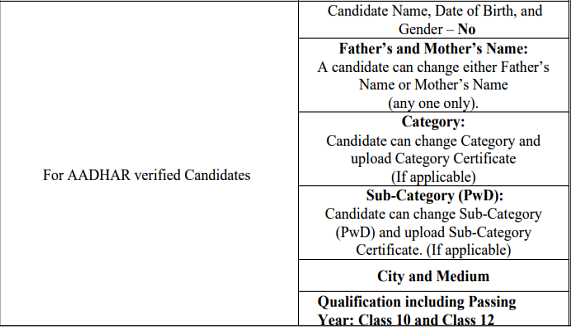
- For Aadhar not verified candidates, the following details have to be kept in mind before making NEET application form corrections:
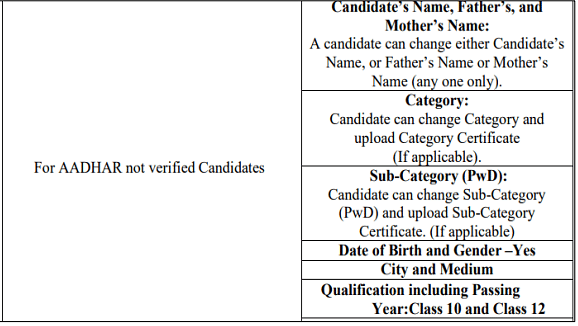
NEET Correction Window 2023: How to Edit NEET 2023 Application Form?
Applicants often end up making mistakes in their NEET 2023 Application Form either due to inexperience, confusion, or hurry. Therefore, to ensure zero discrepancy in NEET application form, NTA provides NEET form correction facility to edit the submitted NEET UG forms. NEET Form Correction is a one time facility, i.e the edited form once submitted cannot be edited again. Read the article to get the detailed procedure to edit/ correct NEET UG 2023 application form
Steps for NEET 2023 Form Correction
Provided below are the steps for NTA NEET 2023 application form correction:
- Step 1: Click on the direct link given on this page to visit the official website of NEET UG 2023- neet.nta.nic.in.
- Step 2: Enter your NEET UG application number, password, and security pin as mentioned on the login page.
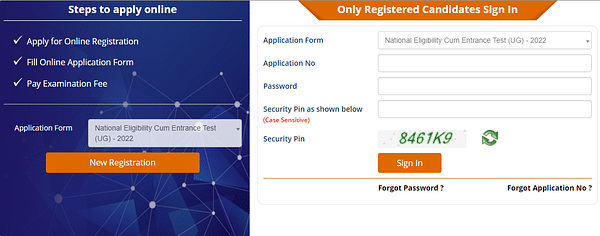
- Step 3: Now, you can correct/ edit the details in NEET form like gender, category, sub-category, language medium, and other details as allowed per the official NTA notification.
- Step 4: Click on the preview option to cross-verify all the modified details that will be displayed in red colour. To proceed further, enter the OTP received on your registered email/ mobile number.
- Step 5: Click on the final submit button. A pop-up window will appear stating ‘NEET Form Correction is a one-time facility and no changes will be permitted after final permission. Do you wish to submit the corrected NEET form?’. Click on the ‘Yes, Please Do’ option.
- Step 6: After successful submission of NEET application form, a self-generated correction slip will be issued. Students are advised to print the receipt and retain it for future reference.
FAQ’s
Ques. Is NEET form correction window open now?
Ans. NEET Application Form Correction is opened for 3 days to make corrections in the permitted fields.
Ques. Can I correct my category in NEET form?
Ans. Yes, NTA has opened NEET correction window to allow editing of some particulars including the category mentioned during NEET application process 2023. Candidates can edit either their category or re-upload the category certificate. It must be noted that NEET UG application fee is different for each category. So, you will have to pay the difference in the fee in case the changed category has a higher fee.
| Category | Application Fees |
|---|---|
| General (GN) | INR 1700 |
| General – EWS & OBC | INR 1600 |
| SC/ ST/ PwD | INR 950 |
Ques. How can I correct my NEET 2023 application form after submission?
Ans. After submission, NEET 2023 Application Form can only be edited during the correction window. To exercise this option, you need to visit the official NTA website for NEET 2023, i.e. neet.nta.nic.in, login using the application number and password, make the required corrections, and finally submit the NEET form.
Ques. What cannot be changed in NEET form correction?
Ans. During NEET form correction, you can edit most of the particulars filled in the application form like category, medium of exam, exam city preferences, PwD status, marks in the qualifying exam, and state code of eligibility. However, you cannot make corrections in your registered mobile number, email id, permanent address, and present address. So, make sure to enter these particulars with utmost care while filling NEET application form 2023.
Ques. Can NEET form be rejected after the confirmation page?
Ans. NEET Application Form can be rejected if any of the particulars entered by you are found to be incorrect even after the closure of NEET form correction window. Make sure to make corrections in NEET form during the correction window, if applicable. After the correction facility closes, no requests to make any changes in NEET form will be entertained.
Ques. I have not received any mail from NTA regarding discrepancy in my NEET Application Form. Does it mean there are no errors in my application?
Ans. In most cases, NTA sends an email or SMS only for the discrepancy in the uploaded images of photograph and signature. In case you do not receive any email/ SMS from NTA regarding NEET form correction, you must still login on NTA NEET website and cross-verify all the editable details for correctness. If you find a discrepancy in any field, then correct the same through NEET Form Correction 2023 facility. You must note that NEET UG form correction is available to all registered candidates irrespective of NTA sending an email or not.
What can be edited during NEET 2023 Application Form Correction Window?
The form correction facility is just a one-time facility so you need to be very careful while making the corrections. Here we are providing you with the list of details that you can make changes in your application form:
| Particulars | Who can edit | Who cannot edit |
|---|---|---|
| Candidate’s Name | Candidates not verified by Aadhar can change their name. However, if one changes the name, then he/she can neither change his/her parent’s name nor the uploaded photograph and signature. | Aadhar verified candidates cannot change the name. |
| Identification Identity | All the candidates who have filled up NEET Application Form with IDs other than Aadhaar Card (i.e. voter id, passport, bank account, driving license etc.) and Registration Number issued by facilitation center. | Candidates who have already filled up their NEET Application Form with Aadhaar Card and candidates with nationality as Foreign, OCI, PIO and NRI. |
| Date of Birth | All the candidates who have filled up NEET Application Form with IDs other than Aadhaar Card (i.e. voter id, passport, bank account, driving license etc.) and Registration Number issued by facilitation center. | Candidates who have filled up their NEET Application Form with Aadhaar Card verified date of birth. In case it is Not Verified, then it can be edited. |
| Gender | All the candidates who have filled up NEET Application Form with IDs other than Aadhaar Card and Registration Number issued by facilitation center. | Candidates who have filled up their NEET Application Form with Aadhaar Card. In case it is Not Verified, then you can edit this field. |
| State Code of Eligibility | Candidates belonging to the states of Andhra Pradesh, Telangana and Jammu & Kashmir can also change the status of Self Declaration submitted by them. Candidates belonging to the states of Assam, Meghalaya and Jammu & Kashmir will be able to change their state code of eligibility if and only if they have obtained their Aadhaar Number. | – |
| Category | Candidates can change either the category or re-upload the category certificate but not both. If change in category involves higher fee, the candidates will pay the difference of the fee. It is allowed as per the central list of categories. | Everyone can edit. |
| Disability Status | If change in disability status involves higher fee, the candidates will pay the difference of the fee. All candidates can change their disability status. | Everyone can edit. |
| Medium | Those candidates who have given Tripura either in state code of eligibility or of qualifying examination will be able change the Medium as Bengali. All candidates are allowed to make corrections in the question paper medium. | Everyone can edit. |
| Percentage of Marks obtained in Qualifying Examination | All candidates are allowed to make corrections in the marks that they previously scored. | Everyone can edit. |
| Name of Parents | Candidates are allowed to make corrections in either the father’s name or the mother’s name but not both. If candidates make correction in any parent’s name, they will not be allowed to re-upload the photograph and signature and vice versa. | All candidates can edit. |
After making corrections, candidates have to print correction slips and retain the same for reference and record. No correspondence will be made by NTA in this regard. Due to correction in category and disability status, if an additional fee is payable, the same has to be remitted through Debit/Credit Card or Net Banking during the given period only.
NEET Correction Window 2023: Can I Change the Exam City?
NTA has opened NEET form correction facility for all the fields of NEET application form, except for address, email and contact details. NTA allows the facility to change NEET exam city during NEET form correction 2023 as well. Hence, candidates must choose their exam city preferences very carefully while making corrections in NEET application form 2023. Last year also, the facility to change the exam city was provided by NTA given the hardships faced by candidates due to the critical COVID-19 situation in the country.
NEET Application Form Correction Window 2023: How to Edit Uploaded Images?
Candidates who have wrongly uploaded the images of photograph and signature are required to re-upload those documents during NEET Form Correction window. NTA will notify the applicants via SMS/ email to re-upload the incorrect images. Make sure to take care of the right specifications before re-uploading the scanned images of the photograph and signature.
Points to remember before re-uploading NEET photo and signature images
It is important to keep the below-mentioned points in mind before re-uploading NEET photo and signature images during NEET application form correction window:
- The photo to be uploaded should be recent and not older than 6 months.
- The photograph background should be white. Photos with a black/ dark background will not be accepted.
- Avoid uploading images with hats/ caps or any other accessories.
- Signature should be done on a white paper with a black pen.
- Do not sign in capital letters for uploading the image during NEET form correction 2023.
Size and Format Guidelines for Uploading Images
Candidates must be clear with the fact that the correction window is an opportunity for making changes to the form and that no further chance will be provided for the same. Therefore, they are advised to be very careful while making changes to the particulars and the scanned images. Take care of the below-mentioned size and format while uploading NEET documents.
| Document | Size | Format |
|---|---|---|
| Photograph | 10 to 200 kb | JPG/JPEG |
| Signature | 4 to 30 kb | JPG/JPEG |
| Post Card Size Photograph | 10 to 200 kb (4”X6”) | JPG/JPEG |
| Left and Right Hand Impressions | 10 to 200 kb | JPG/JPEG |
| Class X Passing Certificate | 50 to 300 kb | |
| Category Certificate | 50 to 300 kb | |
| PwD Certificate | 50 to 300 kb | |
| Citizenship Certificate | 50 to 300 kb | |
| Address Proof | 50 to 300 kb |
NEET Correction Window 2023: Important Instructions to Candidates
It is recommended to follow the below-mentioned important instructions for NEET application correction 2023:
- Correction in the category may invite additional fees to be paid. In such cases, applicants are required to pay the fees online using Internet Banking or credit/debit cards or PAYTM within the correction window schedule.
- No further opportunities would be given to candidates for making corrections. Therefore, candidates must edit the form details carefully and thoroughly check the details.
- Candidates are not allowed to make changes to the registered mobile number, permanent & correspondence address, and email ID.
- Candidates can edit their personal information such as Mother’s Name, Father’s Name, Category, Person with Disability, State Code of Eligibility.
What After NEET Application Form Correction Window 2023?
After the closure of NEET 2023 Application Form Correction window, NTA will announce NEET 2023 Admit Card release date. Only those candidates who have correctly filled in their NEET 2023 form will be able to download NEET hall ticket at neet.nta.nic.in. The admit card will contain the details of your NEET test center and exam reporting time for the exam date. It is highly recommended to utilize NEET form correction facility as no changes will be permitted after the release of the admit card.
NEET 2023 Application Form Correction Window FAQs
Ques. What is correction window in NEET?
Ans. NEET correction window is a facility provided by NTA to make edits in the wrong details entered in NEET application form. The correction window in NEET is the last opportunity for candidates to ensure that the details like qualifying marks, category, PwD status, and the photo & sign images provided by them are accurate.
Ques. When will NEET 2023 correction window open?
Ans. After NEET application form last date, NEET correction window has been opened for 3 days from April 8 to 10 to make changes in all the editable details.
Ques. What is the last date for correction of NEET application?
Ans. The last date for correction of NEET application has been announced by NTA to be April 10. NEET 2023 application correction window is opened on April 8, 2023. Candidates have to check the website to get the link for NEET 2023 form correction window.
Ques. Can I edit NEET 2023 application form twice?
Ans: No. NEET application correction window is a one-time opportunity. No second chances will be given to candidates for making corrections. Candidates are advised to edit the application form details carefully and within the time period provided by NTA.
Ques. Do I need to pay an additional fee during NEET 2023 correction window?
Ans: Generally there is no additional fee for editing the application form using NEET correction window 2023. However, for some changes in NEET application form, candidates may have to pay additional fees. In such cases, the applicants will be informed to pay the fees online using net banking/credit/debit cards/UPI/PayTM within the correction window dates.
Ques. Will NTA inform me regarding the errors in my NEET UG application form?
Ans. NTA will inform the candidates about the errors in the uploaded images of photo and signature in their NEET application form via email/ SMS on their registered email id/ mobile number. Such candidates then need to re-upload the correct images using NEET application form correction window 2023.
Ques. Can I change all the details filled in NEET application form using the correction window?
Ans: No, all the details entered in NEET application form cannot be edited during the correction window. Candidates can change only some specific details using NEET application form correction window like mother’s name, father’s name, gender, category, disability status, state code of eligibility, medium of NEET exam, passing marks in the qualifying exam. Details like name, email address, and registered mobile number will not be editable during NEET 2023 application form correction window.
Ques. Can I change the selected exam center using NTA NEET UG correction window?
Ans. During NEET application form correction window, candidates can change the exam city as well.
Ques. Can I change the documents uploaded by me using NEET 2023 application form correction window?
Ans. Yes, candidates can change or upload the documents as per the guidelines of NTA using NEET 2023 application correction window. The intimation for corrections in the uploaded documents is given by NTA via email/ SMS and the same is available on the candidate login at neet.nta.nic.in.
Ques. I have filled NEET application form with Aadhar Card. Can I change my gender during NEET correction window 2023?
Ans. No, if you have filled NEET application form with Aadhar Card as ID, then you cannot edit your gender during NEET correction window. This facility is available only for candidates who have applied with IDs other than the Aadhar card.
Ques. What is NTA NEET helpline number for queries related to NEET form correction 2023?
Ans. NTA NEET helpline number is 011-40759000 and the email id is neet@nta.ac.in. In case of any queries, candidates can contact NTA on the helpline number from 10:00 am to 5:00 pm or write an email.
Read Also :
NEET Application – Correction Window
NEET Study Material – Free Download PDF Notes
Neet Reservation For OBC-EWS-SC-ST-General
NEET Chemistry Chapter Wise Weightage
NEET Chapter Wise Weightage of Physics, Chemistry and Biology
NEET Chemistry Important Topic with Chapter Wise Weightage

Apply Now
Our Popular Courses
- Top Demanded
B.Tech Computer Science & Engineering
- ₹96000/- per Year
B.Tech Electronics & Communication Engineering
- ₹96000/- per year
B.Tech Electrical Engineering Course
- ₹96000/- per year
B.Tech Civil Engineering Course
- ₹80000/- Per Year
B.Tech Mechanical Engineering
- ₹60000/- Per Year
BMRIT – Bachelor of Medical Radiology
Top Examinations
NEET 2021 Question Papers
NEET 2021 Question Papers: Previous Year Papers help the students to examine at what level their preparation has reached so far for the exam they have been preparing for. NEET Exam is crucial for the students who want to pursue MBBS/BDS/BAMS/BSMS/BUMS/BHMS and other undergraduates (UG) medical courses to grab a seat in the best university or medical colleges, one must qualify for the exam with bright marks. As NEET 2022 Exam is going to be held on 17th July 2022 and the medical students must have begun with their preparation for the same. If you are one of those, then you should not neglect practicing the previous year’s papers, especially NEET 2021 Question Paper as this would be the marking step for boosting your confidence and preparation to perform well in the exam.
NEET 2021 Question Paper PDF
NEET 2021 Question Paper was set as per the pattern set for NEET Exam. Each NEET 2021 Question Paper PDF consists of 200 multiple-choice questions from Physics, Chemistry and Biology (Botany and Zoology) subjects. There would be 2 sections of 35 questions and 15 questions respectively. The time duration of solving the NEET Exam in the real examination hall is 3 hours, therefore while practicing with NEET 2021 Question Papers, the students must set the alarm for 3 hours and analyze their level of preparation for the upcoming NEET UG Exam. In this article, we have provided NEET 2021 Question Paper PDFs for all sets for the students who have been studying day and night to get admission to medical courses.
Language of Medium for NEET 2021 Question Papers
To make it easier for students from every state, the question paper of NEET is asked in 11 different languages. Two out of them are national languages, whereas the rest are regional. The languages are as follows:
|
|
NEET 2021 Question Paper
All the test booklets of NEET 2021 Question Paper Codes have been enlisted in the below table. The students are advised to download each NEET 2021 Question Paper PDF to practice efficiently with the questions asked.
NEET UG 2021 Question Paper in English
NEET 2022 Question Paper PDFs- Click to Download
NEET UG 2021 Question Paper in Hindi
|
NEET UG 2021 Question Paper Set |
NEET UG 2021 Question Paper PDF in Hindi |
NEET UG 2021 Answer Key |
|
Hindi Set M |
||
|
Hindi Set N |
||
|
Hindi Set O |
||
|
Hindi Set P |
NEET UG 2021 Question Paper in Urdu
|
NEET UG 2021 Question Paper Set |
NEET UG 2021 Question Paper PDF in Urdu |
NEET UG 2021 Answer Key |
|
Urdu Set M |
||
|
Urdu Set N |
||
|
Urdu Set O |
||
|
Urdu Set P |
NEET UG 2021 Question Paper in Telugu
|
NEET UG 2021 Question Paper Set |
NEET UG 2021 Question Paper PDF in Telugu |
NEET UG 2021 Answer Key |
|
Telugu Set M |
||
|
Telugu Set N |
||
|
Telugu Set O |
||
|
Telugu Set P |
NEET UG 2021 Question Paper in Tamil
|
NEET UG 2021 Question Paper Set |
NEET UG 2021 Question Paper PDF in Tamil |
NEET UG 2021 Answer Key |
|
Tamil Set M |
||
|
Tamil Set N |
||
|
Tamil Set O |
||
|
Tamil Set P |
NEET UG 2021 Question Paper in Punjabi
|
NEET UG 2021 Question Paper Set |
NEET UG 2021 Question Paper PDF in Punjabi |
NEET UG 2021 Answer Key |
|
Punjabi Set M |
||
|
Punjabi Set N |
||
|
Punjabi Set O |
||
|
Punjabi Set P |
NEET UG 2021 Question Paper in Odia
|
NEET UG 2021 Question Paper Set |
NEET UG 2021 Question Paper PDF in Odia |
NEET UG 2021 Answer Key |
|
Odia Set M |
||
|
Odia Set N |
||
|
Odia Set O |
||
|
Odia Set P |
NEET UG 2021 Question Paper in Malayalam
|
NEET UG 2021 Question Paper Set |
NEET UG 2021 Question Paper PDF in Malayalam |
NEET UG 2021 Answer Key |
|
Malayalam Set M |
||
|
Malayalam Set N |
||
|
Malayalam Set O |
||
|
Malayalam Set P |
P6 |
NEET UG 2021 Question Paper in Marathi
|
NEET UG 2021 Question Paper Set |
NEET UG 2021 Question Paper PDF in Marathi |
NEET UG 2021 Answer Key |
|
Marathi Set M |
||
|
Marathi Set N |
||
|
Marathi Set O |
||
|
Marathi Set P |
NEET UG 2021 Question Paper in Kannada
|
NEET UG 2021 Question Paper Set |
NEET UG 2021 Question Paper PDF in Kannada |
NEET UG 2021 Answer Key |
|
Kannada Set M |
||
|
Kannada Set N |
||
|
Kannada Set O |
||
|
Kannada Set P |
NEET UG 2021 Question Paper in Assamese
|
NEET UG 2021 Question Paper Set |
NEET UG 2021 Question Paper PDF in Assamese |
NEET UG 2021 Answer Key |
|
Assamese Set M |
||
|
Assamese Set N |
||
|
Assamese Set O |
||
|
Assamese Set P |
NEET UG 2021 Question Paper in Gujarati
|
NEET UG 2021 Question Paper Set |
NEET UG 2021 Question Paper PDF in Gujarati |
NEET UG 2021 Answer Key |
|
Gujarati Set M |
||
|
Gujarati Set N |
||
|
Gujarati Set O |
||
|
Gujarati Set P |
NEET UG 2021 Question Paper in Bengali
|
NEET UG 2021 Question Paper Set |
NEET UG 2021 Question Paper PDF in Bengali |
NEET UG 2021 Answer Key |
|
Bengali Set M |
||
|
Bengali Set N |
||
|
Bengali Set O |
||
|
Bengali Set P |
Why Solve NEET Question Paper 2021?
- Helps you understand the exam pattern
- Helps you get well acquainted with the syllabus
- Helps you analyze your preparation strategy
- Through this, you will get to know the important topics in NEET
- Helps you understand the requirements for preparation.
Difficulty Level of NEET 2021
Basis the expert analysis, here is the difficulty level of NEET 2021 –
There was a slight change in the NEET 2021 question paper structure and exam pattern. Physics, Chemistry, and Biology had two sections, Section A and Section B. While Section A consisted of 35 questions, Section B had 15 questions out of which candidates had to attend only 10. The NEET 2021 question paper structure is as follows:
|
SECTION ” A “ |
||
|
Subject |
Number of Questions |
Marks |
|
Physics |
35 |
140 |
|
Chemistry |
35 |
140 |
|
Botany |
35 |
140 |
|
Zoology |
35 |
140 |
|
|
||
|
SECTION “B” |
||
|
Subject |
Number of Questions |
Marks |
|
Physics |
15 |
40 |
|
Chemistry |
15 |
40 |
|
Botany |
15 |
40 |
|
Zoology |
15 |
40 |
Language of Medium for NEET 2021 Question Papers
To make it easier for students from every state, the question paper of NEET is asked in 11 different languages. Two out of them are national languages, whereas the rest are regional. The languages are as follows:
NEET 2021 Question Paper Analysis
- According to the experts, the NEET 2021 question paper is somewhere between easy to moderate level.
- It was NCERT-centric, so the students who are well versed with NCERT can score above average.
- The chemistry and biology sections were between easy to moderate, while the physics was challenging.
- However, the students felt like the paper was a bit lengthy.
Check NEET 2022 Paper Analysis
NEET 2021 Question Paper Analysis: Physics Section
- The physics section was between moderate to difficult on the difficulty meter.
- The topic that dominated NEET 2021 was Mechanics. There were around 13 questions on this topic.
- Also, there were tricky questions mainly from topics like optics, semiconductors, and the photoelectric effect.
The physics section question breakup has been mentioned in the table below:
| Physics Topics | Number of Questions |
|---|---|
| Modern Physics & Electronics | 8 |
| Magnetism | 7 |
| SHM & Wave | 3 |
| Optics | 4 |
| Electrostatics & Electricity | 11 |
| Heat & Thermodynamics | 4 |
| Mechanics | 13 |
NEET 2021 Question Paper Analysis: Chemistry Section
- The chemistry section was between easy to moderate on the difficulty meter.
- Most questions appeared from the NCERT facts, figures, and tables.
- There were a good number of numerical-based questions. Most questions were statement-based.
- Overall the section was easy and may not be considered as lengthy.
The chemistry section breakup has been mentioned in the table below:
| Chemistry Section | Number of Questions |
|---|---|
| Inorganic Chemistry | 19 |
| Organic Chemistry | 15 |
| Physical Chemistry | 16 |
NEET 2021 Question Paper Analysis: Biology Section
- The botany section was easy to moderate, whereas the zoology section was moderate.
- The questions were tricky in both the botany and zoology sections, but those who have a good understanding of the basics would have answered them.
- In Zoology, the dominating topic was biotechnology with around 11- 12 questions from this section.
- It was also NCERT-based, so was overall interesting.
FAQ’s
Q1. Was NEET 2021 Question Paper Tough?
A. According to the majority of exam takers, the NEET 2021 question paper was easy to moderate. Students found the Physics portion to be the toughest.
Q2. How many applicants appeared for NEET 2021?
A. There was around 16.14 lakh registration done for NEET 2021, which was more than the last year’s registration. Among them, about 95% of the registered students appeared for the exam.
Q3. In how many languages is the NEET 2021 question paper available.
A. The NEET 2021 question paper is available in 13 languages. But there are selected sets available in the regional languages.
Q4. Which section was the toughest in NEET 2021?
A. The NEET 2021 paper was easy to moderate, but the physics sections were a bit challenging for candidates.
Q5. Where can I find the NEET 2021 question paper of all sets?
A. Candidate can download the question papers from NTA official website or from this article.

Apply Now
Our Popular Courses
- Top Demanded
B.Tech Computer Science & Engineering
- ₹96000/- per Year
B.Tech Electronics & Communication Engineering
- ₹96000/- per year
B.Tech Electrical Engineering Course
- ₹96000/- per year
B.Tech Civil Engineering Course
- ₹80000/- Per Year
B.Tech Mechanical Engineering
- ₹60000/- Per Year
BMRIT – Bachelor of Medical Radiology
Netter’s Atlas of Human Anatomy All Editions
Netter-s Atlas of Human Anatomy EDITION - 1
Netter-s Atlas of Human Anatomy EDITION - 2
Netter-s Atlas of Human Anatomy EDITION - 3
Netter-s Atlas of Human Anatomy EDITION - 4
Netter-s Atlas of Human Anatomy EDITION - 5
Netter-s Atlas of Human Anatomy EDITION - 6
Netter-s Atlas of Human Anatomy EDITION - 7
All You Need to Know
Need Support?
If Student want to more information and support mail us at info@shikshaview.com
Check Blogs
You can our blogs at https://blog.shikshaview.com/
Ask in Comments
If require some book references, links, download , notes, lectures then leave a comment in this section
Ayurveda – BAMS AYUSH Seat Matrix – Ayush Admissions Central Counseling Committee (AACCC)
AIQ (All India Quota) seats of Government / Government Aided / CU-NI (Central Universities – National Institute) / Deemed Universities / Private Ayurveda Institutes – Ayurveda (BAMS)
| 2023 – 24 | 2022-23 | 2021 – 22 | 2020 – 2021 | 2019 – 20 |
Read Also :
NEET Study Material – Free Download PDF Notes
NEET NEET Eligibility Criteria
NEET Reservation For OBC-EWS-SC-ST-General
NEET Chemistry Chapter Wise Weightage
NEET Chapter Wise Weightage of Physics, Chemistry and Biology
NEET Chemistry Important Topic with Chapter Wise Weightage

Apply Now
Our Popular Courses
- Top Demanded
B.Tech Computer Science & Engineering
- ₹96000/- per Year
B.Tech Electronics & Communication Engineering
- ₹96000/- per year
B.Tech Electrical Engineering Course
- ₹96000/- per year
B.Tech Civil Engineering Course
- ₹80000/- Per Year
B.Tech Mechanical Engineering
- ₹60000/- Per Year
BMRIT – Bachelor of Medical Radiology
Unani – BUMS AYUSH Seat Matrix – Ayush Admissions Central Counseling Committee (AACCC)
AIQ (All India Quota) seats of Government / Government Aided / CU-NI (Central Universities – National Institute) / Deemed Universities / Private Unani Institutes – Unani ( BUMS )
| 2023 – 24 | 2022-23 | 2021 – 22 | 2020 – 2021 | 2019 – 20 |
Read Also :
NEET Study Material – Free Download PDF Notes
NEET NEET Eligibility Criteria
NEET Reservation For OBC-EWS-SC-ST-General
NEET Chemistry Chapter Wise Weightage
NEET Chapter Wise Weightage of Physics, Chemistry and Biology
NEET Chemistry Important Topic with Chapter Wise Weightage

Apply Now
Our Popular Courses
- Top Demanded
B.Tech Computer Science & Engineering
- ₹96000/- per Year
B.Tech Electronics & Communication Engineering
- ₹96000/- per year
B.Tech Electrical Engineering Course
- ₹96000/- per year
B.Tech Civil Engineering Course
- ₹80000/- Per Year
B.Tech Mechanical Engineering
- ₹60000/- Per Year
BMRIT – Bachelor of Medical Radiology
Homeopathic – BHMS AYUSH Seat Matrix – Ayush Admissions Central Counseling Committee (AACCC)
AIQ (All India Quota) seats of Government / Government Aided / CU-NI (Central Universities – National Institute) / Deemed Universities / Private Unani Institutes – Homeopathic ( BHMS )
| 2023 – 24 | 2022-23 | 2021 – 22 | 2020 – 2021 | 2019 – 20 |
Read Also :
NEET Study Material – Free Download PDF Notes
NEET NEET Eligibility Criteria
NEET Reservation For OBC-EWS-SC-ST-General
NEET Chemistry Chapter Wise Weightage
NEET Chapter Wise Weightage of Physics, Chemistry and Biology
NEET Chemistry Important Topic with Chapter Wise Weightage

Apply Now
Our Popular Courses
- Top Demanded
B.Tech Computer Science & Engineering
- ₹96000/- per Year
B.Tech Electronics & Communication Engineering
- ₹96000/- per year
B.Tech Electrical Engineering Course
- ₹96000/- per year
B.Tech Civil Engineering Course
- ₹80000/- Per Year
B.Tech Mechanical Engineering
- ₹60000/- Per Year
BMRIT – Bachelor of Medical Radiology
NURSING ENTRANCE EXAMINATION LIST
| EXAM – 2023 | EXAM – 2022 | EXAM – 2021 | EXAM – 2020 |
| B.Sc Nursing Exam – 2023 | B.Sc Nursing Exam – 2022 | B.Sc Nursing Exam – 2021 | B.Sc Nursing UG – 2020 |
| M.Sc Nursing Exam – 2023 | M.Sc Nursing Exam – 2022 | M.Sc Nursing Exam – 2021 | M.Sc Nursing Exam – 2020 |
| GNM Exam – 2023 | GNM Exam – 2022 | GNM Exam – 2021 | GNM Exam – 2020 |
| PBSc Exam – 2023 | PBSc Exam – 2022 | PBSc Exam – 2021 | PBSc Exam – 2020 |

Joint Entrance Examination (JEE) MAIN & Advance
| EXAM – 2023 | EXAM – 2022 | EXAM – 2021 | EXAM – 2020 |
|---|---|---|---|
| JEE (Main) – 2023 | JEE (Main) – 2022 | JEE (Main) – 2021 | JEE (Main) – 2020 |
| JEE (Advance) – 2023 | JEE (Advance) – 2022 | JEE (Advance) – 2021 | JEE (Advance) – 2020 |
Read Also :
TOP ENGINEERING COLLEGE IN INDIA

Graduate Aptitude Test in Engineering – GATE Exam
| EXAM – 2023 | EXAM – 2022 | EXAM – 2021 | EXAM – 2020 |
|---|---|---|---|
| GATE – 2023 | GATE – 2022 | GATE – 2021 | GATE – 2020 |
Read Also :
TOP ENGINEERING COLLEGE IN INDIA

UPSC Examination [Union Public Service Commission] – Civil Services Exam
| EXAM – 2023 | EXAM – 2022 | EXAM – 2021 | EXAM – 2020 |
|---|---|---|---|
| UPSC Exam – 2023 | UPSC Exam – 2022 | UPSC Exam – 2021 | UPSC Exam – 2020 |
Read Also :
TOP ENGINEERING COLLEGE IN INDIA
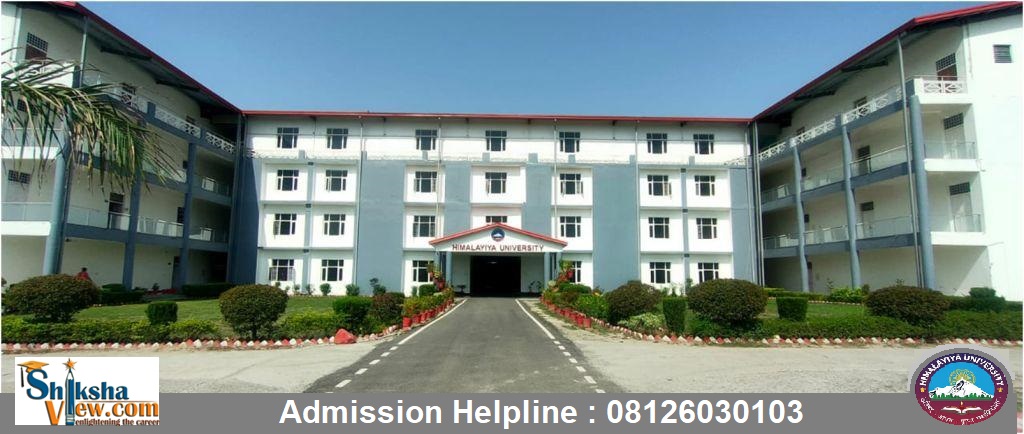 Himalayiya University, Dehradun is one of the best universities recognized by the All India Council for Technical Education (AICTE), New Delhi. Himalayiya University with its high principles of learning, well-built commercial & industry interface is a right platform for aspiring students
Himalayiya University, Dehradun is one of the best universities recognized by the All India Council for Technical Education (AICTE), New Delhi. Himalayiya University with its high principles of learning, well-built commercial & industry interface is a right platform for aspiring students
Top Ranked State University, Approved by UGC , MHRD, Govt. of India, AICTE, CCIM, MCI, INC, Uttarakhand State Nursing Council
Himalayiya University Highlights:
| Particulars | Statistics |
|---|---|
| Campus Location | Dehradun, Uttarakhand |
| Courses Offered | UG,PG and After 10th |
| No. of Seats | 84 |
| Median Salary | 4 lac CTC |
| Fees Range | INR 10,500-429,600 |
The Himalayiya University Focuses : –
- Enriching the academic experience by experimenting with new dimensions in teaching and learning activities.
- Developing leadership, and problem-solving excellence, among students.
- Strengthening relationships among learners and facilitators to develop an exceptional learning environment.
- Promoting Student-centred learning and constructing new feats for better future endeavour.
- Upholding the highest ethical standards to inculcate integrity and reliability in students.
- Promoting transparency in the work system.
Departments In Himalayiya University:
- Himalayiya College of Nursing
- School of Yogic Science & Naturopathy
- School of Acting & Performing Arts
- School of Art & Humanities
- School of Commerce
- School of Management Studies
- School of Paramedical & Health Sciences
- School of Computer Application
- School of Management Studies
- School of Journalism & Mass Communication

Apply Now
Read More>>
NEET 2023 answer keys or provisional NEET answer keys 2023 are expected to be released by NTA in the first week of June, approximately a month after the exam. After the release of the provisional answer key, candidates will be given an opportunity to submit challenges within the given date by paying a fee of INR 200. NTA will also release candidates’ OMR sheets along with the NEET provisional answer keys 2023 for challenge submission. NTA will also mail the answer key individually to all the aspirants on their registered email addresses. The NEET provisional answer key and NEET OMR Sheet 2023 will be shared before the final release. With the help of the NEET official answer keys, candidates can calculate their estimated scores. The NEET 2023 result is expected to be declared by the fourth week of June.
NEET 2023 exam was conducted on May 7, from 2 PM to 5.20 PM. As many as 20.24 lakh candidates out of 20.87 lakh applicants have appeared for NEET 2023, which is the highest number in the past few years. The answer keys of NEET 2023 for all codes have been released by the coaching institutes along with solutions. According to the NEET 2023 analysis and student reactions, the difficulty level of the exam was easy to moderate. Chemistry and Botany were tough whereas Physics and Zoology were of moderate difficulty level.
The NEET answer keys and solutions 2023 for different codes have been released by coaching institutes. The exam was conducted on May 7, from 2 PM to 5.20 PM. NEET 2023 question papers are named E, F, G and H. The official Candidates can check and download the NEET question papers and answer keys for 2023 and previous years here on this page

NEET 2023 Answer Key PDFs
The NEET 2023 answer key PDFs for each code and set will be provided as and when it is released after 5.20 PM.
NEET 2023 Answer Key Release Date
Take a look at the table below for the complete schedule of NEET 2023 exam
NEET Official Answer Key 2023 Release Date
NEET 2023 Official Answer Key date is provided below along with the other important events.
| Events | Release Date (Tentative) |
|---|---|
| NEET Official Answer Key 2023 Release Date | JUN 4, 2023 |
| NEET 2023 OMR Release Date | JUN 4, 2023 |
| NEET 2023 answer key and OMR Sheet challenge start date | JUN 4, 2023 |
| NEET 2023 answer key and OMR Sheet challenge last date | JUN 9, 2023 |
| NEET 2023 final answer key release date | June 2023 |
| NEET 2023 result date | June 2023 |
Read Also : NEET 2023 CHALLANGE ANSWER KEY
NEET Answer Key 2023 Download Link- NTA Official Website
Candidates just need to click on the link to download NEET UG answer key 2023 pdf provided by NTA on the official website. neet.nta.nic.in Answer Key 2023 download link will be provided below for your ease.
| NEET Answer Key 2023 PDF Download | Check Here |
Soon after the release of the NEET official answer key, NEET Question Paper for all paper codes and languages will be released at nta.ac.in.
NEET 2023 Official Answer Key PDF by NTA
To download the provisional NEET Answer Key 2023 and OMR Sheet, candidates have to login on the official website using their application number and DOB/ Password. The links to download NEET Official Answer Key 2023 PDF, OMR sheet and recorded responses will be provided here.
| NEET Paper Code | NEET Answer Key 2023 PDF |
|---|---|
| E1, E2, E3, E4, E5, E6 |
|
| F1, F2, F3, F4, F5, F6 | |
| G1, G2, G3, G4, G5, G6 | |
| H1, H2, H3, H4, H5, H6 |
NEET 2023 Question Papers, Answer Keys and Solutions
The NEET 2023 question paper was divided into four sets or series which had six subsets each. The question paper sets were E, F, G and H. The unofficial answer keys are released by the coaching institutes like Allen, Resonance, etc. Candidates can download the NEET 2023 question paper set-wise answer keys and solutions from the below table.
| NEET 2023 QUESTION PAPER SET |
NEET 2023 ANSWER KEYS (by Institutes) |
|||||
| Aakash Institute | Allen Kota | Resonance | Brilliant Study Center | Rao IIT Academy | Pathfinder | |
| Set E | E1 , E2 , E3 , E4 , E5 , E6 | E1 To E6 | E1 | |||
| Set F | F1 , F2 , F3 , F4 , F5 , F6 | F1 To F6 | F1 , F6 | |||
| Set G | G1 , G2 , G3 , G4 , G5 , G6 | G1 To G6 | G5 | G2 | ||
| Set H | H1 , H2 , H3 , H4 , H5 , H6 | H1 To H6 | H6 | |||
The qualifying cut off percentile is 50 for GN/ EWS category and 40 for OBC/ SC/ ST category.
How to Check NEET Answer Key 2023?
Aspirants can download NEET answer key along with the question papers by following the steps given below:
- Visit the official website of NTA- neet.nta.nic.in.
- Click on the link to download/ challenge NEET UG Answer Key, Scanned Image of OMR Answer Sheet and Recorded Responses
- Login using NEET Application number and either DOB or password.
- Choose the question paper code and download NEET Answer Key PDF 2023
- Use the answer key to calculate your score.
NEET Answer Key 2023 Bonus Marks
Candidates must note the following important points for NEET answer key 2023 bonus marks and score calculation:
- If 2 options are found correct, candidates who marked any of those 2 options will get 4 marks.
- If all the four options are found correct, all candidates who attempted the question will get 4 marks.
- If none of the options is found correct, all candidates will get 4 marks irrespective of whether they attempted the question or not.
- Similarly, if a question is incorrect or is dropped, all candidates will get 4 marks.
NEET Official Answer Sheet 2023 Sample
Given below is NEET Answer Sheet Sample for your reference. NEET Answer Key is released separately for each paper code.
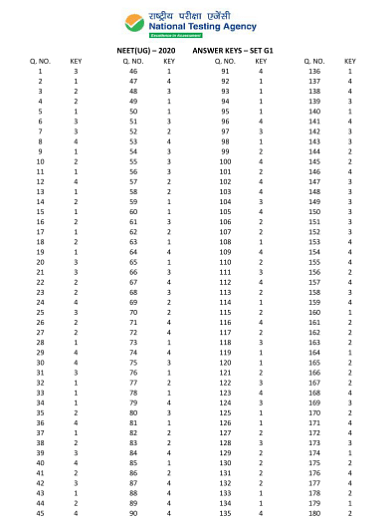
NEET Answer Key 2023: How to Challenge?
If a candidate finds any error in the provisional NEET official answer key, then he/she can challenge the same by paying the required fees of INR 200. Candidates must note that the fee paid to challenge the official answer key is not refundable. No individual candidate will be informed about the acceptance/non-acceptance of his/her challenge.
Steps to Challenge NEET Answer Key 2023
To challenge NEET Answer Key, candidates need to follow the steps given below:
- Click on the link provided on the NTA NEET website or the direct link provided in the article.
- Login using your NEET login credentials, i.e., application number and date of birth.
- Click on the ‘Answer Key Challenge’ tab and select the ‘Test Booklet Code’ that you want to challenge for NEET UG answer key.
- Choose the question that you want to raise objections against.
- Select the correct answer as per you. Provide the alternative to the given option from the dropdown options.
- While submitting the objections, add a justification or upload a document proving that the challenge to NEET Answer Key is correct.
- Click on the ‘Save my claim’ button. Now you will be taken to another screen showing all the claims made by you.
- Click on “Save my claim and finally pay fees” to pay the NEET 2023 answer key challenge fee via debit/ credit card/ net banking.
- Download the answer key challenge receipt.
NEET Answer Key Challenge Fees
| Particulars | Details |
|---|---|
| Amount to be paid |
INR 200/- per answer challenged |
| Mode of payment | Through Debit/Credit Card or Internet Banking |
| Refund | The fee is non-refundable |
NEET OMR Sheet 2023: How to Raise Objections?
NTA has released the images of candidates’ OMR Sheets and recorded responses online on the official website- neet.nta.nic.in. Candidates must check their NEET OMR sheets carefully and calculate their score by matching the same with the official answer keys of NEET 2023. Candidates must note the following points regarding NEET OMR Sheet challenge:
- No challenge will be entertained without receipt of the processing fee online.
- Subject Matter Experts will verify the objections and if found correct, the answer key will be revised accordingly.
- The key finalized by the experts after the challenge will be final.
- Based on the revised final NEET Answer Keys, the result will be prepared and declared.
NEET OMR Sheet PDF Download Link 2023
NEET OMR Sheet PDF download 2023 link will be available on candidate login at neet.nta.nic.in. NTA will also send a scanned copy of the NEET OMR Sheet on the registered email id of the candidates.
| Direct Link to View/ Challenge NEET OMR Sheet 2023- (To be Updated) |
Steps to Challenge NEET 2023 OMR Sheet
- Click on the link for ‘Provisional Answer Key, OMR Answer Sheet and Recorded Responses Challenge’ on the official NTA NEET website or the direct link provided in the article.
- Login using NEET application number and date of birth.
- 2 options will be visible in the new window: “Click here to View your OMR Sheet” and “Click here to Challenge OMR Sheet”
- Click on the 2nd option and select the response you wish to challenge.
- Pay the required NEET OMR challenge fee of INR 200.
NEET OMR Response Sheet Challenge Fees
| Particulars | Details |
|---|---|
| Amount to be paid while challenging against recorded responses obtained from OMR sheet |
INR 200/- for each question |
| Mode of payment | Through Debit/Credit card or internet banking |
| Refund | The fees is non-refundable |
neet.nta.nic.in Official Response Sheet
Provided below is neet.nta.nic.in official OMR response sheet image for your reference.
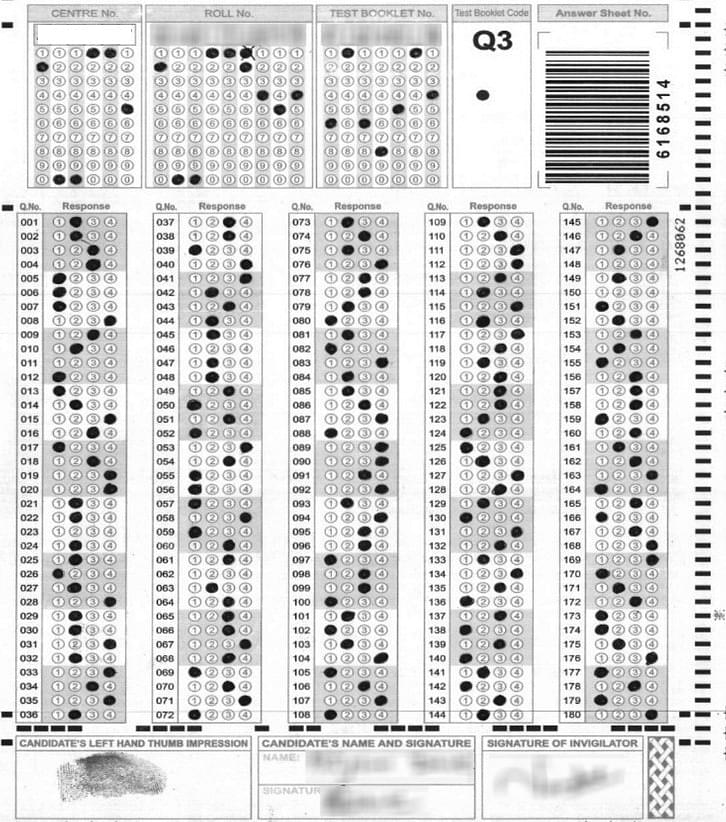
How to Calculate NEET Score using NEET Answer Key and OMR Sheet?
Once the candidates download the official NEET Answer Key and OMR Sheet from the NTA website, they can calculate the marks scored in NEET 2022 exam. Candidates must first be aware of NEET UG 2023 marking scheme and then follow the below-mentioned steps to calculate score using NEET Answer Key and OMR Sheet:
- Candidates must first download download NEET Answer Key and NEET OMR Sheet PDFs.
- Ensure that the PDFs downloaded by you are in the correct language and question paper set.
- Tally the answers marked by in the OMR Sheet with the correct answers provided in NTA NEET Answer Key 2023.
- After checking the answer key, note down the number of correct and incorrect answers marked in the paper.
- Follow NEET 2023 Marking Scheme and use the below-mantioned formula to calculate NEET score:
[NEET Score = (Number of correct responses*4) – (Number of correct responses*1)]
| Answer Type | Score |
|---|---|
| Correct Response/Answer | +4 Marks |
| Incorrect Response/Answer | -1 Mark |
| Unanswered | 0 |
After calculating NEET scores using the official answer keys, you can check out the NEET Cut off and use NEET 2023 College Predictor to get an idea about the colleges you are likely to be allotted seats.
Importance of NEET Answer Key 2023 by NTA
NEET Answer Key 2023 by NTA will be released containing the correct answers to all the questions asked in NEET 2023 exam. The official notice announcing the release of NEET Answer Key by NTA will be provided below. As per the updates available at neet.nta.nic.in, NEET Answer Key and OMR Sheet release date will be updated here for your convenience.
- NEET Answer Key has all the correct responses which you can compare with your NEET OMR sheet or response sheet.
- You can also raise an objection against the answer key released by NTA if you think your answer is correct but has been marked incorrect.
- With the help of NEET answer key, you can calculate a rough score according to the marking scheme of NEET.
- If a candidate has an idea about the score then you easily create a list of colleges that you can target for admission during the time of counselling.
NEET Question Paper Sets
In 2023, there will be 24 sets of the question paper- code E/F/G/H 1, 2, 3, 4, 5, 6.
- The number of answer keys released by NTA are equal to the number of NEET question papers.
- Candidates are advised to check the Question Papers for NEET to get an idea of the paper pattern.
ntaresults.nic.in Result 2023
Soon after the release of NEET Answer Key 2023, NTA will release NEET Result. NTA NEET Result 2023 will be available online on the official website- neet.nta.nic.in or ntaresults.nic.in result 2023 link. Candidates will not be sent scorecards via post.
NEET Result 2023 Tentative Date and Time
| Event | Date |
|---|---|
| NEET Result 2023 Date | June 2023 |
| NEET Result 2023 Time | 11:00 AM onwards |
| NEET 2023 Scorecard | June 2023 |
How to check NEET Result 2023?
Candidates often look for how to check NEET result 2023. To answer all your queries, the step-wise procedure to check NEET result 2023 is provided here:
- Visit any of the official websites for NEET- ntaresults.nic.in or neet.nta.nic.in.
- Click on the link for ‘NEET UG 2023 Result Cum Scorecard’ to open the login window.
- Enter your application number, date of birth, and the security pin.
- Your NEET Result PDF will be visible on the screen.
- Download and save for all future correspondence.
Expected Cut off of NEET 2023
Along with the result of the exam, NTA will also release the qualifying NEET Cut off score. NEET 2023 Cut off percentile will remain the same as last year- 50, 45, and 40 for GN/EWS, GN-PwD, and SC/ST/OBC respectively. Given below is the expected cut off of NEET 2023 based on expert analysis previous year cut off trends:
| Category | Cut off Percentile | Qualifying Marks |
|---|---|---|
| General | 50 | 720-130 |
| OBC | 40 | 129-104 |
| SC | 40 | 129-104 |
| ST | 40 | 129-104 |
| General- PwD | 45 | 129-115 |
| OBC- PwD | 40 | 114-95 |
| SC- PwD | 40 | 114-95 |
| ST- PwD | 40 | 114-95 |
NEET Merit List 2023
Based on the scores and rank obtained by candidates in NEET result, NTA will prepare NEET 2023 Merit List for 15% AIQ counselling. NEET Merit List for 15% All India Quota will be used by MCC to allot the MBBS/ BDS seats through NEET UG 2023 Counselling. For 85% State Quota Counselling, the respective state authorities will release their own state merit lists. Check NEET 2023 Counselling
FAQs Regarding NEET Answer Keys
Q: When will NTA release the official answer key for NEET 2023?
Q: Will NTA release NEET 2023 solutions along with answer keys?
Q: Where can I get NEET answer key from?
Q: How can I calculate the estimated score by utilizing the NEET answer keys?
+4 for each correct answer
-1 for each wrong answer
0 marks for unattempt questions
0 marks for extra attempted questions in Section B.
Q: Who reviews the objections received against the NEET answer keys?
Q: How can I file objections or challenges against NEET 2023 answer keys?
1. Visit the official website of NTA NEET
2. Login using the NEET 2023 application number and password
4. Click on Key challenge tab
5. Now select the test booklet code
6. Select the question number and click on Submit
7. Now select the answer that you think is correct and give a justification for it
8. Click on Confirm
9. Pay the objection filing fee online, through Credit/Debit Card, Net Banking, Paytm and UPI
10. Save the confirmation slip for future reference
The above procedure is that of last year. In case NTA changes the procedure, it will be updated here.
Q: Are the unofficial NEET answer keys by coaching institutes reliable?
Q: What is the last date to submit challenges against NEET 2023 answer keys?
Q: Will NTA release a final NEET 2023 answer key?
Q: What is the fee to submit objections against NEET answer keys?
Q: What will happen if the NEET 2023 answer key objections are confirmed to be valid?
Q: Will NTA refund the money of my NEET official answer key 2023 challenge is valid?
Read Also :
NEET Application – Correction Window
NEET Study Material – Free Download PDF Notes
Neet Reservation For OBC-EWS-SC-ST-General
NEET Chemistry Chapter Wise Weightage
NEET Chapter Wise Weightage of Physics, Chemistry and Biology
NEET Chemistry Important Topic with Chapter Wise Weightage

Apply Now
Our Popular Courses
- Top Demanded
B.Tech Computer Science & Engineering
- ₹96000/- per Year
B.Tech Electronics & Communication Engineering
- ₹96000/- per year
B.Tech Electrical Engineering Course
- ₹96000/- per year
B.Tech Civil Engineering Course
- ₹80000/- Per Year
B.Tech Mechanical Engineering
- ₹60000/- Per Year
BMRIT – Bachelor of Medical Radiology
Top Examinations
NEET 2023 analysis based on student reactions is now available. The exam was conducted on May 7. The exam has been conducted for a duration of 200 minutes or 3 hours and 20 minutes. The NEET analysis 2023 will be provided based on the student reactions and the experts from top coaching institutes. The details which will be provided on the NEET 2023 analysis are on the exam difficulty level, topic-wise weightage, coverage of syllabus, ratio of NEET 2023 syllabus coverage from Class 11 and Class 12, etc. The analysis of NEET 2023 also highlights the changes or surprise elements of the question paper.
The NEET 2023 exam centres were located 499 cities across India and abroad. The analysis of NEET 2023 states that the difficulty level was easier than that of last year. Chemistry subject was the toughest, followed by Physics and Biology. No section can be termed as entirely easy. As compared to last year, Physics was much easier. The NEET 2023 cutoff is expected to be higher than last year.
All the questions were asked from the NEET syllabus and the question topics were NCERT based. According to students, the weightage of the questions was more from Class 12 chapters and topics. The NEET 2023 analysis will help aspirants understand the difficulty level of the question paper and help predict the NEET 2023 cutoff.
| NEET 2023 Question Paper | NEET 2023 Answer Key |
Candidates can refer to NEET analysis to check the feedback of the students who appeared for the examination. They can also find the section-wise distribution of questions in the exam analysis of NEET. Many known institutions known for NEET coaching release the analysis of the question paper after the examination is conducted. Candidates can find a detailed NEET analysis of the question papers of the past three years here. Read on to know more.
NEET 2023 Analysis
According to the students and experts, the overall difficulty level of NEET 2023 has been termed as easy to moderate. Chemistry is considered as the toughest section followed by Biology. Unlike the last two years, Physics was the easiest section. More than 50 per cent of questions were from NCERT. Some were analytical in nature, which made the questions tough to crack. On the other hand, The Chemistry and Physics questions were not much calculation intensive and were formula-driven. According to the expert analysis, the questions were direct and the question types were assertion reason type questions, statement type questions, and matching types questions. As far as the distribution of questions in terms of Class 11 and Class 12 syllabus is concerned, majority of the questions were from Class 12. Only in the Biology section, more weightage was given on the Class 11 questions. Let us now take a look at the subject-wise NEET 2023 analysis.
NEET 2023 Analysis for Chemistry
The Chemistry section was the toughest among the three subjects. Majority of the questions were on Organic Chemistry, followed by Inorganic Chemistry and Physical Chemistry. 54 per cent of the questions were from Class 12 whereas 46 per cent were from Class 11. The topic-wise weightage for the Chemistry section is given in the table below.
| Unit & Topic | Number of Questions | Weightage of Questions |
|---|---|---|
| Organic Chemistry | 18 | 36% |
| Environmental Chemistry – Gaseous Air Pollutants | 1 | 2% |
| Aromatic Compound – Aromaticity | 2 | 4% |
| Reaction Mechanism – Solvent, Electrophile, Nucleophile and Leaving group ability | 3 | 6% |
| Biomolecule & Polymer – Carbohydrate: Monosaccharide, Disaccharide, Polysaccharide | 2 | 4% |
| Hydrocarbon Part I – Alkane | 1 | 2% |
| General Organic Chemistry – Inductive Effect | 1 | 2% |
| Chemistry in Everyday Life | 1 | 2% |
| Carboxylic acid and Derivatives – Preparation of Carbonyl Compounds | 3 | 6% |
| Grignard Reagent | 1 | 2% |
| IUPAC nomenclature – Fundamental of Organic Chemistry | 3 | 6% |
| Inorganic Chemistry | 17 | 34% |
| Chemical Bonding – Introduction to Bonding and Ionic bond | 4 | 8% |
| Metallurgy – ORES and method of concentration | 2 | 4% |
| Periodic Table – Development of Periodic Table, Period, Group and Block | 2 | 4% |
| S-Block Element – Electronic configuration and Physical Properties of alkali metals | 2 | 4% |
| P-Block Element (B and C) – Physical and chemical properties of Group 13th elements | 1 | 2% |
| Coordination Compound – General introduction of complex salts and definitions to be used | 2 | 4% |
| Hydrogen Compounds – Position of hydrogen in the periodic table; methods of preparation and properties | 1 | 2% |
| p-Block (Nitrogen and Oxygen) – Physical and Chemical properties of Group 15th elements | 1 | 2% |
| d-f Block Element – Electronic configuration, atomic and ionic size, density, melting and boiling points |
2 | 4% |
| Physical Chemistry | 15 | 30% |
| Chemical Equilibrium -Properties of Equilibrium, Law of mass action, Equilibrium constant and its properties, Factors affecting Equilibrium constant, Unit of KC and KP | 1 | 2% |
| Chemical Kinetics – Rate of reaction, Factors affecting rate of reaction | 2 | 4% |
| Electrochemistry – Basic Terminology, Construction of Electrochemical Cell and Its Representation |
2 | 4% |
| Gaseous State – Gas Laws (Boyle, Charles, Gaylussac, Avogadro’s Law, Ideal Gas Equation) |
1 | 2% |
| Mole Concept – Units, Atoms, Molecules, Atomic mass, Molecular mass, Gram atomic mass, Gram molecular mass, RAM, Average atomic mass | 1 | 2% |
| Solid State – Basics of Solid State | 2 | 4% |
| Surface Chemistry – Adsorption | 1 | 2% |
| Solution Colligative Properties – Concentration Terms | 1 | 2% |
| Atomic Structure – Cathode, Anode rays, Basic definitions and Rutherford atomic model |
2 | 4% |
| Redox Reaction – Calculation of oxidation number | 1 | 2% |
| Thermodynamics – Basic definition | 1 | 2% |
NEET 2023 Analysis for Physics
Physics was the easiest section among the three subjects. Almost all questions were formula/definition based and were easier than last year. The topic-wise weightage of the Physics section is given in the table below.
| Unit & Topic | Number of Questions | Weightage of Questions |
|---|---|---|
| Alternating Current – Average, peak and rms values | 3 | 6% |
| Capacitance – Definition of capacitance | 1 | 2% |
| Current Electricity – DefinItion of Current, Current Densities, Drift | 5 | 10% |
| Electro Magnetic Field – Magnet and Magnetic field due to a moving charge | 3 | 6% |
| Electro Magnetic Induction – Flux and Faraday’s laws of electromagnetic induction | 1 | 2% |
| Electrostatics – Properties of charge and Coulomb’s Law | 3 | 6% |
| Friction – Kinetic friction | 1 | 2% |
| Gravitation – Universal law of gravitation | 2 | 4% |
| Modern Physics – Photoelectric Effect | 5 | 10% |
| Rigid Body Dynamics – Kinematics | 5 | 10% |
| Surface Tension – Surface tension, Surface energy and capillary rise | 1 | 2% |
| Wave Optics – Principle of superposition, path difference, Wavefronts, and coherence | 1 | 2% |
| Projectile Motion – Definition, Projectile on a horizontal plane | 1 | 2% |
| Newton’s Law of Motion – Type of forces, newton’s third law, free body diagram | 1 | 2% |
| KTG and Thermodynamics – Kinetic Theory of gases | 2 | 4% |
| Solid and Semiconductor – Semiconductor, Energy Band | 3 | 6% |
| Measurement Error | 2 | 4% |
| Sound Wave – Equation of sound wave, wavelength, frequency, pressure and displacement amplitude | 1 | 2% |
| Geometric Optics – Plane Mirror | 3 | 6% |
| Electromagnetic Waves | 2 | 4% |
| Rectilinear Motion – Distance and Displacement | 2 | 4% |
| Fluid Mechanics – Measurement and calculation of pressure | 1 | 2% |
| Work, Power, Energy – Work Done By Constant Force | 2 | 4% |
| Elasticity and Viscosity – Elastic behaviour longitudinal stress, young modulus | 2 | 4% |
| Simple Harmonic Motion – Equation of SHM | 1 | 2% |
NEET 2023 Analysis for Biology
The difficulty level of the Biology subject was easy to moderate. According to the experts from Resonance, the maximum number of questions were NCERT-based and around 11 were analytical, which were tough. The following table brings the unit and topic-wise weightage for Botany and Zoology areas.
| Unit & Topic | Number of Questions | Weightage of Questions |
|---|---|---|
| Botany | 50 | 100% |
| Cell Biology – Introduction, Prokaryotic Cell | 5 | 10% |
| Ecology-Biodiversity and Conservation – Introduction, Level of biodiversity, Pattern of biodiversity, Loss of biodiversity | 2 | 4% |
| Plant Kingdom-Algae | 2 | 4% |
| Genetics I – Introduction, Mendelism, Monohybrid Cross, Dihybrid Cross, Back Cross, Test Cross, Incomplete Dominance, Codominance, Multiple Alleflism, Pleiotropy | 3 | 6% |
| Sexual Reproduction in Flowering Plants – Sexual Reproduction Introduction | 4 | 8% |
| Ecology-Ecosystem – Introduction, Biotic components of ecosystem | 2 | 4% |
| Anatomy of Flowering Plants – Plant Tissues, Tissue System | 3 | 6% |
| Application Biology (Biotechnology) – Principles of Biotechnology | 4 | 8% |
| Morphology of Flowering Plants – Root | 3 | 6% |
| Plant Physiology-II-Plant growth and Growth Hormones – Growth and Development | 3 | 6% |
| Plant Physiology-II-Photosynthesis In Higher Plants – Introduction (Early experiments), site of photosynthesis and photosynthetic pigments | 4 | 8% |
| Ecology-Environmental Issues – Types of pollutants, Types of pollution-Air pollution, Noise pollution, Acid rain, Ozone depletion, Water pollution |
1 | 2% |
| Genetics II – Nucleic Acids (The Generic Material, DNA, RNA) | 4 | 8% |
| Plant Physiology-I-Mineral Nutrition – Methods to study mineral requirements of plants, Essential mineral elements, Role of macro and micronutrients, deficiency symptoms of essential elements, Toxicity of micronutrients |
2 | 4% |
| Plant Physiology-I-Transport in plants – Diffusion, Facilitated diffusion, osmosis, Active transport, DPD, Water potential plasmolysis, imbibition |
3 | 6% |
| Biomolecule – I – Carbohydrates | 1 | 2% |
| Ecology-Organisms and Population – Introduction, Abiotic factors, Responses to abiotic factors | 2 | 4% |
| Plant Physiology-II-Respiration in plants – Introduction, Glycolysis and Fermentation | 1 | 2% |
| Biomolecule-II – Nucleic Acids | 1 | 2% |
| Zoology | 50 | 100% |
| Cell Biology – Introduction, Prokaryotic Cell | 4 | 8% |
| Genetics I – Introduction, Mendelism, Monohybrid Cross, Dihybrid Cross, Back Cross, Test Cross, Incomplete Dominance, Codominance, Multiple Alleflism, Pleiotropy | 2 | 4% |
| Application Biology – Principles of Biotechnology | 2 | 4% |
| Ecology-Environmental Issues – Types of pollutants, Types of pollution-Air pollution, Noise pollution, Acid rain, Ozone depletion, Water pollution |
1 | 2% |
| Genetic II – Nucleic Acids (The Generic Material, DNA, RNA) | 3 | 6% |
| Ecology-Organisms and Population – Introduction, Abiotic factors, Responses to abiotic factors | 2 | 4% |
| Biomolecule-II – Nucleic Acids | 1 | 2% |
| Body fluids and circulation – heart and conduction | 3 | 6% |
| Animal Kingdom-1 – Porifera | 4 | 8% |
| Human Reproduction and Reproductive Health – Male Reproductive System | 6 | 12% |
| Excretory Products and Their Elimination – Homeostasis and Osmoregulation | 1 | 2% |
| Neural Control and Coordination – Nervous Tissue | 2 | 4% |
| Digestion and Absorption – Nutrition | 2 | 4% |
| Structural organisation in animals – Connective tissue | 1 | 2% |
| Locomotion and Movement – Muscles | 2 | 4% |
| Biology In Human Welfare-Human Health and Disease – Diseases caused by virus | 3 | 6% |
| Breathing and Exchange of Gases – Respiratory Organ | 1 | 2% |
| Origin and Evolution – Origin of Life | 2 | 4% |
| Chemical Coordination and Integration -Endocrine Gland | 3 | 6% |
| Biology In Human Welfare – Microbes in Human Welfare | 1 | 2% |
| Structural Organisation in Animal – Epithelial tissue | 1 | 2% |
| Animal Kingdom-2 – Chordata | 2 | 4% |
| Biology In Human Welfare-Strategies for Enhancement of Food Production in Animal – | 1 | 2% |
Ratio of Syllabus Coverage for Class 11 and Class 12
| Subject | Class 11 Syllabus Weightage | Class 12 Syllabus Weightage |
|---|---|---|
| Physics | 40% | 60% |
| Chemistry | 46% | 54% |
| Biology | 53% | 47% |
NEET UG Answer Key :-
| NEET UG Answer Key – 2024 | NEET UG Answer Key – 2023 | NEET UG Answer Key – 2022 | NEET UG Answer Key – 2021 | NEET UG Answer Key – 2020 |
Read Also :
NEET Application – Correction Window
NEET Study Material – Free Download PDF Notes
Neet Reservation For OBC-EWS-SC-ST-General
NEET Chemistry Chapter Wise Weightage
NEET Chapter Wise Weightage of Physics, Chemistry and Biology
NEET Chemistry Important Topic with Chapter Wise Weightage

Apply Now
Our Popular Courses
- Top Demanded
B.Tech Computer Science & Engineering
- ₹96000/- per Year
B.Tech Electronics & Communication Engineering
- ₹96000/- per year
B.Tech Electrical Engineering Course
- ₹96000/- per year
B.Tech Civil Engineering Course
- ₹80000/- Per Year
B.Tech Mechanical Engineering
- ₹60000/- Per Year
BMRIT – Bachelor of Medical Radiology
Top Examinations
NEET UG Eligibility Criteria
| NEET UG Eligibility Criteria – 2023 | NEET UG Eligibility Criteria – 2022 | NEET UG Eligibility Criteria – 2021 | NEET UG Eligibility Criteria – 2020 |
Read Also :
NEET application process
NEET Application – Correction Window
NEET Study Material – Free Download PDF Notes
Neet Reservation For OBC-EWS-SC-ST-General
NEET Chemistry Chapter Wise Weightage
NEET Chapter Wise Weightage of Physics, Chemistry and Biology
NEET Chemistry Important Topic with Chapter Wise Weightage

Apply Now
Our Popular Courses
- Top Demanded
B.Tech Computer Science & Engineering
- ₹96000/- per Year
B.Tech Electronics & Communication Engineering
- ₹96000/- per year
B.Tech Electrical Engineering Course
- ₹96000/- per year
B.Tech Civil Engineering Course
- ₹80000/- Per Year
B.Tech Mechanical Engineering
- ₹60000/- Per Year
BMRIT – Bachelor of Medical Radiology
Top Examinations
NEET UG APPLICATION PROCESS
| NEET UG Application Process – 2023 | NEET UG Application Process – 2022 | NEET UG Application Process – 2021 | NEET UG Application Process – 2020 |
Read Also :
NEET Application – Correction Window
NEET Study Material – Free Download PDF Notes
Neet Reservation For OBC-EWS-SC-ST-General
NEET Chemistry Chapter Wise Weightage
NEET Chapter Wise Weightage of Physics, Chemistry and Biology
NEET Chemistry Important Topic with Chapter Wise Weightage

Apply Now
Our Popular Courses
- Top Demanded
B.Tech Computer Science & Engineering
- ₹96000/- per Year
B.Tech Electronics & Communication Engineering
- ₹96000/- per year
B.Tech Electrical Engineering Course
- ₹96000/- per year
B.Tech Civil Engineering Course
- ₹80000/- Per Year
B.Tech Mechanical Engineering
- ₹60000/- Per Year
BMRIT – Bachelor of Medical Radiology
Top Examinations
NEET Application – Correction Window
| NEET UG Application – Correction Window – 2023 | NEET UG Application – Correction Window – 2022 | NEET UG Application – Correction Window – 2021 | NEET UG Application – Correction Window – 2020 |
Read Also :
NEET Application – Correction Window
NEET Study Material – Free Download PDF Notes
Neet Reservation For OBC-EWS-SC-ST-General
NEET Chemistry Chapter Wise Weightage
NEET Chapter Wise Weightage of Physics, Chemistry and Biology
NEET Chemistry Important Topic with Chapter Wise Weightage

Apply Now
Our Popular Courses
- Top Demanded
B.Tech Computer Science & Engineering
- ₹96000/- per Year
B.Tech Electronics & Communication Engineering
- ₹96000/- per year
B.Tech Electrical Engineering Course
- ₹96000/- per year
B.Tech Civil Engineering Course
- ₹80000/- Per Year
B.Tech Mechanical Engineering
- ₹60000/- Per Year
BMRIT – Bachelor of Medical Radiology
Top Examinations
NEET Result 2022
NEET result 2022 was declared on September 7 at ntaresults.nic.in after 11 pm. Candidates were able to download their scorecards by logging in with their NEET 2022 application number and date of birth. As many as 99,3069 candidates qualified for the test out of 17,64,571 test-takers. The NEET results are declared in the form of scorecards which include candidates’ personal details, subject-wise and overall scores, percentile and All India Rank (AIR). NTA also releases an overall and state-wise merit list of qualifying candidates along with other exam data, facts and figures. Candidates must note that the result of NEET 2022 was considered final for the allocation of ranks. NTA does not entertain any requests for the re-evaluation of the answer sheet post the declaration of the NEET result. The role of NTA is limited to the release of NEET UG result and the preparation of the merit list.
The highest score obtained at NEET 2022 was 715, which was secured by four candidates, who topped the exam and have All India Ranks from 1 to 4. The top four rankers are from Rajasthan, Delhi and Karnataka respectively.
Candidates who qualified for NEET 2022 were eligible to participate in the NEET counselling process, which will be conducted at both state and national levels. The national-level counselling for admission to the 15 per cent All India quota seats will be conducted by the Medical Counselling Committee (MCC).
How to Check NEET 2022 Result at neet.nta.nic.in?
Candidates have to check their NEET result 2022 and download the scorecards in online mode, by following the steps given below.
- Go to the official website of www.ntaresults.nic.in or directly enter the following links:
- Navigate to the ‘View Result’ tab.
- Enter the application number, password or date of birth and security pin
- NEET 2022 scorecard will be displayed on the screen
- Download and print the NEET scorecard for future reference
NEET Result 2022: Highlights
The following table brings the important highlights of the NEET 2022 result.
| Particulars | Details |
|---|---|
| Total number of appearing candidates | 17,62,476 |
| Total number of qualifying candidates | 99,3069 |
| Official website to check NEET result | www.ntaresults.nic.in
www.nta.nic.in |
| Validity of NEET 2022 result | One year |
| Format of NEET 2022 scorecard |
NEET 2022 Result Date and Time
The table below brings the important dates regarding the NEET result 2022.
| Events | Dates* |
|---|---|
| Exam date | 17-July-2022 |
| NEET 2022 result date and Time | 07-Sep-2022 (11 PM) |
| Counselling starts | 11-Oct-2022 |
National Testing Agency (NTA) has released the merit list of the candidates based on the NEET result. Multiple lists are released based on the category of the candidate. An overall NEET merit list is also released which has details of all the candidates who have cleared the examination. The merit lists of NEET are then shared by the NTA with the different bodies responsible for the counselling process. Based on these lists, MCC and various counselling authorities will prepare their seat allotment lists.
Types of Merit Lists
Overall merit list: This merit list includes the names and ranks of all the candidates who appeared for NEET 2022. This is the first merit list and is prepared by NTA. This merit list will be forwarded to all counselling bodies, both national and state.
15 per cent AIQ merit list: This merit list will contain the names of only those candidates who would qualify for the NEET 2022 result. This merit list is prepared by the Medical Counselling Committee (MCC).
State quota merit list: Every state will prepare their individual merit lists for admissions to 85 per cent of state quota seats. These merit lists will include only those candidates who will qualify for NEET result 2022 and register for the counselling of that respective state.
Download NEET Scorecard 2022 at neet.nta.nic.in
Candidates who qualify for the examination can download the scorecard of NEET 2022 at www.nta.neet.nic.in. However, those who would not score above the qualifying cutoff marks/percentile will not be issued the NEET scorecard 2022. Candidates will require the scorecard during the counselling process, thus, they are advised to keep it safe till the admission process is over.
Details printed on NEET 2022 scorecard
The following information will be printed on the NEET scorecard:
- Candidate’s name
- Candidate’s roll number
- Category
- Application number
- Overall score
- Subject-wise score
- Percentile score
- All India Rank
- Qualifying status
- NEET AIR for 15 per cent AIQ seats
- NEET cut off score
NEET 2022 Result: How to calculate the percentile score?
The formula mentioned below is used to calculate the NEET percentile score:
| NEET Percentile = 100 x Number of candidates with their raw score equal to/ less than the candidate
Total number of candidates who appeared for NEET |
The validity of NEET Result 2022
The validity of the NEET 2022 result depends on where the candidate wants to apply. Candidates who wish to pursue MBBS from a foreign University will also have to qualify for NEET 2022. The validity depends on the location of the institute one desires to apply for.
NEET result validity for an institute located in India: For aspirants who wish to apply for MBBS courses within India, the NEET result will be valid for the current academic session only.
NEET result validity for a foreign university: For aspirants who wish to apply for MBBS courses outside India, the NEET result 2022 will be valid for three years.
What after NEET 2022 Results?
The actual admission process begins after the announcement of the NEET results. Candidates must then prepare themselves for the NEET counselling process by doing their research on the colleges that they can apply for. After the NEET 2022 results are announced, every candidate will know their individual ranks. These ranks can be used in the NEET College Predictor to get a list of colleges they are eligible for.
Candidates can then check the NEET 2022 cut off for admission to these colleges. They can then visit the official websites of the respective colleges and check the infrastructure and fee structure of the colleges. Being prepared with a list of colleges where one plans to apply can prove beneficial during the counselling process.
NEET 2022 Cutoff
The following table carries the NEET 2022 cutoff percentile and the score range according to categories:
| Category | Qualifying percentile | Cut off Score |
|---|---|---|
| UR | 50th Percentile | 715-117 |
| OBC/SC/CT | 40th Percentile | 116-93 |
| UR-PH/EWS | 45th Percentile | 116-105 |
| PH (SC/ST//OBC) | 40th Percentile | 104-93 |
NEET 2022 Result Statistics
As compared to last year, the number of applicants and test takers was higher in NEET 2022. The following table brings the NEET 2022 result and overall statistics.
| Parameter | Number of Candidates | ||
|---|---|---|---|
| Gender | Registered | Appeared | Qualified |
| Male |
8,07,538 |
7,63,545 |
4,29,160 |
| Female |
10,64,794 |
10,01,015 |
5,63,902 |
| Transgender |
11 |
11 |
7 |
| Category | |||
| General |
5,65,964 |
5,29,929 |
2,82,184 |
| OBC |
7,91,135 |
7,50,871 |
4,47,753 |
| SC |
2,68,750 |
2,52,054 |
1,31,767 |
| ST |
1,13,830 |
1,03,397 |
47,295 |
| EWS |
1,32,664 |
1,28,320 |
84,070 |
| PWD |
6,485 |
6,102 |
2,717 |
| Total |
18,72,343 |
17,64,571 |
9,93,069 |
Uttar Pradesh and Maharashtra had the highest number of qualified candidates with 1,17,316 and 1,13,812 test-takers respectively.
NEET 2022 Toppers
The below table brings the list of NEET 2022 toppers along with their rank, scores, percentile and state.
|
Name |
AIR |
Score |
Percentile |
State |
|---|---|---|---|---|
| Tanishka | 1 | 715 |
99.9997733 |
Rajasthan |
| Vatsa Ashish Batra | 2 | 715 |
99.9997733 |
Delhi |
| Hrishikesh Nagbhushan Gangule | 3 | 715 |
99.9997733 |
Karnataka |
| Rucha Pawashe | 4 | 715 |
99.9997733 |
Karnataka |
| Errabelly Sidharth Rao | 5 | 711 |
99.9997166
|
Telangana |
| Rishi Vinay Balse | 6 | 710 |
99.9992066
|
Maharashtra |
| Arpit Narang | 7 | 710 |
99.9992066
|
Punjab |
| Krishna SR | 8 | 710 |
99.9992066
|
Karnataka |
| Zeel Vipul Vyas | 9 | 710 |
99.9992066
|
Gujarat |
| Haziq Parveez Lone | 10 | 710 |
99.9992066
|
J&K |
Read Also :
NEET Application – Correction Window
NEET Study Material – Free Download PDF Notes
Neet Reservation For OBC-EWS-SC-ST-General
NEET Chemistry Chapter Wise Weightage
NEET Chapter Wise Weightage of Physics, Chemistry and Biology
NEET Chemistry Important Topic with Chapter Wise Weightage

Apply Now
Our Popular Courses
- Top Demanded
B.Tech Computer Science & Engineering
- ₹96000/- per Year
B.Tech Electronics & Communication Engineering
- ₹96000/- per year
B.Tech Electrical Engineering Course
- ₹96000/- per year
B.Tech Civil Engineering Course
- ₹80000/- Per Year
B.Tech Mechanical Engineering
- ₹60000/- Per Year
BMRIT – Bachelor of Medical Radiology
Top Examinations
NEET RESULT
| NEET UG Result – 2023 | NEET UG Result – 2022 | NEET UG Result – 2021 | NEET UG Result – 2020 |
Read Also :
NEET Application – Correction Window
NEET Study Material – Free Download PDF Notes
Neet Reservation For OBC-EWS-SC-ST-General
NEET Chemistry Chapter Wise Weightage
NEET Chapter Wise Weightage of Physics, Chemistry and Biology
NEET Chemistry Important Topic with Chapter Wise Weightage

Apply Now
Our Popular Courses
- Top Demanded
B.Tech Computer Science & Engineering
- ₹96000/- per Year
B.Tech Electronics & Communication Engineering
- ₹96000/- per year
B.Tech Electrical Engineering Course
- ₹96000/- per year
B.Tech Civil Engineering Course
- ₹80000/- Per Year
B.Tech Mechanical Engineering
- ₹60000/- Per Year
BMRIT – Bachelor of Medical Radiology
Top Examinations
NEET Result 2023: Check NEET UG Result Date, Qualifying Score & Marks
The NEET result or scorecard is the most crucial part of the exam. It not only depicts the scores or the percentile obtained in the exam but also determines the admission chance to candidates’ choice of course and colleges. The result of NEET is declared online on the official website of the exam, in the form of a scorecard. National Testing Agency (NTA), the exam conducting body also releases the merit list of the exam wherein the All India Ranks (AIR) of the toppers are released, which is further segregated across categories. The NEET result or scores are valid for only one year. NEET 2023 was conducted on May 7. Hence, the tentative date for NEET UG 2023 result is the fourth week of June. Along with the NEET result, NTA also releases the NEET cutoff (qualifying marks) and final answer keys.
Although NTA released the NEET 2023 important dates on March 6, along with the release of the official notification, information bulletin and application form, the authorities have not announced the date of releasing the NEET 2023 result yet. In general, NTA releases the NEET result within a month to 45 days after conducting the test.
NEET Results for 15% All India Quota (AIQ) Seats
The NEET counselling result is declared after each round of counselling for the 15 per cent AIQ seats. In the table below, we bring the NEET counselling for each round.
NEET Results for 85% State Quota Seats
The state-level counselling for the 85 per cent state quota seats is conducted simultaneously with the All India Counselling. Each state counselling authorities release the merit lists for the state medical colleges. Candidates can check the details in the below table.
|
NEET 2023 State Counselling |
|
|---|---|
|
Uttar Pradesh NEET Counselling |
Rajasthan NEET Counselling |
|
Gujarat NEET Counselling |
Chattisgarh NEET Counselling |
|
Maharashtra NEET Counselling |
West Bengal NEET Counselling |
|
Tripura NEET Counselling |
Punjab NEET Counselling |
|
Uttarakhand NEET Counselling |
Bihar NEET Counselling |
|
Assam NEET Counselling |
Jharkhand NEET Counselling |
|
Arunachal Pradesh NEET Counselling |
Tamil Nadu NEET Counselling |
|
Haryana NEET Counselling |
Karnataka NEET Counselling |
|
Odisha NEET Counselling |
Kerala NEET Counselling |
|
Madhya Pradesh NEET Counselling |
Meghalaya NEET Counselling |
|
Jammu & Kashmir NEET Counselling |
Andhra Pradesh NEET Counselling |
|
Chhattisgarh NEET Counselling |
Himachal Pradesh NEET Counselling |
|
Telangana NEET Counselling |
Delhi NEET Counselling |
NEET Result Date Trends
The result date for NEET always causes anxiousness among the test-takers. Not knowing the NEET result date can also cause the same effect. To help figure out the date for the NEET result, candidates can refer to the past years’ trends here.
| Academic session | Exam date | Result date |
|---|---|---|
| 2023-24 | 07-May-2023 | TBA |
| 2022-23 | 17-Jul-2022 | 07-Sep-2022 |
| 2021-22 | 12-Sep-2021 | 01-Nov-2021 |
| 2020-21 | 13-Sep-2020 | 16-Oct-2020 |
| 2019-20 | 05-May-2019 | 05-Jun-2019 |
| 2018-19 | 06-May-2018 | 04-Jun-2018 |
FAQs Regarding NEET Result
Q: When will NTA release the NEET 2023 result?
Q: Where will the NEET 2023 result be declared?
1. neet.nta.nic.in
2. ntaresults.nic.in
3. nta.ac.in
The abovementioned websites will carry the official notice about the NEET 2023 result declaration, procedure and links to download the scorecard.
Q: How should I check the NEET 2023 result?
1. Visit the official website of NEET 2023
2. Click on the tab indicating NEET 2023 result
3. Log in with NEET 2023 application number and password or date of birth
4. Download the NEET 2023 scorecard in PDF format. Candidates must preserve the scorecard till the conclusion of their admission process.
Q: How will I come to know when the NEET result is announced?
Q: Will NTA send the NEET scorecard by post?
Q: What is the validity of the NEET scorecard?
Q: I could not qualify NEET. Can I still download my NEET result?
Q: What will the NEET scorecard consist of?
1. Candidate Name
2. Candidate Photograph
3. NEET 2023 Roll Number
4. Subject-wise scores
5. Overall scores
6. Subject-wise percentile
7. Overall percentile
8. All India Rank
9. Qualifying Percentile
Candidates must preserve the scorecard till the end of the medical admission process.
Q: What is the difference between NEET scorecard and NEET merit list?
Q: Can I apply for admission to AIIMS and JIPMER, Puducherry on the basis of the NEET result?
Q: What should we do after the NEET result?
Read Also :
NEET Application – Correction Window
NEET Study Material – Free Download PDF Notes
Neet Reservation For OBC-EWS-SC-ST-General
NEET Chemistry Chapter Wise Weightage
NEET Chapter Wise Weightage of Physics, Chemistry and Biology
NEET Chemistry Important Topic with Chapter Wise Weightage

Apply Now
Our Popular Courses
- Top Demanded
B.Tech Computer Science & Engineering
- ₹96000/- per Year
B.Tech Electronics & Communication Engineering
- ₹96000/- per year
B.Tech Electrical Engineering Course
- ₹96000/- per year
B.Tech Civil Engineering Course
- ₹80000/- Per Year
B.Tech Mechanical Engineering
- ₹60000/- Per Year
BMRIT – Bachelor of Medical Radiology
Top Examinations
NEET 2021 Result
The results of the National Eligibility cum Entrance Test (NEET) were declared on Monday Novermber1, 2021 and Mrinal Kutteri topped the medical entrance examination from Telangana. Mrinal secured All India Rank (AIR) 1 by scoring 720 marks out of 720
16 Lakhs students appeared for NEET-UG in 2021 for approx. 60000 seats. 50% i.e. nearly 8 lakhs students clear this NEET-UG exam. A total of 14,10,755 appeared in NEET UG 2021 exam, among these 7,97,042 candidates have qualified .
In the NEET entrance test, 292 students scored over 500 marks. In addition to that,176 students scored over 550, 75 over 600 marks and 23 medical aspirants over 650 marks. Sanjay Krish SP, a student of Velammal, got an All-India Positioning of 72 by scoring 700 out of a potential 720 marks.
Press Release regarding NEET 2021 Result
The NEET result will be available on the website of the national testing agency (NTA), nta.ac.in and on the NEET 2021 portal, neet.nta.nic.in
NEET 2021 Cutoff
The following table carries the NEET 2021 cutoff percentile and the score range according to categories:
| Category | Qualifying percentile | Cut off Score |
|---|---|---|
| UR | 50th Percentile | 720-138 |
| OBC/SC/CT | 40th Percentile | 137-108 |
| UR-PH/EWS | 45th Percentile | 137-122 |
| PH (SC/ST//OBC) | 40th Percentile | 121-108 |
NEET 2021 Result Statistics
NTA has uploaded the statistics for NEET 2021 qualified candidates. These figures can also be found on the individual scorecards of the candidates.
NEET Marks Vs Rank: How to Calculate
Marks vs rank refer to the range of marks and the rank it can fetch. The following table brings the NEET marks vs rank.
|
NEET marks |
NEET ranks |
|---|---|
|
720 |
1 |
|
718-708 |
2 – 31 |
|
707-698 |
39 -131 |
|
697 – 688 |
134-382 |
|
687-678 |
399 – 844 |
|
677 – 668 |
880 – 1625 |
|
667-658 |
1710 – 2912 |
|
657-648 |
3065 – 4869 |
|
647-638 |
5073 – 7357 |
|
637-628 |
7643 – 10545 |
|
627-618 |
10877 – 14353 |
|
617- 608 |
14766 – 18807 |
|
607 -598 |
19277 – 24026 |
|
597 – 588 |
24534 – 29770 |
|
587 -578 |
30391 – 36057 |
|
577 -568 |
36751 – 42759 |
|
567 -558 |
43422 – 50021 |
|
557 – 548 |
50784 – 57778 |
NEET 2021 Cutoff
The following table carries the NEET 2021 cutoff percentile and the score range according to categories:
| Category | Qualifying percentile | Cut off Score |
|---|---|---|
| UR | 50th Percentile | 720-138 |
| OBC/SC/CT | 40th Percentile | 137-108 |
| UR-PH/EWS | 45th Percentile | 137-122 |
| PH (SC/ST//OBC) | 40th Percentile | 121-108 |
NEET 2021 Result Statistics
NTA has uploaded the statistics for NEET 2021 qualified candidates. These figures can also be found on the individual scorecards of the candidates.
| Category | Number of qualified candidates |
|---|---|
| Open | 8,70,074 |
| OBC | 3,96,772 |
| SC | 1,14,221 |
| ST | 40,193 |
| UR | 2,39,789 |
| EWS | 79099 |
| PwD | 2,683 |
NEET 2021 Toppers
Along with the result, NTA also releases a list of NEET toppers. The details of the NEET 2021 toppers such as names, marks obtained and the state from which they hail has been uploaded as and when NTA releases the data. The table below carries the list of NEET 2021 toppers and their marks, AIR and state.
|
Name |
AIR |
Score |
Percentile |
State |
|---|---|---|---|---|
| Mrinal Kutteri | 1 | 720 | 99.999806 | Telangana |
| Tanmay Gupta | 1 | 720 | 99.9998057 | Delhi |
| Karthika G Nair | 1 | 720 | 99.9998057 | Maharashtra |
| Aman Kumar Tripathi | 4 | 716 | 99.999741 | Uttar Pradesh |
| Jashan Chhabra | 5 | 715 | 99.998705 | Karnataka |
| Deepak Sahu | 5 | 715 | 99.998705 | Uttar Pradesh |
| Shubham Agarwal | 5 | 715 | 99.998705 | Uttar Pradesh |
| Nikhar Bansal | 5 | 715 | 99.998705 | Delhi |
| Suyash Arora | 5 | 715 | 99.998705 | Haryana |
| Meghan H K | 5 | 715 | 99.998705 | Karnataka |
| Hrutul Chhag | 5 | 715 | 99.998705 | Gujarat |
| Rajat Goyal | 5 | 715 | 99.998705 | Punjab |
| Chandam Vishnu Vivek | 5 | 715 | 99.998705 | Andhra Pradesh |
| Hriday Vishal Mohote | 5 | 715 | 99.998705 | Maharashtra |
| Gorripati Rushil | 5 | 715 | 99.998705 | Andhra Pradesh |
| Khandavally Shashank | 5 | 715 | 99.998705 | Telangana |
| Gowrishankar S | 17 | 715 | 99.998705 | Kerala |
| Vaishnavi Sarda | 17 | 715 | 99.998705 | Maharashtra |
| Soumyadip Halder | 19 | 715 | 99.998705 | West Bengal |
| Md Zeya Belal | 19 | 715 | 99.998705 | Bihar |
NEET Results for 15% All India Quota (AIQ) Seats
The NEET counselling result is declared after each round of counselling for the 15 per cent AIQ seats. In the table below, we bring the NEET counselling for each round.
NEET Results for 85% State Quota Seats
The state-level counselling for the 85 per cent state quota seats is conducted simultaneously with the All India Counselling. Each state counselling authorities release the merit lists for the state medical colleges. Candidates can check the details in the below table.
Read Also :
NEET Application – Correction Window
NEET Study Material – Free Download PDF Notes
Neet Reservation For OBC-EWS-SC-ST-General
NEET Chemistry Chapter Wise Weightage
NEET Chapter Wise Weightage of Physics, Chemistry and Biology
NEET Chemistry Important Topic with Chapter Wise Weightage

Apply Now
Our Popular Courses
- Top Demanded
B.Tech Computer Science & Engineering
- ₹96000/- per Year
B.Tech Electronics & Communication Engineering
- ₹96000/- per year
B.Tech Electrical Engineering Course
- ₹96000/- per year
B.Tech Civil Engineering Course
- ₹80000/- Per Year
B.Tech Mechanical Engineering
- ₹60000/- Per Year
BMRIT – Bachelor of Medical Radiology
Top Examinations
NEET Result 2020
The NEET 2020 results have been released by the National Testing Agency (NTA). Candidates who took the National Eligibility cum Entrance Test (NEET 2020) on September 13 can check their results on ntaneet.nic.in. The eligibility test this year had close to 16 lakh candidates of whom, 85%-90% attended.
NTA has declared the result of NEET-UG 2020 (National Eligibility cum Entrance Test) on 16th October 2020. Candidates can download their scorecards by providing their Roll Number and Date of Birth. The phase 1 exam was conducted on 13th September (2 PM – 5 PM) in online mode and the phase 2 exam was conducted on 14th October for those candidates who could not appear the exam due to stuck in the containment zone for COVID-19 and also for those candidates who tested positive for COIVID-19 and missed the exam. Candidates clearing the NEET 2020 cut-off will be invited for the NEET 2020 Counselling Process.
BHUBANESWAR: Soyeb Aftab from Rourkela in Odisha has secured a perfect score (720 out of total 720 marks) in the National Eligibility-cum-Entrance Test (NEET)-2020 and became the All India topper. Results of this entrance test was published by national testing agency (NTA) on Friday 16th October 2020. He created history by getting this perfect score in NEET (720 marks out of 720). He is also the first person from Odisha to accomplish this feat by getting AIR 1 rank in NEET. He was preparing for the examination at Kota in Rajasthan.
Candidate can download their score card via official website https://ntaresults.nic.in/NEET20/Result/ResultNEET.htm
Steps to check NEET 2020 Result:
- Click on “NEET-UG 2020 NTA Score” or Click on the Link Given Below
- Enter your Roll Number and Date of Birth
- The result will appear on the screen
- Download and take a print out of the scorecard
NEET 2020 Important Dates
| Event | Date |
|---|---|
| Exam Date | 13 September 2020 |
| Phase 2 Exam Date | 14 October 2020 |
| Result declaration | 16 October 2020 |
| Counselling Starts | Last week of October 2020 |
NEET 2020 Qualifying Percentile:
| Category | Qualifying Percentile | Cut off |
|---|---|---|
| UR | 50 Percentile | 701 – 134 |
| SC/ST/OBC | 40 Percentile | 133 – 107 |
| UR-PH | 45 Percentile | 133 – 120 |
NEET 2020 Seat Intake:
| Category | Available Seats |
|---|---|
| MBBS | 80,055 |
| BDS | 26,949 |
| AIIMS Institutes | 1205 |
| JIPMER Institutes | 249 |
| AYUSH | 52,720 |
| BVSc & AH | 525 |
Read Also :
NEET Application – Correction Window
NEET Study Material – Free Download PDF Notes
Neet Reservation For OBC-EWS-SC-ST-General
NEET Chemistry Chapter Wise Weightage
NEET Chapter Wise Weightage of Physics, Chemistry and Biology
NEET Chemistry Important Topic with Chapter Wise Weightage

Apply Now
Our Popular Courses
- Top Demanded
B.Tech Computer Science & Engineering
- ₹96000/- per Year
B.Tech Electronics & Communication Engineering
- ₹96000/- per year
B.Tech Electrical Engineering Course
- ₹96000/- per year
B.Tech Civil Engineering Course
- ₹80000/- Per Year
B.Tech Mechanical Engineering
- ₹60000/- Per Year
BMRIT – Bachelor of Medical Radiology
Top Examinations
NEET UG Counselling 2023: Dates, Schedule, Registration Process, Seat Matrix, Merit List
NEET 2023 counselling: It is expected that the NEET UG counselling 2023 will be conducted between July and October. MCC or the Medical Counselling Committee, the conducting authority for the 15 per cent All India Quota (AIQ) seats will announce the NEET UG counselling 2023 schedule within a couple of months of releasing the NEET 2023 result. The NEET 2023 counselling for the 85 per cent state quota seats will be conducted by the State Counselling authorities. As per the latest data on the medical seats, there are as many as 1,04,083 MBBS and 27,868 BDS seats in India. The total number of BSc Nursing seats which are allotted through NEET counselling is around 1,000. NEET 2023 exam was held on May 7. As many as 20.24 lakh candidates out of 20.87 lakh applicants have appeared for NEET 2023
While the role of the National Testing Agency (NTA) is to conduct the registration, exam and declaration of NEET result, there is no role of NTA in conducting the NEET counselling process. The central and state counselling processes of NEET will be conducted by 15 per cent All India Quota (AIQ) seats for admission MBBS, BDS and BSc Nursing courses at Central and Deemed Universities, AIIMS, JIPMER and AFMC institutes. On the other hand, the 85 per cent state quota seats medical admission will be conducted by the State Authorities for the admission to state medical colleges.
NEET UG Counselling 2023 Overview
The overview or the highlights of the NEET 2023 counselling in the table below.
| Particulars | Details |
|---|---|
| Mode of NEET 2023 Counselling | Online |
| Types of NEET 20223 Counselling | Central and States |
| Types of Seat Quota for NEET 2023 Counselling | All India Quota (AIQ)
State Quota (AQ) |
| Ratio of Seat Types of NEET 2023 Counselling | AIQ – 85%
SQ – 15% |
| Institutes Participating in NEET 2023 Counselling | All government and private medical, dental and certain nursing colleges |
NEET 2023 Counselling Dates & Schedule
Take a look at the table below for the complete schedule of NEET 2023 exam
| Dates | Upcoming Exam Dates |
|---|---|
| Jun ’23 | NEET 2023 Final Answer Key
TENTATIVE |
| Jun ’23 | NEET 2023 Provisional Answer Key Release
TENTATIVE |
| Jun ’23 | NEET 2023 Result
TENTATIVE |
| To Be Notified | NEET 2023 Counselling
TENTATIVE |
NEET UG 2023 Counselling Rounds
There will be four rounds of NEET 2023 counselling, which are as follows:
- Round 1
- Round 2
- Mop-up Round
- Stray Vacancy Round
After the conclusion of the first four rounds of NEET UG 2023 counselling, there will be additional rounds of counselling to fill up the vacant seats. The number of rounds may further increase depending on the seat vacancy.
NEET 2023 Counselling Eligibility Criteria
To participate in the NEET 2023 counselling process, candidates must fulfil the following eligibility requirements:
- They must qualify for the National Eligibility cum Entrance Test (NEET)
- They must be registered on the official website of MCC
- All candidates, including candidates from the UT of J&K, can participate in the counselling for AIQ seats and deemed universities
Eligibility Criteria for Central Universities
The following table mentions the eligibility criteria for the Central Universities and the seat scheme.
| Central Universities | Seat Scheme | Eligibility Criteria |
|---|---|---|
| Delhi University (MAMC, LHMC, UCMS) | 15% of seats of the colleges affiliated with the Delhi University | Candidates who have passed Class 11 and Class 12 from an institute located in Delhi will be able to apply for these 85% seats |
| Faculty of Dentistry, Jamia Millia Islamia | The institute offers 50 BDS seats, out of which 47 seats will be filled through the MCC NEET counselling. The remaining three seats fall under the institutional quota. | The institutional quota seats will be allotted to only those candidates who have passed Class 11 and Class 12 from JMI institutes |
| Aligarh Muslim University (AMU) | The institute reserves 50 per cent of its seats. The remaining 50 per cent will be filled through the MCC counselling of NEET. | Candidates who have studied in AMU for the past three years can opt for institutional quota. |
| Banaras Hindu University (BHU) | 15% seats | All candidates who fulfil the basic eligibility criteria for NEET MCC counselling can apply for the seats at BHU. There is no special requirement for applying to this institute. |
Reservation of AIQ Seats in NEET 2023
The Government of India has implemented 27 per cent OBC reservation (Non-Creamy Layer) and 10 per cent EWS reservation in 15 per cent Under Graduate (UG) All India Quota seats (MBBS/BDS) (contributed by the State/UTs to the Central Pool) in the selection of candidates through NEET UG counselling for MBBS.
| Category | Reservation Percentage |
|---|---|
| SC | 15% |
| ST | 7.5% |
| PwBD | 5% (Horizontal Reservation) |
| OBC (Non-Creamy Layer) | 27% only in National Institutes/Central Universities |
| EWS | 10% only in National Institutes/Central Universities |
NEET 2023 Counselling Process
Candidates who will qualify for NEET 2022 and wish to participate in the counselling process for the AIQ seats in Deemed Universities/ Central Universities/ ESIC colleges have to register online on the official website of MCC. The process of NEET 2022 counselling has been explained in detail below:
Registration
- Candidates need to register on the official website of MCC – www.mcc.nic.in
- Click on the ‘Online Registration’ tab.
- Enter the NEET 2023 Roll Number, Password and Security Pin
- Candidates needed to fill in details such as their name, registration number, personal details, academic details and the details mentioned on their NEET result
NEET counselling registration fee
Candidates can refer to the table below to know the registration fee for NEET 2023 counselling.
| Category | Fee (in INR) | |
|---|---|---|
| Non-refundable fee | ||
| 15 per cent AIQ/ Central Universities | General | 1,000 |
| SC/ ST/ OBC/ PWD | 500 | |
| Deemed Universities | All categories | 5,000 |
| Refundable tuition fee | ||
| 15 per cent AIQ/ Central Universities | General | 10,000 |
| SC/ ST/ OBC/ PWD | 5,000 | |
| Deemed Universities | All categories | 2,00,000 |
Choice filling
- After completing the registration process, candidates need to fill in the choices by logging into the registered account on the MCC portal
- They need to choose the course/ college in the desired order of preference
- They can fill in any number of choices from the list provided
- Candidates can add/delete a choice
- They can also move up/ move down a choice as per their preference
- After filling in the choices, they must save a copy of the choices filled for future reference
Choice Locking
The next step is the lock the choices entered by them. During the choice locking period, it is necessary to lock the choices to get a print of your submitted choices. Cautioning candidates, MCC states, “Don’t wait till the last minute to Register and Lock your choices and to take a printout. Please go through your submitted choices before locking, as once you lock the choices they cannot be modified or changed even if you have made a mistake. It may result in allotment of a seat which you never wanted. Please note that the choices once locked cannot be unlocked even from MCC.”
Verification by Universities and Processing of Seat Allotment
The universities and colleges will verify the registration details and choices submitted by candidates. Accordingly, they would release the seat allotment result.
Seat Allotment Result
MCC will release the seat allotment result for candidates who had registered and submitted choices following the due process. First, a provisional result will be released and candidates will be allowed to submit objections if any and then, the final result or seat allotment list will be released. Based on their seat allotment, candidates can either accept or go for the institute reporting round. Or they may opt for an upgradation of seats. In case of the latter, they will have to register for further rounds of counselling.
Reporting to the college allotted
Candidates who will be allocated seats in counselling of NEET 2023 will have to report to the allocated institutes for verification of documents and confirmation of the seat. If any candidate accepts the seat that has been allocated to them but fails to report to the allocated institute before the given deadline, their candidature will be cancelled.
The seats left vacant after the first round will be carried forward to the second round. However, the seats left vacant after the second round of NEET counselling 2023 will be transferred to the respective state quota. The seats left vacant in the AIQ quota of Deemed Universities/ Central Universities/ ESIC colleges will be filled through a mop-up round of NEET 2023 counselling. The remaining seats (if any) will be filled in the institutional round/stray round of NEET Counselling.
Documents Required for NEET Counselling 2023
Candidates reporting to the allocated institute for confirmation of the seat must carry the following documents with them:
- NEET admit card 2023
- NEET result 2023 or rank letter
- Class 10 mark sheet and certificate
- Class 12 mark sheet and certificate
- Valid, non-expired and government-issued photo ID proof
- Six to eight passport-sized photographs (preferably the same as the one submitted with the NEET 2023 application form)
- Caste Certificate (if applicable)
- Disability Certificate (if applicable)
- Provisional allotment letter
*Candidates must carry both original and photocopies of the above-mentioned documents.
NEET 2023 Counselling Seat Matrix
MCC will release the NEET UG counselling 2023 seat matrix for the current year prior to the commencement of the registration round. The round-wise seat matrix will be released before each round of NEET 2023 counselling.
Candidates can refer to the seat matrix of the of NEET 2022 counselling .
| Type of List | Download PDF |
|---|---|
| AIQ MBBS except Central Universities | Click here |
| AIQ BDS except Central Universities | Click here |
| MBBS seats at Central Universities | Click here |
| MBBS seats at Deemed Universities | Click here |
| ESIC MBBS (Employees State Insurance (ESIC) Insured Person Quota) | Click here |
| JIPMER MBBS | Click here |
| AIIMS MBBS | Click here |
| Central University BDS | Click here |
| Deemed University BDS | Click here |
| Jamia Millia BDS | Click here |
| BSc Nursing | Click here |
State Counselling for NEET UG 2023: For State Quota Seats
As mentioned earlier, NEET counselling for 15 per cent AIQ quota seats is conducted by MCC. The remaining 85 per cent of seats will be filled through the state counselling for NEET UG 2023 process of the respective state. Admission to private colleges in a state will also be through the counselling of that respective state. However, admission to the colleges in Jammu & Kashmir, Andhra Pradesh, and Telangana will be done solely on the basis of state counselling for NEET UG 2023.
| NEET State Counselling | Counselling Status |
|---|---|
| Delhi NEET Counselling | TBA |
| Gujarat NEET Counselling | TBA |
| Punjab NEET Counselling | TBA |
| Jharkhand NEET Counselling | TBA |
| Odisha NEET Counselling | TBA |
| Kerala NEET Counselling | TBA |
| Telangana NEET Counselling | TBA |
| MP NEET Counselling | TBA |
| Meghalaya NEET Counselling | TBA |
| Jammu & Kashmir NEET Counselling | TBA |
| Assam NEET Counselling | TBA |
| Arunachal Pradesh NEET Counselling | TBA |
| Tamil Nadu NEET Counselling | TBA |
| UP NEET Counselling | TBA |
| Rajasthan NEET Counselling | TBA |
| Chattisgarh NEET Counselling | TBA |
| Maharashtra NEET Counselling | TBA |
| West Bengal NEET Counselling | TBA |
| Tripura NEET counselling | TBA |
| Uttarakhand NEET Counselling | TBA |
| Bihar NEET Counselling | TBA |
| Haryana NEET Counselling | TBA |
| Karnataka NEET Counselling | TBA |
| Andhra Pradesh NEET Counselling | TBA |
| Himachal Pradesh NEET Counselling | TBA |
FAQs Regarding NEET 2023 Counselling
Q: When will NEET 2023 counselling process begin?
Q: Who conducts NEET counselling?
Q: What is the eligibility criteria to participate in the NEET counselling process?
a. They must qualify for the National Eligibility cum Entrance Test (NEET)
b. They must be registered on the official website of MCC
c. All candidates, including candidates from the UT of J&K, can participate in the counselling for AIQ seats and deemed universities.
Q: What is the procedure of counselling in NEET?
Registration: The first step is to register online by filling up the form released on the official website of the Medical Counselling Committee (MCC). After filling the form, candidates will have to pay the requisite fee. Choice filling: Candidates will have to select colleges where they wish to take admission to. Registered candidates will have to log in to the MCC website with their credentials and then fill in choices. Choice Locking: During the choice locking period, it is necessary to lock the choices to get a print of your submitted choices. Candidates must go through their submitted choices before locking, as once they lock the choices they cannot be modified or changed. Seat Allotment Result: MCC will release the seat allotment result for candidates who had registered and submitted choices following the due process. Based on their seat allotment, candidates can either accept or go for the institute reporting round. Or they may opt for an upgradation of seats. In the case of the latter, they will have to register for further rounds of counselling. Institute Reporting: Based on the seat allotment result, candidates will have to visit the institutes where they wish to take their medical admission. This step involves verification of the hard copy of mandatory documents and payment of admission fees.
Q: What is the NEET counselling registration fee?
Q: What are the courses for which NEET counselling process is conducted?
Q: I have forgotten my NEET counselling registration password. How can I retrieve it?
Q: What is the list of documents required in NEET UG counselling?
a. NEET admit card 2023
b. NEET result 2023 or rank letter
c. Class 10 mark sheet and certificate
d. Class 12 mark sheet and certificate
e. Valid, non-expired and government-issued photo ID proof
f. Six to eight passport-sized photographs (
g. Caste Certificate (if applicable)
h. Disability Certificate (if applicable)
I. Provisional allotment letter
Candidates must carry both original and photocopies of the above-mentioned documents to the institutes where they have been allotted seats for the final admission process.
Q: Is there any restriction for filling up number of choices of institutes and courses during the NEET counselling process?
Q: Is it necessary to fill up the NEET counselling choices and lock the choices to get seat allotted?
Q: Is it necessary to join allotted Medical/Dental College of Round 1 to get chance to participate in Round 2 of NEET counselling?
Q: Can I participate in other rounds to get a better medical college if I am getting a seat in 2nd round of NEET counselling?
Q: Can a candidate participate in second round of NEET counselling without submitting fresh choices?
Q: Who are eligible for the NEET counselling second round of seat allotment?
Q: If I opt to participate in second round of NEET UG counseling, will my allotted seat of first round be cancelled?
Q: After I join a college allotted during the Second Round of NEET UG Counseling, can I leave or resign the seat?
Q: If I get an up-graded seat during second round of NEET counselling, can I join that college directly?
Q: Can I do the choice-filling process in round 2 of the NEET UG counselling if I’ve registered in round 1?
Q: How can I fill the form of NEET UG Counselling for Ayurvedic medical College?
First, visit the official website of AYUSH NEET counseling for all-India counseling and each state’s respective website for state AYUSH counseling. Then, click on the UG Counseling tab. After that, you’ll SEE the option “New Candidate Registration” select it. Now enter the required details like roll number, NEET registration number, name, etc. You must re-login with the roll number and password sent to your registered email address by authorities. Now, you will SEE a proper online form where you will have to fill in all your details, like personal information and academic details. Lastly, upload documents and pay the required application fee.
Read Also :
NEET Application – Correction Window
NEET Study Material – Free Download PDF Notes
Neet Reservation For OBC-EWS-SC-ST-General
NEET Chemistry Chapter Wise Weightage
NEET Chapter Wise Weightage of Physics, Chemistry and Biology
NEET Chemistry Important Topic with Chapter Wise Weightage

Apply Now
Our Popular Courses
- Top Demanded
B.Tech Computer Science & Engineering
- ₹96000/- per Year
B.Tech Electronics & Communication Engineering
- ₹96000/- per year
B.Tech Electrical Engineering Course
- ₹96000/- per year
B.Tech Civil Engineering Course
- ₹80000/- Per Year
B.Tech Mechanical Engineering
- ₹60000/- Per Year
BMRIT – Bachelor of Medical Radiology
Top Examinations
Tashkent State Dental Institute, Faculty of Medicine
 8863+73W, Tashkent, Uzbekistan
8863+73W, Tashkent, Uzbekistan  Nearest Airport: Tashkent International Airport (TAS/UTTT)
Nearest Airport: Tashkent International Airport (TAS/UTTT)
 3800 USD$/Year Starting Fees
3800 USD$/Year Starting Fees
Tashkent State Dental Institute is a young and dynamic medical abroad MBBS university in Uzbekistan delivering batches of successful industry-ready dental professionals and scientific specialists in the field of dentistry every year. It is a non-profit public coeducational higher education institution offering dental medical education in Uzbekistan to local and international students.
successful industry-ready dental professionals and scientific specialists in the field of dentistry every year. It is a non-profit public coeducational higher education institution offering dental medical education in Uzbekistan to local and international students.
About Tashkent State Dental Institute
The main activities of the Tashkent State Dental Institute:
– training of highly qualified medical personnel and scientific specialists in the field of dentistry that responding modern requirements and own advanced technologies of modern dentistry;
– Implementation of scientific and practical research and development in the field of dentistry, maxillofacial surgery and other areas, including using the latest achievements of biotechnology, cell and regenerative medicine;
– the introduction of advanced methods for the diagnosis, prevention and treatment of dental diseases, with the provision in the clinics of the Institute of highly qualified medical and preventive care to the population in the field of dentistry;
– Introduction of advanced foreign experience in the organization of the educational process in dentistry on the basis of modern educational technologies, the use of information and multimedia equipment in the system of higher medical education of the republic;
– Organization of training, retraining and advanced training of medical specialists and teachers in the field of dentistry.
The main goal of the Tashkent State Dental Institute is to further e Perfection ie training of highly qualified medical personnel in the field of medicine in accordance with international requirements and standards, strengthening e and development ie training and material-technical base that meets modern requirements of the educational process, introduction of e advanced information and communication and educational technology, providing e closely linking theoretical training of future specialists-stomatitis logs with mastering them almost x skills.
University information
STUDENTS & STAFF
Tuition fee
Domestic Students |
International Students |
| 1,000 USD | 4,000 USD |
Quick Highlights About Tashkent State Dental Institute Uzbekistan
| Year of Establishment | 2014 |
| University Type | Government |
| Recognition | NMC and WHO Approved |
| Eligibility | 50% in Physics, Chemistry and Biology Aggregate |
| Course Duration | 6 Years (with 1-year internship) |
| NEET | Yes, Compulsory |
| IELTS/TOFEL | Not Required |
| Medium of Teaching | English |
The NEET application form 2024 is released on February 9, 2024, by NTA on the official website neet.ntaonline.in or exams.nta.ac.in/NEET. The NEET 2024 application form last date is March 9, 2024, up to 5 PM and the application fee has to be paid till 11.50 PM on the same date. The official NEET 2024 notification and information brochure were released by NTA along with the NEET 2024 application form.
NTA has announced the NEET exam date 2024, which is May 5, 2024. The NEET registration 2024 will begin from February 9, 2024.
The duration of the NEET 2024 application form date is likely to be two months. NTA may extend the last date of application based on student requests. The exam authorities will also provide an application correction facility after the conclusion of the NEET registration 2024.
How to fill NEET Application Form 2024?
The NEET UG registration details filling process will be completely online. The process is divided into three to four steps, which are as follows:
- Entering the NEET UG Registration Details
- Filling the NEET 2024 Application Form
- Document Upload
- Payment of Fees
The following infographic gives a snapshot of the steps and their sequence to be followed in order to complete the NEET form fill up 2024. This section brings a detailed step-by-step process on how to fill the NEET form 2024.
- Visit the official website of NTA NEET neet.ntaonline.in/frontend/web/site/login or neet.nta.nic.in
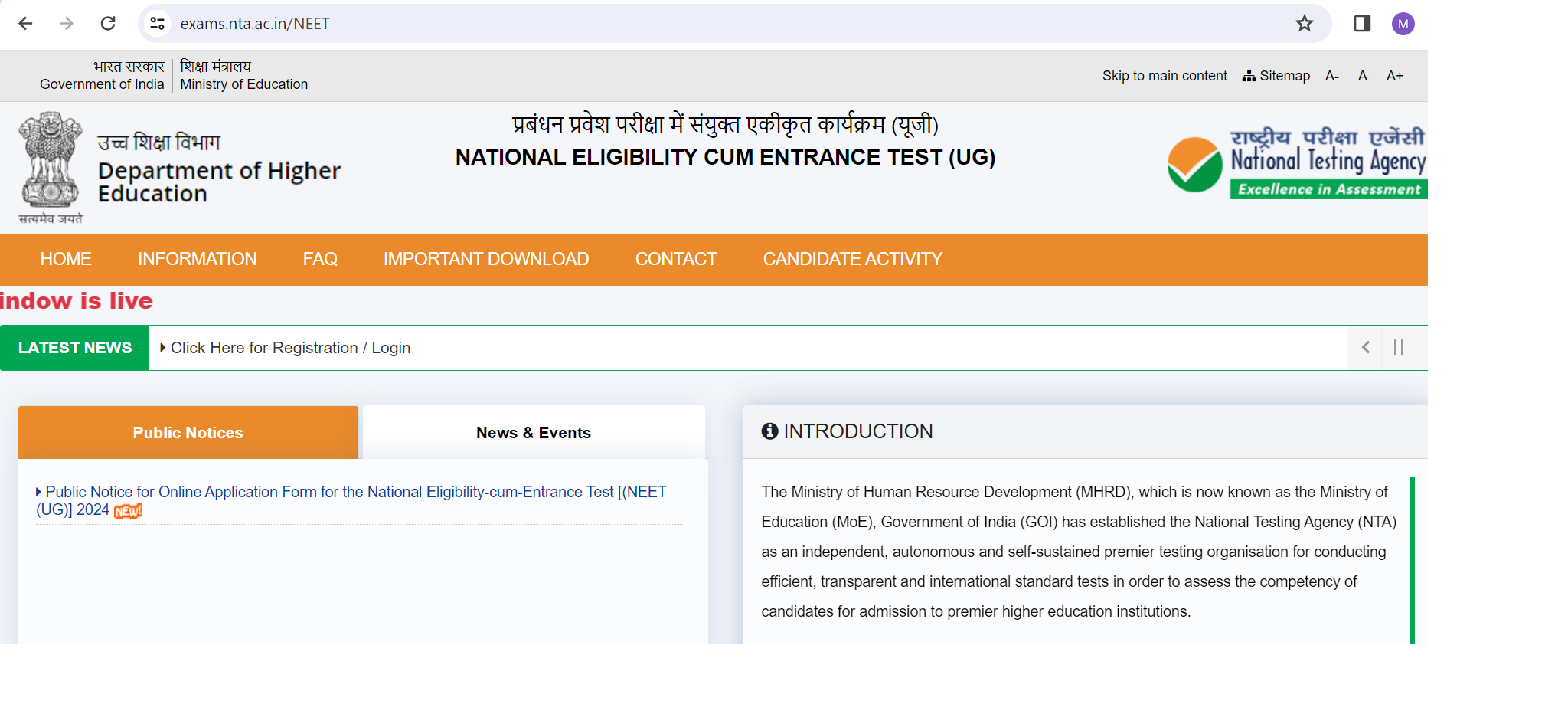 Click on “Registration/Login here” for the invitation for NEET Registration 2024
Click on “Registration/Login here” for the invitation for NEET Registration 2024
- Click on ‘New Candidate Register here’ and read the instructions
- Candidate’s Name
- Mother’s name
- Father’s name
- Date of birth
- Category
- Gender
- Nationality
- Persons with Disability
- Identification Type
- Identification Number
- Mobile number
- Email Id
- Password
- Enter Security Pin
Step 2: Filling up NEET 2024 Application Form
- Click on “Click here to login”
- Login using the application number and password
- The NEET form 2024 will open on your screen
- Details entered during the registration process will be pre-filled in the application and cannot be changed
The form is divided into 12 sections, fill in the following details:
The table below carries the different sections of the NEET application form along with the details to be filled in each section.
| Sections | Credentials |
|---|---|
| Personal Details
|
|
| Place of Birth |
|
| Choice of Medium of Question Paper | Choose from the following language options: English, Hindi, Gujarati, Marathi, Odia, Bengali, Assamese, Telugu, Tamil, Kannada, Malayalam, Punjabi and Urdu |
| Choice of Examination Centre | Choose two exam centre cities in the order of preference |
| Academic Details (Class 10 or equivalent) |
|
| Academic Details (Class 11 or equivalent)
|
|
| Academic Details (Class 12 or equivalent) |
|
| Permanent Address | Permanent address of the candidate |
| Correspondence Address | Same as permanent address or fill in the current address |
| Details of Parents/ Guardian |
|
| Do you intend to wear a customary dress contrary to the Dress code while appearing for the exam? | Yes /No |
| Security pin | Alphanumeric pin on the screen |
- Check all the details carefully as they cannot be changed after the final submission of the NEET application form 2024
- To submit the duly checked application form, click on “Yes, please do” on the confirmation pop-up
Step 3: Upload scanned images
- Click on “Upload your recent documents”
- Select the files to be uploaded
- Click on “Next”
Step 4: Make Payment
Select the desired mode of payment (SBI/Syndicate/HDFC/ICICI/Paytm Payment Gateway through Debit Card/Credit Card/Net-banking/UPI)
NEET 2024 Exam Dates
Take a look at the table below for the complete schedule of NEET 2024 exam
| Dates | Upcoming Exam Dates |
|---|---|
| Jan ’24 – Mar ’24 | NEET 2024 Application Process
TENTATIVE |
| Apr ’24 | NEET 2024 Application Correction
TENTATIVE |
| May ’24 | NEET 2024 Admit Card
TENTATIVE |
| 05 May ’24 | NEET 2024 Exam |
Documents Required for NEET 2024 Application Form
Since the entire NEET form 2024 will be available online, applicants are advised to keep the following documents ready in the required format and sizes before filling out the form to avoid any last-minute hassles.
List of documents Required for NEET 2024 Application Form?
The table below brings the documents and files to be uploaded while filling out the NEET application form 2024.
| Documents | Specifications | Size & Format |
|---|---|---|
| Scanned Photograph |
|
10 Kb to 200 Kb (passport size)
4″x6″, 10 kb to 200 kb (postcard size) JPG/JPEG |
| Scanned Signature | Signature of the candidate in black ink on white background | 4 Kb to 30 Kb
JPG/JPEG |
| Scan of thumb impression |
|
10 Kb to 200 Kb
JPG/JPEG |
| Class 10 Passing Certificate | The scanned copy of Class 10 Pass certificate has to be uploaded | 50 kb to 300 kb
|
| Permanent and Present Address Proof | The scanned copy of permanent and present address proof has to be uploaded | 50 kb to 300 kb
|
| Citizenship Certificate or Embassy Certificate | The citizenship certificate or the embassy certificate is required to prove the nationality of the candidates | 50 kb to 300 kb
|
Some other information that you must keep handy before NEET registration 2024 are as follows:
- A valid mobile number
- Valid Email Id
- Class 10 marks and percentage
- Class 12 marks and percentage
- Identity Number – Aadhar Card number/ Passport number/ Ration Card number/ bank account/ any other valid Govt. identity number
- Credit card/ Debit card/ Net banking credentials
Category-wise NEET 2024 Application Fee
Last year, NTA increased the NEET 2024 application fee by INR 100 for each category and INR 1,000 for selecting exam cities outside India. This year, the NEET application fee may increase as well. Take a look at the category-wise application fee for NEET 2024 given below:
| Category | Application fee (In INR) |
|---|---|
| General | 1,700 |
| Other Backward Classes | 1,600 |
| Scheduled Caste /Scheduled Tribe, Persons with Disability | 1,000 |
| Outside India | 9,500 |
In 2021, the NEET application fee was INR 1,600, which was increased from INR 1,400.
Step 5: Print Confirmation
Save and print the filled NEET application form 2024 along with the confirmation slip.
NEET 2024 Application Documents that must be retained till admissions
You must keep the following documents safe till the NEET counselling or the medical admission process is concluded.
- Printout of the confirmation page
- Receipt for the payment of application fees
- Six to eight copies of the uploaded photograph
NEET 2024 Application Correction
NTA is likely to provide the NEET 2024 application correction facility for the registered candidates wherein they will get a chance to make necessary corrections or changes. However, only those candidates submitting the NEET application form 2024 by paying the requisite application fee within the stipulated date will be eligible to avail of the NEET application correction facility. Take a look at the process to make the NEET 2024 application correction.
- Visit the official website of NEET – neet.nta.nic.in
- Click on the tab ‘NEET (UG) 2024 Correction Window’’
- Log in with the NEET 2024 registration credentials
- Click on the tab ‘Correction in Application Form’
- Enter the OTP received on the registered mobile number and email and click on the ‘Verify and Proceed’ tab
- Make the necessary changes provided the fields are editable and allowed for the candidates based on their Aadhaar verification status
- Click on Save
- Download the updated Application Confirmation form
There is no additional fee to be paid to make corrections in the NEET registration 2024. However, there are a few fields which cannot be edited. These fields include name, email id and mobile number.
List of Editable and Uneditable Fields in the NEET 2024 Application Correction Process
The following fields will be editable and uneditable, depending on whether the Aadhaar Number is linked or not. Take a look at the details below.
| Fields | Action |
|---|---|
| Mobile Number, Email Address, Permanent and Present Address, and Documents Uploaded | No |
| For Aadhaar Verified Candidates | Candidate Name, Gender, Date of Birth – No |
| Father’s and Mother’s Name – Any one of the names can be changed | |
| Category – Candidates can change category and upload Category Certificate | |
| Sub-Category (PwD) – Candidates can change sub-category (PwD) and upload Category Certificate | |
| City and Medium – can be changed | |
| Qualification and passing year – can be changed | |
| For Aadhaar not Verified Candidates | Father’s and Mother’s Name – Any one of the names can be changed |
| Category – Candidates can change category and upload Category Certificate | |
| Sub- Category (PwD) – Candidates can change sub-category (PwD) and upload Category Certificate | |
| Date of Birth and Gender – Can be Changed | |
| City and Medium – Can be Changed | |
| Qualification Including Passing Year – Class 10 and Class 12 |
NEET Application Form Statistics
NEET is the largest medical entrance test in India. Every year there is a significant rise in the number of NEET applicants. The data for the past six years has been depicted in the graph given below. Last year, or NEET 2023 saw the highest number of registrations and the number of test takers, which was above 20 lakh. It is expected that the number of candidates filling up the NEET form will increase this year as well.
|
Category |
Registered |
Appeared |
Qualified |
|---|---|---|---|
|
Male |
9,02,936 |
8,81,967 |
4,90,374 |
|
Female |
11,84,513 |
11,56,618 |
6,55,599 |
|
Transgender |
13 |
11 |
3 |
|
Indian Nationals |
20,85,096 |
20,36,316 |
11,44,399 |
|
Foreigner |
815 |
786 |
521 |
|
NRI |
877 |
852 |
533 |
|
OCI |
674 |
642 |
523 |
|
General |
6,07,131 |
5,92,110 |
3,12,405 |
|
OBC |
8,90,150 |
8,73,173 |
5,25,194 |
|
SC |
3,03,318 |
2,94,995 |
1,53,674 |
|
ST |
1,32,490 |
1,26,121 |
56,381 |
|
EWS |
1,54,373 |
1,52,197 |
98,322 |
|
PwD |
8,037 |
7,819 |
3,508 |
NEET Application Form Date Trends
The NEET application form is released by NTA tentatively two months in advance. Before NTA releases the NEET 2024 registration date, let us take a look at the year-wise date trends for the NEET application processes.
| Year | NEET Application Form Start Date | NEET Application Form End Date |
|---|---|---|
| NEET 2024 | Fourth week of January 2024 | Fourth week of March 2024 |
| NEET 2023 | 06-Mar-2023
12-Apr-2023 |
06-Apr-2023
15-Apr-2023 |
| NEET 2022 | 06-Apr-2022 | 06-May-2022
15-May-2022 |
| NEET 2021 | 13-Jul-2021 | 06-Aug-2021
10-Aug-2021 |
| NEET 2020 | 02-Dec-2019 | 07-Jan-2020 |
| NEET 2019 | 01-Nov-2018 | 07-Dec-2018 |
FAQs Regarding NEET 2024 Application Form
Read the Frequently Asked Questions (FAQs) regarding NEET 2024 Application Form.
Q: When will the NEET registration 2024 process conclude?
A: The NEET registration 2024 process is likely to be conducted for a month. The tentative date of concluding the NEET 2024 registration process is first week of April. Since NEET 2024 will be conducted on May 5, the application process will tentatively begin in the first week of March. Based on candidate requests, NTA may extend or reopen the NEET 2024 application process. Candidates must ensure that they complete the NEET registration 2024 within the stipulated schedule as they may not get a second chance.
Q: Will there be a change in the NEET application fee for 2024?
A: Last year, NTA had increased the NEET 2023 application fee by INR 100 for each category. Moreover, there was an increase in INR 1,000 for candidates selecting an international NEET exam centre city. Over the past three years, NTA has increased the application fee every year. Hence, there is a possibility that NTA will increase the NEET 2024 application fee as well. The application fee has to be paid online through Credit Card, Debit Card, Net Banking, UPI and Paytm modes. Unless a candidate pays the fee as per his/her category, the NEET application process will not be considered complete and he/she will not be able to appear for the exam.
Q: What are some common mistakes to avoid while filling the NEET application form?
A: Here are some common mistakes to avoid while filling the NEET application form:
- Not reading the instructions carefully: Before filling the application form, it is important to read the instructions carefully.
- Not providing correct information: Candidates should provide correct and accurate information while filling the application form.
- Not uploading proper documents: Candidates should upload proper and clear scanned copies of their photograph, signature, and other required documents. The documents should be in the specified format and size.
- Paying the application fee: Candidates should pay the application fee within the specified time frame. Late payment or non-payment of the fee can lead to rejection of the application.
- Selecting the incorrect exam city: Candidates should carefully select the exam center as per their convenience. NOTE:- In case one have accidently filled wrong information there is also a correction window time. By avoiding these common mistakes, candidates can increase their chances of filling application of NEET.
Q: The session expired while submitting the application form for NEET 2024. What should I do?
A: Candidates filling the NEET application form will have to fill and submit it within 30 minutes of logging into the registered account. Also, they have to keep saving each section of the application form to avoid filling it again if the session expires. To ensure completing the form in under 30 minutes, it is advised to keep all the information handy. Also, candidates must keep saving each stage of the NEET 2024 application form. In case of session expiry, they will have to login again and resume the NEET application process.
Q: How can I be sure that NTA has received the application fee?
A: After the NEET 2024 application fee payment is processed successfully, a confirmation page will open on the screen. This is the confirmation of the fact that the NEET application fee is received by the NTA. This has to be saved and printed for future reference. Candidates will also receive the NEET 2023 application confirmation through email and SMS at their registered email address and mobile number. In case the amount is deducted and the application confirmation is not received, then candidates were advised to contact NTA within the stipulated timing. Otherwise, they need to log in and try to pay the fee once again after a while.
Q: Will the NEET 2024 application form submission last date extend?
A: NTA is expected to release the NEET 2024 application form in the fourth week of January 2024. The application window is likely to last for around two months and the last date to submit the NEET application form may be extended by a few days. Since the NEET 2024 application form has not been released yet, it is difficult to predict at the moment whether the NEET 2024 application form submission last date will be extended or not. In general, NTA extends or reopens the application window for NEET based on student requests, or if the process is hampered due to technical glitches or other external factors.
Q: If my 50% criteria is not clear, can I fill NEET Application Form?
A: NEET eligibility criteria require candidates to meet certain educational qualifications, such as completing 10+2 or an equivalent examination with the required subjects (Physics, Chemistry, Biology/Biotechnology, and English) from a recognised board. Additionally, candidates must attain a minimum percentage in the qualifying examination to be eligible for NEET.
If your 50% criteria is not clear, it is advisable to thoroughly review the NEET information bulletin or contact the conducting authority responsible for NEET, such as the National Testing Agency (NTA), to seek clarification on the eligibility criteria. They will be able to provide you with accurate information and guidance regarding your specific situation.
Q: I have the filled the NEET form, but it is showing that it’s in process. What can I do?
A: Check whether you had completed the fill up process or not. If you had filled up and your application is complete then you must had application number. You can check from another device. You go to any internet cafe and give your application number password date of birth and required details and get your application form print out.
Q: What was the total number of registrations received for NEET 2023?
A: NTA received a total of 20.87 lakh applications in NEET 2023. Out of which 20.38 lakh candidates appeared for the exam. As many as 11.46 like candidates qualified for the exam which was conducted on May 7. In the previoud year, NEET received over 18 lakh applications, which was 12 per cent higher than the previous year (2021). Factors such as removal of the upper age limit and inclusion of more medical and paramedical courses under NEET have led to the high number of registrations in NEET.
Q: When will NTA open the NEET 2024 application correction window?
A: NTA is likely to open the NEET 2024 application correction window a couple of days after concluding the application process. The application correction window will be available only for candidates who will complete the NEET 2024 application process by paying the application fee. NTA will announced the specific fields which will be available for edit and the rest of the fields will be uneditable, for both Aadhaar verified and Aadhaar non-verified candidates. Prior to starting the correction process, candidates must check the list carefully and then proceed. There is no additional fee required for availing the NEET application correction facility unless there was a change of category impacting the application fee amount.
Q: Do I have to pay a correction fee for making changes to the NEET application form 2024?
A: No, there is no fee associated with the NEET 2024 application correction process, unless candidates updated their category which impacted the application fee. The additional fee had to be paid through Credit Card, Debit Card, Net Banking, UPI and Paytm. In case candidates changed their category, they must have uploaded the requisite category certificate. However, NTA has mentioned that in case after the category change if the application fee would be lower, the additional fee would not be refunded.
Q: How to correct the NEET application form?
A: You can correct in NEET Correction form:- 1. Gender 2. Date of Birth 3. Identification Identity 4. Medium of Exam 5. Category 6. State Code of Eligibility 7. Disability Status 8. Examination Center Fields which cant be Changed 1. State Eligibility of Quota 2. Nationality NEET Correction Form procedure: – Step 1 Visit the link given on the NTA website. Step 2 Now enter your Registration Number and Password and log in your application form. Step 3 The application form will open on your computer screen. Check, if there is any mistake and if found any change, then replace them with the correct information. Step 4 Check the form before submitting it again and finally submit the form.
Q: I made a mistake in the email ID during NEET 2024 registration. What can I do?
A: If you complete the NEET application form 2024 with an incorrect email address, you will not receive official email notifications. However, if the mobile number that you have registered on the NTA portal is correct, you will receive the same notification on your phone via SMS. Furthermore, they will not receive OTP via email which is a mandatory step of verification and completion of the application process. NTA does not allow candidates to change or correct their email addresses in the application correction window. Hence, in case candidates have made a mistake in their email, they are advised to register and apply again with their correct email address.
Q: I am a dropper is the gap certificate necessary to fill the NEET application form?
A: A GAP Certificate is not required when filling out the NEET application form. Also, a GAP Certificate is not required for All India Quota (AIQ) or State Quota (SQ) counselling. Only documentation such as these are required. Marksheets for classes 10 and 12 I. D. verification During document verification, passport-size pictures are requested. Certificate of completion for class 10 Certificate of classification Hope you found this answer useful. Stay motivated stay positive. I hope you found this response to be helpful. Continue to be inspired and optimistic.
Q: Do I need to send the NEET application form 2024 and other attachments by post to NTA?
A: No, you need not send any documents by post to NTA. The entire application process for NEET 2024 will be completely online and the relevant documents had to be uploaded online only. Candidates had to upload the documents or files in the requisite format and size/dimensions only. Otherwise the system will not accept or upload the files which will hamper filling up the NEET 2024 application form process.
Q: The marksheet of 10th standard does not include my parents’ name. Will there be any issue in filling NEET application form?
A: Ideally, there should not be an issue if parents’ names are not mentioned in the Class 10 marksheet, if it is the standard format of your Board. However, if there is a misprint or glitch, which caused the absence of your parents’ names in the marksheet, then you may approach the Board officials through the Helpline Number or email to get it rectified. Moreover, the marksheet of Class 10 is a document to tally whether the accuracy of the marks or aggregate entered by you in the NEET application form. If there is a mismatch, it may create a hindrance during the document verification process of the counselling rounds. Otherwise, there would not be an issue if parents’ names do not appear in the Class 10 marksheet.
Q: How do I fill the NEET application form 2024?
A: The NTA NEET registration procedure is completely online. The steps of NEET application process 2024 are given below:
1. Visit the NEET 2024 official website -neet.nta.nic.in
2. Click on the tab indicating Registration
3. Read all the instructions and register with personal details such as name, contact details, password, etc. to generate the application number and password
4. Register for NEET 2024 by entering personal and contact details Select password
5. Verify OTP received through SMS and email
6. After the credentials are generated, log in and fill up the application form with personal and educational details, exam medium and exam city preference and photograph and signature upload
7. Pay the application fee in online mode through credit/debit card, net banking, Paytm and UPI
Q: Can I fill the NEET application form 2024 offline?
A: The NEET application form 2024 has to be filled in online mode only. However, there is an exception for the applicants residing in the Kashmir valley or Leh. The NEET 2024 application fee has to be paid using a credit card/debit card, net banking, Paytm or UPI. In case candidates face any technical or server issue, they are advised to wait for sometime or change the internet source. If the issue persists further, then they have to visit any of the Common Service Centres (CSC).
Q: Can I fill out the NEET form without the internet?
A: Candidates without access to the internet had to visit the nearest Common Services Centre (CSC). The CSCs help in filling out the application form for NEET 2023 and payment of the application fee. They charge a nominal fee for these services. To know the details of the nearest CSC, visit csc.gov.in.
Q: When will the NEET 2024 registration start?
A: NTA has not released the date for releasing the NEET 2024 registration or application form yet. NEET 2024 will be conducted on May 5. As per latest media reports, the NEET 2024 application form is likely to be released in the fourth week of January 2024. The duration of the NEET 2024 application process is likely to be two months. Based on the number of applications or student requests, NTA may extend the last date of application, or reopen the application window. NEET 2024 application process will be conducted online. Candidates will have to fill and submit the application form in an online mode along with the payment of the application fee. The actual dates for the NEET 2024 registration and application processes will be announced by NTA through an official notification on NTA and NEET websites.
Q: When will NEET 2024 be conducted?
A: NEET 2024 will be conducted on May 5, 2024, from 2 PM to 5.20 PM (IST). NTA will conduct the exam in around 500 cities across India and abroad. Around 20 lakh candidates are expected to appear for the exam. Given the high level of competition, the difficulty level of the exam is expected to be higher than last year. NEET is a paper-pencil based test (PBT) consisting of a total of 200 multiple-choice questions (MCQs). Out of this, candidates had to attempt 180 questions. The total marks of the exam is 720.
Q: Till when can I pay the NEET 2024 application fee?
A: The NEET 2024 application fee payment last date will tentatively scheduled in the first week of April, which will be approximately a couple of months after the commencement of the application process. In general, NTA gives an additional day to pay the application fee for NEET 2024. It is very important to complete the NEET 2024 application process by paying the requisite application fee. Unless a candidate pays the application fee, the process will not be considered to be complete and he/she will not be eligible to appear for the exam. After paying the application fee, candidates will have to save and print the NEET 2024 application confirmation slip till the end of the admission process.
NEET syllabus for 2024 has undergone major changes. The NEET 2024 syllabus PDF by NTA was released on the official website of the exam conducting body on November 22. The NTA NEET syllabus 2024 is the same as that released by the National Medical Commission (NMC) earlier. Hence, it can be said that the NTA NEET syllabus is the same as the NMC NEET syllabus.
NTA has released a series of Frequently Asked Questions (FAQs) regarding NEET deleted syllabus 2024. Through the FAQs, NTA has explained the reason behind the revision of the NEET syllabus 2024 and clarity regarding the topic names, among others.
A number of chapters and topics have been removed from Physics, Chemistry and Biology. On the other hand, certain topics and chapters have been added and some of the topics have been modified. NMC released the syllabus after a plea was filed before the Delhi High Court Bench seeking a direction to the concerned authorities to provide the updated and final NEET 2024 syllabus. NEET deleted syllabus 2024 has been mentioned here on this page.
Download NTA syllabus for NEET 2024 PDF.
According to NTA Director General Subodh Kumar Singh, the announcement of the NTA syllabus for NEET 2024 ahead of the exam will help students prepare and plan their studies for the entrance test as a little over for NEET 2024.
Also Read :
Subject-Wise breakdown of the NEET 2024 Syllabus
NEET 2024 will be conducted on May 5, 2024. The NEET application form 2024 is likely to be released in the fourth week of January 2024. Medical aspirants planning to appear for the NEET exam for the next academic year must be thorough with the NEET 2024 syllabus comprising three subjects – Physics, Chemistry and Biology (Botany and Zoology). Topics covered in these three subjects from Class 10 to Class 12 will be included in the NEET UG syllabus. Hence, students who are also preparing for their Board exams can go for a common preparation in the initial phases. According to NTA, the NEET exam syllabus is the same as that of the Board exams.
| NEET Exam Pattern | NEET Preparation | NEET Mock Tests |
To download NEET syllabus 2024 PDF, click on the link given below
Which Chapters are Removed in NEET 2024 Syllabus?
As per the latest syllabus of NEET 2024 released by NMC, certain chapters have been removed in each subject, Physics, Chemistry and Biology. Here we bring the list of chapters that have been removed in the NEET syllabus 2024, or the NEET deleted syllabus 2024.
List of Chapters and Topics Removed in NEET Physics Syllabus
Here we bring the list of chapters and topics removed in the NEET Physics syllabus from Class 11.
Unit I: Physical-world and Measurement
- Physics: Scope and excitement; nature of physical laws; Physics, technology, and society.
- Need for measurement: Length, mass, and time measurements; accuracy and precision of measuring instruments.
Unit II: Kinematics
Elementary concepts of differentiation and integration for describing motion. Scalar and vector quantities: Position and displacement vectors, general vectors, general vectors and notation, equality of vectors, multiplication of vectors by a real number; addition and subtraction of vectors. Relative velocity.
Unit III: Laws of Motion
Lubrication (under the Equilibrium of Concurrent Forces chapter)
Unit V: Rotational Motion
Momentum conservation, and centre of mass motion.
Unit VI: Gravitation
Geostationary satellites.
Unit VII: Properties of Bulk Matter/Properties of Solids and Liquids
- Shear, poisson’s ratio; elastic energy. Reynold’s number, Anomalous expansion. Specific heat capacity: Cp, Cv- calorimetry; change of state – latent heat. Qualitative ideas of Black Body Radiation, Wein’s displacement law, and Green House effect.
- Newton’s law of cooling and Stefan’s law.
Unit VIII: Thermodynamics
Heat engines and refrigerators.
Unit X: Oscillations and Waves
- Free, forced and damped oscillations (qualitative ideas only), resonance.
- Doppler effect
Here we bring the list of chapters and topics removed from NEET physics syllabus of Class 12.
Unit I: Electrostatics
Van de Graaff generator.
Unit II: Current Electricity
- The flow of electric charges in a metallic conductor, Carbon resistors, colour code for carbon resistors; Potentiometer-principle and applications to measure potential difference, and for comparing emf of two cells; measurement of internal resistance of a cell.
Unit III: Magnetic Effects of Current and Magnetism
Concept of magnetic field, Oersted’s experiment. Magnetic dipole moment of a revolving electron. bar magnet as an equivalent solenoid, magnetic field lines; Earth’s magnetic field and magnetic elements. Electromagnetic and factors affecting their strengths. Permanent magnets
Unit IV: Electromagnetic Induction and Alternating Currents
LC oscillations (qualitative treatment only),
Unit VI: Optics
- Reflection and refraction of plane wave at a plane surface using wave fronts.
- Scattering of light- blue colour of the sky and reddish appearance of the sun at sunrise and sunset.
- Optical instruments: Human eye, image formation and accommodation, correction of eye defects (myopia and hypermetropia) using lenses.
- Microscopes and astronomical telescopes (reflecting and refracting) and their magnifying powers.
Unit VII: Dual Nature of Matter and Radiation
Davisson-Germer experiment (experimental details should be omitted; only conclusion should be explained).
Unit VIII: Atoms and Nuclei
Isotopes, isobars; isotones. Radioactivity- alpha, beta and gamma particles/ rays and their properties decay law.
Unit IX: Electronic Devices
Energy bands in solids (qualitative ideas only), conductors, insulators, Junction transistor, transistor action, characteristics of a transistor; transistor as an amplifier (common emitter configuration) and oscillator.
List of Chapters Removed in NEET Chemistry Syllabus
Here we bring the list of chapters removed from the NEET Chemistry syllabus from Class 11 and Class 12 or the NEET 2024 deleted syllabus in the Chemistry subject.
The following chapters/topics denote the NEET 2024 deleted syllabus of Class 11.
Unit I: Some Basic Concepts of Chemistry
General Introduction: Important and scope of chemistry.
Unit II: Structure of Atom
Atomic number, isotopes and isobars, Concept of shells and subshells, dual nature of matter and light.
Unit V: States of Matter: Gases and Liquids
- Three states of matter, intermolecular interactions, types of bonding, melting and boiling points, role of gas laws of elucidating the concept of the molecule, Boyle’s law, Charle’s law, Gay Lussac’s law, Avogadro’s law, ideal behaviour of gases, empirical derivation of gas equation. Avogadro number, ideal gas equation. Kinetic energy and molecular speeds (elementary idea), deviation from ideal behaviour, liquefaction of gases, critical temperature.
- Liquid State- Vapour pressure, viscosity and surface tension (qualitative idea only, no mathematical derivations).
Unit IX: Hydrogen
Occurrence, isotopes, preparation, properties and uses of hydrogen; hydridesionic, covalent and interstitial; physical and chemical properties of water, heavy water; hydrogen peroxide preparation, reactions, uses and structure.
Unit X: s-Block Elements (Alkali and Alkaline Earth Metals)
Group I and group 2 elements:
• General introduction, electronic configuration, occurrence, anomalous properties of the first element of each group, diagonal relationship, trends in the variation of properties (such as ionization enthalpy, atomic and ionic radii), trends in chemical reactivity with oxygen, water, hydrogen and halogens; uses.
• Preparation and Properties of Some important Compounds:
• Sodium carbonate, sodium chloride, sodium hydroxide and sodium hydrogen carbonate, biological importance of sodium and potassium.
• Industrial use of lime and limestone, biological importance of Mg and Ca.
Unit XI: Some p-Block Elements
Important compounds of silicon and a few uses: silicon tetrachloride, silicones, silicates and zeolites, their uses.
UNIT XIII: Organic Compounds Containing Nitrogen
Cyanides and Isocyanides- will be mentioned at relevant places.
UNIT XIV: Environmental Chemistry
Environmental pollution: Air, water and soil pollution, chemical reactions in atmosphere, smogs, major atmospheric pollutants; acid rain ozone and its reactions, effects of depletion of ozone layer, greenhouse effect and global warming-pollution due to industrial wastes; green chemistry as an alternative tool for reducing pollution, strategy for control of environmental pollution.
The following chapters/topics denote the NEET 2024 deleted syllabus of Class 12.
Unit I: Solid State
Classification of solids based on different binding forces; molecular, ionic covalent and metallic solids, amorphous and crystalline solids (elementary idea), unit cell in two dimensional and three dimensional lattices, calculation of density of unit cell, packing in solids, packing efficiency, voids, number of atoms per unit cell in a cubic unit cell, point defects, electrical and magnetic properties, Band theory of metals, conductors, semiconductors and insulators.
Unit V: Surface Chemistry
Adsorption-physisorption and chemisorption; factors affecting adsorption of gases on solids, catalysis homogeneous and heterogeneous, activity and selectivity: enzyme catalysis; colloidal state: distinction between true solutions, colloids and suspensions; lyophillic, lyophobic multimolecular and macromolecular colloids; properties of colloids; Tyndall effect, Brownian movement, electrophoresis, coagulation; emulsions- types of emulsions.
UNIT XV: Polymers
Classification- Natural and synthetic, methods of polymerization (addition and condensation), copolymerization. Some important polymers: natural and synthetic like polyesters, bakelite; rubber, Biodegradable and non-biodegradable polymers.
UNIT XVI: Chemistry in Everyday Life
• Chemicals in medicines- analgesics, tranquilizers, antiseptics, disinfectants, antimicrobials, antifertility drugs, antibiotics, antacids, antihistamines.
• Chemicals in food- preservatives, artificial sweetening agents, elementary idea of antioxidants.
• Cleansing agents- soaps and detergents, cleansing action.
List of Chapters Removed in NEET Biology Syllabus
Here we bring the list of chapters which have been removed from the NEET Biology syllabus from Class 11.
Unit II: Structural Organisation in Animals and Plants
Animal tissues; Morphology, anatomy and functions of different systems (digestive, circulatory, respiratory, nervous and reproductive) of an insect (Frog). (Brief account only)
Unit IV: Plant Physiology
- Transport in plants: Movement of water, gases and nutrients; Cell to cell transport-Diffusion, facilitated diffusion, active transport; Plant – water relations – Imbibition, water potential, osmosis, plasmolysis; Long distance transport of water – Absorption, apoplast, symplast, transpiration pull, root pressure and guttation; Transpiration-Opening and closing of stomata; Uptake and translocation of mineral nutrients-Transport of food, phloem transport, Mass flow hypothesis; Diffusion of gases (brief mention).
- Mineral nutrition: Essential minerals, macro and micronutrients and their role; Deficiency symptoms; Mineral toxicity; Elementary idea of Hydroponics as a method to study mineral nutrition; Nitrogen metabolism-Nitrogen cycle, biological nitrogen fixation.
Unit V: Human Physiology
Digestion and absorption; Alimentary canal and digestive glands; Role of digestive enzymes and gastrointestinal hormones; Peristalsis, digestion, absorption and assimilation of proteins, carbohydrates and fats; Caloric value of proteins, carbohydrates and fats; Egestion; Nutritional and digestive disorders – PEM, indigestion, constipation, vomiting, jaundice, diarrheas’.
Here we bring the chapters and topics NEET 2024 deleted syllabus from Class 12 Biology.
Unit I: Reproduction
Reproduction in organisms: Reproduction, a characteristic feature of all organisms for continuation of species; Modes of reproduction – Asexual and sexual; Asexual reproduction; Modes-Binary fission, sporulation, budding, gemmule, fragmentation; vegetative propagation in plants.
Unit III: Biology and Human Welfare
Improvement in food production; Plant breeding, tissue culture, single cell protein, Biofortification; Apiculture and Animal husbandry.
Unit V: Ecology and Environment
Organisms and environment: Habitat and niche; Population and ecological adaptations
Ecosystem Patterns: Nutrient cycling (carbon and phosphorous); Ecological succession; Ecological Services fixation, pollination, oxygen release.
Biodiversity and its conservation: Sacred Groves.
Environmental issues: Air pollution and its control; Water pollution and its control; Agrochemicals and their effects; Solid waste management; Radioactive waste management; Greenhouse effect and global warning; Ozone depletion; Deforestation; Any three case studies as success stories addressing environmental issues.
Addition of New Chapters in NEET Syllabus 2024
Along with the reduction of the NEET 2024 syllabus, there are some chapters or topics in each subject, which have been added. Here, we bring the topics or chapters which have been added to the NEET syllabus 2024.
List of New Chapters Added in NEET Physics Syllabus
Following are the topics and chapters added to the NEET Physics syllabus of Class 11.
Unit II: Kinematics
Resolution of Vector
Unit VI: Gravitation
Motion of a satellite, time period and energy of a satellite
Unit VII: Properties of Bulk Matter/Properties of Solids and Liquids
Pressure due to a fluid column; Pascal’s law and its applications. Effect of gravity on fluid pressure.
Unit IX: Behaviour of Perfect Gas and Kinetic Theory
RMS speed of gas molecules: Degrees of freedom. Avogadro’s number.
Following are the topics in the Physics syllabus of Class 12 which have been added this year.
Unit III: Magnetic Effects of Current and Magnetism
Effect of temperature on magnetic properties.
Unit VII: Dual Nature of Matter and Radiation
Dual nature of radiation.
Unit XX: Experimental Skills
Familiarity with the basic approach and observations of the experiments and activities:
1. Vemier calipers-its use to measure the internal and external diameter and depth of a vessel.
2. Screw gauge-its use to determine thicknesV diameter ofthin sheet/wire.
3. Simple pendulum-dissipation of energy by plotting a graph between the square of amplitude and time.
4. Metre Scale – the mass of a given object by the principle of moments.
5. Young’s modulus of elasticity of the material of a metallic wire.
6. Surface tension of water by capillary rise and effect of detergents.
7. Co-efficient of Viscosity of a given viscous liquid by measuring terminal velocity of a given spherical body.
8. Speed of sound in air at room temperature using a resonance tube.
9. Specific heat capacity of a given (i) solid and (ii) liquid by method of mixtures.
10. The resistivity of the material of a given wire using a metre bridge.
11. The resistance of a given wire using Ohm’s law.
12. Resistance and figure of merit of a galvanometer by half deflection method.
13. The focal length of;
(i) Convex mirror
(ii) Concave mirror, and
(iii) Convex lens, using the parallax method.
14. The plot of the angle of deviation vs angle of incidence for a triangular prism.
15. Refractive index of a glass slab using a travelling microscope.
16. Characteristic curves of a p-n junction diode in forward and reverse bias.
17. Characteristic curves of a Zener diode and finding reverse breakdown voltage.
18. Identification of Diode. LED,. Resistor. A capacitor from a mixed collection of such item
List of New Chapters Added in NEET Chemistry Syllabus
The following chapters have been added to NEET Chemistry syllabus.
Unit II: Structure of Atom
Bohr model of a hydrogen atom – its postulates, derivation of the relations for the energy of the electron and radii of the different orbits, limitations of Bohr’s model.
Unit IV: Chemical Bonding and Molecular Structure
- Kossel – Lewis approach to chemical bond formation, the concept of ionic and covalent bonds.
- Elementary idea of metallic bonding.
- Fajan’s rule.
Unit: Chemical Thermodynamics
Fundamentals of thermodynamics: System and surroundings, extensive and intensive properties’ state functions, types of processes.
The first law of thermodynamics – Concept of work, heat internal energy and enthalpy, heat capacity, molar heat capacity; Hess’s law of constant heat summation; Enthalpies of bond dissociation, combustion’ formation, atomization. sublimation. phase transition, hydration. ionization. and solution.
The second raw of thermodynamics – Spontaneity of processes: AS ofthe universe and AC of the system as criteria for spontaneity. Standard Gibbs energy change and equilibrium constant.
Unit VII: Redox Reactions and Electrochemistry
Electrolytic and metallic conduction, conductance and their in electrolytic solutions, molar conductivities variation with concentration: Kohlrausch’s law and its applications.
Electrochemical cells – Electrolytic and Galvanic cells, different types of electrodes, electrode potentials including standard electrode potential, half-cell and cell reactions, emf of a Galvanic Cell and its measurement: Nernst equation and its applications, Relationship between cell potential and Gibbs’ energy change: Dry cell and lead accumulator, Fuel cells.
Unit IV: Chemical Kinetics
Pressure, collision theory of bimolecular gaseous reactions (no derivation).
Unit VIII: d and f Block Elements
Transition Elements
Unit XIII: Purification and Characterisation of Organic Compounds
Purification – Crystallization. sublimation, distillation, differential extraction, chromatography – principles and their applications.
Qualitative analysis – Detection of nitrogen, sulphur, phosphorus and halogens.
Quantitative analysis (basic principles only) – Estimation of carbon. hydrogen. nitrogen. halogens. sulphur. phosphorus.
Calculations of empirical formulae and molecular formulae: Numerical problems in organic quantitative analysis.
Unit XIII: Hydrocarbons
Classification of isomerism. IUPAC nomenclature, general methods of preparation, properties, and reactions.
Unit: Organic Compounds Containing Halogen
General methods of preparation, properties, and reactions; Nature of C-X bond: Mechanisms of substitution reactions.
Uses; Environmental effects of chloroform, iodoform freons, and DDT.
Unit: Principles Related to Practical Chemistry
Detection of extra elements (Nitrogen, sulphur, halogens), in organic compounds; Detection of the following functional group, hydroxyl (alcoholic and phenolic), carbonyl (aldehyde and ketones) carboxyl, and amino groups in organic compounds.
- The chemistry involved in the preparation of the following:
Inorganic compounds: Mohr’s salt. potash alum
Organic compounds: Acetanilide. p-nitro acetanilide, aniline yellow, iodoform
- The chemistry involved in the titrimetric exercises – Acids. bases and the use of indicators. oxalic-acid vs KMnO4. Mohr’s salt vs KMnO4
- Chemical principles involved in the qualitative salt analysisCations
AnionsChemical principles involved in the following experiments:1. Enthalpy of solution of CuSO42. Enthalpy of neutralization of strong acid and strong base3. Preparation of lyophilic and lyophobic sols4. Kinetic study of the reaction of iodide ions with hydrogen peroxide at room temperature.
NEET Syllabus 2024: Subject and Chapter wise
As NEET is one of the toughest competitive exams, aspirants should have an idea about the topic-wise syllabus for NEET 2024. They should know how many questions would be asked from which topic of the particular subject, or the NEET subject-wise weightage. NEET 2024 syllabus will comprise three subjects, Chemistry, Physics, and Biology. A maximum number of questions will be asked from Biology which will be further divided into Zoology and Botany. It is very important for a candidate to know the syllabus of NEET as per topics. They should know how many topics are there in each subject so that they can allocate time accordingly. Knowing the topic-wise NEET exam syllabus will help the candidate to build their confidence and they don’t get nervous at the last moment of preparation. From Physics, topics like Optics, Electrostatics, Thermodynamics, etc have high weightage while in Biology, subjects, Genetics and Evolution, and Human Physiology are high weightage topics.
NEET Biology Syllabus 2024
Let us take a look at the major topics from the NEET Biology syllabus and the class-wise distribution of subjects alongside weightages assigned to those.
Unit I: Diversity in Living World
- What is living?; Biodiversity; Need for classification; Taxonomy & Systematics; Concept of species and taxonomical hierarchy; Binomial nomenclature.
- Five kingdom classifications; salient features and classification of Monera; Protista and Fungi into major groups; Lichens; Viruses and Viroids.
- Salient features and classification of plants into major groups – Algae, Bryophytes, Pteridophytes, Gymnosperms (three to five salient and distinguishing features and at least two examples of each category);.
- Salient features and classification of animals-nonchordate up to phyla level and chordate up to classes level (three to five salient features and at least two examples)
Unit II: Structural Organisation in Animals and Plants
- Morphology and modifications; Tissues; Anatomy and functions of different parts of flowering plants: Root, stem, leaf, inflorescence- cymose and recemose, flower, fruit and seed (To be dealt along with the relevant practical of the Practical Syllabus). Family (malvaceae, Cruciferae, leguminoceae, compositae, graminae).
- Animal tissues; Morphology, anatomy and functions of different systems (digestive, circulatory, respiratory, nervous and reproductive) of an insect (frog). (Brief account only)
Unit III: Cell Structure and Function
- Cell theory and cell as the basic unit of life; Structure of prokaryotic and eukaryotic cell; Plant cell and animal cell; Cell envelope, cell membrane, cell wall; Cell organelles-structure and function; Endomembrane system-endoplasmic reticulum, Golgi bodies, lysosomes, vacuoles; mitochondria, ribosomes, plastids, micro bodies; Cytoskeleton, cilia, flagella, centrioles (ultra structure and function); Nucleus-nuclear membrane, chromatin, nucleolus.
- Chemical constituents of living cells: Biomolecules-structure and function of proteins, carbodydrates, lipids, nucleic acids; Enzymes-types, properties, enzyme action, classification and nomenclature of enzymes.
- B Cell division: Cell cycle, mitosis, meiosis and their significance.
Unit IV: Plant Physiology
- Photosynthesis: Photosynthesis as a means of Autotrophic nutrition; Site of photosynthesis take place; pigments involved in Photosynthesis (Elementary idea); Photochemical and biosynthetic phases of photosynthesis; Cyclic and non cyclic and photophosphorylation; Chemiosmotic hypothesis; Photorespiration C3 and C4 pathways; Factors affecting photosynthesis.
- Respiration: Exchange gases; Cellular respiration-glycolysis, fermentation (anaerobic), TCA cycle and electron transport system (aerobic); Energy relations- Number of ATP molecules generated; Amphibolic pathways; Respiratory quotient.
- Plant growth and development: Seed germination; Phases of Plant growth and plant growth rate; Conditions of growth; Differentiation, dedifferentiation and redifferentiation; Sequence of developmental process in a plant cell; Growth regulators-auxin, gibberellin, cytokinin, ethylene, ABA.
Unit V: Human physiology
- Breathing and Respiration: Respiratory organs in animals (recall only); Respiratory system in humans; Mechanism of breathing and its regulation in humans-Exchange of gases, transport of gases and regulation of respiration Respiratory volumes; Disorders related to respiration-Asthma, Emphysema, Occupational respiratory disorders.
- Body fluids and circulation: Composition of blood, blood groups, coagulation of blood; Composition of lymph and its function; Human circulatory system-Structure of human heart and blood vessels; Cardiac cycle, cardiac output, ECG, Double circulation; Regulation of cardiac activity; Disorders of circulatory system-Hypertension, Coronary artery disease, Angina pectoris, Heart failure.
- Excretory products and their elimination: Modes of excretion- Ammonotelism, ureotelism, uricotelism; Human excretory system-structure and fuction; Urine formation, Osmoregulation; Regulation of kidney function-Renin-angiotensin, Atrial Natriuretic Factor, ADH and Diabetes insipidus; Role of other organs in excretion; Disorders; Uraemia, Renal failure, Renal calculi, Nephritis; Dialysis and artificial kidney.
- Locomotion and Movement: Types of movement- ciliary, fiagellar, muscular; Skeletal musclecontractile proteins and muscle contraction; Skeletal system and its functions (To be dealt with the relevant practical of Practical syllabus); Joints; Disorders of muscular and skeletal systemMyasthenia gravis, Tetany, Muscular dystrophy, Arthritis, Osteoporosis, Gout.
- Neural control and coordination: Neuron and nerves; Nervous system in humanscentral nervous system, peripheral nervous system and visceral nervous system; Generation and conduction of nerve impulse; Reflex action; Sense organs; Elementary structure and function of eye and ear.
- Chemical coordination and regulation: Endocrine glands and hormones; Human endocrine systemHypothalamus, Pituitary, Pineal, Thyroid, Parathyroid, Adrenal, Pancreas, Gonads; Mechanism of hormone action (Elementary Idea); Role of hormones as messengers and regulators, Hypo-and hyperactivity and related disorders (Common disorders e.g. Dwarfism, Acromegaly, Cretinism, goiter, exopthalmic goiter, diabetes, Addison’s disease). (Imp: Diseases and disorders mentioned above to be dealt in brief.)
Unit VI: Reproduction
- Sexual reproduction in flowering plants: Flower structure; Development of male and female gametophytes; Pollination-types, agencies and examples; Outbreeding devices; Pollen-Pistil interaction; Double fertilization; Post fertilization events- Development of endosperm and embryo, Development of seed and formation of fruit; Special modes-apomixis, parthenocarpy, polyembryony; Significance of seed and fruit formation.
- Human Reproduction: Male and female reproductive systems; Microscopic anatomy of testis and ovary; Gametogenesis-spermatogenesis & oogenesis; Menstrual cycle; Fertilisation, embryo development upto blastocyst formation, implantation; Pregnancy and placenta formation (Elementary idea); Parturition (Elementary idea); Lactation (Elementary idea).
- Reproductive health: Need for reproductive health and prevention of sexually transmitted diseases (STD); Birth control-Need and Methods, Contraception and Medical Termination of Pregnancy (MTP); Amniocentesis; Infertility and assisted reproductive technologies – IVF, ZIFT, GIFT (Elementary idea for general awareness)
Unit VII: Genetics and Evolution
- Heredity and variation: Mendelian Inheritance; Deviations from Mendelism- Incomplete dominance, Co-dominance, Multiple alleles and Inheritance of blood groups, Pleiotropy; Elementary idea of polygenic inheritance; Chromosome theory of inheritance; Chromosomes and genes; Sex determination-In humans, birds, honey bee; Linkage and crossing over; Sex linked inheritance-Haemophilia, Colour blindness; Mendelian disorders in humans-Thalassemia; Chromosomal disorders in humans; Down’s syndrome, Turner’s and Klinefelter’s syndromes.
- Molecular basis of Inheritance: Search for genetic material and DNA as genetic material; Structure of DNA and RNA; DNA packaging; DNA replication; Central dogma; Transcription, genetic code, translation; Gene expression and regulation- Lac Operon; Genome and human genome project; DNA finger printing, protein biosynthesis.
- Evolution: Origin of life; Biological evolution and evidences for biological evolution from Paleontology, comparative anatomy, embryology and molecular evidence); Darwin’s contribution, Modern Synthetic theory of Evolution; Mechanism of evolution-Variation (Mutation and Recombination) and Natural Selection with examples, types of natural selection; Gene flow and genetic drift; Hardy-Weinberg’s principle; Adaptive Radiation; Human evolution.
Unit VIII: Biology and Human Welfare
- Health and Disease; Pathogens; parasites causing human diseases (Malaria, Filariasis, Ascariasis. Typhoid, Pneumonia, common cold, amoebiasis, ring worm); Basic concepts of immunologyvaccines; Cancer, HIV and AIDS; Adolescence, drug and alcohol abuse, Tobacco abuse.
- Improvement in food production; Plant breeding, tissue culture, single cell protein, Biofortification; Apiculture and Animal husbandry.
- Microbes in human welfare: In household food processing, industrial production, sewage treatment, energy generation and as biocontrol agents and biofertilizers.
Unit IX: Biotechnology and Its Applications
- Principles and process of Biotechnology: Genetic engineering (Recombinant DNA technology).
- Application of Biotechnology in Health and Agriculture: Human insulin and vaccine production, gene therapy; Genetically modified organisms-Bt crops; Transgenic Animals; Biosafety issuesBiopiracy and patents.
Unit X: Ecology and Environment
- Organisms and environment: Population interactions-mutualism, competition, predation, parasitism; Population attributes-growth, birth rate and death rate, age distribution.
- Ecosystem: Patterns, components; productivity and decomposition; Energy flow; Pyramids of number, biomass, energy.
- Biodiversity and its conservation: Concept of Biodiversity; Patterns of Biodiversity; Importance of Biodiversity; Loss of Biodiversity; Biodiversity conservation; Hotspots, endangered organisms, extinction, Red Data Book, biosphere reserves, National parks and sanctuaries, Sacred Groves.
- Environmental issues: Air pollution and its control; Water pollution and its control; Agrochemicals and their effects; Solid waste management; Radioactive waste management; Greenhouse effect and global warning; Ozone depletion; Deforestation; Any three case studies as success stories addressing environmental issues.
Also Read: NEET Biology Syllabus with Chapter-wise Weightage
NEET Biology Topic-wise Questions
Analyzing the topic-wise weightages of the Biology section, Shiksha is bringing topic-wise questions asked in the previous years’ NEET question papers which they can practice from. Some of the important topics include Cell Cycle and Cell Division, Microbes in Human Welfare, Reproduction in Organisms, Human Reproduction, Biological Classification and Living World. Candidates can download the question paper PDFs from the below table.
| NEET Questions on Cell Cycle and Cell Division | NEET Questions on Microbes in Human Welfare |
| NEET Questions on Reproduction in Organism | NEET Questions on Human Reproduction |
| NEET Questions on Biological Classification | NEET Questions on Living World |
| Human Physiology NEET Questions | |
Best books for NEET Biology
Some of the best books for NEET Biology preparation are as follows:
- 40 Days Biology for NEET by S Chakravarty
- Exploring Biology (Vol 1 & 2) by Sanjay Sharma & Sudhakar Banerjee (Arihant Publications)
- GR Bathla publications for Biology
- Medical Entrances Biology (Vol 1, 2 & 3) by Mamta R Solanki & Lalita Ghotik (Target Publications)
- Moderns ABC of Biology for XI & XII (B B Arora and A K Sabharwal – Modern Publishers)
- Objective Biology (Vol 1, 2 & 3), Dinesh Publications
- Objective Botany by Ansari
- Pradeep’s Publication Biology
- Trueman’s Objective Biology for NEET by M P Tyagi
Also Read
- Best books for NEET Biology
- NEET Biology Question Papers
NEET Physics Syllabus 2024
NEET Physics syllabus comprises topics from both Class 11 and Class 12. Candidates need to prepare all the topics of Physics thoroughly to score good marks in the exam. NEET syllabus for Physics will have 20 topics in total. Candidates are advised to plan topics as per the weightage of marks. Unlike last year, the syllabus is not segregated in terms of Class 11 and Class 12 topics. Take a look at the details Physics syllabus for NEET 2024 below.
Unit I: Physics and Measurement
- Need for measurement: Units of measurement; systems of units; SI units, fundamental and derived units. errors in measurement; significant figures.
- Dimensions of physical quantities, dimensional analysis, and its applications.
Unit II: Kinematics
The frame of reference, motion in a straight line. Position- time graph. speed and velocity: Uniform and non-uniform motion. average speed and instantaneous velocity. Uniformly accelerated motion. velocity-time, position-time graph, relations for uniformly accelerated motion- Scalars and Vectors. Vector. Addition and subtraction, scalar and vector products. Unit Vector. Resolution of a Vector. Relative Velocity. Motion in a plane, Projectile Motion. Uniform Circular Motion.
Unit III: Laws of Motion
Force and inertia, Newton’s First law of motion: Momentum, Newton’s Second Law of motion, Impulses: Newton’s Third Law of motion. Law of conservation of linear momentum and its applications. Equilibrium of concurrent forces.
Static and Kinetic friction, laws of friction. rolling friction.
Dynamics of uniform circular motion: centripetal force and its applications: vehicle on a level circular road. vehicle on a banked road.
Unit IV: Work, Energy and Power
Work done by a constant force and a variable force; kinetic and potential energies. work-energy theorem, power.
The potential energy of spring conservation of mechanical energy. conservative and non-conservative forces; motion in a vertical circle: Elastic and inelastic collisions in one and two dimensions.
Unit V: Rotational Motion
Centre of the mass of a two-particle system, Centre of the mass of a rigid body: Basic concepts of rotational motion; moment of a force; torque, angular momentum, conservation of angular momentum and its applications.
The moment of inertia, the radius of gyration, values of moments of inertia for simple geometrical objects, parallel and perpendicular axes theorems. and their applications. Equilibrium of rigid bodies. rigid body rotation and equations of rotational motion, comparison of linear and rotational motions.
Unit VI: Gravitation
The universal law of gravitation. Acceleration due to gravity and its variation with altitude and depth. Kepler’s law oi planetary motion. Gravitational potential energy; gravitational potential. Escape velocity, Motion of a satellite, orbital velocity, time period and energy of satellite.
Unit VII: Properties of Solids and Liquids
Elastic behaviour, Stress-strain relationship, Hooke’s Law. Young’s modulus, bulk modulus, modulus of rigidity. Pressure due to a fluid column; Pascal’s law and its applications. Effect of gravity on fluid pressure.
Viscosity. Stokes’ law. terminal velocity, streamline, and turbulent flow. Critical velocity Bemoulli’s principle and its applications.
Surface energy and surface tension, angle of contact, excess of pressure across a curved surface, application of surface tension – drops, bubbles, and capillary rise. Heat, temperature, thermal expansion; specific heat capacity, calorimetry; change of state, latent heat. Heat transfer-conduction, convection, and radiation.
Unit VIII: Thermodynamics
Thermal equilibrium, zeroth law of thermodynamics, the concept of temperature. Heat, work, and internal energy. The first law of thermodynamics, isothermal and adiabatic processes.
The second law of thermodynamics: reversible and irreversible processes.
Unit IX: Kinetic Theory of Gases
Equation of state of a perfect gas, work done on compressing a gas, Kinetic theory of gases – assumptions, the concept of pressure. Kinetic interpretation of temperature: RMS speed of gas molecules: Degrees of freedom. Law of equipartition of energy and applications to specific heat capacities of gases; Mean free path. Avogadro’s number.
Unit X: Oscillations and Waves
Oscillations and periodic motion – time period, frequency, displacement as a function of time. Periodic functions. Simple harmonic motion (S.H.M.) and its equation; phase: oscillations of a spring -restoring force and force constant: energy in S.H.M. – Kinetic and potential energies; Simple pendulum – derivation of expression for its time period:
Wave motion. Longitudinal and transverse waves, speed of travelling wave. Displacement relation for a progressive wave. Principle of superposition of waves, reflection of waves. Standing waves in strings and organ pipes, fundamental mode and harmonics- Beats.
Unit XI: Electrostatics
Electric charges: Conservation of charge. Coulomb’s law forces between two point charges, forces between multiple charges: superposition principle and continuous charge distribution.
Electric field: Electric field due to a point charge, Electric field lines. Electric dipole, Electric field due to a dipole. Torque on a dipole in a uniform electric field.
Electric flux’ Gauss’s law and its applications to find field due to infinitely long uniformly charged straight wire, uniformly charged infinite plane sheet, and uniformly charged thin spherical shell. Electric potential and its calculation for a point charge, electric dipole and system of charges; potential difference, Equipotential surfaces, Electrical potential energy of a system of two point charges and of electric dipole in an electrostatic field.
conductors and insulators. Dielectrics and electric polarization, capacitors and capacitances, the combination of capacitors in series and parallel, capacitance of a parallel plate capacitor with and without dielectric medium between the plates. Energy stored in a capacitor.
Unit XII: Current Electricity
Electric current. Drift velocity, mobility and their relation with electric current. Ohm’s law. Electrical resistance. V-l characteristics of Ohmic and non-ohmic conductors. Electrical energy and power’ Electrical resistivity and conductivity. Series and parallel combinations of resistors; Temperature dependence of resistance.
Internal resistance, potential difference and emf of a cell, a combination of cells in series and parallel. Kirchhoff’s laws and their applications. Wheatstone bridge. Metre Bridge.
Unit XIII: Magnetic Effects of Current and Magnetism
Biot – Savart law and its application to current carrying circular loop. Ampere’s law and its applications to infinitely long current carrying straight wire and solenoid. Fo.”e on a moving charge in uniform magnetic and electric fields.
Force on a current-carrying conductor in a uniform magnetic field. The force between two parallel currents carrying conductors-definition of ampere. Torque experienced by a current loop in a uniform magnetic field: Moving coil galvanometer, its sensitivity, and conversion to ammeter and voltmeter.
Current loop as a magnetic dipole and its magnetic dipole moment. Bar magnet as an equivalent solenoid. magnetic field lines; Magnetic field due to a magnetic dipole (bar magnet) among its axis and perpendicular to its axis. Torque on a magnetic dipole in a uniform magnetic field. Para dia and ferromagnetic substances with examples, effect of temperature on magnetic properties.
Unit XIV: Electromagnetic Induction And Alternating Currents
Electromagnetic induction: Faraday’s law. Induced emf and current: Lenz’s Law, Eddy currents. Self and mutual inductance. Alternating currents, peak and RMS value of alternating current/voltage: reactance and impedance: LCR series circuit, resonance: power in AC circuits, wattless current. AC generator and transformer.
Unit XV: Electromagnetic Waves
Displacement current. Electromagnetic waves and their characteristics, Transverse nature of electromagnetic waves, Electromagnetic spectrum (radio waves, microwaves, infrared, visible, ultraviolet. X-rays. Gamma rays), Applications of e.m. waves.
Unit XVI: Optics
Reflection of light, spherical minors, mirror formula. Refraction of right at plane and spherical surfaces, thin lens formula and lens maker formula. Total internal reflection and its applications.
Magnification. Power of a Lens. Combination of thin lenses in contact. Refraction of light through a prism. Microscope and Astronomical Telescope (reflecting and refracting) and their magnifying powers.
Wave optics: wave front and Huygens’ principle. Laws of reflection and refraction using Huygens principle. Interference, Young’s double-slit experiment and expression for fringe width, coherent sources, and sustained interference of light. Diffraction due to a single slit, width of central maximum. Polarization, plane-polarized light: Brewster’s law, uses of plane-polarized light and Polaroid.
Unit XVII: Dual Nature of Matter and Radiation
Dual nature of radiation. Photoelectric effect. Hertz and Lenard’s observations; Einstein’s photoelectric equation: particle nature of light. Matter waves-wave nature of particle, de Broglie relation.
Unit XVIII: Atoms and Nuclei
Alpha-particle scattering experiment; Rutherford’s model of atom; Bohr model, energy levels’ hydrogen spectrum. Composition and size of nucleus, atomic masses, Mass-energy relation, mass defect; binding energy per nucleon and its variation with mass number, nuclear fission, and fusion.
Unit XIX: Electronic Devices
Semiconductors; semiconductor diode: I-V characteristics in forward and reverse bias; diode as a rectifier; I-V characteristics of LED. the photodiode, solar cell, and Zener diode; Zener diode as a voltage regulator. Logic gates (OR. AND. NOT. NAND and NOR).
Unit XX: Experimental Skills
Familiarity with the basic approach and observations of the experiments and activities:
- Vemier calipers-its use to measure the internal and external diameter and depth of a vessel.
- Screw gauge-its use to determine thicknesV diameter ofthin sheet/wire.
- Simple pendulum-dissipation of energy by plotting a graph between the square of amplitude and time.
- Metre Scale – the mass of a given object by the principle of moments.
- Young’s modulus of elasticity of the material of a metallic wire.
- Surface tension of water by capillary rise and effect of detergents.
- Co-efficient of Viscosity of a given viscous liquid by measuring terminal velocity of a given spherical body.
- Speed of sound in air at room temperature using a resonance tube.
- Specific heat capacity of a given (i) solid and (ii) liquid by method of mixtures.
- The resistivity of the material of a given wire using a meter bridge.
- The resistance of a given wire using Ohm’s law.
- Resistance and figure of merit of a galvanometer by half deflection method.
- The focal length of;
(i) Convex mirror
(ii) Concave mirror, and
(iii) Convex lens, using the parallax method.
- The plot of the angle of deviation vs angle of incidence for a triangular prism.
- Refractive index of a glass slab usinq a travelling microscope.
- Characteristic curves of a p-n junction diode in forward and reverse bias.
- Characteristic curves of a Zener diode and finding reverse breakdown voltage.
- Identification of Diode. LED,. Resistor. A capacitor from a mixed collection of such item
Also Read: NEET Physics Syllabus with Chapter-wise Weightage
NEET UG 2024 Physics-Class 11 Syllabus
NEET UG 2024 Physics-Class 12 syllabus
Best books for NEET Physics
Some of the best books for NEET Physics preparation are as follows:
- 40 Days Physics for NEET by S B Tripathi
- Concepts of Competition Physics for CBSE PMT by Agarwal
- Concepts of Physics by H C Verma
- Fundamental Physics by Pradeep
- Fundamentals of Physics by Halliday, Resnick, and Walker
- NCERT Physics by Anil Aggarwal
- Objective Physics By DC Pandey
- Objective Physics by Prof. Satya Prakash Arya (MTG Publishers)
- Physics for NEET by C P Singh
- Problems in General Physics by I E Irodov
Also Read:
NEET Chemistry Syllabus 2024
NEET Chemistry syllabus has been divided into three sections, Physical Chemistry, Organic Chemistry and Inorganic Chemistry. The detailed syllabus with topics are given below.
Physical Chemistry Syllabus for NEET
There are a total of eight units under the Physical Chemistry section. The unit-wise chapters and topics are given below.
Unit I: Some Basic Concepts of Chemistry
Matter and its nature, Dalton’s atomic theory: Concept of atom, molecule, element. and compound. Laws of chemical combination; Atomic and molecular masses, mole concept, molar mass, percentage composition, empirical and molecular formulae: Chemical equations and
stoichiometry.
Unit II: Atomic Structure
Nature of electromagnetic radiation, photoelectric effect; Spectrum of the hydrogen atom. Bohr model of a hydrogen atom – its postulates, derivation of the relations for the energy of the electron and radii of the different orbits, limitations of Bohr’s model; Dual nature of r,latter, de Broglie’s relationship. Heisenberg uncertainty principle. Elementary ideas of quantum mechanics, quantum mechanics, the quantum mechanical model of the atom, its important features. Concept of atomic orbitals as one-electron wave functions: Variation of Ψ and Ψ 2 with r for 1s and 2s orbitals: various quantum numbers (principal, angular momentum, and magnetic quantum numbers) and their significance; shapes of s, p, and d – orbitals, electron spin and spin quantum number: Rules for filling electrons in orbits – Aufbau principle. Pauli’s exclusion principle and Hund’s rule, electronic configuration of elements, extra stability of half-filled and completely filled orbitals.
Unit III: Chemical Bonding and Molecular Structure
Kossel – Lewis approach to chemical bond formation, the concept of ionic and covalent bonds.
Ionic Bonding: Formation of ionic bonds, factors affecting the formation of ionic bonds; calculation of lattice enthalpy.
Covalent Bonding: Concept of electronegativity. Fajan’s rule, dipole moment: Valence Shell Electron Pair Repulsion (VSEPR) theory and shapes of simple molecules.
Quantum mechanical approach to covalent bonding: Valence bond theory – its important features. the concept of hybridization involving s, p, and d orbitals; Resonance.
Molecular orbital Theory – Its important features. LCAOs, types of molecular orbitals (bonding, antibonding), sigma and pi-bonds, molecular orbital electronic configurations of homonuclear diatomic molecules, the concept of bond order, bond length, and bond energy.
Elementary idea of metallic bonding. Hydrogen bonding and its applications.
Unit IV: Chemical Thermodynamics
Fundamentals of thermodynamics: System and surroundings, extensive and intensive properties’ state functions, types of processes.
The first law of thermodynamics – Concept of work, heat internal energy and enthalpy, heat capacity, molar heat capacity; Hess’s law of constant heat summation; Enthalpies of bond dissociation, combustion’ formation, atomization. sublimation. phase transition, hydration. ionization. and solution.
The second raw of thermodynamics – Spontaneity of processes: AS of the universe and AC of the system as criteria for spontaneity. Standard Gibbs energy change and equilibrium constant.
The following paragraphs bring the important topics from the NEET syllabus 2024 for Chemistry and their weightage.
Unit V: Solutions
Different methods for expressing the concentration of solution – molality, molarity, mole fraction. percentage (by volume and mass both), the vapour pressure of solutions and Raoult’s law – Ideal and .non-ideal solutions, vapour pressure – composition, plots for ideal and non-ideal solutions: colligative properties of dilute solutions – a relative lowering of vapour pressure, depression of freezing point, the elevation offboarding point and osmotic pressure; Determination of molecular mass using colligative properties; Abnormal value of molar mass, Van’t Hoff Factor and its significance.
Unit VI: Equilibrium
Meaning of equilibrium, the concept of dynamic equilibrium.
Equilibria involving physical processes: Solid-iquid, liquid – gas and sorid-gas equiribria, Henry’s law. General characteristics of equilibrium involving physical processes.
Equilibrium involving chemicals processes: Law of chemical equilibrium, equiribrium constants (Kp and Kc) and their significance, the significance of ΔG and ΔG° in chemical equiribrium, factors affecting equilibrium concentration, pressure, temperature, the effect of catalyst; Le Chatelier’s principle.
Ionic equiribrium: weak. and strong electrolytes, ionization of electrolytes, various concepts of acids and bases (Arrhenious and Bronsted – Lowry and Lewis) and their ionization, acid-base equilibria (including multistage ionization) and ionization constants, ionization of water. PH scale, common ion effect, hydrolysis of salts and PH of their solutions, the solubility of sparingly soluble salts and solubility products, buffer solutions.
Unit VII: Redox Reactions and Electrochemistry
Electronic concepts of oxidation reduction, redox reactions, oxidation numbers, rules for assigning oxidation number, balancing of redox reactions.
Electrolytic and metallic conduction, conductance in electrolytic solutions, molar conductivities and their variation with concentration, Kohlrausch’s law and its applications.
Electrochemical Cells – Electrolytic and Galvanic cells, different types of electrodes, electrode potentials including standard electrode potential, half – cell and cell reactions, emf of a Galvanic cell and its measurement: Nernst equation and its applications; Relationship between cell potential and Gibbs’ energy change: Dry cell and lead accumulator; Fuel cells.
Unit VIII: Chemical Kinetics
Rate of a chemical reaction, factors affecting the rate of reactions: concentration, temperature, pressure, ‘and catalyst; elementary and complex reactions, order and morecurariry of reactions, rate law, rate constants and its units, differential and integral forms of zero and first-order reactions, their characteristics and half lives, the effect of temperature on the rate of reactions, Arrhenius theory, activation energy and its calculation, collision theory of bimolecular gaseous reactions (no derivation).
Inorganic Chemistry Syllabus for NEET
This section has four units.
Unit IX: Classification in Elements and Periodicity in Properties
Modern periodic law and present form of periodic table, s, p, d and f block elements, periodic trends in properties of elements atomic and ionic radii, ionization enthalpy, electron gain enthalpy, valence, oxidation states, and chemical reactivity.
Unit X: P-Block Elements
Group 13 to Group 18 Elements
General Introduction: Electronic configuration and general trends in physical and chemical properties of elements across the periods and down the groups; unique behaviour of the first element in each group.
Unit XI: d and f Block Elements
Transition Elements
General introduction, electronic configuration, occurrence and characteristics, general trends in properties, of the first row transition elements – physical properties, ionization enthalpy, oxidation states, atomic radii, colour, catalytic behaviour, magnetic properties, complex formation, interstitial compounds, alloy formation; Preparation, properties and uses of K2Cr207 and KMn04.
Inner Transition Elements
Lanthanoids – Electronic configuration, oxidation states, and lanthanoid contraction.
Actinoids – Electronic configuration and oxidation states.
Unit XII: Co-ordination Compounds
Introduction to coordination compounds.Wemer’s theory; ligands, coordination number. denticity. chelation; IUPAC nomenclature of mononuclear co-ordination compounds, isomerism: Bonding-Valence bond approach and basic ideas of Crystal field theory,colour and magnetic properties; lmportance of co-ordination compounds (in qualitative analysis. extraction of metals and in biological systems).
Organic Chemistry Syllabus for NEET
This part has the highest number of units, which is eight. Let us take a look at the Organic Chemistry syllabus for NEET.
Unit XIII: Purification and Characterisation of Organic Compounds
Purification – Crystallization. sublimation, distillation, differential extraction, chromatography – principles and their applications.
Qualitative analysis – Detection of nitrogen, sulphur, phosphorus and halogens.
Quantitative analysis (basic principles only) – Estimation of carbon. hydrogen. nitrogen. halogens. sulphur. phosphorus.
Calculations of empirical formulae and molecular formulae: Numerical problems in organic quantitative analysis.
Unit XIV: Some Basic Principles of Organic Chemistry
Tetravalency of carbon: Shapes of simple molecules – hybridization (s and p): crassification of organic compounds based on functional groups: and those containing halogens, oxygen, nitrogen and sulphur; Homologous series: Isomerism – structural and stereoisomerism.
Nomenclature (Trivial and IUPAC)
Covalent bond fission – Homolytic and heterolytic: free radicals. carbocations. and carbanions: stability of carbocations and free radicals. electiophires. and nucleophyles.
Electronic displacement in a covalent bond
Inductive effect, electromeric effect. resonance and hyperconjugation.
Common types of organic reactions– Substitution. addition. elimination, and rearrangement.
Unit XV: Hydrocarbons
Classification’ isomerism. IUPAC nomenclature, general methods of preparation, properties, and reactions.
Alkanes – Conformations: Sawhorse and Newman projections (of ethane): Mechanism of halogenation of alkanes, projections (of ethane).
Alkenes – Geometrical isomerism: Mechanism of electrophilic addition: addition of hydrogen. halogens, water. hydrogen halides (Markownikoffs and peroxide effect): Ozonolysis and polymerization.
Alkynes – Acidic character: Addition of hydrogen, halogens, water, and hydrogen halides: Polymerization.
Aromatic hydrocarbons – Nomenclature. benzene – structure and aromaticity: Mechanism of substitution: halogenation, nitration.
Friedel- Craft’s alkylation and acylation, directive influence of the functional group in mono-substituted benzene.
Unit XVI: Organic Compounds Containing Halogen
General methods of preparation, properties, and reactions; Nature of C-X bond: Mechanisms of substitution reactions.
Uses; Environmental effects of chloroform, iodoform freons, and DDT.
Unit XVII: Organic Compound Containing Oxygen
General methods of preparation, properties, reactions, and uses.
Alcohols, Phenols and Ethers
Alcohols: Identification of primary, secondary, and tertiary alcohols: mechanism of dehydration.
Phenols: Acidic nature, electrophilic substitution reactions: halogenation. nitration and sulphonation. Reimer – Tiemann reaction.
Ethers: Structure.
Aldehyde and Ketones: Nature of carbonyl group; Nucleophilic addition to >C=O group, relative reactivities of aldehydes and ketones; Important reactions such as – Nucleophilic addition reactions (addition of HCN. NH3 and its derivatives), Grignard reagent; oxidation: reduction (Wolf Kishner and Clemmensen); the acidity of α-hydrogen. aldol condensation, Cannizzaro reaction. Haloform reaction, Chemical tests to distinguish between aldehydes and Ketones.
Carboxylic Acids
Acidic strength and factors affecting it.
Unit XVIII: Organic Compounds Containing Nitrogen
General methods of preparation. Properties, reactions, and uses.
Amines: Nomenclature, classification structure, basic character, and identification of primary, secondary, and tertiary amines and their basic character.
Diazonium Salts: Importance in Synthetic Organic Chemistry.
Unit XIX: Biomolecules
General introduction and importance of biomolecules.
CARBOHYDRATES – classification; aldoses and ketoses: monosaccharides (glucose and fructose) and constituent monosaccharides of oligosaccharides (sucrose, lactose, and maltose)
PROTEINS.Elementary Idea of α-amino acids, peptide bond, polypeptides.Proteins: primary. secondary, tertiary, and quaternary structure (qualitative idea only), denaturation of proteins enzymes.
VITAMINS – Classification and functions
NUCLEIC ACIDS – Chemical constitution of DNA and RNA
Biological functions of nucleic acids
Hormones (General Introduction)
Unit XX: Principles Related to Practical Chemistry
Detection of extra elements (Nitrogen, sulphur, halogens), in organic compounds; Detection of the following functional group, hydroxyl (alcoholic and phenolic), carbonyl (aldehyde and ketones) carboxyl, and amino groups in organic compounds.
- The chemistry involved in the preparation of the following:
Inorganic compounds: Mohr’s salt. potash alum
Organic compounds: Acetanilide. p-nitro acetanilide, aniline yellow, iodoform
- The chemistry involved in the titrimetric exercises – Acids. bases and the use of indicators. oxalic-acid vs KMnO4. Mohr’s salt vs KMnO4
- Chemical principles involved in the qualitative salt analysis
Cations
Anions
Chemical principles involved in the following experiments:
1. Enthalpy of solution of CuSO4
2. Enthalpy of neutralization of strong acid and strong base
3. Preparation of lyophilic and lyophobic sols
4. Kinetic study of the reaction of iodide ions with hydrogen peroxide at room temperature.
Also Read: NEET Chemistry Syllabus with Chapter-wise Weightage
Physical Chemistry Chapters for NEET
Inorganic Chemistry Chapters for NEET 2024 Preparation
Best books for NEET Chemistry
Some of the best books for NEET Chemistry preparation are as follows:
- 40 Days Chemistry for NEET by Sudhanshu Thakur
- Boyd for Organic Chemistry
- Concise Inorganic Chemistry by J D Lee
- Modern’s ABC of Chemistry (Part 1 & 2)
- Objective Chemistry (Volume I, II & III)
- Objective Chemistry by R K Gupta
- Organic Chemistry by Himanshu Pandey (GRB Publication)
- Organic Chemistry by Morrison
- Physical Chemistry by OP Tandon (G R Bathla Publications)
- Practice books
- Inorganic Chemistry – V K Jaiswal
- Organic Chemistry – M S Chauhan
- Physical Chemistry – N Awasthi
Also Read:
- Best books for NEET Chemistry
- NEET Chemistry Question Papers
NEET 2024 Exam Pattern
The NEET exam syllabus has remained the same over the years. However, the structure of the NEET question paper has changed in the past two years. Each subject consists of two sections. Section A will consist of 35 Questions and Section B will have 15 questions, out of these 15 Questions, candidates can choose to attempt any 10 Questions. So, the total number of questions remained the same. The duration of the exam has increased by 20 minutes and the total duration is 200 minutes or 3 hours and 20 minutes. The below table will help candidates understand better.
| Sections | Number of Questions | Total Marks |
|---|---|---|
| Physics Section A | 35 | 140 |
| Physics Section B | 15 | 40 |
| Chemistry Section A | 35 | 140 |
| Chemistry Section B | 15 | 40 |
| Botany Section A | 35 | 140 |
| Botany Section B | 15 | 40 |
| Zoology Section A | 35 | 140 |
| Zoology Section B | 15 | 40 |
NEET 2024 Marking Scheme
The table below brings the marking scheme of NEET 2024.
| Response Type | Marks awarded |
|---|---|
| Correct answer | +4 |
| Incorrect answer | -1 |
| Question with more than one response | -1 |
| Unanswered question | 0 |
| Extra attempted question | 0 |
How to Prepare for NEET 2024 Syllabus
NEET preparation is a time-consuming affair and it should be done with a systematic approach. The first and foremost step is to know the NEET UG syllabus properly. The best part about the NEET syllabus 2024 PDF download topic-wise is from the Class 11 and Class 12 syllabi and students are already familiar with the key concepts. However, NTA has released the syllabus in English only and candidates opting for regional languages or Hindi would have to look for the syllabus in Hindi or the respective regional languages. Such candidates can seek the help of their teachers and mentors to provide them with the NEET syllabus 2024 PDF download in Hindi or other languages. To prepare for the syllabus of NEET, candidates should follow the steps given below:
- Be thorough with the concepts: Students should know the concepts of the important topics from the NEET subjects. They should ensure that there is no gap in their understanding. In case of any doubts or queries, they should approach their mentors or teachers. Suggesting on the strategy to complete NEET syllabus, “Make sure that the complete syllabus is covered in the first three months, which includes portions from both Class 11 and 12. Since aspirants might be fresh with the Class 12 portion of the NEET syllabus, the initial time should focus on covering the Class 11 portion to rewind things. And most importantly do not opt to study new topics/ concepts at the last moment.”
- Strategy for subject-wise NEET syllabus completion: Candidates must focus on completing the NEET syllabus for each subject. While doing so, candidates may note that even though the weightage of NEET Biology syllabus is higher, it would not be tougher than Physics. On the other hand, the number of topics in Physics or Chemistry may be lower, but the difficulty level, vis-a-vis time taken to complete the syllabus would be higher. Talking about this, Saurabh Kumar mentions, “Though the Biology portion (Zoology and Botany) may be a bit easier in comparison to Physics, which has a higher number of theoretical and numerical questions. Biology students need to focus and practice more in the Physics section.”
- Refer to the best books: While there is no dearth of books to prepare for the syllabus of NEET 2024, students should be careful in selecting those. The factors that need to be kept in mind include the coverage of the NEET syllabus, language quality and reading experience, practice questions and solutions and edition. NCERT is the best and the most popular book to refer to for NEET 2024 preparation. Hence, they should first complete the NCERT books and after that, they should move on to other NEET preparation books or study materials.
Also Read: NCERT Books for NEET 2024 Preparation
- Get enough practice: As they say, practice makes a man perfect. In order to test whether the preparation of a particular section of the NEET 2024 section is complete or not, candidates should take NEET mock tests or solve practice papers regularly. After that, they should analyse their performance to know where they can improve further.
- Analyse strengths and weaknesses: Analysing one’s strengths and weaknesses is very important as it helps the student understand where he/she is standing in comparison with other candidates. With less than a month to go for the exam, it is high time that they focus on their strengths and don’t stress over their weak areas. However, before leaving out a topic completely, students should check its weightage and then decide.
- Revision: Regular revision is key to NEET preparation. After completing each chapter from the NEET 2024 syllabus, prepare notes on the key points along with charts, tables or diagrams to make it easily comprehensible. Browse through the revision notes on a regular basis to not lose touch on those topics even after completing the basic preparation.
Also Read: How to make Revision Notes for NEET
FAQs Regarding NEET 2024 Syllabus
Read the important Frequently Asked Questions (FAQs) on NEET 2024 syllabus.
Q: Can NEET 2024 questions be out of the syllabus?
A:
The chance of a NEET question coming out of syllabus is low. As per the previous years’ analysis, the questions were within the NEET syllabus only and the topics or chapters were evenly distributed. In case candidates encounter any question which is out of the syllabus, they must report it to the invigilator. In case test-takers know the answer and is sure of the accuracy, then they can attempt the question. Otherwise, they should leave the question unattempted. If it is proved that the question is out of NEET 2024 syllabus, NTA would cancel the question and award full marks to the candidates.
Q: Where can I get the NEET syllabus 2024 PDF in Hindi?
A:
NTA will officially release the NEET 2024 syllabus in English. Candidates opting for the exam in Hindi or other regional languages can check their Class 11 and Class 12 syllabus attuned to the NEET syllabus, from their teachers or mentors and request them to provide them with the NEET syllabus 2024 PDF download in Hindi or other regional languages. Hindi medium students can refer to their Board exam syllabus and crosscheck the topics or chapters. Aspirants should also go through previous years’ NEET Hindi question papers to understand the question types, topics and difficulty level.
Q: Are NCERT books enough to complete the NEET syllabus?
A:
Q: What is the ratio of the NEET syllabus from Class 11 and Class 12?
A:
Q: What is the minimum marks to be scored for qualifying in NEET?
A:
Candidates belonging to the General category should secure 50 percentile. Those belonging to the PwD General category has to secure 45 percentile. The NEET cutoff percentile for the reserved category candidates is 40. The exact qualifying marks or cutoff scores will be announced by NTA along with the scorecards. This year, General category candidates had to score minimum 137 marks to qualify for the exam. The highest score secured in NEET 2023 was 720 out of 720, obtained by two candidates.
Q: Is class 11th and class 12th biology sufficient for NEET?
A:
Although, 360 marks will be asked from biology section only. Around 320 marks will be from NCERT only, i.e. from class 11th and class 12th NCERT text books provided you go through each and every line of it and grasp it well. But to predict the level of difficulty in questions you must go through NCERT MCQ books for practice. And yes I said 320 marks only can be covered in biology section through NCERT but if you are aspiring for more, then of course class 11th and class 12th is not sufficient. And, one must focus equally on physics and chemistry as well.
Q: Is Earthworm topic included in NEET 2024 Biology syllabus?
A:
No, the topic or chapter on earthworm is not included in the NEET 2024 Biology syllabus. The NEET syllabus for 2024 has undergone changes wherein certain topics have been removed and various topics have been added from other state Boards. In the NEET 2024 revised syllabus, there is no mention of the Earthworms topic. Under the unit of Structural Organisation in Animals and Plants, the topic of ‘Nervous and reproductive of an insect and Frog.’ Based on last year’s syllabus, it is estimated that the insect is cockroach, along with frog.
Q: What are some of the Plant Growth and Development NEET questions?
A:
The Plant Growth and Development chapter of NEET questions include the following topics:
- Seed germination; phases of plant gowth and plant growth rate;
- Conditions of growth; Differentiation, dedifferentiation and redifferentiation;
- Sequence of developmental process in a plant cell;
- Growth regulators auxin, gibberellin, cytokinin, ethylene, ABA
Some of the Plant Growth and Development questions of NEET asked last year are given below:
Q: Which hormone promotes internode/petiole elongation in deep water rice?
- GA3
- Kinetin
- Ethylene
- 2, 4-D
Q: Spraying of which of the following phytohormone on juvenile conifers helps in hastening the maturity period, that leads to early seed production?
- Indole-3-butyic Acid
- Gibberellic Acid
- Zeatin
- Abscisic Acid
Q: Which of the following combinations is required for chemiosmosis?
- Membrane, proton, pump, proton gradient, NADP synthase
- Proton pump, electron gradient, ATP synthase
- Proton pump, electron gradient, NADP synthase
- Membranes, proton pump, proton gradient, ATP synthase
NEET 2024 will be conducted on May 5, 2024, by the National Testing Agency (NTA). The NTA NEET syllabus 2024 has been released on November 22, 2023, on the official website. NTA released the Frequently Asked Questions (FAQs) and answered those for the convenience of students. It has clarified several doubts students were facing regarding the NEET syllabus 2024. Along with the syllabus, NEET 2024 eligibility criteria have also been changed.
NTA is yet to announce the NEET 2024 dates for the rest of the events. However, it has been stated by the exam authorities that the result of NEET 2024 will be declared by the second week of June 2024. The NEET UG 2024 application form is expected to be released in January 2024, along with the information brochure and detailed notification. As per some media reports, the tentative date for releasing the NEET 2024 application form is January 24, 2024. However, there is no official confirmation regarding this.
What is NEET Exam?
The full form of NEET is National Eligibility cum Entrance Test (NEET) is the sole entrance test for admission to medical and paramedical courses in India. The exam is conducted once a year in offline mode for three hours and 20 minutes. There are total 200 questions from Physics, Chemistry and Biology, out of which 180 questions have to be attempted. The National Testing Agency (NTA) conducts the medical entrance exam for admission to MBBS, BDS, BSc Nursing, BAMS, Veterinary, and other medical/paramedical courses in India. The exam is conducted in 13 languages. Over 20 lakh candidates appear for the NEET exam. MBBS is the most preferred course followed by BDS and BSc Nursing. Last year, the total number of NEET takers surpassed the previous years’ records.
NEET 2024 Exam Dates
Take a look at the table below for the complete schedule of NEET 2024 exam
| Dates | Upcoming Exam Dates |
|---|---|
| 9 Feb 2024 – 9 Mar 2024 | NEET 2024 Application Process |
| Apr ’24 | NEET 2024 Application Correction
TENTATIVE |
| May ’24 | NEET 2024 Admit Card
TENTATIVE |
| 05 May ’24 | NEET 2024 Exam |
| Jun ’24 | NEET 2024 Answer Key Release
TENTATIVE |
| 14 Jun 2024 | NEET 2024 Result |
NEET UG 2024 Highlights
The following table enlists the key features and highlights of NEET UG 2024.
| Particulars | Details |
|---|---|
| Exam Name | National Eligibility Cum Entrance Test (NEET) |
| Conducting Body | National Testing Agency (NTA) |
| Exam Level | Undergraduate (UG) Exam at National Level |
| Exam Frequency | Once a year |
| Total Registrations | 20,87,000 (NEET 2023) |
| Exam Mode | Offline or Paper Pencil Based Test (PBT) |
| Courses Offered Through NEET UG | MBBS, BDS, BSc Nursing, BAMS, BVSC & AH |
| Exam Fees | INR 1,700 (General), 1,600 (OBC), 1,000 (Reserved category candidates), 9,500 (Foreign nationals) |
| Exam Duration and Timing | 3 hours and 20 minutes
2 PM to 5.20 PM (IST) |
| Number of Subjects and Total Marks | Physics (180 marks), Chemistry (180 marks), Biology (360 marks): Total Marks – 720 |
| Total Questions | 200 (180 to be attempted) |
| Marking Scheme | +4 for each correct answer
-1 for each incorrect answer |
| Number of Exam Cities | 485 (India)
14 (Abroad) |
| Language/Medium of Paper | 13 Languages – English, Hindi, Bengali, Urdu, Assamese, Gujarati, Marathi, Odia, Kannada, Tamil, Malayalam, Punjabi and Telugu |
| Accepting Colleges | 1,613 colleges |
| Total Number of Seats | MBBS – 1,08,890 BDS – 27,868 BAMS – 52,720 BVSc & AH – 603 |
| NEET Helpline Numbers | +91-8126030103 |
| NEET Official Website | www.neet.nta.nic.in |
NEET Eligibility Criteria 2024
The NEET 2024 eligibility criteria have undergone changes in terms of subjects and schooling type. Candidates who have studied, or studying Biology/Biotechnology as additional subjects along with Physics, Chemistry, Mathematics and English, will also be eligible to appear for the exam. As per the official notice released by NMC, the eligibility criteria of NEET 2024 is stated as, “Candidates who have passed 10+2 or its equivalent with the subjects of Physics, Chemistry, Biology / Biotechnology & English shall be eligible for appearing in NEET-UG.” Till last year, only those candidates who studied these as main or core subjects were considered eligible for NEET.
NMC has also stated that candidates who were debarred from taking the NEET exam in the past due to these factors will be allowed to appear for NEET UG 2024. “The present decision shall be applicable retrospectively also on candidates whose applications for grant of Eligibility Certificate have been rejected on the grounds contemplated in the present public notice. However, for the purpose of appearing in NEET-UG, candidates who become eligible after the date of the present public notice, shall be permitted to appear in NEET-UG-2024,” mentions NMC.
Moreover, till last year, candidates who passed Class 12 or equivalent from Open Schools or as private candidates were not allowed to appear for NEET, but this year, this factor has also undergone change. Candidates who have passed their Class 12 Board exam from Open Schools will now be considered eligible for NEET 2024.
Let us take a look at the NEET eligibility criteria for 2024.
Nationality: Candidates must be citizens of India. Non-resident Indians (NRI) and Overseas Citizens of India (OCI) are also eligible to appear for NEET if they wish to pursue MBBS or any other courses accepting NEET scores, from an institute in India.
Age Limit: Candidates must have attained the age of 17 years at the time of admission or will attain the same by December 31, 2024. Accordingly, the minimum date of birth of candidates should be December 31, 2007. There is no upper age limit for NEET.
Educational and Qualifying Marks Criteria: Candidates must have passed Physics, Chemistry, Biology/Biotechnology and English subjects individually in the qualifying examination.
The following table brings the qualifying aggregate for each candidate category, to be eligible to participate in NEET 2024.
| Category | Minimum aggregate in the qualifying examination (PCB) |
|---|---|
| General | 50 per cent |
| General – PWD | 45 per cent |
| SC/ ST/ OBC/ Reserved-PWD | 40 per cent |
Also Read: NEET 2024 Eligibility Criteria: Upper Age Limit, Number of Attempts, Qualification
NEET 2024 Syllabus PDF
NEET syllabus 2024 has undergone major changes. The NEET 2024 syllabus PDF by NTA was released on November 22, which was earlier released by NMC on its official website. According to NTA, releasing the NEET syllabus PDF before the information brochure or the application form will help students plan their preparation accordingly. However, unlike previous years, the chapters are not segregated into Class 11 and Class 12 chapters. Moreover, the NMC NEET syllabus for Chemistry has been segregated into three parts, Organic Chemistry, Inorganic Chemistry and Physical Chemistry. A number of chapters or topics have been removed from all three subjects, whereas a few topics have been added as well.
Regarding the NEET 2024 syllabus, NTA has stated, “Those topics which are neither being taught anywhere in the School Board nor available in the latest book of NCERT, have been deleted. The syllabus has been revised and reduced to focus on core concepts.” On the other hand, regarding the addition of topics, the exam conducting body has mentioned, “Some topics have been added as these are being taught in various School Boards i.e. Maharashtra State Board of Secondary and Higher Secondary Education, Bihar School Education Board, National Institute of Open Schooling (NIOS), Jammu and Kashmir Board of School Education, Nagaland Board of School Education, Board of Secondary Education Manipur.”
Download the NEET 2024 syllabus by NTA
Also Read:
NEET Chemistry Syllabus With Chapter-wise Weightage
NEET Physics Syllabus and Chapter-wise Weightage
NEET Biology Syllabus and Chapter-wise Weightage
NEET 2024 Application Form Process
The NEET application form 2024 will be released in the 9th Feb 2024 in an online mode. Aspirants aiming to appear for NEET UG 2024 will have to fill up the application form online and submit it, along with the payment of the requisite application fee. Candidates will have to visit the official website to fill in the mandatory details and upload the required files such as applicants’ photographs, signatures and documents. The final step is to pay the application fee through one of the slated payment modes, including Credit/Debit Card, Net Banking & UPI . The NEET application fee is INR 1,700 for the General category candidates, INR 1,600 for the EWS and OBC category candidates and INR 1,000 for the reserved category candidates. The application window will be likely open for around two months. After this, NTA will provide a correction facility in the NEET application form 2024.
Before starting the NEET 2024 registration or application process, candidates should go through the instructions thoroughly. After that, they are advised to keep all the information and the documents handy. Once they are completely ready, they have to start with the NEET 2024 application form-filling procedure.
NEET 2024 Application Process: Documents Required
The following documents are required to be uploaded during the NEET 2024 application process:
- Passport and postcard-sized photographs
- Scanned signature
- Scanned thumb impression
- Class 10 Pass Certificate
- Permanent and Present address proof
- Citizenship Certificate or Embassy Certificate (for NRI/OCI candidates)
Since the NEET 2024 application process is completely online, candidates must ensure that they have a stable internet connection and the browser used is up to date and the cookies are deleted so that there is no technical hassle while filling the NEET application form 2024.
NEET Exam Pattern 2024
NEET 2024 exam pattern states that it is a paper-pencil-based test (PBT) or offline test of three hours and 20 minutes duration. The exam will consist of 200 questions from Physics, Chemistry and Biology, out of which 180 questions have to be attempted. The questions will be objective-type and carry multiple choices, or four answer options. The correct answer option has to be marked by shading the correspondent circle on the OMR sheet with a blue/black ballpoint pen.
Each subject will be divided into two sections, carrying 35 and 15 questions respectively. While it is compulsory to attempt all 35 questions in Section A, in Section B, candidates will have to attempt 10 out of 15 questions. It is expected that the NEET UG 2024 exam pattern will remain the same as last year. However, given the fact that major changes have been introduced in the NEET 2024 syllabus and eligibility criteria, the chance of a revised NEET exam pattern 2024 cannot be ruled out completely.
The below table brings the NEET 2024 exam pattern and structure.
|
Sections |
Number of Questions |
Total Marks |
|---|---|---|
|
Physics Section A |
35 |
140 |
|
Physics Section B |
15 |
40 |
|
Chemistry Section A |
35 |
140 |
|
Chemistry Section B |
15 |
40 |
|
Botany Section A |
35 |
140 |
|
Botany Section B |
15 |
40 |
|
Zoology Section A |
35 |
140 |
|
Zoology Section B |
15 |
40 |
NEET Question Paper PDFs 2023, 2022, 2021, 2020
Candidates preparing for NEET 2024 must solve previous years’ NEET question papers to be well-versed in the exam pattern and structure. Solving previous years’ NEET question papers will give much-needed exposure to candidates in terms of the difficulty level, chapter-wise weightage of question papers, and question types, to name a few. There are four sets of the NEET question papers which are further divided into six subsets. The medium or language of NEET question papers is 13.
Download NEET Papers PDF
Also Read:
- NEET 2023 Question Paper with Answer Key Solutions (OUT): PDF Download
- NEET 2022 Question Papers with Answer Key Solutions PDF Download
- NEET 2021 Question Papers with Answer Key Solutions PDF Download
How to Prepare for NEET 2024?
Candidates preparing for NEET 2024 should first be familiar with the exam pattern and syllabus. After that, they need to shortlist the best books to refer to for NEET preparation. To complete the topics in the syllabus, one must refer to NCERT books. Candidates must prepare a timetable for NEET preparation. This should be followed to complete the preparation on time. Another important aspect of preparation is solving mock tests and sample papers. Since the weightage of all sections is equal in the exam, aspirants should give equal focus on all sections or subjects to secure a balanced score. After taking regular mock tests, students would develop an understanding of their strong and weak areas and should channelise their subject or topic-wise preparation accordingly. Students should invest at least two years for NEET preparation. In general, students start NEET preparation after the Class 10 Board exam. As the NEET syllabus is the same as that of Class 11 and Class 12, it is convenient for candidates to prepare simultaneously.
Some of the NEET 2024 preparation tips as suggested by experts and toppers are given below.
- Know the exam pattern and structure of NEET
- Assess the topic and chapter-wise weightage of the NEET syllabus
- Select the books and study materials to refer for NEET
- Take ample mock tests and solve previous years’ NEET question papers
- Revise
Also Read:
NEET Mock Test Series 2024
Taking NEET mock tests is one of the key aspects of preparation. NEET mock tests are available at various sources, as well as at the NTA NEET website for candidates to prepare for. The NEET mock tests are categorized into sectional and full length. At the beginning of the preparation, students should take a diagnostic mock test to assess their preparation level, as well as the strong and weak areas. After that, along with subject-wise preparation, or as and when a subject or chapter is completed, they should appear for sectional or subject-wise NEET mock test. Once the preparation is complete, full-length NEET mock tests should be taken at regular intervals and must be analysed by experts or mentors for complete feedback.
Download the NEET 2024 mock tests prepared by Shiksha.com experts below.
| NEET 2024 Mock Test PDF |
|---|
| Download NEET 2024 Mock Test – 1 |
| Download NEET 2024 Mock Test – 2 |
| Download NEET 2024 Mock Test – 3 |
| Download NEET 2024 Mock Test – 4 |
| Download NEET 2024 Mock Test – 5 |
| Download NEET 2024 Mock Test – 6 |
NEET 2024 Admit Card
NEET 2024 admit card will be released three to four days before the exam date. The admit card for NEET UG 2024 will be released online in PDF format. Only registered candidates will be able to download it by logging in to the NEET website with their username and password or date of birth. The steps to download the NEET 2024 admit card are as follows:
- Visit the NEET 2024 website
- Click on the link indicating NEET 2024 admit card download
- Login by entering the NEET 2024 application number or User ID and password or date of birth
- Download the NEET UG admit card 2024 in PDF format
- Take two to three printouts
The admit card of NEET 2024 will carry information such as the candidate’s name, photograph, signature, exam date and time, exam centre name and address, exam day instructions and guidelines, and an undertaking.
NEET Exam Centers 2024
NEET 2024 exam centres are likely to be located in over 500 cities across India and abroad. Last year, NEET was conducted in 499 cities in India and 14 international cities. The total number of NEET exam centres was over 4,000. It is expected that the total number of NEET UG 2024 centres will be higher than last year to accommodate more candidates across geographical locations. Applicants will be given a chance to select two exam cities as per their preference, based on which NTA will allot the NEET 2024 centre. Prior to releasing the NEET 2024 admit card, where the final allotted centre will be mentioned, NTA will release an advanced intimation to exam city slip where the allotted NEET 2024 exam city name will be stated. Once the NEET UG 2024 exam centre is allotted, candidates will not be able to request for change.
Check the complete list of NEET exam centres.
NEET Exam Analysis (2023, 2022, 2021)
As per last year’s NEET analysis, the exam is of tough difficulty level. Over the past two to three years, the overall difficulty level of NEET has been termed as moderate to tough. In NEET 2023, Botany and Chemistry subjects were tougher than the rest. The Physics and Biology sections were on the easier lines. The questions were more from Class 12 than Class 11.
As per the NEET analysis of 2022 and 2021, Physics was the toughest subject followed by Chemistry and Biology. The question paper was considered to be lengthy by some students, which made it difficult to complete it on time. A number of questions were in match the column format and there was an increase in the assertion and reasoning type of questions.
Also Read:
- NEET 2023 Paper Analysis: Check Difficulty Level, Student Reactions and Reviews
- NEET 2022 Paper Analysis: Check Difficulty Level, Student Reactions and Reviews
- NEET 2021 Student Reactions and Analysis: Check Difficulty Level and Topics
Download Previous Years’ NEET Answer Keys
NEET answer keys refer to the correct answer options for each question. On the day of the exam, experts from top coaching institutes release the NEET answer key for each question paper set and code. Based on that, test takers can calculate the estimated scores and predict the admission chances.
The provisional NEET answer keys are released within a month of conducting the exam. NTA releases provisional answer keys for NEET along with candidates’ OMR sheets. Candidates can submit challenges or objections against one or more NEET answer keys within the stipulated date by paying a fee of INR 200. The expert committee of NTA analyses the objections and then releases the final NEET answer keys along with the result. NEET final answer keys are released for all question paper sets and codes.
Also Read:
NEET 2022 Official Answer Key PDFs
NEET 2021 Answer Key PDFs
NEET 2024 Result
The NEET 2024 result will be declared in the second week of June 2023. The NEET result will be declared in online mode in the form of scorecards. Candidates will have to download their scorecards in PDF format by logging in to the NEET 2024 website. The NEET result 2024 will carry the following information:
- Candidate name
- Subject-wise marks or scores
- Subject-wise percentile
- Total score obtained out of 720
- Total percentile
- All India Rank (AIR)
NEET 2023 Toppers
NEET Cutoff Marks (Opening & Closing)
NEET 2024 cutoff will be released by NTA along with the result. The cutoff for NEET refers to the minimum marks or scores to be secured by candidates in order to qualify for the exam and be eligible to participate in the counselling process. NEET 2024 cutoff marks will vary for each candidate category. The following table brings the NEET cutoff marks and percentiles for last year, for reference.
| Category | NEET 2023 Cutoff Percentile | NEET 2023 Cutoff Marks |
|---|---|---|
| General/EWS | 50 | 720-137 |
| OBC, SC, ST | 40 | 136-107 |
| General/EWS/PH | 45 | 136-121 |
| OBC, SC, ST & PH | 40 | 120-107 |
Also Read: NEET Passing/Qualifying Marks: Know Minimum Marks to Qualify for Counselling
NEET 2024 Counselling Process
NEET 2024 counselling is expected to begin in the fourth week of July 2024. Candidates who will qualify for the exam by securing the NEET 2024 cutoff marks will be eligible to participate in the NEET 2024 counselling process. NEET counselling process will be conducted in two categories, for the 15 per cent All India Quota (AIQ) seats and 85 per cent State Quota (SQ) seats. The Medical Counselling Committee (MCC) will conduct the counselling for the AIQ seats whereas the state counselling authorities of the Directorates of Medical Education for different states will be conducting the NEET state counselling.
The different steps of NEET counselling are as follows:
- Registration
- Choice filling and locking
- Seat allotment result
- Institute reporting
Courses Offered Through NEET UG
NEET UG is the gateway to admission to multiple medical and paramedical courses:
- MBBS
- BDS
- Ayurvedic Medicine
- Homoeopathy Medicine
- Unani Medicine
- Siddha Medicine
- Veterinary Sciences and Animal Husbandry
- BSc (Hons) Nursing
- Bachelor of Physiotherapy
- Bachelor of Occupational Therapy
- Bachelor of Audiology, Speech and Language Pathology
- Bachelor of Prosthetics and Orthotics.
In India, there are a total of 702 Medical, 323 Dental, 914 AYUSH, and 47 BVSc & AH colleges that will accept NEET scores. There are a total of 15 AIIMS and two JIPMER campuses that also accept this exam score for admission. Admission to BSc Nursing course is also conducted through NEET scores since 2021.
NEET Participating Institutes
The list of prominent medical colleges in India that accept NEET scores are as follows:
- Maulana Azad Medical College, New Delhi
- AIIMS Delhi
- Jamia Millia Islamia, New Delhi
- Armed Forces Medical College, Pune
- Kasturba Medical College, Manipal
- Institute of Medical Sciences Banaras Hindu University, Varanasi
- King George’s Medical University, Lucknow
- Christian Medical College, Vellore
- Madras Medical College, Chennai
- University College of Medical Sciences, University of Delhi, Delhi
- Lady Hardinge Medical College, Delhi
FAQs Regarding NTA NEET UG 2024
What is the full form of NEET?
A:
The full form of NEET is National Eligibility cum Entrance Test. It is a national-level entrance exam for admission to undergraduate medical and para-medical courses in India. The exam is conducted by the National Testing Agency (NTA) and is held once a year in a paper-pencil based mode. The exam is open to all candidates who have completed their 12th standard from a recognised board and are seeking admission to MBBS, BDS, BSc Nursing, BAMS, and other medical/paramedical courses in India. As per the eligibility criteria of the exam, there is no upper age limit for appearing in this exam. However, candidates should be of minimum 17 years of age as of December 31 of the academic year. The NEET exam is held for three hours and 20 minutes and consists of questions from Physics, Chemistry, and Biology and would consist of 200 questions in total, out of which candidates will have to attempt 180 questions. The total marks of NEET is 720. Each correct answer will fetch four marks and there is negative of one mark for each wrong answer.
Q: How many times can I appear for NEET?
A:
Q: Is there any age limit for NEET exam?
A:
Q: Which courses can I pursue after appearing for NEET exam?
A:
NEET or National Eligibility cum Entrance Test is a national level medical entrance exam for undergraduate courses. It is the gateway to admission to multiple medical and paramedical courses. Although earlier NEET scores were considered for MBBS and BDS courses only, but now, there are multiple courses including medical, dental, nursing and other paramedical courses, the admission to which are conducted through NEET scores. The course names are listed below:
1. Bachelor of Medicine and Bachelor of Surgery (MBBS)
2. Bachelor of Dental Surgery (BDS)
3. BSc Nursing
4. Bachelor of Ayurvedic Medicine and Surgery (BAMS)
5. Bachelor of Uninani Medicine and Surgery (BUMS)
6. Bachelor Homeopathic Medicine and Surgery (BHMS)
7. Bachelor of Siddha Medicine and Surgery (BSMS)
8. Bachelor of Physiotherapy (BPT)
9. Bachelor of Occupational Therapy (BOTh)
10. Bachelor of Audiology, Speech and Language Pathology (BASLP)
11. Bachelor of Prosthetics and Orthotics
These courses are offered at various colleges across India, and the admission is based on the NEET UG exam scores
Q: Can a class 12 student appear for NEET?
A:
A Class 12 student can appear for NEET, provided he/she fulfills the eligibility criteria for the exam stated by the National Testing Agency (NTA), the exam conducting body. Although there is no upper age limit for appearing in NEET, but the lower age limit is still applicable. A candidate must of at least 17 years as of December 31 of the academic year. Unless candidates meet the lower age limit criterion, they would not be considered eligible to appear for NEET for the particular year. The other factors of eligibility include studying Physics, Chemistry and Biology as core subjects.
Q: Am I eligible for NEET 2024? I got 46 marks in Chemistry in Class 12.
A:
The eligibility criteria of NEET 2024 has not been releaased yet. It is expected that the criteria will remain the same as last year. As per the eligibility criteria of NEET, PWD candidates from General category should secure minimum 45 per cent aggregate and those from the reserved category (SC, ST, OBC) should secure 40 per cent aggregate. Hence, if you have secured the requisite aggregate, then you will be eligible to appear for NEET 2024. The National Testing Agency (NTA) does not consider the subject-wise percentage. Hence, if you are fulfilling the other factors of the NEET 2024 eligibility criteria, then you can appear for the exam.
Q: When will NEET 2024 be conducted?
A:
NEET 2024 will be conducted on May 5, from 2 PM to 5.20 PM (IST). NTA will conduct the exam in around 500 cities across India and abroad. Around 20 lakh candidates are expected to appear for the exam. Given the high level of competition, the difficulty level of the exam is expected to be higher than last year. NEET is a paper-pencil based test (PBT) consisting of a total of 200 multiple-choice questions (MCQs). Out of this, candidates had to attempt 180 questions. The total marks of the exam is 720.
Q: Who conducts the NEET UG exam?
A:
NEET UG exam is conducted by the National Testing Agency (NTA). NTA has been conducting NEET since 2019. Prior to that, the exam was conducted by CBSE. The role of NTA is to conduct the application process, release the admit card, conduct the exam across centres, declaration of answer keys and result. The counselling process is conducted separately by national and state authorities for the All India Quota and State Quota seats. While NTA is the conducting authority, the National Medical Commission (NMC) acts as a consulting authority for NEET for NTA. Factors such as syllabus and eligibility criteria are formulated and revised by NMC and NTA announces those on its official website, on behalf of NMC.
Q: What is the schedule for NEET exam 2024?
A:
NEET or the National Eligibility cum Entrance Test involves various stages or events. The dates for each event are announced by the exam conducting body, National Testing Agency (NTA), in advance. The first and foremost stage is the announcement of the exam date. NTA has released the exam date of NEET 2024, which will be held on May 5. To elucidate better, the following table brings the sequence-wise events and the tentative dates of NEET.
| Events | Dates |
|---|---|
| NEET 2024 exam date announcement | 19 Sep 2023 |
| NEET 2024 registration process | 9th Feb 2024, to 9th March 2024 |
| NEET 2024 application correction process | First week of April 2024 |
| NEET 2024 admit card | last week of April 2024 |
| NEET 2024 exam date | May 5, 2024 |
| NEET 2024 answer key release | June 2024 |
| NEET 2024 result and final answer key | 14th June 2024 |
Candidates must note that except the NEET 2024 exam date, the above mentioned dates are indicative only and the actual dates will be those announced by NTA through official notifications. However, they should prepare according to the above-mentioned tentative dates.
Q: Is there any limited number to appear for the NEET UG exam?
A:
No. According to the regulatory body, there’s no cap on the number of attempts for NEET but there’s an age limit. Candidates must have attained the age of 17 years at the time of admission or will attain the same by December 31, 2024. Candidates belonging to the General category must have scored a minimum of 50 per cent in the qualifying examination.
Q: I was a pcm student and cleared 12th in 2021 but now I want to be eligible for NEET what should I do?
A:
Based on the revised eligibility criteria for NEET, candidates who have studied Biology or Biotechnology as an additional subject are also eligible to appear for NEET. Hence, if you have studied Biology or Biotechnology subject as additional subject also, you can apply for NEET 2024. Along with that, you must also ensure that you fulfill the other eligibility criteria for NEET such as the lower age limit of 17 years of age as on December 31, nationality (Indian, NRI or OCI). Along with that, you must have obtained 50 per cent aggregate (for General & OBC category) and 45 per cent for Reserved category candidates.
Q: What is the duration of NEET counselling?
A:
The total duration of NEET counselling depends on the number of seats lying vacant at the end of the each round. Before each round of counselling, Medical Counselling Committee (MCC) releases the seat matrix or seat vacancy list. Once all the seats are filled, the counselling process of NEET will be considered complete. In general, the NEET UG counselling process ranges from two to three months. The duration of each round is around two to three weeks. The duration for the first two rounds is higher than that of the last two rounds. This year, NEET counselling is scheduled between July 20 and September 30. The last date may get extended based on the seat vacancy. Last year, the counselling process of NEET UG was conducted from the second week of August to the fourth week of January.
Q: What is the format for the NEET exam?
A:
The format for NEET exam is a total of 180 question with total 720 marks. Four marks will be awarded for a right answer and one mark will be deducted for a wrong answer. The questions will be objective type that is MCQ based. 90 questions will be from Biology including Zoology and Botany both, and 45 questions each from Physics and 45 Chemistry. Each subject will be divided into two sections. The syllabus will be that of Class 11 and Class 12 CBSE syllabus.
Q: What was the ratio of questions asked from Class 11 and Class 12 syllabi in the NEET 2024 exam?
A:
Q: Are NCERT books enough to complete the NEET syllabus?
A:
Q: Where can I get the NEET syllabus 2024 PDF in Hindi?
A:
NTA will officially release the NEET 2024 syllabus in English. Candidates opting for the exam in Hindi or other regional languages can check their Class 11 and Class 12 syllabus attuned to the NEET syllabus, from their teachers or mentors and request them to provide them with the NEET syllabus 2024 PDF download in Hindi or other regional languages. Hindi medium students can refer to their Board exam syllabus and crosscheck the topics or chapters. Aspirants should also go through previous years’ NEET Hindi question papers to understand the question types, topics and difficulty level.
Q: Has there been any change in the syllabus of NEET 2024?
A:
The NEET 2024 syllabus has been released by NTA, the exam conducting body as per the recommendation by the National Medical Commission (NMC). There are certain changes in the NEET syllabus for the 2024 exam. A number of chapters and topics have been removed from Physics, Chemistry and Biology. On the other hand, certain topics and chapters have been added and some of the topics have been modified. NEET syllabus 2024 will be released officially again by NTA along with the information bulletin for the exam. In the past few years, the NEET syllabus had remained unchanged even though the exam pattern was changed in the last two years, barring 2023. The NEET 2024 syllabus has been changed by NMC as a response to the NCERT syllabus change. NMC released the syllabus after a plea was filed before the Delhi High Court Bench seeking a direction to the concerned authorities to provide the updated and final NEET 2024 syllabus.
Q: Which topics have been removed from the Physics subject of the NEET 2024 syllabus?
A:
The National Medical Commission (NMC) has released the NEET 2024 syllabus. As compared to the previous years’ syllabus, some of the topics have been removed from each of the three subjects, Physics, Chemistry and Biology. In the Physics subject, chapters or topics have been removed from as many as 16 units.
The following table brings the topics which have been removed along with their unit names.
| Units | Topics |
|---|---|
| Physical World and Measurement |
|
| Kinematics | Elementary concepts of differentiation and integration for describing motion. Scalar and vector quantities: Position and displacement vectors, general vectors, general vectors and notation, equality of vectors, multiplication of vectors by a real number; addition and subtraction of vectors. Relative velocity. |
Laws of Motion |
Lubrication (under the Equilibrium of Concurrent Forces chapter) |
Rotational Motion |
Momentum conservation, and centre of mass motion. |
Gravitation |
Geostationary satellites. |
Properties of Bulk Matter/Properties of Solids and Liquids |
|
Thermodynamics |
Heat engines and refrigerators. |
Oscillations and Waves |
|
Electrosatics |
Van de Graaff generator |
Current Electricity |
|
Magnetic Effects of Current and Magnetism |
Concept of magnetic field, Oersted’s experiment. Magnetic dipole moment of a revolving electron. bar magnet as an equivalent solenoid, magnetic field lines; Earth’s magnetic field and magnetic elements. Electromagnetic and factors affecting their strengths. Permanent magnets |
Electromagnetic Induction and Alternating Currents |
LC oscillations (qualitative treatment only) |
Optics |
|
Dual Nature of Matter and Radiation |
Davisson-Germer experiment (experimental details should be omitted; only conclusion should be explained). |
Atoms and Nuclei |
Isotopes, isobars; isotones. Radioactivity- alpha, beta and gamma particles/ rays and their properties decay law. |
Electronic Devices |
Energy bands in solids (qualitative ideas only), conductors, insulators, Junction transistor, transistor action, characteristics of a transistor; transistor as an amplifier (common emitter configuration) and oscillator. |
Q: Which topics have been removed from the Chemistry subject of the NEET 2024 syllabus?
A:
The National Medical Commission (NMC) has released the NEET 2024 syllabus. As compared to the previous years’ syllabus, some of the topics have been removed from each of the three subjects, Physics, Chemistry and Biology. There are around nine chapters in Chemistry which have been removed.
In Chemistry, the following chapters or topics have been removed from the units given in the table below.
| Units | Topics |
|---|---|
| Some Basic Concepts of Chemistry | General Introduction: Important and scope of chemistry. |
| Structure of Atom | Atomic number, isotopes and isobars, Concept of shells and subshells, dual nature of matter and light. |
| Some p-Block Elements | Important compounds of silicon and a few uses: silicon tetrachloride, silicones, silicates and zeolites, their uses. |
| Organic Compounds Containing Nitrogen | Cyanides and Isocyanides- will be mentioned at relevant places. |
| Environmental Chemistry | Environmental pollution: Air, water and soil pollution, chemical reactions in atmosphere, smogs, major atmospheric pollutants; acid rain ozone and its reactions, effects of depletion of ozone layer, greenhouse effect and global warming-pollution due to industrial wastes; green chemistry as an alternative tool for reducing pollution, strategy for control of environmental pollution. |
| Polymers | Classification- Natural and synthetic, methods of polymerization (addition and condensation), copolymerization. Some important polymers: natural and synthetic like polyesters, bakelite; rubber, Biodegradable and non-biodegradable polymers. |
| Chemistry in Everyday Life | Chemicals in medicines- analgesics, tranquilizers, antiseptics, disinfectants, antimicrobials, antifertility drugs, antibiotics, antacids, antihistamines. • Chemicals in food- preservatives, artificial sweetening agents, elementary idea of antioxidants. • Cleansing agents- soaps and detergents, cleansing action. |
| Surface Chemistry | Adsorption-physisorption and chemisorption; factors affecting adsorption of gases on solids, catalysis homogeneous and heterogeneous, activity and selectivity: enzyme catalysis; colloidal state: distinction between true solutions, colloids and suspensions; lyophilic, lyophobic multimolecular and macromolecular colloids; properties of colloids; Tyndall effect, Brownian movement, electrophoresis, coagulation; emulsions- types of emulsions. |
Haloalkanes and Haloarenes |
· Haloalkanes: Nomenclature, nature of C –X bond, physical and chemical properties, mechanism of substitution reactions. Optical rotation.
· Haloarenes: Nature of C-X bond, substitution reactions (directive influence of halogen for · Uses and environmental effects of – dichloromethane, trichloromethane, tetrachloromethane, iodoform, freons, DDT.
|
Q: Which topics have been removed from the Biology subject of the NEET 2024 syllabus?
A:
The National Medical Commission (NMC) has released the NEET 2024 syllabus. As compared to the previous years’ syllabus, some of the topics have been removed from each of the three subjects, Physics, Chemistry and Biology. In the Biology subject, chapters have been removed in around six units. The following table brings the list of chapters and topics along with the units, which have been removed in the NEET 2024 syllabus.
| Units | Chapters/Topics |
|---|---|
| Structural Organisation in Animals and Plants | Animal tissues; Morphology, anatomy and functions of different systems (digestive, circulatory, respiratory, nervous and reproductive) of an insect (Frog). (Brief account only) |
| Plant Physiology | · Transport in plants: Movement of water, gases and nutrients; Cell to cell transport-Diffusion, facilitated diffusion, active transport; Plant – water relations – Imbibition, water potential, osmosis, plasmolysis; Long distance transport of water – Absorption, apoplast, symplast, transpiration pull, root pressure and guttation; Transpiration-Opening and closing of stomata; Uptake and translocation of mineral nutrients-Transport of food, phloem transport, Mass flow hypothesis; Diffusion of gases (brief mention).
· Mineral nutrition: Essential minerals, macro and micronutrients and their role; Deficiency symptoms; Mineral toxicity; Elementary idea of Hydroponics as a method to study mineral nutrition; Nitrogen metabolism-Nitrogen cycle, biological nitrogen fixation. |
| Human Physiology | Digestion and absorption; Alimentary canal and digestive glands; Role of digestive enzymes and gastrointestinal hormones; Peristalsis, digestion, absorption and assimilation of proteins, carbohydrates and fats; Caloric value of proteins, carbohydrates and fats; Egestion; Nutritional and digestive disorders – PEM, indigestion, constipation, vomiting, jaundice, diarrhoea. |
| Reproduction | Reproduction in organisms: Reproduction, a characteristic feature of all organisms for continuation of species; Modes of reproduction – Asexual and sexual; Asexual reproduction; Modes-Binary fission, sporulation, budding, gemmule, fragmentation; vegetative propagation in plants. |
| Biology and Human Welfare | Improvement in food production; Plant breeding, tissue culture, single cell protein, Biofortification; Apiculture and Animal husbandry. |
| Ecology and Environment | Organisms and environment: Habitat and niche; Population and ecological adaptations
Ecosystem Patterns: Nutrient cycling (carbon and phosphorous); Ecological succession; Ecological Services fixation, pollination, oxygen release. Biodiversity and its conservation: Sacred Groves. Environmental issues: Air pollution and its control; Water pollution and its control; Agrochemicals and their effects; Solid waste management; Radioactive waste management; Greenhouse effect and global warning; Ozone depletion; Deforestation; Any three case studies as success stories addressing environmental issues. |
Q: How to prepare for NEET exam and get a good rank?
A:
Q: What is the eligibility criteria for NEET?
A:
As per the eligibility criteria of NEET candidates should pass the Class 12th Board exam from a recognised institute and board from the Science stream with a minimum of 50 per cent aggregate (40 per cent for OBC/SC/ST and 45 per cent for PwD category candidates). The candidates must have studied Physics, Chemistry, Biology/Biotechnology and English subjects in Class 11 and Class 12. There has been a change in the NEET 2024 eligibility criteria. Till last year, Physics, Chemistry and Biology/Biotechnology subjects had to be studied as core subjects in order to be eligible to appear for the exam. This year, the National Medical Commission has revised the eligibility criteria, which states that candidates may study these subjects as additional papers. The minimum age limit is 17 years as on December 31 of the year of admission. The upper age limit criteria has been removed in the year 2022.
Q: What is the date of NEET 2024?
A:
NTA has announced the NEET 2024 exam date on September 19, 2023. NEET 2024 exam will be conducted on May 5. The result of NEET 2024 will be declared in the second week of June. No other dates for the exam has been announced yet. While the NEET exam dates were scheduled in September and July a couple of years ago owing to the pandemic situation, it took a toll on the medical admission schedule. To bridge this gap, NTA conducted NEET in May last year. The trend is being continued for NEET 2024 as well.
Q: When will the NEET 2024 information brochure release?
A:
The NEET 2024 information brochure will be released tentatively in the fourth week of January 2024, along with the detailed notification. It is expected that the NEET information brochure 2024 will be released along with the NEET 2024 application form, as per the previous years’ trends. The information brochure for NEET is a detailed document, which is available online on the official website of the exam in PDF format. It consists of indepth information regarding the NEET exam in terms of dates, eligibility criteria, application process, exam pattern, syllabus, test centre cities, admission process, among others. To access the NEET 2024 information brochure, students will have to follow the steps given below.
1. Visit the official website of NEET – neet.nta.nic.in
2. Click on the Information tab
3. Select Information Brochure from the dropdown menu
4. Download the Information Brochure
Candidates must download and preserve the information brochure and refer to it whenever there is any doubt or query related to the eligibility criteria, application process, exam pattern, syllabus, admission process, etc.
Q: When will the NEET 2024 registration start?
A:
NTA has not released the date for releasing the NEET 2024 registration or application form yet. NEET 2024 will be conducted on May 5. As per latest media reports, the NEET 2024 application form is likely to be released in the fourth week of January 2024. The duration of the NEET 2024 application process is likely to be two months. Based on the number of applications or student requests, NTA may extend the last date of application, or reopen the application window. NEET 2024 application process will be conducted online. Candidates will have to fill and submit the application form in an online mode along with the payment of the application fee. The actual dates for the NEET 2024 registration and application processes will be announced by NTA through an official notification on NTA and NEET websites.
Q: How do I fill the NEET application form 2024?
A:
The NTA NEET registration procedure is completely online. The steps of NEET application process 2024 are given below:
1. Visit the NEET 2024 official website -neet.nta.nic.in
2. Click on the tab indicating Registration
3. Read all the instructions and register with personal details such as name, contact details, password, etc. to generate the application number and password
4. Register for NEET 2024 by entering personal and contact detailsSelect password
5. Verify OTP received through SMS and email
6. After the credentials are generated, log in and fill up the application form with personal and educational details, exam medium and exam city preference and photograph and signature upload
7. Pay the application fee in online mode through credit/debit card, net banking, Paytm and UPI
Q: What is the NEET 2024 application fee?
A:
The NEET 2024 application fee may exceed compared to last year. Last year, the NEET application fee was increased by INR 100 for each candidate category. The category-wise application fees are given in the below table:
|
Category |
Application Fee (in INR) |
|---|---|
|
General |
1,700 |
|
General EWS and OBC |
1,600 |
|
SC, ST, PwD |
1,000 |
|
Outside India |
9,500 |
Note: The above fee is that of last year. The NEET 2024 application fee will be updated as and when NTA will release the application form.
The application fee has to be paid in an online mode via Credit Card, Debit Card, Net Banking or UPI.
Q: Can I make changes in the NEET 2024 application form?
A:
Yes, registered candidates will be given an opportunity to make changes in the NEET 2024 application from by utilising the application correction facility. NTA will specify the fields which are editable and un-editable separately for the Aadhaar-verified and Aadhaar not verified candidates. There will not be any additional fee, unless candidates change category which impacted the fee. Candidates must be careful while filling the application form. In case of incorrect information provided in the admit card, candidates will be disqualified during the admission or counselling process. This is a one-time facility provided by NTA which candidates must utilise carefully.
Q: What is the exam pattern of NEET?
A:
Q: Will the NEET 2024 exam pattern remain the same as last year?
A:
The NEET exam pattern is expected to remain the same as last year. NEET is a paper-pencil-based-test of 200 minutes duration and will carry 200 objective type multiple choice questions (MCQs) in total. Out of this, 180 questions will have to be attempted. The total marks of the exam is 720. Each question will have four answer options. Each correct answer will fetch 4 marks and there will be 1 mark negative marking for each wrong answer. There will not be any negative marking for unattempted questions or extra attempted questions.
NTA has not announced any change in the NEET 2024 exam pattern yet. However, given the fact that there have been major changes in the eligibility criteria and syllabus, the chance of a revised exam pattern for NEET 2024 cannot be ruled out completely.
Q: I marked two answers for a question in NEET. One of the answers is correct. Will I get full marks for this question?
A:
According to the NEET exam pattern, a question for which more than one response is marked on the OMR sheet will be considered incorrect. For such questions, one mark would be deducted. Hence, candidates should be careful while answering on the OMR sheet. They should solve the questions separately on the space provided for rough work, and then shade the answer option on the OMR sheet to avoid such errors. Revision after completing the exam is also important.
Q: Who sets the NEET question paper?
A:
Q: How many Sets are there in the NEET question paper?
A:
Q: Where can I download the previous years NEET question papers?
A:
Q: Which are the books to prepare for NEET?
A:
Q: Can I prepare for NEET along with third year B.Sc. If yes, how?
A:
Q: Which chapters are most important for NEET preparation?
A:
Q: What is the ideal time and method to take NEET mock tests?
A:
Q: Should I opt for sectional or full-length mock test for NEET?
A:
Q: How important is taking mock test to prepare for NEET?
A:
Mock tests form an important aspect of NEET preparation. Exam preparation will be incomplete without taking NEET mock tests and success in this highly competitive medical entrance exam is impossible. NEET 2024 mock test will give students exposure towards the exam structure and question pattern and will also help them understand their preparation level and mistakes to avoid. After taking mock tests, it is important to get the performance analysed thoroughly by an expert or mentor. The analysis will provide insights about the areas of improvement, causes of mistakes, correct approach to attempt questions, time management, etc. The objective of the analysis is to provide an in-depth viewpoint on their performance.
Q: What is the NEET admit card 2024 release date?
A:
NTA is expected to release the NEET 2024 admit card in the first week of May, three to four days prior to the exam date. Prior to the release of the NEET 2024 admit card, NTA will released the advance intimation of exam city slip for NEET 2024, tentatively in the fourth week of April. The document mentions the city of the NEET exam centre allotted to candidates. Generally, NTA does not release the NEET admit card release date in advance. Registered candidates will have to log in to the NEET website with the registration credentials to download the admit card of NEET 2024.
Q: What are the information printed on the NEET 2024 admit card?
A:
NEET admit card is one of the most crucial documents that need to be carried to the exam centre as well as during the NEET counselling process. The information printed on the admit card of NEET are as follows:
- Name of the candidate
- NEET roll number
- NEET registration number
- Date and time of the examination
- Father’s name
- Mother’s name
- Date of birth
- Gender
- Category/ Sub-category
- Address
- Medium (Language) of the examination or the NEET question paper
- Name and address of the exam centre
- Candidate signature
- Exam day instructions and guidelines.
Apart from the above mentioned information, there would be space provided for pasting candidate photographs and signatures. There was also a Self Declaration Form which had to be filled in compulsorily and submitted to the invigilator on the day of the exam.
Q: What is the procedure to download the NEET 2024 admit card?
A:
NEET 2024 admit card has to be downloaded in online mode only. Prior to starting the process, candidates should keep handy the NEET 2024 username and password and ensured a stable internet connection. The procedure for downloading the admit card or the hall ticket for NEET 2024 is as follows:
- Visit the NEET 2024 website – neet.nta.nic.in
- Click on the link or tab indicating NEET 2024 Admit Card download
- Fill up a form regarding your the latest health and travel updates
- Click on the link indicating NEET 2024 Admit Card Download
- Log in with NEET 2024 Application Number and Password along with the Security Pin
- Download the NEET 2024 Admit Card
- Take multiple printouts.
Q: How many city preference candidates can submit while selecting the NTA NEET exam centre?
A:
Candidates will be allowed to enter only two cities in the order of their preference. Till 2022, candidates could enter as many as four cities. Last year, NTA reduced the number of exam city choice. The list of exam cities in the dropdown menu will be based on the permanent and present address entered by candidates in the registration form of NEET. This would ensure that candidates are allotted a city in or near their present and permanent address. This also led to reduction in choosing other cities mistakenly.
Q: What are the international locations where NEET test centres are located?
A:
Q: I want to select English as the language of my NEET question paper. Which city should I choose?
A:
You can choose any exam centre of NEET 2024. English is available at centres across the country. English is an universal language and medium of NEET question paper. The exam city selection option becomes limited once candidates choose a regional language, except Hindi. Apart from the medium of the question factor, the other factor that plays a role in the NEET exam centre city selection is the permanent and present address selected by candidates during the application process.
Q: What is the difficulty level of NEET UG?
A:
Q: What was the ratio of questions asked from Class 11 and Class 12 syllabi in the NEET 2024 exam?
A:
Q: Was there any change in the NEET 2023 exam analysis as compared to last year?
A:
Q: What is the fee to submit objections against NEET answer keys?
A:
NTA did not change the NEET 2023 answer key objection fee amount. Last year, NTA changed the NEET answer key challenge fee by reducing it from INR 1,000 to INR 200. This year, the amount remained the same. The NEET 2023 answer key objection fee has to be paid online, through Credit Card, Debit Card, Net Banking, UPI or Paytm. Unless a candidate pays the fee, the objection or the challenge will not be considered to be submitted, and will not be reviewed by the expert committee. The NEET answer key challenge fee is non-refundable, even if the answer key objection is found to be valid.
Q: What will happen if the NEET answer key objections are confirmed to be valid?
A:
Q: When will NTA release the NEET 2024 result?
A:
The result of NEET 2024 will be released by NTA in the second week of June. The NEET result will be declared in an online mode. Candidates will have to log in with their registration credentials or application number and date of birth, and download their scorecard in PDF format. NTA will also release the merit list containing the name, Roll Number, All India Rank and Percentile of the candidates. Along with the NEET 2024 scorecard, NTA will release the NEET 2023 cutoff marks or the qualifying marks/scores.
Q: How can I take admission to BSc nursing course in a government college through NEET result? I scored 183 and belong to the OBC category.
A:
To take admission to BSc Nursing course in a government college through NEET result, you need to be passed Class 12 Board exam with PCB subjects and scored at least 40 per cent marks in the Board exam, which is the eligibility criterion for the OBC category.
You also need to have qualified the NEET exam with a minimum of 40 per cent marks. You can apply for admission through the NEET counselling process. With a NEET score of 183, you may be able to get admission to a government college in the later rounds of counselling.
Q: What should we do after the NEET result?
A:
Q: What is the cutoff for NEET?
A:
NTA has released the NEET cutoff for 2023 on June 13, on the day of the result. As compared to last year, there has been an increase in the NEET cutoff across categories. The following table brings the NEET 2023 cutoff.
| Category | NEET 2023 Cutoff Percentile | NEET 2023 Cutoff Marks |
|---|---|---|
| General/EWS | 50 | 720-137 |
| OBC, SC, ST | 40 | 136-107 |
| General/EWS/PH | 45 | 136-121 |
| OBC & PH | 40 | 120-107 |
| SC & PH | 40 | 120-107 |
| ST & PH | 40 | 120-108 |
Q: I am preparing for NEET 2025. I want to know about all medical or semi-private schools in India and cut-off and probability of clearance.
A:
Q: Who conducts NEET counselling?
A:
The NEET counselling is segregated into two categories, central or national, and state counselling. The central counselling for NEET is conducted by the Medical Counselling Committee or MCC. The NEET counselling process conducted by MCC is for the admission to the 15 per cent All India Quota (AIQ) seats. On the other hand, State Authorities or the Education Department of various states conduct NEET state counselling for the 85 per cent state quota seats. MCC conducts the NEET counselling for MBBS BDS and B.Sc. Nursing courses. On the other hand, the State Counselling Authorities conduct the admission process for MBBS BDS BAMS, BHMS, and other medical or allied courses.
Q: What are the courses for which NEET counselling process is conducted?
A:
The NEET counselling process conducted for the 15 per cent All India Quota (AIQ) seats will be conducted primarily for the MBBS BDS and BSc Nursing courses. For the State NEET counselling rounds, the courses for admission are MBBS, BDS, BAMS, BUMS and BHMS courses. The courses may vary from state to state, but the MBBS and BDS courses are common all across. For the 15 per cent AIQ seats, the NEET counselling for B.A. MS BUMS and BHMS courses are conducted separately by the requisite department and authorities.
Q: What is the NEET counselling registration fee?
A:
Q: Which are the government medical colleges in India as per NEET?
A:
Here is a list of some prominent government medical colleges in India accepting NEET scores:
- All India Institute of Medical Sciences (AIIMS) – Various locations
- Maulana Azad Medical College (MAMC), Delhi
- Armed Forces Medical College (AFMC), Pune
- Grant Medical College (GMC), Mumbai
- King George’s Medical University (KGMU), Lucknow
- Bangalore Medical College and Research Institute (BMCRI), Bangalore
- Madras Medical College (MMC), Chennai
- Institute of Medical Sciences, Banaras Hindu University (IMS-BHU), Varanasi
- Government Medical College and Hospital (GMCH), Chandigarh
- JIPMER (Jawaharlal Institute of Postgraduate Medical Education and Research), Puducherry
- Stanley Medical College (SMC), Chennai
- Sawai Man Singh Medical College (SMS), Jaipur
- Government Medical College (GMC), Nagpur
- Osmania Medical College (OMC), Hyderabad
- Government Medical College (GMC), Thiruvananthapuram
Q: What are the expected marks and rank in NEET 2023 for good colleges like AIIMS?
A:
Q: Which are the top colleges for BSc Nursing in India under NEET?
A:
There are few government and private nursing colleges that consider the NEET UG score for admission to a BSc Nursing course. Some of the top nursing colleges that consider NEET scores are: All India Institute of Medical Sciences in New Delhi Banaras Hindu University in Uttar Pradesh Institute of Postgraduate Medical Education and Research, Kolkata Christian Medical College in Vellore The admission cutoff for these and other top colleges is usually above a 250 score on the NEET. Therefore, with 167 marks and EWS category, you may get admission to a private nursing college like Terna Nursing College in Navi Mumbai.
NEET 2024 eligibility criteria has been prescribed by NMC for candidates who wish to apply for the entrance test. Candidates must check the NEET eligibility criteria and ensure that they fulfil the criteria prior to filling the application form. Know the age limit, qualification, and marks required to appear for NEET 2024 here.
The National Eligibility cum Entrance Test (NEET) is a crucial entrance exam for students in India aiming for admission to undergraduate medical programs. The syllabus for NEET 2024 encompasses Physics, Chemistry, and Biology from Class 11 and 12, with some key deletions compared to the previous year. Here’s a subject-wise breakdown of the NEET 2024 syllabus:
Physics
- Deleted Topics:
- Units and Measurements – Least count
- Kinematics – Description of motion, Equations of uniformly accelerated motion
- Laws of Motion – Second law of motion (derivation of expressions for force), Projectile motion
- Gravitation – Escape velocity
- Properties of Bulk Matter – Pressure in liquids, Atmospheric pressure
- Thermodynamics – Work, Energy, Power
- Oscillations and Waves – Superposition of waves, Progressive waves, Stationary waves
- Electrostatics – Electric field due to a charged sheet, Electric potential due to a charged sheet, Electric potential in a uniform electric field
- Current Electricity – Ohm’s law, Kirchhoff’s laws
- Electromagnetic Induction and Alternating Currents – AC generator
- Optics – Refraction at a spherical surface, Dispersion of light by a prism
- Dual Nature of Matter and Radiation – Photoelectric effect
- Atoms and Nuclei – Radioactivity
- Electronic Devices – Semiconductor diode as rectifier
Chemistry
- Deleted Topics:
- Some Basic Concepts of Chemistry – Mole concept and molar mass calculations
- Structure of Atom – Bohr’s model of the atom, Dual nature of matter and radiation
- Some p-Block Elements – Boric acid, silicates, and silicones
Biology
- Deleted Topics:
- Human Physiology – Digestion and absorption (entire chapter)
Here are some resources where you can find the detailed NEET 2024 syllabus:
- National Testing Agency (NTA) website: https://exams.nta.ac.in/NEET/
- National Medical Commission (NMC) website: https://www.nmc.org.in/
Remember, this information is for general guidance only. It’s crucial to refer to the official NTA website for the most up-to-date and comprehensive details regarding the NEET 2024 syllabus.
NEET INFORMATION BULLETIN – DOWNLOAD [here]
| NEET – 2024 | NEET – 2023 | NEET – 2022 | NEET – 2021 | NEET – 2020 |
|---|---|---|---|---|
| NEET UG – 2024 | NEET UG – 2023 | NEET UG – 2022 | NEET UG – 2021 | NEET UG – 2020 |
| NEET PG – 2024 | NEET PG – 2023 | NEET PG – 2022 | NEET PG – 2021 | NEET PG – 2020 |
Read Also :
NEET Application – Correction Window
NEET Study Material – Free Download PDF Notes
Neet Reservation For OBC-EWS-SC-ST-General
NEET Chemistry Chapter Wise Weightage
NEET Chapter Wise Weightage of Physics, Chemistry and Biology
NEET Chemistry Important Topic with Chapter Wise Weightage

Apply Now
Our Popular Courses
- Top Demanded
B.Tech Computer Science & Engineering
- ₹96000/- per Year
B.Tech Electronics & Communication Engineering
- ₹96000/- per year
B.Tech Electrical Engineering Course
- ₹96000/- per year
B.Tech Civil Engineering Course
- ₹80000/- Per Year
B.Tech Mechanical Engineering
- ₹60000/- Per Year
BMRIT – Bachelor of Medical Radiology
Top Examinations
NEET 2024 exam was conducted on May 5, 2024, offline across various exam centres in India. After the exam, many coaching institutes released the set wise answer key of NEET 2024. Students after checking the NEET answer key pdfs can calculate their marks.
Many leading coaching institutes i.e. Allen, Aakash, Pathfinder, and Resonance, released NEET 2024 Answer Key for different sets. Students can calculate their marks in the NEET 2024 exam by checking these answer keys.
NEET Answer Key 2024 set wise are provided by many coaching institutes. Students by checking the answer key of NEET 2024 can calculate their marks in the exam.
NEET Answer Key 2024 Release Date
| Events | Release Date |
|---|---|
| NEET 2024 exam date | May 5, 2024 |
| NEET Official Answer Key 2024 Release Date | Last week of May 2024 |
| NEET 2024 OMR Release Date | Last week of May 2024 |
| NEET 2024 answer key and OMR Sheet challenge | Last week of May 2024 |
| NEET 2024 final answer key release date | Second week of June 2024 |
| NEET 2024 result date | June 14, 2024 |
NEET Answer Key 2024 Download Link- NTA Official Website
Candidates just need to click on the link to download NEET UG answer key 2024 pdf provided by NTA on the official website. neet.nta.nic.in Answer Key 2024 download link will be provided below for your ease.
| NEET Answer Key 2024 PDF Download | Check Here |
Soon after the release of the NEET official answer key, NEET Question Paper for all paper codes and languages will be released at exams.nta.ac.in
NEET 2024 Official Answer Key PDF by NTA
To download the provisional NEET Answer Key 2024 and OMR Sheet, candidates have to login on the official website using their application number and DOB/ Password. The links to download NEET Official Answer Key 2024 PDF, OMR sheet and recorded responses will be provided here.
| NEET PAPER CODE | NEET ANSWER KEY 2024 PDF |
|---|---|
| Q1, Q2, Q3, Q4, Q5, Q6 |
Available Soon |
| R1, R2, R3, R4, R5, R6 | |
| S1, S2, S3, S4, S5, S6 | |
| T1, T2, T3, T4, T5, T6 |
NEET 2024 Question Papers, Answer Keys and Solutions
The NEET 2024 question paper was divided into four sets or series which had six subsets each. The question paper sets were Q, R, S and T. The unofficial answer keys are released by the coaching institutes like Allen, Resonance, etc. Candidates can download the NEET 2024 question paper set-wise answer keys and solutions from the below table.
| NEET 2024 QUESTION PAPER SET | NEET 2024 ANSWER KEYS (by Institutes) | ||||||
| Aakash Institute | Allen | Kota Classes | Resonance | Pathfinder | Sri Chaitanya | Concept | |
| Set Q | Q1 , Q2 , Q3 , Q4 , Q5 , Q6 | Q6 | Q2 , Q3 | ||||
| Set R | R1 , R2 , R3 , R4 , R5 , R6 | R6 | R2 | R6 | |||
| Set S | S1 , S2 , S3 , S4 , S5 , S6 | S2 | |||||
| Set T | T1 , T2 , T3 , T4 , T5 , T6 | T3 | T3 | T2 , T3 | |||
The qualifying cut off percentile is 50 for GN/ EWS category and 40 for OBC/ SC/ ST category.
NEET Answer Key 2024 by NTA NTA will released along with the NEET 2024 OMR sheet, 15-20 days after the conclusion of the exam. NEET 2024 has concluded successfully on May 5, you can now expect the official NEET answer key 2024 by the last week of May 2024.
- NTA releases NEET 2024 answer key in two phases, first the provisional answer key is released followed by the final answer key pdf.
- NEET 2024 provisional answer key will be open for challenge for 3 days from the release date.
- Based on the objections received against NEET Answer Key 2024 and OMR Sheet, the final answer key for all codes will be released by the NTA.
A direct link to the NEET 2024 official website will be provided below for you to download or view the answer key.
You can calculate your marks using the NEET 2024 answer key. If your calculated score is 700+, you have a high chance of getting admission to AIIMS Delhi, MAMC, BJMC, etc. Based on the NEET marks vs rank analysis, the probable All India Rank (AIR) for this score is below 100.
NEET pass marks 2024 is set at 50th percentile for General category and at 40th percentile for OBC/ SC/ ST categories. Based on previous year trends, NEET Cutoff 2024 is expected to range between 720-135 for the General/EWS, and 122-105 for SC/ST/OBC category students
NEET Answer Key 2024 by NTA
NEET Answer Key 2024 by NTA is released containing the correct answers to all the questions asked in NEET 2024 exam. The official notice announcing the release of NEET Answer Key 2024 by NTA will also be provided here.
- NEET Answer Key by NTA has all the correct responses which you can compare with your NEET OMR sheet or response sheet.
- You can also raise an objection against the answer key released by NTA if you think your answer is correct but has been marked incorrect.
- With the help of NEET answer key, you can calculate a rough score according to the marking scheme of NEET.
- If a candidate has an idea about the score then you easily create a list of colleges that you can target for admission during the time of counselling.
How to Download NEET Answer Key 2024?
- Visit the NEET official website- exams.nta.ac.in/NEET/
- Click on the link NEET 2024 OMR/Answer Key.
- Login to your portal using your application number and password to access the answer key.
- Now, download the OMR sheet and answer key set you want.
NEET Answer Key 2024 Download Link- NTA Official Website
Candidates just need to click on the link to download NEET UG answer key 2043 pdf provided by NTA on the official website. neet.nta.nic.in Answer Key 2024 download link will be provided below for your ease.
Soon after the release of the NEET official answer key, NEET Question Paper for all paper codes and languages will also be released at https://exams.nta.ac.in/NEET/.
NEET 2024 OMR Sheet: How to Raise Objections?
If a candidate finds any error in the provisional NEET official answer key, then he/she can challenge the same by paying the required fees of INR 200. NEET OMR challenge fee is non-refundable. After you challenge, NTA will verify the OMR with the actual one and the data will be updated if the objection raised by you is correct.
To challenge NEET 2024 OMR sheet follow the given instructions:
- Visit the website at exams.nta.ac.in/NEET
- Login to your portal using your NEET application number and date of birth
- Navigate to “Click here to Challenge OMR Sheet”
- Now click on the response you want to challenge and pay INR 200 per question.
NEET OMR Sheet PDF Download Link 2024
NEET OMR Sheet PDF download 2024 link will be available on candidate login at neet.nta.nic.in. NTA will also send a scanned copy of the NEET OMR Sheet on the registered email id of the candidates.
| NEET OMR Sheet 2024 Link |
How to Challenge NEET Answer Key 2024 by NTA?
As we know, the provisional answer key can be challenged, here are the steps to raise objection(s) against the NEET 2024 provisional answer key:
- Click on the link provided on the NTA NEET website or the direct link provided in the article.
- Login using your NEET login credentials, i.e., application number and date of birth.
- Click on the ‘Answer Key Challenge’ tab and select the ‘Test Booklet Code’ that you want to challenge for NEET UG answer key.
- Choose the question that you want to raise objections against.
- Select the correct answer as per you. Provide the alternative to the given option from the dropdown options.
- While submitting the objections, add a justification or upload a document proving that the challenge to NEET Answer Key is correct.
- Click on the ‘Save my claim’ button. Now you will be taken to another screen showing all the claims made by you.
- Click on “Save my claim and finally pay fees” to pay the NEET 2024 answer key challenge fee via debit/ credit card/ net banking.
- Download the answer key challenge receipt.
NEET Answer Key 2024 Challenge Fee
| Particulars | Details |
|---|---|
| Amount to be paid | INR 200/- per answer challenged |
| Mode of payment | Through Debit/Credit Card or Internet Banking |
| Refund | The fee is non-refundable |
How to Calculate NEET Score using NEET Answer Key 2024 and OMR Sheet?
Once the candidates download the official NEET Answer Key and OMR Sheet from the NTA website, they can calculate the marks scored in NEET 2024 exam. Candidates must first be aware of NEET UG 2024 marking scheme and then follow the below-mentioned steps to calculate score using NEET Answer Key and OMR Sheet:
- Candidates must first download NEET Answer Key and NEET OMR Sheet PDFs.
- Ensure that the PDFs downloaded by you are in the correct language and question paper set.
- Tally the answers marked by in the OMR Sheet with the correct answers provided in NTA NEET Answer Key 2024.
- After checking the answer key, note down the number of correct and incorrect answers marked in the paper.
- Follow NEET 2024 Marking Scheme and use the below-mentioned formula to calculate NEET score:
Follow the given method to calculate your NEET 2024 score:
| [NEET Score = (Number of correct responses*4) – (Number of correct responses*1)] |
NEET 2024 Marking Scheme
| Answer Type | Score |
|---|---|
| Correct Response/Answer | +4 Marks |
| Incorrect Response/Answer | -1 Mark |
| Unanswered | 0 |
After calculating NEET scores using the official answer keys, you can check out the NEET Cut off and use NEET 2024 College Predictor to get an idea about the colleges you are likely to be allotted seats.
NEET Final Answer Key 2024
NEET final answer key 2024 will be released by NTA 1-2 days after the result. It is prepared after taking into account the challenges received against the provisional answer key. If any question is dropped or any answer is revised, NTA changes the provisional key and releases NEET final answer key 2024.
ntaresults.nic.in Result 2024
Based on NEET final answer key 2024, NTA will declare NEET 2024 Result in the second week of June 2024. NTA NEET Result 2024 to be available online on the official website- ntaresults.nic.in result 2024 link. Candidates are not sent scorecards via post.
Cut off of NEET 2024
Along with the result of the exam, NTA will also release the qualifying NEET Cut off score. NEET 2024 Cut off percentile will remain the same as last year- 50, 45, and 40 for GN/EWS, GN-PwD, and SC/ST/OBC respectively.
you can check the cut off of NEET 2023 released by NTA for your reference:
| Category | Cut off Percentile | Qualifying Marks |
|---|---|---|
| General | 50 | 720-130 |
| OBC | 40 | 129-105 |
| SC | 40 | 129-105 |
| ST | 40 | 129-105 |
| General- PwD | 45 | 129-119 |
| OBC- PwD | 40 | 118-105 |
| SC- PwD | 40 | 118-105 |
| ST- PwD | 40 | 118-105 |
Meanwhile, the cut off of NEET 2023 released by NTA for your reference:
| Category | Cut off Percentile | Qualifying Marks |
|---|---|---|
| General | 50 | 720-137 |
| OBC | 40 | 136-107 |
| SC | 40 | 136-107 |
| ST | 40 | 136-107 |
| General- PwD | 45 | 136-121 |
| OBC- PwD | 40 | 120-107 |
| SC- PwD | 40 | 120-107 |
| ST- PwD | 40 | 120-108 |
NEET Previous Years’ Answer Key PDF Download
FAQ’s
Ques. How to check NEET answer key?
Ans. NEET Answer Key for all paper codes is released by NTA on the official website- exams.nta.ac.in/NEET/. Candidates need to login to download NEET 2024 Answer Key by NTA. NEET Answer Key PDF is provided in this article after the same is released by NTA.
Ques. Does NTA change NEET answer key?
Ans. Based on the challenges received by the candidates, NTA reviews the objection and changes the answer key, if required.
Ques. When will NEET 2024 OMR sheet be released?
Ans. NEET OMR Sheet will be released along with the answer key after the conclusion of the exam. NEET exam date 2024 is May 5. You will be able to download NEET OMR sheet from the official website15 to 20 days from the exam date.
Ques. What is the difference between NEET answer key and NEET response sheet?
Ans. NEET answer key contains the correct answers of the respective questions and sets. NEET response sheet includes answers marked during the exam.
Ques. Is NEET answer key challenge fee refundable?
Ans. NEET Answer Key challenge fee is INR 200 per answer challenged. This answer key challenge fee is non-refundable. Candidates will not get the refund even if his/her challenge is accepted by the NTA and the same is incorporated in the revised answer key.
Ques. What is the fee to challenge NEET answer key and OMR Sheet?
Ans. The application fees INR 200 to challenge the answer key can be paid via online mode only. Candidates can make the payment using Debit Card/ Credit Card/ UPI/ Net Banking.

Apply Now
Our Popular Courses
- Top Demanded
B.Tech Computer Science & Engineering
- ₹96000/- per Year
B.Tech Electronics & Communication Engineering
- ₹96000/- per year
B.Tech Electrical Engineering Course
- ₹96000/- per year
B.Tech Civil Engineering Course
- ₹80000/- Per Year
B.Tech Mechanical Engineering
- ₹60000/- Per Year
BMRIT – Bachelor of Medical Radiology
Top Examinations
NEET 2025 exam will be conducted by the National Testing Agency (NTA) tentatively in the first week of May 2025. NEET 2025 is the biggest entrance exam for undergraduate medical courses. Know the details of the exam in terms of important dates, pattern, syllabus, eligibility criteria, result, cutoff, etc. here on this page.
NTA is expected to release the NEET 2025 exam date through a common exam calendar anytime soon, in Jan 2025. Last year, NTA announced the exam date of NEET along with other entrance exams such as CUET UG, JEE Main and UGC NET in September 2023. However, as of now, NTA has not made any announcement or given any indication of releasing the common exam calendar. While the NEET 2025 syllabus is expected to remain the same as last year, there may be changes in the NEET exam pattern 2025.
Although the NEET exam pattern has remained the same in the past few years, the NEET syllabus had undergone major changes last year. Hence, it is likely that there will not be any changes in the NEET 2025 structure or syllabus. Based on the NTA Special Committee chaired by former ISRO chief K. Radhakrishnan recommendation, the mode of the NEET 2025 exam is likely to change from offline to online, or from the traditional paper-pencil-based test (PBT) to Computer-based Test (CBT). However, no official confirmation has been given by NTA or the Ministry of Education yet.
Given the past year’s trends, the expected date for the NEET 2025 exam is Sunday, May 4, 2025, from 2 PM to 5.20 PM in over 570 cities across India and abroad. The NEET 2025 exam date will be announced anytime soon. Over 20 lakh candidates are expected to appear for the exam across India and abroad.
Aspirants aiming to crack NEET 2025 should start their preparation right away, if not started already. Generally, students start their NEET preparation approximately two years in advance, i.e. from Class 11, or after the completion of Class 10 Board exams. The first step is to get accustomed to the NEET 2025 syllabus and exam pattern. Along with the preparation, students must be aware of the other details about the exam. For them, this article of Shiksha brings all about NEET 2025, in terms of important dates, eligibility criteria, application process, exam pattern, syllabus, books and preparation strategy, among others.
Speculations Regarding NEET 2025 Exam
As per media reports, a special committee has been formed for NEET 2025, which has given various recommendations for the betterment of the exam, to curb the malpractices in the exam, which were experienced last year. Some such recommendations are as follows:
- Conducting the exam in online mode – Given the massive malpractices and reports on paper leak and cheating, the committee has recommended conducting the exam in online, or computer-based test mode.
- Transport of question papers in digital mode – The NEET 2025 question papers or the OMR sheets are planned to be transported to the test centres in digital mode instead of physically transporting them. Last year, reportedly the transfer of NEET question papers through e-rickshaw was a major reason behind the paper leak. Hence, digital transportation of NEET question papers and answer keys will avoid such unwarranted incidents.
- Exam to be conducted twice a year – Similar to JEE Main exam, there are talks to conduct NEET exam twice a year. This will not only give another chance to NEET aspirants, but will also help the exam authorities to conduct the exam in a more systematic and fruitful manner.
- Limiting the number of attempts for the exam – While there is no limit to the number of attempts in NEET exam, this rule may be altered this year onwards. This would help aspirants focus and prepare better.
Given the massive controversy embroiled around NEET 2024, there are speculations regarding separate NEET exams for different states, similar to the pre-NEET era. Moreover, the Ministry of Education is also mulling the idea of making the exam two-tier, preliminary and final, to be conducted by two different bodies. While NTA may conduct the preliminary exam, other organizers such as the National Board of Examinations in Medical Sciences (NBEMS) or Central Board of Secondary Education (CBSE) may be the conducting body for the final NEET exam,
On the other hand, the state governments of West Bengal and Karnataka have passed resolutions against NEET being the sole medical entrance exam conducted for the entire country, and conducting their own state-level undergraduate medical entrance exams. However, this is still under the planning stage and a final decision is yet to be taken.
NEET 2025 Overview
The following table brings the NEET 2025 overview or the highlights of the exam.
| Particulars | Details |
|---|---|
| Exam Name | National Eligibility Cum Entrance Test (NEET) |
| Conducting Body | National Testing Agency (NTA) |
| Exam Level | Undergraduate (UG) Exam at National Level |
| Exam Frequency | Once a year |
| Total Registrations | 25 lakh approx. (NEET 2024) |
| Exam Mode | Offline or Paper Pencil Based Test (PBT) |
| Courses Offered Through NEET UG | MBBS, BDS, BSc Nursing, BAMS, BVSC & AH |
| Exam Fees | INR 1,700 (General), 1,600 (OBC), 1,000 (Reserved category candidates), 9,500 (Foreign nationals) |
| Exam Duration and Timing | 3 hours and 20 minutes
2 PM to 5.20 PM (IST) |
| Number of Subjects and Total Marks | Physics (180 marks), Chemistry (180 marks), Biology (360 marks): Total Marks – 720 |
| Total Questions | 200 (180 to be attempted) |
| Marking Scheme | +4 for each correct answer
-1 for each incorrect answer |
| Number of Exam Cities | 557 (India)
14 (Abroad) |
| Language/Medium of Paper | 13 Languages – English, Hindi, Bengali, Urdu, Assamese, Gujarati, Marathi, Odia, Kannada, Tamil, Malayalam, Punjabi and Telugu |
| Accepting Colleges | 1,613 colleges |
| Total Number of Seats | MBBS – 1,09,170 BDS – 27,868 BAMS – 52,720 BVSc & AH – 603 |
| NEET Helpline Numbers | 011-69227700, 011-40759000
Email: neet@nta.ac.in, neet1@nta.ac.in |
| NEET Official Website | www.neet.ntaonline.in, www.exams.nta.ac.in/NEET |
NEET 2025 Exam Dates
NEET important dates or the complete schedule of NEET 2025 will be announced by NTA in due course of time. NTA is likely to announce the exam date first, followed by the application schedule. The following table brings the tentative schedule for NEET 2025.
| Events | Dates |
|---|---|
| NEET 2025 exam date announcement | Second week of January 2025 |
| NEET 2025 application form release | First week of March 2025 |
| NEET 2025 application form last date | Fourth week of March 2025 |
| NEET 2025 application correction window | First week of April 2025 |
| NEET 2025 city intimation slip | Fourth week of April 2025 |
| NEET 2025 admit card | First week of May 2025 |
| NEET 2025 exam | First week of May 2025 |
| NEET 2025 provisional answer key release and objection submission | Fourth week of May 2025 |
| NEET 2025 result and final answer key | Second week of June 2025 |
NEET 2025 Exam Pattern
The NEET exam pattern states that it is a paper-pencil-based test (PBT) of 200 minutes or 3 hours and 20 minutes duration. There are a total of 200 objective-type multiple-choice questions (MCQs) from Physics, Chemistry and Biology.
Each section is distributed in two sections, Section A and Section B, carrying 45 and 15 questions respectively. Within Section B, test takers have to attempt 10 questions out of 15. Each question carries four marks and there is a negative marking of one mark for each wrong answer. The following table brings the detailed structure of the exam.
| Sections | Number of Questions | Total Marks |
|---|---|---|
| Physics Section A | 35 | 140 |
| Physics Section B | 15 | 40 |
| Chemistry Section A | 35 | 140 |
| Chemistry Section B | 15 | 40 |
| Botany Section A | 35 | 140 |
| Botany Section B | 15 | 40 |
| Zoology Section A | 35 | 140 |
| Zoology Section B | 15 | 40 |
It is expected that the NEET 2025 exam pattern will remain the same as last year. The structure of NEET has remained stable for the past two years.
NEET 2025 Syllabus
Last year, the NEET syllabus underwent major changes. Several topics from each of the three subjects were removed. On the other hand, a few topics were added to each of the subjects as well. Explaining the reason behind the change, NTA stated, “Due to the COVID-19 scenario, various School Boards deleted portions of each subject’s syllabus. The deleted portion is still not being taken back by these Boards. The deletions were not uniform across various boards. Hence, a number of requests were received by the NTA for the revision of the syllabus.”
The subject-wise syllabus is given below.
| Physics | Chemistry | Biology |
|---|---|---|
| Physics & Measurement | Physical Chemistry
Basic Concepts of Chemistry |
Diversity in Living World |
| Kinematics | Structure of Atom | Structural Organisation in Animals and Plants |
| Laws of Motion | Chemical Bonding and Molecular Structure | Cell Structure and Function |
| Work, Energy & Power | Chemical Thermodynamics | Plant Physiology |
| Rotational Motion | Solutions | Human Physiology |
| Gravitation | Equilibrium | Reproduction |
| Properties of Solids and Liquids | Redox Reactions and Electrochemistry | Genetics and Evolution |
| Thermodynamics | Chemical Kinetics | Biology and Human Welfare |
| Kinetic Theory of Gases | Inorganic Chemistry
Classification of Elements and Periodicity in Properties |
Biotechnology and Its Applications |
| Oscillations and Waves | p-Block Elements | Ecology and Environment
|
| Electrostatics | d- and f- Block Elements | |
| Current Electricity | Coordination Compounds | |
| Magnetic Effects of Current & Magnetism | Organic Chemistry
Purification and Characterization of Organic Compounds |
|
| Electromagnetic Inductions & Alternating Currents | Some Basic Principles of Organic Chemistry | |
| Electromagnetic Waves | Hydrocarbons | |
| Optics | Organic Compounds Containing Halogens | |
| Dual Nature of Matter and Radiation | Organic Compounds Containing Oxygen | |
| Atoms and Nuclei | Organic Compounds Containing Nitrogen | |
| Electronic Devices | Biomolecules | |
| Experimental Skills | Principles Related to Practical Chemistry |
The NEET syllabus 2025 remain the same as last year. The updated NEET 2025 syllabus PDF by NTA is available on the official website of the exam. In case the pattern remains the same, candidates can refer to the NEET syllabus PDF given below.
Download NTA syllabus for NEET 2025 PDF.
NEET 2025 Preparation
NEET 2025 preparation must be started by candidates at least two years in advance since the NEET syllabus involves chapters and topics of both Class 11 and Class 12. However, a student who has gained overall subject and conceptual knowledge of Physics, Chemistry and Biology, can start their full-fledged NEET preparation a year before the exam, which is right after starting their Class 12. Here we bring some tips to prepare for the NEET 2025 exam.
- Know the NEET exam pattern and structure thoroughly – The first and foremost method of NEET preparation is to be abreast with the exam pattern and structure. While the NEET exam pattern is given above, students are also advised to go through previous years’ NEET question papers to get a thorough idea of the exam structure.
- Be thorough with the NEET syllabus – It is expected that the NEET 2025 syllabus will be the same as last year. Hence, they must go through the syllabus of NEET and check and prepare for the additional areas which they have not studied in their Class 11 and Class 12.
- Analyze strengths and weaknesses – It is very important to assess one’s strengths and weaknesses to prepare properly. Based on the analysis, one should plan the preparation strategy to improve the weak areas and revise the strong areas to not lose guard on the same.
- Practice – Along with preparation, it is important to practice from various sources such as NEET mock tests (full-length and sectional), solving previous years’ NEET question papers, test series, etc.
NEET 2025 Books
Based on the expert and topper suggestions, the following books are suggested as the best study materials for NEET:
Best Books for NEET Physics
- NCERT Textbook for Class 11 Physics
- NCERT Textbook for Class 12 Physics
- Objective Physics by DC Pandey
- Fundamentals of Physics by Halliday, Resnick and Walker
- Concepts of Physics by H C Verma
- Fundamental Physics by Pradeep
- Problems in General Physics by IE Irodov
Best Books for NEET Chemistry
- NCERT Chemistry textbooks for Class 11
- NCERT Chemistry textbooks for Class 12
- Dinesh Chemistry Guide
- Organic Chemistry by Morrison and Boyd for Organic Chemistry
- Organic Chemistry Objective by Arihant
- Modern’s ABC of Chemistry for Class 11 and Class 12
- Physical Chemistry by OP Tandon
- Physical Chemistry by P Bahadur
- Concise Inorganic Chemistry by JD Lee
- Practice Books by VK Jaiswal (Inorganic), MS Chauhan (Organic) and N Awasthi (Physical)
Best Books for NEET Biology
- NCERT Biology Class 11 Textbook
- NCERT Biology Class 12 Textbook
- Trueman’s Biology Vol 1 and 2
- Objective Biology by Dinesh
- Objective Biology by Ansari
- Pradeep Publication’s Biology
- Biology by GR Bathla Publications
- SC Verma Biology
NEET 2025 Question Paper
The NEET question paper for 2025 will be in 13 languages. Candidates have to select their preferred NEET question paper language while filling up the application form and must ensure that they receive the question paper of the language opted for by them. Test-takers are allowed to carry the NEET question paper outside the exam centre after the exam.
There will be a total of four sets, each divided into six sub-sets. There will be a total of 200 questions in each paper, out of which candidates will have to attempt 180. While the questions in each NEET question paper are the same, the arrangement or the positioning of the subjects or questions will vary. NEET 2025 aspirants can check the previous years’ NEET question papers, answer keys and solutions below. Students planning to appear for the exam must solve previous years’ NEET question papers to get accustomed with the question types and topics, and prepare accordingly.
NEET 2025 Eligibility Criteria
The NEET 2025 eligibility criteria are expected to remain the same as last year. The NEET eligibility criteria changed last year in terms of subjects studied in Class 11 and Class 12, and schooling. Take a look at the NEET eligibility criteria 2025 below.
- Candidates should have passed or scheduled to appear for the Class 12 Board exam or equivalent with Chemistry, Physics, Biology/Biotechnology and English subjects
- Candidates belonging to the General category should have secured a minimum of 50 per cent aggregate and reserved category candidates should secure 45 per cent (General-PWD) and 40 per cent (SC, ST, OBC, Reserved PWD)
- Candidates must have attained the age of 17 years at the time of admission or will attain the same by December 31, 2025. Accordingly, the minimum date of birth of candidates should be December 31, 2008. There is no upper age limit.
- Indian nationals/ Overseas Citizens of India (OCIs) who wish to pursue MBBS/BDS from a foreign university also have to qualify for NEET 2025.
In terms of the changes introduced last year, candidates who have studied or are studying Physics, Chemistry, Biology or Biotechnology and English as additional subjects are also considered eligible to appear for the exam. Moreover, candidates who have completed their schooling from Open Schools will also be eligible.
There may be some changes in the NEET UG 2025 eligibility criteria as well in terms of age limit or number of attempts, as per the Special Committee recommendations. In a recent interview with Shiksha.com, Dr Manish Jangra, Chairman, the Federation of All India Medical Association (FAIMA) has stated, “There should be some age limit in the NEET examination because if someone wants to appear in it; a maximum of six to eight years are enough for him to appear for it.”
NEET 2025 Application Process
The NEET 2025 application forms will be released online, on the official website of the exam. Applicants will have to fill and submit the NEET application form, including the payment of the application fee, in online mode.
The step-by-step NEET application form procedure is given below.
- Visit the official website of NEET 2025 – neet.ntaonline.in or exams.nta.ac.in/NEET (exact URL will be provided as and when the application form is released)
- Click on the NEET 2025 Registration tab under the Latest News section
- Read the instructions carefully and click on the agreement checkbox
- Enter the mandatory details such as personal and contact details, and generate a password
- Verify the details by entering the OTP received on your mobile number and email address
- The registration credentials such as application number and password will be sent to candidates through email
- Login with the NEET 2025 registration credentials to complete the application form
- Fill in the mandatory details in each section such as personal, educational, medium of question paper, exam city preference, documents upload (photograph, signature, finger and thumb impressions, category certificate, etc.) and other information
- Pay the application fee in online mode with Credit/Debit Card, Net Banking and UPI.
The NEET 2025 application fee is likely to remain the same as last year. The table below shows the expected category-wise application fee for NEET 2025.
| Category | Application fee (In INR) |
|---|---|
| General/NRI | 1,700 |
| Gen-EWS, OBC-NCL | 1,600 |
| SC, ST, PWBD, Third Gender | 1,000 |
| Candidates Outside India | 9,500 |
NEET 2025 Admit Card
NEET admit card or hall ticket is the mandatory document to be carried to the exam centre. NTA will release the NEET 2025 admit card in online mode only for the registered candidates, tentatively in the first week of May 2025, a couple of days before the exam date. Test takers will have to download it by logging into the exam website and following the steps given below.
- Visit the NTA NEET 2025 website – neet.ntaonline.in or exams.nta.ac.in/NEET (actual URL will be provided as and when admit card is released)
- Click on the link indicating the NEET 2025 Admit Card download
- Enter the NTA NEET 2025 Application Number and Password or any other available login option
- Enter the Security Pin
- Download the NEET UG 2025 Admit Card
- Take multiple printouts
NEET 2025 Centres
The total number of NEET exam centres in 2025 is likely to be around 5,000, which will be located in over 570 cities across India and abroad. Over the last few years, the total number of exam cities has increased exponentially across India. However, the number of international exam cities has remained constant, which is 14. It is expected that the number of NEET 2025 exam cities will be higher than last year. Last year, the total number of exam centres was 4,750 and the number of NEET exam cities was 557 in India and 14 cities abroad.
Candidates have to select two exam cities in the order of preference. NTA will allot the NEET 2025 exam centre based on candidates’ preferences and availability.
Last year, NTA announced that there will not be any international exam city for NEET. However, later it was announced that NEET would be conducted in 14 international cities, the same as the previous year.
NEET 2025 Answer Key
The NEET 2025 provisional answer key will be released by NTA approximately a month after the conduct of the exam, i.e. fourth week of May 2025. Candidates will be given a window of four to five days to submit objections or challenges. The NTA expert panel will review the objections and deduce the final answer keys. The NEET 2025 result will be computed based on the NEET 2025 final answer keys.
After the conclusion of the exam, experts from top coaching institutes will release the NEET 2025 answer keys for each question paper set or code. These are unofficial NEET answer keys and should be used by candidates to calculate their estimated scores.
NEET 2025 Result
The NEET 2025 result will be declared by NTA tentatively in the second week of June 2025. NTA will release the NEET result 2025 in the form of a merit list and scorecard. Candidates will have to download their scorecards in PDF format by logging in to the NTA NEET 2025 website. Along with the NEET result, NTA will also release the data and statistics of the exam in terms of total number of applicants, exam takers and qualifying candidates.
NEET 2025 Cutoff
The NEET 2025 cutoff will be released by NTA along with the result. Given the high number of test takers, it is expected that the NEET cutoff 2025 will be higher than last year. For reference, we bring last year’s NEET cutoff.
|
Category |
Cut off percentile |
Cut off score |
|---|---|---|
|
UR/EWS |
50th |
720-164 |
|
OBC |
40th |
163-129 |
|
SC |
40th |
163-129 |
|
ST |
40th |
163-129 |
|
UR/EWS-PwD |
45th |
163-146 |
|
OBC-PwD |
40th |
145-129 |
|
SC-PwD |
40th |
145-129 |
|
ST-PwD |
40th |
141-129 |
NEET 2025 Counselling
The NEET counselling or the admission process will begin approximately a month after the result. There will be two types of NEET 2025 counselling process, one for the 15 per cent All India Quota (AIQ) seats and another for the 85 per cent State Quota seats. The Medical Counselling Committee (MCC) conducts the admission or seat allotment process for the AIQ seats and the state counselling or medical councils conduct the NEET counselling for the State Quota seats.
FAQs Regarding NEET 2025
Q: When will NTA announce the NEET 2025 date?
A: The National Testing Agency (NTA) is likely to announce the NEET 2025 exam date in Jan 2025. NTA will consider various aspects such as the schedule for other national level undergraduate entrance exams, Board exams, and other factors while deciding the date. Announcing the NEET 2025 date in advance will ensure that candidates get enough time to prepare for the exam.
Q: When will the NEET 2025 exam be conducted?
A: Based on the past few years’ trends, it is likely that the NEET 2025 exam will be conducted in the first week of May 2025, tentatively Sunday, May 4, 2025, from 2 PM to 5.20 PM. NTA will announce the exam date through an official notice or exam calendar. It is expected that the exam will be conducted as per the previous years’ trends, and there will not be any delay in the exam.
Q: When will the NEET 2025 application process begin?
A: It is expected that the NEET 2025 application process will begin tentatively in the first week of March 2025. The duration of the application process is likely to range for a month. Based on student requests, NTA may extend the last date to fill the NEET application form 2025. There is also a possibility of reopening the NEET 2025 registration and application window.
Q: Will there be any change in the NEET 2025 syllabus or exam pattern?
A: The NEET UG syllabus underwent major changes last year. Explaining the reason, NTA stated, “Due to the COVID-19 scenario, various School Boards deleted portions of each subject’s syllabus. The deleted portion is still not being taken back by these Boards. The deletions were not uniform across various boards. Hence, a number of requests were received by the NTA for the revision of the syllabus.” Hence, there is a low chance of the NEET 2025 syllabus getting revised. However, since the NEET exam pattern has remained the same since the past few years, there is a chance of the exam pattern or structure to change.
Q: How many attempts of NTA NEET UG are allowed?
A: There is no limit to the number of attempts to appear in the NTA NEET UG exam. While NEET UG is conducted once a year and candidates can appear only once in one year, an overall basis, an aspirant can appear for the exam as many times as he/she wishes to. Given the fact that the upper age limit has been removed, there is no barrier to the highest number of attempts.
Q: Will NEET 2025 have sectional time limits?
A:
No, there is no time limit to solve a section in NEET. The total duration of the exam is 200 minutes, or three hours and 20 minutes. Hence, on an average, candidates will get around five minutes for each question. Candidates must keep a tab on the timing as NEET is a time-pressed exam.
Before the exam day, candidates are advised to prepare a time management strategy wherein a particular timing should be assigned for each section or subject. They must also note that they will not be given any extra time to complete the exam, nor will they be allowed to take breaks in between or leave before time.
Q: What is the format for the NEET exam?
A:
The format for NEET exam is a total of 180 question with total 720 marks. Four marks will be awarded for a right answer and one mark will be deducted for a wrong answer. The questions will be objective type that is MCQ based. 90 questions will be from Biology including Zoology and Botany both, and 45 questions each from Physics and 45 Chemistry. Each subject will be divided into two sections. The syllabus will be that of Class 11 and Class 12 CBSE syllabus.
Q: What are the changes expected to be introduced in NEET 2025?
A:
The changes in NEET 2025 will be announced along with the notification of the exam. Based on the recommendations by the NEET expert committee, following changes are expected to be introduced in the NEET 2025 exam:
- Conduct of the exam in online mode
- Digital transport of the NEET question paper
- Conducting NEET twice a year
- Limiting the number of attempts
However, the above-mentioned changes are tentative, and yet to be confirmed.
Q: As per the NEET pattern, can we attempt all questions from section B?
A:
As per the NEET exam pattern, each subject is divided into two sections, Section A and Section B. Section A consists of 35 questions, wherein all questions have to be attempted. On the other hand, Section B carries 15 questions, out of which, any 10 questions have to be attempted. Hence, to answer your question, no, you cannot answer all questions from Section B of NEET question paper.
Even if you attempt all 15 questions in Section B, only the first 10 questions and answers will be marked. Hence, it is advised that attempt only 10 questions which you are confident of, and not all 10. Attempting extra questions will not only lead to wastage of time, but your efforts and focus as well. You can utilise that time in revising the attempted questions, or to increase your number of attempts in Section A.
Q: Is it necessary to pass in individual sections of NEET?
A:
There will be no sectional qualifying criterion for NEET 2025. NTA releases overall qualifying marks or cutoff marks for each category. The overall marks will be considered while preparing the rank list for NEET. But to ensure a good score, candidates must ensure a high number of attempt with full accuracy. A skewed performance might hamper the overall marks obtained in NEET.
| NEET Syllabus – 2025 | NEET Syllabus – 2024 | NEET Syllabus – 2023 | NEET Syllabus – 2022 | NEET Syllabus – 2021 | NEET Syllabus – 2020 |
|---|---|---|---|---|---|
| NEET UG Syllabus – 2025 | NEET UG Syllabus – 2024 | NEET UG Syllabus – 2023 | NEET UG Syllabus – 2022 | NEET UG Syllabus – 2021 | NEET UG Syllabus – 2020 |
Read Also :
NEET Application – Correction Window
NEET Study Material – Free Download PDF Notes
Neet Reservation For OBC-EWS-SC-ST-General
NEET Chemistry Chapter Wise Weightage
NEET Chapter Wise Weightage of Physics, Chemistry and Biology
NEET Chemistry Important Topic with Chapter Wise Weightage

Apply Now
Our Popular Courses
- Top Demanded
B.Tech Computer Science & Engineering
- ₹96000/- per Year
B.Tech Electronics & Communication Engineering
- ₹96000/- per year
B.Tech Electrical Engineering Course
- ₹96000/- per year
B.Tech Civil Engineering Course
- ₹80000/- Per Year
B.Tech Mechanical Engineering
- ₹60000/- Per Year
BMRIT – Bachelor of Medical Radiology
Top Examinations
The NEET syllabus 2025 has been finalised and released by the National Medical Commission (NMC). Releasing the NEET 2025 syllabus, NMC has stated, “It is notified to all the stakeholders, especially to the aspiring candidates that the Under Graduate Medical Education Board, an autonomous body under the National Medical Commission has finalized the NEET (UG) 2025 Syllabus.” There has not been any change in the NEET UG 2025 syllabus compared to last year.
Last year, the NEET syllabus underwent major changes. Hence, it was speculated that the NEET 2025 syllabus will remain unchanged. The confirmation has been attained as NMC released the NEET 2025 syllabus PDF.
The NEET syllabus 2025 PDF download is available ahead of the NEET 2025 exam, which is expected to be conducted in the first week of May 2025. Aspirants preparing for NEET 2025 are also advised to download the NEET syllabus PDF of last year to stay abreast with the important chapters and topics for each subject of the NEET question paper, namely, Physics, Chemistry and Biology. It is expected that NTA will release the NEET 2025 exam date in December 2024.
The NEET 2025 syllabus is on similar lines as that of the Class 11 and Class 12 syllabus and the topics are mostly be NCERT-based. Last year, the NEET syllabus was changed in terms of the removal and addition of certain topics and chapters from each subject,
To download NEET syllabus 2025 PDF, click on the link given below
NEET Syllabus 2025: Subject and Chapter wise
As NEET is one of the toughest competitive exams, aspirants should have an idea about the NEET syllabus 2025 topic-wise. They should know how many questions would be asked from which topic of the particular subject, or the NEET subject-wise weightage. NEET 2025 syllabus will comprise three subjects, Chemistry, Physics, and Biology. A maximum number of questions will be asked from Biology, which will be further divided into Zoology and Botany.
A candidate needs to know the NTA new syllabus for NEET 2025 as per topics. From Physics, topics like Optics, Electrostatics, Thermodynamics, etc have high weightage while in Biology, subjects, Genetics and Evolution, and Human Physiology are high weightage topics.
NEET 2025 Subject-wise Syllabus
The following table brings the units of the NEET 2025 syllabus for each subject.
| Physics | Chemistry | Biology |
|---|---|---|
| Physics & Measurement | Physical Chemistry
Basic Concepts of Chemistry |
Diversity in Living World |
| Kinematics | Structure of Atom | Structural Organisation in Animals and Plants |
| Laws of Motion | Chemical Bonding and Molecular Structure | Cell Structure and Function |
| Work, Energy & Power | Chemical Thermodynamics | Plant Physiology |
| Rotational Motion | Solutions | Human Physiology |
| Gravitation | Equilibrium | Reproduction |
| Properties of Solids and Liquids | Redox Reactions and Electrochemistry | Genetics and Evolution |
| Thermodynamics | Chemical Kinetics | Biology and Human Welfare |
| Kinetic Theory of Gases | Inorganic Chemistry
Classification of Elements and Periodicity in Properties |
Biotechnology and Its Applications |
| Oscillations and Waves | p-Block Elements | Ecology and Environment
|
| Electrostatics | d- and f- Block Elements | |
| Current Electricity | Coordination Compounds | |
| Magnetic Effects of Current & Magnetism | Organic Chemistry
Purification and Characterisation of Organic Compounds |
|
| Electromagnetic Inductions & Alternating Currents | Some Basic Principles of Organic Chemistry | |
| Electromagnetic Waves | Hydrocarbons | |
| Optics | Organic Compounds Containing Halogens | |
| Dual Nature of Matter and Radiation | Organic Compounds Containing Oxygen | |
| Atoms and Nuclei | Organic Compounds Containing Nitrogen | |
| Electronic Devices | Biomolecules | |
| Experimental Skills | Principles Related to Practical Chemistry |
NEET Biology Syllabus 2025
Let us take a look at the major topics from the NEET Biology syllabus and the class-wise distribution of subjects alongside weightages assigned to those.
Unit I: Diversity in Living World
- What is living?; Biodiversity; Need for classification; Taxonomy & Systematics; Concept of species and taxonomical hierarchy; Binomial nomenclature.
- Five kingdom classifications; salient features and classification of Monera; Protista and Fungi into major groups; Lichens; Viruses and Viroids.
- Salient features and classification of plants into major groups – Algae, Bryophytes, Pteridophytes, Gymnosperms (three to five salient and distinguishing features and at least two examples of each category);.
- Salient features and classification of animals-nonchordate up to phyla level and chordate up to classes level (three to five salient features and at least two examples)
Unit II: Structural Organisation in Animals and Plants
- Morphology and modifications; Tissues; Anatomy and functions of different parts of flowering plants: Root, stem, leaf, inflorescence- cymose and recemose, flower, fruit and seed (To be dealt along with the relevant practical of the Practical Syllabus). Family (malvaceae, Cruciferae, leguminoceae, compositae, graminae).
- Animal tissues; Morphology, anatomy and functions of different systems (digestive, circulatory, respiratory, nervous and reproductive) of an insect (frog). (Brief account only)
Unit III: Cell Structure and Function
- Cell theory and cell as the basic unit of life; Structure of prokaryotic and eukaryotic cell; Plant cell and animal cell; Cell envelope, cell membrane, cell wall; Cell organelles-structure and function; Endomembrane system-endoplasmic reticulum, Golgi bodies, lysosomes, vacuoles; mitochondria, ribosomes, plastids, microbodies; Cytoskeleton, cilia, flagella, centrioles (ultra structure and function); Nucleus-nuclear membrane, chromatin, nucleolus.
- Chemical constituents of living cells: Biomolecules-structure and function of proteins, carbodydrates, lipids, nucleic acids; Enzymes-types, properties, enzyme action, classification and nomenclature of enzymes.
- B Cell division: Cell cycle, mitosis, meiosis and their significance.
Unit IV: Plant Physiology
- Photosynthesis: Photosynthesis as a means of Autotrophic nutrition; Site of photosynthesis take place; pigments involved in Photosynthesis (Elementary idea); Photochemical and biosynthetic phases of photosynthesis; Cyclic and non-cyclic and photophosphorylation; Chemiosmotic hypothesis; Photorespiration C3 and C4 pathways; Factors affecting photosynthesis.
- Respiration: Exchange gases; Cellular respiration-glycolysis, fermentation (anaerobic), TCA cycle and electron transport system (aerobic); Energy relations- Number of ATP molecules generated; Amphibolic pathways; Respiratory quotient.
- Plant growth and development: Seed germination; Phases of Plant growth and plant growth rate; Conditions of growth; Differentiation, dedifferentiation and redifferentiation; Sequence of developmental process in a plant cell; Growth regulators-auxin, gibberellin, cytokinin, ethylene, ABA.
Unit V: Human physiology
- Breathing and Respiration: Respiratory organs in animals (recall only); Respiratory system in humans; Mechanism of breathing and its regulation in humans-Exchange of gases, transport of gases and regulation of respiration Respiratory volumes; Disorders related to respiration-Asthma, Emphysema, Occupational respiratory disorders.
- Body fluids and circulation: Composition of blood, blood groups, coagulation of blood; Composition of lymph and its function; Human circulatory system-Structure of human heart and blood vessels; Cardiac cycle, cardiac output, ECG, Double circulation; Regulation of cardiac activity; Disorders of circulatory system-Hypertension, Coronary artery disease, Angina pectoris, Heart failure.
- Excretory products and their elimination: Modes of excretion- Ammonotelism, ureotelism, uricotelism; Human excretory system-structure and function; Urine formation, Osmoregulation; Regulation of kidney function-Renin-angiotensin, Atrial Natriuretic Factor, ADH and Diabetes insipidus; Role of other organs in excretion; Disorders; Uraemia, Renal failure, Renal calculi, Nephritis; Dialysis and artificial kidney.
- Locomotion and Movement: Types of movement- ciliary, fiagellar, muscular; Skeletal muscle-contractile proteins and muscle contraction; Skeletal system and its functions (To be dealt with the relevant practical of Practical syllabus); Joints; Disorders of muscular and skeletal system-Myasthenia gravis, Tetany, Muscular dystrophy, Arthritis, Osteoporosis, Gout.
- Neural control and coordination: Neuron and nerves; Nervous system in human central nervous system, peripheral nervous system and visceral nervous system; Generation and conduction of nerve impulse; Reflex action; Sense organs; Elementary structure and function of eye and ear.
- Chemical coordination and regulation: Endocrine glands and hormones; Human endocrine system Hypothalamus, Pituitary, Pineal, Thyroid, Parathyroid, Adrenal, Pancreas, Gonads; Mechanism of hormone action (Elementary Idea); Role of hormones as messengers and regulators, Hypo-and hyperactivity and related disorders (Common disorders e.g. Dwarfism, Acromegaly, Cretinism, goiter, exopthalmic goiter, diabetes, Addison’s disease). (Imp: Diseases and disorders mentioned above to be dealt in brief.)
Unit VI: Reproduction
- Sexual reproduction in flowering plants: Flower structure; Development of male and female gametophytes; Pollination-types, agencies and examples; Outbreeding devices; Pollen-Pistil interaction; Double fertilization; Post fertilization events- Development of endosperm and embryo, Development of seed and formation of fruit; Special modes-apomixis, parthenocarpy, polyembryony; Significance of seed and fruit formation.
- Human Reproduction: Male and female reproductive systems; Microscopic anatomy of testis and ovary; Gametogenesis-spermatogenesis & oogenesis; Menstrual cycle; Fertilisation, embryo development upto blastocyst formation, implantation; Pregnancy and placenta formation (Elementary idea); Parturition (Elementary idea); Lactation (Elementary idea).
- Reproductive health: Need for reproductive health and prevention of sexually transmitted diseases (STD); Birth control – Need and Methods, Contraception and Medical Termination of Pregnancy (MTP); Amniocentesis; Infertility and assisted reproductive technologies – IVF, ZIFT, GIFT (Elementary idea for general awareness)
Unit VII: Genetics and Evolution
- Heredity and variation: Mendelian Inheritance; Deviations from Mendelism- Incomplete dominance, Co-dominance, Multiple alleles and Inheritance of blood groups, Pleiotropy; Elementary idea of polygenic inheritance; Chromosome theory of inheritance; Chromosomes and genes; Sex determination-In humans, birds, honey bee; Linkage and crossing over; Sex linked inheritance-Haemophilia, Colour blindness; Mendelian disorders in humans-Thalassemia; Chromosomal disorders in humans; Down’s syndrome, Turner’s and Klinefelter’s syndromes.
- Molecular basis of Inheritance: Search for genetic material and DNA as genetic material; Structure of DNA and RNA; DNA packaging; DNA replication; Central dogma; Transcription, genetic code, translation; Gene expression and regulation- Lac Operon; Genome and human genome project; DNA finger printing, protein biosynthesis.
- Evolution: Origin of life; Biological evolution and evidences for biological evolution from Paleontology, comparative anatomy, embryology and molecular evidence); Darwin’s contribution, Modern Synthetic theory of Evolution; Mechanism of evolution-Variation (Mutation and Recombination) and Natural Selection with examples, types of natural selection; Gene flow and genetic drift; Hardy-Weinberg’s principle; Adaptive Radiation; Human evolution.
Unit VIII: Biology and Human Welfare
- Health and Disease; Pathogens; parasites causing human diseases (Malaria, Filariasis, Ascariasis. Typhoid, Pneumonia, common cold, amoebiasis, ring worm); Basic concepts of immunology-vaccines; Cancer, HIV and AIDS; Adolescence, drug and alcohol abuse, Tobacco abuse.
- Improvement in food production; Plant breeding, tissue culture, single cell protein, Biofortification; Apiculture and Animal husbandry.
- Microbes in human welfare: In household food processing, industrial production, sewage treatment, energy generation and as biocontrol agents and biofertilizers.
Unit IX: Biotechnology and Its Applications
- Principles and process of Biotechnology: Genetic engineering (Recombinant DNA technology).
- Application of Biotechnology in Health and Agriculture: Human insulin and vaccine production, gene therapy; Genetically modified organisms-Bt crops; Transgenic Animals; Biosafety issuesBiopiracy and patents.
Unit X: Ecology and Environment
- Organisms and environment: Population interactions-mutualism, competition, predation, parasitism; Population attributes-growth, birth rate and death rate, age distribution.
- Ecosystem: Patterns, components; productivity and decomposition; Energy flow; Pyramids of number, biomass, energy.
- Biodiversity and its conservation: Concept of Biodiversity; Patterns of Biodiversity; Importance of Biodiversity; Loss of Biodiversity; Biodiversity conservation; Hotspots, endangered organisms, extinction, Red Data Book, biosphere reserves, National parks and sanctuaries, Sacred Groves.
- Environmental issues: Air pollution and its control; Water pollution and its control; Agrochemicals and their effects; Solid waste management; Radioactive waste management; Greenhouse effect and global warning; Ozone depletion; Deforestation; Any three case studies as success stories addressing environmental issues.
Best books for NEET Biology
Some of the best books for NEET Biology preparation are as follows:
- 40 Days Biology for NEET by S Chakravarty
- Exploring Biology (Vol 1 & 2) by Sanjay Sharma & Sudhakar Banerjee (Arihant Publications)
- GR Bathla publications for Biology
- Medical Entrances Biology (Vol 1, 2 & 3) by Mamta R Solanki & Lalita Ghotik (Target Publications)
- Moderns ABC of Biology for XI & XII (B B Arora and A K Sabharwal – Modern Publishers)
- Objective Biology (Vol 1, 2 & 3), Dinesh Publications
- Objective Botany by Ansari
- Pradeep’s Publication Biology
- Trueman’s Objective Biology for NEET by M P Tyagi
NEET Physics Syllabus 2025
NEET 2025 Physics syllabus comprises topics from both Class 11 and Class 12. Candidates need to prepare all the topics of Physics thoroughly to score good marks in the exam. NEET syllabus for Physics has 20 topics in total. Candidates are advised to plan the preparation as per the topic-wise weightage. Take a look at the detailed Physics syllabus for NEET 2025 below.
Unit I: Physics and Measurement
- Need for measurement: Units of measurement; systems of units; SI units, fundamental and derived units. errors in measurement; significant figures.
- Dimensions of physical quantities, dimensional analysis, and its applications.
Unit II: Kinematics
The frame of reference, motion in a straight line. Position- time graph. speed and velocity: Uniform and non-uniform motion. average speed and instantaneous velocity. Uniformly accelerated motion. velocity-time, position-time graph, relations for uniformly accelerated motion- Scalars and Vectors. Vector. Addition and subtraction, scalar and vector products. Unit Vector. Resolution of a Vector. Relative Velocity. Motion in a plane, Projectile Motion. Uniform Circular Motion.
Unit III: Laws of Motion
Force and inertia, Newton’s First Law of Motion: Momentum, Newton’s Second Law of Motion, Impulses: Newton’s Third Law of Motion. Law of conservation of linear momentum and its applications. Equilibrium of concurrent forces.
Static and Kinetic friction, laws of friction. rolling friction.
Dynamics of uniform circular motion: centripetal force and its applications: vehicle on a level circular road. vehicle on a banked road.
Unit IV: Work, Energy and Power
Work done by a constant force and a variable force; kinetic and potential energies. work-energy theorem, power.
The potential energy of spring conservation of mechanical energy. conservative and non-conservative forces; motion in a vertical circle: Elastic and inelastic collisions in one and two dimensions.
Unit V: Rotational Motion
Centre of the mass of a two-particle system, Centre of the mass of a rigid body: Basic concepts of rotational motion; moment of a force; torque, angular momentum, conservation of angular momentum and its applications.
The moment of inertia, the radius of gyration, values of moments of inertia for simple geometrical objects, parallel and perpendicular axes theorems. and their applications. Equilibrium of rigid bodies. rigid body rotation and equations of rotational motion, comparison of linear and rotational motions.
Unit VI: Gravitation
The universal law of gravitation. Acceleration due to gravity and its variation with altitude and depth. Kepler’s law oi planetary motion. Gravitational potential energy; gravitational potential. Escape velocity, Motion of a satellite, orbital velocity, time period and energy of satellite.
Unit VII: Properties of Solids and Liquids
Elastic behaviour, Stress-strain relationship, Hooke’s Law. Young’s modulus, bulk modulus, modulus of rigidity. Pressure due to a fluid column; Pascal’s law and its applications. Effect of gravity on fluid pressure.
Viscosity. Stokes’ law. terminal velocity, streamline, and turbulent flow. Critical velocity Bemoulli’s principle and its applications.
Surface energy and surface tension, angle of contact, excess of pressure across a curved surface, application of surface tension – drops, bubbles, and capillary rise. Heat, temperature, thermal expansion; specific heat capacity, calorimetry; change of state, latent heat. Heat transfer-conduction, convection, and radiation.
Unit VIII: Thermodynamics
Thermal equilibrium, zeroth law of thermodynamics, the concept of temperature. Heat, work, and internal energy. The first law of thermodynamics, isothermal and adiabatic processes.
The second law of thermodynamics: reversible and irreversible processes.
Unit IX: Kinetic Theory of Gases
Equation of state of a perfect gas, work done on compressing a gas, Kinetic theory of gases – assumptions, the concept of pressure. Kinetic interpretation of temperature: RMS speed of gas molecules: Degrees of freedom. Law of equipartition of energy and applications to specific heat capacities of gases; Mean free path. Avogadro’s number.
Unit X: Oscillations and Waves
Oscillations and periodic motion – time period, frequency, displacement as a function of time. Periodic functions. Simple harmonic motion (S.H.M.) and its equation; phase: oscillations of a spring -restoring force and force constant: energy in S.H.M. – Kinetic and potential energies; Simple pendulum – derivation of expression for its time period:
Wave motion. Longitudinal and transverse waves, speed of travelling wave. Displacement relation for a progressive wave. Principle of superposition of waves, reflection of waves. Standing waves in strings and organ pipes, fundamental mode and harmonics- Beats.
Unit XI: Electrostatics
Electric charges: Conservation of charge. Coulomb’s law forces between two point charges, forces between multiple charges: superposition principle and continuous charge distribution.
Electric field: Electric field due to a point charge, Electric field lines. Electric dipole, Electric field due to a dipole. Torque on a dipole in a uniform electric field.
Electric flux’ Gauss’s law and its applications to find field due to infinitely long uniformly charged straight wire, uniformly charged infinite plane sheet, and uniformly charged thin spherical shell. Electric potential and its calculation for a point charge, electric dipole and system of charges; potential difference, Equipotential surfaces, Electrical potential energy of a system of two point charges and of electric dipole in an electrostatic field.
conductors and insulators. Dielectrics and electric polarization, capacitors and capacitances, the combination of capacitors in series and parallel, capacitance of a parallel plate capacitor with and without dielectric medium between the plates. Energy stored in a capacitor.
Unit XII: Current Electricity
Electric current. Drift velocity, mobility and their relation with electric current. Ohm’s law. Electrical resistance. V-l characteristics of Ohmic and non-ohmic conductors. Electrical energy and power’ Electrical resistivity and conductivity. Series and parallel combinations of resistors; Temperature dependence of resistance.
Internal resistance, potential difference and emf of a cell, a combination of cells in series and parallel. Kirchhoff’s laws and their applications. Wheatstone bridge. Metre Bridge.
Unit XIII: Magnetic Effects of Current and Magnetism
Biot – Savart law and its application to the current carrying circular loop. Ampere’s law and its applications to infinitely long current carrying straight wire and solenoid. Force on a moving charge in uniform magnetic and electric fields.
Force on a current-carrying conductor in a uniform magnetic field. The force between two parallel currents carrying conductors-definition of ampere. Torque experienced by a current loop in a uniform magnetic field: Moving coil galvanometer, its sensitivity, and conversion to ammeter and voltmeter.
Current loop as a magnetic dipole and its magnetic dipole moment. Bar magnet as an equivalent solenoid. magnetic field lines; Magnetic field due to a magnetic dipole (bar magnet) among its axis and perpendicular to its axis. Torque on a magnetic dipole in a uniform magnetic field. Para dia and ferromagnetic substances with examples, effect of temperature on magnetic properties.
Unit XIV: Electromagnetic Induction And Alternating Currents
Electromagnetic induction: Faraday’s law. Induced emf and current: Lenz’s Law, Eddy currents. Self and mutual inductance. Alternating currents, peak and RMS value of alternating current/voltage: reactance and impedance: LCR series circuit, resonance: power in AC circuits, wattless current. AC generator and transformer.
Unit XV: Electromagnetic Waves
Displacement current. Electromagnetic waves and their characteristics, Transverse nature of electromagnetic waves, Electromagnetic spectrum (radio waves, microwaves, infrared, visible, ultraviolet. X-rays. Gamma rays), Applications of e.m. waves.
Unit XVI: Optics
Reflection of light, spherical minors, mirror formula. Refraction of right at plane and spherical surfaces, thin lens formula and lens maker formula. Total internal reflection and its applications.
Magnification. Power of a Lens. Combination of thin lenses in contact. Refraction of light through a prism. Microscope and Astronomical Telescope (reflecting and refracting) and their magnifying powers.
Wave optics: wave front and Huygens’ principle. Laws of reflection and refraction using Huygens principle. Interference, Young’s double-slit experiment and expression for fringe width, coherent sources, and sustained interference of light. Diffraction due to a single slit, width of central maximum. Polarization, plane-polarized light: Brewster’s law, uses of plane-polarized light and Polaroid.
Unit XVII: Dual Nature of Matter and Radiation
Dual nature of radiation. Photoelectric effect. Hertz and Lenard’s observations; Einstein’s photoelectric equation: particle nature of light. Matter waves-wave nature of particle, de Broglie relation.
Unit XVIII: Atoms and Nuclei
Alpha-particle scattering experiment; Rutherford’s model of atom; Bohr model, energy levels’ hydrogen spectrum. Composition and size of nucleus, atomic masses, Mass-energy relation, mass defect; binding energy per nucleon and its variation with mass number, nuclear fission, and fusion.
Unit XIX: Electronic Devices
Semiconductors; semiconductor diode: I-V characteristics in forward and reverse bias; diode as a rectifier; I-V characteristics of LED. the photodiode, solar cell, and Zener diode; Zener diode as a voltage regulator. Logic gates (OR. AND. NOT. NAND and NOR).
Unit XX: Experimental Skills
Familiarity with the basic approach and observations of the experiments and activities:
- Vernier calipers – its use to measure the internal and external diameter and depth of a vessel.
- Screw gauge-its use to determine thickness/diameter of thin sheet/wire.
- Simple pendulum-dissipation of energy by plotting a graph between the square of amplitude and time.
- Metre Scale – the mass of a given object by the principle of moments.
- Young’s modulus of elasticity of the material of a metallic wire.
- Surface tension of water by capillary rise and effect of detergents.
- Co-efficient of Viscosity of a given viscous liquid by measuring terminal velocity of a given spherical body.
- Speed of sound in air at room temperature using a resonance tube.
- Specific heat capacity of a given (i) solid and (ii) liquid by method of mixtures.
- The resistivity of the material of a given wire using a metre bridge.
- The resistance of a given wire using Ohm’s law.
- Resistance and figure of merit of a galvanometer by half deflection method.
- The focal length of;
(i) Convex mirror
(ii) Concave mirror, and
(iii) Convex lens, using the parallax method.
- The plot of the angle of deviation vs angle of incidence for a triangular prism.
- Refractive index of a glass slab using a travelling microscope.
- Characteristic curves of a p-n junction diode in forward and reverse bias.
- Characteristic curves of a Zener diode and finding reverse breakdown voltage.
- Identification of Diode. LED,. Resistor. A capacitor from a mixed collection of such item
Best books for NEET Physics
Some of the best books for NEET Physics preparation are as follows:
- 40 Days Physics for NEET by S B Tripathi
- Concepts of Competition Physics for CBSE PMT by Agarwal
- Concepts of Physics by H C Verma
- Fundamental Physics by Pradeep
- Fundamentals of Physics by Halliday, Resnick, and Walker
- NCERT Physics by Anil Aggarwal
- Objective Physics By DC Pandey
- Objective Physics by Prof. Satya Prakash Arya (MTG Publishers)
- Physics for NEET by C P Singh
- Problems in General Physics by I E Irodov
NEET Chemistry Syllabus 2025
NEET Chemistry syllabus 2025 is divided into three sections, Physical Chemistry, Organic Chemistry and Inorganic Chemistry. The detailed syllabus with topics is given below.
Physical Chemistry Syllabus for NEET
There are a total of eight units under the Physical Chemistry section. The unit-wise chapters and topics are given below.
Unit I: Some Basic Concepts of Chemistry
Matter and its nature, Dalton’s atomic theory: Concept of atom, molecule, element. and compound. Laws of chemical combination; Atomic and molecular masses, mole concept, molar mass, percentage composition, empirical and molecular formulae: Chemical equations and
stoichiometry.
Unit II: Atomic Structure
Nature of electromagnetic radiation, photoelectric effect; Spectrum of the hydrogen atom. Bohr model of a hydrogen atom – its postulates, derivation of the relations for the energy of the electron and radii of the different orbits, limitations of Bohr’s model; Dual nature of matter, de Broglie’s relationship. Heisenberg uncertainty principle. Elementary ideas of quantum mechanics, quantum mechanics, the quantum mechanical model of the atom, its important features. Concept of atomic orbitals as one-electron wave functions: Variation of Ψ and Ψ 2 with r for 1s and 2s orbitals: various quantum numbers (principal, angular momentum, and magnetic quantum numbers) and their significance; shapes of s, p, and d – orbitals, electron spin and spin quantum number: Rules for filling electrons in orbits – Aufbau principle. Pauli’s exclusion principle and Hund’s rule, electronic configuration of elements, extra stability of half-filled and completely filled orbitals.
Unit III: Chemical Bonding and Molecular Structure
Kossel-Lewis approach to chemical bond formation, the concept of ionic and covalent bonds.
Ionic Bonding: Formation of ionic bonds, factors affecting the formation of ionic bonds; calculation of lattice enthalpy.
Covalent Bonding: Concept of electronegativity. Fajan’s rule, dipole moment: Valence Shell Electron Pair Repulsion (VSEPR) theory and shapes of simple molecules.
Quantum mechanical approach to covalent bonding: Valence bond theory – its important features. the concept of hybridization involving s, p, and d orbitals; Resonance.
Molecular orbital Theory – Its important features. LCAOs, types of molecular orbitals (bonding, antibonding), sigma and pi-bonds, molecular orbital electronic configurations of homonuclear diatomic molecules, the concept of bond order, bond length, and bond energy.
Elementary idea of metallic bonding. Hydrogen bonding and its applications.
Unit IV: Chemical Thermodynamics
Fundamentals of thermodynamics: System and surroundings, extensive and intensive properties’ state functions, types of processes.
The first law of thermodynamics – Concept of work, heat internal energy and enthalpy, heat capacity, molar heat capacity; Hess’s law of constant heat summation; Enthalpies of bond dissociation, combustion’ formation, atomization. sublimation. phase transition, hydration. ionization. and solution.
The second raw of thermodynamics – Spontaneity of processes: AS of the universe and AC of the system as criteria for spontaneity. Standard Gibbs energy change and equilibrium constant.
Unit V: Solutions
Different methods for expressing the concentration of solution – molality, molarity, mole fraction. percentage (by volume and mass both), the vapour pressure of solutions and Raoult’s law – Ideal and. non-ideal solutions, vapour pressure – composition, plots for ideal and non-ideal solutions: colligative properties of dilute solutions – a relative lowering of vapour pressure, depression of freezing point, the elevation of.boiling point and osmotic pressure; Determination of molecular mass using colligative properties; Abnormal value of molar mass, Van’t Hoff Factor and its significance.
Unit VI: Equilibrium
Meaning of equilibrium, the concept of dynamic equilibrium.
Equilibria involving physical processes: Solid-liquid, liquid – gas and solid-gas equilibria, Henry’s law. General characteristics of equilibrium involving physical processes.
Equilibrium involving chemical processes: Law of chemical equilibrium, equilibrium constants (Kp and Kc) and their significance, the significance of ΔG and ΔG° in chemical equilibrium, factors affecting equilibrium concentration, pressure, temperature, the effect of catalyst; Le Chatelier’s principle.
Ionic equilibrium: weak. and strong electrolytes, ionization of electrolytes, various concepts of acids and bases (Arrhenius and Bronsted – Lowry and Lewis) and their ionization, acid-base equilibria (including multistage ionization) and ionization constants, ionization of water. PH scale, common ion effect, hydrolysis of salts and PH of their solutions, the solubility of sparingly soluble salts and solubility products, buffer solutions.
Unit VII: Redox Reactions and Electrochemistry
Electronic concepts of oxidation-reduction, redox reactions, oxidation numbers, rules for assigning oxidation numbers, and balancing of redox reactions.
Electrolytic and metallic conduction, conductance in electrolytic solutions, molar conductivities and their variation with concentration, Kohlrausch’s law and its applications.
Electrochemical Cells – Electrolytic and Galvanic cells, different types of electrodes, electrode potentials including standard electrode potential, half-cell and cell reactions, emf of a Galvanic cell and its measurement: Nernst equation and its applications; Relationship between cell potential and Gibbs’ energy change: Dry cell and lead accumulator; Fuel cells.
Unit VIII: Chemical Kinetics
Rate of a chemical reaction, factors affecting the rate of reactions: concentration, temperature, pressure, ‘and catalyst; elementary and complex reactions, order and molecularity of reactions, rate law, rate constants and its units, differential and integral forms of zero and first-order reactions, their characteristics and half lives, the effect of temperature on the rate of reactions, Arrhenius theory, activation energy and its calculation, collision theory of bimolecular gaseous reactions (no derivation).
Inorganic Chemistry Syllabus for NEET
This section has four units.
Unit IX: Classification in Elements and Periodicity in Properties
Modern periodic law and present form of periodic table, s, p, d and f block elements, periodic trends in properties of elements atomic and ionic radii, ionization enthalpy, electron gain enthalpy, valence, oxidation states, and chemical reactivity.
Unit X: P-Block Elements
Group 13 to Group 18 Elements
General Introduction: Electronic configuration and general trends in physical and chemical properties of elements across the periods and down the groups; unique behaviour of the first element in each group.
Unit XI: d and f Block Elements
Transition Elements
General introduction, electronic configuration, occurrence and characteristics, general trends in properties, of the first row transition elements – physical properties, ionization enthalpy, oxidation states, atomic radii, colour, catalytic behaviour, magnetic properties, complex formation, interstitial compounds, alloy formation; Preparation, properties and uses of K2Cr207 and KMn04.
Inner Transition Elements
Lanthanoids – Electronic configuration, oxidation states, and lanthanoid contraction.
Actinoids – Electronic configuration and oxidation states.
Unit XII: Co-ordination Compounds
Introduction to coordination compounds.Wemer’s theory; ligands, coordination number. denticity. chelation; IUPAC nomenclature of mononuclear coordination compounds, isomerism: Bonding-Valence bond approach and basic ideas of Crystal field theory, colour and magnetic properties; importance of co-ordination compounds (in qualitative analysis. extraction of metals and in biological systems).
Organic Chemistry Syllabus for NEET
This part has the highest number of units, which is eight. Let us take a look at the Organic Chemistry syllabus for NEET.
Unit XIII: Purification and Characterisation of Organic Compounds
Purification – Crystallization. sublimation, distillation, differential extraction, chromatography – principles and their applications.
Qualitative analysis – Detection of nitrogen, sulphur, phosphorus and halogens.
Quantitative analysis (basic principles only) – Estimation of carbon. hydrogen. nitrogen. halogens. sulphur. phosphorus.
Calculations of empirical formulae and molecular formulae: Numerical problems in organic quantitative analysis.
Unit XIV: Some Basic Principles of Organic Chemistry
Tetravalency of carbon: Shapes of simple molecules – hybridization (s and p): crassification of organic compounds based on functional groups: and those containing halogens, oxygen, nitrogen and sulphur; Homologous series: Isomerism – structural and stereoisomerism.
Nomenclature (Trivial and IUPAC)
Covalent bond fission – Homolytic and heterolytic: free radicals. carbocations. and carbanions: stability of carbocations and free radicals. electrophiles. and nucleophiles.
Electronic displacement in a covalent bond
Inductive effect, electromeric effect. resonance and hyperconjugation.
Common types of organic reactions– Substitution. addition. elimination, and rearrangement.
Unit XV: Hydrocarbons
Classification, isomerism. IUPAC nomenclature, general methods of preparation, properties, and reactions.
Alkanes – Conformations: Sawhorse and Newman projections (of ethane): Mechanism of halogenation of alkanes, projections (of ethane).
Alkenes – Geometrical isomerism: Mechanism of electrophilic addition: addition of hydrogen. halogens, water. hydrogen halides (Markownikoffs and peroxide effect): Ozonolysis and polymerization.
Alkynes – Acidic character: Addition of hydrogen, halogens, water, and hydrogen halides: Polymerization.
Aromatic hydrocarbons – Nomenclature. benzene – structure and aromaticity: Mechanism of substitution: halogenation, nitration.
Friedel-Craft’s alkylation and acylation, directive influence of the functional group in mono-substituted benzene.
Unit XVI: Organic Compounds Containing Halogen
General methods of preparation, properties, and reactions; Nature of C-X bond: Mechanisms of substitution reactions.
Uses; Environmental effects of chloroform, iodoform freons, and DDT.
Unit XVII: Organic Compound Containing Oxygen
General methods of preparation, properties, reactions, and uses.
Alcohols, Phenols and Ethers
Alcohols: Identification of primary, secondary, and tertiary alcohols: mechanism of dehydration.
Phenols: Acidic nature, electrophilic substitution reactions: halogenation. nitration and sulphonation. Reimer – Tiemann reaction.
Ethers: Structure.
Aldehyde and Ketones: Nature of carbonyl group; Nucleophilic addition to >C=O group, relative reactivities of aldehydes and ketones; Important reactions such as – Nucleophilic addition reactions (addition of HCN. NH3 and its derivatives), Grignard reagent; oxidation: reduction (Wolf Kishner and Clemmensen); the acidity of α-hydrogen. aldol condensation, Cannizzaro reaction. Haloform reaction, Chemical tests to distinguish between aldehydes and Ketones.
Carboxylic Acids
Acidic strength and factors affecting it.
Unit XVIII: Organic Compounds Containing Nitrogen
General methods of preparation. Properties, reactions, and uses.
Amines: Nomenclature, classification structure, basic character, and identification of primary, secondary, and tertiary amines and their basic character.
Diazonium Salts: Importance in Synthetic Organic Chemistry.
Unit XIX: Biomolecules
General introduction and importance of biomolecules.
CARBOHYDRATES – classification; aldoses and ketoses: monosaccharides (glucose and fructose) and constituent monosaccharides of oligosaccharides (sucrose, lactose, and maltose)
PROTEINS.Elementary Idea of α-amino acids, peptide bond, polypeptides.Proteins: primary. secondary, tertiary, and quaternary structure (qualitative idea only), denaturation of proteins enzymes.
VITAMINS – Classification and functions
NUCLEIC ACIDS – Chemical constitution of DNA and RNA
Biological functions of nucleic acids
Hormones (General Introduction)
Unit XX: Principles Related to Practical Chemistry
Detection of extra elements (Nitrogen, sulphur, halogens), in organic compounds; Detection of the following functional group, hydroxyl (alcoholic and phenolic), carbonyl (aldehyde and ketones) carboxyl, and amino groups in organic compounds.
- The chemistry involved in the preparation of the following:
Inorganic compounds: Mohr’s salt. potash alum
Organic compounds: Acetanilide. p-nitro acetanilide, aniline yellow, iodoform
- The chemistry involved in the titrimetric exercises – Acids. bases and the use of indicators. oxalic-acid vs KMnO4. Mohr’s salt vs KMnO4
- Chemical principles involved in the qualitative salt analysis
Cations
Anions
Chemical principles involved in the following experiments:
1. Enthalpy of solution of CuSO4
2. Enthalpy of neutralization of strong acid and strong base
3. Preparation of lyophilic and lyophobic sols
4. Kinetic study of the reaction of iodide ions with hydrogen peroxide at room temperature.
Best books for NEET Chemistry
Some of the best books for NEET Chemistry preparation are as follows:
- 40 Days Chemistry for NEET by Sudhanshu Thakur
- Boyd for Organic Chemistry
- Concise Inorganic Chemistry by J D Lee
- Modern’s ABC of Chemistry (Part 1 & 2)
- Objective Chemistry (Volume I, II & III)
- Objective Chemistry by R K Gupta
- Organic Chemistry by Himanshu Pandey (GRB Publication)
- Organic Chemistry by Morrison
- Physical Chemistry by OP Tandon (G R Bathla Publications)
- Practice books
- Inorganic Chemistry – V K Jaiswal
- Organic Chemistry – M S Chauhan
- Physical Chemistry – N Awasthi
Why Choose Mangalayatan University for an Online MBA Plus Working Professionals Degree Course
Mangalayatan University Online MBA – Plus is a tremendous opportunity to shape a professional career in more leaps and bounds. University boasts a faculty team with significant qualifications and expertise in their fields, offering a conducive and collaborative environment for both teaching and learning. At Mangalayatan, faculties are known for their blend of academic knowledge and practical experience, which supports a teaching style that not only covers theoretical foundations but also applies real-world insights. These academic qualifications and online MBA + programs can build your career in the most impactful manner and can be a trajectory in your professional growth.
PG Online Courses
- M.B.A.
- M.B.A. Plus
- M.B.A. Pro
Executive MBA Plus Specialization Degree offered
- Business Analytics
- Digital Marketing
- Health Care Management
- Information Technology
- Rural Management and Marketing
- Supply Chain Management
Benefits of Online MBA Plus at Mangalayatan University Online
Mangalayatan University’s distance MBA program is all about balancing study and work commitments. The online format helps you to access the online MBA-Plus program from the periphery of your home and office, eventually managing work, study and other commitments. Various specializations offer greater scope in understanding management principles. The university provides resources like academic counselling, mentorship, and career support, helping students succeed in their studies and future careers. Mangalayatan University’s reputation adds value to the degree.
Online MBA Plus Admission Fees for Indian Nationals
- Course fees ₹ 23,000/- Per Semester
- Exam fees ₹ 1500/- Per Semester
- One-time registration fee of Rs 1000
- Full years fees ₹ 50,000/- Per Year
Online MBA Plus Admission Fees for Foreign Nationals
- Course fees $817/- Per Year
- Total fees $2400/- (all Inclusive)
Advantage of Mangalayatan University Online
Discover Our Exceptional And Singular Qualities That Make Us Unique
- Recorded & live Lectures
- Various specializations Available
- Placement Assistance & Recruitment
- 24/7 Student Support
- Career-Focused Curriculum
- Digital Library Resources
- 100% Online Degree
- Accreditation and Recognition
Mangalayatan University Top Recruiters
Placement is the biggest strength of Mangalayatan University. A unique Corporate Resource Centre to facilitate excellent placements.

The ONLINE MBA Plus for working professionals is one of the most coveted programs in business administration. It gives greater scope to professionals to become market leaders through these well-structured programs. MBA-Plus has earned so much fame as it allows students /professionals to learn more managerial skills and enhance their career scope by earning an online executive MBA Plus without compromising their employability. Like any other MBA program, MBA-Plus also has a course duration of 2 years and during this period the student gets well-versed in the management practices and leadership roles to take over during the time of solving a real-life business crisis. The university curriculum is well appropriate with industry-relevant trends and sufficed by a case–study learning approach to gain hands-on experience in real business problems.
- Earn a degree from UGC recognized university
- Online MBA Plus degree from NAAC A+ accredited
- Various specializations available in Online MBA Plus
- Placement assistance and counselling
Online MBA Plus Universities
Online MBA Plus Admission Eligibility Criteria
Bachelor’s degree in any discipline from a recognized University/ Institution. Graduates of recognized professional programmes like B.Tech/CA/ ICWA etc. are also eligible to apply.
Online MBA Plus Course Duration
Online MBA Plus course duration is a 2-year program
Career Opportunity after Online MBA Plus Working Professionals Course
After doing an MBA Plus master degree online there are numerous career opportunities across various industries, especially for professionals seeking advancement in management and leadership roles such as in general management, consulting, non-profit management, entrepreneurship etc. An Online MBA Plus also enhances critical skills like leadership, strategic thinking, and problem-solving, making graduates valuable assets in many industries. The flexible, remote format further ensures career progression without taking a break from current employment.
Online M.B.A. – Master of Business Administration
The online MBA for working professionals from University is a well-structured program that creates market leaders and professionals in this digital world. It gives opportunities to those graduates who have already entered the professional world but need to enhance their skill set by acquiring an MBA online master course. The course duration has a span of 2 years trains and prepares them to accept more challenges in managerial roles. The university curriculum is well appropriate with industry-relevant trends and sufficed by a case–study learning approach to gain hands-on experience in real business problems.
- Earn a degree from UGC recognized university
- Online MBA degree from NAAC A+ accredited
- Various specializations available in Online MBA
- Placement assistance and counselling
Online MBA Admission Eligibility Criteria
Bachelor’s degree in any discipline from a recognized University/ Institution. Graduates of recognized professional programmes like B.Tech/CA/ ICWA etc. are also eligible to apply.
Online Executive MBA Course Duration
Online Executive MBA course duration is a 2-year program
Career Opportunity after Distance MBA Working Professionals Course
An Online MBA degree opens up numerous career opportunities across various industries, especially for professionals seeking advancement in management and leadership roles such as in general management, consulting, non-profit management, entrepreneurship etc. An Online MBA also enhances critical skills like leadership, strategic thinking, and problem-solving, making graduates valuable assets in many industries. The flexible, remote format further ensures career progression without taking a break from current employment.
Executive MBA Specialization
- Online MBA in Marketing Management
- Online MBA in Finance Management
- Online MBA in Human Resource Management
- Online MBA in Operations Management
Advantage of Online MBA
Discover Our Exceptional And Singular Qualities That Make Us Unique
- Recorded & live Lectures
- Various specializations Available
- Placement Assistance & Recruitment
- 24/7 Student Support
- Career-Focused Curriculum
The MBA, or Master of Business Administration, is a postgraduate degree that provides individuals with the knowledge and skills to excel in business management. Here’s a breakdown of key aspects:
Key Features:
- Purpose:
- To develop leadership and management skills.
- To provide a comprehensive understanding of business principles.
- To enhance career prospects in various industries.
- It’s designed to provide advanced training in business principles and leadership skills.
- It aims to enhance a professional’s marketability and career prospects.
- It can help individuals transition to new industries or start their own businesses.
- Curriculum:
- Typically includes core courses in areas like accounting, finance, marketing, and operations.
- Often offers opportunities for specialization in specific fields.
- May involve case studies, group projects, and real-world applications.
- Emphasizes developing critical thinking, problem-solving, and leadership skills.
- Types of MBA Programs:
- Full-time MBA:
- An intensive program requiring full-time commitment.
- An intensive, immersive program typically lasting two years.
- Ideal for those seeking a career change or rapid advancement.
- Part-time MBA:
- Designed for working professionals, offering flexible schedules.
- Designed for working professionals, offering flexibility with evening or weekend classes.
- Allows students to continue their careers while pursuing their degree.
- Executive MBA (EMBA):
- Targeted at experienced managers and executives.
- Focuses on advanced leadership and strategic management.
- Online MBA:
- Provides flexible learning through virtual platforms.
- Provides a flexible learning environment through online coursework.
- Suitable for those who need to balance their studies with other commitments.
- Specialized MBA:
- Allows students to focus on specific business areas.
- Offers concentrations in specific areas, such as finance, marketing, or healthcare management.
- Full-time MBA:
- Benefits:
- Enhanced career opportunities and higher earning potential.
- Expanded professional network.
- Development of valuable business and leadership skills.
- Increased marketability.
Important Considerations:
- MBA programs can vary significantly in terms of cost, curriculum, and reputation.
- Entrance exams, such as the GMAT or GRE, may be required.
- The value of an MBA depends on individual career goals and the quality of the program.
In essence, an MBA is a valuable qualification for those seeking to advance their careers in the business world.





















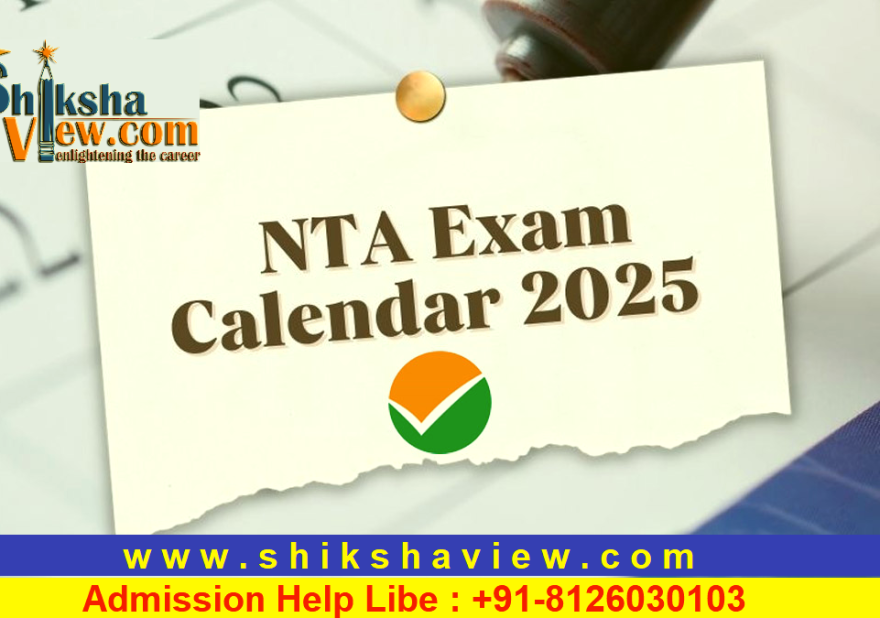

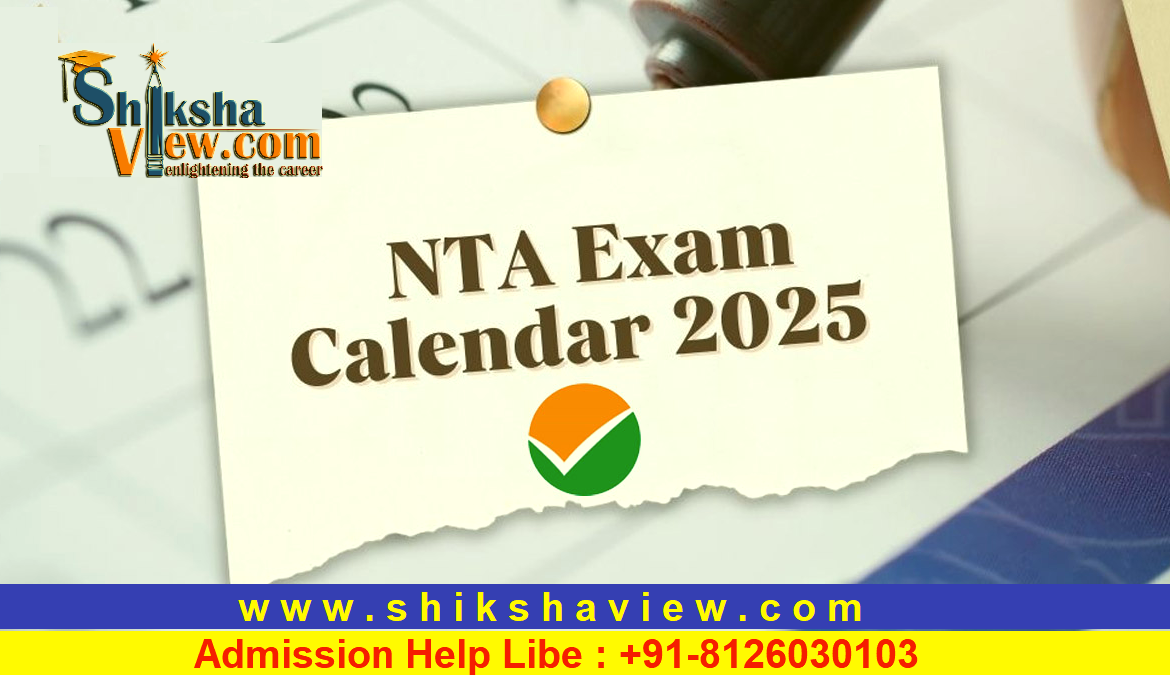






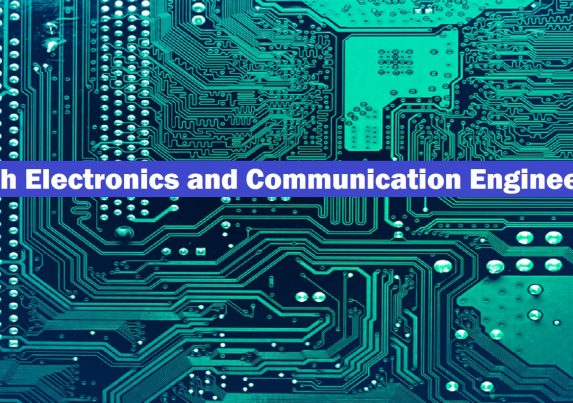



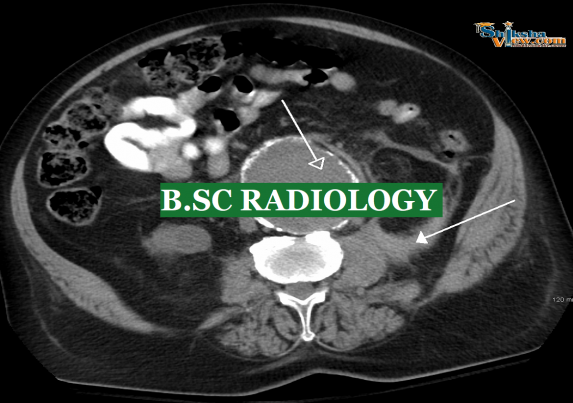
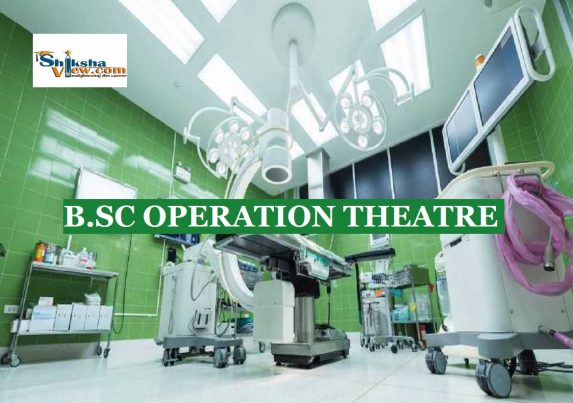








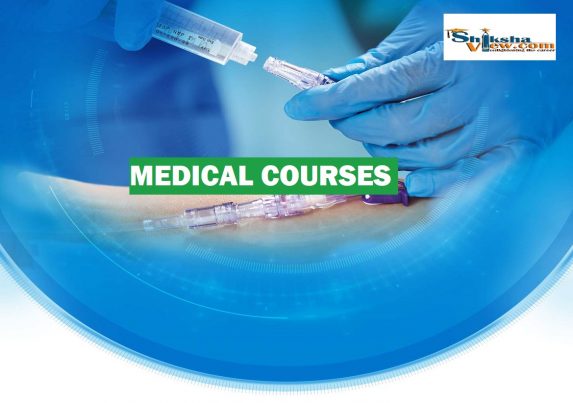


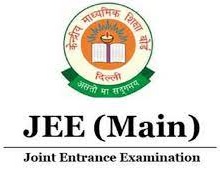
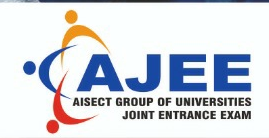
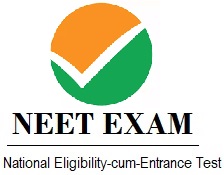
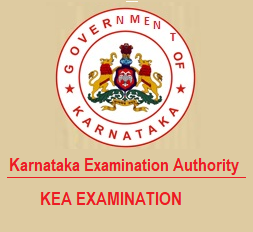
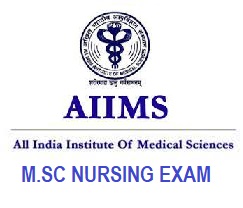
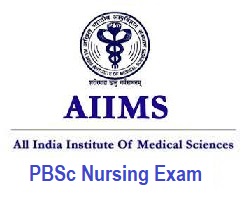
![UP BSc Nursing Admission 2023: Atal Bihari Vajpayee Medical University Examination [ABVMU-CNET] : Application Form, Entrance Exam, Results, Counselling Date atal-bihari-vajpayee-medical-univesity-uttar-pradesh-nursing-exam](https://shikshaview.com/wp-content/uploads/2023/04/atal-bihari-vajpayee-medical-univesity-uttar-pradesh-nursing-exam.png)
